Sore loser GOP lawmakers are ruining democracy for everyone else
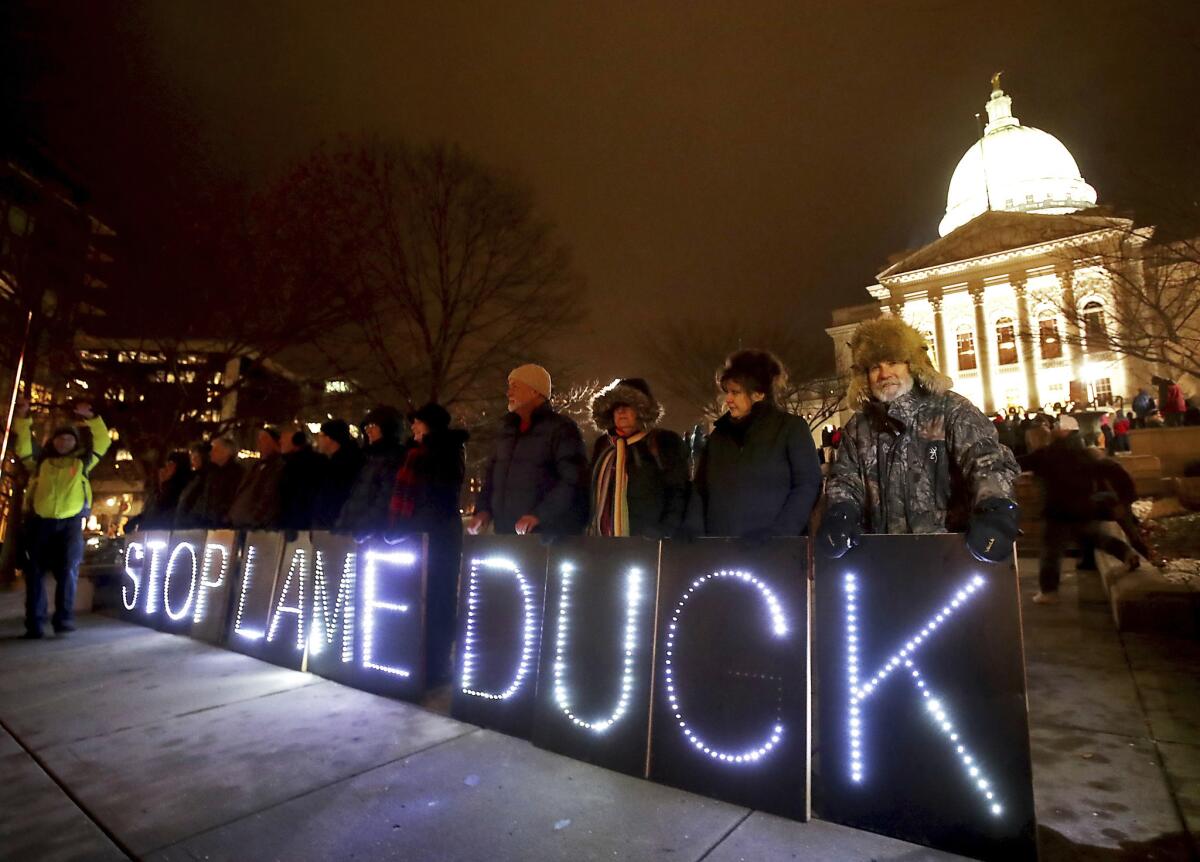
Talk about lame lame ducks.
Republicans lost control of gubernatorial and other statewide seats in Michigan and Wisconsin. But instead of graciously accepting the will of voters and handing over the keys to the new guys and gals, they decided to use their remaining days to plunder the prizes won by the rival party. Boo on them.
In Wisconsin, where Republican Gov. Scott Walker lost the top leadership job to Democrat Tony Evers on Nov. 6, the Republican-controlled Legislature is voting on last-minute legislation in a special session that would, among many, many other things, strip Evers of all sorts of authority his predecessor enjoyed.
Wisconsin legislators are also seeking limits on the power of the incoming Democratic attorney general, including by giving themselves the right to hire an outside attorney in certain cases such as those regarding redistricting. (The state’s gerrymandered districts that favor Republicans have been under legal attack). Walker, who is governor for a few more weeks, said he’s inclined to support the legislation.
The Michigan Legislature is on a similar track, rushing through laws to limit the power of the state’s incoming Democratic governor, attorney general and secretary of state. According to the Detroit News, it’s the first time Democrats have held all these seats since 1990.
(That’s not all the last-minute self-serving legislation apparently being rammed through the Michigan Legislature this month.)
If this seems like a familiar a story line it could be because North Carolina’s Republicans took similar action in 2016 before they had to hand the governor seat over to Democrat Roy Cooper.
As my colleague Michael McGough pointed out at the time, one of the last-minute changes — state Senate approval of cabinet members — is actually sensible. But even good ideas smell like sour grapes when they come as part of a figurative middle finger to an incoming, elected leader.
These are power grabs, pure and simple. And though this sore loser legislation is apparently legal, citizens of those states should make note of the legislators who vote for it — and hold them accountable.
A bit of this sore loser-ness has been focused on California as well. Republicans lost spectacularly in the Golden State on Nov. 6, seeing their already small contingent of congressional and state legislative seats diminished to historic lows. That’s got to hurt, but it doesn’t excuse Republican leaders such as outgoing House Speaker Paul Ryan for trying to sully the reputation of California’s voting system by suggesting there was something amiss in the counting. What happened is no mystery; the state made it easier to register and to cast ballots, which benefited traditionally disenfranchised voters who tend to be more left leaning.
Look, losing sucks for everyone. But when the losing team pushes over the prize table on the way off the field, they ought not be invited back for the next season.
From Black Friday to Waste Wednesday

First there was Black Friday, the post-Thanksgiving shopping extravaganza that has become synonymous with huge deals, long lines and the occasional brawl.
Then there was Cyber Monday, because online retailers wanted in on the buying bonanza.
Then came Giving Tuesday, because nonprofits need money too. (It’s today, if you have somehow managed to avoid having your email inbox filled with appeals.)
Before marketers get their hands on Wednesday and cook up another campaign designed to part people from their cash, I’d like to claim it to highlight a byproduct of all this spending: trash.
Let us call this day Waste Wednesday. No one has to spend money to celebrate. Simply gather together all packaging material that came with stuff bought over the past few days, pile it up and contemplate its immensity and its future.
Each new television, blender or toy (and even the swag from your donation to public radio) comes swaddled in a considerable amount of disposable material — boxes, bags and every type of plastic you can imagine.
Most of this material is promptly discarded and sent on its way to landfills, though perhaps a bit might be diverted into recycling bins and come back to life as part of something put on sale next Black Friday. But some of it will probably end up in the environment, as trash has a nasty way of doing, released on purpose or by accident into gutters, storm drains, by the sides of the freeway and, increasingly, into the world’s oceans.
After gathering all of the single-use packaging material you received, you should commemorate the moment by posting a photo of the pile on social media with the hashtag #WasteWednesday. That’s it.
If this catches on, it might give retailers incentive to cut down on all the disposable packaging that gets bundled with their products in time for next year.
If Trump wants to keep auto plants open, he should accelerate, not brake, the transition to electric vehicles
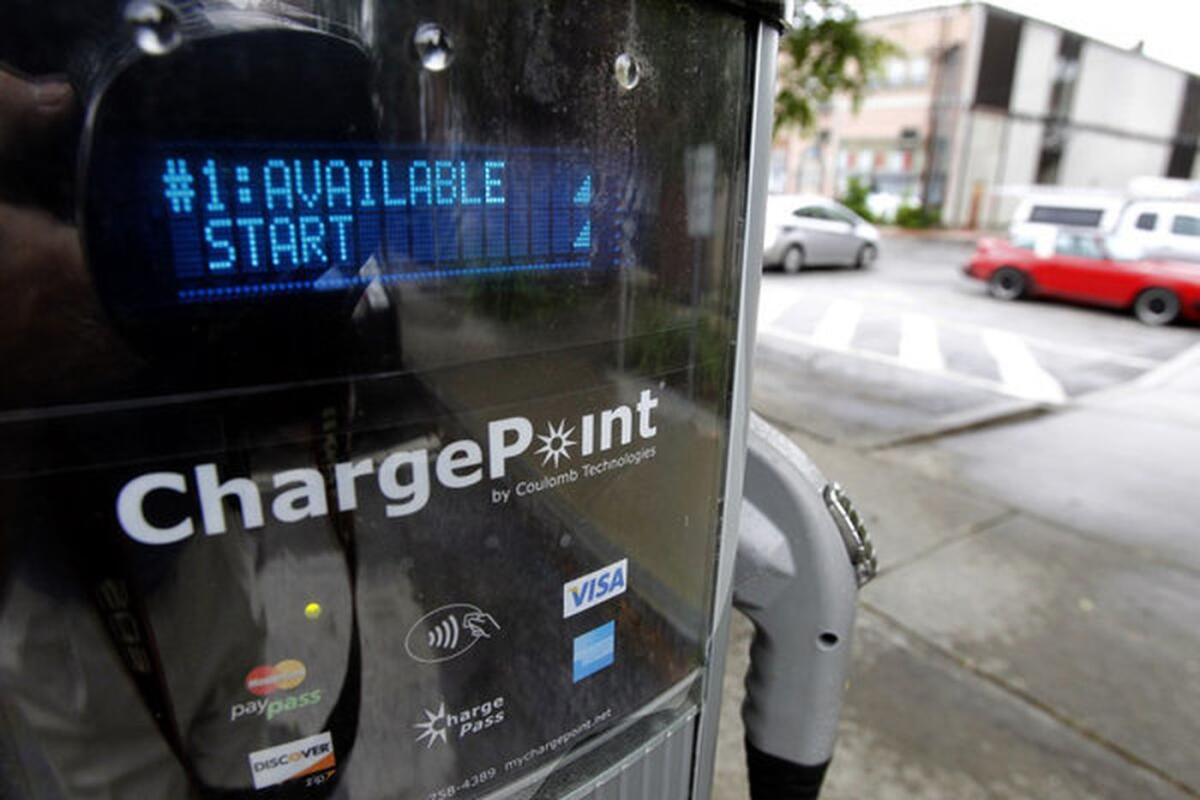
General Motors’ announcement that it is shutting down auto plants and laying off blue- and white-collar workers put President Trump in a predictable froth, which my colleague Jon Healey wrote about.
But if the president was really interested in helping GM, he’d be looking at supportive policies, not punitive (and likely illegal) threats to withhold subsidies. In fact, the president should be increasing subsidies for some of the lines GM plans to end: the Chevrolet Cruze and Volt lines.
GM’s announcement overlapped with a sprinkling of dire reports (which I wrote about) that the U.S. and the world are botching our chance to more directly confront greenhouse gas emissions.
One crucial step would be to reduce the number of gas-powered vehicles. But electric cars and hybrids are more expensive than their gas-powered counterparts, in part due to a lack of economies of scale. So instead of threatening to withhold EV subsidies to GM, Trump ought to look at increasing them across the industry, and finding other ways to make EVs more affordable for consumers (and no, EVs aren’t the complete fix, but they would help).
As the government’s own study on Friday pointed out, the U.S. faces a severe hit to its economy from climate change. So his drill-and-burn policies will just end up costing the nation more down the road, not to mention helping make the world less habitable for humans.
If the president would pull his head out of the oil well, he would see there is huge economic opportunity to be had by leading the global turn to renewable energy, and the U.S. could seize the pole position if the government did more to help build the market for electric vehicles.
More than a century ago, these newfangled toys for the middle class — automobiles — became integral to American society when the government invested in paved roads for the cars to travel on, and Henry Ford found a way to make those cars affordable to more people.
The government could do more now to build up the infrastructure for EVs, including charging stations, more and better consumer rebates for converting (and scrapping, not reselling, their used gas guzzlers), and other steps to send both a market signal and market support for products that serve a broader purpose than just getting us to work or the grocery store.
Trump to GM: Drop dead
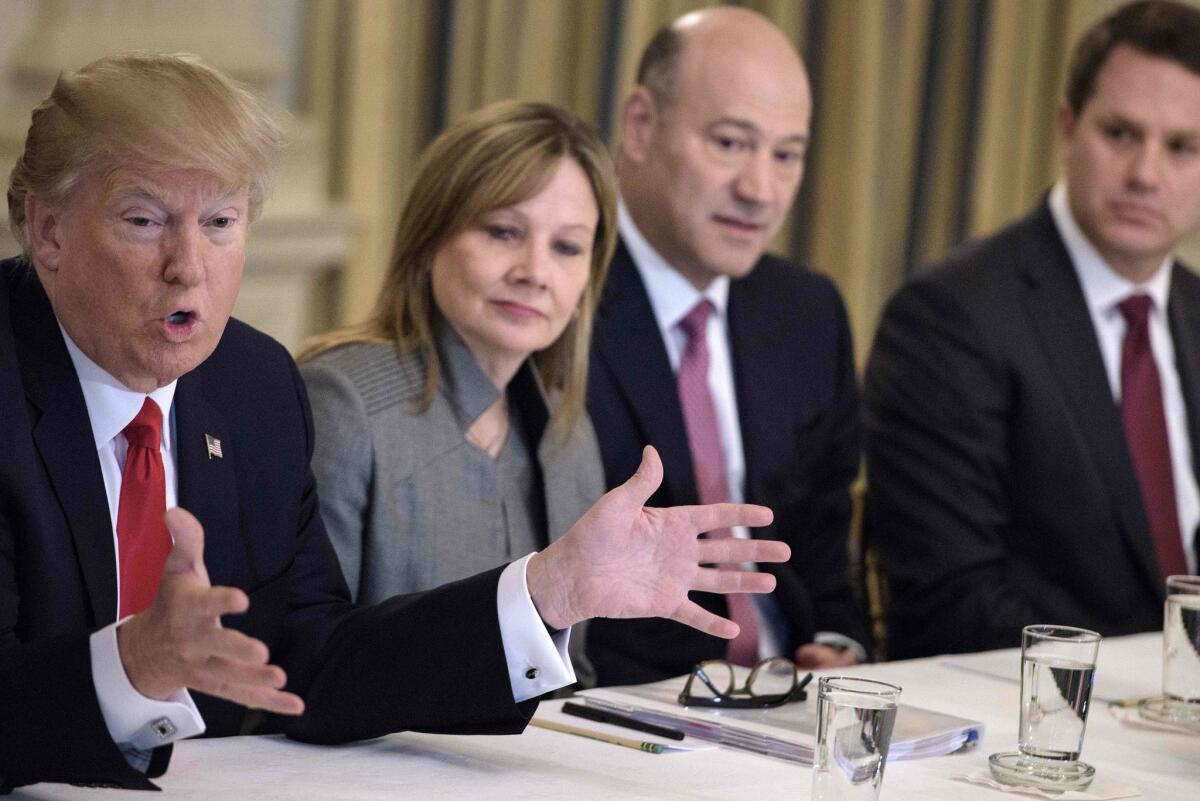
For someone who has pushed hard to free U.S. companies from federal interference, President Trump is unusually willing to tell U.S. companies how to run their businesses.
The latest example is General Motors, which announced plans Monday to cut thousands of jobs and potentially shutter a handful of factories in the face of softening car sales. Traditional Republicans might consider this sort of development a painful but necessary part of the business cycle. To Trump, though, it was a needless blow to an important constituency — autoworkers — in Ohio and Michigan, two blue-collar-heavy Midwestern states that were important parts of his winning coalition in 2016. (The company’s updated plans also envision plant shutdowns in Maryland and Canada, plus two unspecified plants outside of North America.)
So Trump hectored and threatened GM’s leadership, both directly and through the media. He raised the stakes Tuesday on Twitter:
You can insert your own thoughts here about the constitutionality of suddenly (and unilaterally) withholding subsidies from one company while providing them to its competitors. Also, note that the subsidy Trump specified is tied to one of the products GM CEO Mary Barra says is crucial to the company’s future.
Republicans may not object to Trump bullying world leaders in pursuit of this country’s priorities. But bullying the leader of a company in a globalized industry for having a global strategy? That should drive conservatives nuts.
Trump’s America First perspective seems to be making it hard for him to see the reality of GM’s situation. Like many multinational corporations, automakers have factories around the world not just to cut labor costs, but to put production closer to the demand its serving. And though sales dipped slightly in the U.S. last year, they continued growing robustly overseas, especially in China and other developing countries.
So while it might make sense to trim production in the United States, particularly of small cars that are making up a shrinking share of the local market, it makes no sense to roll back production in China — or in Mexico, a prime exporting location thanks to its many tariff-cutting trade agreements.
Whether GM’s bet in China pays off depends on a number of factors, including whether China allows GM to succeed. But Trump may be giving the company’s Chinese investments an unintended hand by piling hefty tariffs on Chinese goods imported into the U.S., which in turn have prompted China to slap tariffs on a growing number of U.S. exports. With those extra costs in place, it’s cheaper for a U.S. company to serve the Chinese market by producing goods there with non-U.S. parts than it would be to serve it with goods exported from a plant in, say, Ohio.
In fairness, Trump’s tariff policy aims to change truly bad behavior that the Chinese government has encouraged or even adopted as policy. The administration has the right goal, which is to stop the theft of intellectual property and eliminate the subsidies and trade barriers that violate international agreements. It’s just that the tactics it’s using — unilaterally imposing tariffs that raise prices for U.S. consumers and invite retaliatory tariffs that hurt U.S. exports — could cause a lot of unnecessary collateral damage.
That damage could increase if the president raises tariffs on $200 billion worth of Chinese goods on Jan. 1, as threatened, and slaps new tariffs on an additional $267 billion worth of Chinese imports. Tariffs are consumption taxes, and the larger and more unavoidable they become, the greater the downward pressure they place on the U.S. economy.
Just a reminder: U.S. automobile sales, like the overall U.S. economy, are cyclical. Industry analysts started predicting more than a year ago that sales were leveling off and would start to slide, and that’s what Barra is reacting to. In fact, the downturn in both automobile and home sales has some economists worried about a recession.
No one welcomes big layoffs — GM’s planned cuts would sacrifice about 8% of the company’s jobs. But Barra recognizes that consumers, not presidents, ultimately decide what happens to auto sales and each company’s market share. And company leaders, not presidents, have to decide how to compete and thrive over the long run.
We can’t say we weren’t warned about climate change: Three grim new reports show we’re not doing enough

In the future, when the seas have risen along with global temperatures, and droughts, floods and heat waves have collapsed ecosystems and made sections of the Earth uninhabitable for humans, we won’t be able to say we didn’t see it coming.
Even the Trump administration, in a report released (fittingly enough) on Black Friday, now admits that climate change is here. In fact, another report released the same day says nearly one-quarter of U.S. carbon missions can be traced to oil and gas leases on federal land, so the culpability goes beyond inaction and bad policies to, at least minimally, earning revenues from extracting fossil fuels. Phasing out those leases would go a long way toward meeting national emissions goals.
But wait, there’s more: According to the annual United Nations Environment Program’s Emissions Gap Report released Tuesday in Paris, governments that agreed in 2015 to aggressively reduce their carbon emissions so far have achieved little.
In fact, the report says, promises made only three short years ago to hold temperature rise to less than 2 degrees Celsius above pre-Industrial Age levels, with a goal of limiting the rise to 1.5 degrees Celsius, “are inadequate to bridge the emissions gap in 2030. The U.N. said it was still technically possible to meet the temperature target, but if national “ambitions are not increased before 2030, exceeding the 1.5 degree Celsius goal can no longer be avoided.”
The U.N. report also said that, after three years of relative stability, carbon emissions went up last year despite mitigation efforts and that “global greenhouse gas emissions show no signs of peaking.”
Lovely.
California has famously led the way among what are called sub-national actors, and although such efforts are good, the report notes that they fall far short of the emissions reductions needed globally. It will take fuller national involvement.
Which brings us inevitably to President Trump, who has said, among other things, that he doesn’t believe human activity is affecting climate change. So it shouldn’t surprise anyone that Trump’s response to his own administration’s reports of dire consequences was to state simply, “I don’t believe it.”
Because if he did believe it, then he’d have to acknowledge that his policies to extract and burn ever more fossil fuel endangers the nation’s welfare. And to paraphrase scientist Neil deGrasse Tyson, the climate doesn’t care whether Trump believes it’s changing. It’s changing anyway. The challenge is whether the American people — and, for that matter, the global population — believe it and are willing to combat it with everything from changing consumer choices to changing recalcitrant governments.
There are a lot of phrases in the English language for what we’re doing. “Fiddling while Rome burns” comes to mind, a la Nero. There’s also “standing idly by” and “whistling past the graveyard.”
But no matter how you phrase it, we’re doing it to ourselves.
Welcome to Black Friday. Where did that name come from, anyway?
For us non-material types (except for books. And music. And cooking utensils — you get the idea) Black Friday is the bleakest day of the year.
On Thanksgiving Thursday, we celebrate comity and family and take stock of our blessings.
On Black Friday, shoppers throng stores at ungodly hours, elbowing their way forward and swiping goods out from beneath each others’ noses just to save a few bucks on things that neither they nor the intended holiday gift recipient really need.
It’s like lemmings with wallets.
So where did this shopping orgy come from?
Blame Philadelphia. And football. And the Army and the Navy — well, at least their academies.
And, of course, marketers.
Researcher and amateur word sleuth Bonnie Taylor-Blake gets the credit for tracking this down a few years ago. As the New Yorker noted, the common explanations — it was the day retailers counted on for making their year profitable — never made sense to her, so she began digging.
It turns out that in the 1950s, thousands of people would descend on downtown Philadelphia for the annual Army-Navy football game on the Saturday after Thanksgiving. On the day before the game, out-of-towners would add to the throngs of locals who went downtown to shop. The crowds became so huge that all police vacations were canceled to make as many officers available as possible for crowd and traffic control.
The ticked-off cops began calling it Black Friday, and the name stuck.
Shop owners at first were displeased — Black Friday sounds closer to the Black Plague or a stock market rout (the original 1869 coinage referred to the collapse of the gold market after robber barons Jay Gould and James “Diamond Jim” Fisk tried to corner it) than it does to “come spend all your money.” So a movement developed to rebrand it as Big Friday.
Yeah, that didn’t last long.
So Black Friday it is. And in three days we’ll have Cyber Monday, another marketing ploy to separate consumers from their cash.
Who knew lemmings could use a mouse?
John Roberts’ brushback pitch at Trump comes with a big old asterisk
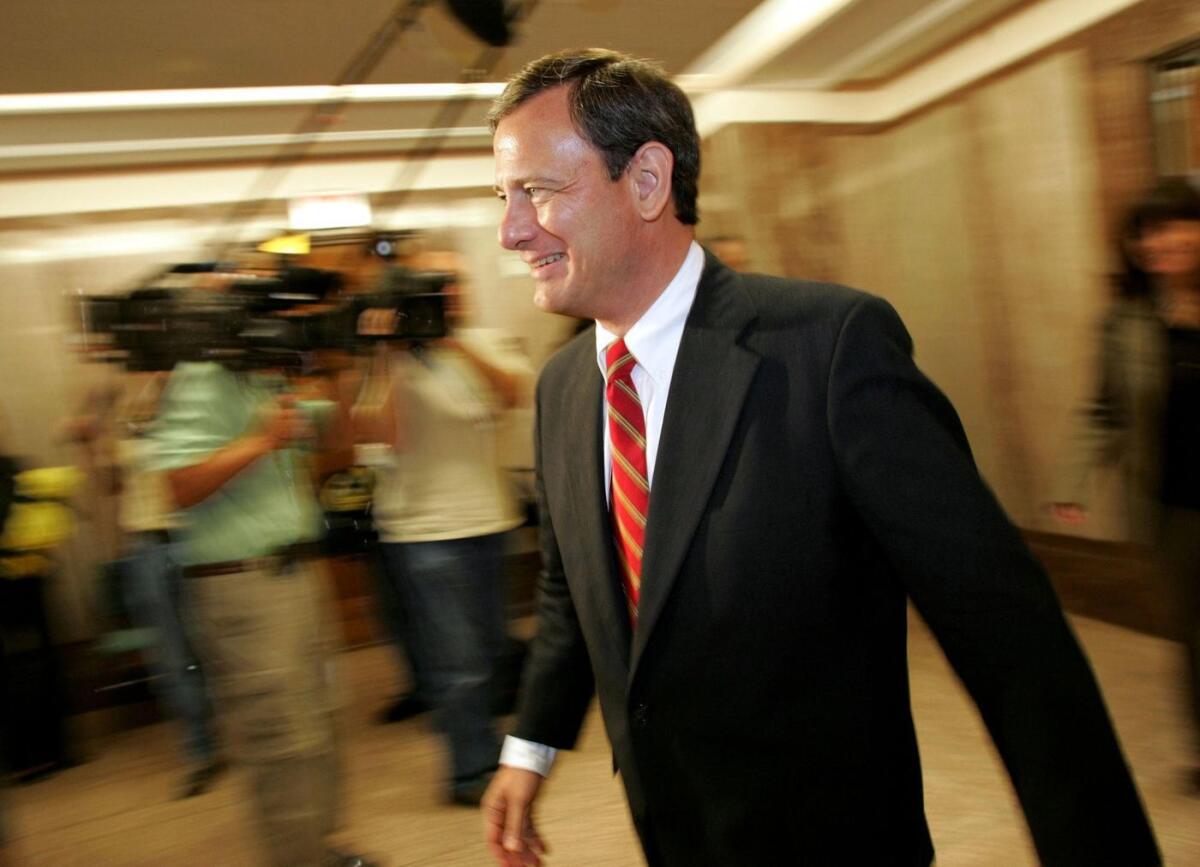
Chief Justice John G. Roberts Jr. deserves credit for pushing back — judiciously — against President Trump’s latest attack on the federal judiciary.
Trump had complained that “an Obama judge” in Northern California had ruled against the president’s attempt to restrict asylum applications. He ominously added: “I’ll tell you what, it’s not going to happen like this anymore.”
In a statement released by the Supreme Court, Roberts said: “We do not have Obama judges or Trump judges, Bush judges or Clinton judges. What we have is an extraordinary group of dedicated judges doing their level best to do equal right to those appearing before them.”
It was a point worth making, even though it wasn’t likely to have any influence on Trump. In fact, the president struck back right away on Twitter:
So, good for the chief justice, but his intervention inspires a few thoughts:
* I wonder how many people who will applaud Roberts for this statement think that the Republican Senate in 2016 “stole” a seat from Barack Obama by refusing to consider his nomination of Judge Merrick Garland to replace the late Antonin Scalia. Isn’t that just another way of saying that liberals were denied an “Obama judge”?
* Maybe Roberts should also aim his criticism at journalists, who routinely identify federal judges in terms of the president who appointed them, even when it’s not relevant. I wrote about that reflex here.
* Roberts knows that his assertion that judges aren’t partisan requires a large asterisk. In some politically charged cases, judges appointed by Democratic presidents can be expected to rule differently from judges appointed by Republicans. But that doesn’t make them partisan hacks. Trump needs to be reminded of that, but so do some Democrats.
* If Roberts is in a remonstrating mood, maybe he will quietly discourage his colleagues on the court from acting in ways that reinforce the “Obama judge”/” Trump judge” stereotype — such as attending events of ideologically defined groups such as the Federalist Society and the American Constitution Society.
* Roberts’ defense of a so-called Obama judge is a reminder that, as a senator, Obama voted against Roberts’ confirmation. Obama said he voted “no” because Roberts had “far more often used his formidable skills on behalf of the strong in opposition to the weak.” The cynical view, of course, is that he didn’t want the political baggage of having voted for a “Bush judge.”
Of course, despite being dissed by Obama, Roberts voted twice to uphold provisions of the Affordable Care Act, Obama’s signature legislative accomplishment, against legal challenges. Does that make him an honorary “Obama judge”? Some Republicans think so.
One message Jerry Brown definitely shouldn’t send on his way out the door
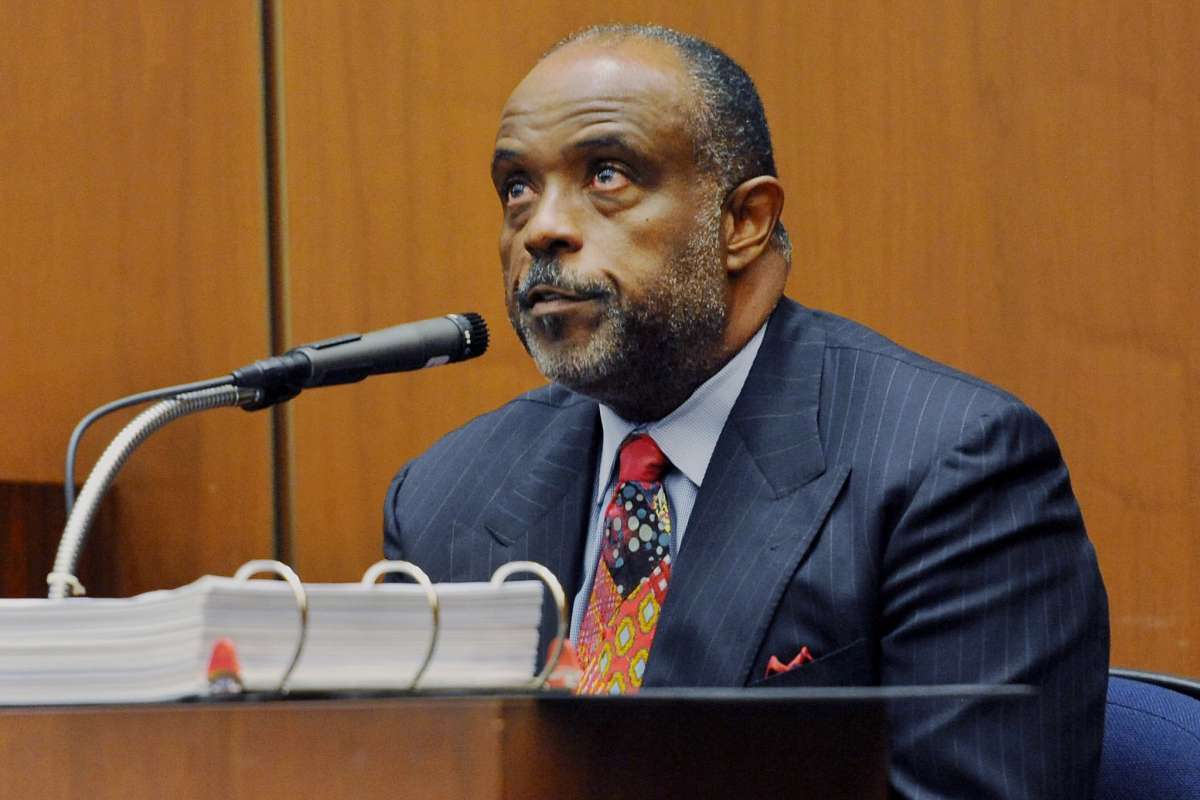
With the state Supreme Court having given its blessing, it seems all but certain that Gov. Jerry Brown will pardon former state Sen. Roderick Wright (D-Inglewood), who was convicted of voter fraud and perjury four years ago.
In fact, I would be surprised if he didn’t, and soon. Wright was a popular politician who many believed was unfairly targeted by the district attorney for simply misinterpreting the residency rules for state lawmakers. The law says state legislators must live in the district they seek to represent. But what does “live in” mean?
It’s actually a more complicated answer than you might think. California is a big state, and the job of a full-time legislator means they must spend a considerable amount of time in Sacramento. Many choose to maintain a home in that city, and even enroll their kids in school there. That seems reasonable.
Wright’s case, however, was not about spending time in Sacramento. He rented an apartment in a working-class neighborhood in his South Los Angeles district but was actually doing his real living at a nice home in a nearby community that was outside the district’s boundaries. The D.A. thought that was a violation of the trust of voters; so did the Los Angeles Times editorial board.
As part of his sentence, besides a very brief jail stay,Wright was forbidden from running for public office again. Nevertheless, he has continued to be a force in Sacramento, though now as a lobbyist.
Pardoning Wright will erase those felonies and, I fear, also the imperative for current and future legislators to live in their districts. SB 1250, passed earlier this year, pushes lawmakers in the same unwelcome direction. The bill, authored by the senator who replaced Wright in the South L.A. district, loosened the rules for legislators regarding maintaining homes outside their districts.
As a new class of legislators gets ready to take the oath of office next month, its members should also remember the pledge they made to voters during the campaign — that is, to be a true representative of their district. Not just an occasional visitor.
Letting U.S. troops open fire on migrants would make the stupid decision to deploy them even worse

President Trump may be about to make a bad decision even worse.
In the run-up to the midterm election, Trump tried to turn the northward flow of a few thousand desperate Central Americans into a crisis of sovereignty, describing the parade of young men, mothers and children as an “assault” on the border, which he threatened to close.
So like any commander in chief who has no idea what he’s doing, Trump ordered active-duty troops to the border to augment the 6,600 federal agents already patrolling there. Under the Posse Comitatus Act, the military cannot be used for domestic law enforcement purposes on U.S. soil. So the Pentagon has deployed up to 7,000 troops, many of them unarmed, to aid in surveillance, build or mend fences, improve fortifications of border crossings, and other such non-military work.
Now it seems the Pentagon is considering changing directives to the troops to allow them to use their weapons to defend border agents from attack. That might thread the needle of the law, but it certainly violates the intent to limit U.S. armed forces’ domestic deployments and preserve them for defending the country from attacks and militarized threats abroad.
It’s hard to see where firing combat weapons at the unarmed and desperate fits in with a military mission. And it’s not like the Border Patrol has trouble defending itself — agents used their firearms 17 times last year, down from 55 incidents five years before.
But allowing active-duty troops to also use their weapons to protect the already armed Border Patrol escalates the risk that frustrated migrants throwing rocks might get shot, an egregiously out-of-balance response. And it’s not that the troops are trigger happy. It’s more a matter of training and purpose.
This reminds me of the end of the war in Kosovo two decades ago, where I watched a mob of ethnic Albanians on the south side of the Ibar River in the city of Mitrovica face off against ethnic Serbs who lived on the north side. French troops occupied the main bridge over the river and kept the two groups apart. But the Albanians kept trying to cross the bridge, a human tide the French troops had trouble countering because, as one officer told me, they were trained to kill in combat, not control unarmed and unruly mobs.
So a squadron of Italian police — who were trained in crowd control — was deployed to serve as a buffer between the crowd and the troops, and the confrontation slowly wound down.
It’s a good lesson to remember. Trump deployed the troops as a bit of political theater, and as playwright Anton Chekhov once observed, a gun introduced in the first act will get used in the third. That would turn the farce at the border into tragedy.
At least Trump didn’t blame Jamal Khashoggi’s death on a 400-pound hacker

The killing of journalist Jamal Khashoggi and the U.S. intelligence community’s conclusion that Saudi Crown Prince Mohammed bin Salman is probably responsible would be a challenge to even the most judicious and thoughtful U.S. president. The U.S.-Saudi relationship is long-standing and important, yet the United States cannot be seen to condone the state-sponsored assassination of a journalist.
Of course, President Trump is far from being that ideal president, as is clear from the embarrassing statement about Khashoggi’s killing he released Tuesday.
Reading more like the transcript of a Twitter thread or a Fox News interview than a considered foreign-policy pronouncement, Trump’s statement opened with his “America First” campaign slogan — followed by an exclamation point — and the likewise exclamation-pointed observation that “The world is a very dangerous place!”
Then came an exercise in relativism, with Trump ticking off the sins of Iran (including responsibility “for a bloody proxy war against Saudi Arabia in Yemen”) and a reference to how much money Saudi Arabia spends and invests in the United States. (His estimates of the value of Saudi investment have been widely questioned.)
In the fifth paragraph, Trump finally got around to saying: “The crime against Jamal Khashoggi was a terrible one, and one that our country does not condone.” He then boasted of the sanctions the U.S. was imposing on 17 Saudis identified as being involved in Khashoggi’s killing in Turkey and the disposal of his body.
But what about the crown prince, the de facto leader of Saudi Arabia, whom the CIA reportedly has blamed as the author of the plot?
Trump said that “it could very well be that the crown prince had knowledge of this tragic event — maybe he did and maybe he didn’t!” (Or maybe the killing was ordered by somebody sitting on his bed who weighs 400 pounds.)
“That being said,” Trump continued, “we may never know all of the facts surrounding the murder of Mr. Jamal Khashoggi.” But he left the impression that it wouldn’t bother him that much if the crown prince was proved to be responsible.
“In any case,” he went on, “our relationship is with the Kingdom of Saudi Arabia. They have been a great ally in our very important fight against Iran.” (The notion that Iran is uniquely nefarious isn’t just Trump’s view; it’s the policy of his State Department.)
Toward the end of his statement Trump left the door open to approving additional sanctions pressed by Congress, which he referred to disparagingly as people motivated by “political or other reasons.”
But in its totality, the statement was a tone-deaf invocation of American interests narrowly defined and a cavalier rejection of any role in U.S. foreign policy for morality or human rights.
Again, framing a response to the apparent complicity of the Saudi leadership in Khashoggi’s death isn’t easy.
The Washington Post, for whom Khashoggi wrote opinion columns, suggested in an editorial Monday that the U.S. could “sanction and shun” the crown prince “while still doing business with the regime.”
Squaring that circle would be extraordinarily difficult. On Tuesday, though, Trump made it clear he’s not interested in even making the effort.
Ivanka’s emails are an embarrassment, but she’s no Hillary Clinton

Supporters of Hillary Clinton in 2016 — and even a few non-supporters — are having a good laugh over the report that first daughter/senior advisor Ivanka Trump used a personal email account to transact official business.
On Twitter, John Dean (yes, that John Dean) opined: “Dems should run this to ground given her father thought a very big deal when it involved Hillary. So it’s got to be [a] big deal for Ivanka!” Newsweek in tweeting out its story used the inevitable teaser: “Lock her up?”
The mirth — and bitterness — are understandable. It’s an article of faith among Clinton supporters that the issue of her emails was overblown (including by the “liberal” media). And it’s hard not to chuckle at the irony of improper email traffic ensnaring the daughter of a president who claimed Hillary’s actions were “worse than Watergate.”
I don’t want to spoil anyone’s fun, but the differences between the Clinton and Ivanka email offenses are as noteworthy as the similarities.
First of all, Clinton was the secretary of State with access to sensitive information; Ivanka Trump has a vastly less important (and more amorphous) portfolio.
More important, the Washington Post, which broke this story, noted that the FBI eventually determined that 110 of Clinton’s emails contained classified information at the time they were sent or received. A spokesman for Ivanka Trump’s lawyer said that none of her emails contained classified information. If that’s true, it’s an important difference.
It’s possible to believe that Clinton was “extremely careless” in her handling of classified information (the quotation is from former FBI Director James B. Comey’s famous news conference) and that she a) shouldn’t have been prosecuted and b) should have been elected president rather than Donald Trump.
As the Los Angeles Times put it in a Nov. 2. 2016, editorial reiterating our endorsement of Clinton:
“There is no comparison between Clinton’s carelessness in corresponding with colleagues and the recklessness that Trump would bring to the conduct of actual foreign policy. And that is only one of a multitude of differences between the two nominees.”
Clinton shouldn’t have been “locked up” for her email infractions, and neither should Ivanka Trump based on what the Post has reported. That doesn’t mean the two situations are interchangeable, or that Democrats should see Ivanka’s indiscretions as somehow justifying Clinton’s carelessness with sensitive information or her penchant for secrecy.
It may not have been a crime — it shouldn’t have cost her the election — but it was a big deal.
A federal judge tells Trump the obvious — he can’t ignore asylum law just because he doesn’t like it

It was clear from the start that President Trump didn’t have the legal authority under the Immigration and Naturalization Act to ban asylum requests at any place other than established ports of entry, but the administration went ahead with the order anyway.
Late Monday night a federal judge told the government to knock it off, at least for now.
“The rule barring asylum for immigrants who enter the country outside a port of entry irreconcilably conflicts with the INA and the expressed intent of Congress,” wrote Judge Jon S. Tigar in San Francisco. “Whatever the scope of the President’s authority, he may not rewrite the immigration laws to impose a condition that Congress has expressly forbidden.”
Hate to say we told him so, but ... actually, we don’t hate to say it at all. The president and the anti-immigration hard-liners among his advisors broke the law in denying asylum requests outside ports of entry. They also seem to be violating at least the spirit of asylum laws by throttling back the number of applications they are accepting at the border crossings each day, creating a growing backlog.
Yes, the law gives the president wide latitude in adopting and enforcing immigration regulations and policies, but it does not give him the power to rewrite or ignore fundamental aspects of the law. And the INA is explicit about how, where and when people may apply for asylum:
“Any alien who is physically present in the United States or who arrives in the United States (whether or not at a designated port of arrival and including an alien who is brought to the United States after having been interdicted in international or United States waters), irrespective of such alien’s status, may apply for asylum in accordance with this section or, where applicable, section 235(b). ”
I added the boldface to the text in case the White House counsel’s office reads this, because apparently the letter of the law wasn’t plain to the legal team the first time around.
Or maybe it was and the president just decided to forge ahead anyway and gamble that no one would stop him.
Presidents, of course, have the right to try to work through or even around laws and regulations as they feel necessary. President Obama did it when he crafted the Deferred Action for Childhood Arrivals program, granting reprieve to people who have been living here without permission since they arrived, usually with their parents, as children.
Congress repeatedly failed to devise a remedy for those folks, so Obama, while saying he couldn’t change immigration law, found a way to help the so-called Dreamers by invoking prosecutorial discretion. With 11 million people living in the U.S. illegally, the government must prioritize whom it removes, and Obama deemed Dreamers who met certain conditions safe from deportation until a permanent fix could be found.
Immigration hard-liners howled at the perceived abuse of executive power and sued, though courts so far have not found in their favor. But Obama’s move was framed within the latitude the law gives the president. Trump went further: The law does not give the president freedom to contradict Congress’ stated intention (see above) to, in this case, let asylum seekers make their requests once they reached U.S. soil, no matter where it might be.
That part of the law was based on the solid humanitarian idea that people fearing for their lives shouldn’t be turned away because they didn’t enter through a designated port.
Is the asylum system abused? Some people probably try to scam it, or make good-faith claims based on conditions that do not meet the stringent requirements of being likely to face death or persecution for their race, faith, nationality, political beliefs or membership in “a particular social group,” which has been subject to interpretation by the courts.
But we have a legal system for processing asylum requests and sifting out the false claims, and no presidential anti-immigration stance should compromise it.
The conditions at the border — a crush of desperate people seeking safety from dangerous conditions in their home countries — is a humanitarian crisis, not an immigration crisis. And it is heartless of the administration to respond to it with military deployments, blatant violation of asylum law, scapegoating and fear-mongering.
And it is distressing that so many Americans fall for it.
Tobacco and alcohol companies have to post warnings about their products. Why do gun vendors get a pass?

In California, businesses that sell products containing known carcinogens must post “clear and reasonable” warnings about the danger of exposure consumers face (remember that brouhaha about coffee?). Look at the side of a can of beer and you find a label warning that “drinking distilled spirits, beer, coolers, wine and other alcoholic beverages may increase cancer risk, and, during pregnancy, can cause birth defects.” Ditto for tobacco products.
But in Washington state, the King County Board of Health (think Seattle) has gone one better about a consumer product with a much more immediate risk of death. It recently ordered all gun vendors in the county to post signs warning of the increased risks of danger from possession of a firearm. The signs read: “Warning: The presence of a firearm in the home significantly increases the risk of suicide, homicide, death during domestic violence disputes and unintentional deaths to children, household members and others.”
As I noted recently, gun suicides far outpace gun homicides, and middle-aged white men are most prone to kill themselves with a gun.
Similarly, women in a house where a gun is kept have a significantly increased risk of getting shot to death during a domestic violence incident. (If they read this, I suspect fewer women would want to live in a house where a gun is present.)
The Everytown for Gun Safety group reported last year that a majority of mass shootings — four or more people shot dead, not counting the killer — from 2009-16 involved domestic violence.
Yes, we stand horrified if no longer shocked by the Thousand Oaks massacre, the Pittsburgh synagogue massacre, the Santa Fe High School massacre in Texas, the … well, here’s the list. Go revisit all the mass killings you’ve forgotten about.
But as a society, we also tend to ignore the routine carnage of one or two or three or four people shot and killed almost invariably by a father or husband or boyfriend who had easy access to a firearm.
In a dark irony, surveys on gun ownership find that where hunting once was the prime motivator for people buying guns, now it’s fear — a desire to own a gun for self-protection, even though violent crime has been in steady decline for a quarter century. And even though having a gun in the house increases the chances it will be used on a family member or acquaintance, such weapons are rarely used in self-defense.
People ought to know these things as they browse the gun cases, and the idea ought to spread far beyond King County. It’s a sane, if baby-step, approach to making sure that people who buy guns know what they’re getting themselves into.
The White House just can’t stop making Jim Acosta look good
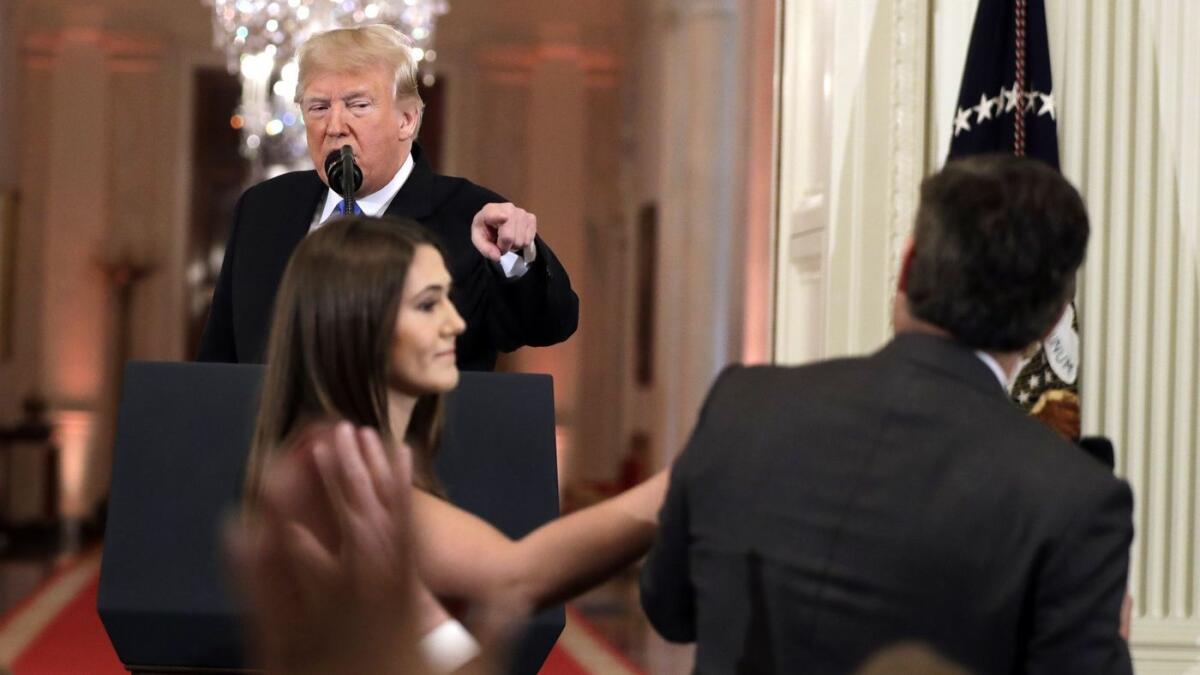
President Trump has a knack for elevating the people around him. Kind of like LeBron James — except, umm, different.
Take Trump’s ongoing feud with CNN White House correspondent Jim Acosta. For the second time this month, the president has turned Acosta into a sympathetic figure, which is remarkable to anyone who has seen Acosta ask a question in front of a live camera.
After a testy exchange during a press conference at the White House on Nov. 7, Trump’s press secretary, Sarah Huckabee Sanders, announced that Acosta’s security pass to the White House was being suspended. Sanders first accused Acosta of manhandling a female White House intern, then after CNN sued, she said Acosta had hogged the microphone in a disruptive way.
On Friday, a federal judge (who was a Trump appointee, no less) issued a temporary restraining order against the White House, saying the summary suspension had most likely violated Acosta’s right to due process. On Monday, however, CNN was asking for U.S. District Judge Timothy J. Kelly’s help again, saying the White House was trying to renew Acosta’s suspension before the parties were scheduled to return to court.
Kelly’s specific instruction — agreed to by attorneys for both CNN and the White House — was for the two sides to review his ruling and return to court Monday to discuss how to move forward, possibly with a mutually agreed upon schedule for the remaining court dates. The White House apparently had other ideas. What it did instead was try a do-over that would formally suspend Acosta’s pass by Monday afternoon, while still acknowledging that Acosta would retain his pass as long as Kelly’s temporary restraining order remained in place.
You can’t blame Sanders and her boss, White House Communications Director Bill Shine, for going through Kelly’s order and trying to correct the deficiencies the judge cited. On Friday they wrote Acosta a letter saying his pass was going to be suspended; the letter gave him a chance to respond and made clear who was deciding the issue (ultimately, Trump).
The problem is that it’s not really due process when you make up a rule and apply it ex post facto. That’s what the White House is doing here, by its own admission.
“We had not previously thought that a set of formal rules for journalists’ behavior at press conferences was necessary,” Sanders and Shine wrote. Instead, they said, there was a “widely shared understanding” that reporters would not hog the microphone. They would ask but a single question when called upon, unless the White House deigned to allow a follow-up or two, and then let someone else have a turn.
That’s a pretty good description of the decorum that is supposed to rule the press room, but it’s violated from time to time by reporters who can’t seem to get the president (whoever it happens to be, not just this one) to answer in the complete and forthcoming fashion they desire. Over the years, the decorum has been (more or less) maintained informally, by pressure from one’s peers and from White House staff.
Suddenly applying far more serious consequences to violating the informal rules of decorum is a sharp shift from past practice. Neither Acosta nor any other White House correspondent was given notice of that change; they all may be on notice now, but they certainly weren’t on Nov. 7.
That’s why what Sanders and Shine (and Trump) are doing to Acosta is fundamentally unfair. Here’s hoping that it will be seen as legally deficient as well.
Update, 1:21 p.m.: Apparently, even the White House recognized the inequity of cracking down on Acosta for violating rules that had not yet been written. The administration announced Monday afternoon that it was dropping its effort to lift Acosta’s press pass. Instead, it said, it was putting all correspondents on notice of the new rules it had sought to apply retroactively to the CNN reporter — reporters cannot ask more than one question (unless the White House chooses to permit follow-ups) and must “physically surrendering the microphone to White House staff” immediately thereafter, or risk losing their press pass — with “a more elaborate and comprehensive set of rules” threatened if reporters “unprofessional” conduct spreads to encounters outside formal press conferences.
Still, Sanders couldn’t resist getting in another dig: “We have created these rules with a degree of regret,” she said in a statement circulated through the press pool. “For years, members of the White House press corps have attended countless press events with the President and other officials without engaging in the behavior Mr. Acosta displayed at the November 7, 2018 press conference. We would have greatly preferred to continue hosting White House press conferences in reliance on a set of understood professional norms, and we believe the overwhelming majority of journalists covering the White House share that preference. But, given the position taken by CNN, we now feel obligated to replace previously shared practices with explicit rules.”
Julian Assange was secretly brought up on charges we’re still unaware of. Talk about scary
The U.S. government has been after WikiLeaks maestro Julian Assange for eight years, ever since the site published a cache of classified documents it had obtained from U.S. Army intelligence analyst Chelsea (then Bradley) Manning. And now we learn, through some sloppy legal paperwork, that Assange has secretly been charged by federal prosecutors.
With what, however, we don’t know. And that’s crucial.
Assange remains ensconced in Ecuador’s embassy in London, so the likelihood of him actually being extradited and prosecuted remain slim for now. But that would change if he wears out his welcome there, as some news outlets have reported he’s doing.
As The Times’ editorial board observed in 2010, the risk is that the government would bring a case against Assange and WikiLeaks that could conceivably be used against newspaper reporters and publishers, to the detriment of press freedoms. Obtaining leaked material and exposing government secrets are key aspects of what the news media do.
“Penalties have been imposed in the past on government employees who have leaked confidential information, but not on the reporters or editors who published it,” we wrote. “Is Assange a journalist? Assuming that he received and published information rather than obtaining it on his own, the answer seems to us to be yes. In principle, we can’t see a difference between WikiLeaks and one of the newspapers that published the information.”
Some Democrats might want to cast Assange’s behavior two years ago in a sharply different light. WikiLeaks bedeviled Hillary Clinton’s campaign by publishing emails stolen from campaign officials and the Democratic Party. (That’s one reason then-candidate Donald Trump repeatedly professed his love for the site.) Assange didn’t disguise his antipathy toward Clinton, which raised questions about whether he knowingly participated in an effort by Russian agents to swing the election toward Trump.
It’s easy to imagine special counsel Robert S. Mueller III pursuing Assange along those lines, given that Mueller has already brought charges against a number of Russian agents for allegedly meddling in the 2016 election. And one might think that such a prosecution would pose little risk of criminalizing journalistic behavior. There’s a clear line between providing an outlet for newsworthy material leaked by government whistleblowers and deliberately acting as a conduit for foreign, state-sponsored hackers, isn’t there?
Maybe not. If material is newsworthy — that is, if the public would be better off with the information out in the open — it may not matter from a journalistic perspective where it’s coming from or what the source’s motives might be. If Russian hackers had obtained emails by Clinton secretly promising to seek to overturn the 2nd Amendment or to reduce Social Security benefits after the election, would a U.S. newspaper be wrong to publish them, even if the editor knew how the emails had been obtained and why they were being offered?
These are tough issues, and it’s admittedly self-serving for folks in my position to suggest that the government tread carefully around them. Regardless, we know now that Assange is facing federal charges. One can only hope that they won’t set a dangerous precedent.
Annoying or not, Jim Acosta deserves a White House pass
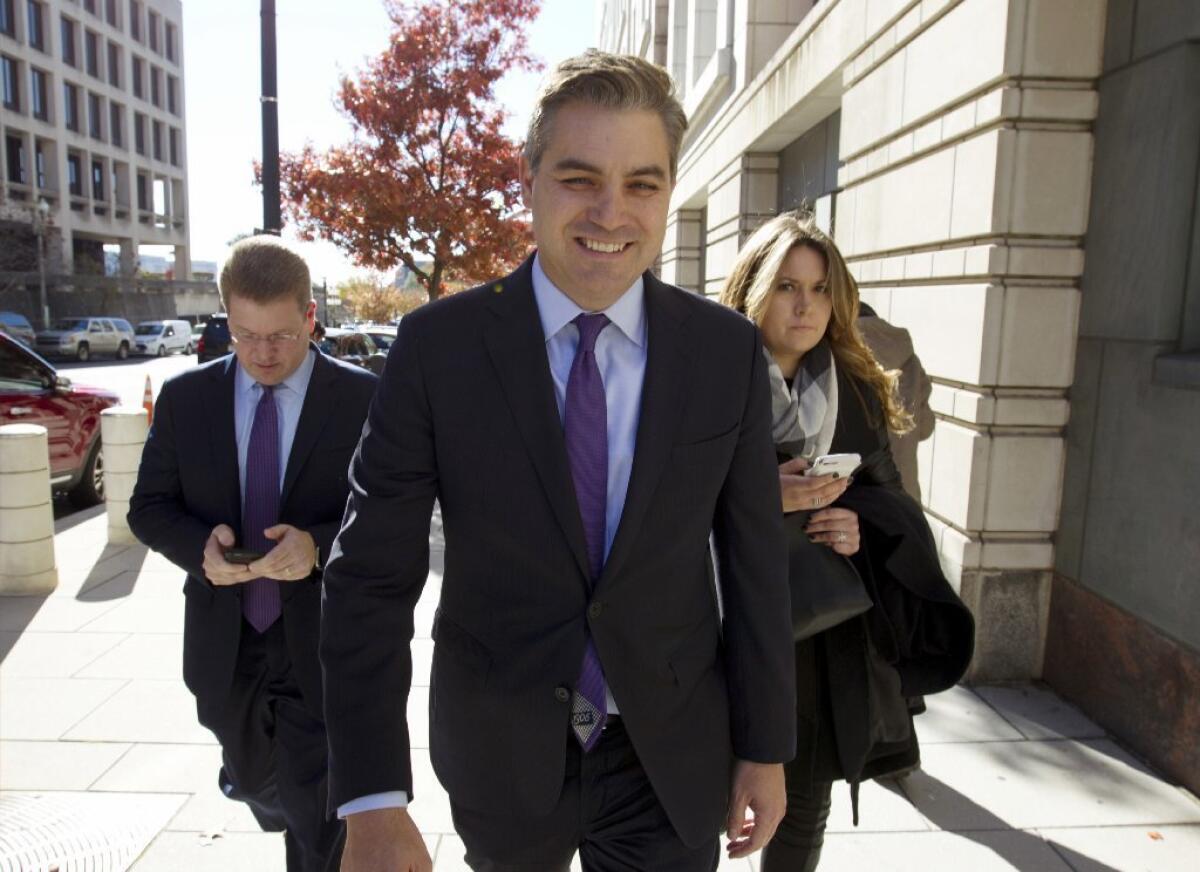
The Trump administration is putting a positive spin on a federal judge’s order that it restore the press credential of CNN’s Jim Acosta. But make no mistake: The temporary restraining order issued on Friday by U.S. District Judge Timothy J. Kelly (irony alert: a Trump appointee) is a defeat for the administration.
It should accept that defeat gracefully, and permanently restore Acosta’s “hard pass.”
Kelly’s order is a form of emergency relief, pending further action on the merits of CNN’s lawsuit. That’s why White House Press Secretary Sarah Sanders emphasized after the ruling that Acosta’s hard pass is being “temporarily” reinstated.
Sanders also made much — too much — of what she said was Kelly’s view that “there is no absolute 1st Amendment right to access to the White House.”
Actually, CNN’s 1st Amendment argument was a more nuanced one: that the decision to blackball Acosta was “a form of content- and viewpoint-based discrimination” and an act of retaliation for protected speech. And while it may not have figured in Kelly’s order, that argument can be addressed in further proceedings.
In issuing his order, Kelly focused on CNN’s other constitutional argument: that the White House violated Acosta’s due process rights under the 5th Amendment by not providing him with advance notice of the revocation or a way to challenge it. Kelly said that the way the White House decided to deprive Acosta of his credential was “so shrouded in mystery that the government could not tell me . . . who made the decision. “
Sanders said that her staff will “further develop rules and processes to ensure fair and orderly press conferences in the future. There must be decorum in the White House.” Trump echoed that call for civility in an exchange with reporters, saying: “You can’t take three questions and four questions. You can’t stand up and not sit down.”
Fair enough. It would be hard to object, for example, to a protocol that reporters surrender the microphone after one or two questions. But the White House can insist on decorum without casting Acosta or other reporters the president finds annoying into the wilderness.
Orange County is blue and Richard Nixon is rolling in his grave
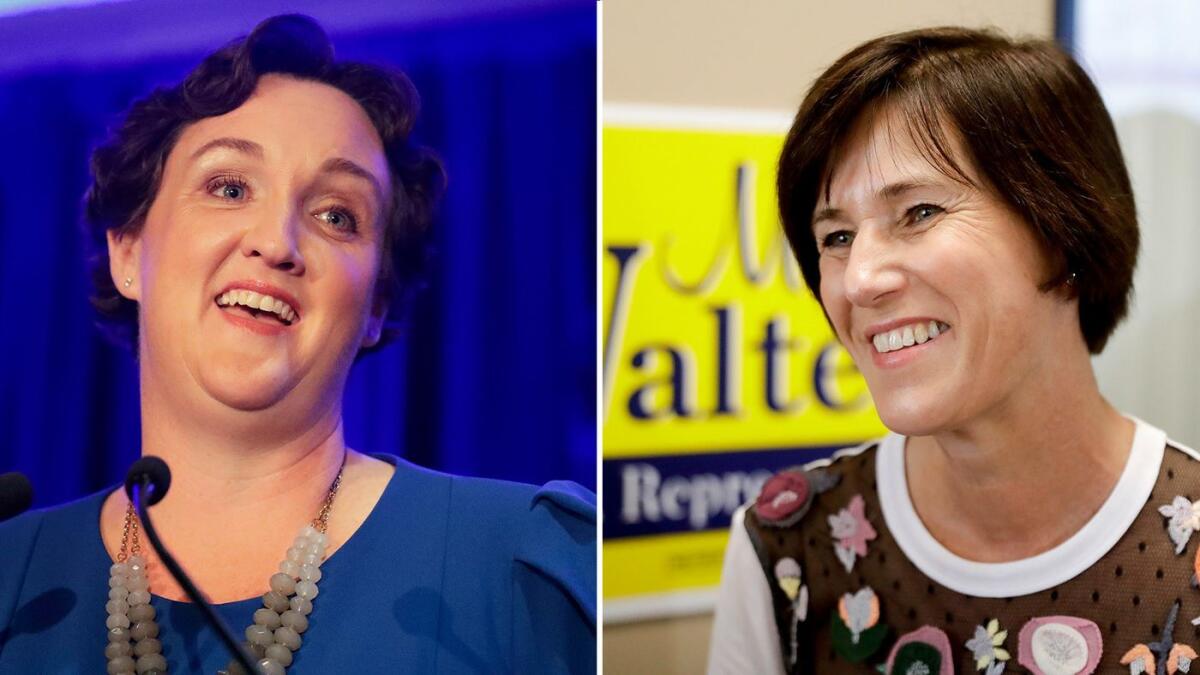
What a difference (checks calendar) eight days make.
The morning after election day, things looked grim for Orange County Democrats, who had entered the fall election full of hope and enthusiasm. Election night results showed county votes falling largely behind Republicans in the House and statewide races. Although Rep. Dana Rohrabacher of Huntington Beach, the most vulnerable of the Republican House incumbents, looked like he was headed for defeat in the coastal 48th District, Republicans were leading in other county-centric House races, and O.C. votes for statewide candidates were falling on the red side of the ledger even as Democrats were winning in the overall count.
“But wait!” activists said. “They’re still counting votes!”
And so they were, and are. As of the end of the counting day Thursday, the tide had turned.
In the 45th Congressional District, as reliably Republican as Pat Nixon’s cloth coat, incumbent Rep. Mimi Walters (R-Laguna Beach) now trails her Democratic challenger, UC Irvine law professor Katie Porter, and the math doesn’t favor a Walters recovery. The Associated Press projected Porter the victor Thursday afternoon; the official tabulation continues.
In the race to succeed Republican Ed Royce in the 39th District, which lies mostly in northern Orange County with some splash over into Los Angeles and San Bernardino counties, former Royce aide Young Kim had been edging Democrat Gil Cisneros. And though Kim still leads the O.C. vote, Cisneros has caught up enough that, combined with the votes in the neighboring counties, he has a slight lead.
Kim, parroting top Republican talking points and without offering evidence, has accused the Cisneros campaign of interfering in the count by “harassing and intimidating vote counters in Orange County. She also said her rival has earned a rebuke from the Los Angeles County registrar of voter for physical ballot tampering.” Except the registrar’s office says it did no such thing.
Walters similarly has impugned the integrity of the vote count, also without evidence. Thanks, President Trump, for injecting conspiracy-theory idiocy into the election process.
Anyway, the vote count has also turned blue for most of the statewide results in Orange County. The morning after election day, Republican gubernatorial candidate John Cox led Democrat Gavin Newsom, and other Republicans down the statewide ballot similarly were getting the love: Mark P. Meuser in the secretary of state race, and Konstantinos Roditis in the treasurer’s race.
Not so much any more. And that slight rumbling sound from Yorba Linda is Richard Nixon rolling in his grave.
Facebook was built for marketers, not users. So of course it’s being used to manipulate the public
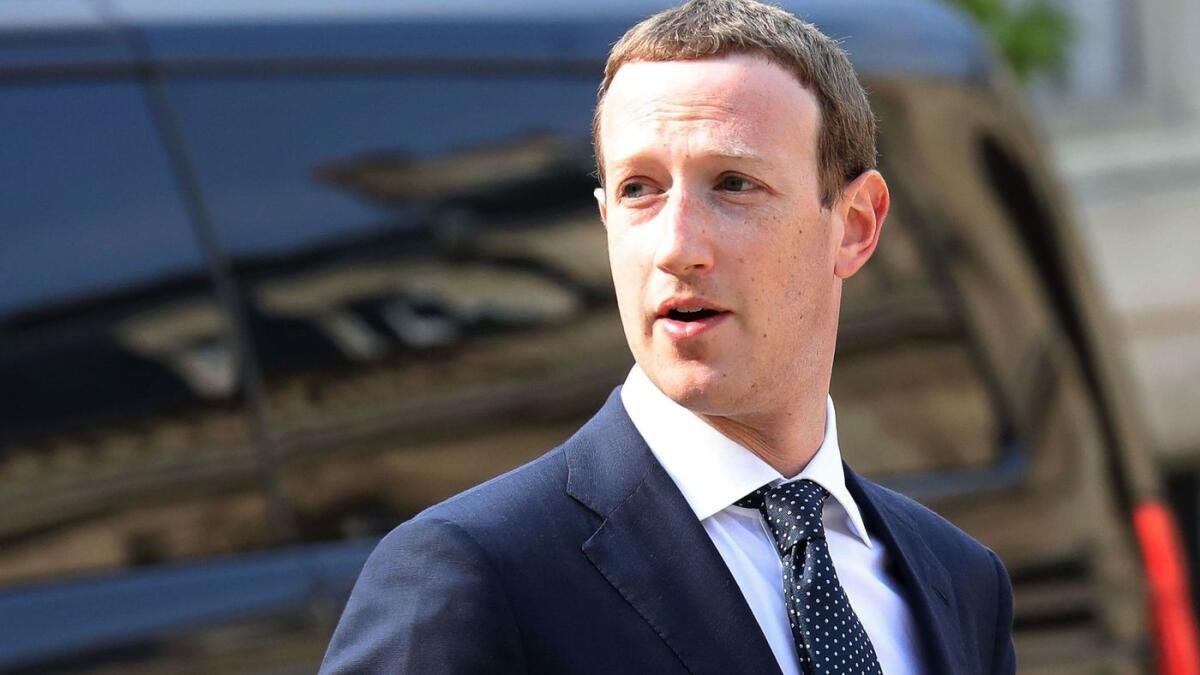
A few days after the 2016 election, I attended the Techonomy tech conference in Half Moon Bay where Facebook Chief Executive Mark Zuckerberg gave a rare interview. Reports were swirling at the time about people plying Facebook with fake news items in an effort to boost Donald Trump’s successful campaign, and Techonomy founder David Kirkpatrick asked whether Zuckerberg thought the social network had influenced the outcome. The youthful billionaire essentially laughed Kirkpatrick off:
We now know just how misguided Zuckerberg was about the uses of his company’s platform. Facebook has spent much of the Trump presidency dealing with revelations not just about fake news, but about foreign meddling in U.S. affairs and the mobilization of hate-fueled mobs around the world.
This week the New York Times triggered another wave of criticism with a lengthy investigation recounting how much effort Facebook put into denying its problems and attacking its critics. Responding to the Times’ tl;dr piece with one of his own, Zuckerberg unleashed a kajillion-word blog post outlining the steps Facebook has been and will be taking to minimize the amount of harmful content its users publish. He also dumped the right-of-center consultants who had defended the company too, umm, aggressively.
The third paragraph of Zuckerberg’s post lays out important questions about how to govern a social network with global reach and deep penetration: “What should be the limits to what people can express? What content should be distributed and what should be blocked? Who should decide these policies and make enforcement decisions? Who should hold those people accountable?”
But as important as those questions are, that paragraph ignores the whole reason Facebook exists, which is to create a compelling way for marketers — of products, services, ideas or anything else an entity with money wants to promote — to reach people who might respond to their messages. Advertisers are Facebook’s sole source of revenue; the company’s stock in trade is learning so much about its users that it can target an advertiser’s messages better than other platforms can. And in order to display more advertisements, the company tweaks the site’s core function — the distribution of users’ posts — to maximize the amount of time users spend on Facebook. The key piece of that equation is elevating content that’s popular within each user’s group of friends, and downplaying posts that are not.
In other words, Facebook is purpose built to funnel messages, particularly commercial ones, to the people most likely to respond to them. So of course it became a useful tool for people eager to manipulate the public for malign purposes. The same features that make Facebook ideal for the peddlers of goods make it ideal for the peddlers of rumors, lies and hate.
That’s why Facebook finds itself shifting uncomfortably into the mode of a content arbiter, not merely a content distributor. Zuckerberg went on at length (but not in much detail) about this effort, the most telling aspect of which was a new initiative to address content that’s objectionable even while complying with the company’s terms of service. This would be what Zuckerberg called “more sensationalist and provocative content,” which he said draws more comments and shares (“engagement”) than less red-meaty fare.
No surprise there — as we say in the newspaper biz, if it bleeds, it leads. In response, Facebook plans to use artificial intelligence to identify and downplay such items. Zuckerberg said the point was to remove the incentive to post such material; another way to look at it is an effort to make Facebook a less efficient pipeline for propagandists. Yet it won’t work unless the AI is exceptionally good at distinguishing the popular stuff that’s welcome from the popular stuff that’s not.
And even then, there remains the question of who should decide what should and shouldn’t be permitted or prioritized by the site. Free-marketers would argue that it’s a private company, so Facebook should govern itself as it wishes. If people don’t like the site’s choices, they don’t have to use it. But Republicans in Congress, who used to be free-marketers, have been suggesting that the government should have a role here because Facebook (and other big Silicon Valley companies) are not making those choices honestly, and instead are discriminating against right-of-center speakers.
Zuckerberg pledged to give users the ability to appeal when content is blocked (or not blocked), with such decisions eventually being handed over to an independent body. That could be a tremendous improvement in fairness and transparency. He also said he’d support some governmental regulations on internet companies, specifically a mandate “to report the prevalence of harmful content on their services and then work to reduce that prevalence.”
That might be helpful, although it could put Congress on a slippery slope toward regulating content online. Still, even the steps Zuckerberg outlined don’t get at the bigger and more important questions swirling around Facebook. Wrote Zuckerberg, “One of the most painful lessons I’ve learned is that when you connect two billion people, you will see all the beauty and the ugliness of humanity.” Facebook’s problem is not that it has surfaced ugliness, it’s that its network has been used to magnify it.
California has some of the toughest gun laws in the country. They clearly don’t go far enough
It may be that California has temporarily exceeded its capacity for processing tragedy, and grief, after two major fires with horrific damage and death and the mass shooting at a Thousand Oaks country dance bar. But we can’t let ourselves become overwhelmed because, unfortunately, we’re likely to endure repetitions of both.
Devastating wildfires are not one-offs here. They are part of the natural cycle, though our insistence on building communities in places we know will burn overlays the grids of civilization on wild space, adding fuel to the fires and human losses to the natural toll. My colleagues on the editorial board have written eloquently about this, so I’ll leave it alone. But we know what needs to be done to lessen our exposure to the dangers.
Similarly, we know what needs to be done to reduce our risk of getting shot and killed as we go out dancing or visit a house of worship. We need stronger gun controls so fewer people have access to fewer firearms.
California has some of the toughest gun laws in the country, yet they clearly don’t go far enough, which most of us recognize. A recent Public Policy Institute of California poll found that as tough as our laws might be, 64% of us – nearly two of three people – think the gun laws should be stricter. Only 13% think they ought to be looser.
And that tracks generally with a recent national Gallup poll, which found that 61% of people think we needed tougher gun laws, and only 8% think they ought to be less restrictive.
It’s irrational to think that massive gun buyback programs, hard-line laws covering background checks and firearms transfers, or even limits on the numbers of guns one person may own will do much to sweep firearms off the streets. There are hundreds of millions of guns out there, yet because of the lobbying influence of the National Rifle Assn., the government doesn’t know how many. Still, large amounts of them are being bought and sold illegally, stolen from cars and homes, and moved across state lines from places with loose controls to places with tighter controls.
But toughening access to firearms is necessary nonetheless. This is a long-range fight. There is no legitimate reason for civilians to own firearms designed for military purposes. There is no legitimate reason not to insist that all gun buyers pass a background check. There is no legitimate reason for putting the sporting interests of target shooters ahead of the right of the rest of us to not get shot.
Most of us know this. Most of us know that the presence of a firearm in the house increases the risks of murders by intimate partners, of accidental shootings by curious youngsters, and of impulsive suicide by the gun owner or a close relative or friend.
We just need to keep pushing.
Oceans are warming. Thankfully, not as fast as we thought two weeks ago
Well, that was unfortunate.
A study released a couple of weeks ago reporting that oceans were warming faster than previously anticipated turns out to have been off by a bit. By a large bit, in fact.
Short version: There was a problem with the math, as pointed out by a critic.
But the oceans are still warming.
This is the update that co-author Ralph Keeling posted the other day on the Scripps Institution of Oceanography website:
“I am working with my co-authors to address two problems that came to our attention since publication. These problems, related to incorrectly treating systematic errors in the O2 measurements and the use of a constant land O2:C exchange ratio of 1.1, do not invalidate the study’s methodology or the new insights into ocean biogeochemistry on which it is based. We expect the combined effect of these two corrections to have a small impact on our calculations of overall heat uptake, but with larger margins of error. We are redoing the calculations and preparing author corrections for submission to Nature.”
So, what does all that mean?
At heart, the researchers overstated the certainty of the findings. Statistics wonks can find more details here.
But even with the better-weighted certainty of the results, the cold, er, warm truth is that the atmosphere and the oceans are indeed getting hotter as a result of humans burning fossil fuels, adding heat-trapping gases to the air.
The phenomenon already is affecting climate and exacerbating extreme weather, and has helped convert our seasonal struggle here in California with wildfires into a year-round battle.
And the world is moving much too slowly to address it in meaningful ways. And focusing too much on a math error in one study misses the burning forest beyond.
If Mitch McConnell wants bipartisanship, maybe he should be the one to give it a try
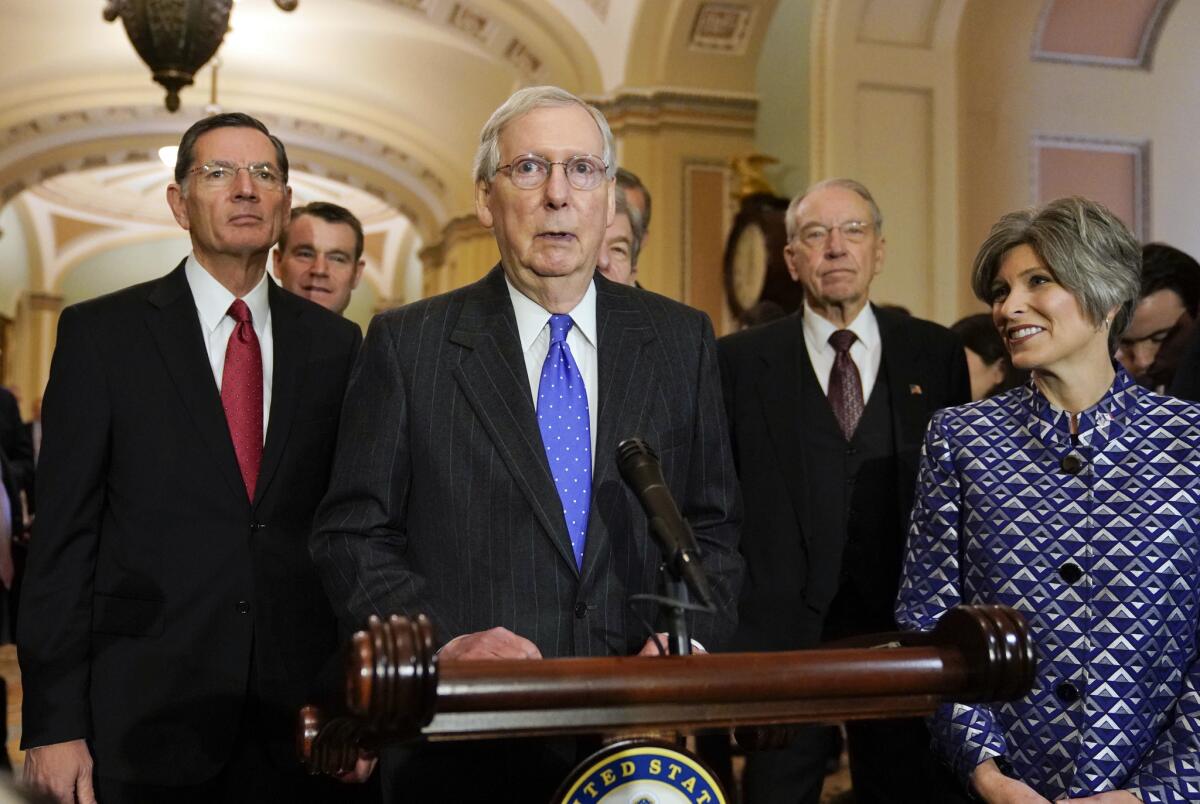
It’s too easy to mock Senate Majority Leader Mitch McConnell (R-Ky.) for writing a paean to bipartisanship … for Fox News’ website.
So I leave that task to others. Of whom there are many.
Instead, allow me to offer two critiques. First, when McConnell touted the achievements of the “unified Republican government,” he failed to mention how divisive all of those accomplishments were. So divisive, in fact, that none of the pieces of legislation he cited could have passed under ordinary Senate rules. Instead, the regulatory repeals, the tax cuts and the judicial confirmations all were made possible by procedural shortcuts that barred filibusters and deterred amendments.
Come to think of it, under McConnell’s leadership the Senate eliminated the filibuster for Supreme Court nominees, turning what had been a bipartisan exercise in advice and consent into a partisan one. (Not that Democrats have earned plaudits on that front either; it was their idea to eliminate the filibuster on lower court nominees, which set the unwelcome precedent.)
As long as the minority party has enough members to successfully filibuster, ordinary business in the Senate cannot be accomplished unless the two parties work together. That’s why Republicans and Democrats on the Senate Appropriations Committee, whose work McConnell lauded, have routinely worked collectively on the annual spending bills. Contrast that with the Budget Committee, whose annual budget resolutions are far more partisan in large part because they cannot be filibustered. (That is, when Congress bothers to pass a budget resolution, as required by law.)
My second critique is that it’s pointless for any senator to lecture the House on bipartisanship. Since seemingly forever, and certainly since former Rep. Newt Gingrich led a Republican takeover of the House in 1993, the chamber has operated under the tight grip of the majority party. Worse, it has frequently limited debate and amendments on bills under rules set by the majority, largely for the sake of blocking input from the minority (and dissident members of the majority).
Is it possible that McConnell has never heard of the Hastert rule? Disgraced former Republican Speaker Dennis Hastert of Illinois created that one in the mid-1990s, albeit just informally. It was a promise by the GOP leadership not to bring any bill to the House floor that wasn’t supported by a majority of the chamber’s Republican members. After Republicans retook control of the House in 2010, Speaker John Boehner of Ohio turned the pledge up a notch, promising not to bring any bill to the floor that couldn’t pass with Republican votes alone. He and Paul Ryan (R-Wis.), his successor, made a few exceptions, but the message was clear: No Democratic ideas welcome.
The most risible part of McConnell’s piece was when he wrote of the new House Democratic majority, “Will they choose to go it alone and simply make political points? Or will they choose to work together and actually make a difference?” Because the GOP House majority took the go-it-alone-and-make-political-points path for two entire sessions of Congress, from 2011 to 2015, while Democrats controlled the Senate.
House Democrats will certainly be pulled to the left by progressives who view centrism as a failure of political will. Yet McConnell’s caucus has its share of uncompromising legislators too, along with a Republican president who’s yet to prove himself capable of bringing divergent views together on a big issue.
There’s obviously no bipartisanship without concessions on both sides. If McConnell is willing to do his part, he should join Republican and Democratic leaders in both chambers in pushing their members to stop demonizing the other side and its ideas and start recognizing the need to find mutually acceptable paths. It’s impossible to reach consensus (or at least a reasonable amount of bipartisan buy-in) otherwise, and without that, policy whipsaws back and forth whenever majorities and administrations change — which they do in this country with startling regularity.
Of course CNN should defend Jim Acosta. But don’t pretend that he was just ‘asking questions’
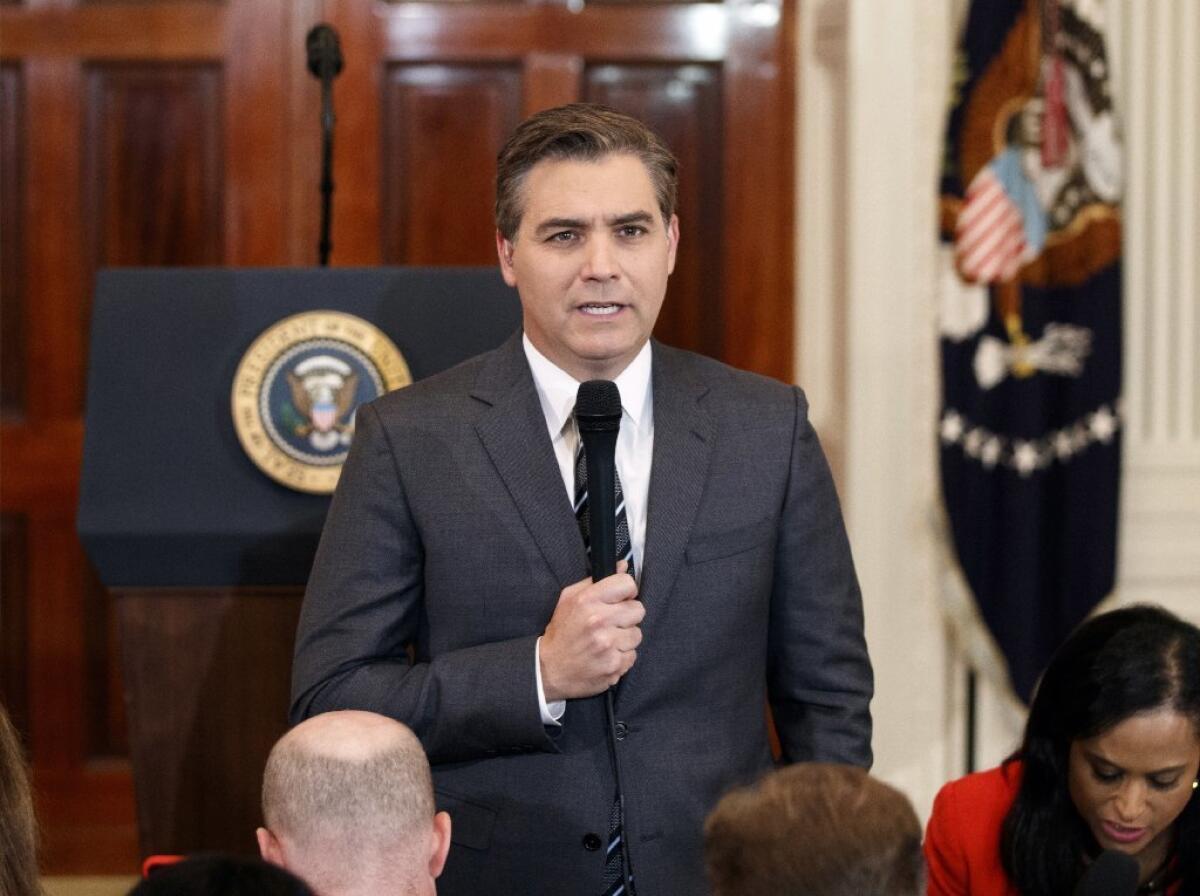
On Tuesday, CNN filed a lawsuit seeking to reverse the revocation of correspondent Jim Acosta’s White House press pass.
The complaint filed in federal court in Washington, makes a persuasive case that the administration‘s action was “the culmination of years of hostility by President Trump against CNN and Acosta based on the contents of their reporting — an unabashed attempt to censor the press and exclude reporters from the White House who challenge and dispute the president’s point of view.”
CNN is also correct in noting that the 1st Amendment has been interpreted by the Supreme Court as reflecting “a profound national commitment to the principle that debate on public issues should be uninhibited, robust, and wide-open, and that it may well include vehement, caustic, and sometimes unpleasantly sharp attacks on government and public officials.” The quotation is from the landmark 1964 libel case of New York Times vs. Sullivan.
What’s odd about CNN’s complaint is that it doesn’t acknowledge that engaging in an unpleasantly sharp attack on Trump is what Acosta was doing in the now famous Nov. 7 press conference that led to the revocation of his credentials.
The complaint says:
“Acosta asked a question about one of President Trump’s statements during the midterm campaign — namely, whether a caravan making its way to the United States from Central America constitutes ‘an invasion’ of the country, a significant feature of the President’s messaging during the just-ended campaign. The president declined to respond, instead remarking: ‘You know what? I think you should … I think you should let me run the country. You run CNN. And if you did it well, your ratings would be much better.’ “
This is misleading.
If you watch the video, you’ll discover that Acosta didn’t just ask whether the caravan constituted an invasion; he told Trump that “the caravan was not an invasion, it’s a group of migrants moving up from Central America towards the border with the U.S.” Then he asked: “Why did you characterize it as such?” Trump replied: “Because I consider it an invasion. You and I have a difference of opinion.”
Exactly. Acosta even prefaced his question by saying he wanted to “challenge you on one of the statements you made at the tail end of the campaign.”
The argument over the caravan got progressively nastier, with Acosta reminding Trump that the migrants were “hundreds and hundreds of miles away.” Then Acosta tried to ask a question about the Russia investigation, Trump told him, “That’s enough,” asked him to put down the microphone and called him a “rude, terrible person.” (Yes, it was an unpresidential comment.)
If you read the complaint closely, you’ll see that it does assert that Acosta and CNN are being punished for the “content and viewpoint” of their reporting. But the abiding impression is that Acosta was just asking questions.
To note that he in fact was debating the president doesn’t justify the yanking of his credentials or the White House’s suspiciously shifting explanations for that sanction. (The original explanation was that Acosta had manhandled an intern who tried to take the microphone from him; on Tuesday, Press Secretary Sarah Huckabee Sanders said the problem was that Acosta had “inappropriately refused to yield to other reporters.”)
Acosta isn’t unique in grandstanding at a presidential news conference. In 1974, after CBS’ Dan Rather received some applause when he stood up, President Nixon asked him: “Are you running for something?” Rather shot back: “No sir, Mr. President. Are you?”
Then and now, challenging the president shouldn’t be grounds for losing your credentials. But we shouldn’t pretend that Acosta was just “asking questions.”
Who should police Jim Acosta and the White House press corps? Definitely not the president
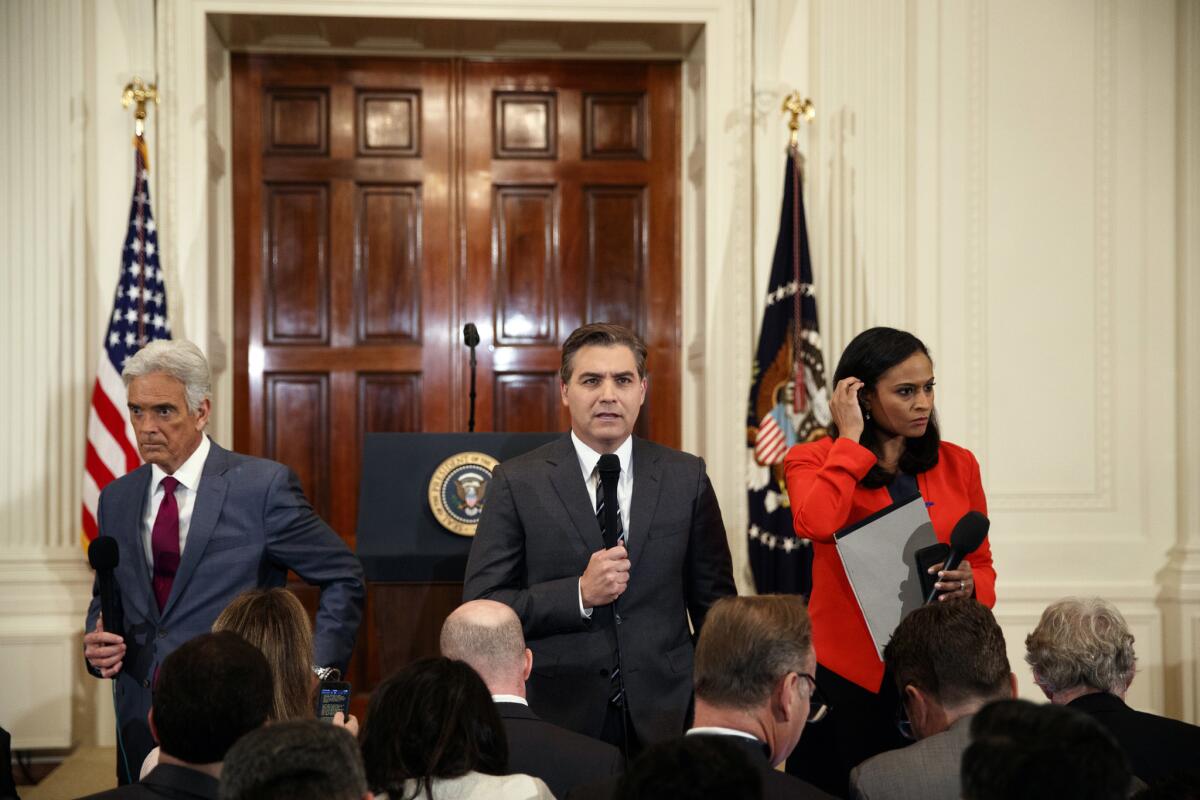
When the Trump administration yanked the White House press pass held by CNN’s Jim Acosta last week, Press Secretary Sarah Huckabee Sanders practically accused him of manhandling a female White House intern. On Tuesday, Sanders took a different tack, accusing him of manhandling the microphone he shares with dozens of other reporters in the White House press corps.
Responding to the lawsuit CNN filed against the suspension of Acosta’s press pass, Sanders said, “After Mr. Acosta asked the President two questions — each of which the President answered — he physically refused to surrender a White House microphone to an intern, so that other reporters might ask their questions.”
So much for the Acosta karate chop.
Sanders went on to argue that Acosta has been an unprofessional mic hog before, and that the constitutionally protected free press isn’t served when one reporter “attempts to monopolize the floor.” She concluded, “If there is no check on this type of behavior it impedes the ability of the President, the White House staff, and members of the media to conduct business.”
Amen, sister. There’s nothing worse than a reporter who is so inconsiderate of other journalists, he or she acts as if there’s no one else in the room with questions to ask and stories to write. I suspect that at least some of the other reporters at the press conference were secretly rooting for the intern in that struggle over the microphone.
That’s a far better argument than the one Sanders led with last week (although she did include a reference to it in her first statement, saying, “It is also completely disrespectful to the reporter’s colleagues not to allow them an opportunity to ask a question.”). It would still be a bad argument, however.
As someone who used to hold one of those coveted White House passes, the last thing I want is for the president — any president — to use a reporter’s apparent boorishness as an excuse to bounce him or her from the building.
First, it’s overkill. The White House already exerts a tremendous amount of control over reporters’ access to sources, which are the lifeblood of timely and accurate stories. (The Obama administration, for example, was notably antagonistic toward Fox News reporters.) It goes beyond the power to decide which reporters get called on to ask questions at press conferences. It’s deciding whose calls get returned, who gets briefed in advance, who benefits from strategic leaks, who stays one or more steps ahead of the pack.
Second, the process of obtaining a White House pass is designed to let journalists, not government officials, control eligibility. The main limits imposed by the White House are the security screenings it does to identify reporters who might pose security threats, and the locations it chooses for press briefings, which restrict the number of people who can attend.
If the president weeds out reporters he (or, someday, she) doesn’t like, that’s not respecting the 1st Amendment values Sanders claims the administration is championing. It’s hand-picking the people who get to report on the administration from a front-row seat.
If Trump doesn’t like the way Acosta asks questions, he doesn’t have to call on him. And if Acosta’s colleagues in the White House press corps believe he’s sucking all the oxygen out of the room — and they don’t seem to — they can lean on him privately to stop it. They have a trade association, after all; for the record, it issued a statement Tuesday supporting the goal of CNN’s lawsuit.
Americans are so stubbornly inactive, public health advocates are getting desperate

Public heath advocates appear to be getting desperate over the state of Americans’ inactivity.
The U.S. Department of Health and Human Services on Monday released a new set of physical activity guidelines and they are...ah...interesting. Instead of prescribing the standard block of sustained physical activity — previously at least 10 minutes at a time — the government is now urging Americans to, you know, move around more during the day and sit less.
The reasoning is that any activity is better than none for people who spend most of their lives sitting down — in a car, on the train, in front of a computer, eating meals, watching television or surfing the internet — then they should do what they can to take breaks from the reclined life.
The guidelines continue to stress good old aerobic activity (150 minutes a week at least for adults) but say that all activity, even in short bursts, can count toward that goal.
But the reality is that the vast majority of people don’t get the currently recommended dose of exercise and these new “move around when you can” recommendations seem to be a resigned recognition by health officials Americans are spending too much time on their butts and that any exercise is better than none.
So, excuse me while I take a break and stroll over to the kitchen for a post-breakfast snack.
Kirstjen Nielsen watch: How long before Trump bounces her from Homeland Security?
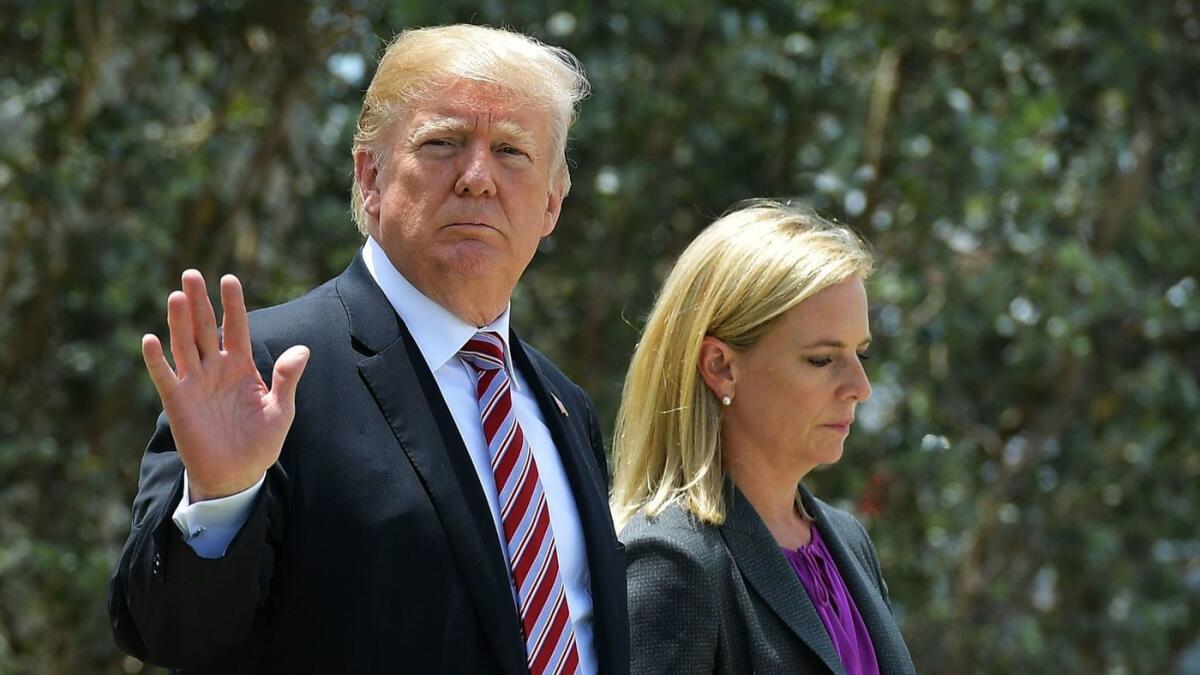
When we last dropped in on the soap opera that is the White House — call it “As the Trump Turns” — I speculated that President Trump would start axing top officials shortly after the election. I had the scandal-scarred Interior Secretary Ryan Zinke as the likeliest to go first, with Atty. Gen. Jeff Sessions probably second.
Sigh. Sessions went first, Zinke is still on the job, and now it looks like Homeland Security Secretary Kirstjen Nielsen may be the next to go. I had her at third on the list (with an asterisk for Sessions’ deputy, Rod Rosenstein, once Sessions left) so if this worked like March Madness, well, my bracket would be so busted.
Nielsen’s shortcomings in the eyes of her boss: She hasn’t been able to stop Central Americans from showing up at the United States’ southern border and requesting asylum. Trump’s displeasure boiled over in a Cabinet meeting in May, prompting news reports that Nielsen nearly quit then, though she and other top administration officials denied she had threatened to quit.
Note that Trump has never been particularly keen on Nielsen — he hired her at the urging of John Kelly, his chief of staff, for whom Nielsen had worked at Homeland Security. It didn’t matter that she had zero top management experience, and as Homeland Security secretary she has enacted policies seemingly drafted by the immigration hard-liners in the White House.
That includes moving to end temporary protected status for hundreds of thousands of people from Sudan, Nicaragua, Haiti and El Salvador who had been in the U.S. when crises in their home countries (hurricanes, earthquakes and war) made it too dangerous for them to go back there. Last month, though, a federal judge ordered the status be maintained while a lawsuit proceeded that accused the government of making a political decision to end the temporary protection, rather than making a fact-based decision that conditions had improved in the home countries.
Just the sort of behavior we’ve come to expect from this White House.
Anyway, if the reports are true, Nielsen will be the next to be tossed overboard/abandon ship. And that could cause even more chaos, since this dysfunctional White House never got around to appointing a deputy to work under Nielsen.
So unless Trump or his anti-immigration Svengali Stephen Miller have an interim appointee in mind, responsibility for running the department will fall to Claire M. Grady, undersecretary for management (and acting deputy secretary), whose expertise lies in budgeting, procurement and other management duties, not policy development and implementation, nor, for that matter, the care and feeding of Trump’s ego.
Of the nine Cabinet-level appointees, four have gone or announced they are leaving.
I’ve noted before that all presidents shuffle their top positions over the course of a term, but this administration has created and endured chaos like none other in recent memory. As a reminder, Trump was sworn in Jan. 20, 2017, just 22 months ago. Since then, at least 55 top administrators or White House officials have left, announced their departure or been fired – in the case of Anthony Scaramucci after only 10 days as White House communications director.
That includes five of the 15 Cabinet members – Sessions, Secretary of State Rex Tillerson, Veterans Affairs Secretary David Shulkin (whose first successor, Dr. Ronny L. Jackson, withdrew from consideration after revelations of his behavior as physician to the president), Health and Human Services Secretary Tom Price, and Homeland Security director John Kelly (to become Trump’s chief of staff).
Of the nine Cabinet-level appointees, four have gone or announced they are leaving – United Nations Ambassador Nikki Haley; Environmental Protection Agency director Scott Pruitt; Chief of Staff Reince Priebus; and Central Intelligence Director Mike Pompeo (to become secretary of State).
So for those keeping score at home, that’s nine of the 24 Cabinet or Cabinet-level positions — 38% of Trump’s upper tier of appointees — gone within two years, with more departures looming.
Given the way Trump treats many of his top appointees, and the infamous levels of backbiting and fiefdom-fighting, you have to wonder why anyone would take a job in that poisoned well in the first place.
The new Democratic House will inherit an absolute mess of a federal budget
When Democrats take over the House of Representatives next year, they will most likely inherit a strong economy. That’s a good thing, given how messed up the federal budget is.
The federal deficit hit $779 billion in the fiscal year that ended Sept. 30, amounting to almost 4% of the U.S. economy. Although the budget gap isn’t nearly as large as it was in the depths of the last recession, it’s alarming to watch the red ink deepen at a time when the economy expands steadily.
The enormous tax cut Republicans approved in 2013 is partly to blame for that problem; it reduced tax revenues as a share of gross domestic product to 16.4%, while federal spending remained a little above 20% of GDP. And as the Committee for a Responsible Federal Budget pointed out, the tax cut didn’t cause a surge in federal receipts, as its supporters promised it would. Instead, the CFRB calculated, the change translated into a loss of 3.6% to 4.7% — and a more than 5% reduction in what the feds had been projected to take in prior to the tax cut.
A budget gap this large probably can’t be closed without some kind of boost in tax rates or collections. And if tax revenues were the only problem, the solution might very well be giving Democrats control over the tax-writing chamber of Congress.
But another big contributor to annual deficits is the projected growth in spending on healthcare programs, which presents a real challenge to the party that views itself as the last line of defense against benefit cuts.
The chart above, taken from the CBO’s latest long-term budget projections, shows how federal spending is expected to accelerate faster than revenues can keep up. While discretionary spending is expected to shrink, three other major budget categories are projected to grow, and grow rapidly: Social Security benefits, because of the rising number of retirees and the increasing size of benefits; Medicare, Medicaid, Obamacare insurance subsidies and the Children’s Health Insurance Program, in part because of a growing population of Medicare beneficiaries but in larger part because of higher treatment costs; and interest payments on the federal debt, mainly because the debt is growing.
The solution to larger debt payments is to pay down debt, which can’t happen until the budget gap is closed. And the gap won’t close unless Congress finds a way to slow the growth in healthcare spending.
Some readers might say Democrats have a solution to that too: Single payer! But (ahem!) Medicare, CHIP and Medicaid are already single-payer programs. And even when it comes to private insurance, it’s not clear that simply switching to single payer would slow the growth of treatment costs.
Instead, the challenge is multifaceted, starting with the higher amounts that Americans pay for medical services, devices and drugs. Then there’s the comparatively high incidence of costly chronic diseases, particularly those associated with obesity. One more factor is the continual development of new technologies and custom therapies that keep people alive longer — a great thing for humanity, but a bad thing for the federal budget.
Dealing with healthcare costs was never going to be easy, and Republicans made it that much harder by driving up the deficit — the exact opposite of what they should have been doing after the U.S. economy got back on its feet. Nevertheless, here we are. If Democrats want to be the party of fiscal responsibility, they have to do more than restore tax rates on high-income Americans to where they used to be before the GOP tax cuts. They have to try to tackle healthcare costs.
Trump can’t figure out a lawful solution to deal with asylum seekers. That isn’t stopping him
There are two fundamental problems with President Trump’s latest attempt to throttle back the number of people — and particularly the number of Central Americans — trying to seek refuge in the U.S. In a proclamation issued Friday morning, Trump declared that asylum-seekers who crossed the border without permission — for example, by fording the Rio Grande instead of coming through an official point of entry — would be ineligible for consideration.
First, to shut the door to the desperate violates basic human decency and international norms of how asylum-seekers should be treated. Second, it is probably illegal, despite the contortions government lawyers have gone through to give it the veneer of lawfulness.
The government’s argument is that crossing the border without permission is illegal, and that is true as far as it goes. People caught crossing the border without permission can be charged with a misdemeanor and deported. If they are convicted and they get caught crossing without permission a second time, they can be charged with a felony.
But that doesn’t seem to apply to asylum-seekers. U.S. law (8 U.S. Code § 1158) clearly stakes out where and how people may seek asylum:
“Any alien who is physically present in the United States or who arrives in the United States (whether or not at a designated port of arrival and including an alien who is brought to the United States after having been interdicted in international or United States waters), irrespective of such alien’s status, may apply for asylum in accordance with this section or, where applicable, section 1225(b) of this title” (emphasis added).
The administration already faces one lawsuit from Central American asylum-seekers who argue that deploying the military to the border to preclude people from entering denies asylum-seekers due process to have their claim submitted and considered.
The new policy will draw legal challenges as well.
“U.S. law specifically allows individuals to apply for asylum whether or not they are at a port of entry,” said Omar Jadwat, director of the ACLU’s Immigrants’ Rights Project. “It is illegal to circumvent that by agency or presidential decree.”
The president’s proclamation doesn’t lay a persuasive legal foundation, but instead makes a political and administrative argument. Immigration law does give the president wide latitude in setting immigration policy, but the law he cites that grants authority to deny entry to people from a specific nation doesn’t seem to apply here.
The argument Trump lays out does not contend that the U.S. is being threatened by the nations from which the asylum-seekers are coming; instead, it says the threat is in how the asylum-seekers will arrive and ask for protection. In essence, the president says there are just too many applications to process and, besides, most of them won’t qualify, so they have to stay in Mexico and apply at the ports of entry, where a significant backup of folks seeking asylum has already amassed.
“The arrival of large numbers of aliens will contribute to the overloading of our immigration and asylum system and to the release of thousands of aliens into the interior of the United States,” the president wrote in his proclamation, then later: “The great number of aliens who cross unlawfully into the United States through the southern border consumes tremendous resources as the Government seeks to surveil, apprehend, screen, process, and detain them.”
That’s not likely to go far in court.
The solution here lies in expanding the capacity of the immigration court system to handle the demand it faces. And a few thousand more asylum-seekers won’t make much difference to a system that already has nearly 1.1 million deportation cases pending.
So the president once again is showing that neither he nor his top advisors have the capacity to figure out a lawful solution to a problem. People have the right under the law to ask for asylum and, if they present a credible fear that they will be persecuted or harmed over their political beliefs, faith or membership in an oppressed class of people, be granted a chance to make the case before an immigration judge.
The president can’t just say that law doesn’t exist. He also can’t suspend it or ignore it for the sake of his own political and administrative expediency.
Further, it’s remarkable that a president and an administration that places such a high priority on fighting illegal immigration has not, after 22 months in office, put forward or worked with Congress to draft comprehensive immigration reform.
If our partisan Supreme Court terrifies you, fixed terms for justices is a safer bet than than #RibsForRuth
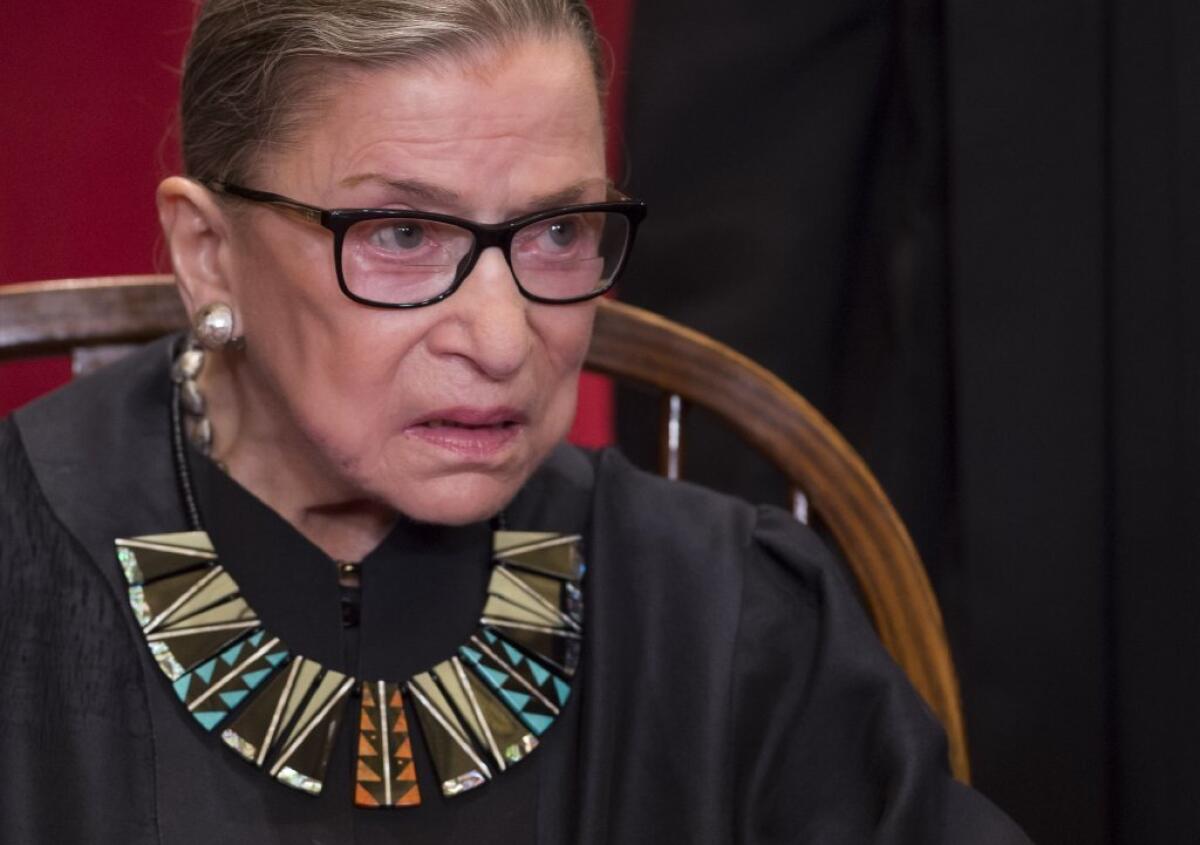
When the Supreme Court announced Thursday that Justice Ruth Bader Ginsburg had fractured three ribs in a fall at her office, there was predictable anxiety among her admirers, not only for her personal well-being but also for the future ideological composition of the court.
On Twitter, some admirers offered to donate ribs to the 85-year-old justice (#RibsForRuth).
But one well-wisher on Twitter added that Ginsburg “absolutely should have retired under Obama.”
This isn’t a new criticism. As Jonathan Turley observed in a column in the Hill last year, Ginsburg “ignored increasing calls for her retirement during the Obama administration to avoid the prospect of the flipping of her seat from a liberal to a conservative member.”
Some of the calls for her resignation came early in Obama’s tenure. In April 2011, Harvard law professor Randall Kennedy wrote in the New Republic that not only Ginsburg but fellow Bill Clinton appointee Justice Stephen G. Breyer “should soon retire” to protect their judicial legacies.
In the same article, Kennedy prophetically suggested that “Justice Antonin Scalia would be especially loath to retire during [Barack] Obama’s presidency.” Of course, Scalia did leave the bench in 2016 when he died, but Senate Republicans prevented Obama from replacing him with Judge Merrick Garland. The Scalia seat eventually went to Neil M. Gorsuch, nominated last year by President Trump.
Whether Ginsburg was right or wrong to remain on the court through the Obama administration, it was entirely her call because justices can serve for life.
But some reformers suggest that justices instead should be appointed to fixed terms. The group Fix the Court proposes single, staggered terms of 18 years, which seems long enough to safeguard judicial independence.
Fixed terms would discourage justices from gaming the timing of their retirements. Of course, a justice could decide to retire before the expiration of his or her term in order to influence the appointment of a successor. But fixed terms would prevent a justice from clinging to office indefinitely, perhaps past the point of impairment because of advanced age.
Fixed terms would have the additional advantage, proponents say, of lowering the political stakes of any single appointment to the court.
But doesn’t the Constitution say that Supreme Court justices should serve for life? Life tenure is certainly implied by language in Article III saying that “judges, both of the supreme and inferior courts, shall hold their offices during good behavior.”
The question is whether the lifetime “office” of a Supreme Court justice is membership on that court or status as a federal judge. Under current law, a justice who retires remains a federal judicial officer and can sit on federal appeals courts. Arguably Congress could provide by statute for a fixed term for service on the Supreme Court, after which a justice would have the status of an appeals court judge. (The proposal endorsed by Fix the Court would have retired justices serve as “senior justices.” In addition to sitting on lower courts, they could step in when the Supreme Court had a vacancy or a justice was recused.)
The opposing view is that, because the Supreme Court is the only federal court mandated by the Constitution, limiting the service of justices would require a constitutional amendment.
But put aside the question of how fixed terms for justices might be established. Would they be a good idea? Given the dysfunction of the current Supreme Court confirmation process, it’s worth discussing.
Trump loses — again — on DACA. Democrats should hit him with a humane immigration bill
President Trump just lost another one in the courts, with a three-member panel of the 9th Circuit Court of Appeals rejecting the administration’s request to lift a nationwide injunction against his rescinding the Deferred Action for Childhood Arrivals program.
Get ready for a tweetstorm.
The decision was essentially an incremental step in the legal fight over the Obama-era DACA program, which grants protections and work permits to some 700,000 people living here illegally after having arrived as children. Obama crafted the policy after Congress failed to pass the Dream Act, which would have offered a reprieve from deportation and a path to citizenship for people who have been raised and educated as Americans, and whose arrival here was no fault of their own.
Granting relief to the so-called Dreamers (after the failed Dream Act, which passed the House in 2010 but received only 55 of the 60 Senate votes necessary to bring it to the floor) is widely popular with voters. But the congressional conservatives — including some Democrats — have been able to bottle it up. DACA status does not grant a path to citizenship, but it grants a renewable two-year deferral from deportation and a work permit.
Of course, such a good idea can’t last under Trump, who in September 2017 ordered the program rescinded, arguing a president does not have the authority under immigration laws to do what Obama had done. It’s an odd argument, a sitting president asking the courts to rule that he has less power than his predecessor had exercised, but that’s how Trump framed it. I suspect his decision had more to do with unrolling an Obama program than with any thought-out analysis of the limits of executive power.
But Trump also said he felt for the Dreamers’ predicament and wanted to do something good for them, and told Congress to fix the problem he created by ending the deferrals. Congress, of course, did not rise to the challenge, though in truth Trump sabotaged chances of advancing a bill by linking it to funding for his silly wall.
DACA recipients and others affected by the rescission – including California – sued and won a nationwide injunction after lower courts ruled that they were likely to succeed in their challenge that rescinding DACA was an arbitrary and capricious act by the administration.
So here we are, the injunction still in place, the legal challenge proceeding, and the DACA recipients still in limbo.
Which brings up an idea for the incoming Democratic majority in the House. Call the president’s bluff and as soon as you convene, pass a humane and pragmatic bill granting legal status and a path to citizenship for Dreamers who meet the general requirements, including a record clean of serious crimes. And then work with Trump to get it through the Senate.
It may not fly, but starting off the session by passing a popular measure might signal that the political class can actually get something done that is in the nation’s interest, rather than sitting around grinding axes.
A Thousand Oaks bar is the latest battlefield in our war on ourselves
Numb. That’s the only word for it. California awoke this morning to reports of another mass shooting, this time in Thousand Oaks, a suburban community that prides itself on being among the safest cities in America. More than 100 people, many of them college kids, were in the Borderline Bar & Grill country dance bar when a man dressed in black walked in with some sort of smoke-generating device and opened fire with a .45-caliber Glock handgun, killing 11 people inside and Ventura County Sheriff’s Sgt. Ron Helus, one of the first law-enforcement officers to arrive, before dying of a gunshot himself.
Motive? Too soon to say. Was the gun bought legally? Again, that’s the kind of detail that will filter out in the coming hours and days. Preventable? That answer ranges from apparently not to who the hell knows?
Numb. The Gun Violence Archive reports that gunmen have shot and killed 26 people, including the Thousand Oaks victims, in California alone over just the last three days. Since the first of the year, gunmen nationwide have taken the lives of 133 people in 22 mass killings, defined as incidents in which at least four people are killed. No place seems safe. In recent years Americans have been gunned down en masse in schools and houses of worship, music venues and in their own homes. The shooters have been motivated by racism, by rage over politics, by mental illness; in some cases, their reasons remain inscrutable.
Don’t placate women with talk of us ‘sweeping Congress.’ We’re not satisfied with your crumbs
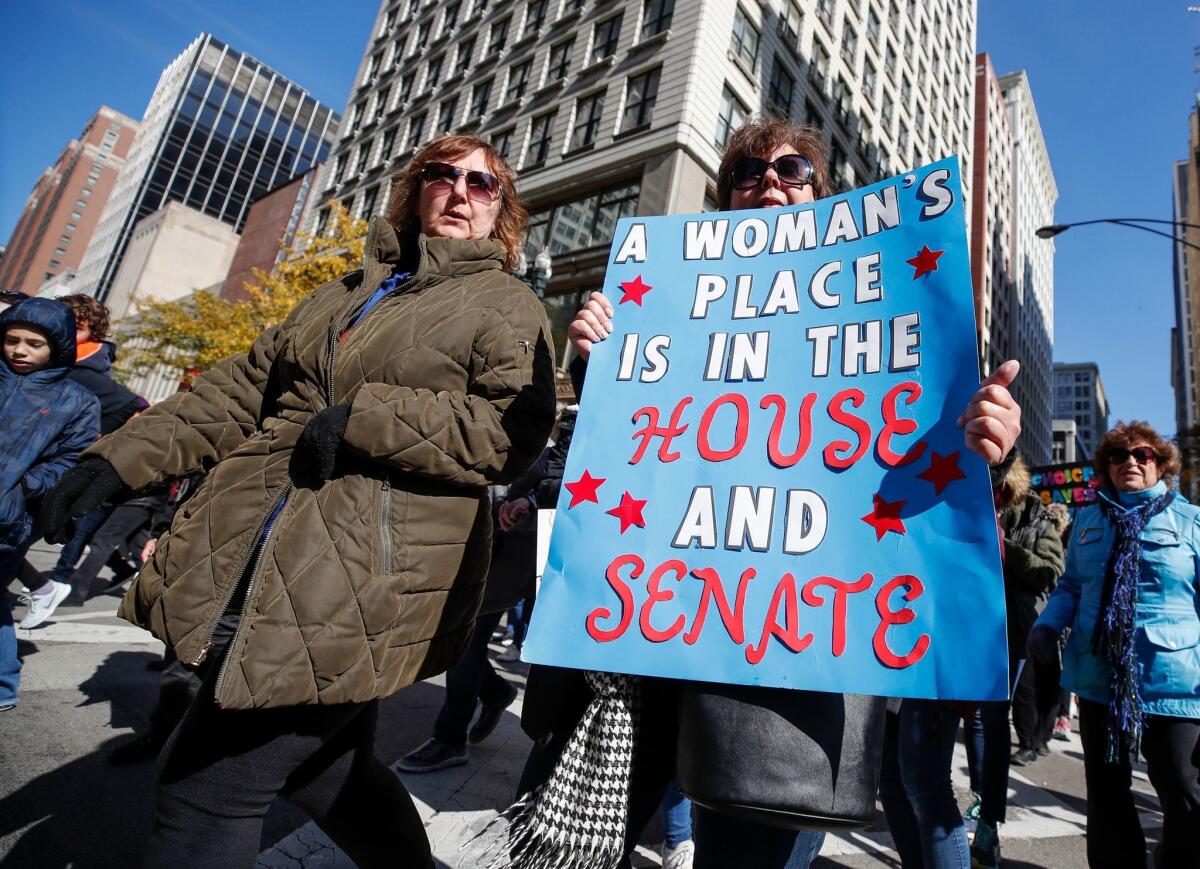
Pundits labeled 2018 the second “Year of the Woman,” a nod to the historic number of women that ran for office Tuesday. The first “Year of the Woman,” of course, was 1992, when Anita Hill was humiliated and ignored and five whole women were elected to the 100-person Senate. Twenty-six years later, the headlines are similarly rapturous. We elected more than 115 women, breaking a zillion records!
We owe these female candidates — and those who organized on their behalf — a debt of gratitude for expanding our vision, often at great personal risk.
But I’m not exactly running down the streets singing the “Star-Spangled Banner.” Since I simply cannot resist ruining a happy moment, dozens of women dotted across the country does not a revolution make. At press time, women had won 22% of the House seats, 12% of the Senate seats and 9% of the gubernatorial seats. We continue to make up 51% of the population.
The crumbs from your table are delicious. We gals are touched to have been allowed to eat them. Thank you, America!
Progress comes slowly, this we know. But this whole “women sweep Congress by gaining a proportionately tiny amount of power” narrative is suspect. Don’t try to placate us, bros. We’re coming for our rightful percentages. You are not safe.
When it comes to elections, the new Orange County looks a lot like the old Orange County
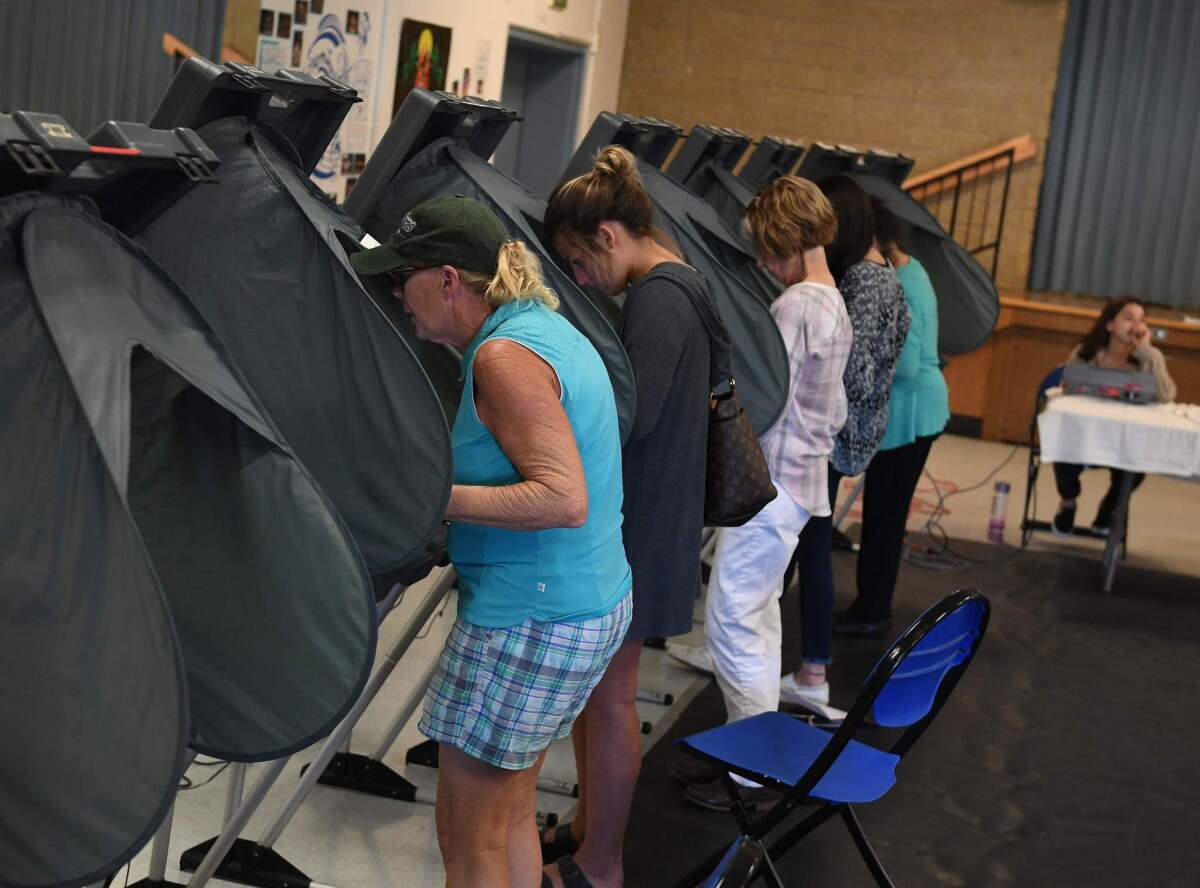
For all the recent talk about the demographic and political shifts underway in Orange County, Tuesday was a snap back to reality. Yes, Democrats have made strides, but Republicans still dominated election day.
While it looks like Rep. Dana Rohrabacher (R-Huntington Beach) may have lost his seat after three decades and a Democrat will replace Rep. Darrell Issa (R-Vista) in a district that spans Orange and San Diego counties, Republicans either held onto or won open seats that Democrats had hoped to take, including Mimi Walters (R-Laguna Beach) winning reelection and Young Kim taking the open seat currently held by Rep. Ed Royce (R-Fullerton).
And in statewide races, Orange County voters backed Republicans exclusively when they had the chance. John Cox carried the county in the governor’s race, 53.5% to 46.5% for Democrat (and now, Governor-elect) Gavin Newsom. The county also backed Republican Mark P. Meuser over statewide winner and Democratic incumbent Alex Padilla, 51.6% to 48.4%, in the race for secretary of state, and Republican and Anaheim businessman Konstantinos Roditis over incumbent Democrat Betty Yee for treasurer by a 50.7% to 49.3% vote.
The county has about 18,000 more registered Republicans than Democrats, and no-party preference is the third-largest group of registered voters. But those independent voters tend not to be all that independent, generally gravitating more toward one party than the other.
With Orange County’s history of conservative politics, it shouldn’t surprise that Republicans still held the edge on election day.
But it’s also inarguable that the county is changing, and relatively quickly. Non-Latino whites, who historically drove county-level politics, now account for about 42% of the population, down from 51.3% in the 2000 census. Much of the growth in diversity has come among the Asian and Latino communities.
And while the Democrats have maintained their proportion of the county electorate — registration since 1999 rose fewer than 2 points to 33.6% — the Republicans have been in a slow-motion collapse, dropping 14 points to 35.6% of registered voters.
Although the Republican Party backs the angry divisive politics of President Trump, it’s hard to see the president doing much to change the electoral fortunes of Orange County Republicans in the future. Democrats didn’t get what they wanted out of Orange County on Tuesday, but it seems like it might just be a matter of time — and continuing shifts in demographics — before they do.
With the House in their pocket, Democrats need to ignore the Trump noise machine and get things done
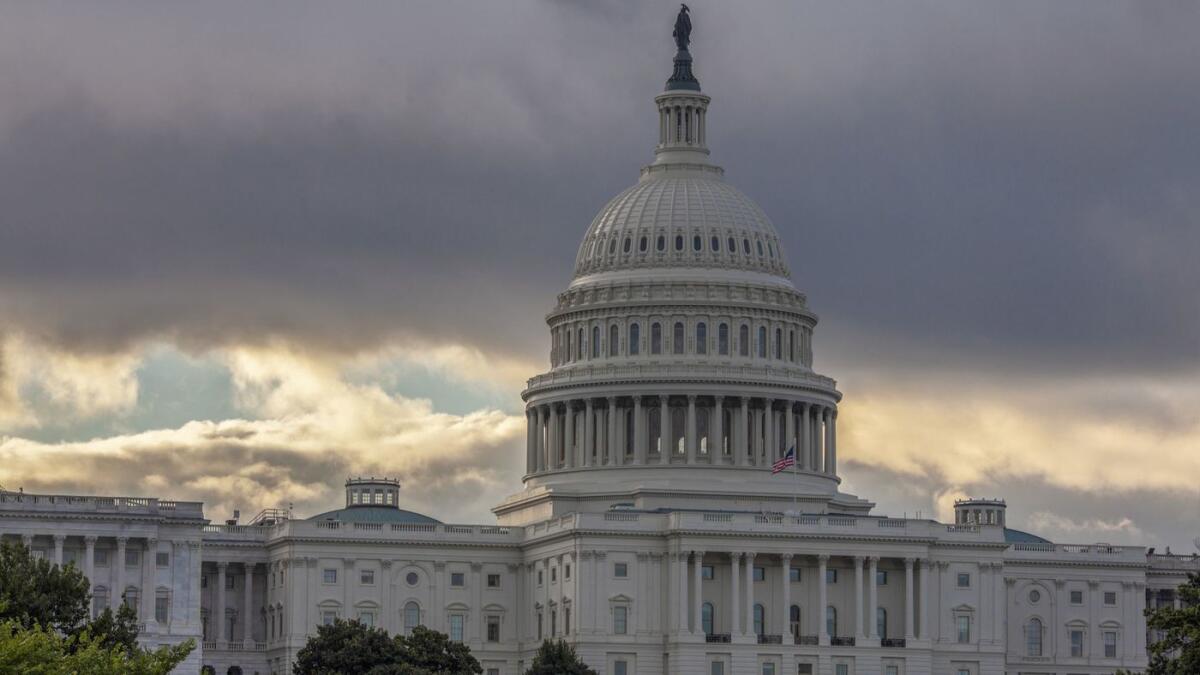
In the end Tuesday’s election results went about as expected, though not nearly as well for the Democrats as they had hoped. The took back control of the House, yes, but by a slim margin, and lost a couple more seats in the Senate. As waves go, well, it wasn’t exactly good for surfing.
So what now? The Democrats are in a position to effect change, but not necessarily in the manner they had hoped. With a split Congress, voters can expect little to get accomplished on significant issues. Immigration reform? Stalled. Repealing or adding tax cuts? Nothing doing. Changes to the Affordable Care Act? No prescriptions available.
So what can the House Democrats do now? Well, they can block whatever cockamamie ideas come out of the White House and President Trump’s acolytes across the aisle, but even with the GOP in control of Congress very little was getting done. In short, a dysfunctional Congress in which the nation’s business gets sidetracked by partisan intransigence will stay pretty much the same.
What the Democrats can do is hold hearings with some teeth, thanks to their newfound subpoena power. And if the Democrats decide to completely blow it — what are the odds? — they will embark on a whirling attack of investigations into all Trump transgressions, minor to major.
They shouldn’t. They need to separate dislike for inane White House policy positions from the true outrages and focus only on the things that matter. Rep. Adam Schiff (D-Burbank), if he becomes chairman of the House Intelligence Committee (which seems probable), can and should revive the committee’s investigation into Trump’s dealings with Russia, an investigation that under Rep. Devin Nunes (R-Tulare) was more of a coverup than a check on the executive branch.
Anticipating tougher congressional oversight, Trump took to Twitter Wednesday morning to preemptively threaten the Democrats.
The Democrats should shrug that off and call on the carpet top administration officials accused of misuse of tax dollars, hold oversight hearings on the dismantling of environmental regulations, and review the administration’s actions in immigration enforcement, from maintaining the world’s largest immigrant detention system (built under both parties) to apparent violations of migrants’ right to seek asylum at the border. And the Republicans should join them in reasserting the separation of powers and providing true oversight of the executive branch.
What the Democrats should not do, though, is use their new power to harass the White House, or to pursue petty grievances against the administration.
The Democrats have no more credibility with the nation than do the Republicans. In this era of team politics — approval/disapproval ratings are predetermined by party — most voters have a low opinion of Congress no matter who controls it. Years of showboating and stasis have soured Americans on the institution that is most supposed to be their voice in Washington.
And Tuesday’s results reinforced the reality that we are a deeply divided electorate. As a society, we’re in a dangerous place in which we can’t even agree on facts, let alone truth. We have split, or let ourselves be manipulated into divisions, based on race and gender, economic status, faith, and where we live. The rural-urban gap is remarkably wide, and seemingly unbridgeable.
This is where the Democrats can, if they don’t trip over themselves, try to pull the nation back together by not overplaying their House victory. They are in a position to begin the long slow climb to a better political discourse. That isn’t to say they should toss over principles. But they should recognize that they do not represent the entire nation, while they must govern as though they do. They should make their priority finding ways to work with Republicans to start actually governing,
This is their opportunity to be the adults in Washington. They should take it. Otherwise they will be complicit in the continuing death spiral of American democracy.
Big Soda has big money riding on Trojan horse ballot measures in this election
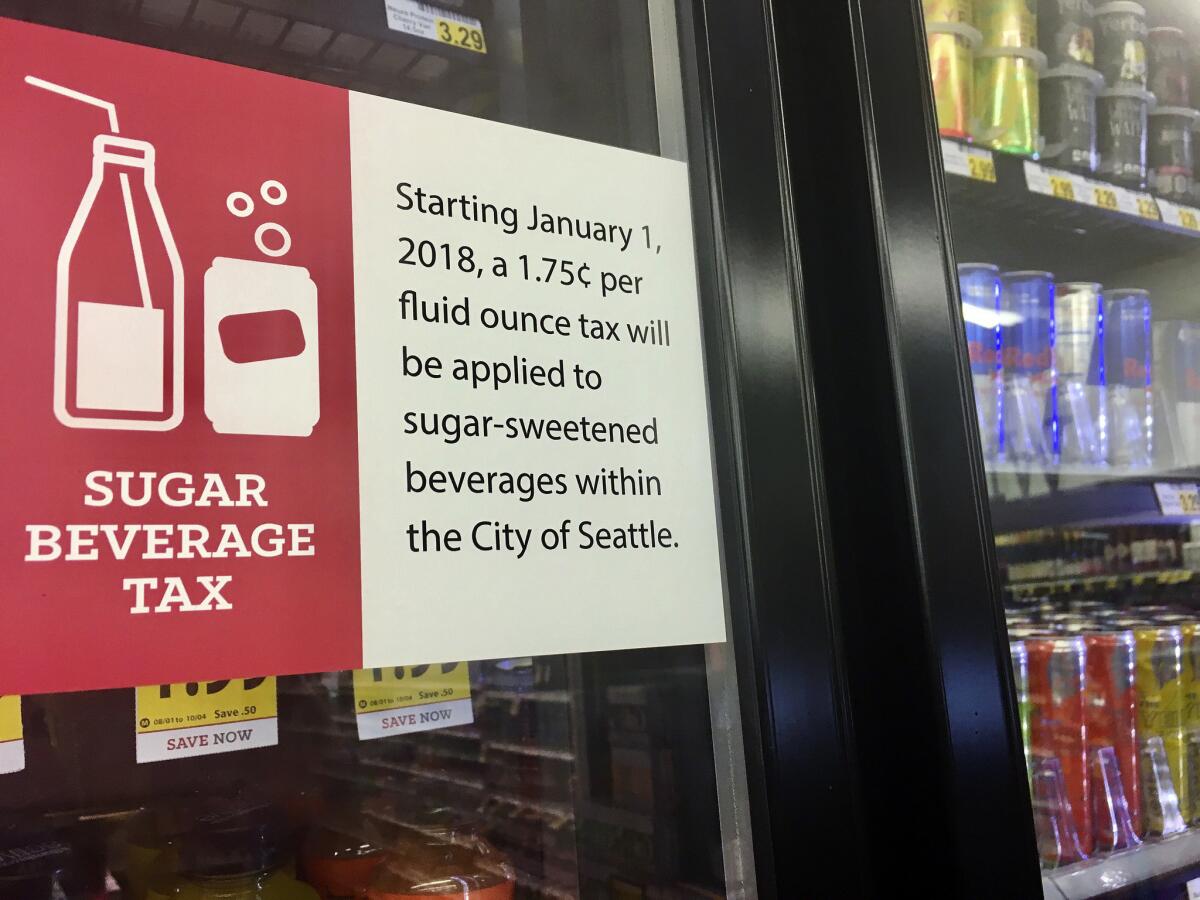
Voters in Oregon and Washington State will decide today whether they want to ban local soda taxes, such as the one that Seattle adopted in January.
Oh, some may not realize that’s what they are doing, given that the measures pretend to be about keeping greedy local governments from slapping taxes on food. But there’s a reason that soda companies have spent millions on these measures: the “groceries” that are protected from new taxes include sugary drinks like soda.
Local soda taxes have been bubbling up all over the country as studies trickle in from places like Berkeley indicating that soda taxes really do decrease soda consumption. That’s good for public health advocates hoping to curb the rising rates of obesity and diabetes.
But it’s bad for the bottom lines of Coca-Cola, PepsiCo and other makers of sugary beverages. So they’ve resorted to a time-tested tactic: urging state lawmakers to enact the sort of preemptive measures that Big Tobacco pioneered to protect itself against local anti-smoking laws. The plastics manufacturing industry has done the same in recent years, persuading legislatures in about a dozen states to ban plastic bag bans (though not in California, which has the nation’s only statewide plastic bag ban).
If the measures in Washington and Oregon pass, it will mean the entire West Coast will be a no-soda tax zone.
And Californians didn’t even get to vote on their ban. The California Legislature fell for another crafty beverage industry tactic earlier this year. Soda makers underwrote a ballot proposition that would have it made it harder for state and local government to raise a broad range of taxes. Once the measure qualified, Big Soda offered to remove it from the ballot — in exchange for a 12-year ban on local soda taxes. The Legislature caved, stunning public health groups that had been working on a number of local soda tax efforts.
If the voters in Oregon and Washington State give the soda industry victories, expect to see more soda tax preemption efforts in other states. And on other products and policies.
You can’t just tell young people to go out and vote. You have to help them out

I spend a lot of time urging people to vote. But it occurred to me (on Monday) that I had never delivered that message to my niece, Elise Hall, who turned 18 in July. Was she even registered to vote?
Elise graduated from high school this past spring and now juggles a job and classes at a local college. I knew she was civic-minded; in high school, she volunteered her time and expertise doing hair and makeup for women in homeless shelters. But I had a feeling that voter registration might not have been on her to-do list.
Turns out that she had registered online — good for her! — or at least she tried to. She got back a form saying she still had to sign something. I looked her up on lavote.net and she wasn’t listed as registered. That didn’t surprise me. Maybe her name hadn’t made it into the system yet.
So I decided we should just go for it: Show up at the polls and see if they would let her vote — at least by provisional ballot. When she was 3, I had taken her trick-or-treating, along with her mother and brother, holding her hand as she climbed up stairs to houses, clutching her jack-o’-lantern bucket with her other hand. Now I wanted to take her voting. Hand-holding optional. She was game. She enlisted her lifelong friend, Sam Mizrahi-Powell, to come along.
When I showed up at her home in Palos Verdes Estates, it was sunny and breezy and the air was tinged with the smell of salt from the ocean. Good voting weather.
On the drive over to her polling place at a school district office, we talked of matters small and large. Elise had spent the entire weekend at a music festival in Long Beach, where every performer had told the audience to go vote. Yet she worried that “not everyone gets the opportunity to vote and use their voice.” She also struggled, as many voters do, with the feeling that she was a very small cog in a large machine. “I think my vote is important, but I am kind of discouraged that it won’t mean that much,” she said.
Gubernatorial candidate Gavin Newsom also came up in discussion. “He reminds me of a guy out of ‘Scandal,’” she mused. Come to think of it, he does look like a character on a soap opera.
Inside the tiny polling place, as we suspected, Elise was not on the rolls. But they offered her a provisional ballot and she took it into a booth. She knew how she wanted to vote (full disclosure: she went in armed with a list of L.A. Times endorsements), the only mystery being how to mark the foot-long ballot. I showed her how to slide it in the machine and anchor it down.
I stepped back and snapped a few pictures of her. “First election, huh?” a poll worker asked, chuckling. Good thing ballot selfies aren’t illegal in California, unlike 18 other states with irrational fears about voter fraud.
Sam, who is an intern at a movie production company, had already voted by mail. He was surprised by how long the voter pamphlet was. He had pored over it, reading the ballot analysis for both sides of every measure. “I wish we could have voted for certain parts of the propositions and not others,” he said. Don’t we all.
Trump’s immigration court backlog has passed 1 million cases #WINNING
You have to give credit to the Trump administration when it’s due. The increased pace of arrests of people living in the country illegally, combined with the order to reopen suspended cases, has pushed the backlog of pending immigration court cases to nearly 1.1 million, according to the Transactional Records Access Clearinghouse at Syracuse University.
That’s more than double the backlog when Trump took office, and comes despite a 30% increase in the number of immigration judges.
No president in history has overseen such a huge buildup in cases. President Obama? The best he could do was 630,000 cases. Trump is so #WINNING when it comes to gumming up the immigration courts.
Oh, wait, that’s not a good thing.
Part of the increase stems from a hike in the number of deportation cases, which rose 49% to 768,257 during the fiscal year that ended Sept. 30.
But Atty. Gen. Jeff Sessions also ended the practice of suspending cases while the person facing deportation pursued other relief (such as an active application for a visa), which revived another 330,211 cases, bringing the total backlog to 1,098,468 cases.
With 395 judges on the immigration bench, that’s an average caseload of 2,781 cases per jurist.
Sessions also has adopted a quota system for the immigration courts, demanding each judge close at least 700 cases a year. At that pace, it would take the courts about four years to clear the backlog — but only if no new cases were added. At the current (slower) clearance rate, TRAC says, it would take the judges 5.1 years to work through the backlog, again if no new cases were added.
Never mind that speeding up case reviews increases the chances that due process rights will get compromised and that people will be deported despite having legitimate reasons to be allowed to stay, including credible fears that they might be persecuted or killed if returned to their home countries.
But when you think about it, this really is a remarkable achievement by Trump. He took a massively dysfunctional immigration system and made it worse.
Nobody’s ever seen anything like it. A lot of people are saying ...
What kind of bipartisan cooperation can we expect after the election? How about none
President Trump has conducted the midterm election like a game of Wasteland Express Delivery Service, a post-apocalyptic vision of commerce in America.
In Wasteland Express, players buy and sell goods at various outposts to generate the profits they need to win. But once they sell something to any given outpost, they can’t go back with their next truckload of goods — the transaction was so acrimonious, the buyers won’t do business with them.
In recent weeks, the president has said things about individual Democrats and the Democratic Party in general that suggest he won’t be doing business with them next year. Take, for instance, these three tweets he made Saturday, then retweeted Tuesday morning:
“Raise your taxes” and “restore job-killing regulations” — totally fair. “Shut down your coal mines and timber mills” — hyperbolic, but at least there’s a grain of truth to the former. “Take away your healthcare, impose socialism and ERASE your borders” — that’s crazy talk, designed to make folks on the other side of the debate appear not just wrong, but evil. Ditto for what he says in this next tweet about Democratic Senate candidate Krysten Sinema in Arizona:
As bad as those tweets were, the next one may be worse. To boost embattled incumbent Joe Donnelly (D-Ind.), the Democratic Party in Indiana ran ads on Facebook attacking his Republican opponent, Mike Braun, a former Democrat, and promoting his Libertarian opponent, Lucy Brenton. This would have fallen into the dirty trick category had the ads not been clearly marked at the very top, “Sponsored • Paid for by the Indiana Democratic Party and authorized by Donnelly for Indiana.” So there was nothing secretive about the tactic; instead, it was a transparent attempt by Democrats to divide anti-tax conservatives. So what does Trump say about it?
Granted, saying Donnelly is trying to steal the election isn’t as bad as calling him a thief — the term Trump applied to the Democratic candidate for Florida’s governor, who happens to be African American. But Trump’s words lay the groundwork for Republicans to claim, if Donnelly wins, that his victory was illegitimate.
The tweets effectively capture the spirit of much of what the president has said at campaign rallies and impromptu press conferences in the weeks leading up to Tuesday’s vote. Trump has spent a certain amount of time touting the strong economy, low unemployment and rising wages. But the positive notes have been overshadowed by his appeals to the fears and suspicions of his base. Democrats aren’t merely a lousy alternative, Trump has been arguing; they’re ruin, corruption and chaos.
Voters have gotten incredibly worked up about this election, largely because of Trump. And those emotions have driven an incredible turnout, which is healthy and welcome.
But this country has to be governable after the election. Trump and congressional Democrats will have to work together, regardless of who controls the House and the Senate. Even if they’re in the minority, Senate Democrats will still have the power to frustrate Trump’s agenda.
In Wasteland Express, players mark the outposts they’ve tainted with a big red X. President Trump has left a lot of big red X’s across the political landscape.
D.C. pols are too polarized to fight climate change. But Washington state voters might be up to it
With Washington, D.C., unlikely to act on climate change any time soon, voters in Washington state Tuesday are deciding whether to impose the nation’s first carbon tax.
Initiative 1631 would charge a “fee” (basically a tax) on large emitters of greenhouse gases, such as oil companies and electric utilities. The money raised from the fee would be used to develop renewable energy, electric vehicle infrastructure, energy efficiency programs and other projects designed to reduce carbon emissions. The state could eventually raise $1 billion a year by 2025 — money that could help transform the state’s infrastructure and economy.
This is the second time voters in Washington have considered a carbon tax. Voter rejected a 2016 initiative that would have levied a higher carbon tax on fossil fuels but refunded all the revenue through tax cuts and rebates.
It’s a big deal that Washington voters are even considering a carbon-pricing scheme again. Carbon taxes are often floated by both environmentalists and centrist Republicans as the ideal policy tool to slash greenhouse gas emissions and slow climate change. Putting a price on emissions makes it more expensive to burn fossil fuels, and that pushes manufacturers and consumers toward cleaner and, eventually, cheaper forms of energy.
There’s been a lot of talk but, so far, little action on carbon taxes in the U.S.
California is the outlier, having enacted a cap-and-trade system in which companies can install pollution-cutting equipment to meet carbon emissions limits or buy permits to exceed them. It’s not a carbon tax, but it has the same goal of prodding companies to cut greenhouse gas emissions.
More important, California’s experience has demonstrated that a state can adopt aggressive climate change regulations and still have a thriving economy. If voters approve Initiative 1631, the hope is that Washington, too, can become a proving ground for carbon taxes.
There is, of course, lots of skepticism in Washington. Oil industry groups argued that state-level action would have a negligible impact on global warming. The Seattle Times opposed the carbon tax, arguing that climate change warranted a “coordinated” response with other states, or a national carbon tax.
Yes, it would be better if the United States imposed a national carbon tax, or at least had a strategy to cut greenhouse gas emissions. That’s not going to happen under climate change denier President Trump, and the situation is too dire to wait.
Already the world is warming faster than previously believed. The recent Intergovernmental Panel of Climate Change warned that if greenhouse gas emissions continue unabated, the atmosphere will climb to 2.7 degrees Fahrenheit above pre-industrial levels by 2040, adding to rising seas and propelling more severe storms, wildfires, food shortages, heat waves, droughts and floods.
If the federal government won’t do it, states have to lead the effort to slow climate change. California is doing it. Washington can too.
How long after the polls close until heads roll in the Trump administration?
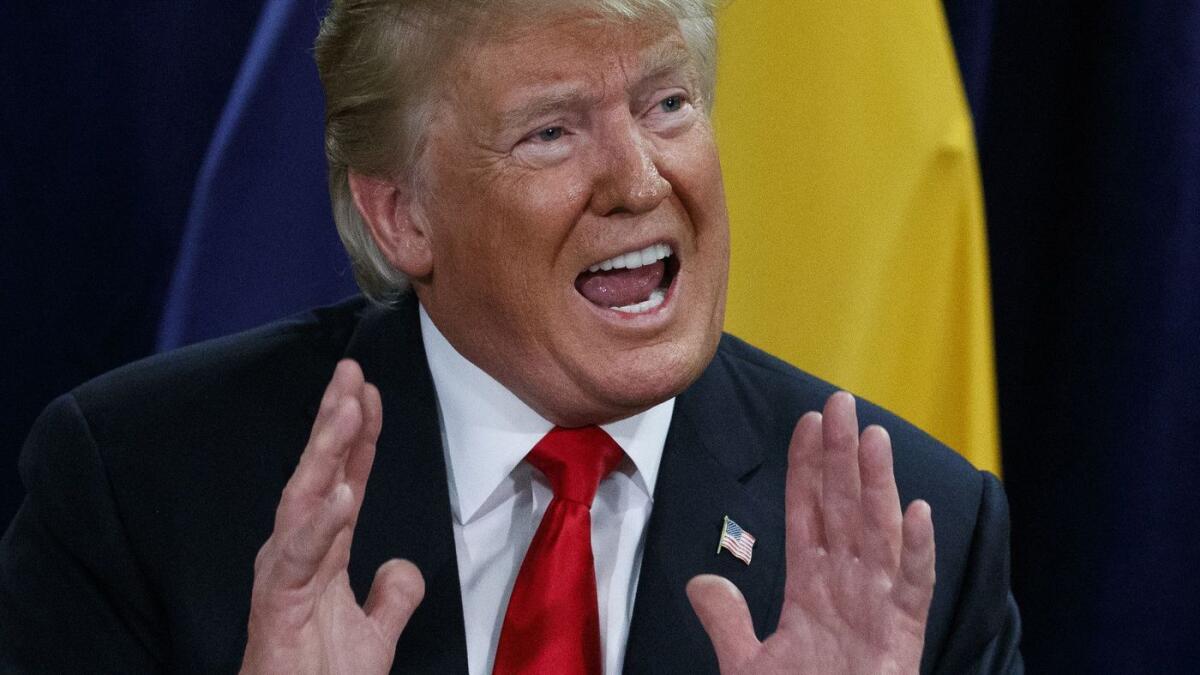
I tend not to make too many predictions about elections because it’s too easy to be wrong, too hard to be right, and in the end it doesn’t matter because the elections will turn out the way they’ll turn out (give or take a Russian thumb or two on the scale).
So let’s move to the second-most interesting thing tied to the election: who President Trump will fire, and when.
My guess is that several heads will roll, and roll soon. The news coverage of the fight for control of Congress will push Trump out of the news cycle, and nothing irks the president more than not being the center of attention. To paraphrase Alice Roosevelt Longworth’s jibe about her father, Teddy Roosevelt, Trump wants to be the corpse at every funeral, the bride at every wedding and the baby at every christening.
And a good way to turn the spotlight back on himself is to dust off “The Apprentice” playbook and start firing people.
The first to go? Probably Interior Secretary Ryan Zinke, who has been wracked by ethics investigations.
And then my money would be on Atty. Gen. Jeff Sessions, a frequent Trump punching bag, and possibly his deputy, Rod Rosenstein, who has been overseeing special counsel Robert S. Mueller III’s investigation into possible connections between Trump’s 2016 campaign and Russian meddlers, among other things.
Removing thorn-in-the-side Rosenstein would set the stage for Solicitor General Noel Francisco to handle oversight of Mueller whether Sessions stays or goes, since Sessions, who advised the Trump campaign, recused himself. And then if Francisco fires Mueller, well, that would certainly make Trump the center of attention again (though if the Democrats take the House, firing Mueller could well launch impeachment proceedings).
And let’s not forget Kirstjen Nielsen, the Homeland Security secretary Trump has berated over border enforcement. Even though illegal border crossings are way down, Trump has inflated the issue into a fake crisis to try to gin up votes in the midterms. But just because it’s fake doesn’t mean the president doesn’t think there is a crisis, and Nielsen tops the list of potential scapegoats. If Nielsen gets the ax, John Kelly — Trump’s chief of staff and a vocal Nielsen defender — may leave too.
Wilbur Ross at Commerce could be on thin ice as well, given his ethics troubles, though firing a fellow 1%er who lied about his wealth might be painful for the president.
James Mattis may leave his Defense post, too, though the sense out of Washington is that his departure would be his decision, not Trump’s.
Presidents often wait until after midterms to shuffle around the people in the top chairs, but this particular chief executive has been rearranging his Cabinet like it’s his hobby. So grab the popcorn and start the office pools.
For all the hype about high turnout, it will be a near miracle if half of eligible Americans vote
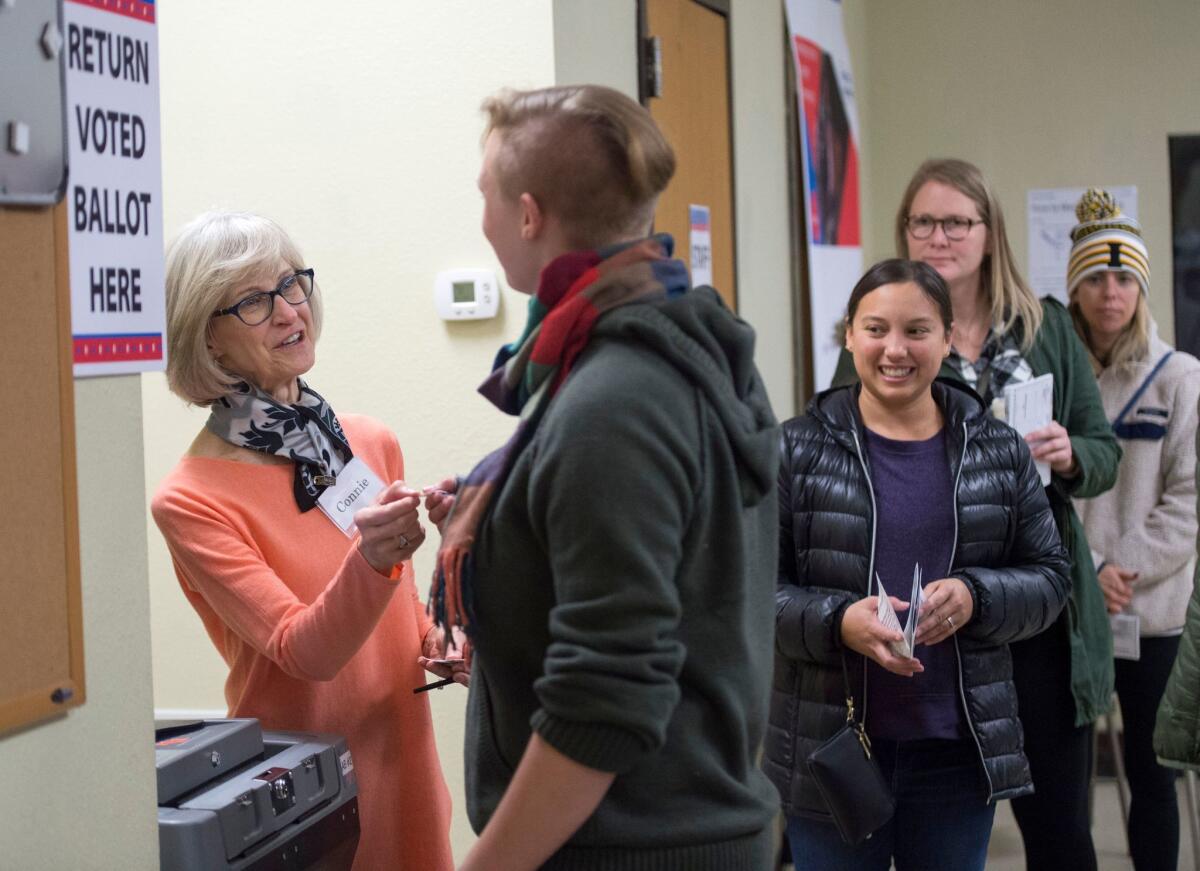
As I got out of the YMCA pool early Monday morning, the lifeguard — a young man most likely still in college — said he was still bothered by Sunday’s shift from daylight saving time to standard time. So, I asked, you’ll be voting for Proposition 7 tomorrow?
Evidently, this was the first time anyone had mentioned that proposition to him. From the look on his face, I wondered if he realized that Tuesday was election day.
Regardless, after I told him that the measure would let the Legislature vote to end the time changes and put us on daylight saving time permanently, with Congress’ approval, he had the zeal of the converted. As I dripped my way to the locker room, I heard him calling out to other swimmers getting out of their lanes, “Vote yes on Prop. 7! Vote yes on Prop. 7!”
There’s been a torrent of stories about how high the turnout in this year’s midterms will be. And much of the energy clearly is being driven by strong feelings about President Trump, who’s not actually on the ballot but has sought to make the midterms a referendum on him.
But there are plenty of voting-age Americans who aren’t motivated by the national political scrum. They may not see themselves having any stake in that fight, or they may be turned off by it. That’s one reason so many of those folks don’t bother to vote, particularly not in midterms, for which it would be a near miracle if half of those eligible to cast ballots actually did so.
What’s worse, in this West Coast hub of direct democracy, there will always be at least one thing on the ballot that should resonate with even the most disaffected or disinterested voter. Maybe it’s Proposition 7, which would strike a mostly symbolic blow against the scourge of semiannual time shifts. Maybe it’s Proposition 12, which would require more humane treatment of egg-laying hens and other animals raised to produce food. Or perhaps it’s Proposition 1, which would provide more state dollars for affordable housing.
So why is there a disconnect between Californians like my lifeguard and the ballot measures that they might care about enough to go vote? Part of the explanation, no doubt, is the campaign-ad carpet bombing done by candidates and special interests. It’s hard for proponents of smaller measures to be heard this year above the noise being generated by the fights over the gas-tax-increase repeal (Proposition 6), rent control (Proposition 10) and revenue caps on dialysis clinics (Proposition 8).
Overcoming the awareness gap, though, might take more money than proponents of a measure such as Proposition 7 could raise. That particular initiative was put on the ballot by the Legislature and seems to have no active campaign behind it — the California secretary of state’s office reports no money having been raised or spent on Proposition 7, pro or con. By way of comparison, backers of Proposition 1 have contributed $7 million and supporters of Proposition 12 $18 million; the two sides on Proposition 10 have contributed $102 million, and the dueling factions on Proposition 8 have kicked in $132 million.
That’s why the answer probably isn’t going to come from the campaigns. If we are really serious about raising turnout among voting-age Americans to the level seen in most other industrialized nations, it will be up to those of us who are paying attention to spread the word about what’s being decided by those who bother to vote. It’s a long ballot seemingly every year — there will be something for everyone.
Jeff Sessions may be Trump’s punching bag, but he’s in lock step with the president on immigration

One of the more overlooked aspects of President Trump’s attacks on the government he was elected to run is the slow and steady reshaping of immigration courts by Atty.Gen. Jeff Sessions. That also points up one of many anomalies of this administration: Sessions has found himself in the odd position of being Trump’s punching bag for recusing himself from the Mueller probe, while simultaneously doing exactly what Trump wants in making it harder for people to fight deportation or seek asylum.
Trying to force more people out of the country plays directly into Trump’s anti-illegal-immigration campaign, including his fake caravan crisis at the southern border. But it also reflects Sessions’ long-held opposition to immigration of all stripes. As a member of the Senate, he was one of the sturdiest roadblocks to enacting comprehensive immigration reform while seeking to reduce legal immigration.
And he’s in a position to do more than he could as a single senator because the immigration courts now work for him; they are not part of the judicial branch, like federal district courts or the courts of appeal. Rather, they exist within the Justice Department as an administrative system, and all the judges — both hearing judges and those on the Board of Immigration Appeals — work for the attorney general, who has the authority to overrule decisions by the appeals panel. Sessions has done so more often than other recent attorneys general, and generally has ruled against the immigrants involved in the cases.
Sessions’ decisions have focused on overturning precedents he doesn’t like, and tend to constrain judicial flexibility and autonomy.
In one case he reversed an Obama-era decision that women facing domestic abuse in cultures in which law enforcement won’t protect them can receive asylum.
He also has stopped the practice of administrative closures, which judges were using often to suspend a deportation while the person involved sought a visa or other remedy. As a consequence, now people could be deported before they finish that process. And that will just add to the backlog of pending cases.
The one good thing Sessions has done: He has hired more immigration judges, increasing the number from 289 as of the end of September 2016 to 397, with even more planned. That is the best way to address the massive backlog that has built up over the years — increase the capacity of the system to handle cases — as long as those judges pay the proper respect to due process and the migrants’ rights.
How big is the backlog? Two years ago, it stood at 516,000 cases that had been pending an average of 672 days; now it stands at 765,000 cases that have been pending an average of 717 days.
Part of the growth stems from the administration’s stepped-up pace of arrests and detentions. So in an effort to speed up the handling of cases, Sessions established a quota and performance system for immigration judges, increasing the likelihood that rights will get trampled as judges struggle to keep up with the demands of a legal assembly line. He also has criticized immigration attorneys for doing their jobs — helping protect the legal rights and interests of people facing deportation.
The American Bar Assn. warned that the new approach will likely backfire. The attorney general is the top decision-maker within the immigration court framework, but even his decisions can be appealed in federal court, especially if there is a claim that rights have been violated. And a hurried-up immigration court process is likely to run afoul of due process protections.
Last month, Sessions took the first steps in further consolidating his power by proposing a rule that would allow the attorney general to intervene in a case before it reached the immigration appeals court, essentially circumventing decades of practice and undercutting what little independence the immigration courts have. Of course, it’s a betting proposition whether Sessions will survive long enough in his current job to exercise that power.
From a policy and good-governance standpoint, Sessions has been awful for the immigration courts. If the administration dislikes immigration law and how it is supposed to be enforced, then it should work with Congress to adjust the laws, not resort to this behind-curtains consolidation of authority.
The best solution here would be to make the immigration courts independent. Justice is not served when immigration judges work for an executive branch that seeks to deport people who may have a legal right to remain. That makes the process too easily politicized, as we’ve seen over the past few months.
The midterms aren’t just a referendum on Trump. They’re a measure of how many lies Americans will swallow

One of the more depressing aspects of President Trump’s flood of lies about the immigration system and immigrants themselves is that so many of his supporters are willing to believe what’s patently untrue.
The president was back at it Thursday, speaking from the Roosevelt Room in the White House, when he ranted against illegal immigration — it is a problem, but much less so than in the past — and characterized the northbound dwindling caravan in southern Mexico as full of “tough people” — the migrants pushed through Mexican police seeking to stop them — and obliquely suggested they included rapists, a persistent theme with Trump.
Here are a few places where fact-checkers tried to catch the lies in the speech, so I won’t rehash them. But it was undeniably laden with flat-out falsehoods, including blaming illegal immigration on “Democrat” laws and claiming that 97% of migrants released from custody disappear into the country: “By the time their trial comes, they’re gone, nobody knows where they are.”
An outright lie. The vast majority of released migrants show up for court dates.
The president repeatedly says at rallies for Republican candidates that Tuesday’s election is a referendum on him, and in many ways it is. All the House seats are on the ballot, and many of them are occupied by people who have failed in their constitutional mandate to serve as a check and balance on the president. So to vote for those candidates is to vote for the president.
But the election is more about the American people, and Trump supporters who either believe the lies or don’t care because they, too, fear or hate migrants.
And yes, our immigration system is broken. Congress — regardless of who has controlled it — has failed to fix it. It’s as though both parties want it to remain broken. The Democrats use it to rally support among its progressive, pro-immigrant base, while Republicans follow the Willie Horton example and use migrants here illegally — who commit crimes less frequently than native-born Americans — as a bogeyman to run against.
Thus, Trump has manufactured a crisis out of a couple of thousand people heading to the border to seek asylum. He says they must present themselves at border crossings to seek asylum, but the law says otherwise, and legal challenges will keep him from adopting that policy — but not until after the election. So he trots out a chimera of a policy to appear as though he’s acting forcefully to address a crisis that doesn’t exist.
Trump also is deploying active-duty military personnel to the border and, according to his Thursday statement, instructed the troops to treat thrown rocks as though someone had fired a rifle at them. The commander in chief didn’t specify what their response should be, but the implication is clear: Return fire.
This is pure demagoguery, a statement meant to portray the migrants as an invasion force to stoke fear among those susceptible to it. At the same time, the president has been relatively silent in the election lead-up on the real pressing issues for the nation, including his increasing destabilization of the world, his blatant disregard for the environment and the dangers of global warming, gun violence, divisive political rhetoric (which he exploits), and a massive federal deficit exacerbated by his tax cuts, leaving the economy little wriggle room when the inevitable recession arrives.
But the migrants!
So the question for voters is, do you accept this? Do you let our P.T. Barnum of a president dazzle you with lies? Do you reelect the people who should be calling him on this, but who instead aid and abet it? Do you let the current status continue down the path to more divisiveness, more violence — both physical and verbal — among us, to further erode the nation’s standing in the world?
Or do you stand up to this slide into authoritarianism and try to make America sane again?
If elections are all about ‘the economy, stupid,’ the blue wave is in trouble
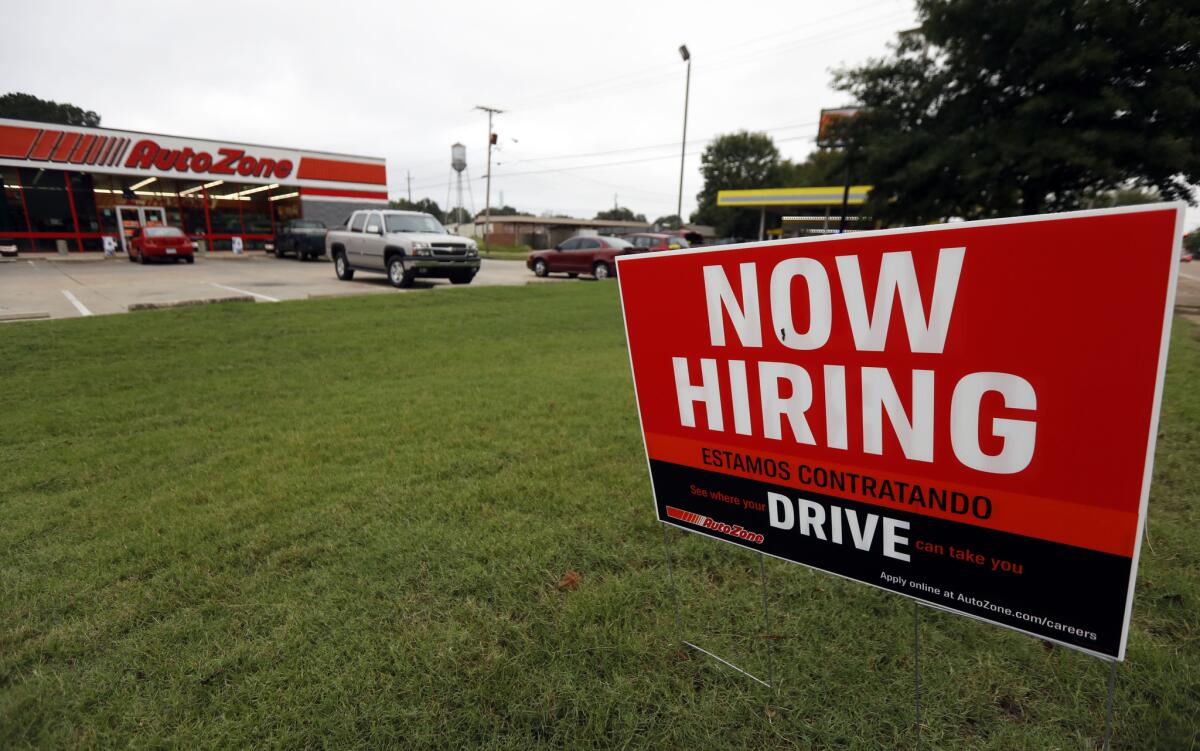
Nine of the last 13 U.S. elections have been “change” or “wave” elections, as voters threw out the party in charge of the White House, the House of Representatives or the Senate in search of a new direction in Washington.
The phenomenon has been especially pronounced in midterm elections, which flipped control of the House on three occasions since 1994 and the Senate three times since 2002.
Notably, however, none of those turnabouts came when the economy was performing as well as it is now. Friday’s strong jobs report, coming on the heels of last week’s encouraging advance estimate of third-quarter GDP, shows that the U.S. economy remains in something of a Goldilocks zone — not too hot, not too cold.
To break it down a bit, we’re seeing so much demand for labor that wages are increasing faster (for the first time since the last recession ended, average hourly wages were more than 3% higher than the year before) and more people joining or rejoining the workforce. Job growth was broad too, showing up in a wide range of industries.
Good times! But how will that show up in the election results? When James Carville advised Bill Clinton that the key to defeating President George H.W. Bush in 1992 was “the economy, stupid,” the United States was rebounding from a downturn in the middle of Bush’s first and only term. Economic discontent is a powerful motivator; will people stream to the polls when they feel good about the way things are going?
The question is important because, according to national polls, Americans really do feel good about their situation and their prospects. The Conference Board reported this week that its surveys found, in addition to the highest level of consumer confidence since the dot-com boom, an extremely high level of satisfaction with the current situation and plenty of optimism about the near-term future.
Those feelings aren’t universal; the rising tide has lifted some boats higher than others. And there certainly are dark clouds on the horizon, thanks to the intensifying trade war President Trump is waging with China, slowly rising interest rates, a volatile stock market, creeping inflation and the looming sanctions on Iran that could cause oil prices to surge again. Analysts say the next round of tariffs on Chinese goods will be felt much more directly by the average American because, for the first time, the levies will fall heavily on consumer products (e.g., athletic shoes and smartphones).
Nevertheless, the latest economic reports suggest that those threats aren’t yet moving the needle. The engine appears to be firing on all cylinders.
That’s probably why Democrats aren’t saying much about the economy, other than arguing that the big GOP tax cuts passed in 2017 help corporations and the wealthy more than the average American. Instead, they’re talking about things voters are worried about, most notably healthcare. And while many candidates are sticking to local issues, they’re counting on the visceral dislike for Trump among Democrats and some independent voters to help build a “blue wave.”
For his part, Trump has talked about the improving economy almost since the day he took office. As he’s campaigned for Republicans in the midterms, he’s asserted that putting Democrats in power would end the party in a hurry — they’d raise taxes, reimpose regulations and replace all American workers with cheaper Honduran immigrants. Or something like that.
That’s playing to people’s fears, which works only if the fears are credible. And it’s really hard to get people scared about the economy when it has been improving slowly but steadily for a decade, and things are going as well as they are today. Even Trump is hedging his bets by making other fear-based pitches — for example, migrant caravans, anchor babies and violent criminals who entered the country illegally.
Anyway, the economy is certainly good enough to quell voters’ eagerness for change. We’ll see next week if that translates into a strong turnout to preserve the status quo.
Gun suicides far outpace gun homicides. Here’s why that statistic matters

About two-thirds of gun deaths in the U.S. each year are suicides, traumatic and desperate acts that often lie at the nexus of mental illness and ready access to a firearm. Yet a new study published in the Annals of Internal Medicine finds that only 13% of people know that gun suicides far outpace homicides, a likely function of regular news coverage of violent crimes and a tendency to not cover suicides.
Why does that matter?
As the study’s authors point out, people who buy firearms for self-protection from criminal attacks or home invasions — even though firearms offer more reassurance than actual protection — may not be aware of the other related risks.
“This research indicates that in the scope of violent death, the majority of U.S. adults don’t know how people are dying,” said Erin Morgan, the lead author and an epidemiology graduate student at the University of Washington School of Public Health. “Knowing that the presence of a firearm increases the risk for suicide, and that firearm suicide is substantially more common than firearm homicide, may lead people to think twice about whether or not firearm ownership and their storage practices are really the safest options for them and their household.”
Statistics on suicides and gun access are sobering. Since 1999, suicide rates have increased in every state except Nevada, and the rates have jumped by at least 30% in more than half of the states, according to the Centers for Disease Control and Prevention. Most suicides were by people without known mental illnesses at the time, and 55% of those deaths involved firearms.
So thousands of people with access to guns who hadn’t exhibited notable mental illness shot themselves to death.
Notably, among all suicides, only 22% involved people with underlying health issues, while 42% of those committing suicide had relationship problems, 29% had just experienced or knew of a pending personal crisis, and 28% had substance abuse problems. Suicide often, as experts warn, is an impulsive act, and having a lethal weapon at hand makes that impulse more likely to be deadly.
Other studies have found that state-level nonfirearm suicide rates are similar across the country, but the level of firearm suicides is higher in states with high levels of gun ownership. And firearms are much deadlier than other methods used by those attempting to kill themselves — about 93% of gun attempts result in death, according to CDC data, though it warns that it’s nonfatal injury data isn’t as rock-solid as one would like. But only a sliver of people who poisoned themselves in 2016 died — 6,698 deaths in 266,175 attempts, according to CDC data. Even those who sought to suffocate themselves (often by hanging) survived more than twice as often as those who used a gun — 4,091 survived and were treated at hospitals, while 22,642 died.
So the presence of a firearm in the home increases the chance that someone will kill himself — middle-aged white men are most prone — with a weapon often bought for self- protection.
That seems worth talking about.
No shady super PACs or dog whistles required. Trump owns his Willie Horton moment
Trying to amp up the spooky Halloween vibe he’s projected onto the midterm elections, President Trump went to Twitter on Wednesday to introduce a new boogeyman: Luis Bracamontes, a convicted cop-killer now on California’s death row.
The tweet — still pinned to the top of Trump’s Twitter feed — has drawn criticism galore from the media and Democrats. But I’m not going to pick apart what it says; instead, I’m struck by how many people are outraged that Trump should be saying (err, tweeting) such things himself.
Here is a comprehensive comparison between Trump’s ad and the infamous Willie Horton ad that supported then-Vice President George H.W. Bush’s campaign against Michael Dukakis in 1988, which Bush’s campaign manager arranged but then denied any involvement in:
The implication is that it’s much, much worse for the president to engage in this kind of low-blow scaremongering out in the open, rather than doing it through proxies. To the contrary, we’re better off when politicians take ownership of everything done in their name — especially when it’s as scummy as this ad is. There’s no question about accountability here.
Trump doesn’t just employ a team of Lee Atwaters. He is Lee Atwater, minus whatever conscience Atwater developed later in life.
Think of it this way. On Saturday, an anti-Semitic gunman — apparently obsessed with the caravan that Trump has been hyping, and fueled by a crazy notion that refugee-friendly Jews were bringing people into the country who would commit genocide on white Americans — shot up a synagogue in Pittsburgh, killing 11 elderly worshipers. Four days later, Trump pushed an ad out to his 55.5 million followers stating that Democrats were inviting killers into this country, touting the caravan and asking who Democrats would bring into the country next.
Trump has made no secret about seizing on immigration and border security in his effort to help embattled Republicans in the midterms. He is doing it openly, as president. It’s the kind of transparency we want from politicians, right? Too bad it’s put to such horrible use.
20 years after his murder, Matthew Shepard is still under attack
Last week, Matthew Shepard’s parents, Judy and Dennis, sat for a television interview. Their son, of course, had been beaten, pistol-whipped, tied to a fence post, and left to die near Laramie, Wyo., in 1998. Now, 20 years later, his ashes were being interred at the Washington National Cathedral.
In the television interview, the news anchor proceeded, in the tradition of many before her, to gently yet obviously try to make Matthew Shepard’s parents cry on camera.
The exchange went something like this: She asked them if they were moved. They were. She listed others who’d been buried there — Woodrow Wilson and Helen Keller, for instance. She asked them how they felt. They were honored. She was not getting what she wanted. They were not crying. The church, she told them, held Matthew Shepard in that level of esteem. He changed the world, she said. That must make them feel some kind of way. “To us, he was just Matthew,” his mother said. His mother was sad, had likely been sad for 20 years, but did not cave.
Happy Halloween! Here’s a knife-wielding man in bandages and hospital scrubs wandering L.A.’s freeways
Well, here’s something for you from the nightmare factory, courtesy of the Instagram account of L.A. motorist Lisa Shields.
An obvious prank, pulled off by a fame-thirsty Logan Paul wannabe, you say?
Nope.
A spokesperson from the West Los Angeles branch of the California Highway Patrol says that “this was not a prank.” CHP responded to the incident in question Monday, and the knife-wielding man and his bandages were taken to a local hospital and put on a 72-hour mental health hold.
It remains unclear who this man is and how he wound up armed in hospital scrubs on the freeway. It’s probably worth noting that Los Angeles is facing a homelessness epidemic, of which severe mental illness is a leading contributor.
The world isn’t even getting the easy fixes to combat climate change done
Last spring the International Maritime Organization, a United Nations body overseeing global shipping, came to a significant agreement: Its signatories would reduce greenhouse gas emissions from international shipping 50% by 2050, in keeping with the spirit of the 2015 Paris agreement. As The Times editorial board noted then, the devil would be in the details, which were to be hammered out at meeting in October.
Well, the meeting came and went, and so did hope that an industry that produces carbon missions on a par with the entire country of Germany would work quickly to reduce its carbon footprint. Rather than setting hard goals and ways to get there, the IMO adjourned the meeting without doing anything of note until the body meets again next year.
The timing of this comes with some irony: Scientists reported Wednesday that the oceans — plied by those carbon-spewing freighters — are warming faster than previously thought, which means the world is further along the path of global warning than was previously understood, reinforcing a conclusion reached earlier this month by the Intergovernmental Panel on Climate Change.
The reality is that the modern global economy — and many of the means by which humans travel, ship goods and maintain habitable housing (heated in the winter, cooled in the summer) — is turning the Earth into a hot box. The global temperature has risen 1 degree Celsius (roughly 1.7 degrees Fahrenheit) since the start of the industrial era, and as it continues to increase, more glaciers and polar ice sheets will melt, leading the oceans to swamp coastal areas and inundate low-lying islands, while weather patterns will continue to shift and the power and intensity of storms and droughts will increase.
The world needs radical and immediate action to confront this looming calamity, and we can’t get even the easy fixes done. For instance, the Clean Shipping Coalition, an advocacy group, argues that the IMO could have ordered a speed limit on freighters that would have made a significant immediate impact on emissions.
“As ship speed increases, the water resistance increases, not proportionally but exponentially,” said Bill Hemmings, aviation and shipping director for the Brussels-based organization Transport and Environment, which belongs to the Clean Shipping Coalition and advocates for sustainable transportation. “So increasing speed by 10% might increase resistance and thus the power needed to push through the water by 30% or more.”
Conversely, a 10% decrease could reduce carbon emissions by nearly 30%. Shippers like the higher speeds because time means money, and regulated speed limits can reduce flexibility in maintaining fleets and schedules. Those are understandable concerns, but if the world is to combat global warming, it needs to stop focusing on the short term and start making decisions based on the outcome the world needs: radically reduced emissions as quickly possible.
Meanwhile, the Trump administration continues on with its disastrous policies to increase the production and consumption of fossil fuels, putting the short-term financial interests of the gas and oil industry ahead of the world’s ability to sustain human life. Food insecurity, which had been dropping for a decade, increased last year, according to the World Food Program. The future looks even bleaker, with climate change already affecting weather patterns that have increased food insecurity in sub-Saharan Africa, helping propel a wave of human migration.
And some of the Central Americans traveling in the so-called caravan through Mexico are fleeing not just violence, but also poverty and starvation as agricultural areas in Honduras have been decimated by a prolonged drought — a condition believed to be exacerbated by global warming.
And the world can’t even set a speed limit on ships.
Don’t worry, you’re not crazy. There is no Proposition 9 on California’s ballot. Here’s why
On California’s Nov. 6 ballot, there is a Proposition 8 (limits profits at kidney dialysis centers) and a Proposition 10 (repeals the Costa-Hawkins rent control ban). But, mysteriously, no Proposition 9.
Oops! Did some numerically challenged individual in the elections office goof?
Nope. There was a proposition that qualified for the November ballot in the No. 9 slot, but then the state Supreme Court ruled the measure unconstitutional and yanked it at the last minute. Evidently it was too late to rejigger all the other proposition numbers.
And thank heavens it won’t come before voters. The absent Proposition 9, known as Three Californias, was put on the ballot by a billionaire venture capitalist who thinks California is too big and wanted to break it up into three new states. It was a loony idea that would have cost the state a lot more than it gained.
Each California voter will still have to decide 11 other statewide propositions, eight statewide offices, a seat on the board of equalization, two state Supreme Court justices, multiple Court of Appeal justices, local Superior Court races, a member of the U.S. Senate and the House of Representatives, a state senator and assembly member, and any number of local races and/or measures.
We can help. Here’s a link to our complete endorsement list.
Trump has become Chicken Little: ‘The caravan is coming! The caravan is coming!’

When future historians assess the Trump administration, it would come as no surprise if they look at his diatribes about the caravan of migrants moving through Mexico as his “Wag the Dog” moment.
You may remember that movie — a scandal-marred president facing a tough reelection battle hires a fixer to create a fake war as a distraction to help his campaign, and it worked. The truth revealed within that dark comedy is that voters who don’t mind being lied to are very easy to manipulate.
Yes, the caravan of migrants is real enough, but it’s not the crisis the president makes it out to be. And his mendacity on the subject is staggering. The border is under assault, he claimed. Gangbangers are mixed in with the desperate migrants, he tweeted Monday morning. He also asked the migrants to return home and warned: “[Y]ou will not be admitted into the United States unless you go through the legal process. This is an invasion of our Country and our Military is waiting for you!”
Actually, arriving at the border and asking for asylum is the legal process. People can apply for refugee status from their home countries, a long process that has all but ground to a halt under the Trump administration. Or they can present themselves at the border and ask for asylum. That is longstanding U.S. law. Seeking asylum through an established legal mechanism is as far from invading as one can get.
But that doesn’t work as an election cycle distraction, so Trump layers on the lies, describing the caravan of impoverished Central Americans as an “invasion.” Note that estimates of the size of the caravan vary, but the current estimate is 4,000 people, many of whom likely will not make it to the border. And Trump now wants to send 5,200 active military personnel to provide operational support to the Border Patrol to fortify the border.
By the way, well over 400,000 people each year legally enter the U.S. through ports of entry on the border with Mexico.
This nation faces a lot of problems. Murderous racism. Bombs mailed to public figures because of their political views. Gun violence at levels not seen in other advanced economies. Increasing income inequality, a generational crisis looming as Baby Boomers retire with insufficient means, and international relations in tatters because of the president’s ignorance of or blatant disregard for decades of diplomacy.
The president would rather the public not think about those issues, or about the drug crisis that kills 200 people a day, about 134 from opioids alone. Or the housing affordability crisis. Or the student loan crisis. Or the crippling cost of healthcare. Or the climate change that his disastrous environmental and economic policies exacerbate.
No, the president wants the nation to wring its collective hands over a relatively small number of people so fearful of remaining in their home neighborhoods that they find it reasonable to travel for weeks over land to reach the U.S. just so they can try to persuade skeptical border agents that they should be allowed to seek asylum.
Does that sound like an invasion to you?
The Dodgers lost in the most L.A. way possible — swinging for the fences

There is no joy in Dodgerville, for mighty Manny has struck out. As have Cody, Chris, Justin, Joc, Max, Austin, Enrique, Yasmani, Matt and David.
The Dodgers went down on strikes 56 times in losing the relatively short five-game World Series to the Boston Red Sox, although in fairness it was the equivalent of six games in terms of innings played. The Sox weren’t much better, striking out 53 times.
But to me, that just makes the Dodgers more of an L.A. kind of team. They played high-risk, high-reward baseball, not small-ball and certainly not Moneyball (the payroll for their active roster was the 5th highest in the majors).
Sadly, the team that had the most home runs and the most extra-base hits in the National League this year was not the team that showed up in the playoffs. And the cooled-off Dodgers had the extra misfortune of meeting a team that was especially good at putting the ball in play and scoring runs.
But again, could there be a better avatar of Los Angeles’ self-image than this go-for-broke squad? This region, after all, is known for its showy successes and failures, with the latter inevitably outnumbering the former. The same studio that put out the blockbuster “Avengers: Inifinity War” also bombed with “A Wrinkle in Time.” Local tech enterpreneurs soared with Snap, crashed with Myspace. The chefs are still cooking at Spago, not at Spring or Au Fudge. Shaq and Kobe won championships with the Lakers while sharing a court with the lottery-drafting Clippers.
So the Dodgers swung for the fences. That’s what we do here. Would this city have it any other way?
Not sold on Gavin Newsom? Well, John Cox wants to run California like Nebraska
When Republican John Cox met with the Los Angeles Times editorial board in April to make a pitch for our endorsement in the gubernatorial primary race, he was curiously cagey when thrown softball questions about policymakers and political figures he admired or who helped shape his political philosophy. He said he wasn’t ready to name any names.
After a bit of back and forth, Cox did finally offer up one tidbit when asked if there was a governor he’d like to emulate. “Yes,” he answered quickly. He’d gotten to know Nebraska Gov. Pete Ricketts and thought he had some excellent ideas and smart approaches to issues.
At the time, I didn’t think much of the comment. For one thing, there was so much else to talk about in his hourlong visit. For another, Cox was one of more than two dozen people running to succeed Gov. Jerry Brown. As is typical of someone who never held elective office, his platform was light on details and heavy on complaints about the current administration. If he should make it to the general election in November, I thought, surely the Chicago businessman seeking the job of running state with the fifth-largest economy in the world would start filling in some of the blanks.
The killings in Pittsburgh weren’t an anomaly. Violence and prejudice define us
It will take some time before we get a full understanding of what transpired in Pittsburgh on Saturday morning, but by afternoon the alleged gunman was identified as a vocal anti-Semite who reportedly shouted, “All Jews must die!” We don’t need an awful lot more to understand what happened.
Another hate crime.
The Pittsburgh tragedy — eight dead at current count, with many more, including at least three police officers, wounded — is not a one-off act of violence. Three days earlier, a white man with a gun tried to enter a black church and, when he failed, went to a grocery store where he allegedly shot and killed two African Americans. After telling someone at the scene that “whites don’t shoot whites.”
The alleged Florida bomb-mailer sent his “infernal devices,” as they were once called, to target prominent critics of President Trump. The gunman who shot up the congressional baseball practice last year, gravely wounding House Majority Whip Steve Scalise, was distraught over Trump’s election, and similarly acted within the sphere of political views.
And we supposedly don’t have political violence in this country.
I’m not going to bring up the argument that too many Americans have too easy access to too many guns. It falls on deaf ears anyway. So let’s go to the counter-argument that guns don’t kill people, people kill people (actually, people with guns kill people, but for now I’ll stick with this).
So what do we do about the people?
The cold, hard reality is that we live in a racist, violent society. Jews killed as they worship in Pittsburgh. African Americans killed as they shop in Louisville, Ky. Politicians who are shot at or the recipients of mail bombs (and it doesn’t matter that the bombs didn’t detonate; they were sent). African Americans gunned down as they worshiped three years ago in Charlestown, S.C., targeted not because of their faith but because of their race.
All killed by Americans, not by a foreign Islamic extremist, nor by a desperate Central American who entered the U.S. via a caravan through Mexico.
These are Americans killing Americans just because they are a different color, a different religion, hold different political views.
There will be comments over the next few days that such violence does not reflect who we are as a people, and as a culture. But it does. We kill our lovers, friends, neighbors and even strangers at a pace that far exceeds those of other civilized nations. If we can even refer to ourselves as a civilized nation.
Civilized nations don’t countenance people walking around carrying — and using —– deadly weapons. Civilized nations aren’t composed of people who walk into schools, work sites, places of worship or the neighborhood grocery store and start killing the innocent and the unsuspecting just because they are different.
Terrorists do that. And we have way too many terrorists among us whom we dismiss as mentally ill, or who we try to compartmentalize as evidence of a failed system because no one reported escalating signs of violence, or managed to keep the killer away from firearms.
Jews killed because they are Jewish. Blacks killed because they are black. People targeted with violence because of their political beliefs.
By Americans.
This is who we are. And we not only won’t do anything about it, we can’t even acknowledge it.
[This post was updated with information about the shooting suspect that was released after the original post was published.]
Trump can’t just throw on his emperor’s robe and shut down the border. We have laws about that

I wonder if President Trump ever looks in the mirror and sees himself morphing into President Obama.
Naw, probably not. But word that Trump, who excoriated Obama for governing via executive orders when he took such steps as creating the Deferred Action for Childhood Arrivals program after failing to get congressional cooperation, is again contemplating using the same mechanism.
Trump reportedly is looking at pushing fast-track regulations to deny or slow admissions to certain asylum-seekers, a move targeting the most-recent and dwindling caravan of Central Americans moving northward through Mexico. Trump also intends to send another 800 military troops to the border, a move that will do little — the military is barred by law from civilian law-enforcement activities, though it can provide logistical and other support — and is just political showboating ahead of the midterm elections, in which the Republicans are in trouble.
It’s unclear just how much federal money the president would waste in his new puppet show, and conservatives should be howling about misuse of the military and wasteful spending of tax dollars. But most of them won’t because they have by and large abandoned their principals and thrown their political lot in with a president who defies the law, disdains the institutions he’s in charge of, and sees the world not through the lens of national interest, but whether he can win the game in front of him. And, oh yeah, serve the interests of his family business along the way.
No one yet knows what the administration will roll out, and the American Civil Liberties Union, among other groups, is already warning that the administration is contemplating moves that contradict basic human decency, not to mention U.S. laws governing how those seeking asylum must be treated.
“It’s disgraceful the Trump administration would even consider what’s being reported,” Omar Jadwat, director of the ACLU’s Immigrants’ Rights Project, said Friday morning. “It would mean refusing to protect people who can prove they are fleeing persecution. That would be a huge moral failure and any plan along these lines will be subject to intense legal scrutiny.”
Asylum laws date to the post-World War II era, when the world recognized that it had botched how it handled refugees from an all-consuming war. Since then, the United States and other countries have adopted laws governing asylum, while also signing treaties pledging international cooperation and support for standards built on the idea of non-refoulement — the understanding that no government should return people to places where they are likely to be killed or persecuted.
Depending on how Trumpian Trump’s pending executive orders and regulations might be, they could violate various elements of the following laws and treaties:
* The 1951 Convention on Refugees, augmented by the 1967 Protocol Relating to the Status of Refugees. The United States didn’t sign the 1951 treaty but implicitly agreed to it when it signed the 1967 protocol expanding the 1951 treaty, which had applied to war-related events prior to 1951. It defined a refugee, enumerated rights to asylum and set governments’ responsibilities in dealing with such requests.
* The Immigration and Nationality Act, first enacted in 1952 and later amended multiple times, and the Refugee Act of 1980 put into U.S. law the right to asylum for people facing a credible fear of persecution in their home country based on race, religion, nationality, whether someone is part of a particular disfavored social group, or political beliefs.
* The 1984 Convention Against Torture, under which, following the principal of non-refoulement, countries agreed to not send people back to places where they would be subject to torture or inhumane treatment.
* The Victims of Trafficking and Violence Protection Act, initially enacted in 2000 and reauthorized and renamed in 2008 as the William Wilberforce Trafficking Victims Protection Reauthorization Act. This requires the government to take unaccompanied minors into protection to ensure their safety and refer to immigration court to determine whether they should be allowed to stay. The law treats unaccompanied minors from contiguous countries — Mexico was the focal point — differently by giving the government 48 hours to determine that the child was not a victim of trafficking, and thus can be sent home barring another claim to stay, such as refugee status.
Trump’s flailing about notwithstanding, the United States has systems in place for dealing with asylum-seekers, including those in the dreaded caravan of the desperate. People from other countries are, under federal law, allowed to show up anywhere along the border and ask for asylum. If they fail the initial step of persuading immigration officials that they have presented a credible fear of persecution, they can be deported. If they clear that first hurdle, they earn the right to make their case to an immigration judge.
The crisis here is not that so many people are seeking asylum. A nation of more than 300 million can handle a couple of thousand more people deserving of protection. In fact, on average 1,340 babies are born in California every day. The crisis here is that the Trump administration — which has already drastically throttled-back refugees admissions — doesn’t want to admit people seeking asylum, particularly from his famously described “shithole countries.”
We have laws and obligations governing this process; The president doesn’t like them, so he wants to throw on his emperor’s robe and rule by edict. That’s the crisis here: an unfettered, “America First” nationalist with no respect for the law or for the country he purportedly serves.
And leaders of Congress, the body that created the laws governing asylum, and the body now in the control of a party that previously condemned Obama for governing by executive order, will do nothing. That’s what voters should focus on.
A criminal investigation against Julie Swetnick? And we wonder why more women don’t come forward
Some people, like our president, wonder why women don’t come forward to report sexual harassment and assault if it’s “really as bad as they say.”
Here’s why: Because, as Christine Blasey Ford’s experience illustrates, there’s just no upside. Not only do you have to relive one of perhaps the worst moments of your life, and in public, but there’s also a good possibility you’ll be told you are mistaken, crazy or conniving.
Ford knew her decision to come forward and recount her experience with a young Brett Kavanaugh would change her life — and not in a good way. And that’s exactly what happened — and continues to happen. She and her family continued to get death threats while Kavanaugh was awarded a seat on the high court.
You’d think that Republican senators would be happy enough with the downfall of one big-mouthed woman, especially after winning the round. Nope. On Wednesday Sen. Charles E. Grassley, chairman of the Senate Judiciary Committee, formally asked the Justice Department to investigate Julie Swetnick — the woman who signed a sworn statement that she saw Kavanaugh during his prep school years at parties where there was excessive drinking and women were raped — and her attorney, Michael Avenatti — also counsel of porn star Stormy Daniels, who says she was paid to keep quiet about a sexual tryst with Donald Trump — for submitting allegedly false statements to Congress.
Why bother at this point? As a lesson to other women, of course, to beware opening their mouth to accuse powerful men of misconduct. “Ignoring this behavior will just invite more of it in the future,” Grassley said.
A memo to Prop. 6 backers: It’s totally legal to spend gas taxes on public transit. It’s also smart
The campaign to pass Proposition 6, which would repeal last year’s gas tax increase, has been filled with gross exaggerations and misleading claims.
One of the worst is the assertion that the state is maliciously misspending fuel tax and vehicle fee revenue on — gasp! — public transit.
Proposition 6 campaign chairman Carl DeMaio has complained that lawmakers have “diverted” fuel taxes to pay for transit. DeMaio argues that gas tax revenues should be spent solely on roads.
Here’s the problem with that argument: California voters have already committed gas tax money to public transit — in 1974. Proposition 5 on the June 1974 ballot was a constitutional amendment that allowed fuel excise tax revenue to be spent on building and maintaining mass transportation systems. It also allowed the money to be used for the environmental mitigation of highway and transit projects.
“While Californians take pride in having the finest highways in the world, we must concede that in many areas we’re nearly paralyzed because of congestion,” the supporters of Proposition 5 wrote in the ballot argument. “Unless we want to put much more of our State under an asphalt blanket, accompanied by increased taxes and a deteriorating environment, we have to begin moving in a new direction.”
Sound familiar? Proposition 5 was passed during the gas shortages of the 1970s. Los Angeles was smothering under a layer of smog and the state’s urban highways were increasingly clogged with cars. California voters made a decision to begin a transition toward more mass transit to cut air pollution, ease congestion and reduce reliance on oil.
It’s been slow going. The bulk of the state’s fuel taxes have still gone to highway projects and road maintenance. There’s never been enough money to build out urban mass transit systems, although that’s changing as more counties pass sales tax increases for transportation investments. It’s also harder to build mass transit to serve the state’s suburban sprawl and dispersed job centers. Again, that’s changing a bit as cities build more housing and jobs in their urban cores.
The decision in the 1970s to allow gas tax revenue to be spent on public transit remains the right one. California is still choking on unhealthy air and highways are still clogged. And the state is part of a worldwide race to slash carbon emissions to prevent climate change that will wreak havoc in California, including life-threatening heat waves and long periods of drought followed by destructive floods.
But to hear Proposition 6 supporters tell it, there’s no climate change threat and no need for change. There’s no recognition that Californians have already committed to expanding public transit, or that investing in buses, trains and bike infrastructure is about giving people more choices to get around so they don’t have to sit in traffic.
Instead, Proposition 6 backers are intent on trying to convince voters that it’s all a nefarious scheme. Like Republican Diane Harkey, who is running for the congressional seat being vacated by Darrell Issa and recently said this at a news conference:
“This is just fraud. It’s forcing you to take bikes, get on trains, hose off at the depot and try to get to work. That does not work. That does not work with my hair and heels. I cannot do that and I will not do that.”
There’s no fraud. There’s no forcing. And there should be no turning back from a future that Californians endorsed four decades ago, where people can choose to drive or choose to take the bus or choose to bike. No matter their hair or heels.
The Trump administration takes a step that might - gasp! - help Obamacare
A day after announcing a rule change designed to undermine Obamacare and its protections for people with preexisting conditions, the Trump administration unveiled a proposal that just may strengthen Obamacare.
Wait, what?
Reversing a position taken by the Obama administration, the departments of Labor, Treasury and Health and Human Services proposed Tuesday to allow employers to give workers cash, tax-free, for healthcare insurance and expenses in lieu of providing a group insurance plan. Workers would have to combine their Health Reimbursement Accounts, however, with an insurance plan that complied with the requirements of the Affordable Care Act (with one important exception that I’ll explain in an update below).
They could conceivably get that coverage from their spouse’s health benefits at work. Or, more likely, they would find it in the individual market served by the state Obamacare exchanges.
There’s all sorts of risks here, foremost among them that employers with good group health plans will drop them and kick their workers into the exchanges. But critics of the ACA made the same dire warnings, and there’s been no such exodus. The percentage of small employers offering coverage is down slightly, while the percentage of large employers with health benefits has ticked up. Overall, it’s a wash.
What these gloomy predictions overlook is the reason employers offer health benefits: To attract good employees. The more competition there is for labor — and there’s a lot right now — the more incentive they have to offer something workers want, and there’s no question that a job with health insurance is more attractive than a job that requires you to find your own policy, then pays you back for it.
Another, more insidious risk is that employers will use HRAs to push sicker, costlier employees into the exchanges while keeping healthier ones on the company’s group plan. Acknowledging the risk and the threat posed to the exchanges, the administration’s proposal includes several safeguards. Among others, it would bar employers from offering both an HRA and a company plan to the same class of employees, and it would require HRAs to be offered on the same terms to all workers in a class.
Still, there’s room for quite a bit of maneuvering here. Different terms could be offered to full-time and part-time workers; union and nonunion employees; those in different geographic regions; newly arrived workers and veteran employees; and those under age 26 and older workers.
[Update: Gary Claxton, a health policy expert at the Kaiser Family Foundation, notes that the proposal appears to allow employers to use tax-free HRAs to reimburse workers for policies with limited benefits, such as dental and vision plans. But it could conceivably include short-term “junk” health insurance policies that don’t comply with the ACA’s protections for essential benefits and preexisting conditions. Whether that leads employers to abandon full-fledged insurance benefits, however, would depend on how hard they have to compete for labor. And companies with 50 or more full-time employees would still face stiff federal penalties if they don’t offer comprehensive insurance policies.]
It’s important to view the proposal in context with the other steps the administration has been taking to let younger, healthier people in the individual market pursue cheaper, thinner policies outside the exchanges. That’s what the guidance the administration unveiled Monday was all about: contorting a waiver provision in the ACA to let states permit insurers to offer less comprehensive coverage — including short-term “junk” plans that typically refuse to cover some preexisting conditions.
Health policy analyst David Kendall of the Third Way think tank argues that Tuesday’s proposed rule “would make it easier and create more political pressure to segment the employer and individual marketplaces by risk — sick vs. healthy, young vs. old.” The ACA had the opposite goal, seeking to help the large minority of Americans with preexisting conditions by grouping them into broader risk pools with healthier people.
“Even with good safeguards, there will be even greater political pressure to do cheap fixes like what the GOP has been trying to do with short term plans, etc.,” Kendall wrote in an email. “It is an easier legislative path for cheap fixes that segment risk than for expensive fixes that hold risk pools together. Even if something good does come from increasing individual choice and responsibility for coverage, we’re in for a lot more turmoil and danger in the meantime.”
The skepticism is understandable, considering this administration’s track record in healthcare and all the steps it has taken to reduce enrollment in the exchanges. Yet for small businesses, health insurance is an expensive, inefficient distraction. It’s better for all concerned when these workers join the bigger risk pools of the exchanges than when they are in small groups with few, if any, options for coverage. If the administration’s proposal leads more businesses with crummy health benefits or none at all to help their employees find comprehensive coverage on the exchanges that they can afford, that’s a win.
Megyn Kelly endorsed blackface? What was she thinking?
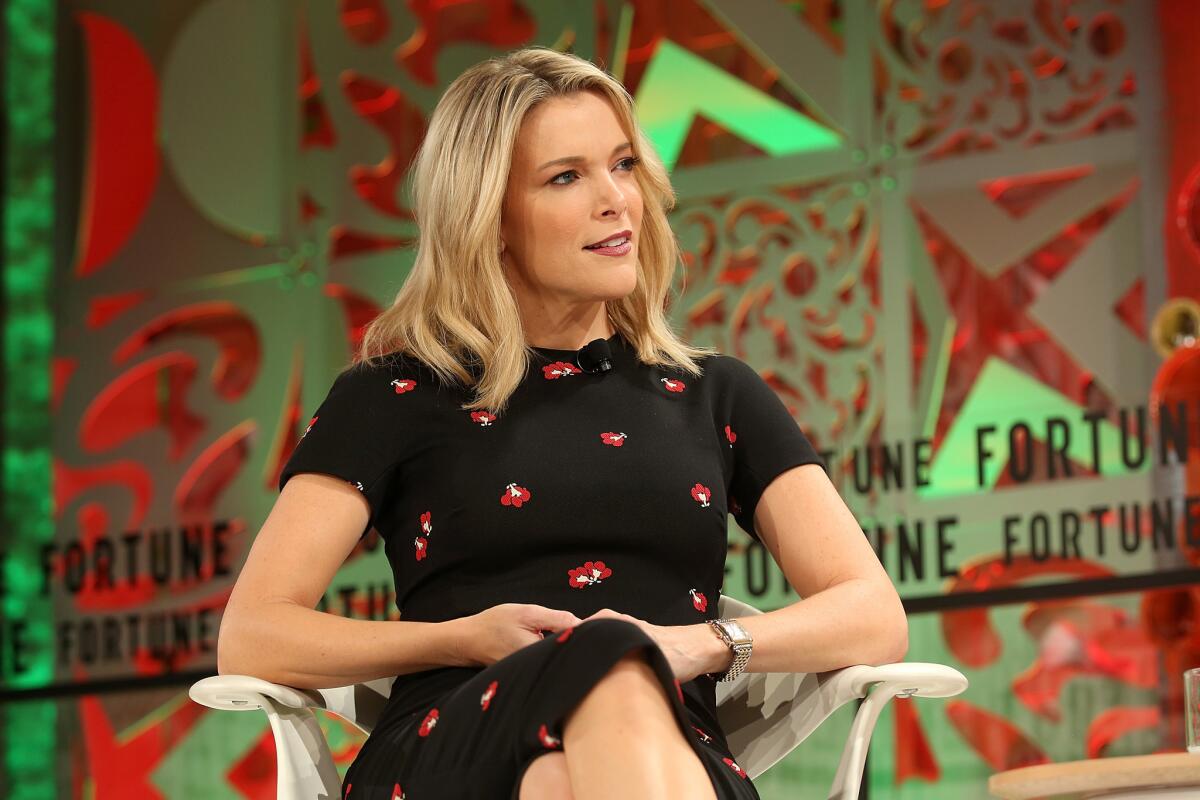
Halloween is always getting people in trouble. There’s just something about feeling liberated to dress in costume that makes people stupid. (I hate to bring this up, but remember how now-beloved Prince Harry turned up as a Nazi at a costume party years ago?)
On Tuesday, Megyn Kelly, host of the third hour of the “Today” show on NBC, embraced blackface as a Halloween costume choice. No, she didn’t don it. (Thank God.) But she and her fellow chatters were grumbling about all the costumes deemed politically incorrect when she suddenly dropped this: “What is racist? You truly do get in trouble if you are a white person who puts on blackface at Halloween or a black person who puts on whiteface for Halloween. When I was a kid, that was OK as long as you were dressing up as, like, a character.”
Seriously? Whom did she dress up as when she was a kid? Al Jolson?
Do we really need to give her a history lesson in the racism of white minstrels slathering their faces with black shoe polish to appear like bug-eyed, big-lipped caricatures of black people? And I know of no black person who put on whiteface — except for Eddie Murphy in that classic 1980s “Saturday Night Live” skit in which he went undercover as a white person and discovered that white people get perks such as being served cocktails on a public bus.
Kelly couldn’t stop there. Here’s her reaction to Luann de Lesseps, one of the (white) Real Housewives of New York, dressing as Diana Ross and darkening her skin: “People said that was racist and, I don’t know, I felt like, who doesn’t love Diana Ross? … I don’t know how that got racist on Halloween.”
Well, here’s how: She darkened her skin! If she had just put on the clothes and the wig and called it a night, I don’t think anyone would have called it racist. A bad costume choice, maybe, but not racist.
Here’s the deal: it’s racist to imitate a long-disgraced and racist type of performing.
Next week is Halloween. The “Today” show cohosts revel in dressing up in elaborate costumes. Please, Megyn Kelly, do not come dressed as Diana Ross. Or any black person.
Wave election or not, there will be more moderate voters in the water

There are two consistent messages in recent national polls about the coming midterm election. One, as seen in the latest results from USC Dornsife/Los Angeles Times, is that significantly more Americans plan to vote for Democrats than Republicans. The other, as illustrated by this new NBC News/Wall Street Journal poll, is that surging voter enthusiasm in both parties could lead to a huge turnout.
National surveys about voter preference should be taken with a full shaker of salt. The Democrats who dominate the coastal cities don’t get to vote in the GOP-led states lying between them. Yes, every midterm election since 2006 has been a “wave” election of some sort, shifting power dramatically in one chamber or the other. But as the person selling you mutual funds is duty-bound to tell you, past performance is no guarantee of future results.
The turnout projections are more interesting, coming at a time when President Trump’s unusually low approval ratings are climbing. He’s close to being in net positive territory — more voters approving than disapproving — for the first time in his tenure. Given the unblinking support from his base and unwavering hostility from Democrats, Trump’s improved ratings could be coming only from less ideological voters in the middle.
You could make a good argument that the approaching election has prompted these Americans to take stock of their circumstances — among other encouraging signs, the economy is growing more rapidly, wages are rising faster than inflation (albeit not by much), and there are more job openings than job seekers for the first time in years.
But Trump isn’t on the ballot himself. And as turnout rises, it brings in a growing number of voters whose politics aren’t defined by their virulent support for or opposition to the president.
The British-based nonprofit More in Common recently released a study, “The Hidden Tribes of America,” that used surveys to break the U.S. population into seven groups across the ideological spectrum. The report found fundamental disagreements between the left and the right about important issues, but also said this: “The reason American society appears to be split 50/50 is that the loudest and most extreme viewpoints monopolize airtime and social media space.”
By More in Common’s count, the extreme viewpoints account for only a third of the population. In a low-turnout election — like most midterms — those forces have disproportionate clout because they are the most engaged. The higher the turnout, the more that voters in the middle show up and dilute the power of the extremes.
Granted, we don’t know why voters camped between the left and right wings are motivated this year; they may be fed up with the way Republicans are running Washington, or they may want to keep Democrats from spoiling what they see as a good thing. Most likely, it’s both of those reasons and others too. With a group this disparate, more than one factor is certainly at play.
Still, the implication of the high projected turnout is that the Americans who are most interested in compromise are planning to cast ballots in this election. Many are also skeptical about Washington’s ability to get things done in an era of polarized politics, so may be eager for a change in tone and approach.
It would be great if these voters in the middle could cast a ballot for the compromise, bipartisanship and good faith they really want out of Washington. They can’t, of course — they can only vote for candidates and hope those qualities will emerge. So their message may be lost, depending on how things turn out Nov. 6. But this time, at least, it looks like they’ll be showing up.
The lies congressional Republicans are telling about their healthcare (voting)
Some congressional Republicans are apparently so desperate to hold on to their seats on Nov. 6 that they are willing to gamble that voters won’t notice their newfound affection for the popular parts of the Affordable Care Act that they tried to kill again and again.
From California to Pennsylvania, Republican candidates are claiming they support a popular consumer protection in the ACA that prohibits insurers from denying coverage to people with preexisting conditions, without mentioning they have voted dozens of times to repeal or undermine President Obama’s signature healthcare law and the provisions on preexisting conditions since it passed in 2010.
Orange County Rep. Dana Rohrabacher is among them. The Costa Mesa Republican is in a pitched battle against Democrat Harley Rouda, who is polling even with the incumbent.
Rohrabacher’s daughter Annika was diagnosed with leukemia when she was 8 (she’s 14 now) and in a campaign ad, her father links the experience to his appreciation for the nation’s healthcare system. “That’s why I’m taking on both parties, and fighting for those with preexisting conditions,” Rohrabacher says in the ad.
Oh please. Even after Annika got sick, Rohrabacher continued to vote, repeatedly, to flat-out repeal or defund the ACA. And just last year, Rohrabacher voted for the ACA replacement bill that would have allowed states to let insurers gouge people with preexisting conditions and, worse, drop coverage for the treatments many Americans may need.
So when did this conversion happen? Probably when the polls showed that his Democratic challenger just might win.
Look, it’s great if Republicans have finally come around on this important consumer protection. And if they had a true change of heart, then why not be straight with voters and say, “Hey, I was wrong about the ACA. It’s not all bad, and I think this part is pretty great even though the president I support is trying to undermine it.”
But that’s not what’s happening here. And voters shouldn’t let them get away with it.
Trump is exactly the wrong leader we need to respond to the caravan heading to the U.S.

As the caravan of thousands of mostly desperate Hondurans makes its way north through southern Mexico, one thing has become abundantly clear: President Trump and his brain trust have absolutely no idea how to handle it.
Fuming and frothing, Trump urged the governments of Honduras, Guatemala and El Salvador to stop the caravan and announced Monday morning that he “will now begin cutting off, or substantially reducing, the massive foreign aid routinely given to them.”
Something about the barn door and the fleeing horse comes to mind.
Trump also went full-crazed about who is in the caravan, tweeting that “criminals and unknown Middle Easterners are mixed in.” He added, “I have alerted Border Patrol and Military that this is a National Emergy. Must change laws!”
Exactly what law change he refers to is unclear, as the president has yet to offer any proposals of his own and nothing is on the front burner in Congress. He’s just shaking the rattle here. Also, what law change would address the ginned-up issue of Middle Easterners (evidence, please?) intermixed with Central Americans? And why is the unsupported allegation that Middle Easterners are in the caravan a different or additional problem, as Trump implies, from Hondurans trying to reach the U.S.? Hint: That high-pitched tone is a dog whistle.
Any administration deserves some sympathy for trying to figure out how to handle illegal immigration into the U.S., a problem exacerbated for more than a decade by Congress’ abject abdication of its responsibility to reform the dysfunctional immigration system. The issue vexed the Obama administration as well as the George W. Bush administration that preceded it (Bush pushed for comprehensive reforms that failed to move). It’s a bipartisan failure, another victim of the nation’s seemingly unbridgeable political polarization.
Trump, of course, blames only Democrats, hoping to use the caravan story to boost the Republicans’ flagging chances of retaining control of the House in the midterm elections already underway in California and other states with early voting systems.
But as The Times editorial board pointed out the other day, Trump screaming “The caravans are coming! The caravans are coming!” is a willful misread of the state of illegal immigration. More and more people come legally and overstay visas; net migration from Mexico is in the other direction, and most of the folks making the difficult trip to the U.S. border do so with legitimate fears that to do otherwise would imperil their safety amid intractable violence and gang wars in the places they left behind.
This is a thorny issue with a lot of nuance, two elements that the Trump administration has proven to be bad at handling.
Broadly, the number of people living illegally in the U.S. has held steady in recent years at just over 11 million people, roughly a quarter of the nation’s total foreign-born population (at the highest level in a century). Illegal border crossings have steadily dropped over the last decade, but within that decrease has come an increase in numbers of unaccompanied minors and families with minor children – overwhelmingly people fleeing for their lives.
This is where some of the nuance comes in. Broadly speaking, the violence comes from two sources: Street gangs whose roots trace to Los Angeles and other U.S. cities that were home to Central American migrants during that region’s civil wars in the 1980s (where the U.S. backed hard-right forces against leftists), and patriarchies in which law enforcement rarely intervenes in domestic violence. The latter problem has been so bad that immigration judges ruled during the Obama administration that Guatemalan women abused by their intimate partners could be considered a social class eligible for asylum in the U.S.; Atty. Gen. Jeff Sessions overturned that ruling earlier this year.
The Obama administration, which also stumbled in trying to address the problem, at least properly viewed the arrivals of unaccompanied minors and families as a humanitarian crisis — especially for parents so desperate that they saw the best option for their children was to send them north and plead for sanctuary at the American border.
Trump views that flow of the desperate as an “assault on our country,” a cynical attempt to portray the poor, the fearful and the battered as some sort of invading force.
Do the battered women of Guatemala deserve asylum in the U.S.? Does fearing violent neighborhoods make one eligible for sanctuary? Does the U.S. have a moral duty to offer help to people victimized by gangs that were birthed here? Those are questions worthy of discussion, and legislative attention.
But sputtering and fuming by the president does nothing to move us toward a solution. If the president was truly interested in reforming the immigration system, he’d be offering ideas and solutions. He’d be convening power brokers on all sides of the issue to try to forge a compromise approach and a path forward.
To the contrary, he has no interest in fixing the problem. It is through exploiting such political divisions that he finds his political strength — rallying a hard-right base opposed to immigration in a political system where elections are won by a minority of eligible voters. Turnout in 2016 was 60% of the voting-eligible population; Trump received 63 million votes, or 27% of the voting eligible population, from Americans concentrated in enough states to win the election.
Our federal elections tend to get won in the margins. Most House seats are gerrymandered to favor one party over the other, so the number of seats truly up for grabs is limited. Senate races aren’t subject to gerrymandering but they do tend to break reliably Republican or Democratic, depending on the tilt of the individual states — only 13 of the 50 states have split delegations in the Senate (including two states that elected an independent as one of their senators). And in the presidential election, the fight is over slices of the electorate in a handful of states that either party might be able to win. That usually hinges on rallying bases while appealing to relatively small blocs of voters.
So in the Trump political landscape, a caravan of the desperate isn’t a humanitarian crisis or a problem to be solved, but a moment to exploit.
Some leadership.
If progressives want women and people of color in office, they need to work harder to keep them safe
Last week, I received a series of texts from Verita Black Prothro, a woman I’d interviewed when I covered the women’s march in Reno nearly two years ago. Since then, Black Prothro decided to run for public administrator in Washoe County, the northwest Nevada district that contains Reno. Her speech at the women’s march animated the audience, which cheered and teared up as she spoke. “We pray that those who say they walk with Christ start acting like they walk with Christ,” she said of the Trump administration, which was just taking office. “In the Old Testament through the New, we’re told to care for the poor, the widows, and the orphans. This whole thing they call ‘tough love’ — that’s not mentioned in the Bible.”
So when I saw the first text — an image of a campaign sign with Black Prothro’s face covered in black spray paint except for her eyes and mouth and the “Black” in her name crossed out — I dropped my phone. It was such a degrading depiction of such a dignified woman that, for a moment, the whole thing did not compute.
But we live in a world where women and people of color are not safe and where women of color are exponentially less so. The Huffington Post has been keeping a running list of racist attacks on candidates of color. At the time of writing, twenty-three political candidates in this year’s elections were reported to have been victimized; three, including Black Prothro, are from Nevada. Black Prothro says that these experiences are more common than reported. For instance, when a Latino candidate in Nevada was shot at while campaigning in 2016, he didn’t talk about it until the election was over, worried it would negatively impact his chances.
And while a striking number of black candidates are running for office in November — including high-profile gubernatorial candidates Stacey Abrams, Ben Jealous and Andrew Gillum — some have pulled out of their races because of safety concerns.
“It’s hard enough to throw yourself out there to begin with,” Black Prothro says. “Then when you have the added layer of people either believing you don’t belong or that you don’t have any business running for office, it’s a scary experience.”
Seeing the sign — which was defaced at an intersection in Arrowcreek, one of Reno’s nicest neighborhoods — wasn’t the first time Black Prothro had felt afraid. When she was canvassing by herself in September, a man pulled his truck over, revved his engine and asked her what she was doing there. He was agitated, spitting mad. She lived in that neighborhood, as she had most of her life, she said, and she showed him her canvassing materials. “If I had been in a neighborhood that wasn’t mine, if I had run out of knock pieces…” she says, trailing off. It reminded Black Prothro of when someone called the cops on black politician Janelle Bynum while she was canvassing for re-election in her own Oregon neighborhood, claiming that she was acting suspicious.
So Black Prothro stopped canvassing alone. But even now, when she canvasses alongside a friend who’s running for state assembly, they divide up the streets. She’s skipped certain ones based on gut fears, fears that were amplified when her sign was defaced.
Because while progressives have celebrated the record number of female candidates and/or candidates of color running this year, they haven’t done enough to protect these challengers of the status quo. “People who are our allies, friends, and supporters need to understand that there is this added layer of risk,” Black Prothro says. “If we’re encouraging more women of color to run for office, we also need allies to do things like walk with us and make us feel safer.”
It’s a terrible catch-22; candidates of color need to work harder in order to reach out to constituents who would stereotype and devalue them, but they’re less safe when they do that outreach, particularly after work as it’s getting dark (which is when people are actually home) or in neighborhoods where they are less familiar (the exact neighborhoods they need to be doing outreach in).
For Black Prothro, the greatest strain has been on her family. “My mom saw it and said her chest felt tight. My kid didn’t want to go to school; he said, ‘I’ll stay home so I can protect you.’ People don’t think about the impact of these things on the people who love and care about you. They suffer this too,” she says. Black, Latino and otherwise marginalized candidates are putting themselves out there in a contentious environment where racists are feeling ever more emboldened. Many, considering these risks, may decide not to run at all.
Signs are tough to protect; they’re often put up outside homes, yes, but also in empty lots or along highways. But candidates are a different matter. After Black Prothro shared her experience on Facebook, a number of progressives reached out, offering to walk alongside her. They should be doing this proactively.
For decades, progressives have escorted women who need abortion care to clinics so that they feel protected from people who would do them harm. Now, it’s time for progressives to offer to walk alongside their candidates of color. Because it’s not enough for compelling progressive candidates like Black Prothro to throw their hats in the ring. They need to be able to get their message out in every nook and cranny of their districts if progressives actually want them to win.
There is a cost to complicit silence on sexual abuse. For USC, $215 million is just a downpayment
It looks like USC has finally gotten the message.
Following a series of scandals on campus that were only made worse by the administration’s attempts to quietly bury the problems, the university announced Friday that it had reached an agreement to pay $215 million to patients treated by Dr. George Tyndall, the longtime campus gynecologist accused of abusing and sexually harassing patients.
The “agreement in principle” calls for the university to provide $2,500 to every student who ever saw Tyndall at the campus health clinic and up to $250,000 to students who provide a written claim of abuse and who agree to be interviewed by a psychologist. An independent evaluator appointed by the court will decide the individual award.
USC’s Board of Trustees supports the proposed settlement, which was developed with the plaintiffs’ attorneys.
The fact that USC reached such a large and sweeping settlement so quickly is significant. It shows that the university acknowledges its failure to protect students and is willing to pay the price in an attempt to repair the damage.Tyndall was repeatedly accused of improprieties over the course of decades. The administration forced him out in 2017, but his misconduct was not revealed to patients or the USC community until a Times investigation was published in May.
That prompted hundreds of women to come forward with their stories of abuse and mistreatment by Tyndall. A total of 463 women have sued USC over the matter, according to The Times.
The university put a priority on reaching “a fair and respectful resolution,” interim President Dr. Wanda Austin wrote in a statement. “By doing so, we hope that we can help our community move collectively toward reconciliation. I regret that any student ever felt uncomfortable, unsafe, or mistreated in any way as a result of the actions of a university employee.”
The settlement is the right thing to do. But USC leaders have to reckon with the fact that the $215 million won’t be the final tally. The university will still be on the hook for attorneys’ fees. The settlement resolves a federal class-action lawsuit, but there are still hundreds of claims filed in state court.
Then there is damage to USC’s reputation from the Tyndall investigation and other scandals that prompted President C.L. Max Nikias to step down earlier this year. For years USC has been on the rise, climbing the national rankings of colleges and universities and raising billions of dollars to expand its footprint. How many students decided to enroll at another university because of the scandals? How many professors and researchers took jobs elsewhere? How many donors walked away?
There is a cost to complicit silence. The $215-million settlement is just a down payment.
Trump and the Democrats are waging midterm war over issues that affect only a tiny fraction of Americans

In the build-up for the midterm elections, Democrats are flailing Republicans over health insurance for people with preexisting conditions, and President Trump is flailing Democrats over a caravan of Central American migrants heading toward our southern border.
Both of these issues speak to deep-seated insecurities among overlapping groups of voters — the well-founded concern about rising healthcare costs, and less-well-founded fears about demographic and economic changes in this country. And both also shine a spotlight on what and whom Democrats and Republicans value.
But the two issues are being thrust at voters as if they were mountainous when, in terms of the number of people involved, they look a lot more like molehills.
Let’s start with preexisting conditions. Democrats have trained their fire on this issue because a number of GOP attorneys general, supported by the Trump administration, have filed suit in federal court arguing that Congress rendered the Affordable Care Act unconstitutional late in 2017 when it eliminated the tax penalty for people who don’t obtain insurance coverage. If they succeed, all the insurance reforms in the ACA — including those protecting people with preexisting conditions — will evaporate.
Like many in the GOP, Trump insists that Republicans would never, ever do anything to harm people with preexisting conditions:
That’s like saying all bosses support the employees they’re laying off. If Republicans really supported people with preexisting conditions, they wouldn’t be trying to repeal the legal provisions assuring that they can get coverage for those conditions without being gouged.
But here’s the thing. Most Americans have insurance coverage through large employer health plans or government programs, and under federal laws that predate the ACA, they are pretty well protected. If not barred by state law, a large employer plan could conceivably drop coverage for conditions or services needed by a worker. But for the coverage they do offer, they cannot exclude or charge higher premiums to workers because of their health.
The folks truly at risk here are those who buy insurance in the “individual market” served by the Obamacare exchanges. They make up about 7% of the population, or about 22 million people. And according to the nonpartisan Kaiser Family Foundation, a little more than a quarter of them have a preexisting condition that would have left them unable to obtain insurance before the ACA took effect. That’s about 6 million people — a big number in aggregate, but a very small share of the U.S. population.
So when the Democrats talk about people with preexisting conditions who are being threatened, chances are good that they’re not talking about you. The larger point buried in this issue, though, is that Democrats want to spread healthcare costs broadly across people with insurance, and Republicans don’t, preferring to let healthcare costs concentrate in smaller groups of people with expensive ailments (and then, possibly, subsidize those individuals — or not) so that healthier people pay less. That’s a fundamental difference between the two camps, and it’s the one we should be debating.
On the caravan, my colleagues on The Times editorial board pointed out how silly it is to get worked up about this marching band of migrants. The last time a supposedly giant caravan reached Mexico, in April, “government officials there dispersed most of the migrants and only about 150 reached the U.S. border,” the board wrote. “For comparison, so far this year, border agents have arrested an average of 42,651 migrants per month. The caravans are a drop in the immigration bucket and pose no significant risk to the United States.”
The dog whistle being blown here is that Central American immigrants represent the forces that are unquestionably reshaping the face and culture of this country. We can argue all day long about whether that’s a good or bad thing on any number of fronts, but Trump and his allies have painted a hyperbolically scary picture of people who cross the Mexican border illegally.
Again, just look at the numbers. By the time the latest caravan walks its way to the U.S. border, only a few dozen people are likely to be left in it. But even if all 2,000 arrived, backpacks in hand, they’d represent less than 5% of the people detained there every month. Put another way, almost four times as many Americans die every day as there are people in that caravan.
Trump is emphasizing the caravan because it puts into pictures what he sees is the failure of U.S. immigration policy. And because those pictures show low-income brown people, they feed the notion in the Trump Train’s xenophobic car that immigrants in the country illegally are takers, not givers.
Our immigration policy is well and truly broken, and Congress seems incapable of fixing it. But the folks now heading north from Central America are not just a vanishing small part of the problem, they’re the wrong symbol. As the editorial board noted, “New immigrants who are in the United States without authorization tend to be people from Asia who enter the country legally and then overstay their visas, not desperate border-crossers from Latin America.”
Trump’s mixed signals on attacking journalists: Murder bad, body-slamming good
President Trump mouthed some of the right words Thursday when he said it appears that dissident Saudi journalist Jamal Khashoggi had probably been murdered and that the consequences would be “very severe” if blame is firmly tied to the Saudi government. But, hours later at a campaign rally, he praised Montana Rep. Greg Gianforte, who won a special election last year despite body-slamming a Guardian journalist to the ground — an act for which Gianforte later pleaded guilty to a misdemeanor assault charge.
“By the way, never wrestle him,” Trump said to laughter from the crowd. “Any guy who can do a body slam ... he’s my guy.”
Remember, this is the same Trump who has described some U.S. media — the ones reporting stories he doesn’t like — as “enemies of the people,” routinely makes cordoned-off press pools targets of his supporters’ wrath during campaign appearances, and has supported some of the most illiberal and repressive authoritarian heads of state around the world, from the Saudi royal family to Filipino President Rodrigo Duterte to Turkey’s Recep Tayyip Erdogan, who at last count had imprisoned 237 journalists.
The Committee to Protect Journalists reports that at least 44 journalists have been murdered for doing their jobs so far this year; Khashoggi would be the 45th. That list includes four American journalists — staffers of the Capital Gazette in Annapolis, Md., who were shot to death when a gunman opened fire on their office in June. A fifth newspaper employee, a sales assistant, also died.
Over the past decade, the committee reports, worldwide at least 632 journalists have been killed in connection with their work.
And our president makes light over a physical attack by a politician against a working journalist. That’s dangerous territory.
When the ostensible leader of the free world openly targets journalists with his words, and gives wink-and-nod approval for physical attacks against them, he gives cover to the despots of the world.
You have to wonder whether that’s his intent.
Feinstein vs. De Leon was like watching a high school civics teacher debate an earnest infomercial salesman
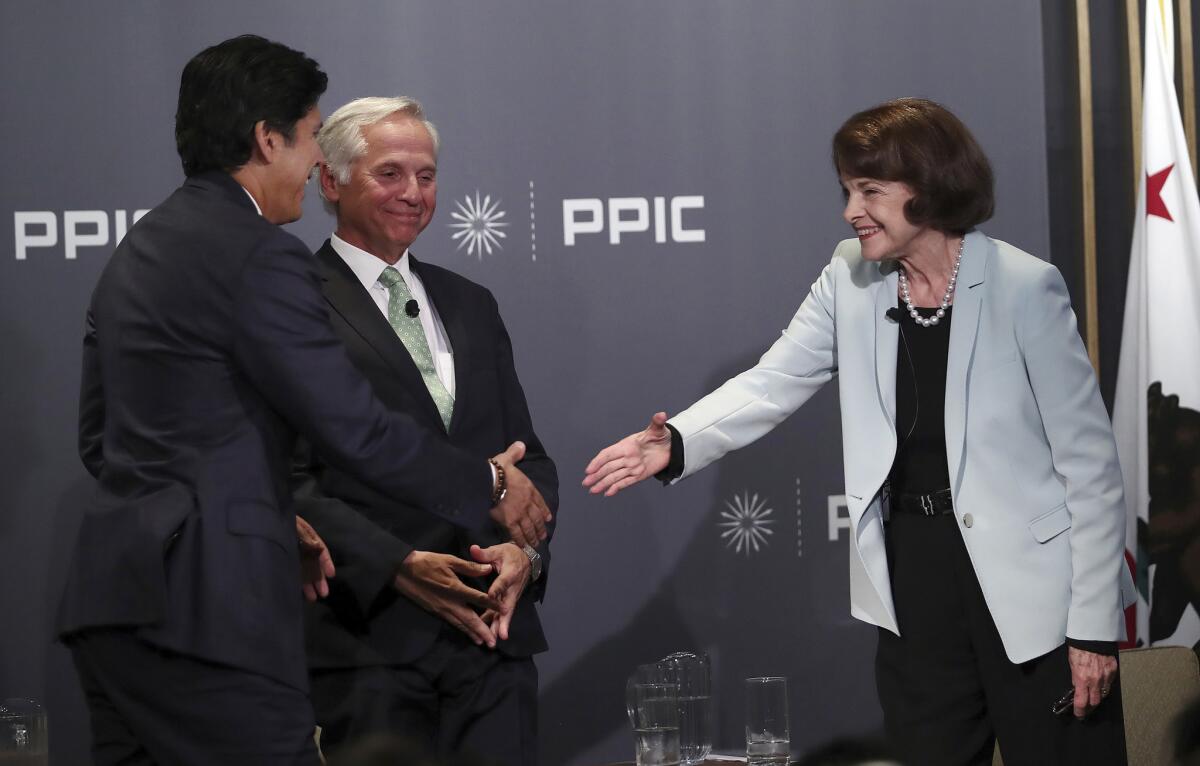
Watching the one and only debate between the two Democrats running for the U.S. Senate in California — incumbent Dianne Feinstein and her challenger, state Sen. Kevin de Leon of Los Angeles — I often found myself wondering what voters really wanted to hear from candidates. Was it their plans, or their ambitions?
Feinstein, whose been in the Senate long enough to have served in the majority and the minority twice, was all about plans. Incrementalism. Small ball.
De Leon, who enjoyed Democratic supermajorities during much of his time as president pro tem of the California Senate, was all about ambitions. Big, immediate change. Home-run swings.
Voters probably don’t want to be told how hard it is to get things done in the Senate. But like it or not, that’s the situation today. Routine use of the filibuster means that just about every piece of legislation requires 60 votes just to be considered on the Senate floor. And in recent years, the majority leader (both Republican and Democrat) has made it difficult even to offer amendments on the floor, for the sake of protecting vulnerable members of their party from having to cast votes on hot-button issues.
That left Feinstein explaining that she pushed only a temporary ban on assault weapons through the Senate in 1994 because the votes weren’t there for a permanent one. She also touted the lousy deal she struck with House Republicans on water legislation in 2016, saying, “It’s not perfect. It was the best we could do at the time.”
De Leon, on the other hand, argued that Democrats in Washington weren’t asking for enough. They’d shown a “lack of courage” and were “backpedaling all the time,” he complained; to De Leon, the better model was offered by Sen. Elizabeth Warren (D-Mass.), who might not prevail in legislative fights but who at least pushed her ideas out to a national audience.
In short, De Leon argued, the state’s representatives in Washington should be working harder to export California’s values and priorities to the rest of the nation, rather than battling to prevent Washington from imposing its values and priorities on California. In his view, that means pushing for such things as obtaining all U.S. power from renewable energy sources and adopting “Medicare for all, not Medicare for some.”
I suspect voters want to have it both ways. They want candidates with big goals who can get things done. I also suspect that voters want candidates who embrace both of those things while acknowledging the difference.
They didn’t get that from Wednesday’s debate at the San Francisco offices of the Public Policy Institute of California (whose chief executive, Mark Baldassare, moderated). De Leon came off as the earnest infomercial salesman promising a product too good to be true, and Feinstein as the civics teacher you ignored in high school.
“You can march, you can filibuster,” Feinstein said in response to De Leon’s call for greater militancy. “It doesn’t change anything. What changes things is elections.”
That may very well be true, but it’s a buzzkill of a message.
Two more fox-in-the-henhouse appointments by Trump spell big trouble for our wildlife and national parks
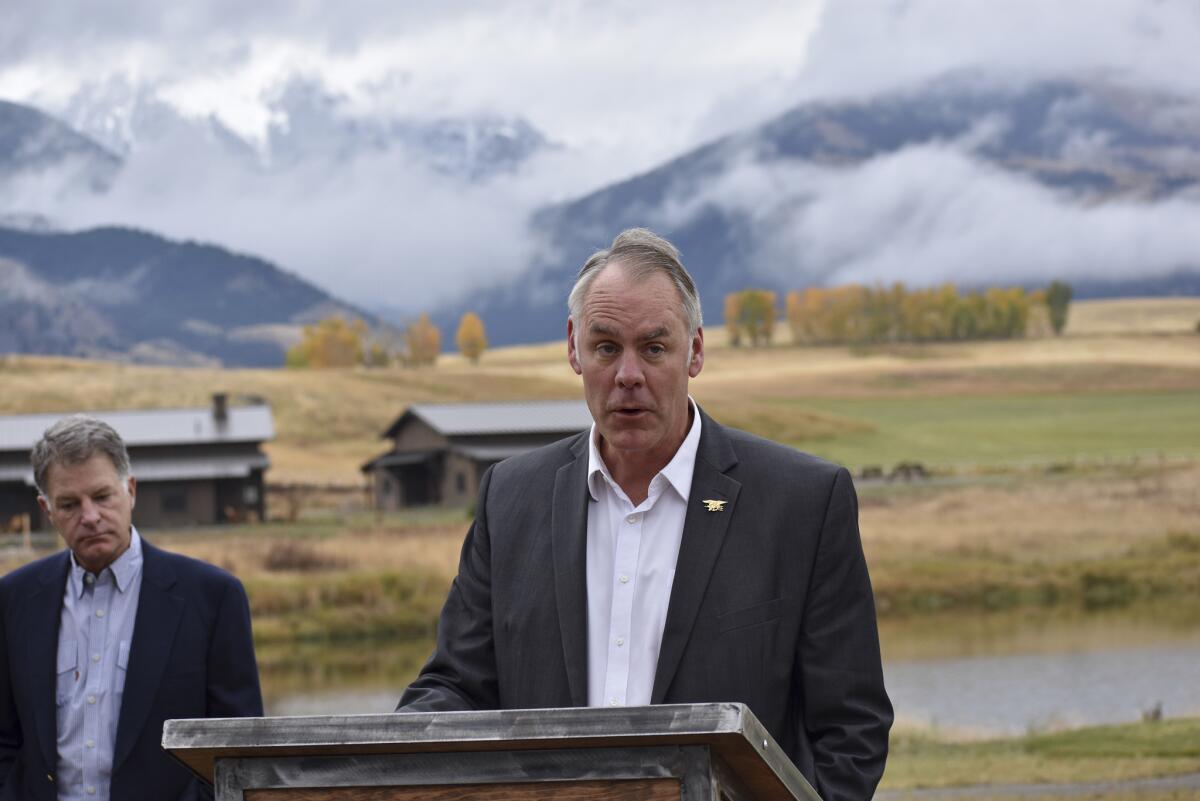
Two recent high-level personnel moves in the Trump administration’s Interior Department could well spell trouble for fish, wildlife and national parks, and raise serious questions about the credibility of the department’s multiple investigations into Secretary Ryan Zinke’s conduct and possible conflicts of interest.
First, the Trump administration has hired Wyoming attorney Karen Budd-Falen, who has made a career of criticizing and filing lawsuits over Interior Department policies, to be deputy solicitor for the Interior Department, where she will be involved in shaping legal opinions over fish, wildlife and parks.
Yes, the fox-in-the-henhouse scenario comes to mind.
Note that this is similar to Trump’s appointment of Scott Pruitt to run the Environmental Protection Agency, which as Oklahoma attorney general Pruitt had repeatedly sued over policy decisions. Before Pruitt was run out in an ethics scandal — OK, several ethics scandals — he sought a massive rollback of environmental regulations, many of which have fortunately been stalled by legal challenges.
Budd-Falen, who once represented Cliven Bundy, the Nevada rancher whose supporters waged an armed showdown with federal agents in 2014, has been aligned with the Sagebrush Rebellion, Westerners actively working to reduce federal control of public lands.
Environmental groups are, as one might imagine, concerned.
“Karen Budd-Falen is too extreme to be trusted with our national heritage,” Western Values director Chris Saeger said. “Someone who sides with armed militia groups and anti-public land zealots should not have a high-level job at the Department of Interior.”
The Wilderness Society’s Nada Culver said Budd-Falen’s “record with the law, her attempt to place an exaggerated version of private property rights over the public interest and her support of anti-public lands extremists like the Bundys — who were responsible for trashing the Malheur National Wildlife Refuge and intimidating public employees in 2016 — calls into serious question whether she can be trusted to apply the law on behalf of the Department of the Interior. Her appointment to this position is abysmal for the protection of wildlife, respect for sacred tribal lands and conservation of wild places that Interior is supposed to safeguard.”
A second personnel move threatens the integrity of Interior’s Office of Inspector General, which has open investigations into Zinke’s conduct and his wife’s travels on the taxpayers’ tab. The Trump administration shifted Suzanne Israel Tufts, a political appointee at the Department of Housing and Urban Development, to serve as acting inspector general at the Interior. She notably has no experience either in the department’s issues or in running investigations.
The issues currently being looked at by the inspector general’s office include: a Montana investment deal that involves the chairman of federal contractor Halliburton and property owned by a foundation connected to the Zinkes; Zinke’s decision, after a private meeting with MGM Resorts lobbyists opposed to the project, to overrule a departmental decision that would have allowed expansion of a Native American casino in Connecticut; and how Zinke and subordinates redrew Utah’s Grand Staircase-Escalante National Monument boundaries in a way that may have benefited a state representative who owns affected lands.
I’ll leave it as an open question whether Tufts is the perfect pick if the administration is trying to derail investigations, and just say that an inexperienced political appointee overseeing sensitive investigations does not instill much public confidence in the investigations themselves.
But then, what should voters expect from an administration that sees conflicts of interest as something of a birthright?
-------------
FOR THE RECORD
9:10 a.m.: An earlier version of this article identified Cliven Bundy as a Texas rancher. Bundy is from Nevada.
Grammar matters
Was the president feeling especially truthful today? Or does he just not understand how commas work?
Raise your hand when you see it.
Trump hasn’t come close to ‘draining the swamp.’ Can Democrats hijack his message?

How many stories about politics these days open with an anecdote about some new line being crossed?
At a televised debate Monday night between two Arizona congresswomen running to replace Sen. Jeff Flake (R-Ariz.), Republican Rep. Martha McSally accused Democratic Rep. Kyrsten Sinema of supporting treason — a federal crime that carries the death penalty. Sinema’s offense? When appearing on a libertarian’s radio show 15 years ago, Sinema did not object when her host asked her how she’d feel if he joined the Taliban.
The striking thing is that McSally and Sinema are far apart on a wide range of real issues that matter to every Arizonan, including taxes, healthcare and immigration. They don’t need to mud wrestle; the contrast between the two couldn’t be more clear — McSally is campaigning as a Trumpist, and Sinema as a moderate Democrat.
So why are we here? Scarcely a day goes by without some new low being reached. In fact, Michael Avenatti, the spotlight-seeking attorney for porn actress Stormy Daniels (real name: Stephanie Clifford), argues that this sort of ugly, antagonistic politics is the only way to play the game today. “You’ve got to engage in smash-mouth politics if you’re going to beat Donald Trump,” Avenatti said Monday in an interview with the Hill.
I know that plenty of readers blame us in the news media for the slide in discourse, given how we pounce on each new outrage. But right back atcha people — candidates go negative because the attacks get results. If they didn’t, and if voters instead punished candidates who engaged in (or whose allies engaged in) personal attacks on the campaign trail, then we’d see a lot more positive, issue-based races.
Nevertheless, the public is not happy with the state of politics today. The intense polarization seems to rankle everyone who’s not a die-hard partisan. And that discontent may very well fuel the fourth “wave” election in 12 years. Every midterm election since 2006 has led to a sweeping change of control in one or both houses of Congress, a sure sign that something is fundamentally wrong in the system.
Rep. John Sarbanes (D-Md.), chairman of the Democrats’ Democracy Reform Task Force, argues that the waves have been powered by a widespread sense among ordinary citizens that they are being ignored by their government. “In some ways, [President] Trump is the piece of driftwood that came in on this wave of anger,” Sarbanes said. “He was a message.”
In Sarbanes’ view, the public remains deeply skeptical about the ability to change what’s perceived as a rigged system. That was Sen. Bernie Sanders’ message in 2016 too as well as Trump’s, so clearly it resonates with voters on both sides of the political aisle.
That’s why Democrats have floated a blueprint for political and governing reforms they would pass if they regained the majority. In essence, it’s an Augean Stables agenda: tighten conflict-of-interest rules for government officials and the limits on lobbyists’ campaign contributions; attack gerrymandering and strengthen voting rights; and clean up campaign finance.
In other words, it’s the House Democrats’ version of “drain the swamp,” translated into weedy policy details.
Sexy, it’s not. This isn’t a manifesto about Democratic Party values like the House GOP’s “Contract With America” in 1994. Nevertheless, Sarbanes said, passing these bills would show Democrats’ willingness to take on the “special interests that have been rigging the system,” boosting their credibility on other priorities such as healthcare, climate change and taxes.
Not that the blueprint is merely an appetizer before the main legislative course. The issues involved are important ones, including how much leeway states should have over who can vote, what limits there should be on political speech by interest groups, and whether the public should offer tax dollars to help candidates who eschew big-dollar donors.
I’m not persuaded, though, that the public honestly wants to drain the swamp. It’s clear that Trump and his allies use that phrase simply to mean replacing Democrats in Washington with Republicans. With Trump in power and his favorability rating still low by historical standards, will voters now be content just to swap majorities? Or does the public really want to change the process itself?
It could take Earth ‘millions of years’ to recover from the extinctions we’re causing. That’s ... not good
As bad as human-powered climate change might be — and it’s very bad — we often lose sight of the other sins our species has committed against the Earth. Plastics in oceans acidifying from pollution. Human overpopulation and an overdraw of natural resources. Habitat destruction. Fools hunting for animal trophies (how hard can it be to stop that?).
Last year, a peer-reviewed study published in the Proceedings of the National Academies of Sciences described human impact on global flora and fauna as “biological annihilation.”
Now a new report in the same journal warns that the annihilation is progressing faster than evolution can handle, and that “without coordinated conservation, it will likely take millions of years for mammals to naturally recover from the biodiversity losses they are predicted to endure over the next 50 years.”
Most vulnerable are large and complex organisms with few relatives on the evolutionary tree.
“Large mammals, or megafauna, such as giant sloths and saber-toothed tigers, which became extinct about 10,000 years ago, were highly evolutionarily distinct. Since they had few close relatives, their extinctions meant that entire branches of Earth’s evolutionary tree were chopped off,” paleontologist Matt Davis from Germany’s Aarhus University, who led the study, said in a news release.
“There are hundreds of species of shrew, so they can weather a few extinctions,” he said. “There were only four species of saber-toothed tiger; they all went extinct.”
But the extinctions of smaller creatures are a risk as well. In many ways, insects’ role in agriculture feeds us, and they form a foundation for the food chain. In fact, extinctions of insects influence the fate of larger creatures.
Scientists in recent years have noted that life on Earth has undergone five “great extinctions,” in which biodiversity collapsed and species disappeared. That’s what felled the dinosaurs 65 million years ago or more, which had the silver lining of opening space for mammals (you know, us) to evolve. National Geographic has a succinct overview of these waves here, but the causes have ranged from asteroid impacts to submarine lava flows destroying ocean life to massive glaciation.
Scientists believe that Earth is in the throes of a sixth great extinction. Humans are causing it. Ultimately, we could become the victim of our own excesses (there’s an interesting bit of mathematical prognosis here).
The good news? Well, there really isn’t any. Authors of the new extinction study say that concerted efforts to prioritize conservation to ensure the survival of endangered large mammals could lead to the survival of more species and shore up biodiversity.
That’s optimistic, to say the least. We can’t even get ourselves to wage a meaningful fight against global warming, which is already having significant effects on how humans live. What are the odds we’ll work to save other species when we don’t seem to be able to save ourselves?
Your tax dollars at work: The U.S. vows to keep stopping Canadian pot-smokers from crossing the border
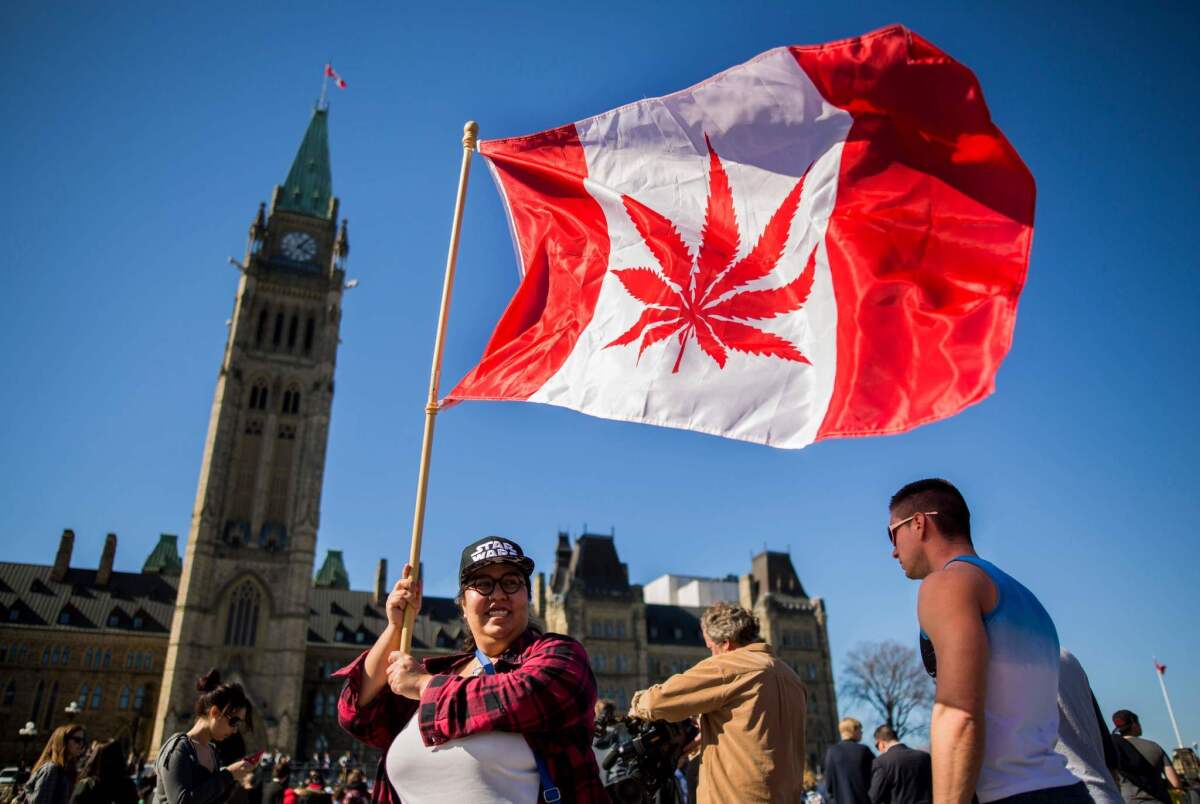
Here’s another example of how the U.S. government’s failure to acknowledge the shifting politics and public opinion on marijuana is creating a mess: On Wednesday, Canada will legalize recreational pot nationwide. But Canadians who admit to using this now-legal product could be banned from entering the United States.
That’s right — one lawfully purchased pot brownie could get a Canadian traveler blocked at the border.
That’s because the U.S. government continues to treat marijuana as a Schedule 1 drug, just like heroin. Last month the U.S. Customs and Border Protection Agency announced it would not adjust its border entry policies in response to Canada’s decision to liberalize its drug laws.
Instead, the agency will continue its stringent enforcement of the Immigration and Nationality Act, which bans entrance to travelers who admit to working in the marijuana industry, investing in a marijuana business or just using marijuana.
Such hard-line enforcement has already resulted in Canadians getting barred from entering the U.S., including a 57-year-old construction worker who made the mistake of telling agents the truth when they asked if he had smoked pot before he got his official medical marijuana license in 2010.
CBP officials said last month that agents are not planning to interrogate every Canadian traveler about marijuana use. But border agents do have broad discretion to ask questions of people seeking entry to the U.S., and they retain the authority to turn away noncitizens who admit to having used a controlled substance, ever.
This puts Canadian pot users in an impossible situation. If they admit to using a product that is legal in their country, they could be banned from coming into the U.S. If they lie about using marijuana and get caught, they also face a travel ban.
What’s even more crazy is that eight states in the U.S. have made it legal under their laws to use marijuana recreationally, and 30 states allow the medicinal use of marijuana. A traveler could visit, say, Seattle and legally smoke marijuana, then return to his home country. If on his next trip to Washington state he honestly answers a border agent’s inquiry on marijuana use, he could be banned from the U.S. In other words, travelers could be barred from visiting because of something they’d done legally in this country.
Excluded travelers can apply for a waiver from a lifetime ban. It costs about $600 to apply, plus legal fees.
The purpose of the law is to prevent drug trafficking, but the way it’s being applied could mean that many law-abiding Canadians get blocked from traveling to the U.S. for tourism, business or to visit family. That makes no sense.
States and now nations continue to liberalize their marijuana laws. How much longer can federal lawmakers bury their heads in the sand?
Is Trump pacifying yet another dictator? Or is there a method to his madness in handling the Saudi prince?

According to President Trump, the Saudi Arabian consulate in Istanbul is even more dangerous than a country run by Democrats.
Talking to reporters on the White House grounds Monday, Trump said he’d spoken to Saudi King Salman about the disappearance of Saudi journalist and dissident Jamal Khashoggi, who was last seen entering the aforementioned consulate on Oct. 2.
“The king told me that Turkey and Saudi Arabia are working hand-in-hand, very closely, on getting to the bottom of what happened” to Khashoggi, Trump said. “Maybe — I don’t want to get into his mind — but it sounded to me like maybe these could have been rogue killers.”
Yikes! The thought of trigger-happy (or possibly bone saw-happy) assassins doing their business inside what is supposed to be the safest place for a Saudi Arabian citizen in Istanbul is chilling.
But of course Trump didn’t mean that. Instead, he was offering what my colleague Mike McGough referred to as the “Henry II defense”: the idea that some Saudis took it upon themselves to get rid of Khashoggi after hearing the king or his son, Crown Prince Mohammed bin Salman, complain about what a pain he’d become.
Even the Saudis are poised to admit that Khashoggi was killed in the consulate by mal-intended government officials, according to CNN:
Which is why the “rogue killers” story line is a thing. Sen. Chris Murphy (D-Conn.) suggested on Twitter that the Saudis had been shopping around for someone to embrace this theory, and Trump complied:
The president is the perfect candidate for this role, given how little interest he shows in the facts before weighing in on an issue. But Trump may also have made a strategic choice reflecting his experience as a dealmaker.
Trump haters will no doubt recoil at the thought of cutting the president any slack on this issue, but Khashoggi’s disappearance puts him in a tough spot. The Saudis are crucial allies on a number of fronts, often acting as a restraining force against OPEC’s worst impulses, resisting Iran’s ambitions in the region and helping to preserve much of the Arab world’s grudging peace with Israel. They play that role not because they share many of our values, but because they share many of our objectives. Oh, and yes, while the kingdom may not be able to trigger a recession with an oil embargo, it could certainly put a real dent into U.S. growth. So there’s that.
At the same time, the crown prince has behaved like an iron fist in a velvet glove. He has supported reforms, albeit haltingly, as he has sought to attract foreign investment and reduce the kingdom’s dependence on oil, but he has also cracked down on political rivals and opponents while pushing a risky, destabilizing and, for Yemenis, calamitous foreign policy.
By uttering the “rogue killers” line, Trump may have been looking for a way for Mohammed bin Salman to preserve face, holding Saudis — but not the top leadership — responsible for Khashoggi’s fate. That smacks of realpolitik, but as noted above, the Saudis aren’t just any ally.
But if that’s the strategy, it’s awfully cynical. A more straightforward — and braver — approach would be to level with the public about the calculation being made. On one side is the importance of U.S. moral leadership and its longstanding defense of the right to free speech; on the other is the value of Saudi Arabia as an ally. We’ll be able to see eventually which way the scales tip for the Trump administration, but it would help to understand why.
Perhaps “rogue killers” was just another spontaneous utterance from a president who does that sort of thing continually, and the White House will eventually walk it back. Or maybe it was just another bit of groundwork being laid, like the tweet Friday from Donald Trump Jr. suggesting that Khashoggi was a terrorist sympathizer, and the president himself pointing out that Khashoggi is (was?) “not a United States citizen.”
At the end of the day, the question is whether the president will hold the Saudi leadership responsible for the accumulation of outrages and try to persuade them to rein it in. His comments Monday morning about his chat with King Salman — “His denial to me could not have been stronger that he had no knowledge. And it sounded like he, and also the Crown Prince, had no knowledge” — weren’t encouraging on that front, but we don’t know what exactly what was said.
And it’s always possible that Trump has been quietly gathering evidence of Saudi misbehavior that he could use to make a persuasive case for change. Kind of like Dean Wormer.
There’s only one word for Americans who go on trophy hunting sprees in foreign lands: Depraved
The multiple photos of the wild animals in Africa that were slaughtered by one of Idaho’s top wildlife officials are almost too horrific to believe. Did Fish and Game Commissioner Blake Fischer kill them legally in Namibia? Yes, apparently. (Disgusting.) Of course, hunters do this all the time in African countries that are willing to sell them licenses to kill in exchange for huge sums of money.
So, what Fischer got — and we got, because he proudly emailed them around — were photos of him grinning over the bodies of numerous animals, including a family of four baboons. He knelt, triumphantly, behind the baboons, their dead bodies clustered together. The smallest one was in front, with its head thrown back, blood on its chest.
There’s only one word for this: depraved. It doesn’t matter if it was legal. It doesn’t matter if he thinks he can justify it — as hunters have told me — as some primal urge to shoot things that move really fast, as some sport challenge. In the end, this guy did nothing less than massacre more than a dozen animals to amuse himself (and, apparently, his wife). Like I said, that’s depraved.
The fact that he’s also supposed to be a steward of wildlife in Idaho says not much good about how the Idaho governor picks fish and game commissioners. Oh, I’ve heard the explanation for this too — that state wildlife commissioners are supposed to protect wildlife for observing as well as hunting. All that together is supposed to be part of conservation.
But in fact, if you look at conservation from a holistic point of view — in terms of conserving the resources of the planet overall — then if you do hunt an animal, you should do it for food, for sustenance. I guarantee you that Fischer did not kill a family of baboons to eat them. Nor did he kill a giraffe, leopard, impala, sable antelope, waterbuck, kudu, warthog, gemsbok and eland — as reported by the Idaho Statesman — to eat them. He killed them to make trophies of them.
The Idaho Statesman has followed this story closely, reporting that the trip occurred last month and that “Fischer and his wife shot at least 14 animals in Namibia, according to the photos and descriptions included in the email he sent to more than 100 recipients.”
The response back in Idaho, at least from some former fish and game commissioners, has been alarm and consternation, according to the Statesman. One or two have decried what he did. But others have been upset only that he sent so many photos around, essentially saying, “Dude, if you’re gonna do this, don’t email the photos all over the place! Non-hunters will be unhappy and try to ruin things for all the rest of us hunters!”
This reminds me of the situation in 2012 when former California Fish and Game Commission President Dan Richards went to Idaho (yes, the state that spawned this Fischer guy) to shoot a mountain lion — legally — then posed triumphantly with it in a photo. That triggered an avalanche of outrage in California (where killing mountain lions has been outlawed for more than two decades) from state lawmakers and animal welfare advocates alike, who called for his resignation. (Didn’t happen. He just faded off the scene at the end of his term.)
One way to curb this kind of repulsive killing is for the U.S. government not to allow these hunters to bring their trophies back into the country. In most cases, hunters need import permits for their animal trophies. The U.S. should just stop granting them.
Another way is for the airlines to step in — and they have. When a Minnesota dentist killed the beloved lion, Cecil, in Africa in 2015 and sparked international outrage, several American airlines joined other European and Asian airlines in refusing to carry big-game trophies on their planes. So forget about putting your animal heads in those cargo holds or under the seat in front of you.
After hearing about this disturbing story, I saw another story that is, practically, the counter to this one. On Sunday night, “60 Minutes” did a profile of photographer Joel Sartore and his quest to photograph all animal species on the planet. Sounds wild and improbable. The piece showed how funny and difficult and, ultimately, doable his goal is. He too “shoots” animals — with a camera under uncomfortable, occasionally dangerous conditions. So far he has snapped 8,255 species. His portraits are captivating, otherworldly and, unlike the photos the Fischers sent around, the utter embodiment of life.
Trump’s Commerce Secretary Wilbur Ross lied to Congress. Will they do anything about it? Stop giggling
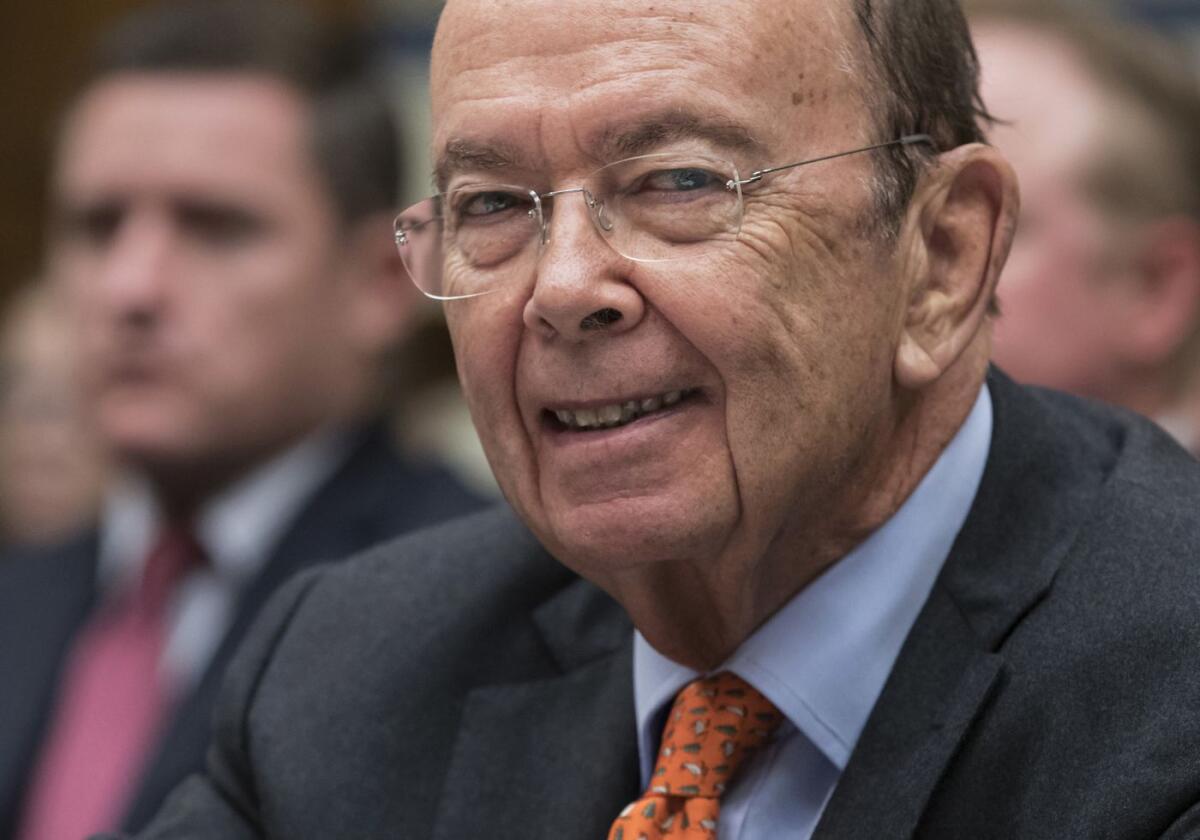
So it looks like Wilbur Ross was being, how do I put this, less than truthful when he explained to Congress earlier this year how he came to add a citizenship question to the 2020 census.
Big shrug, you say? Well, it’s true that lies from this administration come as regularly as the sunrise.
But a cabinet officer offering false or intentionally misleading information in testimony to Congress isn’t the kind of thing that ought to be shrugged off.
Especially when it comes in service of an effort to cook the census by scaring immigrants fearful of government contacts into not participating, likely leading to an undercount that could water down political representation in blue states and urban areas that are inclined to support Democratic candidates and liberal policies.
Now that the nation knows Ross wasn’t telling the truth, the question is whether Congress will do something about it.
No, wait, let me change my own bit of testimony. It’s perfectly clear that this Congress will do nothing, even though the executive branch appears to have told it a bald-faced lie. Again.
The discovery of Ross’ embrace of “alternative facts” came in lawsuits challenging the addition of the citizenship question, which Ross originally said was sought by Atty. Gen. Jeff Sessions to help the Department of Justice enforce the Voting Rights Act to protect minority voting rights.
Please, stop giggling. The laughter makes it hard to concentrate.
It turns out Ross actually came up with the question after conversations with Steve Bannon, at the time a top advisor (and prince of darkness) to Trump. Bannon told the secretary to talk with Kris Kobach, a leading vote-suppressor, about adding the question.
This isn’t the first time Ross has do-si-doed with the truth. He told a whopper to Forbes magazine when it was trying to estimate his wealth. His fortune is much smaller than this titan of capitalism wanted the world to believe. Sound familiar?
At some point, GOP leaders in Congress — you know, the folks who stand on law and order and personal responsibility — are going to have to do something about this mess. Or they may find themselves on a shrinking iceberg surrounded by liars and cheats.
Washington got it right: This country executes the weak and, occasionally, the innocent — not the worst of the worst
The Washington State Supreme Court got it exactly right when it ruled Thursday that the state’s death penalty, as it is applied, is unconstitutional because who gets killed has more to do with race, wealth and the predilections of prosecutors than it does with how heinous the crime was. Rather than executing the so-called worst of the worst, the nation’s capital punishment states tend to execute the weakest of the weak and, occasionally, the innocent.
There’s a reason why increasing numbers of political conservatives are working to abolish the death penalty. At the risk of sounding flip, if people don’t think the government can get anything right, why in the world would they expect it to get the death penalty right?
And we’ve seen it over and over again. Since 1973, more than 160 people have been freed from death row — five here in California alone — after they were found to have been wrongly convicted. Hundreds more who were not sentenced to death have also been exonerated, often decades after the conviction. And a 2014 study published through the Proceedings of the National Academy of Sciences estimated conservatively that at least 4.1% of people sitting on America’s death rows were innocent of the murders for which they had been condemned.
Two legal experts recently published “Death in America under Color of Law: Our Long, Inglorious Experience with Capital Punishment,” an overview of the arc of state-sanctioned killing that also details at least 16 instances since 1984 in which people for whom there was credible evidence of innocence went to their deaths anyway.
So how does that tie in with the Washington court decision? Because it’s yet another inflection point in the path away from capital punishment. The Supreme Court has upheld the constitutionality of capital punishment — it is mentioned in the Constitution — but it has long struggled with whether the methods of executing people violate the 8th Amendment’s ban on cruel and unusual punishment.
One of the hurdles for the court has been the notion that the 8th Amendment, and perceptions of what is cruel and unusual, “must draw its meaning from the evolving standards of decency that mark the progress of a maturing society,” as Chief Justice Earl Warren wrote in a 1958 case that decided whether a U.S. soldier could be stripped of his citizenship for deserting (he couldn’t, the court ruled).
In the death-penalty context, the nation’s evolving sense of decency is moving away from state-sanctioned killings as punishment. Fewer states now allow it — with Washington newly added to that list. Fewer juries are imposing it. And states are conducting fewer executions, due in no small part to a move by pharmaceutical companies to ban the sale of lethal-injection drugs to prisons.
So there is a shift in our collective standard if decency when it comes to executions, a consequence largely of highly publicized botched executions and the steady parade of people being freed from death row because they were wrongly convicted. Each case is another blemish on the criminal justice system and the notion that it can reach anything near certainty that someone convicted of murder actually committed it.
A system that flawed should never be used to decide whether someone lives or dies. And conservatives, particularly, should be uneasy over the prospect of government exercising such powerful control over an individual life. It’s the ultimate in government over-reach.
Here’s an idea: Let’s call climate change ‘Obama warming’ and watch Trump jump into action
My colleague Jon Healey had a good overview Wednesday on the tricky road ahead for a national carbon tax. The short version: Republicans won’t support anything with the word “tax” attached to it.
And President Trump likely won’t like a carbon tax, either, unless the proceeds flow up to his fellow one-percenters.
But the world knows Trump does like a couple of things: using his name as a brand, and having his ego stroked.
So here’s how we get to a carbon tax. We simply start calling it a “carbon plan.” And we put the president’s name in front of it: “Trump’s carbon plan,” or “Trumpcar” for short.
Then we find a way to make him think charging for carbon emissions was his idea all along, an emanation of the self-described “very, very large brain” (sperm whales have large brains, too) that, according to the president, China respects. This is the same China that Trump believes cooked up climate change as a hoax, so citing China’s view of his brain leads us into a bit of cranial dissonance, but we’re used to that.
Come to think of it, this branding thing could be an effective grand strategy for dealing with Trump. Just put his name on everything that would help the nation, and put Barack Obama’s name on everything that hurts the country and needs to stop.
So if we all start calling the massive tax cut and giveaway to corporations and the wealthy that Trump signed last year “the Obama cut,” we could probably get him to insist Congress rescind it.
We could make some necessary tweaks to the Affordable Care Act, or Obamacare, to make it better, and call it Trumpcare. He’d sign that bill in a heartbeat.
And global warming? Call it Obama warming and Trump will lead the international effort to combat it.
And while we’re at it, let’s start arguing that only an Obama would run for a second term.
Yeah, that’s the ticket.
The UK has its own ‘gay wedding cake’ case

Remember the “gay wedding cake” case decided by the U.S. Supreme Court earlier this year?
Officially known as Masterpiece Cakeshop vs. Colorado Civil Rights Commission, the case involved Jack Phillips, a Christian baker in Colorado who refused to “create” a cake for the wedding celebration of a gay couple and found himself the target of a complaint that he had engaged in discrimination on the basis of sexual orientation.
By a 7-2 vote, the court ruled in favor of Phillips. But the justices punted on what seemed for a while to be the key issue in the case: whether requiring Phillips to bake a cake for Charlie Craig and Dave Mullins would have forced him to engage in “compelled speech” in violation of the 1st Amendment.
Instead, the court held that some members of the Colorado Civil Rights Commission who found that Phillips had engaged in discrimination had displayed “a clear and impermissible hostility toward the sincere religious beliefs that motivated his objection.”
But now the Supreme Court has ruled on a request for a cake with a clear pro-gay-marriage message — only it’s not the U.S. Supreme Court.
On Wednesday, the five members of the Supreme Court of the United Kingdom unanimously ruled in favor of a Christian baker in Belfast, Northern Ireland, who refused to bake a cake for a gay-rights event. The customer, Gareth Lee, had asked for a cake that would be decorated with images of Bert and Ernie, the logo of a group called QueerSpace and the message “Support Gay Marriage.”
Writing for the British court, Lady Hale said: “The bakers could not refuse to supply their goods to Mr. Lee because he was a gay man or supported gay marriage, but that is quite different from obliging them to supply a cake iced with a message with which they profoundly disagreed.”
The contrast with the Jack Phillips case is stark. One of the reasons the U.S Supreme Court may have decided to finesse the compelled-speech issue in that case is that it wasn’t clear whether Phillips would have been speaking — or how loudly — by baking a cake for the gay couple.
Phillips had insisted that his job was to use his artistic skills to make “custom-designed” wedding cakes, which suggests a distinctive personal message. But the court noted that Craig and Mullins left Phillips’ shop without mentioning the design they were interested in (let alone a particular inscription in icing).
If the wedding cake Phillips would have “created” for a gay couple was indistinguishable from the one he would have supplied a heterosexual couple, the “compelled speech” argument would have been a reach. By contrast, the baker in Belfast was clearly being asked to use his confectionary skills to send a message.
The British court obviously relied on different legal authorities than the ones that guide the U.S. Supreme Court. Nevertheless, there is a certain amount of cross-pollination between the American and British legal systems. Hale cited several of the opinions in Masterpiece Cakeshop, suggesting that even some of the U.S. court’s liberal justices might see things her way in a case similar to the one before the British court.
So it wouldn’t be outlandish to have a U.S. Supreme Court justice refer to Lee vs. Ashers Baking Co. in a future “gay wedding cake” case on this side of the water.
Exxon came up with a climate change response that Republicans should love. They probably won’t

The carbon tax proposal that Exxon Mobil is backing is the only one that has a prayer of becoming a reality in the United States. I’m not saying it’s likely to be enacted anytime soon, I’m just saying it’s a tax increase designed with some political savvy.
On Monday the giant oil and gas company announced that it would contribute $1 million over the next two years to Americans for Carbon Dividends, a nonprofit group lobbying for a gradually rising federal tax on carbon. That tax revenue would be returned to the public in the form of monthly checks. The group is led by two former U.S. senators, Trent Lott (R-Miss.) and John Breaux (D-La.), known for their friendliness to the energy industry, and its plan was written by two luminaries from previous Republican administrations, James A. Baker III and George P. Shultz.
The main argument in favor of carbon taxes is that increasing the price of carbon would provide a powerful incentive for people to use less fossil fuel and reduce greenhouse gas emissions. In other words, it harnesses market forces to combat climate change, rather than imposing regulations to dictate reductions in carbon use.
The Baker-Shultz plan also tries to overcome the Grover Norquist problem — the backlash against Republicans who vote for any new taxes — by calling for a tax that’s revenue neutral. The government would collect the money, then return every penny of it to the public.
But if the tax is simply refunded, you ask, how would that encourage people to cut their carbon use? Because everyone would receive the same rebate — an amount equal to the statewide average in carbon taxes paid — which means that people who use less than the average amount of fossil fuels would come out ahead. That’s a powerful incentive to take mass transit whenever possible, say, or to switch to an electric car.
That’s another example of how a carbon tax could put market forces to work in the fight against climate change, which should increase its appeal among Republicans in Congress. But here’s the most obvious problem for proponents: If policymakers don’t think greenhouse gas emissions are a problem, they won’t see any reason to throw sand in the gears of the U.S. economy by making fossil fuels considerably more expensive.
The Trump administration falls into the latter category, and its actions and rhetoric on the topic may be increasing Republican skepticism about climate change. A Gallup poll in March showed that more Republicans in 2018 felt that the media were overstating the risks of climate change than in the previous year. The same poll found that only 42% believed that “most scientists believe global warming is occurring.” That’s jarring; even if you don’t agree with the scientific consensus on this issue, you have to concede that most scientists do, in fact, say global warming is real.
Reports like the latest one from the Intergovernmental Panel on Climate Change suggest we are at a crucial moment in the fight to slow global warming, with horrific consequences almost guaranteed to ensue if we don’t step up our efforts. Raising the price of carbon may be the most effective weapon in that battle, and the tax-and-dividend plan seems like the most politically feasible. But it won’t stand a chance if the administration and Congress continue to deny that there’s a problem to be solved.
John Cox has the real estate experience to help California’s housing crisis. Too bad he doesn’t have any ideas
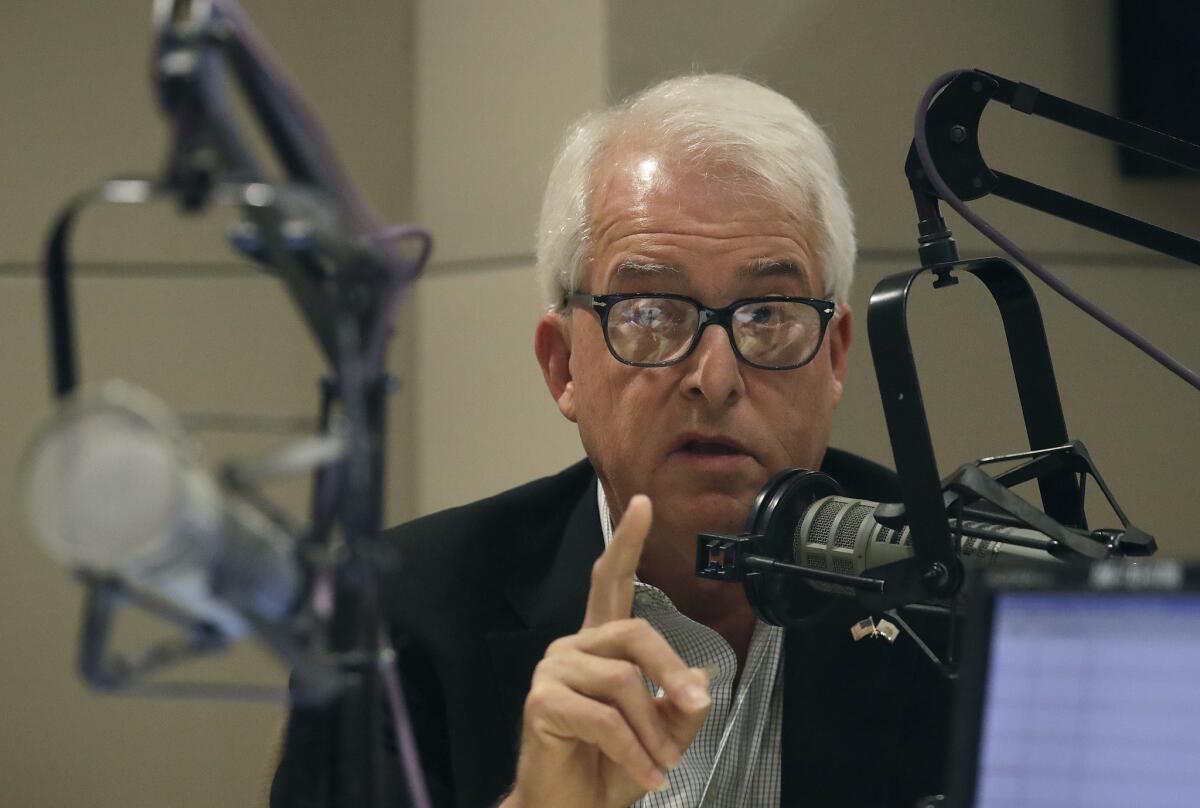
It’s no surprise that California’s insanely high housing costs were the first topic that gubernatorial candidates Gavin Newsom and John Cox tackled during their one and only debate Monday.
What is surprising – and frustrating – is that Cox actually has expertise in the real estate development business and should be able to offer some practical ideas for lowering the cost of new construction. Instead, his answers to questions about the state’s housing affordability crisis were vague pronouncements rather than substantive plans.
“I build apartments for a living,” Cox said during the debate. Cox is president of Equity Property Management, which has developed and manages apartment buildings in the Midwest; his opponent, Lt. Gov. Gavin Newsom, has a long track record in public office. That gives Cox a pretty good vantage point to critique California’s home building regulations.
“I can build apartments in other states that I operate in for a fourth or a fifth of what they cost to build in California. The reason is red tape, taxes, lawsuits, approval processes that take forever,” Cox continued.
OK, he raises some legitimate issues, well documented by the Legislative Analyst’s Office. Builders do face higher costs in California than in other states. Most of the red tape, taxes (and fees) and approval processes that Cox complains about are the result of local land-use policies that add time and expense to home construction.
Would Cox support limiting local government’s ability to stop or slow housing development? Nope. Cox said locals should have the power over land-use decisions.
So, what would he do instead?
“One of things I would do is reform CEQA, which has been turned into an effort by trial lawyers to sue competitors and stop development and that is limiting the supply of housing,” Cox said during the debate.
The California Environmental Quality Act has been blamed for slowing construction. Homeowners and other groups have used CEQA lawsuits to stop construction or shrink the size of apartment complexes in the middle of cities. While lawmakers like to pass measures exempting football stadiums and basketball arenas from CEQA, they have been unwilling to adopt more significant changes that would make it easier to build housing.
So what changes would Cox make in CEQA? He didn’t give a lot of details during the discussion. Sure, it’s hard to get into specifics during a fast-paced debate, but Cox’s website is equally devoid of details.
His website links to his plan for reforming CEQA, but the plan is nothing more than a vague promise to “replace the sledgehammer of the California Environmental Quality Act with a greatly streamlined set of sensible reforms.” What are those sensible reforms? There’s no mention of what they might be.
With CEQA reform, the devil is in the details. While many interest groups, from city governments to environmentalists to businesses, concede the need to make it easier to build housing and transit systems, few want to give up the power that CEQA gives them.
Cox could use his company’s experience building apartments in Indiana to compare and contrast that state’s housing policies to the ones here. What red tape does California layer on housing construction that Indiana doesn’t? What taxes? California cities, for example, impose hefty development fees to offset the impact of the new housing or pay for public services. Are those fees part of the problem? Are public attitudes toward housing development different in the Midwest?
The point is, Cox is uniquely positioned to use his industry expertise to talk about how other states handle housing development. He could spur a conversation about what Californians need to do — and what they’d be willing to give up — in order to get more affordable housing.
But he’s not offered detailed proposals or anything beyond boilerplate denouncements of special interests. And that’s a missed opportunity for Cox and for California.
Both parties are weaponizing the Kavanaugh fiasco. Will independent voters get sick of it and stay home?
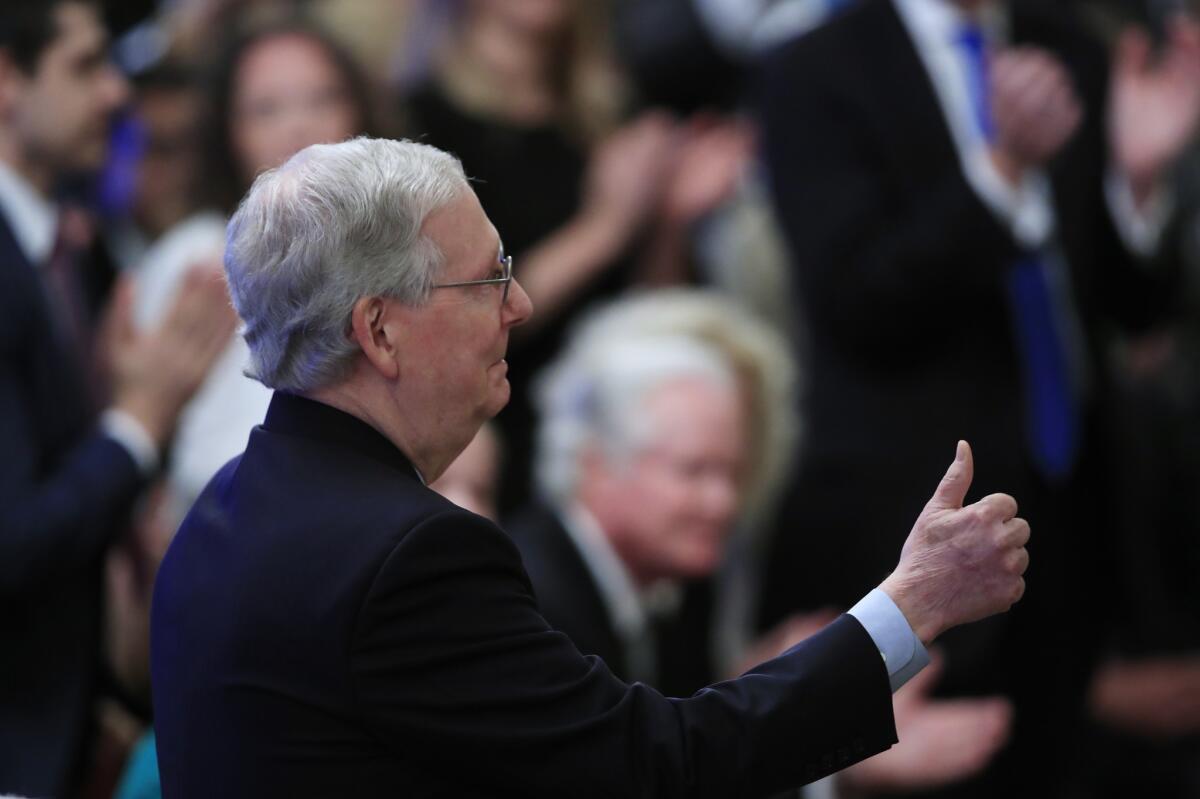
As Republicans bask in the glow of the Brett Kavanaugh confirmation, right-of-center pundits are coalescing around the view that Kavanaugh rescued his nomination by, as Matt Damon put it on “Saturday Night Live,” starting at an 11 and taking it to about a 15 real quick. The point was to cast Kavanaugh as a victim too — and someone who would forcefully defend his integrity.
I don’t buy that.
Another bit of conventional wisdom emerging from the right is that Democrats were their own worst enemies in the Kavanaugh fight, and they’re only hurting themselves more now.
I do buy that, kinda sorta.
As I noted in shortly before Kavanaugh was nominated, the procedural deck was stacked in favor of confirmation as soon as the Senate neutered the filibuster on Supreme Court nominations in 2017 (to overcome Democrats’ opposition to Neil M. Gorsuch). As long as Republicans stayed united behind the nominee, there was nothing Democrats could do to stop Kavanaugh from ascending to the highest court in the land.
Kavanaugh’s record as an appellate judge was solidly in the conservative mainstream, so his only real challenge was to reassure the two Senate Republicans who seem to care about abortion rights — Maine’s Susan Collins and Alaska’s Lisa Murkowski — that he wasn’t hell-bent to repeal Roe vs. Wade. Even then, there was a chance Kavanaugh could pick up a handful of votes from Senate Democrats representing red or swing states.
Stuck behind the 8 ball, Kavanaugh’s opponents had only one hope: that they could quickly dig up something about the judge that would disqualify him. And then, voila — someone leaked the existence of Christine Blasey Ford’s letter to Sen. Dianne Feinstein (D-Calif.) accusing Kavanaugh of sexually assaulting her when they were teens enrolled in private schools near the nation’s capital. Suddenly, Kavanaugh’s confirmation didn’t seem so certain.
Here’s where the GOP “fight back” notion comes in. Under this thinking, Kavanaugh saved himself by forcefully denouncing the attacks, shifting the focus from his behavior as a teen to the Democrats’ tactics.
The judge’s emotional, hard-to-watch defense of his own reputation may well have allowed him to assume the victim’s mantle in the court of public opinion. But he squandered some of the sympathy he earned by unleashing an unprecedented partisan attack, accusing Democrats on the committee of conspiring to defeat him out of resentment for President Trump’s win in 2016 and Kavanaugh’s own work investigating President Clinton as part of independent counsel Ken Starr’s team in the 1990s. This battle was never about either of those things — it was always about the threat posed to abortion rights, gay marriage and other court rulings prized by Democrats.
Kavanaugh’s attack-dog performance unsettled some of his supporters and gave Democrats an angle that had nothing to do with the disputed allegations of sexual misconduct. (It also helped persuade the L.A. Times’ editorial board to oppose the judge’s confirmation.) What saved the nomination was the GOP unifying around the position that Republicans would have taken even without Kavanaugh’s histrionics: Decades-old, uncorroborated allegations, they argued, are insufficient reason to reject an otherwise well-qualified nominee.
The argument was buttressed by the FBI’s quick and limited investigation into the allegations leveled by Ford and one of Kavanaugh’s fellow students at Yale University, Deborah Ramirez. And the GOP’s appeal to fairness gained traction as the allegations against Kavanaugh grew more extreme and attenuated from his fitness for the bench.
The whole ugly spectacle isn’t likely to fade from the public’s consciousness anytime soon, and neither side appears ready to let it go. Republicans are trying to motivate voters by touting some Democrats’ plans to investigate and potentially impeach Kavanaugh should they gain control of the House next year; Democrats, meanwhile, are hoping to keep the fires of resentment burning over the elevation of a man accused of sexual assault.
In other words, both sides plan to keep reminding people about the worst aspects of this whole episode. And Democrats’ inability to grasp the long-term implications of their threats — I mean, if they impeach Kavanaugh in the House, they’d still have to persuade the Senate to convict him — plays right into the GOP’s hands here, feeding the caricature of Democrats as radicals.
Whether this works to the Republicans’ advantage, though, depends on who shows up to vote in November. Will Democrats’ anger at getting rolled drive more voters to the polls than Republicans’ fear of Nancy Pelosi with a gavel? At least as important, will voters in the middle get so sick of no-holds-barred politics that they stay home, or will they hold one of the two parties responsible?
For what they’re worth, “generic ballot” polls — surveys that ask registered voters whether they would vote for a Democrat or a Republican to represent them if the election were held that day — have shown a marked preference for Democrats throughout the past year, and that preference ticked up a bit in recent days. CNN’s latest poll, which was taken in the days before and after the Senate’s vote on Kavanaugh, showed a yawning gap among women voters.
That gap isn’t lost on either party. And it’s another reason Democrats won’t stop playing the Kavanaugh card.
Trust us, Melania, it’s for the best we focus on your wardrobe

“I wish people would focus on what I do, not what I wear,” Melania Trump told a gaggle of reporters on Saturday, who had gathered in Giza, Egypt, to chronicle her blitz through Africa.
What she’d worn the day before, and what she was referring to, was a pith helmet. Whether planting trees in pale pink stiletto heels, sporting her infamous “I Really Don’t Care, Do U?” Zara jacket to visit children separated from their parents at the border, or tooling around in a 19th century colonial administrator hat, Melania’s sartorial choices have been terribly memorable.
Can’t a woman vogue around the pyramids in a linen suit without being personally victimized by the sexist media?
Never mind that these were all choices — the pith helmet doesn’t strap itself on, if you know what I’m saying — that could have been avoided by wearing something normal like, eh, I don’t know, a khaki dress or a coat that didn’t say “Talk About Me, Please For the Love of God, Talk About Me” on it. So as to what she did…
On her first solo trip abroad, Trump said she was going to “take the message of my Be Best campaign to many of the countries, and children, throughout Africa. Whether it is education, drug addiction, hunger, online safety or bullying, poverty or disease, it is too often children who are hit first, and hardest, across the globe.”
It’s not clear what the Be Best campaign, launched in May, does, or is intended to do. Initially, it was framed as an anti-cyber-bullying initiative, the language of which was cribbed from an Obama-era booklet. Now, it’s apparently about addressing education, drug addiction, hunger, online safety or bullying, poverty, and disease, especially as it relates to children, not just in the United States but also “throughout” Africa (or at least in the four countries she visited last week).
She held hands. She kissed babies. She did some of the usual White House duties, laying a wreath at a slave port in Ghana, visiting a hospital and providing school supplies to some kids. She played with elephants. She saw historic sights. She gave away Be Best tote bags. She met with government officials.
None of this is damning in and of itself. It’s just the age-old “You get a pencil! You get a pencil! I get a safari!” form of foreign aid that stands in for systemic change. It becomes damning against the backdrop of her husband looking to gut PEPFAR, a comprehensive HIV program started by the Bush administration. He has twice attempted to cut USAID funding by 33%. And while only two African countries are affected by the Muslim ban, nearly a third of the world’s Muslim population lives in what her husband so memorably described as the continent’s “shithole countries.”
“I’m so proud of the work this administration is doing through USAID and others,” she said before she left. Of course, she can have her own views; she said as much before the Giza photo shoot. But she can’t pretend that her husband’s policies support her professed intentions.
I’m glad Melania got to see the pyramids; they’re spectacular. Happy to have helped pay for it. But at this point, when it comes to whatever else she’s up to with Be Best, the campaign to end all forms of human suffering in all continents one bewildering press conference and one airdropped pencil at a time, I really don’t care. Do u?
Melissa Batchelor Warnke is a contributing writer to Opinion. Follow her on Twitter @velvetmelvis.
Taylor Swift just proved she’s not all about the cheddar
Pop megastar Taylor Swift disrupted the space-time continuum over the weekend by endorsing a Democrat in the race for an open seat on the U.S. Senate in her home state of Tennessee.
This was viewed in some circles as cataclysmic (and in others as overdue) because, like so many contemporary pop hit makers, Swift has kept silent on many of the burning issues of our day. That may be a smart way to hold onto a fan base that crosses geographic ideological lines (although it skews young and female); the oft-cited cautionary tale here is that of the Dixie Chicks, whose criticism of President George W. Bush led many country radio stations to drop them while they were hot. But it also feeds the “shut up and play” mentality toward celebrities — whether it be music, sports or entertainment — that denies them the right to be actual humans with opinions that might just conflict with their fans’ view of the world.
But I digress. What struck me about Swift weighing in was that it wasn’t an endorsement of Democrat Phil Bredesen — a guy with a substantial track record, having served eight years as the state’s governor. Instead, it was a repudiation of Republican Rep. Marsha Blackburn, one of the music industry’s biggest and most reliable allies in Congress.
Just listen to Blackburn talk about the Music Modernization Act earlier this year on Twitter:
Talk about red state voters acting contrary to their own pocketbooks.
But Blackburn is so much more than a water-carrier for music-industry copyright holders. She’s been a leader in the GOP’s efforts against Planned Parenthood, abortion rights and fetal tissue research. Swift did not mention those issues, which are divisive; instead, she focused on Blackburn’s views that are increasingly out of the mainstream: her opposition to the bipartisan Violence Against Women Act and to LGBTQ rights, including gay marriage.
It’s not exactly a profile in courage for someone in the entertainment industry to say the sorts of things Swift did in her Instagram post (“I believe in the fight for LGBTQ rights, and that any form of discrimination based on sexual orientation or gender is WRONG. I believe that the systemic racism we still see in this country towards people of color is terrifying, sickening and prevalent.”). That’s the stuff of the typical Oscar acceptance speech. And despite her country music roots, Swift is a genre-free pop star now, as deep in the entertainment-industry mainstream as one can be.
Yet in training her fire on a champion of her industry’s priorities, Swift showed that she’s not all about the cheddar. And unlike Kanye West’s support for President Trump, she doesn’t appear to be doing this just to be controversial; that’s his stock in trade, not hers. Nor does her post help her sell tickets (she’s on the other side of the Pacific Ocean at the moment) or push a new album (her next one isn’t expected until late 2019).
In other words, she has more to lose from this endorsement than she has to gain. No matter how you feel about Blackburn, Bredesen or politics intruding on your pop music, take a moment to appreciate Swift’s willingness to put her earnings where her mouth is.
The world faces catastrophe without drastic action on global warming. Do we have the will to fix it?

The warning couldn’t be any more clear and direct: Without near-immediate action, the world will fail to limit global warming to 1.5 degrees Celsius above pre-industrial levels, according to a new and highly anticipated report by the Intergovernmental Panel on Climate Change. And the chances of the human race actually coming together to address the problem are not very good, the report says.
The result: A radically different environment, with rising seas, species disappearing, food chains in chaos and human migration and competition for resources leading to political instability. The poorest nations and the lowest-lying countries will suffer the most, but there will be plenty of impact to go around from bigger swings in extreme weather (more and stronger hurricanes), more extreme drought and more extreme flooding, depending on where people live.
The temperature rise can be combatted, if political and industry leaders show the will. The IPCC says the rise can be capped at 1.5 C (less than 3 degrees in Fahrenheit) if global carbon pollution is cut 45% before 2030 (in 12 years), and reaches zero emissions by 2050. As the Guardian reports, “This would require carbon prices that are three to four times higher than for a 2 C target (set in the 2015 Paris agreement). But the costs of doing nothing would be far higher.”
Global governments have the information. What they do with it will determine how much more damage we do to the planet, and to ourselves.
“We have presented governments with pretty hard choices. We have pointed out the enormous benefits of keeping to 1.5 C, and also the unprecedented shift in energy systems and transport that would be needed to achieve that,” Jim Skea, a co-chair of the working group on mitigation, said. “We show it can be done within laws of physics and chemistry. Then the final tick box is political will. We cannot answer that. Only our audience can — and that is the governments that receive it.”
The big question for Americans is whether anyone in the Trump administration will even bother to read the report. As the Times editorial board noted late last month based on early news coverage of the report’s contents:
“Even the Trump administration, which wants to burn fossil fuels with an arsonist’s glee, has acknowledged the impacts of climate change in official reports, though it defies and occasionally denies the science of climate change in formal policies and statements. Remember, President Trump wants to withdraw the U.S. from the Paris agreement, which would make us the only — only — country in the world to not be a part of it. Yet a pending draft report from the National Highway Traffic Safety Administration defending Trump’s desire to freeze fuel efficiency standards for cars and light trucks predicts that global temperatures will rise by 4 degrees Celsius over pre-industrial levels by the end of the century. Incongruously, the report argues that since the world is baking anyway, higher emissions from cars and light trucks won’t make much difference. And the Pentagon recognizes that rising seas threaten military bases, particularly naval installations, around the globe. But the administration seeks to make the problems worse rather than take steps to combat them.
“Humanity is spinning pell-mell toward self-inflicted disaster, and the largest economy in the world — the country with the second highest industrial output — has official policies to ignore it. Indeed, the U.S. plans to add to the problem for the sake of short-term energy sector financial gains. Whether Trump’s policies are bred of ignorance or cynicism, they push the nation — and the planet — into ever-more dangerous territory.”
For sexual assault survivors, the Kavanaugh confirmation is a hell made of ice, not fire
Hell — its contours, qualities and contested existence — is an enduring source of fascination for many of us mortals. Saint Augustine, the fourth-century bishop and philosopher, wrote that “hell, which is also called a lake of fire and brimstone, will be material fire.” A thousand years later, poet Dante Alighieri wrote the Inferno, in which his narrator travels through nine concentric circles of Hell. In this depiction, however, it grows ever colder as they approach the core, where they find Satan trapped in a block of ice up to his waist. Several centuries after that, Robert Frost considered both fire and ice as a means of torture; “either would suffice,” he concluded. (The Bible, for its part, suggests neither.)
During the Kavanaugh hearings this past week, which have been, for many of us, unbearable, I’ve thought of Frost, Alighieri and Augustine.
Fire requires stoking; to establish eternal flame, wood, gas or brush must be continually available for consumption. Ice is less high-maintenance; the climate just needs to be cold year-round. You can, as 1990s telemarketers enthused, set it and forget it. This week, I learned: it’s ice, not fire, that the GOP is after.
Don’t buy Kavanaugh’s last-minute semi-apology
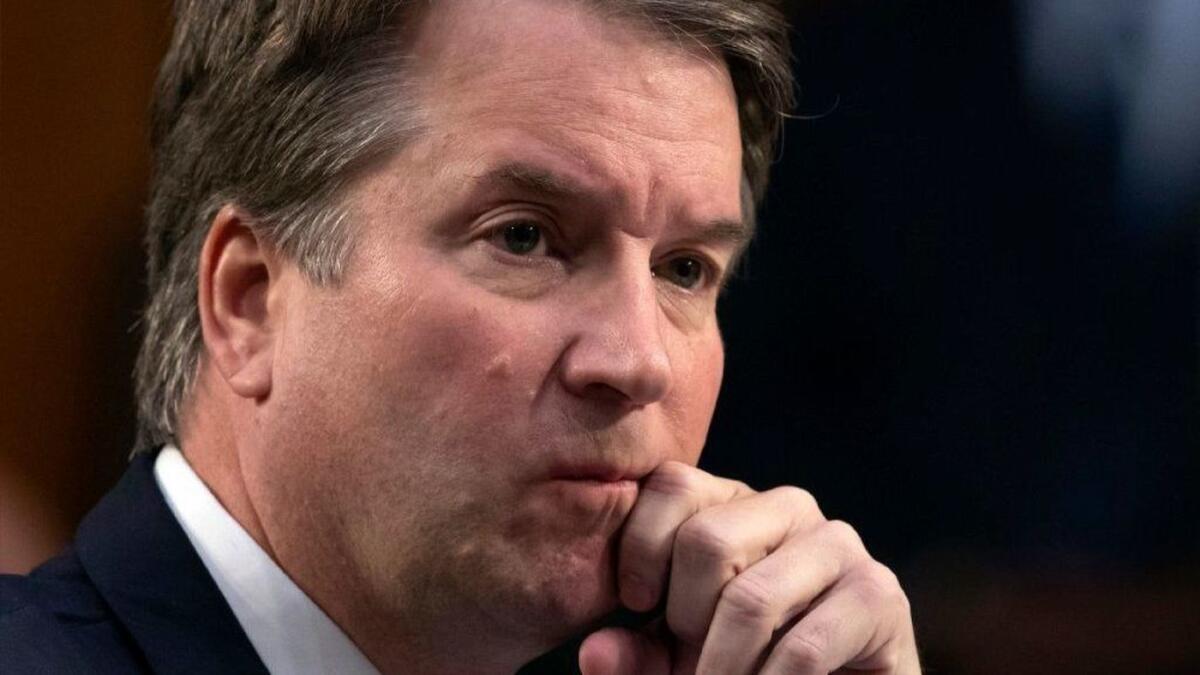
Many who oppose the confirmation of Judge Brett Kavanaugh for a seat on the Supreme Court — including the editorial board of the Los Angeles Times — have cited his emotional, and partisan, comments last week when he testified before the Senate Judiciary Committee to rebut allegations of sexual abuse.
Kavanaugh railed against a ”calculated and orchestrated political hit, fueled with apparent pent-up anger about President Trump and the 2016 election” and speculated that he was the victim of “revenge on behalf of the Clintons.” In what sounded like a threat, he warned: “What goes around comes around.”
Kavanaugh’s angry partisanship prompted 2,400 law professors to oppose his confirmation in a letter that said the nominee “displayed a lack of judicial temperament that would be disqualifying for any court, and certainly for elevation to the highest court of this land.”
On Thursday night, on the eve of a procedural vote on his nomination, Kavanaugh responded to the criticism with an opinion column in the Wall Street Journal titled: “I Am an Independent, Impartial Judge.”
Not exactly apologizing, Kavanaugh wrote:
“I was very emotional last Thursday, more so than I have ever been. I might have been too emotional at times. I know that my tone was sharp, and I said a few things I should not have said. I hope everyone can understand that I was there as a son, husband and dad. I testified with five people foremost in my mind: my mom, my dad, my wife, and most of all my daughters.”
He then asked the public — and undecided senators — essentially to expunge this episode:
“Going forward, you can count on me to be the same kind of judge and person I have been for my entire 28-year legal career: hardworking, even-keeled, open-minded, independent and dedicated to the Constitution and the public good.”
There are a couple of problems with Kavanaugh’s almost-apology.
First, although he said he was testifying as “a son, husband and dad,” he was also a sitting judge and a candidate for the Supreme Court when he attacked Democrats in the Senate, the Clintons and “the left.”
Second, judicial ethics involve appearances as well as interior motives. If Kavanaugh were confirmed and ruled in what could be perceived as a partisan way, his over-the-top comments to the Judiciary Committee will be remembered regardless of his insistence that he was speaking as a “son, husband and dad.”
If Kavanaugh’s purpose in writing this article was to convince a few wavering senators, it might have been successful. On Friday morning the Senate voted 51-49 to advance his nomination, setting the stage for a final vote this weekend. Skeptics among the general public will be a harder sell.
The Kavanaugh nomination has left no one unsullied

As the Brett Kavanaugh melodrama nears its conclusion, a few lines from Echo and the Bunnymen’s “The Cutter” come to mind:
Am I the worthy cross?
Will I still be soiled
When the dirt is off?
The Senate vote this morning to curtail debate on Kavanaugh’s nomination all but guarantees that the judge will be elevated to the nation’s highest court. But the incredibly ugly path taken to get to this point has not only put a cloud over Kavanaugh that may never lift, it’s damaged the Senate’s already weak reputation and cast the Supreme Court in more vividly political hues. There’s plenty of blame to go around, so let’s start assigning it.
President Trump gets credit for picking a nominee who was well qualified, respected by his peers and a relatively mainstream legal thinker, albeit clearly conservative. And he was remarkably restrained — even presidential, go figure — in his comments in public and on Twitter. Then suddenly he went back to being Dennis the Menace, mocking Christine Blasey Ford at a rally and reminding everyone in this country that their president had been accused of sexual misconduct too.
Senate Judiciary Committee Chairman Charles Grassley (R-Iowa) and Senate Majority Leader Mitch McConnell (R-Ky.) moved Kavanaugh’s nomination at a feverish pace, refusing to wait even for the National Archives to supply all the pertinent documents from Kavanaugh’s years in President George W. Bush’s administration. Their haste made it seem as if they were trying to hide something — despite the fact that Kavanaugh’s long tenure as an appellate judge provided an ample record of his approach to the law.
Sen. Dianne Feinstein could not have made a bigger mess of Ford’s allegations had she tried. Given the stakes here, the moment Ford’s letter arrived in July, Feinstein should have explained to her that an off-the-record allegation of sexual assault, as serious and alarming as it may be, would have zero effect on the nomination. If Ford really wanted to inform the process, she had to be willing to answer questions from the committee — potentially in private, but as a named person. And Feinstein really should have warned Ford about something everyone who works in Washington knows: No secret is safe there.
Instead, Feinstein hung on to Ford’s missive, helped her find a lawyer, and eventually forwarded her allegations to the FBI — after reporters somehow found out that Feinstein had a document from someone accusing Kavanaugh of a sex crime. At which point all hell broke loose, and the nomination became a referendum for many Americans on whether women who accuse men of sexual assault will ever be taken seriously.
Not that anyone else on the Senate Judiciary Committee, with the exception of Sens. Jeff Flake (R-Ariz.), Amy Klobuchar (D-Minn.) and Chris Coons (D-Del.), would have made the Founders proud. By deciding which way they were going to vote before Kavanaugh made his first appearance, and then sticking to their positions after Ford’s allegations went public, they eliminated any probative value the hearings might have had. It was a display of the worst aspects of our polarized Congress.
Kavanaugh can be forgiven for getting angry and feeling unfairly attacked. But unleashing his inner rage monster and spewing vitriol and threats at Democrats on the panel? That went beyond unseemly and straight into unfit-to-wear-a-robe territory. He tried to make amends with a public apology of sorts on the Wall Street Journal op-ed page Friday, but that felt as stage-managed as his extraordinary (and unjudicial) appearance on Fox News to defend his nomination.
Nor did Kavanaugh help matters during his first round before the Judiciary Committee by giving less-than-forthcoming answers to questions about important legal issues. He was fully within the nominee mainstream on that front too — since Robert Bork, would-be federal jurists have been coached to keep their cards close to their vest, particularly on hot-button issues like abortion rights. By being cagey on this front, however, nominees detract from their own credibility. And in Kavanaugh’s case, that laid the groundwork for later Democratic attacks on his candor.
The people most culpable for this mess, though, were the extreme partisans on both sides. The stop-Kavanaugh-at-all-costs Democrats clung to the fantasy that defeating this nomination would open the door to a justice more to their liking. That was never an option; elections matter, especially presidential ones. The opposition’s eagerness to find something, anything to make Kavanaugh unpalatable to the Senate’s handful of persuadable Republicans only made Republicans more determined to confirm him; it also cast doubt, deservedly or not, over the allegations by Ford and others who came forward after the hearings.
And of course the search for dirt on Kavanaugh pulled up some things that should have stayed buried, such as Julie Swetnick’s wild accusations (which she later dialed down).
On the other side, you have the likes of Ed Whelan, who publicly accused one of Kavanaugh’s prep-school classmates for Ford’s alleged assault, and Sen. Lindsey Graham, whose over-the-top attack on Feinstein and other Democrats on the Judiciary Committee set a new low for partisan rancor. They were the bellows that pumped up the flames, calculating that the more Republican voters resented the attacks on Kavanaugh, the better it would be for the judge — and for the GOP in November.
Ugh. Republicans appear certain to win this battle and put Kavanaugh on the court, where he’s expected to be a more reliable fifth vote for conservative rulings than the justice he will replace, Anthony Kennedy. Let the Supreme Court kegger jokes begin! Here’s hoping they will at some point be funny, not just painfully sad.
Vernon Madison is too dementia-ridden to find the toilet next to his bed. Alabama still wants to execute him
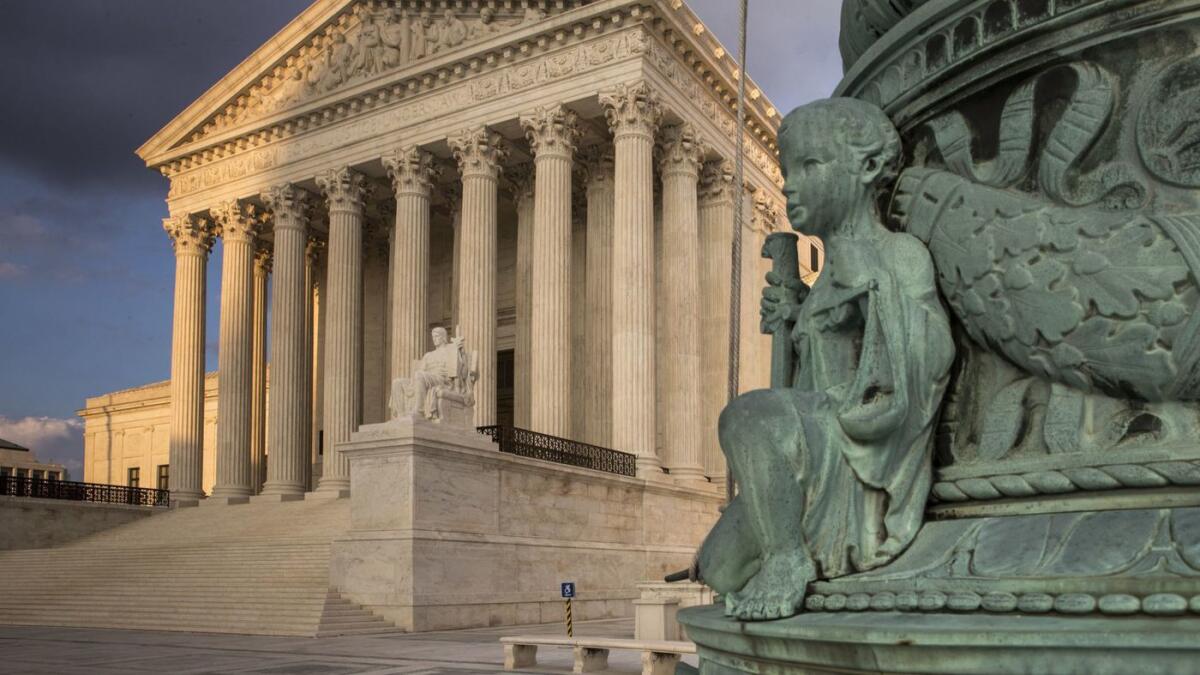
It might be hard to recognize, but there are other things going on in Washington these days besides the two-ring circus of President Trump and Brett Kavanaugh’s nomination to the Supreme Court. For instance: That very court heard oral arguments Tuesday in a death penalty case centering on whether a state can execute someone whose medical condition has left him addled and stripped of memory of the crime for which he is to be executed.
The courts have previously held that it is cruel and unusual punishment to execute someone who doesn’t have a “rational understanding” of what’s happening – generally, the insane and the psychotic. In the case of Vernon Madison, 68, that line gets blurry. When reminded, Madison knows the state of Alabama wants to execute him for the 1985 killing of a police officer. But the knowledge quickly dissipates into fog. A series of strokes have left him brain-damaged and suffering from vascular dementia — the injuries show up on MRIs — with a documented decline in IQ; he’s now incapable of remembering the crime for which he is to be killed. And 33 years of solitary confinement hasn’t helped.
The dementia has left Madison befuddled to the point that he soils himself because he can’t find the toilet next to the bed in his 5-by-8-foot cell. He wants someone to tell his mother that he has suffered strokes; she’s been dead for years. He can’t remember the alphabet past the letter G. He also plans to move to Florida.
But dementia is not psychosis or delusion. It doesn’t fall under standard legal definitions of insanity. Yet as his lawyer, Bryan Stevenson of the Equal Justice Initiative, argued, dementia has left Madison in the same place: confused, “unable to fully orient to time and place,” and with no recollection of the acts for which he is to be punished.
“The court always looks at facts and circumstances through the lens of the Constitution, through the window of the Constitution, and we have that here,” Stevenson told the court. “The 8th Amendment isn’t just a window. It’s a mirror. And what the court has said is that our norms, our values are implicated when we do things to really fragile, really vulnerable people. And what we’ve argued is that dementia in this case renders Mr. Madison frail, bewildered, vulnerable in a way that cannot be reconciled with executing him because of his incompetency.”
Alabama Deputy Atty. Gen. Thomas R. Govan Jr. argued that none of that matters because Madison, when asked, can reply that he is to be executed for a murder. And because he can articulate that, he doesn’t meet the standards for exclusion. The most telling part of Govan’s argument, though, was why the state persists in wanting to execute a sick and addled old man.
“The state would still have a strong interest in seeking retribution for a horrible crime,” he said.
There it is: Retribution. After more than three decades of mostly solitary confinement, and after a slow descent into dementia, what is to be gained now by retribution?
The death penalty is wrong in any circumstance, but it becomes even crueler — and more absurd — when the state tries to execute the infirm. Particularly when the only remaining rationale for it is vengeance.
An FBI investigation that doesn’t interview Kavanaugh and Ford? What are Republicans thinking?
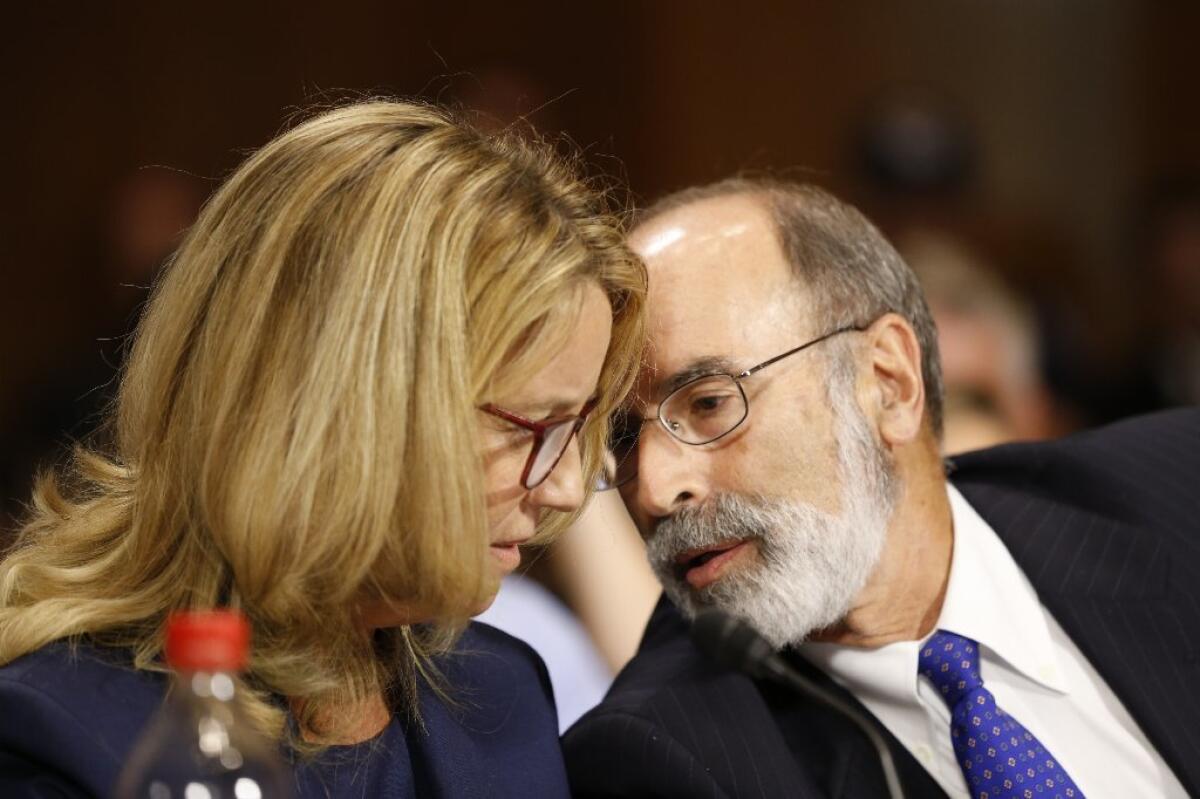
The FBI’s report on its reopened background check of Supreme Court nominee Brett Kavanaugh is expected to be turned over imminently to the White House and the Senate.
That report will lack credibility with many Americans — and some senators — if it doesn’t include interviews with the nominee and with Christine Blasey Ford, who has accused the appeals court judge of trying to force himself on her when they were teenagers, a claim he categorically denies.
The bureau reportedly has interviewed people who belonged to Kavanaugh’s high school social circle, including his friend Mark Judge, who, according to Ford, was in the room when she says Kavanaugh assaulted her. Agents also have interviewed Deborah Ramirez, who has claimed that Kavanaugh exposed himself to her at a party when they were students at Yale.
But on Tuesday two of Ford’s lawyers wrote to the director of the FBI complaining that their client hadn’t been contacted and that it was “inconceivable that the FBI could conduct a thorough investigation of Dr. Ford’s allegations without interviewing her, Judge Kavanaugh or the witnesses we have identified in our letters to you.”
At a briefing on Wednesday, White House Press Secretary Sarah Huckabee Sanders noted that Kavanaugh and Ford “were questioned in the most public way possible by the members of the Senate who ultimately have to make the determination” on Kavanaugh’s confirmation.
Even Sen. Jeff Flake (R-Ariz.), who pressed for the delay that allowed the FBI to reopen its investigation, said on Wednesday that it wouldn’t bother him if the FBI didn’t interview Ford. “We have a statement of Dr. Ford and then we have hours of testimony,” Flake told NBC News. “So, frankly, when we talked about an FBI investigation, it was to follow up leads that might corroborate her account.”
This is blinkered thinking.
It seems obvious that FBI agents would want to circle back and question Ford and Kavanaugh about information they gleaned from interviewing other witnesses. And even if talking to Ford wasn’t strictly necessary to resolve conflicting narratives, she obviously regards being able to speak to the FBI as well as the Senate Judiciary Committee as a matter of fairness.
Finally, on Wednesday Ford’s lawyers told the Judiciary Committee that she will provide materials it has requested to the FBI, including notes from a therapy session, “when she is interviewed.”
Given the partisan polarization over this nomination — evident long before Ford’s sensational accusation surfaced — an FBI report that doesn’t include interviews with the two principals in this story is sure to be denounced as incomplete. With the vote in the Senate so close, why would the White House or Senate Republican leaders want to risk such a reaction?
The GOP isn’t the only party that’s flagging in California
The latest state voter registration numbers are out, and though the numbers bode well for democracy, they aren’t looking good for California’s Republican Party.
There are now more Californians signed up to vote than ever — 19,086,589 of them, to be exact, which is 75.81% of those eligible to vote. But the number affiliated with the Republican Party dropped by about 93,000, to a mere 24.5%, just in the last few months.
This is the latest bad news for the state’s GOP, which has been losing ground in the Golden State for many years. Its minority status is reflected in the Democrat-dominated Legislature and the state’s constitutional offices. In May, the California GOP hit the mortifying milestone of losing its second-place status to those registered with no party preference.
No gloating, Democrats. Your party may still claim the No. 1 spot, but your ranks have thinned since May as well, from 44.4% of registered voters to 43.8%, or about 89,000 fewer voters.
So what party is claiming all these new voters? The Greens? Peace and Freedom? Libertarians? None of the above. Since May, voters who chose no party designation grew by 252,000, according to numbers released Tuesday by the secretary of state.
It’s possible some portion of that gain may be attributable to the Department or Motor Vehicles’ mishandling of the motor voter registration program. The DMV admitted last month that it had improperly registered 23,000 people, and many of those errors included assigning the wrong party preference. Even so, that would not be enough to materially affect the significance of this new set of voter registration numbers.
The popularity of the “no party preference” designation has been growing for the last two decades, perhaps in reaction to the increasing partisanship in American politics. After California switched to a top-two primary system, rendering party affiliation all but unnecessary for voters in most elections, the pace of voters choosing “no party” naturally picked up.
These numbers may indicate that more people than ever are interested in voting; they are not a reliable indicator of election outcomes. Who knows which way those non-affiliated voters will swing? Most likely they will lean left, because California overwhelming elects Democrats over Republicans. And Republicans might be losing members on the roll, but they wield outsize power because they actually vote at a higher rate than Democrats and unattached voters.
So the numbers are interesting, but they don’t necessarily indicate that the party is over for the state’s political parties. They just show that a growing number of voters want to go solo.
If we’re going to build a wall, let’s put one up between the Oval Office and Trump’s businesses
Meanwhile, back to one of the Trump administration’s original scandals: A watchdog group has updated its list of President Trump’s wide-ranging conflicts of interest, offering a depressingly thorough accounting of how he, his family and some top appointees have routinely tripped over the ethics line.
The conflicts are rooted in the nature of the Trump Organization’s businesses, which includes licensing the Trump name for development projects around the world and operating Trump-named golf courses and resorts. Every time the president visits one of his properties for business or recreation — 147 days and counting — he uses the White House to enhance his private business. You can’t buy advertising like that.
Trump announced early on that he had stepped back from decision-making at the family business and turned operations over to two of his sons, Donald Jr. and Eric. But that doesn’t redress the conflicts because Trump still derives income from the businesses, and he knows what they are because his name is plastered all over them.
In fact, there are so many conflicts that it can be numbing to try to wrap your head around them. Fortunately, the folks at the Global Anticorruption Blog recently updated its tracking of Trump’s conflicts, breaking them down into four main categories covering federal payments to Trump’s businesses, instances in which the White House has promoted Trump family brands, regulations and policies that benefit the family and top advisors, and instances in which private and foreign interests have sought political influence through business dealings.
It’s rather exhaustive. And exhausting. I count 52 separate issues, with some, such as diplomats patronizing the Trump International Hotel in Washington (the alleged emoluments violation), comprising several distinct interactions. Altogether, the list includes 75 separate entries of varying degrees of seriousness.
Some, such as public pensions fund investments into Trump-connected business, seem a bit attenuated. But overall, that are a lot of conflicts.
They include Trump staying at his own expensive properties and getting paid by the government for Secret Service rooms and other services; ordering golf tee markers with the presidential seal (it’s illegal to use the seal unless it’s for government business); making a derogatory tweet about Nordstrom’s after the high-end department store chain dropped Ivanka Trump’s fashion line (products that top advisor Kellyann Conway endorsed), and — despite the wide crackdown on visas — increasing the number of H-2B visas used by temporary foreign non-agriculture workers. The Trump Organization relies on such visas to staff Mar-a-Lago and other Trump properties.
Then there’s the rollback of environmental rules protecting water supplies, which cut costs for golf courses in which Trump has a stake. And the waiver exempting Florida from Trump’s proposal to open nearly all federal waters to offshore drilling. The administration said it would exclude Florida because of its reliance on tourism. It’s not like anyone ever comes to California for the beach. Or Massachusetts. Or the Carolinas. So why Florida? To help Gov. Rick Scott, who is running for the U.S. Senate? Or did it have something to do with a certain oceanfront estate in Palm Beach that a certain high-level government official owns (cough, Mar-a-Lago)?
Of course, not all of these appear to involve a quid pro quo or direct enrichment. But they all give Americans reasonable cause to wonder whether the president is acting in the nation’s best interest or his own.
The only solution here (short of ousting the president) is for Trump to sell off the family business and place the assets in a true blind trust, one in which he cannot know what impacts his policies and decisions have on his own wealth.
Trump supporters have argued from the beginning that such a demand is asking too much of a billionaire businessman, the first such president in the nation’s history.
But it’s not asking too much that Trump follow modern-era tradition and build a wall (I mean, he really likes walls) between the Oval Office and his investments and business. It’s also not too much to ask Congress to force the issue. Getting an answer from a Congress controlled by Trump enablers, well, that’s another matter.
Now the Trump administration is going after same-sex partners at the United Nations
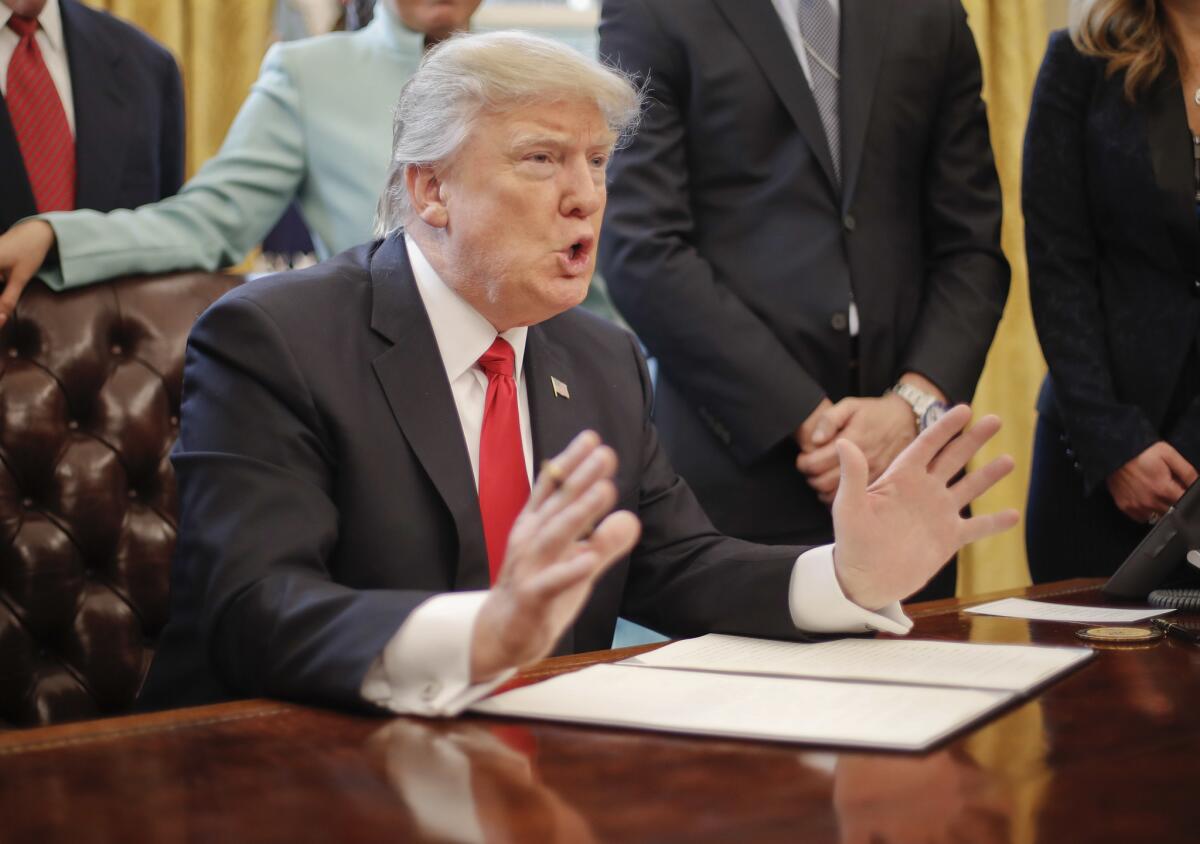
It’s shocking sometimes at how needlessly cruel this administration has been. This week, a new policy went into effect denying visas to same-sex partners of U.N. diplomats and employees unless they are married, a dangerous act for people hailing from any of the 72 countries where homosexuality is illegal — or from any of the eight countries where it is a capital offense.
The new policy, which went into effect Monday, also requires same-sex partners of diplomats and U.N. employees already in the United States to get married by the end of the year or face expulsion.
Former Obama U.N. ambassador Samantha Power got it right when she tweeted that the policy is “needlessly cruel and bigoted.”
The government framed the policy as an effort to treat same-sex couples the same as married couples. The United States does not grant visas to unmarried partners of heterosexuals, but the previous policy — recognizing the precarious position of gay couples internationally — included an exception for same-sex partners.
Only two dozen or so countries allow gay marriage. If the administration limited the new policy to just same-sex couples from countries that allow gay marriage, then the administration’s logic might be defensible. And while a noncitizen same-sex couple can legally marry in the United States, thus conforming with the new policy, doing so runs the risk of raising problems with their home country if it’s among those with harsh anti-gay laws.
So the explanation feels like a pretext for yet another anti-gay policy by the administration.
In the greater scheme of cold-hearted moves by the administration, this one is relatively minor. But its pettiness is part of the larger problem: Trump and his acolytes have been on a mission to undo just about anything with President Obama’s fingerprints on it. And the policy granting visas to same-sex couple stems from an Obama directive implemented by his secretary of State, Hillary Clinton.
There was nothing in Trump’s so-called mandate from voters that compels the administration to mess with the personal lives of gay or lesbian couples in the United States as representatives of their governments, or as employees of an international body such as the United Nations.
But the administration did it anyway. And instead of fixing a problem, it created one.
Jerry Brown’s parting gift to California women: A seat at the table of power
Hear that tinkling? That’s the sound of the glass ceilings in corporate boardrooms shattering up and down the Golden State.
With just hours remaining before the legislative deadline on Sunday night, Gov. Jerry Brown signed Senate Bill 826 by state Sen. Hannah-Beth Jackson (D-Santa Barbara), making California the first state in the nation to require publicly traded corporations to have women on their boards of directors.
Not many, mind you, but at least one by the end of next year. About one-fourth of the large corporations headquartered in California don’t have a single female board member. By 2021, corporate boards with five directors must add at least one more woman, and larger boards must add two more or face fines and public shaming on the Secretary of State’s website.
Hear that sputtering? That’s the sound of powerful men denouncing the law as terrible, horrible and — this is amusing — discriminatory.
Women make up about half the people in the state, yet hold only 15% of the corporate board seats. What would you call that disparity? Bad luck?
There will be lawsuits, count on it. People with power don’t give it up easily. Reserving seats for women on corporate boards means fewer seats for men — and the power, prestige and pay that comes with the position. The opponents of the bill — chambers of commerce, the California Manufacturers and Technology Assn. and other business and industry groups — contend that it violates constitutional protections against gender discrimination.
I’m actually looking forward to those arguments. How will the corporate lawyers explain why it’s not fair for this law to discriminate against men, yet it’s entirely reasonable for corporations to discriminate against women? Will they rely on the old canard that there just aren’t enough capable women to go around? That will be a fun discussion, especially if the judges are women. (There’s about a 35% chance of that happening. America’s judges are overwhelmingly male, though half of law school graduates are women.)
That argument might have been plausible 50 years ago, when women really were shut out of entire professions and discouraged from higher education. But in the last half-century, universities have been churning out qualified women in every professional field. If corporations can’t find competent female directors in 2018, it’s probably because they are not trying very hard.
Brown acknowledged the law may face “fatal” legal challenges, but signed it anyway, noting in his signing message that “recent events in Washington, D.C. — and beyond — make it crystal clear that many are not getting the message.”
In any case, why not try government coercion? Things can’t get much worse.
Despite the advances women have made in the workplace, the halls of power are still largely closed to them. Men still control most of the political establishment, the government, wealth and industry. Things are changing in some areas. For example, there are more women running for public office than ever this year. But they’re not in other areas. This year, the number of woman running Fortune 500 companies dropped from a high of 6.4% (which is, obviously, not very high to begin with) to less than 5%.
How do you change this besides lots of hoping and praying? Increasing the number of women on corporate boards is one way. Studies have shown that people are more likely to hire people like themselves. If so, then all-male boards are more likely to hire nothing but male top executives.
Even if the law is struck down, and it may be, the governor has done an important thing by highlighting the gross gender disparities in corporate America even as gender power imbalance has been on stark display in the confirmation proceedings of Supreme Court nominee Brett Kavanaugh, who has been accused of sexual assault when he was a teenager. As parting gifts go, Brown can’t do better for women than giving them a seat at the table of power.
The Justice Department sues California over its new net neutrality law. What a surprise
Moments after Gov. Jerry Brown’s office announced that he had signed a bill to restore net neutrality protections in California that the federal government abandoned, the U.S. Department of Justice sued to block the measure from going into effect. California lawmakers saw the measure (Senate Bill 822) as an important step to protect internet users in the state; the Justice Department saw it as yet another effort by the loony left state to dictate policy for the entire country.
The feds argue that the Federal Communications Commission, not the states, decides how the internet will be regulated (or not regulated). And having a uniform national policy on internet issues would indeed be a good thing. But that uniform policy should be one that preserves the status quo, protecting both consumers and the companies that offer content and services online from interference by local broadband providers such as AT&T, Spectrum and Comcast.
Last year, the FCC’s Republican majority went about as far as humanly possible in the other direction. It not only repealed a net neutrality rule the commission’s previous Democratic majority had adopted in 2015, it said the FCC had no authority to regulate broadband providers beyond requiring them to disclose accurately how well their networks perform, how much they charge and how they manage their networks. The move renounced the commission’s efforts over the previous decade to crack down on broadband providers that improperly favored some content, services or applications on their networks over others.
Gov. Brown shuts down the party with veto of bill to push back last call to 4 a.m.
What a party pooper! Gov. Jerry Brown vetoed a bill that would have allowed Los Angeles, San Francisco and seven other cities to temporarily extend alcohol service at bars and restaurants from 2 a.m. to 4 a.m.
Senate Bill 905 was San Francisco Sen. Scott Wiener’s second attempt to loosen an 80-year-old law that requires businesses licensed for on-site liquor sales to stop serving alcohol at 2 a.m. This is earlier than other states, such as New York, Illinois and Nevada, where bars are allowed to keep pouring until 4 a.m. and later.
Wiener and others argued that a 2 a.m. last call no longer makes sense for cities with thriving music and nightlife scenes that compete for investment and tourism with the likes of New York City, Las Vegas and other late-night hot spots. It also doesn’t consider the increasing availability of taxis and ride-hailing apps, such as Lyft and Uber, that give revelers more ways to get home without driving.
The Times Editorial Board supported a similar bill last year, arguing that a city like Los Angeles shouldn’t have to shut down its bars early each night in deference to a fusty old law based on cultural practices, not research on the appropriate time to stop serving alcohol.
Law enforcement and community activists helped block that legislation amid fears that later hours would lead to more drunk driving and raucous partying.
Wiener returned this session with a narrower proposal for a five-year pilot program that would let nine cities decide whether to allow bars and restaurants in certain areas to stay open later. The cities were Los Angeles, San Francisco, Oakland, West Hollywood, Long Beach, Palm Springs, Sacramento, Coachella and Cathedral City.
The Legislature approved the bill, but Brown sided with the fusty old law.
“California’s laws regulating late-night drinking have been on the books since 1913,” he wrote in his veto message. “I believe we have enough mischief from midnight to 2 without adding two more hours of mayhem.”
Well, Gov. Brown, not everyone who goes to a bar, restaurant or club late at night engages in mischief. And you don’t need to go to a bar to create mayhem and misery.
Wiener says he will keep trying to modernize the state’s last call law. He might find a more willing governor next year. Democrat Gavin Newsom, after all, was a restaurateur and bar owner in San Francisco before entering politics.
Congressman takes the low road with despicable, xenophobic attack ad
Voters in inland San Diego county didn’t need another reason to question Rep. Duncan Hunter’s fitness for office. The Republican from Alpine and his wife were indicted in August on charges of misusing a quarter million dollars in campaign donations for personal expenses. A poll since then shows that a lot of voters in his district think he’s guilty.
Nevertheless, Hunter gave voters another reason to reject his reelection bid on Nov. 6 with the release of a despicable campaign ad insinuating that his Democratic opponent, Ammar Campa-Najjar, is a Muslim terrorist “working to infiltrate Congress” in a “well-orchestrated plan.”
The evidence? That Campa-Najjar, who is American born and ethnically Palestinian and Mexican, changed his name from Ammar Yasser Najjar to Ammar Campa-Najjar (Campa is his Mexican mother’s maiden name) after the June primary. The ad suggests he did it to hide his familial connections. Campa-Najjar’s grandfather was one of the masterminds of the 1972 “Munich massacre,” a terrorist attack by the Palestinian Black September group on Israeli Olympic athletes.
That fact was reported long before the June primary, however. More likely, Najjar made the change to appeal to the state’s large Latino population. Also, he’s not Muslim. And besides, the 29-year-old already “infiltrated” government at the highest level when he worked in the White House during the Obama administration.
Candidates often misrepresent their opponent’s backgrounds to make their own look more palatable, but this smear goes way beyond the usual dreck. What does it say about the judgment of a member of Congress if he would resort to stoking xenophobic fears just to hold onto a seat?
It should be enough in this conservative district for Hunter to call attention to his young opponent’s progressive platform. Instead, the incumbent has been pressing the “radical Muslim” angle in speeches and in this ad. That the campaign would sink this low suggests a certain desperation. Hunter is still polling higher in the race than Campa-Najjar, but only by 8 points. There’s no guarantee that advantage will hold until Nov. 6, especially with current events in Washington that could drive turnout in unpredictable ways.
I wish I could say this were the only racially tinged political ad in this midterm race. It is not. Rep. Chris Collins (R-New York) has managed to outdo even Hunter’s ugly ad with one that features his Democratic opponent Nate McMurray speaking Korean in a video. McMurray’s wife is Korean. The subtitles underneath the video hint that the Democrat is a foreign agent working to move American jobs overseas. At one point, there’s a picture of North Korean leader Kim Jong-Un projected over McMurray’s shoulder, which makes it clear this ad is not to inform people but scare them enough that even the candidate facing criminal charges seems preferable.
Oh, did I forget to mention that? Like Hunter, Collins is campaigning with an indictment on his back. He faces federal charges of insider trading.
I hope that voters don’t reward this kind of irresponsible behavior in November. Politics are ugly enough as it is.
Jeff Flake pulls a John McCain
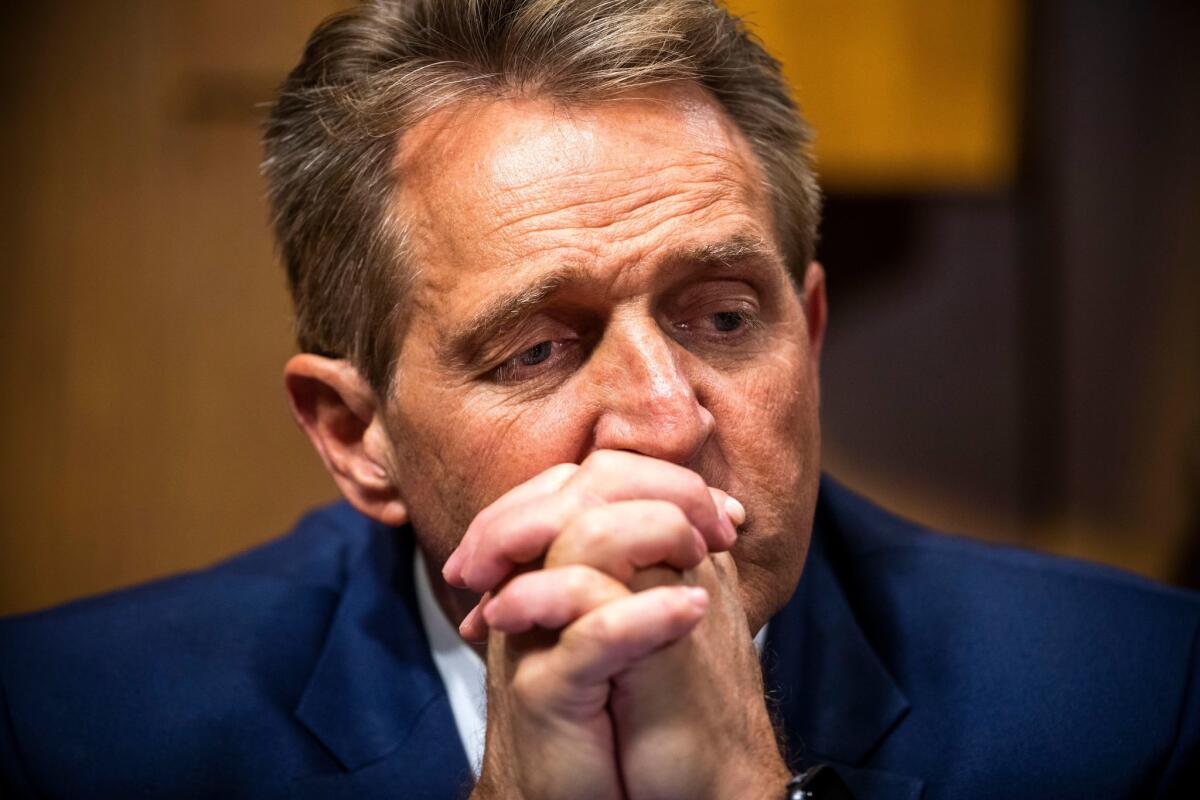
This party may never end.
Soon-to-be-former Sen. Jeff Flake (R-Ariz.), a frequent and acerbic critic of President Trump’s, tapped the brakes Friday on the Senate GOP’s rush to confirm Trump’s latest Supreme Court nominee, Brett Kavanaugh, in a way that won’t make anybody happy, but at least should make everyone less ticked off.
Flake said he wouldn’t support holding a final vote on Kavanaugh unless the FBI investigated the allegations that have been leveled to date against the appellate judge. The investigation should be conducted right away, Flake said, and last no more than a week.
Republicans have to take seriously Flake’s threat to support a Democratic filibuster, even though the GOP changed the rules last year to allow debate to be cut off with a simple majority vote. Having only 51 members, Senate Republicans would need every other person in their caucus to vote to end debate if Flake joined the Democrats on the other side. And it’s not clear at this point that every other Republican wants to keep pressing ahead.
Bear in mind that Flake supports Kavanaugh’s nomination. This is a calculated risk — a bet that the FBI will either find evidence refuting the allegations by Christine Blasey Ford and two other women, or at least turn up no facts to confirm them. But it’s also a smart play to help Republicans defend themselves against the accusation that they were in such a rush to confirm Kavanaugh that they disregarded at least one credible allegation made by a woman with no motive to lie.
Flake presented his position in Rodney King terms, as a form of rapprochement. “This country is being ripped apart here,” he told his colleagues on the panel. “We’ve got to be sure that we do due diligence.”
He’s certainly right about the polarization around the nominee, a relatively young, conservative jurist who could shift the Supreme Court further to the right for decades. And Flake isn’t holding out hope for a kumbaya moment at the end of the day; he said he didn’t expect Democrats to vote for Kavanaugh even after they get the investigation they’ve been urgently demanding. Instead, he said, he’s just trying to address what he characterized as legitimate complaints about the rush to a vote.
It’s the kind of institution-preserving gesture that his late colleague John McCain was celebrated for. You have to wonder why (and regret that) it’s not being done by someone who plans to stay in the Senate, and who’ll have to work with Democrats again next year.
President Trump appears willing to go along with Flake’s plan.
“I’m going to let the Senate handle that,” Trump told reporters Friday after the committee vote. He added, “I thought [Ford’s] testimony was very compelling and she looks like a very fine woman to me. A very fine woman. And I thought that Brett’s testimony likewise was, really something that I hadn’t seen before. Incredible.”
So now it’s up to Senate Majority Leader Mitch McConnell (R-Ky.), who has steadfastly resisted Democrats’ calls for a deeper FBI inquiry into Kavanaugh’s past. Update: The Senate GOP leadership indicated Friday afternoon that there will be a supplemental FBI investigation in the coming week, as per Flake’s suggestion.
Flake’s move cut the legs out from under his fellow Republicans on the committee, who’d spent the morning railing against the “character assassination” perpetrated against Kavanaugh. Although respectful of Ford during the panel’s hearing, many went on at length about the lack of corroborating evidence for her account. They also emphasized that Ford’s allegations were investigated by the FBI, albeit in a cursory way.
“There’s no doubt in my mind that she truthfully testified,” Sen. Mike Crapo (R-Idaho) said at Friday’s session. But he added, “I don’t feel that the evidence shows that Judge Kavanaugh was there that night. I believed his testimony, I believed Dr. Ford’s testimony about the sexual assault.”
Talk about trying to have it both ways.
Kavanaugh had similarly argued Thursday that Ford’s allegations had been investigated by the committee already, and that if there were any further questions, members could simply ask him while he was there. Not that he would have answered them — his pugnacious performance that afternoon seemed to have been taken straight out of President Trump’s “I punch back” playbook, as if Kavanaugh were playing to Trump’s base.
And perhaps he was. Whoever fills this seat will help shape the Supreme Court for years to come, but the fight to confirm Kavanaugh will help determine who controls Congress in 2019 and 2020. In the minds of some conservatives, winning that fight is vital to keeping GOP voters motivated for the midterm elections.
On the other hand, support for Kavanaugh among GOP women has been slipping in opinion polls, so how the panel treats Ford’s allegations may well have some bearing on the vote too. That’s another reason for them to embrace Flake’s proposal.
Ford was the alleged victim, but Kavanaugh played that role

The federal judiciary is technically a nonpartisan branch of government. On Thursday, however, one member of the federal appeals court — and a potential Supreme Court justice — spewed contempt explicitly on Senate Democrats.
That would be Brett Kavanaugh, who delivered what may be the angriest, most emotional opening statement ever by a witness before the Senate Judiciary Committee. His intensity was understandable, considering the serious and occasionally salacious accusations leveled against him after the committee completed a lengthy round of hearings on his nomination. But Kavanaugh didn’t just defend himself. He said his accusers were engaged in a “calculated and orchestrated political hit” as “revenge” for President Trump’s victory.
In particular, he was angry that Sen. Dianne Feinstein (D-Calif.), whom he — along with most of the committee’s Republican members — accused of sitting on Christine Blasey Ford’s allegation against him for a month in order to waylay his nomination. He also was furious at the committee for not rushing to let him testify as soon as Ford went public with her allegation that a youthful Kavanaugh had sexually assaulted her, saying the delay gave others time to come forward with false accusations. And he was livid at other Senate Democrats for their more hyperbolic criticisms of his nomination.
He was, in short, spitting nails, but doing so exclusively in one direction. And again, it’s easy to understand why. But if he’s elevated to the Supreme Court, let’s hope he’s never asked to help resolve an election dispute.
It was a wild session and a vivid contrast to Ford’s appearance earlier in the day. As riveting and persuasive as her testimony was Thursday morning, more remarkable — especially in light of what followed — was her implacability.
Ford never got riled, never seemed suspicious of the questions put to her by Rachel Mitchell, the Arizona prosecutor hired by Senate Judiciary Committee Republicans to ask questions on their behalf. And perhaps she should have been, given that Mitchell appeared to be singularly interested in weakening Ford’s credibility by cataloging seeming inconsistencies in her utterances and suggesting that Democrats were aiding her cause in some way.
In short, it was what a prosecutor might do to a defendant on the stand. But Ford — the alleged victim here — stayed agreeable throughout, as if Mitchell’s questions were interesting and helpful to the process. Which in some respects they were, because they solidified a couple of things Ford has said about her motives. To wit:
- Ford never wanted to go public. Under questioning by Mitchell, Ford testified that she had indeed asked Rep. Anna Eshoo (D-Menlo Park) and Feinstein not to disclose the allegations she made about Kavanaugh in a private letter. She agreed to talk to the Washington Post, she said, only after a number of journalists had found out about the letter and were blindsiding her at work and at home in an attempt to get an interview. Ford had no idea how her name and letter got leaked.
- Ford brought her allegation to members of Congress confidentially in the hope of informing the process while Kavanaugh was just a name on President Trump’s short list of potential nominees. Contrary to the GOP-advanced notion that Democrats sprung Ford on Kavanaugh’s nomination at the 11th hour, Ford said she started reaching out with her story while Trump was still picking a replacement for retired Supreme Court Justice Anthony M. Kennedy. But she added that she didn’t know how to do that, and her desire to remain anonymous, while understandable, prevented her from having a voice.
By contrast, Mitchell’s questions to Kavanaugh were designed to lend credibility to his assertions. But after a couple of sets of inquiries, Republican senators sidelined Mitchell and began ministering to Kavanaugh directly.
That only exaggerated the partisan slant to the proceedings. Democrats were just as bad, clearly siding with Ford and working to trip up Kavanaugh rather than behaving as if their minds were open.
And that’s not new, considering how these proceedings have evolved in recent years. What seemed new was the explicit partisanship of the nominee. Granted, Kavanaugh had worked as staff secretary for President George W. Bush and had aided Kenneth Starr’s investigation into President Clinton. So his allegiances are clear. Nor have the Democrats handled the nomination judiciously, presenting a near-united front against Kavanaugh long before Ford’s allegation surfaced. It’s just that once you become a judge, you’re supposed to at least pretend that you’re no longer on one of the teams.
Despite his ‘con job’ bravado, Trump gave himself wiggle room to cut Kavanaugh loose

The day before one of Supreme Court nominee Brett Kavanaugh’s accusers is scheduled to testify before the Senate Judiciary Committee, Democrats on the panel asked President Trump to “immediately” withdraw the nomination — unless, that is, Trump agreed to reopen an FBI background check of Kavanaugh to examine sexual assault allegations.
Those allegations are multiplying. They now comprise not only the claim by Christine Blasey Ford, who is scheduled to testify Thursday that Kavanaugh assaulted her when they were teenagers in the early 1980s, but also the charge by Deborah Ramirez that Kavanaugh exposed himself to her when they were students at Yale and new accusations by a Washington woman named Julie Swetnick.
On Wednesday, Swetnick’s lawyer, Michael Avenatti, posted a document in which Swetnick alleged, among other things, that Kavanaugh was present at a 1982 house party at which she was gang raped. (Kavanaugh said her statement was “ridiculous and from the Twilight Zone.”)
It was after Swetnick’s allegations emerged that the Democrats requested that Trump either pull the Kavanaugh nomination or order a reopening of the FBI investigation (something they previously urged Sept. 18). As an attempt to acquire information, it didn’t make a lot of sense. If the call for withdrawing the nomination “immediately” were taken literally, it would mean that Ford would never testify.
But the Democrats’ move made more sense as a political gesture. Even a conditional request that the nomination be withdrawn served to ratchet up the party’s opposition to Kavanaugh and its solicitude for his accusers. Never mind that Trump would ignore both the call to withdraw the nomination and the call for a new FBI investigation.
But a surprise was in store at Trump’s Wednesday evening news conference. The president offered a spirited defense of Kavanaugh, said his nominee was a victim of a “con job” and pushed back against the idea of reopening Kavanaugh’s FBI background check. But he also indicated that he could imagine withdrawing Kavanaugh’s nomination if he were persuaded by Thursday’s hearing that the allegations against his nominee were true.
“I can’t tell you,” he teased reporters. “I have to watch tomorrow.”
More likely, neither Trump nor Republican senators on the committee will shift in their positions as a result of Thursday’s testimony, any more than Democrats will alter theirs.
Still, the president seemed to be leaving himself some room to maneuver if a man he called “one of the most respected people in Washington” disappoints him or if damaging new information surfaces. (NBC News reported Wednesday that the Judiciary Committee had been inquiring about an allegation that Kavanaugh had physically assaulted a woman in 1998 while he was inebriated. Kavanaugh denied the anonymous allegation.)
The Democrats could only be pleased that the president had moved their “impossible” demand into the realm of the possible.
Kavanaugh’s prep school drinking buddy Mark Judge needs to testify

On Wednesday, a longtime federal employee and contractor named Julie Swetnick became the third woman to come forward against Supreme Court nominee Brett Kavanaugh, offering a sworn affidavit Wednesday accusing Supreme Court nominee Brett Kavanaugh of “inappropriate contact of a sexual nature” with women multiple times as a high-schooler.
Her lawyer — Michael Avenatti, who also represented porn actress Stephanie Clifford (a.k.a. Stormy Daniels) in her fight with President Trump and his former attorney, Michael Cohen — says she’s ready and willing to testify. And Senate Judiciary Committee Chairman Charles Grassley (R-Iowa) left open the possibility that his panel will hold additional hearings beyond the one scheduled for Thursday with Kavanaugh and one of his earlier Kavanaugh accusers, Christine Blasey Ford.
But Swetnick’s affidavit suggests that the committee really needs to hear from someone else: Mark Judge, Kavanaugh’s prep school classmate and alleged companion on the party circuit.
Ford was the first to put Judge’s name on the table, saying he was in the room when Kavanaugh allegedly pinned her to a bed, pawed at her clothes and covered her mouth so she couldn’t call for help. Swetnick goes considerably further, claiming she saw Kavanaugh and Judge engaging in sexually harassing behavior (and worse) at a series of alcohol-soaked parties between 1981 and 1983.
The most serious allegation by Swetnick is that Kavanaugh and Judge, among others, “caused girls to become inebriated and disoriented so they could be ‘gang raped’ in a side room or bedroom” by party attendees, and that Kavanaugh and Judge were among those lining up “waiting for their ‘turn’ with a girl.” Swetnick said that she was victimized this way at one of the parties attended by Kavanaugh and Judge, although she didn’t specifically accuse them of assaulting her.
Judge, an author and occasional journalist, has declined to testify, saying he had no memory of the party where Ford said she was assaulted. Swetnick’s affidavit, however, makes it all the more important that the committee hear from Judge. Ideally, the FBI would interview as many potential witnesses as possible to help the committee with its investigation, but the White House has ruled out that idea. So its up to senators themselves to try to bring more facts to bear.
Whether that happens is up to Senate Republicans, who up to this point have seemed to be racing ahead to confirm Kavanaugh. The key question is whether the latest allegation and the testimony by Ford and Kavanaugh Thursday unsettle two or more Republican senators enough to put Kavanaugh’s confirmation in doubt and force the committee to conduct more hearings to try to clear him.
One factor that may work in Kavanaugh’s favor is Swetnick’s choice of attorney. Avenatti is a vocal and harsh Trump critic who has floated the idea of running for president in 2020. Fairly or not, his involvement puts a partisan tinge on Swetnick’s affidavit, inviting Kavanaugh’s supporters to focus on him instead of her. Trump’s response epitomizes this:
Swetnick’s affidavit establishes her bona fides, noting that she has obtained a variety of clearances and passed multiple background checks over the years as a federal government employee. It’s safe to assume that Swetnick didn’t step into this fracas lightly — not only will she be subject to intense scrutiny, but she could be sent to prison if it turns out she deliberately submitted a false affidavit to Congress.
Avenatti has called for the FBI to investigate Swetnick’s allegations, and he’s right — the Judiciary Committee should hit the pause button and have the feds gather as much information as they can before moving forward on the nomination. That isn’t the route the panel is taking, however, at least not yet.
Bill Cosby may be a blind octogenarian, but he’s also a sexual predator. He belongs in prison
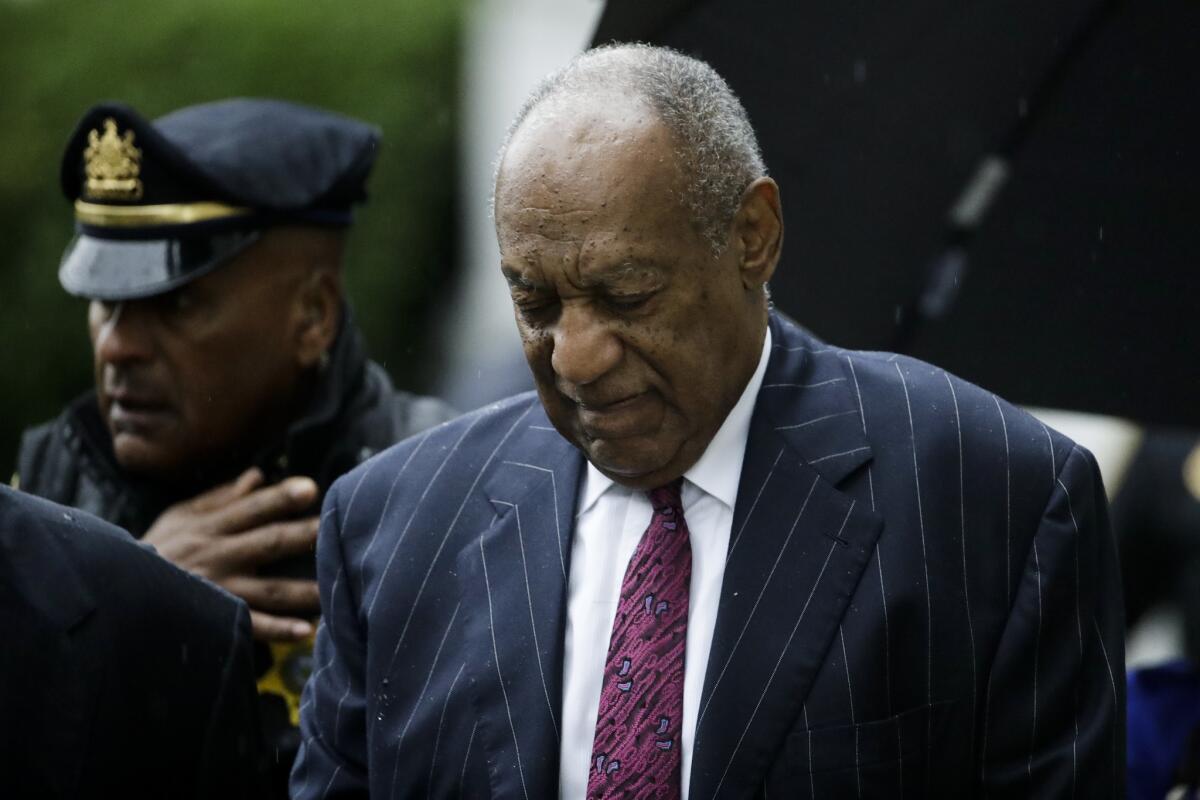
Don’t feel sorry for Bill Cosby, who was sentenced to three to 10 years in prison Tuesday for aggravated indecent assault.
Perhaps it seems cruel to incarcerate a doddering, nearly blind octogenarian, but the actor and comedian is a sexual predator. Now, finally, he will be treated as one.
That includes classification as a sex offender. Dozens of women have accused Cosby of sexual assault going back four decades, but many of the incidents are long past the statute of limitations and could not be prosecuted. Cosby will be listed on a sex offender registry and will be required to report regularly to authorities and undergo monthly counseling for the rest of his life.
Good.
The sentencing and Cosby’s designation as a predator send a powerful message to the #MeToo movement just as his conviction did back in April. For too long, powerful men have escaped accountability for sexual misconduct involving less powerful women, ranging from inappropriate comments at work to rape. The jury’s decision seemed a clear signal that the public’s tolerance of such behavior was, at long last, waning.
If Cosby’s attorneys are to be believed, the 81-year-old actor is barely capable of getting around, let alone drugging and molesting women. He no longer poses a threat to the community, they say. Maybe it is true — or maybe it isn’t.
In either case, it’s irrelevant.
Cosby committed a crime and his punishment reflects its gravity. And besides, the greater threat to the community comes from a sentencing that telegraphs to all the other would-be sexual predators that society doesn’t consider this crime a jail-able offense.
For its own self-preservation, the GOP needs the FBI to investigate Kavanaugh
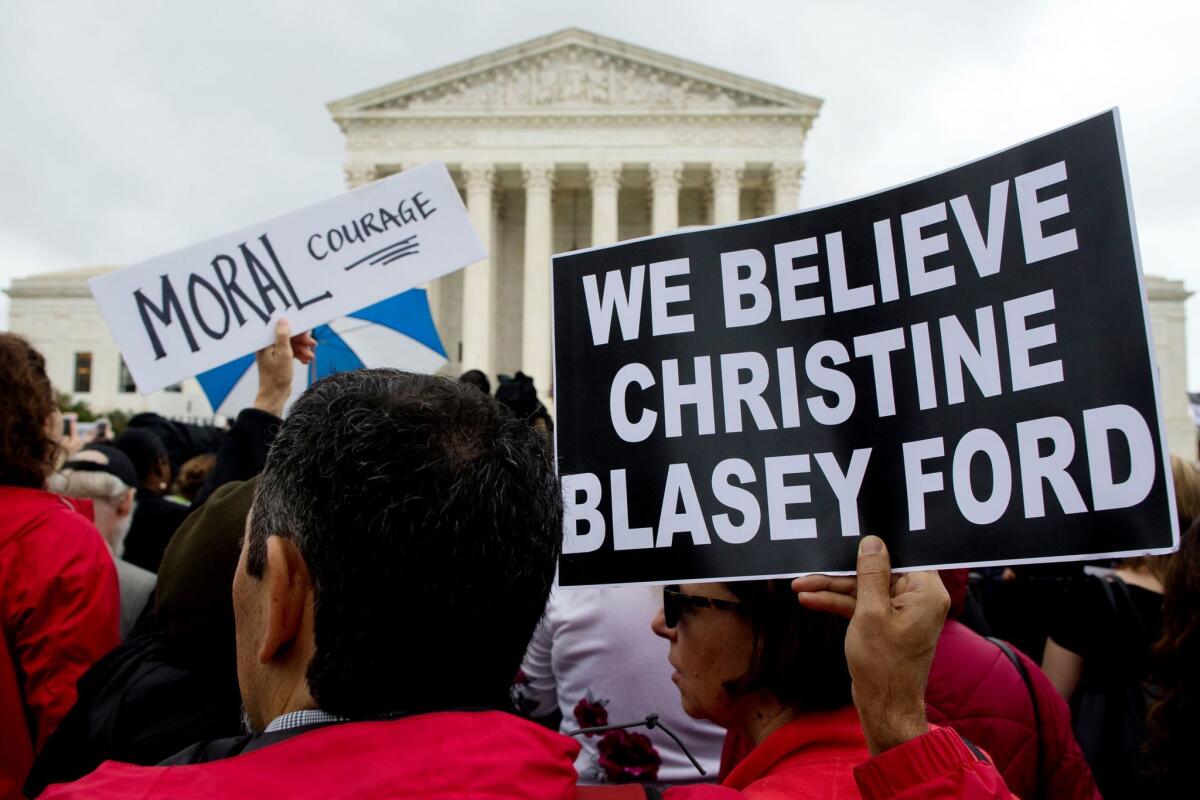
Barring a thunderclap revelation at Thursday’s scheduled Senate Judiciary Committee hearing, senators are heading toward a confirmation vote on Supreme Court nominee Brett M. Kavanaugh that will put members in an incredibly uncomfortable position.
Two women will have leveled serious allegations of sexual misconduct by Kavanaugh in his youth, with one of them, Christine Blasey Ford, potentially giving the details under oath of an alleged sexual assault by the nominee. Kavanaugh, for his part, has denied the allegations unconditionally and called the one made by a former Yale classmate a “smear.”
The committee is set to hear from just Ford and Kavanaugh on Thursday. Given the circumstances — Ford said she told no one of the assault until about six years ago, when she confided in a therapist — the result is likely to be two irreconcilably different accounts of an event that did or did not happen more than three decades ago.
That’s no big deal for the many Senate Democrats who decided long ago to oppose Kavanaugh, a well-regarded and highly qualified appellate judge — he’s more conservative and more of a textualist than the jurist he’d be replacing, the retired Justice Anthony Kennedy, so he’s seen as a threat to abortion rights, among other things. Almost the entire caucus of Senate Democrats would have been firmly in the “no” column even without the allegations by Ford and Deborah Ramirez.
But Republicans are in a dicier position, politically. On the one hand, as Sean Davis wrote in the right-of-center Federalist news site, core GOP voters appear to be infuriated by the attacks on Kavanaugh and will punish Republicans if he isn’t confirmed. But assuming Ford testifies, senators who vote to confirm the judge will have to argue that they just didn’t believe her. And they won’t have the benefit of an FBI investigation, or a serious inquiry of any kind, to support their finding that she wasn’t credible.
How well is that going to go over in the #MeToo era? After all, the movement has made the public much more conscious about why sexual assaults go unreported and about how difficult it is for victims to prove their claims.
That’s not to say that every person who makes an accusation is telling the truth, or that everyone who’s been accused is guilty. But the days of dismissing delayed and uncorroborated allegations out of hand are behind us. Look at the #WhyIDidntReport backlash that greeted President Trump the other day when he suggested that Ford must be lying because she waited so long to talk about the incident.
(Not that Trump is the best model for Republicans on this issue. On Tuesday he blasted Ramirez, saying: “The second accuser has nothing. The second accuser doesn’t even know — she thinks maybe it could’ve been him, maybe not, she admits that she was drunk, she admits time lapses, there were time lapses.”)
So you would think Republicans would have welcomed having the FBI reopen Kavanaugh’s background check and talk to more people who might be able to verify or refute the allegations against him. The bureau may not have been able to declare definitively whether they were true or false, but if it found no one to corroborate the claims, senators would have been on much firmer grounds to say the evidence against Kavanaugh wasn’t strong enough to reject him. In other words, they would have more to go on than just his word and Ford’s (and Ramirez’s, if she testifies — which doesn’t seem likely at this point).
Instead, the GOP is barreling ahead, thinking that confirming Kavanaugh will help Republicans in November. Maybe, but it seems equally likely that some portion of the electorate will be baffled by the rush to put Kavanaugh into a Supreme Court seat that he could hold for decades.
See those Joshua trees while you can. Climate change is killing our national parks
It makes sense when you think about, but a new study reports that the United States’ national parks are enduring more stressful changes in climate from global warming than the rest of the nation.
Climate change affects the entire globe, obviously, but the researchers argue that the most extreme environments are suffering the most extreme changes, from melting in Glacier National Park and the Arctic to reduced rain and increased heat in the Southwest deserts. And that’s where most of the nation’s parkland happens to be, such as Denali National Park in Alaska, Yosemite National Park here in California and the Petrified Forest National Park in Arizona.
In fact, researchers warn that 90% of Joshua trees may be gone by the end of the century as their high-elevation habitat becomes too warm for them. The stress already has had a significant impact, with younger trees not sprouting and older trees dying out.
Elsewhere, trees stressed by heat and drought have fallen victim to disease and insects. Dead trees also fuel wildfires. Meanwhile, the myriad endangered species that have found refuge in national parks face increased stress as climate change shifts their habitats to higher elevation and latitudes, or causes them to disappear altogether.
A rational government would do something about it. But we don’t happen to have one at the moment. President Trump infamously framed climate change as a hoax perpetrated by China to gain an economic competitive advantage, and some top Trump appointees have, at best, been skeptical about the role of humans in global warming.
Last year the National Park Service rescinded a National Park Service rule adopted near the end of the Obama administration that “requires relying on science and scholarship for guidance in understanding novel conditions, threats, and risks to resources and identifying and evaluating management actions.” The rescinded rule also directed parks management to take precautionary steps to preserve national and historic treasures.
This administration is going to leave a lot of reprehensible and regrettable legacies, from its horrid treatment of undocumented migrants to the embrace of nationalism to the broad undermining of established norms and institutions that has destabilized the way the nation conducts its business, and its politics.
But fiddling while the world burns — that’s among the worst of Trump’s sins.
Trump finally has the excuse he’s been looking for to fire Rod Rosenstein

Just how much is Deputy Atty. Gen. Rod Rosenstein going to enjoy his next three days at the office?
Monday opened with the news that Rosenstein — the Justice Department official who oversees special counsel Robert S. Mueller III’s investigation — was heading to the White House to turn in his resignation. By mid-day, though, the story had changed, with Rosenstein scheduled to meet with President Trump on Thursday to discuss his fate.
“Because the President is at the United Nations General Assembly and has a full schedule with leaders from around the world, they will meet on Thursday when the President returns to Washington, D.C.,” Press Secretary Sarah Huckabee Sanders explained.
So now Rosenstein has three days to spend twisting in the wind. Just think how much fun that will be.
It’s hard to imagine how things could have worked out better for the president on this one. He’s publicly declared his dissatisfaction with Rosenstein multiple times, particularly over the Mueller probe. Here’s just one example from last year:
Every time Trump has seemed ready to fire Mueller, though, members of Congress from both parties have rushed to tell him not to. That’s because Rosenstein is the firewall protecting Mueller’s investigation from presidential interference; if Trump removed Rosenstein, it would smack of an attempt to obstruct justice.
Now, however, Rosenstein appears to be on his way out the door, for reasons that have little to do with the Mueller probe. And yet his departure could put Trump in position to install a loyalist to supervise (read: rein in) Mueller.
Multiple news outlets reported Monday that Rosenstein was planning to resign before Trump could fire him over an incredible — in every sense of the word — New York Times report about the deputy attorney general. According to the Times’ sources, Rosenstein had discussed surreptitiously recording his conversations with Trump just weeks after assuming his post in early 2017, in the hope of persuading a majority of the president’s Cabinet to invoke the 25th Amendment and declare Trump “unable to discharge the powers and duties of his office.”
Regardless of how you may feel about Trump, that’s a clear act of insubordination — the sort of thing that would get you fired in any administration. It also suggests an anti-Trump bias that could taint Mueller’s work. And it violates Omarosa Manigault Newman’s First Rule of Employment, which is that if you’re going to tape your conversations at the office, don’t let anyone know you’re doing it.
Rosenstein may have exacerbated his situation by failing to follow the current Washington custom and “categorically deny” the New York Times story. Instead, he initially called it “inaccurate and factually incorrect” and added, “Based on my personal dealings with the president, there is no basis to invoke the 25th Amendment.” Only later did he deliver a statement making a complete denial: “I never pursued or authorized recording the president, and any suggestion that I have ever advocated for the removal of the president is absolutely false.”
Put it all together and you have a perfectly valid excuse for Trump to accept the resignation Rosenstein will offer in lieu of being fired. Delaying the deed until Thursday makes it more likely that Trump will be able to grab some headlines for what he does at the U.N. over the next few days, rather than for how he handles the Rosenstein situation.
Some Trump critics argue that the Rosenstein story was leaked by Trump supporters to give the president a defensible reason to fire the deputy attorney general, putting the Mueller probe at greater risk. Regardless of the sources’ motives, the story certainly put Rosenstein on an icy surface that seems unable to support his weight.
If it were you, how hard would you work between now and then? Super-duper hard, to remind people how valuable you are and how much they’d miss you if you left? Or would you devote your remaining time in office to crafting a book pitch for your memoirs, which you may soon need to supplement the pension that won’t be as large as you were expecting?
Worried about Google’s political bias? Don’t use it
Republicans who fear that Silicon Valley’s tech titans are actively suppressing conservative voices and ideas have focused their suspicions lately on Google, the internet’s dominant search engine. The Wall Street Journal gave them more ammunition on Friday, reporting that leaked emails from inside Google showed employees discussing ways to “tweak the company’s search-related functions to show users how to contribute to pro-immigration organizations and contact lawmakers and government agencies” in the days after President Trump announced his travel ban.
This story comes about a week after Breitbart News published a leaked internal video showing upset Google executives and employees commiserating about Trump’s surprise victory in November 2016. According to Breitbart, the video “reveals an atmosphere of panic and dismay amongst the tech giant’s leadership, coupled with a determination to thwart both the Trump agenda and the broader populist movement emerging around the globe.”
Google insists that its search results remain unaffected by the opinions of the people who work on the technology, however strong or uniform they may be. In a statement to the Journal, the company declared, “Google has never manipulated its search results or modified any of its products to promote a particular political ideology — not in the current campaign season, not during the 2016 election, and not in the aftermath of President Trump’s executive order on immigration. Our processes and policies would not have allowed for any manipulation of search results to promote political ideologies.”
Over the years, Google has notoriously tipped the search scales in favor of affiliated products and services, such as YouTube and Google Shopping. But it has an obvious and powerful market incentive not to promote anything so divisive as an ideology: Google’s search makes money off advertisements, which means it can’t afford to cut the audience that its advertisers could reach in half (or by any meaningful percentage). Republicans would recognize this instantly if they were still believers in the free market.
But perhaps you think Google is trying to have its cake and eat it too by concealing the leftward tilt in its results. Maybe it’s … shadow deprioritizing. Or something like that.
If so, there’s a clear solution: Stop using Google.
Google search isn’t a social media site like Facebook or Twitter — it’s not the only way to find your friends online, or to keep track of interesting people. There’s no network effect at work; you won’t be left in the dark about important events, lose track of what your friends are obsessing about or miss the latest mind-blowing utterance from your favorite celebrity if you use a different search engine.
Beyond that, you probably do use a different website for much of your searching online. It might be Apple Maps or Yelp, Amazon or Facebook, Twitter or Spotify. Mobile apps handle all sorts of specialized searches that reduce the need to use Google.
Granted, when it comes to generalized web search engines, Google’s size and technological prowess enable it to produce results of remarkable depth in frightening speed. I use DuckDuckGo.com for searches on my home PC because it respects my privacy by default, which Google hasn’t generally done. But while it’s a less satisfying experience in some notable ways, the site still works. The same could be said for any number of other search engines.
I don’t think Google is suppressing any particular points of view in its search results. And if I’m not seeing enough of a particular point of view in those results, I tweak my input rather than blaming Google’s output. And you could too. But if you are convinced that Google is slanting your results, the solution is out there, waiting for you.
Who needs the FBI to investigate Brett Kavanaugh when we have ... Zillow?

With friends like this, Judge Brett Kavanaugh needs no enemies.
My colleague Mike McGough just outlined the idiocy of President Trump’s tweets in support of Kavanaugh on Friday. Meanwhile, a key member of the judge’s nomination-support team, Ed Whelan of the conservative Ethics and Public Policy think tank, offered a profuse but partial apology Friday for a series of tweets that accused one of Kavanaugh’s high school classmates by name of committing the alleged sexual assault that Christine Blasey Ford has claimed that Kavanaugh committed against her 36 years ago.
Note here what Whelan isn’t apologizing for: airing an elaborate and wholly speculative explanation pointing the blame for the alleged assault away from Kavanaugh. Whelan’s string of tweets, which have since been deleted, offered floor plans of a house that he said matched the description Ford offered of the site of the assault. He also noted the resemblance between Kavanaugh and the classmate who lived at the house — and included pictures of them to underline this point.
Great bit of sleuthing. (How did he get those floor plans?!?) But if you’re going to accuse someone of being the real guy responsible for the attack Ford said occurred, you might actually check with the person you’re about to accuse first. At the very least, give him a chance to deny the allegation, or even persuasively refute it. Because he didn’t bother to do so, Whelan’s case is entirely unpersuasive.
Given Kavanaugh’s total, unconditional and repeated denials of Ford’s accusation, Whelan and others committed to defending the judge have only a couple of choices: They can argue that Ford is making her story up out of whole cloth, or they can argue that the incident happened but Kavanaugh wasn’t involved.
These are not great choices, but then, Kavanaugh took the “it was all a misunderstanding” and the “it was the mistake of a drunken young man who’s never done anything like it since” defenses off the table. Some of the judge’s allies are going after Ford without restraint, emboldened by Democratic Sen. Dianne Feinstein’s curious handling of the initial allegation, the shifting demands by Ford’s attorney and the hyperbolic attacks against Kavanaugh by some on the left. Others, like Whelan, are trying to show Ford some respect while still attempting to bury her accusation under an avalanche of doubt.
Part of me wonders if the Republicans’ move to end the filibuster on Supreme Court nominations steered us directly into this cul de sac, as the minority party now has no civil procedural route to stopping a nominee its members overwhelmingly oppose. The only option for Democrats now (and for a future Republican minority, because that day will inevitably come) is to search for something so outrageous in the nominee’s background that he or she will turn radioactive even for Republicans.
But another part of me knows that the Senate was heading for this sort of mess regardless. A nominee’s judicial experience and abilities aren’t decisive anymore — it seems that Democrats won’t support Republican presidents’ nominees, and Republicans won’t support Democratic presidents’ ones.
So next week, the Senate Judiciary Committee is likely to hold one more hearing on Kavanaugh’s nomination to discuss Ford’s allegations, with or without her (that appears to be her call). It will likely be ugly. But then, it’s been ugly already.
Trump isn’t just locking up 13,000 migrant kids, he’s arresting the volunteers who want to care for them
The federal government has a problem. Each month several thousand unaccompanied minors show up at the southern border and turn themselves in to Border Patrol agents hoping to make the case that they deserve sanctuary. The government usually turns those children over to the Department of Health and Human Services within 72 hours (or at least it’s supposed to), which then tries to find family members or other guardians to take them in while the deportation cases proceed. Often the children wind up in foster care.
As of Thursday, the government was holding 13,000 migrant children in detention centers, according to CNN. Yes, 13,000. It’s an indictment of the nation that it abides the incarceration of children who come to the door seeking help. And enriches private prison companies in the process.
“The average length of stay in custody has nearly doubled since 2016, to an average of 59 days, and the rate of release has dropped by thousands of children each month,” CNN reported. “The crowding has prompted HHS to triple the size of a temporary tent facility it opened in Texas at the height of the family separations crisis.”
Earlier this year, the Trump administration announced that it would increase vetting of would-be guardians for, it said, the protection of the children. That increased vetting includes conducting background checks and taking fingerprints. Immigration advocates, though, said they feared the government really wanted to discover, arrest and deport undocumented folks taking the humane step to offer to care for a child. And they warned that it would have a chilling effect.
Now the government says, in effect, the advocates were right. Immigration and Customs Enforcement director Matthew Albence testified before a Senate committee Tuesday that his agents have arrested 41 people who came forward to give a home to detained children, and detained them pending deportation proceedings.
“Close to 80% of the individuals that are either sponsors or household members of sponsors are here in the country illegally, and a large chunk of those are criminal aliens,” Albence said. “So we are continuing to pursue those individuals.”
Yet CNN reported that another ICE official, who asked not to be identified, said only 12 of the arrests involved people who were “criminal aliens” – people here without permission who have committed crimes. Note that being in the country without permission is not a crime; it’s a civil violation.
So a government that relies on the generosity of guardians to care for often-traumatized children while it tries to throw them out of the country is now trying to throw out the would-be guardians.
How cruel can this administration get?
Trump just did Kavanaugh zero favors by questioning his accuser
It was a mystery that left political reporters scratching their heads: Why was President Trump being so restrained in his comments about Christine Blasey Ford’s accusation that Supreme Court nominee Brett Kavanaugh had sexually assaulted her when they were high school students?
The president’s comments about the accusations were amazingly … presidential. As late as Thursday, he told a rally in Las Vegas: “Brett Kavanaugh — and I’m not saying anything about anybody else — but I want to tell you that Brett Kavanaugh is one of the finest human beings you will ever have the privilege of knowing or meeting.” He later added: “So we will let it play out, and I think everything is going to be just fine.”
That was then, this is now. On Friday morning Trump tweeted this:
That tweet came on the heels of another one in which Trump argued that both the judge and the president who nominated him were victims of “radical left wing politicians who don’t want to know the answers, they just want to destroy and delay.” He added, evidently with no self-awareness, “Facts don’t matter. I go through this with them every single day in D.C.”
By equating criticism of Kavanaugh with criticism of himself, Trump isn’t likely to help the nominee with senators who might be on the fence. But the tweet that took on Ford by name will do the real damage. Not only did Trump suggest that Ford’s allegation must be exaggerated because she didn’t report it at the time; he seemed to mock her family (“her loving parents”).
Of course, Kavanaugh has insisted that Ford’s allegation is not just exaggerated but utterly false. He has denied it “categorically and unequivocally.” But he hasn’t engaged in the sort of ridicule Trump has now displayed.
Nor have other figures in the administration. On Monday, White House counselor Kellyanne Conway, saying she was speaking for Trump, said that Ford “should not be insulted and she should not be ignored.”
The president apparently now thinks differently. At a time when Kavanaugh’s nomination hangs by a thread — with negotiations continuing on whether Ford will testify next week before the Senate Judiciary Committee — Trump has intervened in a clumsy way that complicates his nominee’s confirmation prospects.
Unless this was a Machiavellian maneuver to signal that he wants to cut Kavanaugh loose, this was a stupid as well as an offensive move.
It could be the last straw for plastic straws in California

Gov. Jerry Brown just signed a law that does very little, yet may actually affect more Californians than any other piece of legislation this year.
It has to do with disposable plastic straws, untold millions of which are used by Californians every day.
The new law, AB 1884 by Assemblyman Ian Calderon (D-Whittier), requires that food service providers hand out a single-use plastic straw only when someone asks for one. It’s not a ban, although it will certainly be characterized as one by plastic makers and their allies.
Along with his signature, Brown included a rare signing message. (Most of his bill-related comments are reserved for explaining why he vetoed a proposal.)
“It is a very small step to make a customer who wants a plastic straw ask for it. And it might make them pause and think again about an alternative. But one thing is clear, we must find ways to reduce and eventually eliminate single-use plastic products,” he concluded.
He’s right. As the Los Angeles Times has pointed out in editorials, single-use plastic straws are not the largest source of plastic trash. But they are ubiquitous, rarely recycled and not required by most people to enjoy a beverage. (Those who do need a straw will still be able to request one.)
But as the governor suggests, the sudden absence of most disposable plastic straws may well serve as a reminder to consumers about the terrible cost of the tons of single-use plastic items tossed every day, much of which end up in the oceans and lakes. There, these items are consumed by creatures like the poor bird in the photo above that mistake it for food, or they break down into tiny bits and slip into our drinking water and food.
“It is even found in toothpaste,” Brown wrote in the message, which makes me wonder if learning that fact was the final straw for the governor.
In a transparently empty gesture, the L.A. City Council moves to ban selling or making fur products
Los Angeles City Council members unanimously voted Tuesday to start the process of driving fur sellers out of the city, a move that delighted animal-rights activists while accomplishing, well, not much.
The motion by Councilmen Bob Blumenfield, Paul Koretz and Mitch O’Farrell declares, “The fur industry is one that has consistently been associated with inhumane practices,” both in terms of “deplorable” living conditions and the shocking methods used to kill them without marring their pelts. It adds, “By eliminating the sale of new fur products, Los Angeles has the opportunity to promote a community awareness of animal welfare and to continue to lead in the field of progressive animal welfare reform.”
The city attorney will now draft an ordinance prohibiting businesses in the city from manufacturing or selling new garments, accessories and other products made from fur. That ordinance will then go to the council for review and, if passed, on to Mayor Eric Garcetti for his signature.
I won’t defend the fur industry, which claims that the city’s arguments are overblown. I’ve never bought a product with fur on it, and I never will.
But if the point here is to rescue wild animals from the depredations of the fur trade, the council’s action won’t do any such thing. That’s because the proposed ordinance would not stop anybody in this city from buying a fur hat or fur-lined gloves or a fur coat long enough to dust the floor. It would merely stop them from buying one from a retailer within the city limits.
There’s no shortage of outlets online; searching Google for “mink stoles” returns 314,000 results, and searching for “fur hats” returns 74,800,000. And if you’re not crazy about typing your credit card number into a website, there are furriers nearby in Beverly Hills, as well as Orange and Ventura counties.
One might argue that the manufacturing ban will prevent L.A.’s garment industry from feeding the demand for fur. But that demand ultimately comes from consumers, whom the ordinance will not touch.
At the root of this issue is a moral question: How should humans treat animals? That’s why so many people don’t wear fur and, in some cases, leather goods. It’s also why millions of people don’t eat beef, or refuse any kind of meat, or stick to purely plant-based diets. And yet, millions of other people do all of those things.
We have laws requiring farms and food processors to treat animals according to humane standards, which have evolved over time. But we do not have laws telling people what to eat. That responsibility is left to them, as it should be.
Similarly, we can have laws requiring furriers to meet humane standards, although that’s not something a municipal government can effectively impose. But as long as the products are legal, the only way to end the supply is to persuade people to stop buying them.
Last month, the city’s Personnel and Animal Welfare Committee obtained a report from the city’s chief legislative analyst examining what council members felt were the main questions raised by the proposal. Notably, the analyst wasn’t asked whether the ordinance would be effective or whether there might be other, better ways to advance the cause of minks, sables, foxes and chinchillas.
Perhaps that’s because the council doesn’t care whether this proposal will spare so much as one hair on the hide of any wild animal. As a municipal legislative body, it has little power to effect real change on the global fur trade. All it can do is punish local businesses that responded to a demand for a product the council wishes didn’t exist.
Trump’s ‘transparency’ in declassifying Russia records is transparently self-serving

In announcing that President Trump had ordered the declassification of several documents related to the investigation of possible ties between his 2016 campaign and Russia, White House press secretary Sarah Sanders made it sound like there was no politics involved.
The disclosures were designed, Sanders said, “for reasons of transparency” and to accommodate requests from Congress.
But Trump himself said the quiet part out loud. On Tuesday he approvingly tweeted a quote from Rep. Peter King (R-N.Y): “What will be disclosed is that there was no basis for these FISA Warrants, that the important information was kept from the court, there’s going to be a disproportionate influence of the (Fake) Dossier. Basically you have a counter terrorism tool used to spy on a presidential campaign, which is unprecedented in our history.”
Then, in his own words, Trump added: “Really bad things were happening, but they are now being exposed. Big stuff!”
So this declassification, which is likely to drag out for some time as a bureaucratic review process proceeds, is clearly not about transparency as such; it’s part of Trump’s campaign to delegitimize an investigation he has termed a “Rigged Witch Hunt” (as opposed to an honest witch hunt?).
The documents to be declassified include 20 pages of a June 2017 application to the Foreign Intelligencve Surveillance Court to conduct secret surveillance of Carter Page, the ingenuous former Trump campaign foreign policy advisor suspected by the FBI of being a Russian spy; text messages involving various figures involved in the investigation, including former FBI director James B. Comey and Peter Strzok, a senior FBI official who was fired in August; and FBI reports of interviews with Bruce Ohr, a Justice Department expert on Russian organized crime with whom Trump has become obsessed.
It’s a sort of Who’s Who of the “Rigged Witch Hunt.”
If there was any doubt that this was the purpose of the declassification, it was dispelled when Trump’s action was welcomed by Rep. Devin Nunes (R-Tulare), the chairman of the House Intelligence Committee who has run interference for the administration going back to the time he propagated the theory about improper “unmasking” of Trump transition officials by the outgoing Obama administration.
So it’s clear that the declassification is politically motivated and self-serving. Is it also an obstruction of justice and a threat to national security, as some Democrats claim? That’s a harder call, at least until the material is made public.
Rep. Adam Schiff (D-Burbank), Nunes’ opposite number on the Intelligence Committee, said that the Justice Department and FBI “previously informed me that release of some of this information would cross a ‘red line. “
But intelligence and law-enforcement officials were also apprehensive about public release back in February of the so-called Nunes Memo (remember that?), the tendentious document prepared by House Republicans that was supposed to vindicate Trump’s criticism of the Russia investigation.
In the form in which it was released, however, it proved not to be that sensational. Actually, it undermined the Republican narrative by conceding that the Russia investigation was triggered not by the so-called Steele Dossier that figured in the Page warrant application but rather by information about George Papadopoulos, the loose-lipped Trump campaign advisor.
Still, even if the material Trump wants to release doesn’t derail the Russia investigation or compromise sources and methods, his motives in declassifying it are characteristically contemptible.
Of course sexual assault and attempted rape should disqualify a Supreme Court nominee

In the days and weeks to come, the question of whether a drunken, teenage Brett Kavanaugh did or didn’t sexually assault Christine Blasey Ford is one that many members of Congress and the media will do their best to parse.
For others in the political world and the punditocracy, however, “did he or didn’t he” doesn’t seem to be the operating question.
Instead, there is a different query floating around the internet, expressed most directly on MSNBC today by New York Times columnist Bari Weiss:
“Let’s say [Kavanaugh] did this exactly as she said. Should the fact that a 17 year old, presumably very drunk kid, did this, should that be disqualifying? That’s the question at the end of the day, isn’t it?”
Ah, the follies of youth. Who hasn’t pushed a teenage girl into a room against her will and attempted to tear her clothes off, while covering her mouth to muffle her screams? Boys will be boys.
Weiss may be the most well-known figure to ask “does it even matter?” in such a prominent forum, but she’s certainly not alone.
Frankly, it’s insane that there is a rational debate about whether sexual assault and attempted rape rise to the level of disqualification. But here we are.
Yes, of course it’s disqualifying if it turns out to be true.
Civil servants attempting to gain U.S. security clearance are put through rigorous background checks. And they are routinely denied for teenage foibles far less severe than sexual assault. Even modest experimentation with drug use as a teenager could be enough to deny you access.
Harvard Law School notes on its website that one of its students was denied a security clearance by the Colorado U.S. attorney’s office because “he admitted to trying marijuana once on an experimental basis.” The school further cautions that illegal downloading of music and videos is a “key issue” that could disqualify a potential applicant.
Mind you, there were 5.1 million Americans with security clearance in 2014. That translates to roughly 1.5% of the public who were apparently held to a stricter standard than many would seek to impose on the highest court in the land.
We can all argue about whether this is a rational policy that excludes too many qualified individuals from important public service positions. But the reality is that there is clearly a precedent for holding lower level employees to even to higher standards than some people would hold Brett Kavanaugh. If minor drug use and music pirating can be considered disqualifying for garden variety civil servants, then sexual assault and attempted rape clearly should fit the bill for a seat on the Supreme Court.
Kavanaugh is up for a lifetime appointment to arguably the most important job in American public service. It’s perfectly reasonable to hold him to a higher standard — and it shouldn’t be a debate as to which side of that standard sexual assault falls.
Reporters used to bury the dark secrets of powerful men. That’s not always as bad as it sounds
In September 1999, as the race to succeed President Clinton was heating up and rumors were swirling about Republican candidate George W. Bush’s past indulgences, the Los Angeles Times ran an op-ed that probably seemed quaint even in its day. The piece by a pair of law-school academics, Steven Lubet and Steven A. Drizin, recounted how the Democratic Party nominee for president in 1952, Adlai E. Stevenson, defused a potentially explosive secret buried in his past by leveling with the reporter who dug it up.
The journalist, Time magazine’s William Glasgow, discovered that a 12-year-old Stevenson had shot and killed a friend at a Christmas party — an event that had gone unreported since it had happened 40 years previously. An inquest had determined that the shooting was accidental; nevertheless, Glasgow confronted Stevenson about it as he was preparing a cover story on the candidate for the magazine.
Here’s what happened, according to Lubet and Drizin: “There was never a doubt as to how the candidate would respond. His father and grandfather both had been elected to high office, and he would follow their examples of honesty and probity. ‘You know,’ he said to the reporter, ‘you are the first person who has ever asked me about that . . . and this is the first time I have ever spoken of it to anyone.’ Then he proceeded to explain all of the details in a quiet matter-of-fact way.”
This kind of candor is, shall we say, uncommon on the campaign trail these days, given the current crop of carefully coached, always-on-message pols. But what happened next seems even more impossible by today’s standards.
Glasgow didn’t write about the shooting.
This might strike you as horrifying. Even if you think the shooting reveals nothing about Stevenson, you may recoil from the idea of a journalist keeping secrets instead of revealing them and letting readers judge their worth. (Conservatives might also argue that it was just another example of the liberal media covering for a Democratic candidate. If so, it didn’t help Stevenson — he lost overwhelmingly to Dwight D. Eisenhower in 1952, then lost to him again in 1956.)
In those days, there were fewer news outlets and less competition for scoops. So reporters could exercise more discretion not just about which stories to do first, but which ones to write at all. Glasgow considered the tragedy in Stevenson’s childhood and evidently decided it was more sensational than illuminating. So he didn’t cover it.
If Stevenson were a candidate today, a contemporary Glasgow would almost certainly feel compelled to report the incident. That’s a function in part of the proliferation of news outlets and the competition they bring. As my editorial-board colleague Carla Hall put it, “A reporter has to report something that dramatic almost defensively. If you don’t print it, someone else will probably find it and print it.” And if that happened, just imagine what Glasgow’s editor would have said upon finding out that Glasgow had uncovered the skeleton in Stevenson’s closet too, but had unilaterally decided not to run with it.
The pressure to report, and to report quickly, comes from readers as well as competitors. We at The Times took a heaping helping of grief for publishing — five days before a 2003 special election — six women’s accusations that Republican gubernatorial candidate Arnold Schwarzenegger had groped them. The story came out so late in the campaign because it had spent a long time marinating in the editing process. But to many readers, it seemed like we’d sat on the story in order to spring it on Schwarzenegger at the end of the campaign and sink his candidacy. (He admitted to misbehaving on set, and won regardless.)
As a result, the incentives are lined up for journalists in favor of reporting whatever they find, biasing the system in favor of overdisclosing. Maybe that’s a good thing in some respects, but to me it leads to too much unverified and irrelevant material being tossed into the public eye. Non-issues get elevated into issues; items of dubious veracity are presented with a disclaimer — hey, we can’t tell you if this is true! — for the public to judge for itself. The best example of that would be the Steele dossier that BuzzFeed made public, something a number of more celebrated news organizations refused to do.
I kicked the Glasgow anecdote back and forth Monday with Carla, who was one of the reporters who broke the Gropinator story. The editorial board was grappling Monday with a laundry list of issues raised by Christine Blasey Ford’s newly public accusation against President Trump’s latest Supreme Court nominee, Brett Kavanaugh. Neither of us thinks for a moment that any reporter would have or should have treated Ford’s allegations the way Glasgow handled Stevenson’s childhood mishap.
But still, you have to wonder — both incidents raised questions about how to evaluate decades-old incidents and how much weight to put on the way a nominee defends himself. In 1952, a reporter might have felt he or she had enough authority and trust from readers to decide not to report allegations like Ford’s without some concrete proof. He or she might have simply taken Kavanaugh at his word. Today? No way.
Psst, President Trump! The Chinese aren’t paying for the tariffs you’re imposing. We are
President Trump announced Monday that he’s slapping a 10% tariff on $200 billion worth of Chinese goods, on top of similar tariffs imposed earlier this year on $50 billion worth of Chinese imports. Once the new tariffs are in place, Trump’s levies will apply to almost half the value of the products we buy from China.
Too bad the president doesn’t seem to understand who will pay these tariffs.
At an event earlier Monday, Trump talked about the trade negotiations with Mexico and Canada, then said, “China is now paying us billions of dollars in tariffs, and hopefully we’ll be able to work something out.” That’s exactly backward. The tariffs Trump imposed on Chinese goods are paid by the businesses and consumers in this country that buy them.
In other words, the tariffs are a tax on our people, not theirs. The pain ultimately is borne by U.S. consumers, as businesses pass along the tariffs they pay on the Chinese components and metals they buy. Alternatively, when businesses shift to higher-priced U.S.-made components and metals to avoid the tariffs, their costs go up, and their prices follow.
The New York Times offered a few examples: “Steel prices are up more than 10 percent since February, the month before Mr. Trump announced his long-awaited tariffs of 25 percent on steel and 10 percent on aluminum, from a wide swath of trading partners. Prices on washing machines jumped 20 percent in the months following Mr. Trump’s decision to impose tariffs on imported washers.”
The cost of goods in general is increasing slowly, but tariffs probably aren’t a factor because they apply to a very small slice of the economy. That could change, though, if Trump follows through on the two threats he added to the announcement of the $200 billion in new tariffs. First, the tariffs will go up from 10% to 25% on Jan. 1 — a clear effort to force China to the negotiating table. And second, Trump said he’ll hit the rest of China’s exports to the United States — about $267 billion worth of goods — “if China takes retaliatory action against our farmers or other industries.”
Trump sees this as a contest he can’t lose, given how much more Americans import from China than the Chinese import from us. To many economists, this trade imbalance is a sign of the United States’ low savings rate, the confidence and capability of U.S. buyers, and other factors that aren’t necessarily negative. To Trump, it’s a sign that China is defeating us in the race for manufacturing jobs.
Referring to last year’s $375-billion trade deficit with China, Trump said, “[W]e’re not going to lose that. We can’t do that. We can’t do that anymore. It should have been done many years ago. It should have been done by other Presidents. And actually, it’s a disgrace that it wasn’t done.”
The president is counting on China to cave in the face of the ever-ratcheting penalties on Chinese exports. That hasn’t happened yet; instead, China has been content to impose retaliatory tariffs on U.S. exports, hurting sales and raising anxiety levels across many industries. (In fact, groups representing thousands of businesses banded together this month to lobby harder against the levies.)
So, get ready for higher prices, consumers! Just in time for the holiday season.
The allegations against Brett Kavanaugh go far beyond youthful indiscretion. They demand a hearing
Now that the woman behind a fuzzy, anonymous sexual assault allegation against Supreme Court nominee Brett Kavanaugh has gone public with her accusation, it must be taken seriously. That means having the FBI look into it. That also means the Republicans on the Senate Judiciary Committee who are so enamored with the persona they have created for Kavanaugh (He’s super smart! He loves his kids! He likes homeless people, too!) need to delay their vote on him.
Because even though this incident allegedly happened more than three decades ago, we still need to know more about it — and then a decision can be made.
The accuser, Christine Blasey Ford, is a Palo Alto University professor who trains graduate students in clinical psychology. She has offered details: a drunken teenage Kavanaugh allegedly pushing her into a bedroom and onto a bed, groping her, clapping his hand over her mouth when she tried to yell out. That doesn’t make her story automatically true, but the details make the allegation serious enough to be worth investigating.
And if the Judiciary Committee is going to bluster about how Sen. Dianne Feinstein (D-Calif.), the senior Democrat on the panel, deliberately sabotaged its work by waiting months to give the FBI a letter she’d received from Ford in July making these allegations, that’s ridiculous. Ford is the one who decided not to go public with her story until just this week. And if there is a legitimate complaint about a man nominated for one of the most important offices in the country who’s young enough to hold the job for the next 30 years or more, then it’s worth investigating.
That said, if Ford’s allegations do turn out to be credible or are proven true, we have a bigger issue: Should that incident, alone, disqualify him from being on the Supreme Court? Planned Parenthood Executive Vice President Dawn Laguens thinks so: “Sexual assault is an abuse of power and should disqualify anyone from serving on the highest court in the land,” she said in a statement released Sunday.
Kavanaugh unequivocally denied the allegation last week before the accuser outed herself. If this happened the way Ford said it did, Kavanaugh was beyond behaving boorishly and went right up to sexual assault — which Ford may have escaped only because she was able to wriggle away from his grasp. Can a high school teen who does something this serious turn into an adult with integrity who does nothing else like that in the decades since?
I believe, wholeheartedly, that it’s possible. But I’m not sure that person should be on the Supreme Court — not unless that person explains what happened and why he’s different now.
Am I being too harsh? Am I setting too high a bar? If you think so, let me ask you this: All you men out there — when you were in high school, how many teenage girls did you pin down on a bed after a pool party and cover their mouths so they couldn’t scream? Right. Doesn’t sound like something you’d do.
There is now a growing call to have Ford speak to the committee about her allegations. Good. Then, the person we really need to hear from is Brett Kavanaugh.
I can’t help but think about Anita Hill and Clarence Thomas. That episode was different in a lot of ways — both were lawyers, and the incidents at issue happened in the workplace, not the home of some teenager’s parents. Race was part of the drama. But it was similar in that a woman of substance and reputation was accusing, publicly, a man of substance and reputation of a past incident of sexual misconduct. Of course, the biggest difference is that Ford is coming forward to accuse Kavanaugh in the midst of the #MeToo movement that has raised consciousness about the seriousness of sexual harassment and assault. Given all that, it would be difficult for the Senate not to pause and look into her allegations.
Dianne Feinstein found a way to make the horrible Kavanaugh confirmation process even worse

Whether you support the Supreme Court nomination of Judge Brett Kavanaugh or oppose it, you can only be disgusted by the way the Senate has handled — or mishandled — a last-minute allegation dating to his high school days.
On Thursday, Sen. Dianne Feinstein (D-Calif.) issued this vague statement: “I have received information from an individual concerning the nomination of Brett Kavanaugh to the Supreme Court. That individual strongly requested confidentiality, declined to come forward or press the matter further, and I have honored that decision. I have, however, referred the matter to federal investigative authorities.”
Feinstein may have had no choice but to go public at that point about what was later reported to be a letter alleging that the teenage Kavanaugh had held a girl down at a party and attempted to force himself on her.
The day before, the Intercept had reported that “Democrats on the Senate Judiciary Committee have privately requested to view a Brett Kavanaugh-related document in possession of the panel’s top Democrat, Dianne Feinstein, but the senior California senator has so far refused, according to multiple sources familiar with the situation.”
The White House and Republicans have accused Feinstein and her fellow Democrats of a last-minute hit job. “I do not intend to allow Judge Kavanaugh’s confirmation to be stalled because of an 11th-hour accusation that Democrats did not see fit to raise for over a month,” said Sen. Orrin G. Hatch (R-Utah.)
Feinstein also has been criticized by fellow Democrats for sitting on the letter, which was apparently sent earlier this summer to Rep. Anna G. Eshoo (D-Menlo Park). The senator didn’t ask Kavanaugh about it when she questioned him during the hearings, and didn’t attend an executive session at which the Judiciary Committee could explore sensitive matters about the nominee. (A spokesman said she was ill.)
State Sen. Kevin de León (D-Los Angeles), who is challenging Feinstein from the left in November’s election, issued this stinging statement: “The American people deserve to know why the Ranking Member on the Senate Judiciary Committee waited nearly three months to hand this disqualifying document over to the federal authorities and why Sen. Feinstein politely pantomimed her way through last week’s hearing without a single question about the content of Kavanaugh’s character.” (Note that in calling the letter “disqualifying,” De León seemed to be presuming Kavanaugh’s guilt.)
A charitable interpretation of Feinstein’s behavior might be that she didn’t share the letter with her colleagues because she doubted that the unidentified woman’s claim was credible. But Feinstein has denied herself that explanation. A spokesman for the senator told the Washington Post that Feinstein “took these allegations seriously and believed they should be public,” but deferred to the woman’s insistence on remaining anonymous.
So Feinstein finds herself accused both of being part of a Democratic cabal engaged in character assassination and of letting her side down by not acting on this information earlier. And here’s another question likely to be raised: If Feinstein thought the allegations were serious, why not forcefully press the complainant to go public the way Anita Hill did with her accusations against Clarence Thomas?
And what of Kavanaugh, who on Friday denied his anonymous accuser’s accusation “categorically and unequivocally”? In a statement released by the White House, he insisted that he “did not do this back in high school or at any time.”
Ideally, senators would belatedly look at this information, assess its credibility, and question Kavanaugh about it, perhaps in a closed session. But Republicans seem bent on hurtling ahead with a confirmation vote, and Democrats who already oppose Kavanaugh have a hard time making the case that they would be fair-minded in weighing this anonymous and so far unsubstantiated allegation.
So Kavanaugh may be confirmed to the highest court in the land with a cloud over him that might be the result of a totally false allegation that emerged after he endured a grueling examination by the committee. That seems . . . unjust.
Manafort’s plea deal shows Mueller is deaf to the Trump noise machine

Paul Manafort’s decision to accept a plea deal and cooperate with special counsel Robert S. Mueller III’s investigation of Russian meddling in the 2016 presidential election doesn’t really come as a surprise — having already been convicted on tax fraud charges, this was the smart move for Manafort, a former chairman of Donald J. Trump’s presidential campaign. From the public’s point of view, it’s most significant for the reassurance it offers: The political machinery in Washington may be in shambles, but the courts, and Mueller’s team, are holding firm.
I’m among those who believe President Trump has sought to obstruct justice, from his firing of FBI director James B. Comey to his threat to Mueller to not investigate Trump family finances. Congress, which is where you’d expect to find oversight — you know, checks and balances — has instead offered Trump cover. Adherence to law is secondary to congressional Republican leaders whose primary focus is hanging on to power.
Then comes Mueller, who has steadfastly stayed out of the spotlight as his team has worked with deliberate speed to, in essence, peel the investigatory onion. So far four Trump campaign officials — Michael Flynn, Richard Gates, George Papadopoulos and Manafort — have been found guilty or agreed to plea deals, or both.
Then there’s the guilty plea by former Trump lawyer Michael Cohen in which he implicated Trump in violations of federal campaign law.
Notably, as Trump and his mouthpieces keep saying, those cases do not tie Trump directly to Russian meddling. It’s unknown exactly what information the former Trump aides and others who have been granted immunity will be sharing with Mueller, but it seems likely that Mueller is using these cases as pressure points to pry loose information closer to the thrust of his investigation: whether the campaign engaged in collusion with the Russians or other illegal activities.
Guilty pleas by two other men hint at where the strings connect. Dutch lawyer Alex van der Zwaan, who worked for a firm representing the Ukraine Ministry of Justice in 2012 (when the pro-Russia Viktor Fedorovych Yanukovych was president), pleaded guilty and has already served a short sentence for lying to investigators about his interactions with Gates, who was Manafort’s partner. Richard Pinedo, the Ventura County digital marketing strategist who ran the Auction Essistance website, pleaded guilty to using stolen documents to set up bank accounts for Russian agents, though investigators believe he didn’t know his clients were Russian meddlers. So it doesn’t seem likely he has much to offer on any Russia-Trump connection and may just have had the bad luck to get caught up in the sweeping investigation.
Then there are the indictments of 13 Russian nationals in February on charges they interfered with the election, and of 12 Russian intelligence agents in July on charges they hacked email accounts belonging to the Democratic National Committee, the Democratic Congressional Campaign Committee and the Hillary Clinton campaign. Good luck getting any of them to sit down with Mueller’s team, let alone drag them into court. Still, each of these actions are pieces of a puzzle whose final image remains unknown.
So where does this all lead? We’ll know in good time. But it’s reassuring that so far Mueller and his team are soldiering on quietly, steadily and, it seems, deaf to the Trump noise machine.
The big, dumb controversy that epitomizes the debate over Brett Kavanaugh
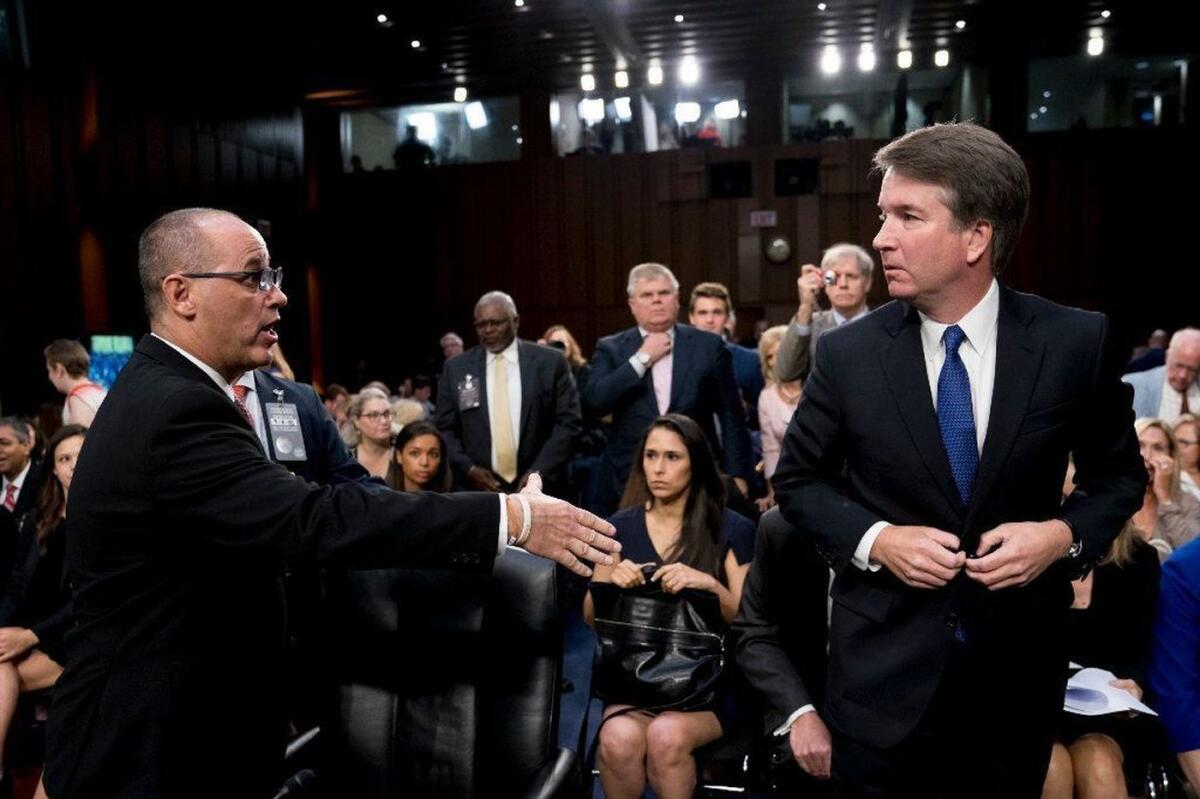
It was the non-handshake seen ‘round the world.
During a break in Supreme Court nominee Brett Kavanaugh’s confirmation hearings on Sept. 4, the father of a school shooting victim approached Kavanaugh and tried to shake his hand.
Kavanaugh moved away without clasping hands with Fred Guttenberg, whose 14-year-old daughter Jaime was among 17 people killed on Feb. 14 at Stoneman Douglas High School in Florida.
Kavanaugh was widely criticized for insensitivity toward a grieving father. Guttenberg himself tweeted:
“Just walked up to Judge Kavanaugh as morning session ended. Put out my hand to introduce myself as Jaime Guttenberg’s dad. He pulled his hand back, turned his back to me and walked away. I guess he did not want to deal with the reality of gun violence.”
It later emerged that Guttenberg, who had been invited to the hearing by Sen. Dianne Feinstein, wasn’t a neutral observer of the proceedings. On Sept. 3, the day before the missed handshake, Guttenberg tweeted:
When people started sharing this tweet, Guttenberg admitted that “YES, I DO NOT SUPPORT KAVANAUGH. It is true. I won’t support anyone who does not support gun safety. That said, I went up to him as a dad with the hope that he might actually ask why and the hope that we could discuss it.”
Sen. Lindsey Graham (R-S.C.) offered Kavanaugh ”a chance to say some things to the people that have attended this hearing,” including Guttenberg. Kavanaugh responded that “I understand how personally people are affected by issues,” but didn’t apologize to Guttenberg. Criticism of Kavanaugh continued.
Now Kavanaugh has taken advantage of another opportunity to address the incident. In response to written questions from members of the committee, Kavanaugh told Sen. Chuck Grassley (R-Iowa) that he assumed the man who approached him “and touched my arm” was one of the many protesters at the hearing
“It had been a chaotic morning,” Kavanaugh wrote, adding: “In that split second, I unfortunately did not realize that the man was the father of a shooting victim from Parkland, Fla. Mr. Guttenberg has suffered an incalculable loss. If I had known who he was, I would have shaken his hand, talked to him, and expressed my sympathy. And I would have listened to him.”
This answer won’t satisfy Kavanaugh’s detractors. Guttenberg tweeted Thursday morning that he was glad Kavanaugh responded in writing, but added, “I now make the choice not to believe in the sincerity of the response. Not only did he not respond to Senator Graham, if he wanted to respond since [then] he could have.”
If you support Kavanaugh, you’ll see him as a victim of a setup and point to all of the people who describe him as a civil and kind person; if you oppose his nomination, you’ll be receptive to the idea that his encounter with Guttenberg showed he’s a jerk who freezes up at being confronted by someone who might disagree with him.
As with the Kavanaugh nomination itself, there’s no middle ground.
If John Cox and Gavin Newsom can’t even organize a debate, how can we trust them to run California?
Earlier this summer it seemed possible, even likely, that there would be only one debate between California’s two gubernatorial candidates. That’s all that front-runner Gavin Newsom, a Democrat, would agree to.
Now it seems as if even that one debate will not happen, and this time because of John Cox’s demands. The Republican businessman, who is challenging Newsom, wouldn’t agree to participate unless he could dictate the topics of conversation, according to a story by my colleague Melanie Mason. The debate host, CNN, finally canceled the Oct. 1 event — and who can blame the network for pulling out?
What a couple of babies. Cox and Newsom should be happy to meet in any and all forums to engage with each other and show voters the differences between them. As The Times editorial board said in a recent editorial, there’s nothing quite like these unscripted debate forums to offer a glimpse into the real character of a candidate.
If the candidates can’t make even a single debate happen, voters might well wonder whether either of them have the negotiating skills necessary to run a state as complex and important as California.
Yet, one of them will be handed that job on Nov. 6, so it’s time to stop the posturing and get to parlaying.
There are only about eight weeks left until election day. Cox and Newsom should get off their high horses and agree on a day and time with one of the organizations that have offered to host a debate. They owe it to the people they are asking to put them in charge of the largest and, arguably, most influential state in the country.
Faced with outrage over an alleged sexual abuse cover-up, the pope points the finger at Satan

Pope Francis will meet Thursday with a delegation of U.S. bishops who want to discuss the furor over the sensational accusations against the pope by a retired Vatican diplomat. The delegation will be led by Cardinal Daniel DiNardo of Galveston-Houston, the president of the U.S. Conference of Catholic Bishops, and Archbishop Jose Gomez of Los Angeles, the vice president.
It’s possible that after the meeting the pope will abandon his policy of refusing to comment on accusations by Carlo Maria Vigano, a former Vatican envoy to the United States. Last month Vigano issued a “testimony” in which he claimed that Francis had attempted to rehabilitate former Cardinal Theodore McCarrick after Francis’ predecessor, Pope Benedict XVI, had sidelined McCarrick by 2010 in response to reports that McCarrick had sexually harassed seminarians.
Certainly Catholics demoralized by the McCarrick affair hope the pope will break his silence. But they couldn’t have been encouraged by a sermon the pope delivered at Mass on Tuesday.
The pope said that it seems as if the devil, “the great accuser, has been let loose and he’s got it in for the bishops.” Francis acknowledged that bishops too are sinners, but suggested that the devil “seeks to reveal sins, which people can see, in order to scandalize the people.”
Although it might not have been the pope’s intention, his language about scandalizing the faithful harks uncomfortably back to a familiar rationalization for concealing sexual misconduct by priests: that revelations of wrongdoing by the clergy would cause the laity to lose faith.
Since Vigano released his sensational “testimony,” serious questions have been raised about his account. For example, it’s not clear whether Benedict imposed formal sanctions on McCarrick or simply suggested that he maintain a low profile. As this timeline from America magazine makes clear, McCarrick continued to make public appearances during Benedict’s pontificate and joined in a meeting at the Vatican in 2012 involving Benedict and other bishops.
It’s also clear, as Francis’ defenders point out, that Vigano is part of an anti-Francis faction within the church and that his accusations are in part a hysterical screed against a “homosexual current” in the hierarchy.
And yet ... Vigano’s central accusation — that he told Francis about McCarrick’s history and the pope nevertheless “continued to cover for him” — is still hanging out there.
As I wrote earlier, the pope needs to answer two questions: Did he know that Benedict had attempted to rein in McCarrick? Did he sound an “all clear” anyway?
If so, why? Because he didn’t believe the accusations against McCarrick? Because they involved alleged improper conduct with adult seminarians rather than minors? (Francis accepted McCarrick’s resignation from the College of Cardinals after a church investigation found credible an accusation that the cardinal long ago had abused a minor.)
Francis said in his sermon that the devil “roams the world seeking how to blame.” Perhaps so, but that’s no excuse for the pope not leveling with the faithful about what he knew and what he did. “Could it be Satan?” isn’t the question on anxious Catholics’ minds.
Fittingly, Trump finds a way to loose more methane on the globe
There’s a certain irony in the timing of a report that the Trump administration is about to lift more restrictions on methane emissions from drilling operations a day after Gov. Jerry Brown signed a new law requiring California to get all of its electricity from zero-carbon sources by 2045.
On the one hand, we have more environmentally irresponsible behavior from the Trump administration, while on the other, the fifth-largest economy in the world steps out — again — as a global leader in the fight to counter the worst effects of climate change.
You can guess which one I’m rooting for.
The Environmental Protection Agency reportedly is planning to scrap Obama-era rules (of course) requiring oil and gas drillers to detect and repair methane leaks that arise during drilling operations. The operators have opposed the requirements because of the added cost — an odd argument, since they can just hand the bill to consumers.
This rollback, which the New York Times reports could be proposed as soon as next week, is particularly bad for the battle against climate change. Methane accounts for less than 10% of greenhouse gases and doesn’t linger as long as carbon dioxide but is exponentially better at trapping heat in the atmosphere. Controlling methane emissions from as many sources as we can will have a deep impact in the near future.
The rollback is part of Trump’s policy to produce as much fossil fuel as can get pumped out of the ground. Interior Secretary Ryan Zinke has expanded the amount of public lands available for oil-and-gas leases and permits for extracting other natural resources, and sped up the permitting process for new wells. The administration also has opened nearly all federal waters for offshore leases, and, after Congress lifted a ban, put part of the Alaska National Wildlife Refuge in play as a potential site for drilling.
Trump has famously said that he disbelieves the science that says human burning of fossil fuels is increasing the temperatures of the atmosphere and oceans – he once called it a hoax perpetrated by China to gain a competitive economic advantage. Whether he actually believes that or was just spewing nonsense (there’s precedent for that) is unclear. But other top administrators, including Zinke, have acknowledged the human role in global warming.
They just don’t care. They’d rather pursue policies that enrich the energy sector than play a role to, in effect, save Earth from ourselves.
There’s an additional irony that the methane news comes as the Global Climate Action Summit — the climate change resistance, if you will — is set to begin Wednesday in San Francisco. The individuals and groups gathering at the summit — primarily people who aren’t national government officials (Brown drove the formation of the coalition) — continue to push to meet carbon emissions goals established in the 2015 Paris agreement from which Trump has since sought to withdraw. If Trump gets his way, it would make the U.S. — the prime actor in arranging the Paris summit — the only nation in the world to fall outside of it.
You can guess whom I’m rooting for there, too.
When will Trump learn to shut up and let the economy do the talking for him?
President Trump’s recent claims about the economy have been so outlandish, even Fox News is correcting him.
Early Monday morning, Trump claimed this distinction:
Oh for heaven’s sake. It’s a good milestone for sure, but that combination of high growth and low unemployment has been repeated dozens of times since World War II ended. Here’s what Fox News’ research arm had to say:
That’s eight (count ’em, eight) quarters just in the Clinton years. Not surprisingly, though, the economy never grew at a higher percentage than the unemployment rate during President Obama’s years, which seem to be the only ones that Trump cares about.
Trump and his Republican allies in Congress deserve some of the credit for the uptick in economic growth; the tax cuts they pushed through in December 2017, combined with the removal of some federal regulations, have no doubt contributed to the acceleration. The president may be creating some headwinds for the economy too with the trade war he’s launching and the deficits he’s running, which are astounding in an expanding economy. But for now, the overall picture is a good one.
So why is he so insecure about it?
The White House issued a press release Monday afternoon proclaiming not only an “economic turnaround” — ignoring the fact that before Trump took office, the economy had been growing slowly but steadily for 11 consecutive quarters, two of which had stronger growth than anything seen since — but also a “historic economic success,” as if the 1990s and the postwar boom never happened. The release then went on to note six pundits or former Obama administration officials who’d claimed Trump was getting too much credit for the improving fortunes.
If I were Trump, I’d take a chill pill. Or maybe just lay off the Diet Coke for a while.
You can’t fool people into thinking they’re doing better or worse than they are. Their sense of well-being is the product of their quality of life and that of the people close to them. Although every household has its own experience and each community has its own setbacks and triumphs, polls show that Americans’ confidence in the U.S. economy overall has grown as memories of the last recession have faded. Here’s a chart from TradingEconomics.com showing the steady rise in “consumer sentiment” — an open-ended measure of well-being — as tracked by the University of Michigan:
The chart paints a pretty good picture for Trump, despite the tail-off in recent months that TradingEconomics’ Joana Taborda blamed on rising prices and interest rates. Consumers remain confident about their jobs and their income, Taborda noted — something that should, theoretically, give Republicans hope despite the gloom and doom about the midterm elections.
And yet Trump simply can’t stop the hyperbole, or worse. The latter is what prompts folks like me to write so many correctives, which end up drowning out the good news the economy is generating organically.
A little less than an hour after the tweet that prompted Fox to set the record straight, Trump banged out this one:
This came on the heels of a series of tweets blasting dishonest media and made-up quotes by Bob Woodward in his new book — and it’s a made-up quote!
In a town hall held in June 2016, Obama responded to a question about Trump’s promise to bring back manufacturing jobs that had moved overseas. Referring to that specifically — and not to GDP growth — Obama said that Trump (whom he did not name) didn’t have a plan, just a promise to extract better trade deals. “How exactly are you going to negotiate that?” Obama asked, according to the Hill. “What magic wand do you have? And usually the answer is, he doesn’t have an answer.”
There’s been one revised trade pact finalized so far, and that was with Korea. And Trump can argue that the concessions Korea made to reduce steel exports and import more U.S.-made automobiles have been good for domestic manufacturers. At this point, though, the numbers tell a different story — that the post-recession recovery in manufacturing jobs has continued under Trump at the same trajectory it was on under Obama, and in no way approaches the manufacturing employment level pre-recession, or what it was in the Clinton years:
So no, there’s no magic wand in evidence. But the last quarter was a good one, and the current quarter appears like it will be a good one too. The president should rest on his laurels and let the economy do his talking for him.
Kamala Harris and the Curious Case of the Kavanaugh ‘Conversation’
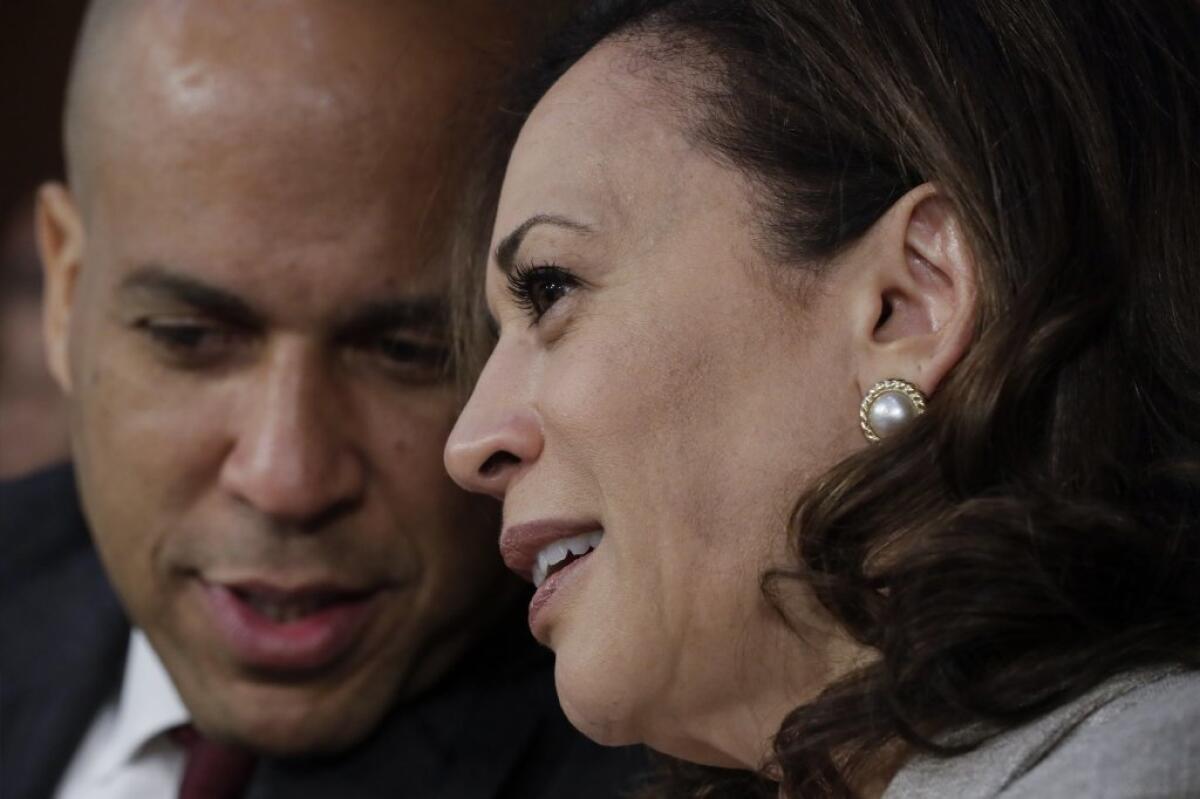
Sen. Kamala Harris, one of at least two potential Democratic presidential candidates on the Senate Judiciary Committee, got a lot of eyeballs for the video of part of her interrogation of Supreme Court nominee Brett Kavanaugh.
The drama unfolded Wednesday when Harris asked the judge: “Have you discussed [Robert S.] Mueller or his investigation with anyone at Kasowitz Benson Torres, the law firm founded by Marc Kasowitz, President Trump’s personal lawyer?” Sounding like a prosecutor warning of a perjury trap, she added ominously: “Be sure about your answer, sir.”
Kavanaugh, perplexed, asked, “Is there a person you’re talking about?” Harris, unable or unwilling to provide a name, shot back: “I’m asking you a very direct question: Yes or no?”
When Kavanaugh didn’t give her the answer she wanted, Harris turned mind-reader, saying: “I think you’re thinking of someone and you don’t want to tell us.” But Harris herself didn’t provide any information about this supposed corrupt conversation.
I wrote a post on this blog on Thursday criticizing Harris for seeming to promise a huge revelation about impropriety on Kavanaugh’s part and not delivering. After it was published, it emerged that one of Kavanaugh’s friends, a former lawyer in the White House counsel’s office named Ed McNally, worked at the Kasowitz firm. A reader asked me if I shouldn’t update my post in light of this information.
I’m happy to oblige, but I don’t think this information vindicates Harris’ inquisition.
The McNally connection does suggest that Kavanaugh could have been more forthcoming when he was questioned by Harris on Wednesday. I suppose he could have said something like: “I think my friend Ed McNally works at that firm, but I’ve never talked about the Mueller investigation with him. Is that who you have in mind?”
Yet even now it’s not clear whether Harris did have McNally — or any other individual — in mind when she posed her question Wednesday.
McNally did surface in the hearings Thursday when Sen. Richard Blumenthal (D-Conn.) asked Kavanaugh if he had ever discussed the Mueller investigation with the lawyer. Kavanaugh answered, “No.” Yet when it came time for Harris to question Kavanaugh, she didn’t mention McNally and again rebuffed a request by Kavanaugh that she identify the person he supposedly had communicated with.
Instead, she reiterated that she had been given “reliable information” that Kavanaugh had participated in a conversation about the Mueller investigation with people at the law firm representing Trump. Again she asked if he had been party to such a discussion. This time Kavanaugh said, “The answer is no.”
“Let’s move on,” Harris said.
Yet the senator doesn’t seem to be moving on from her insinuation about a conversation that Kavanaugh has now denied. Thursday night she phoned into Rachel Maddow’s show to complain that Kavanaugh “keeps equivocating.” She said his response “leads me to believe that there’s more to this than he’s letting on.”
When Maddow tried to get Harris to be forthcoming about the source of her suspicions — mentioning McNally — Harris demurred, comparing herself to a journalist who protects confidential sources. She said the burden was on Kavanaugh to explain why he has “equivocated.”
So in the Case of the Curious Kavanaugh Conversation, we have Kavanaugh’s denial that it took place against Harris’ lingering suspicions, based on a “reliable” source.
As a journalist, I’m not going to dismiss the possibility that anonymous sources might provide accurate information. But most news stories based on confidential sources tend to be highly specific. Harris’ questions to Kavanaugh were devoid of details.
Conceivably facts could emerge that would justify Harris’ suspicions and prove that Kavanaugh is a liar. So far they’re elusive.
So why was this such a big story, other than the fact that Harris is a prospective presidential candidate?
The idea of corrupt contacts between Kavanaugh and Trump’s lawyers resonates because it fits into the larger conspiracy theory, much in evidence at this week’s hearings, that Kavanaugh was nominated not because of his prominence in conservative legal circles but because he could be expected to protect Trump from Mueller in some way — say, by casting the deciding vote in a decision on whether Trump would have to comply with a subpoena for his testimony. Sen. Sheldon Whitehouse (D-R.I.) referred to a concern that Kavanaugh was a “human torpedo being launched at the Mueller investigation.”
If you believe that, then “there’s more to this than he’s letting on” might seem like irrefutable evidence.
Elon Musk smoking pot? Meh. L.A. should be more worried about his ludicrous tunnel plan
While the business world was scandalized by Elon Musk smoking marijuana on a podcast late Thursday, here’s a reason for Los Angeles to be offended: The city may be getting played by Musk and his tunnel-boring company.
Mayor Eric Garcetti, the City Council and the Los Angeles County Metropolitan Transportation Authority have all been drafted into working on Musk’s idea to build a network of tunnels under Los Angeles that could whoosh cars or pods of people underground and out of traffic.
City Council members wanted to waive the standard environmental reviews for Musk’s proof-of-concept tunnel, giving the project a free pass rarely extended to other transportation projects. City staff have begun work on the environmental review needed for the Boring Co.’s other project in L.A. — the proposed Dugout Loop, a 3.6-mile underground shuttle to ferry fans to Dodger Stadium.
That’s a lot of time and money invested in transportation innovation. But according to Musk, it’s all a bit of a lark.
During his interview on “The Joe Rogan Experience” podcast, Musk called the Boring Co. a “sort of a hobby company.”
“It started out as a joke and we decided to make it real and dig a tunnel under L.A.,” Musk said.
“I’m not saying it’s going to be successful,” he added. “It’s not, like, asserting it’s going to be successful. But so far I’ve lived in L.A. for 16 years and the traffic has always been terrible. And so I don’t see any other ideas for improving the traffic.
“So in desperation, we are going to dig a tunnel, and maybe that tunnel will be successful. And maybe it won’t.”
Yikes. It’s fine to be cavalier about an idea when it’s still a concept on paper. But Musk’s company is digging tunnels now and seeking permits to build more. The Boring Co. was picked to build an “Express Loop” service from downtown Chicago to O’Hare International Airport.
What happens if those projects aren’t successful? What becomes of empty, unused tunnels? That’s a lot of time and money wasted if, oops, guess those tunnels didn’t work out after all.
Garcetti and Metro’s CEO Phil Washington have, rightly, sought out innovators and bold ideas to get more mass transit projects built faster. If Musk or some other entrepreneur wants to put up the ideas and money to build alternatives to driving, then it’s worth hearing them out.
But Musk’s interview should be a big red flag — and not because he was smoking pot.
Kamala Harris’ mind-reading act at the Kavanaugh hearing failed miserably
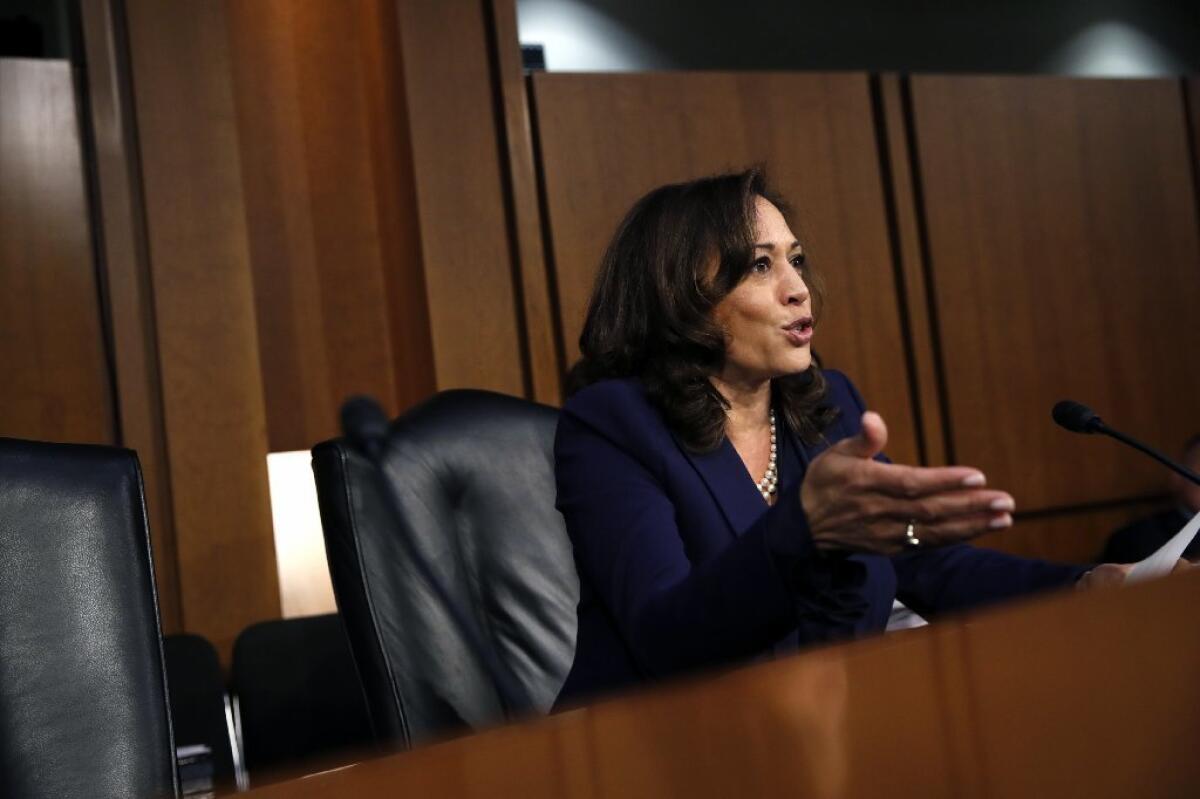
Among several surreal moments at the confirmation hearings for Supreme Court nominee Brett Kavanaugh, one of the strangest was an encounter Wednesday evening between Sen. Kamala Harris and the nominee.
In full prosecutorial mode, Harris asked Kavanaugh: “Have you discussed [Robert S.] Mueller or his investigation with anyone at Kasowitz Benson Torres, the law firm founded by Marc Kasowitz, President Trump’s personal lawyer?” She added the portentous warning: “Be sure about your answer, sir.”
Like most people watching, I assumed Harris was about to confront Kavanaugh with evidence that there had been such a potentially problematic conversation, and name the lawyer with whom Kavanaugh supposedly communicated.
But there was no big reveal.
Kavanaugh reasonably asked Harris, “Is there a person you’re talking about?” She shot back: “I’m asking you a very direct question: yes or no?”
“I’m not sure I know everyone who works at that law firm,” Kavanaugh said.
Harris pressed on: “I don’t think you need to. I think you need to know who you talked with. Who’d you talk to?”
Kavanaugh: “I’m not remembering, but I’m happy to be refreshed or if you want to tell me who you’re thinking [of].
Harris: “Are you saying that with all that you remember — you have an impeccable memory; you’ve been speaking for almost eight hours, I think more, to this committee about all sorts of things you remember. How can you not remember whether or not you had a conversation about Robert Mueller or his investigation with anyone at that law firm? The investigation has only been going on for so long, sir.”
It gets even stranger after that, with Harris engaging in Kreskin-like mind-reading (“I think you’re thinking of someone and you don’t want to tell us.”) You can watch the exchange here.
At Thursday’s session Kavanaugh told Sen. Orrin Hatch that “I don’t recall any conversations of that kind with anyone at that law firm” about the Mueller investigation.
CNN quoted Harris as saying that “I have a good reason to believe there was a conversation” and that her question was based on “pretty reliable” evidence. Her grilling of Kavanaugh would have been more effective if she had provided it.
Anonymous peeks behind the White House curtain confirm what America already knew — Trump is a train wreck

The president is not amused. In fact, the one-two punch this week from Bob Woodward’s book detailing the dysfunction in the White House, and Wednesday’s unsigned New York Times op-ed that seemed to verify Woodward’s work even as the White House slammed it, has the administration writhing and reeling.
Here are a few points to focus on.
First, the details that have emerged from early takes on Woodward’s book don’t come as a surprise. From the start of the administration it’s been clear the West Wing is staffed, by and large, with amateurs, and the Oval Office is home to one of the most unqualified presidents in history. As the Los Angeles Times argued in the “Our Dishonest President” series last year, the man is a menace to all that our nation has traditionally stood for.
He also thinks he’s an emperor more than a president, and his management technique relies on bullying and intimidation. Fealty from subordinates and winning whatever fight is in front of him is all that matters to him. The nation has known that; Woodward and the op-ed writer are just giving readers more salacious details about how much disarray there is in the White House.
Second, Trump and his press secretary, Sarah Huckabee Sanders, were teed off that the op-ed writer chose not to sign the piece. Whether the New York Times should have published an anonymous op-ed is an interesting question. It doesn’t always happen this way, but the usual standard for allowing a source to go unidentified in a news story is whether the information provided is true and in the public interest, and whether identifying the source will likely lead to severe repercussions — arrest, dismissal from a job, physical harm.
It’s safe to assume that if that op-ed came with a name on, that person would have been fired by dinnertime Wednesday.
But note, too, that the administration — and particularly Sanders — lashed out at the lack of attribution. That’s a rich criticism coming from an administration that, like its predecessors, routinely holds briefings and phone calls with reporters that require the reporters not to identify the administration officials involved by name. So in the administration’s view, anonymity in the media is fine so long as it fits the president’s agenda.
Trump et al. can’t have it both ways.
Finally, after the op-ed appeared online Wednesday the president tweeted, “TREASON?”
No, per federal law:
“Whoever, owing allegiance to the United States, levies war against them or adheres to their enemies, giving them aid and comfort within the United States or elsewhere, is guilty of treason.”
If anything, the anonymous sources in Woodward’s book, and the author of the op-ed, are seeking to protect the American people and the U.S. government from a president and top advisors who seek to dismantle it.
There ought to be a medal for that.
Forget Russian disinformation. The Justice Department just wants to crack down on liberal bias
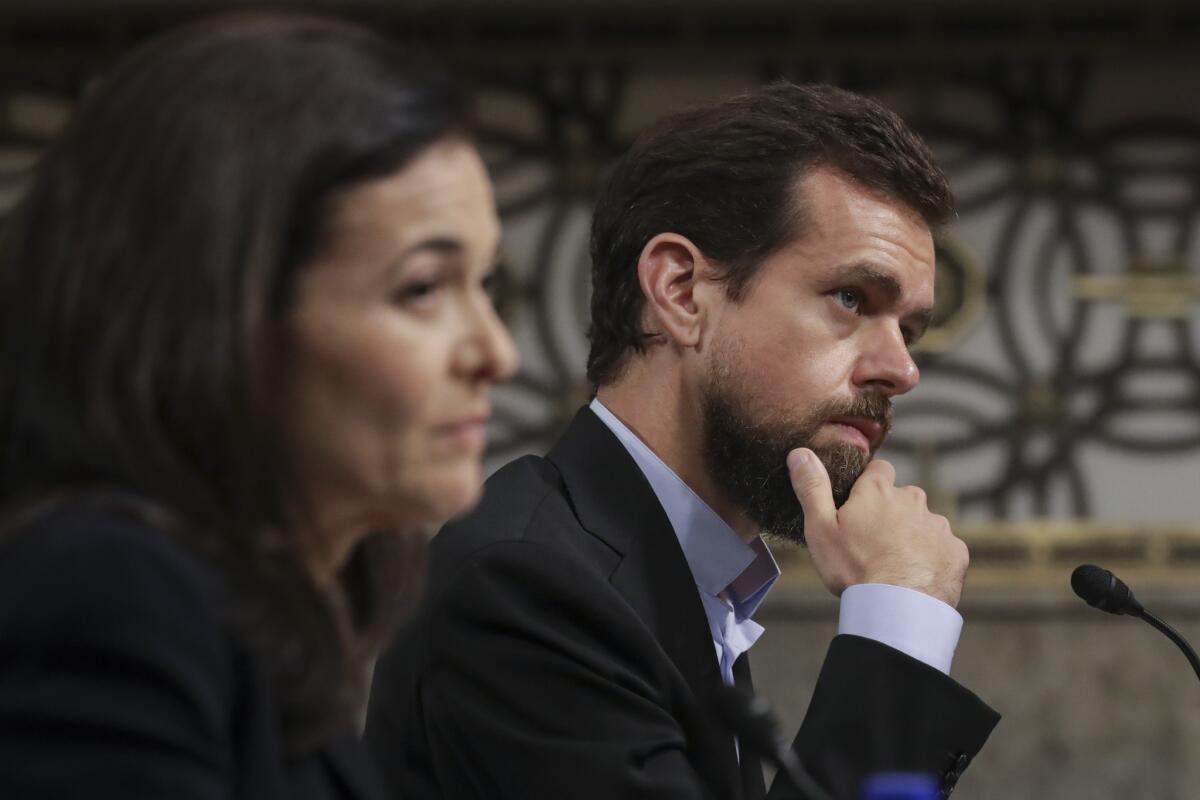
Company executives hauled in front of Congress to explain why they haven’t solved this or that problem know that lawmakers are likely to threaten them with new regulations or other sanctions.
And sure enough, that’s what happened when top executives from Facebook and Twitter appeared before the Senate Intelligence Committee to answer questions about their platforms’ vulnerabilities to manipulation and abuse.
What’s unusual was the response from the Trump administration. Just as the hearing was ending, the Justice Department issued a statement saying Atty. Gen. Jeff Sessions will meet this month with several state attorneys general “to discuss a growing concern” that social media companies “may be hurting competition and intentionally stifling the free exchange of ideas on their platforms.”
Wait, what?
The hearing, which featured testimony from Facebook Chief Operating Officer Sheryl Sandberg and Twitter Chief Executive Jack Dorsey, wasn’t an exploration of monopoly power or information stifling; the topic was foreign government meddling on social media platforms. In other words, it was about the companies’ failure to stifle disinformation.
But President Trump doesn’t seem to believe the Russians tried to influence American voters in 2016, let alone that they might have interfered with the democratic process. To him, the real problem with social media platforms is that they have sanctioned or excluded Alex Jones, the conspiracy theorizing online publisher who’s become one of Trump’s biggest fans. Trump also has embraced the argument by Republicans that Facebook, Twitter, YouTube and other major social media platform discriminate against content from conservative voices.
Hence the meeting among some of the country’s top prosecutors to look at potential antitrust and censorship issues by the platforms Trump has singled out for attack. The president’s barbed tweets may not have motivated Sessions to fire special counsel Robert S. Mueller III or launch investigations into Trump’s political opponents, but they appear to be generating results here.
Still, it’s unclear what exactly the attorneys general could do to address Trump’s complaints about the “Social Media Giants.”
Facebook and Google could have an antitrust problem if the attorneys general find evidence that the companies leverage their dominance in social media and search, respectively, to boost other ventures they control. (The European Union has smacked Google on this point.) On censorship, they’re private companies, so they’re not obliged to let people use their platforms to say whatever they like. The only obvious issue would be if they silence or discriminate against users in ways that violate their own terms of service or a state-law mandate on private companies.
On the other hand, there’s no shortage of evidence that Russia, Iran and other less-than-friendly foreign states have tried to manipulate opinions here and abroad through fake accounts on Facebook and Twitter. On Wednesday, Sandberg and Dorsey acknowledged that the problem is real while pledging to devote more resources to it, act more transparently and come up with a more effective response. Predictably, committee members from both parties expressed doubt that the companies were moving fast enough.
They also called for more governmental intervention. Most notably, Sen. Mark R. Warner (D-Va.), a former tech investor who’s now the top Democrat on the panel, told the two executives (as reported by The Times’ David Pierson) that the “size and reach of your platforms demand that we, as policymakers, do our job, to ensure proper oversight, transparency and protections for American users and for our democratic institutions.” Just in case that message wasn’t clear enough, he added, “The era of the Wild West in social media is coming to an end.”
Warner circulated a 20-point plan this summer for improving consumer privacy, combating the spread of disinformation and promoting competition in social media. His focus, like that of many Democrats and some Republicans, is on protecting consumer privacy and the integrity of elections. But he’s a Democrat, so he can’t turn any of his proposals into law unless congressional Republicans embrace them. The Trump administration, on the other hand, can do much more to make life difficult for those companies. And on the president’s bidding, it’s gearing up to do so.
Dianne Feinstein isn’t convinced that Kavanaugh will leave Roe vs. Wade alone. Should you be?
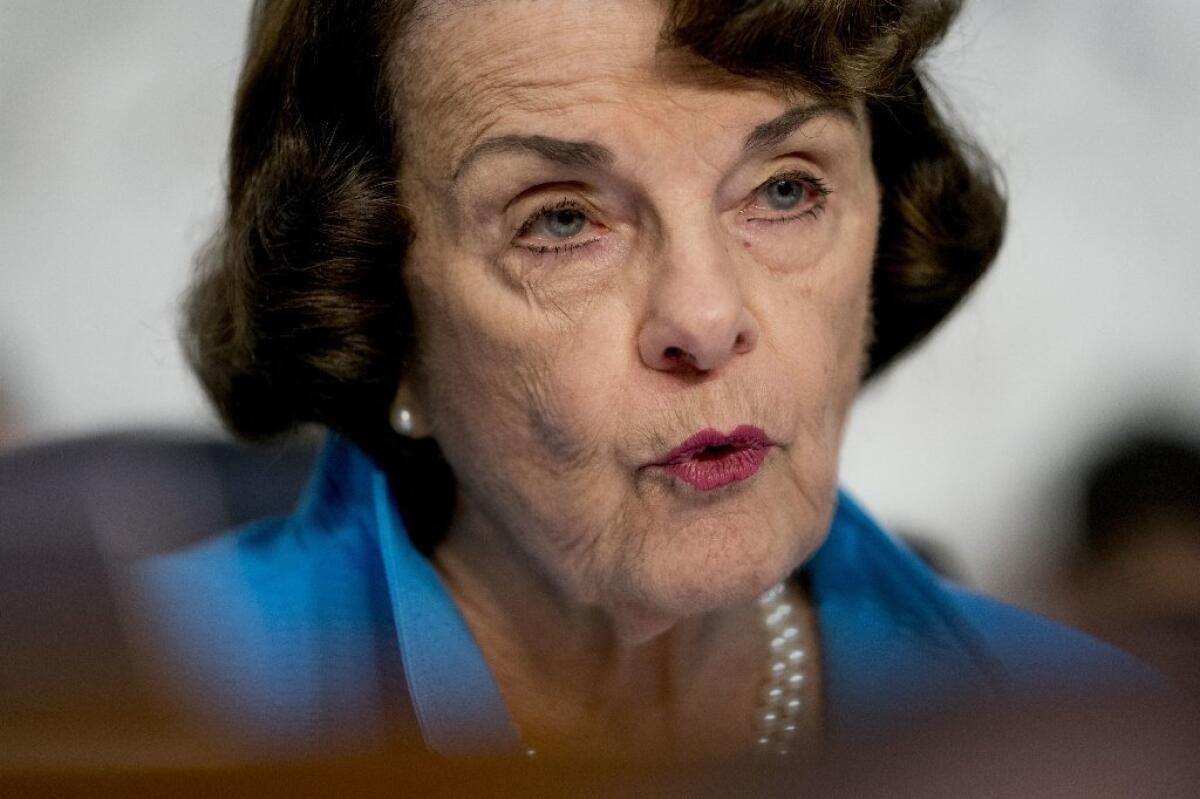
For a lot of viewers of Day 2 of Judge Brett Kavanaugh’s confirmation hearings, it was the main event: Sen. Dianne Feinstein’s questioning of the Supreme Court nominee about his attitude toward Roe vs. Wade, the 1973 decision legalizing abortion that Feinstein fears Kavanaugh might vote to overturn.
She’s not alone. In an editorial on Tuesday, the Los Angeles Times editorial board, noting that Kavanaugh had told another senator that Roe was “settled law,” suggested that he should be asked to explain what he meant by that term.
So was Kavanaugh reassuring about whether he would leave Roe alone?
Feinstein wasn’t persuaded. She tweeted late Wednesday that “Roe v. Wade is ‘settled law’ only until five Republican Supreme Court Justices overturn it. Brett Kavanaugh’s statements should not convince anyone that he would uphold Roe.”
But other pro-choice senators could reasonably find comfort in Kavanaugh’s comments.
Kavanaugh was at least as encouraging as Chief Justice John G. Roberts Jr. was when he was questioned about Roe at his confirmation hearings in 2005. The most aggressive interrogation on that subject came from the late Sen. Arlen Specter of Pennsylvania, at the time one of the Senate’s most skilled lawyers (if he did say so himself).
Specter succeeded in making it difficult — though obviously not impossible — for Roberts to vote to overrule Roe or Planned Parenthood vs. Casey, the 1992 decision that reaffirmed Roe’s “essential holding.”
For example, Specter got Roberts to acknowledge that the Supreme Court “went through the various factors on stare decisis” before it decided Casey. And after Specter reminded Roberts of language in the Casey decision expressing concern that overruling Roe would undermine the court’s legitimacy, Roberts said: “I do think the considerations about the court’s legitimacy are critically important.” Roberts then made his oft-quoted comment that “it is a jolt to the legal system when you overrule a precedent.”
In answering Feinstein, Kavanaugh essentially channeled Roberts. He said that “as a general proposition, I understand the importance of the precedent set forth in Roe vs. Wade” and reaffirmed in Casey, which he called a “precedent on precedent.”
Asked to parse “settled law,” Kavanaugh said that Roe is “settled as a precedent of the Supreme Court entitled to respect under principle of stare decisis,” adding, “One of the important things to keep in mind about Roe vs. Wade is that it has been reaffirmed many times over the past 45 years.” He noted that in the Casey decision, the court “didn’t just reaffirm it in passing; the court specifically went through all the factors of stare decisis in considering whether to overrule it.”
Kavanaugh also told Feinstein that “I don’t live in a bubble,” an oblique but unmistakable acknowledgement of the fact that overruling Roe and Casey would be a jolt not just to the law but to women’s lives.
Like Feinstein, many of Kavanaugh’s critics will dismiss this as worthless verbiage and note — correctly — that it doesn’t commit him to reaffirming Roe or Casey. The nominee acknowledged as much in an exchange with Sen. Lindsey Graham. Roberts didn’t make such an ironclad commitment either. Yet, under Specter’s prodding, he conceded a good deal. So did Kavanaugh.
No, anonymous Trump official, you’re not ‘part of the resistance.’ You’re a coward
A New York Times op-ed allegedly written by a senior Trump administration official has set the internet ablaze. Its headline: “I am part of the resistance inside the Trump administration.” Its premise: A group of Trump appointees is working from the inside to stop the president from fulfilling the parts of his agenda they disagree with.
Obviously, the writer and other like-minded higher-ups are not part of the “resistance” that’s marching in the streets protesting.
The piece suggests America is currently under a “two-track presidency.” If President Trump wants to do something the people in his administration think is good, they go along with it. If he wants to do something they think is bad, they find ways around it. This is in keeping with what the Bob Woodward book excerpt revealed: Senior officials are taking things off Trump’s desk to keep him from seeing them.
Nobody who’s part of the real resistance should be celebrating this. If you work in this administration and carry out any part of Trump’s agenda, you are enabling him, not undermining him. If we have a president so incompetent that his most trusted advisors have to play peekaboo to preserve national security, then those people should be working to get him out of office, not just spare us from his cruelest impulses.
The op-ed says Trump is anti-trade and anti-democratic. His leadership is characterized as “impetuous, adversarial, petty and ineffective.” It says he goes on long, repetitive rants and makes “half-baked, ill-informed and occasionally reckless decisions.” It says these “unsung heroes” are protecting America from Trump’s “erratic behavior.”
If they really believe there’s a need to subvert the president to protect the country, they should be getting this person out of the White House. But they’re too cowardly and afraid of the possible implications. They hand-wave the notion thusly:
“Given the instability many witnessed, there were early whispers within the cabinet of invoking the 25th Amendment, which would start a complex process for removing the president. But no one wanted to precipitate a constitutional crisis.”
How is it that utilizing the 25th Amendment of the Constitution would cause a crisis, but admitting to subverting a democratically elected leader wouldn’t?
The truth is, Republicans don’t want Trump out of office. They’re clearly pleased with this “two-track” arrangement. They’re advancing the right-wing economic agenda that President Jeb Bush or Ted Cruz would have been championing while preserving their popularity with Trump’s base.
If you’re reading this, senior White House official, know this: You are not resisting Donald Trump. You are enabling him for your own benefit. That doesn’t make you an unsung hero. It makes you a coward.
Now Trump is targeting Vietnamese refugees
In its insatiable quest to rid the U.S. of immigrants, the Trump administration has been rounding up Vietnamese refugees who have been in the country for more than a quarter of a century and trying to send them back to Vietnam — despite a formal bilateral agreement that refugees who arrived here prior to the 1995 normalization of relations between the two countries would not be sent home.
In a number of cases, the refugees have been held in detention centers for months as the government sought to obtain travel documents from the Vietnamese government, and despite a Supreme Court decision that said the government could not detain someone for an extended period of time if it was unlikely the home country would accept the deportee.
After the end of the Vietnam War, and after the North Vietnamese communist government unified the country, hundreds of thousands of South Vietnamese — many of whom fought alongside or cooperated with American forces — fled for safety, often boarding rickety boats to cross the South China Sea. In many cases, the refugees were stateless, because they were citizens of South Vietnam, a country that dissolved with the end of the war.
Nearly 1.3 million eventually settled in the U.S., some 200,000 in and around Orange County’s Little Saigon.
That large a population is bound to include some people who break the law, and upward of 10,000 Vietnamese have been ordered deported by immigration judges after being convicted of often serious crimes in American criminal courts. But for more than three decades after the war ended, the Vietnamese government refused to accept deportees from the U.S., viewing the refugees as political enemies or possible American spies.
That changed in 2008, when the George W. Bush administration reached an agreement under which Vietnam would accept the return of deportees who had arrived in the U.S. after July 12, 1995. The wording of the pact is significant:
“Vietnamese citizens are not subject to return to Vietnam under this Agreement if they arrived in the United States before July 12, 1995, the date on which diplomatic relations were re-established between the U.S. Government and the Vietnamese Government. The U.S. Government and the Vietnamese Government maintain their respective legal positions relative to Vietnamese citizens who departed Vietnam for the United States prior to that date.”
For a decade that has been interpreted as a flat protection for the refugees. But the Trump administration argues in court filings — immigrant rights organizations are suing to halt the detentions and deportations — that the second sentence in effect negates the first, so the U.S. can deport Vietnamese refugees if they have committed acts that render them ineligible to remain in the U.S.
“The agreement does not in fact prohibit such removals,” the government argued in court documents. “Rather, it provides merely that pre-1995 aliens cannot be removed under the terms of the agreement itself.”
That’s a specious argument. Until the agreement, Vietnam would not accept any deportees from the U.S.; after the agreement, it began accepting what are called post-1995 deportees. So the only mechanism for returning people to Vietnam falls under the agreement, regardless of U.S. laws. The Trump administration is simply trying to break the terms of the deal — and so far has been successful in at least 11 cases, though it’s unclear why Vietnam agreed to let the deportees in. According to reports, the deportees have had trouble finding places to live and getting permission to work in Vietnam.
News accounts of the efforts have focused on refugees who arrived here as young (usually) men with limited social or family structure. A number of them fell in with gangs or individually committed crimes of varying seriousness, from drug possession to robbery and a few rare murders. Yet the issue here isn’t the crimes some refugees committed, but the circumstances of their arrival in the U.S., and the letter of the agreement with Vietnam.
This is yet another instance in which the Trump administration has just bulled its way forward to try to reduce the number of immigrants living in the U.S. If the government believes that it is in the nation’s best interest to deport Vietnamese refugees convicted of crimes, then it should reopen the 2008 agreement and create a lawful mechanism to do so.
Democrats aren’t ready to play nice with Kavanaugh

The first day of Judge Brett Kavanaugh’s confirmation hearings for the Supreme Court mostly lived down to expectations, though there were some unexpected theatrics.
Indignant over a last-minute document dump, Democrats on the Senate Judiciary Committee made a doomed, but dramatic, effort to delay the hearing. Code Pink-style demonstrators punctuated the proceedings with often unintelligible outbursts, leading Sen. John Cornyn (R-Texas) to complain, hyperbolically, about “mob rule.”
There was no questioning of the nominee on Tuesday, just a series of speeches by senators, followed in the afternoon by Kavanaugh’s prepared statement. Predictably, Democrats viewed the nomination with various degrees of alarm, and the president who chose Kavanaugh cast a long shadow.
Sen. Cory Booker (D-N.J.) found it sinister that Kavanaugh’s name wasn’t on Trump’s original list of potential nominees, drawn up with the advice of the Federalist Society. He suggested that Kavanaugh’s name was later added to the list after Trump was put in jeopardy by special counsel Robert S. Mueller III’s investigation.
United as the Democrats were, a paradox haunted their offensive against Kavanaugh: Their position essentially was: “We need to know more about his record, but we already know enough to oppose him.” Booker tried to square that circle, admitting that, yes, he has already made his mind up to oppose Kavanaugh, but he still had a duty to “fully vet” the nomination.
For Californians, Tuesday’s hearings offered a contrast between the state’s two senators. Kamala Harris, a potential 2020 presidential candidate who announced her opposition to Kavanaugh on July 9, emerged as a leader of what might be called the Resistance to Kavanaugh.
She objected early in the proceedings to moving forward before members had read all the documents from Kavanaugh’s time in the George W. Bush administration. In her opening statement, which wouldn’t have been out of place on the campaign trail, she lambasted Kavanaugh, claiming that he had “devoted his entire career to a conservative Republican agenda.”
Dianne Feinstein, the committee’s ranking Democrat, while clearly concerned about Kavanaugh, was more subdued, focusing on her longstanding worries about the future of Roe vs. Wade.
When Kavanaugh himself finally got to speak, he channeled Chief Justice John G. Roberts Jr., saying: “A good judge must be an umpire — a neutral and impartial arbiter who favors no litigant or policy.” He name-checked failed Obama nominee Merrick Garland (“our superb chief judge”) and Justice Anthony M. Kennedy, the justice he would replace, whom he called “a mentor, a friend and a hero.”
None of that is likely to provide much immunity for him when Democrats begin questioning him Wednesday. The question is whether the interrogation will focus on what the Democrats claim they don’t know about the judge or on what they already know — and don’t like.
The chairman of the FCC would rather regulate Twitter than Comcast
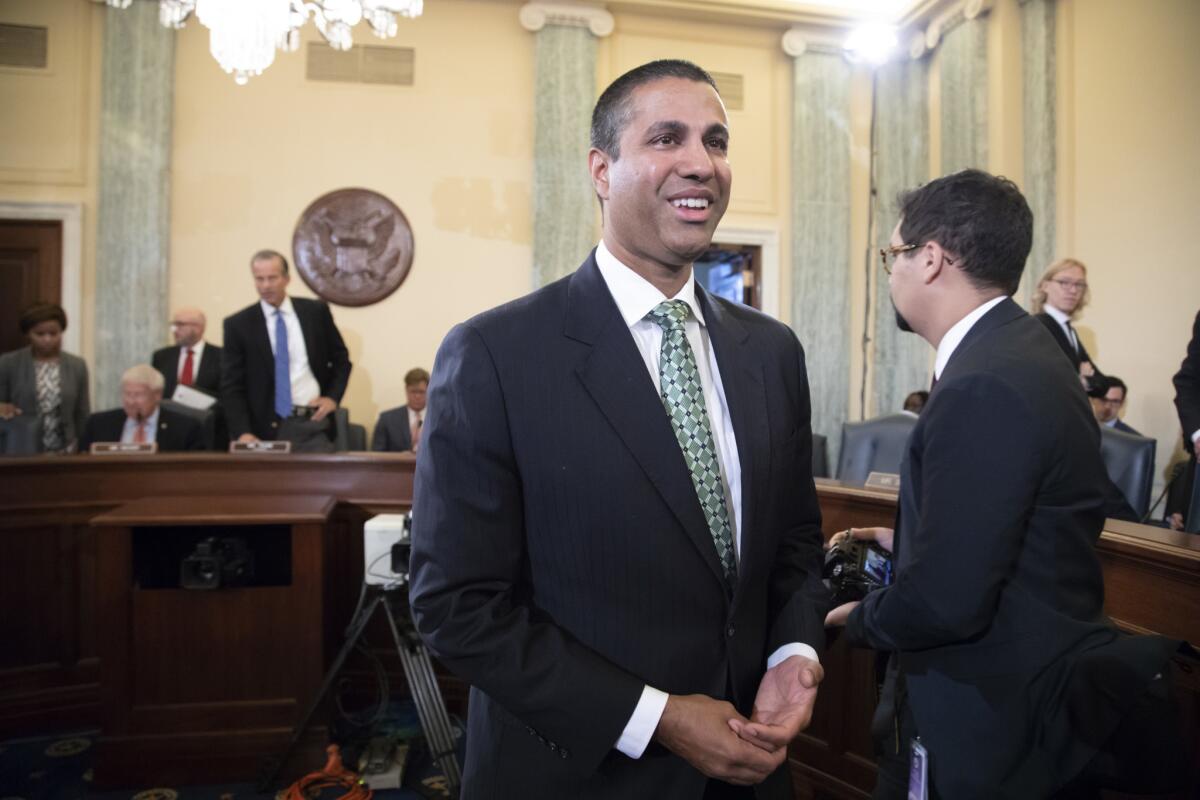
As top officials at Facebook and Twitter prepare for another round of grilling by congressional committees this week, Americans — in fact, people around the world — should be worrying about the enormous clout that a handful of giant online companies wield. But I don’t need to hear that particular warning from the guy who dismantled the Federal Communications Commission’s net neutrality rules.
Ajit Pai, who took over as chairman of the FCC after Republicans took control of the commission in January 2017, blogged Tuesday that he wanted more transparency, openness and respect for personal privacy from the likes of Facebook, Twitter and Google. Funny, but these are the same qualities that the FCC tried to protect in 2015 with its net neutrality rules, only to have Pai and his GOP colleagues repeal them. Sauce for the gander, Mr. Chairman.
To help justify dumping net neutrality, Pai and other Republicans argued that dominant online platforms from the likes of Facebook and Apple were a bigger threat to openness than ISPs. Democrats, meanwhile, focused their fire on ISPs, noting that “edge providers” like Facebook got to where they are today based on choices made by consumers themselves. ISPs, by contrast, succeed because their businesses have enormous up-front costs and capital expenses that have minimized competition.
That’s why net neutrality rules make a lot more sense from a consumer-protection point of view than a crackdown on “edge providers” like Twitter or YouTube. Market forces can penalize bad behavior by edge providers, not so much by those controlling the last mile.
Anyway, having dumped the net neutrality rules, Republicans have amplified their criticism of the big tech companies, accusing them of anti-conservative bias. Pai has been part of this chorus for a while, and he continued with the conspiracy-theorizing in his Medium post Tuesday.
Specifically, he cited a handful of questionable moves by YouTube and Twitter to block content by Republican or conservative voices. No doubt these happened, but seriously — even if he offered 100 examples, that wouldn’t amount to pixie dust on platforms this size, considering the enormous volume of content they handle every hour of every day. Nor is it evidence of bias unless Pai can show that nothing similar happened to folks on the left, which seems dubious. Witness, for example, the bogus claims about Twitter “shadow banning” certain conservatives with a poorly executed software update that also affected some liberal users.
Pai’s post made it clear that he doesn’t favor utility-style regulation for websites. Score one for consistency — he opposed the utility-style regulation the FCC imposed on ISPs in the 2015 net neutrality rules. Instead, he called for more transparency about the way Twitter, Facebook and the like decide what content is permitted on their platforms.
He likened that to the FCC’s new approach to broadband providers, which required them simply to disclose more about their network management, data speeds and terms of service. But Pai doesn’t seem to want just information from the big platforms. He’s looking for some kind of oversight over how they enforce their terms of service, potentially beyond the typical FTC requirement that companies not mislead their users.
That’s what we’re talking about here — terms of service. What data are being collected about you? What sorts of expression are deemed unacceptable? What does it take to get booted off the platform? The FTC has the authority to regulate on that front, it just hasn’t been terribly effective at it.
So sure, let’s have that conversation. Let’s do some valid research, rather than simply collecting anecdotes, about whether Facebook, Twitter and other popular online sites and services discriminate against conservative voices. Do their liberal workplace cultures affect their platforms? And most important, have network effects and scale neutered market forces?
The Times’ editorial board has argued multiple times in favor of Congress enacting a privacy bill of rights (as well as legislation to authorize and direct the FCC to protect net neutrality). So there’s a role for Washington here in setting the ground rules. It’s just not a role that Pai can play credibly.
Colin Kaepernick, the best publicized yet most misunderstood man in sports
Regardless of whether you agree with Colin Kaepernick, you have to admit that he’s made a real financial sacrifice for his beliefs. And by featuring the former San Francisco 49er quarterback in a new round of promotions, Nike is risking a real financial sacrifice for Kaepernick’s beliefs too.
The question now is whether Nike’s support will do anything to clear up the widespread misunderstanding about what Kaepernick’s beliefs actually are.
The early signs are not good.
To recap for the 15 readers out there who don’t watch the National Football League, Kaepernick started sitting, then kneeling during the national anthem in 2016 to protest the use of force by police against unarmed black Americans. (To read an explanation in Kaepernick’s own words, see this piece in SB Nation.)
After other players joined in the silent protests, President Trump started tweeting his displeasure, leading to more widespread protests, more presidential tweets, more backlash, even more presidential tweets … and less Kaepernick, who became a free agent but could not land a job in a league starved for quarterbacks with his talent. He has filed a grievance against the league for allegedly blackballing him.
Thanks largely to Trump, the timing of the players’ protests — during the national anthem — has become conflated with the object of the protests. So let’s clear up one very important thing: These athletes are not protesting against or offended by the anthem, the flag or the people who served under it. They are not unpatriotic or anti-military. They are objecting to what they believe is a disproportionate use of lethal force by police against black people. It’s as simple as that.
You wouldn’t know that from the president’s tweets or the umbrage that so many people have taken against the oh-so-American (and quintessentially Republican) act of objecting to the government’s use of power against the citizenry. For them, the timing of the protests is all that matters.
Which brings us to Nike, and its very un-corporate-American act of picking a divisive political figure as a spokesman. It’s brave, but with an asterisk. Nike is a global company that is making an increasing percentage of its bank outside our borders; almost 60% of the $36.4 billion in revenue it collected in its last fiscal year came from outside North America, compared with 56% of $34.4 billion in the previous year. And while football is certainly part of the mix, Nike has distributed its bets broadly across the world of sports, male and female.
Nike’s promotions are the soul of brevity, so don’t expect them to give Kaepernick the chance to explain that he’s not trashing the flag, the color guard, the military or any of the things his critics say they hold dear. Instead, he’ll just be a face telling them, “Believe in something. Even if it means sacrificing everything.”
That’s a noble sentiment, but it doesn’t shed the light that’s badly needed here. The debate we ought to be having as a society is the one Kaepernick wants us to have, and I say that as someone who considers policing to be the hardest and most important job out there. Instead, the debate we are having appears to be whether athletes should be compelled to stand for the national anthem because a whole lot of people have died in service to this country.
Come to think of it, we’re not even having that debate. We just seem to be battling over who’s more demonstratively patriotic, and that’s an argument neither Kaepernick nor Nike can hope to win.
Trump put Brett Kavanaugh in an awful spot on the eve of his confirmation hearings

On Monday President Trump tweeted out yet another attack on Jeff Sessions, this one suggesting that the attorney general was being disloyal by permitting the prosecution of two Republican House members in an election year:
As in: “Good job Jeff, not using the Justice Department to settle political scores”? That was the meaning Trump’s critics took from the sarcasm-laced tweet, and it’s hard to come up with a more benign interpretation.
The Trump tweet was outrageous, but it also showed horrible political timing, being posted the day before confirmation hearings opened for his second Supreme Court nominee, Brett Kavanaugh.
One of the arguments some Democrats are likely to make against Kavanaugh is that he will be a Trump tool on the court. A similar charge was made against Justice Neil Gorsuch.
Some Democrats are also floating the idea that Trump nominated Kavanaugh as an insurance policy in case the court were to review some aspect of special counsel Robert S. Mueller III’s investigation, particularly if he subpoenaed Trump to testify and the president refused.
Senate Minority Leader Charles E. Schumer (D-N.Y.) has even suggested that the fact Trump is under investigation means he shouldn’t get to nominate a Supreme Court justice “who could soon be effectively a juror in a case involving the president himself.” (Schumer called for the hearings to be delayed after Trump’s former lawyer Michael Cohen pleaded guilty.)
So what does Trump do? On the eve of hearings at which Kavanaugh is likely to be assailed as a pawn of a corrupt and self-serving president, Trump suggests that he thinks another one of his appointees — the attorney general charged with administering the law fairly — ought to play political favorites.
In his opening statement to the Judiciary Committee, Kavanaugh reportedly will say: “I don’t decide cases based on personal or policy preferences.”
Maybe Trump can pull the rug from under Kavanaugh by sarcastically tweeting: “Good job, Brett . . .”
Internet service providers just pulled the big teeth out of California’s new net neutrality rules

Internet service providers like AT&T and Comcast could not stop the California Legislature from passing tough state net neutrality rules to replace the federal ones repealed last year by the Federal Communications Commission. But they did manage to yank out most of the rules’ teeth.
ISPs argued that the net neutrality bill (SB 822) by state Sens. Scott Wiener (D-San Francisco) and Kevin De Leon (D-Los Angeles) would violate federal law, harm investment in broadband and even raise mobile phone bills. And drawing on the telecommunications industry’s enormous clout in Sacramento, they appeared to have the upper hand for a time in the debate, managing to neuter SB 822 in an Assembly committee.
That victory proved to be temporary. The public so strongly supports net neutrality — and rightly so, given that the free and open nature of the internet has been vital to its transformative nature — that the bill’s sponsors were able to restore it to full strength and push the final version through the two chambers Thursday and Friday. It now awaits Gov. Jerry Brown’s signature.
But opponents of SB 822 apparently had a Plan B. First, they persuaded the Assembly to remove two key enforcement provisions from the bill. One would have required the state attorney general to investigate individual complaints about net neutrality violations; the other would have allowed consumers to bring class-action lawsuits and seek punitive damages under the state Consumers Legal Remedies Act. What’s left, evidently, is the ability to bring lawsuits on behalf of specific individuals or businesses harmed by net neutrality violations to compensate them for actual damage suffered.
Then on Friday, the phone and cable TV companies’ allies in the Assembly killed SB 460, a bill by De Leon and Wiener to bar state agencies from contracting with any ISP unless it certifies that it complies with SB 822. The second measure was the hammer to the nail of the net neutrality rules, providing a powerful financial incentive for ISPs to comply rather than relying on lawsuits and the courts to make the rules effective.
SB 460 failed with a vote of 28-37 as 15 members — 14 of them Democrats — found other things to do with their time. Every single one of the 28 Democrats who voted no or hid in the cloakroom had voted in favor of SB 822 the day before.
This is having-it-both-ways politics, and it’s logically indefensible. If net neutrality is a good thing for internet users, why shouldn’t those protections apply to the internet service purchased by state agencies, such as the state college and university systems? Beyond that, why not use state dollars as leverage to make sure the public receives the protection the Legislature intended?
Brown hasn’t indicated yet whether he will sign SB 822. If he does, ISPs will likely challenge the law in federal court, arguing that such state rules are expressly preempted by the FCC. There’s an interesting legal argument to be had here — once a federal agency rules that Congress has not authorized it to regulate something, can it still assert the power to stop states from doing so?
By removing the enforcement provisions from SB 822 and killing SB 460, though, ISPs may not care what happens next. Granted, they couldn’t violate SB 822 with absolute impunity, but the consequences wouldn’t be nearly as severe as they should have been.
On the plus side, if Brown signs SB 822, the effort to enact net neutrality rules state by state will gain considerable momentum. That, in turn, puts more heat on Congress to do something it has avoided for more than a decade, much to its discredit: give the FCC the clear authority and obligation to adopt rules protecting net neutrality.
Trump’s tough-guy negotiating tactics haven’t paid off on NAFTA ... yet

Whatever you think of President Trump, you have to admit that he’s an astute reader of politics. So he was right when he told Bloomberg News reporters Thursday that, although he was insisting on total capitulation from Canada in the negotiations over a new North American Free Trade Agreement, he couldn’t say so publicly. Doing so would be “so insulting” to the Canadians, Trump reportedly said, “they’re not going to be able to make a deal.”
Unfortunately for Trump, those remarks — which were supposed to be kept off the record — showed up Friday in one of Canada’s largest newspapers, the Toronto Star. Which splashed them across the top of its website under the headline, “Bombshell leak to Toronto Star upends NAFTA talks: In secret ‘so insulting’ remarks, Trump says he isn’t compromising at all with Canada.”
We should not be surprised, then, that negotiators for the United States and Canada were unable to reach a deal on NAFTA by Trump’s self-imposed deadline of Friday. For now at least, Canada appears to be, umm, not totally capitulating. Although negotiations will continue, it’s not clear whether there will be a new deal signed by the end of the year, or whether NAFTA will be replaced with just a bilateral agreement between the United States and Mexico.
This is close to snatching-defeat-from-the-jaws-of-victory territory, as Trump’s tough-guy tactics seemed to have been paying off up to this point:
- His threat to withdraw the country from NAFTA not only brought Canada and Mexico back to the table, it also set up conditions that would force a reluctant Congress to revisit a polarizing deal.
- His unilateral imposition of tariffs on steel and aluminum that seemed to violate NAFTA and other trade agreements — and that drew broad and heated opposition from U.S. manufacturers reliant on imported metals — made his threat to impose stiff tariffs on imported vehicles and parts all the more credible.
- By shifting to bilateral talks with Mexico, the administration brought maximum leverage to bear on the weakest of the three trading partners. The result was a deal with Mexico designed to move jobs in the automotive industry back into the United States, as well as to increase the use of U.S. steel and other components.
Even critics of Trump’s tactics (like, ahem, me) have to admit that the deal with Mexico includes important updates to a number of NAFTA’s provisions, including better protections for labor and the environment. There are provisions to dislike, and the ham-handed effort to manage trade in automobiles is likely to prove costly to consumers. Yet Trump was clearly on his way to a win if he could persuade Canada to sign on.
Which got harder Friday, thanks to the Toronto Star (and Trump). Signaling an unwillingness to make concessions isn’t just bad politics, it elides the seriousness of the issues involved.
One of them is whether to kill the independent mechanism NAFTA provided for companies in the region to resolve disputes with the U.S., Mexican or Canadian government. Mexico agreed to severely limit this mechanism, but Canada wants to preserve it because of the battles a number of its industries have been fighting with the United States over trade. Canada fears the Trump administration will take protectionist actions against Canadian companies — a reasonable fear — while the Trump administration argues that Canada has been improperly subsidizing and dumping products in our market.
Trump is the one who should be capitulating on that point. Granted, he’d lose the ability to bully his neighbors with punitive tariffs, quotas and other import barriers. But he’d get what he really wants: the ability to say he’d won better terms for U.S. auto workers, and a measure of validation for his tactics as a dealmaker.
Experts are nervous about the 2020 census and cybersecurity. You should be too
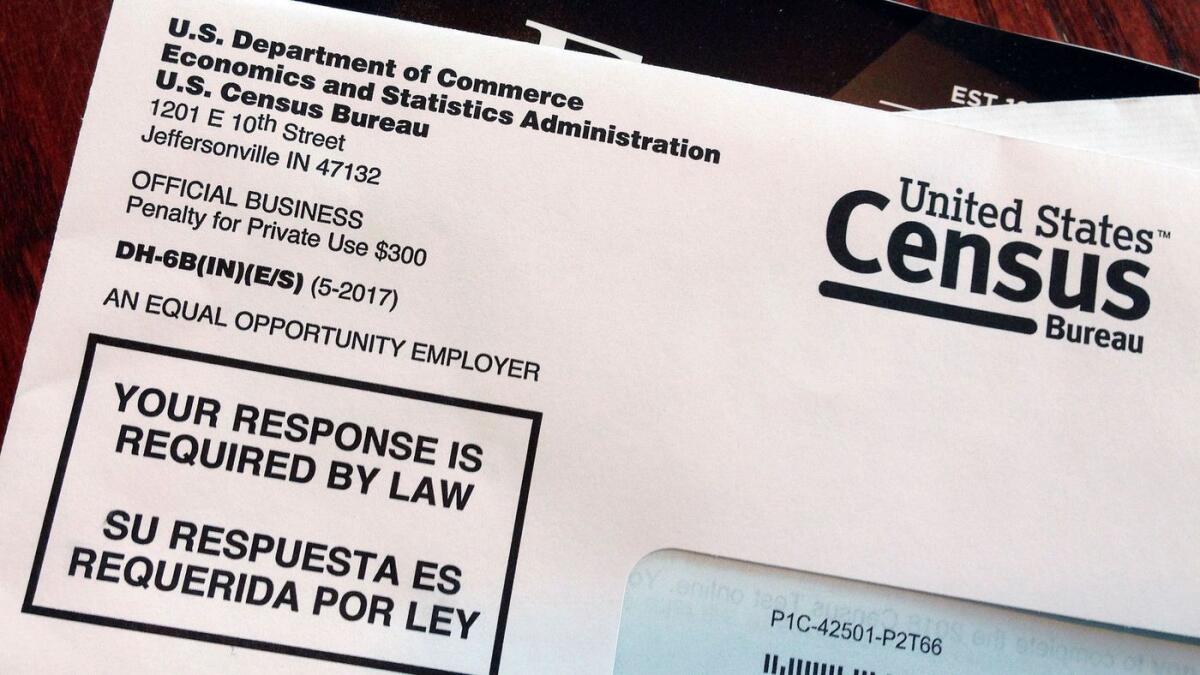
In less than two years — on April 1, 2020 — the federal government will for the first time rely on the internet to conduct the decennial census used to apportion seats in the House of Representatives, set legislative and congressional district boundary lines, and determine how much federal funding goes where.
But it looks like the Census Bureau has a long way to go to be ready on time. A Government Accountability Office report released Thursday said that “as of June 2018, the Bureau had identified nearly 3,100 security weaknesses that will need to be addressed in the coming months.” But it has fallen behind on its testing schedule and has failed to fill 33 of 58 positions overseeing the contractor hired to manage the technology, which “adds risk that the office may not be able to provide adequate oversight of contractor cost, schedule, and performance.”
And those 3,100 weaknesses include 43 that the GAO said “were considered ‘very high risk’ or ‘high risk’ weaknesses.”
The report also noted that the estimated information technology costs for the census rose from $3.41 billion in October 2015 to $4.97 billion in December 2017, “due, in large part, to the addition of technical integration services and updated costs for other major contracts (such as the contract for mobile devices).” The cost growth since the October 2015 estimate “raises questions as to whether the Bureau has a complete understanding” of the technology costs associated with the 2020 census, the report warned.
There’s not much at risk if they don’t get the cybersecurity portion right — just the personal data of every person completing census questionnaires online, either by themselves or with the help of enumerators who will be deployed with mobile devices to track down and question those who fail to submit their information.
As Common Cause’s Democracy Counts points out, a new national online census system makes for an inviting target: “Critics worry that citizens’ private data will be susceptible to hacks and cyberattacks from criminal and foreign actors (especially Russia or China) and distort the data every state relies on for redistricting. Another concern is the theft of private data.”
A number of security experts have urged the government to hire an outside cybersecurity firm to audit its efforts to make the system as safe from hackers as possible, but so far there’s been no action and, in the eyes of the experts, insufficient transparency.
Says the Census Bureau, don’t worry.
“While many of our defenses are invisible to the public,” the bureau said in July, “know that we have strong and resilient security measures protecting every respondent’s information.”
Convinced? Me neither.
Great. Now even our burgers are political statements
Can’t we just eat in peace?
Apparently not, thanks to a tweet by California Democratic Party Chairman Eric C. Bauman calling on Democrats to boycott Southern California’s own In-N-Out Burger because the company dropped a wad of cash on the state Republican Party.
That seems nakedly political on its face. But before you swear off the In-N-Out drive-through, here’s some food for thought: The fast food chain is hardly the only big business to donate to the California Republican Party. So have other companies that you may have heard of: Facebook, Microsoft and the parent company of Disneyland. Oh, and Verizon, Target and Southern California Edison, which supplies electricity to much of the greater Los Angeles area. And that’s just a small sample.
In fact, many big companies and industry associations are equal opportunity political contributors. Those named above also give to the party Bauman runs. So has In-N-Out, its executives say (though apparently not recently enough to stave off a political shaming).
In that light it seems silly to get bent out of shape over this one $25,000 donation. Better to take a stand against the bigger threat to Democracy: the deepening polarization that can, with one tweet, turn lunch into a political statement.
Ted Cruz and the Texas GOP managed to make Beto O’Rourke look even cooler
Beto O’Rourke didn’t need anyone’s help to look cool.
He’s the young Democrat challenging incumbent Sen. Ted Cruz (R-Texas) this fall. Yes, the same Cruz who is so legendarily unlikable that former Vice President Joe Biden once joked that he told President Obama to nominate him to the Supreme Court — because then “you’ll have eight vacancies.”
Voters aren’t huge fans either. In polls measuring both job approval (how well voters think he’s doing at his job) and favorability (how much they like him in general), the majority of respondents fell into the “yeah, that guy’s terrible” camp.
Basically, anyone running against Cruz looks good by virtue of the fact that they are not Ted Cruz. Starting from that favorable position, O’Rourke then made national headlines with a sensitive, nuanced take on the NFL protests against police violence. The youthful 45-year-old congressman has visited every county in Texas in his Toyota Tundra. He’s been called “Kennedyesque.” He knows how to skateboard. And according to the most recent polls, he’s only trailing Cruz by a single percentage point.
Cruz had challenged O’Rourke to a series of Friday night debates, an invite the Democrat declined. On Twitter, @TexasGOP mused about a possible reason: He’s too busy being rad as hell.
Oh, right. Because as if Beto O’Rourke didn’t already radiate cool-dad energy, he also used to play in a punk rock band. Two decades ago, he was arrested for a misdemeanor DWI — a charge that was later dismissed, though not before O’Rourke took a mug shot that, had Twitter existed back then, could have easily subjected him to the same viral fate as the hot felon.
After the rest of Twitter had a good laugh at @TexasGOP’s expense, the state Republican organization fired back with ... another self-own.
In increasingly purple states like Texas, the Republican establishment is up against its old enemy: youths. I’m no campaign strategist, but a “rock ’n’ roll is for losers” broadside doesn’t seem like the right way to court that vote.
Elon Musk, it’s time to quit Twitter, bruh
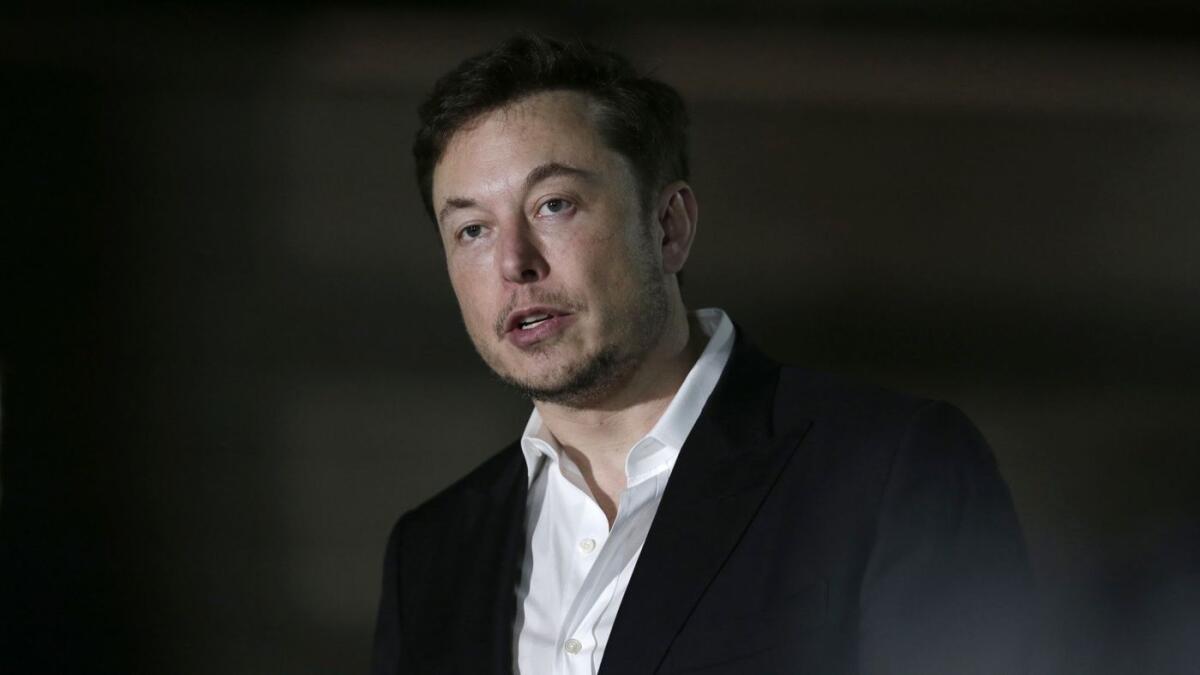
Elon Musk has had a tough year.
By his own admission, he’s spending 120 hours a week at the office. He says his physical health and personal relationships have suffered.
And yet, he has found time to tweet.
Earlier this summer, he raised eyebrows when he called Vernon Unsworth, one of the men working to rescue the children trapped in a cave, a “pedo guy.” (Why? Because Unsworth had dared to criticize Musk.) This week, somewhat inexplicably, he doubled down.
It started with him debating whether he’d cried during his New York Times interview.
Then he proceeded to have a back-and-forth where his defense amounted to “the guy I called a pedo hasn’t sued me for it,” appearing to imply that the absence of a libel case means the accusations are true.
As of today, Unsworth is in fact in the process of suing Musk. So much for the defense.
We are still in the same calendar month that Musk spooked investors and irked his board by tweeting that he had secured the funding to take the company private — a claim he quickly had to admit was not quite true. Reportedly, the SEC is looking into it. Oh, and the board of Tesla might be weighing whether or not to bring in someone a tad more stable to oversee things.
And that’s on top of Tesla’s other troubles: Model 3 production didn’t meet analysts’ expectations despite improvements in pace, and the company built a second general assembly line to try and keep up with demand while also cutting 9% of the workforce to try and turn a profit.
Musk’s pal Arianna Huffington told him — on Twitter, naturally — that he should get more sleep. He said given his grueling work hours, that’s not an option. OK, fine. But there’s at least one recreational activity he could cut back on.
Elon Musk, delete your account.
Did Ron DeSantis just monkey up his campaign for Florida governor?
Idiomatic English is stuffed to the gills with animal imagery (see what I did there?), including several frequently uttered allusions to monkeys.
Inconsiderate passengers monkey with your car radio. A broken bone can throw a monkey wrench into your vacation plans. Finding mistakes in my blog posts can be more fun than a barrel of monkeys.
But as far as I can tell, governors have never been said to monkey up a state’s economy.
So what, exactly, was Rep. Ron DeSantis (R-Fla.), the winner of Tuesday’s GOP gubernatorial primary, thinking when he said the last thing Florida voters should do is “monkey this up” by voting for his Democratic opponent, Tallahassee Mayor Andrew Gillum?
Ordinarily, this would be no big deal. DeSantis was speaking on live television (Fox News, the friendliest possible platform to candidates backed by President Trump), so he may simply have been trying not to use an expletive in describing Gillum’s potential effect on the state. But his comment ignited a fire under Democrats because Gillum is black — in fact, if elected he would be Florida’s first black governor. That puts the use of the word “monkey” into a different, much more negative context.
DeSantis’ comments came in response to a question about how he would defeat Gillum in November. After praising the Democrat as articulate and charismatic, DeSantis said Gillum would reverse the progress the state’s economy had made under Republican Gov. Rick Scott. “The last thing we need to do,” DeSantis said, “is to monkey this up by trying to embrace a socialist agenda with huge tax increases and bankrupting the state.”
I have a lot of sympathy for the people who complain about how quick we’ve become to take offense not at the positions we take, but at the words we use to take them. The point DeSantis was making with his “monkey this up” argument, after all, was a policy one: that Gillum’s “socialist” proposals would turn Florida into Venezuela. And Gillum has embraced a number of ideas popular on the left wing of the Democratic Party, such as shifting to a single-payer health insurance system and abolishing Immigration and Customs Enforcement in its current form. There’s a real debate to be had in the governor’s race about the role Florida’s state government should play in people’s lives.
Nevertheless, I’m having trouble figuring out why an experienced pol like DeSantis would utter the word “monkey” to describe a black Democrat’s effect on Florida. Even his interviewer on Fox rebuked the candidate, saying, “We do not condone this language” after reading a statement from the DeSantis campaign attempting to clarify his remarks.
That clarification, from spokesman Stephen Lawson: “Ron DeSantis was obviously talking about Florida not making the wrong decision to embrace the socialist policies that Andrew Gillum espouses. To characterize it as anything else is absurd.”
The issue, however, is not what DeSantis was talking about. It’s how he made his point. And I’d love to hear a reasonable explanation for how a monkey got in the middle of it.
Trump says he got rid of a limit on politicking by preachers. Nope

At a lovefest with his evangelical supporters on Monday night at the White House, President Trump boasted about having gotten “rid of” a provision in tax law that prevents churches from endorsing political candidates.
“They really have silenced you,” Trump told the evangelical ministers, according to a recording quoted by the New York Times. “But now you’re not silenced anymore.”
Not for the first time, Trump had his facts wrong.
Trump was referring to the Johnson Amendment, a provision of the tax code originally enacted by Congress in 1954 at the behest of then-Sen. (and future President) Lyndon B. Johnson. It prohibits certain tax-exempt charitable organizations, secular and religious alike, from participating in any political campaign on behalf of, or in opposition to, any candidate for public office.
But the law doesn’t prevent churches from speaking out on other political issues, and it doesn’t prevent members of the clergy from endorsing candidates in their individual capacities.
And, oh, Trump hasn’t gotten rid of the Johnson Amendment. Only Congress can do that, and while there have been efforts in Congress to repeal or weaken it, the law remains on the books. (Here’s a link to the IRS website explaining its application.)
It’s true that, surrounded by evangelical and Catholic leaders in the Rose Garden, Trump last year signed an executive order that he advertised as a rollback of the Johnson Amendment. But it was mostly symbolic. Essentially, it directed the Treasury Department to enforce the amendment against churches no more stringently than it does against other nonprofits. PolitiFact rated Trump’s claim that his order “got rid” of the Johnson Amendment as “Mostly False.”
The irony is that, while Trump is misrepresenting what the law says, it doesn’t make much practical difference. Despite the lamentations of preachers about being “silenced,” the IRS hasn’t been very aggressive in enforcing the Johnson Amendment.
And that’s fine with the Republican and Democratic parties, both of which have supporters among the clergy and neither of which is going to complain too strenuously about (the right kind of) politicking in the pulpit.
Why is the DOJ trying to stop cities from saving lives?

Doesn’t the U.S. Department of Justice have better things to do than threaten cities trying to save people from overdosing on opioids?
California is among a handful of states and cities exploring whether to open safe drug injection sites, clean clinic-like facilities where addicts can use their illicitly obtained drugs under medical supervision so they don’t accidentally give themselves a lethal dose like some 64,000 Americans did in 2016, the most recent year with good data.
This week, the California Legislature gave final approval to a bill to let San Francisco open a safe injection facility — which is fortunate, given that city officials had decided to go ahead with one with or without state approval.
But Deputy U.S. Atty. Gen. Rod Rosenstein warned in an op-ed in the New York Times on Monday that the feds won’t condone this violation of federal law.
“(C)ities and counties should expect the Department of Justice to meet the opening of any injection site with swift and aggressive action,” Rosenstein said.
What a waste of taxpayer money. These are not modern-day opium dens. In fact, quite the opposite. Safe injections sites have been operating in Europe and Canada for years, and they look like the health facilities that they are, with health professionals on duty who can recognize and reverse deadly overdoses. One study found that drug overdoses decreased by 35% in the surrounding community after a drug consumption site was opened in Vancouver, in British Columbia, prompting the Canadian government to develop more of them across the country.
Saving the lives of addicts until they can get treatment is why even the venerable American Medical Assn. now supports safe injection facilities.
Cities and states are at the front line of a raging opioid addiction and overdose crisis in America. The federal government should support their efforts to help addicts, not bully them or to treat addicts as criminals. They are very sick people who need medical intervention, not incarceration.
Trump adds Google to his ever-growing list of ‘fake news’ purveyors

President Trump weighed in again Tuesday on the alleged social media conspiracy against conservatives, this time singling out Alphabet subsidiary Google. You and I might think that news and views from the right (or any ideological vantage point) are surpassingly easy to find online. But Trump argues that Google is doing its part to change that:
Trump evidently based his tweets on reporting by PJ Media’s Paula Bolyard, who compared the results of a Google News search for Trump against a “media bias” chart developed by right-of-center investigative journalist (and vaccine skeptic) Sharyl Attkisson. Even if you don’t accept the findings of the chart, you have to concede one of Bolyard’s points: that Google’s results heavily favor popular mass-market media outlets.
But here’s the thing. If you compare the search results for “President Trump” on Google against the results from any other search engine — Bing, say, or DuckDuckGo — you’ll get very similar links. So, too, if you search Google for any other topic. Big outlets dominate. (One of which, by the way, is Fox News, which is the most effective pro-Trump outlet on the planet.)
That’s bad for Trump fanboy sites like Info Wars, but it’s not good for fringe outlets afflicted with Trump Derangement Syndrome either. To Google’s credit, drilling deeper into the Google News search results by clicking on “View All” on the desktop version yields a profusion of links, many of them to far more obscure sources. But even there, the bulk of the links are to the sorts of mainstream media outlets that Trump disparages on a regular basis.
The point is that search engines tuned to deliver the results that people are most likely to be looking for are inevitably going to point to the places where most people get information. It’s like the collaborative filtering that a lot of retailers do — you click on a pair of shoes, you’ll get pointed to other shoes that are popular on the site, not to a diverse selection of things that only a few other shoppers buy.
Google doesn’t say exactly how it ranks search results, just that it has some 200 criteria and that it tunes its technology to favor relevance, not ideology. One thing we do know, though, is that one of the factors used to determine relevance is how often a particular page is visited and linked to — in other words, how popular it is among the online masses. This creates something of a self-perpetuating information funnel, with people increasingly directed to the same places that everyone else goes. Obviously, that’s not a good thing for society. But popularity is an objective metric.
Trump offered no solution to the bias he perceives, other than to suggest some kind of government intervention. Just think about that for a moment. How eager are you to have this administration, or any other, tell search engines how to write their algorithms? That would truly be a rigged system.
The pope’s ‘no comment’ on sexual abuse cover-up allegations isn’t good enough

Let’s stipulate, as the lawyers say, that an Italian archbishop had an ideological ax to grind when he claimed that Pope Francis lifted the restrictions his predecessor had placed on a cardinal accused of sexual misconduct. Go ahead and assume for the sake of argument that Archbishop Carlo Maria Vigano — a former Vatican ambassador in Washington, D.C., — was disgruntled and out for revenge.
That doesn’t mean the pope can continue to refuse to comment on it.
Vigano accused Francis of reversing a decision by Pope Benedict XVI to impose limitations on the activities of then-Cardinal Theodore McCarrick, the former archbishop of Washington, D.C., who according to news reports had a a 50-year history of sexual relations with male seminarians and young priests. (After a church investigation found credible an accusation that McCarrick also had abused a minor, Francis accepted his resignation from the College of Cardinals.)
Francis “knew from at least June 23, 2013, that McCarrick was a serial predator,” Vigano wrote. Yet the pope “did not take into account the sanctions that Pope Benedict had imposed on him and made him his trusted counselor.” Vigano said that the pope “must be the first to set a good example for cardinals and bishops who covered up McCarrick’s abuses and resign along with all of them.”
The Vigano letter, released to conservative Catholic publications during the pope’s visit to Ireland, is a feverish denunciation not only of Francis but of several of his allies in the hierarchy. It also calls for the eradication of the “homosexual networks present in the church,” a favorite theme of anti-Francis conservatives in the church.
Asked about the Vigano letter on his return flight from Ireland to Rome, the pope declined to comment on the letter. “I will not say a single word about this,” he told reporters. “I believe the statement speaks for itself. And you have the sufficient journalistic ability to make your conclusions.”
On Monday the president of the U.S. Conference of Catholic Bishops, Cardinal Daniel DiNardo, suggested that Vigano’s letter raised questions that “deserve answers that are conclusive and based on evidence. Without those answers, innocent men may be tainted by false accusation and the guilty may be left to repeat sins of the past.”
Some of those answers must come from the pope.
Even if you believe that the pope’s conservative critics are exploiting the abuse scandal to undermine Francis for other reasons, and that the Vigano letter is a volley in the intra-Catholic culture wars, the pope can’t continue to decline comment on its central accusations. Was he informed of McCarrick’s history? Did he know that Benedict had attempted to rein in the retired cardinal? Did he sound an “all clear”? At some point Francis does need to say a single word about these questions: “yes” or ”no.”
Trump’s favorite punching bag, Jeff Sessions, may have just made himself fireproof
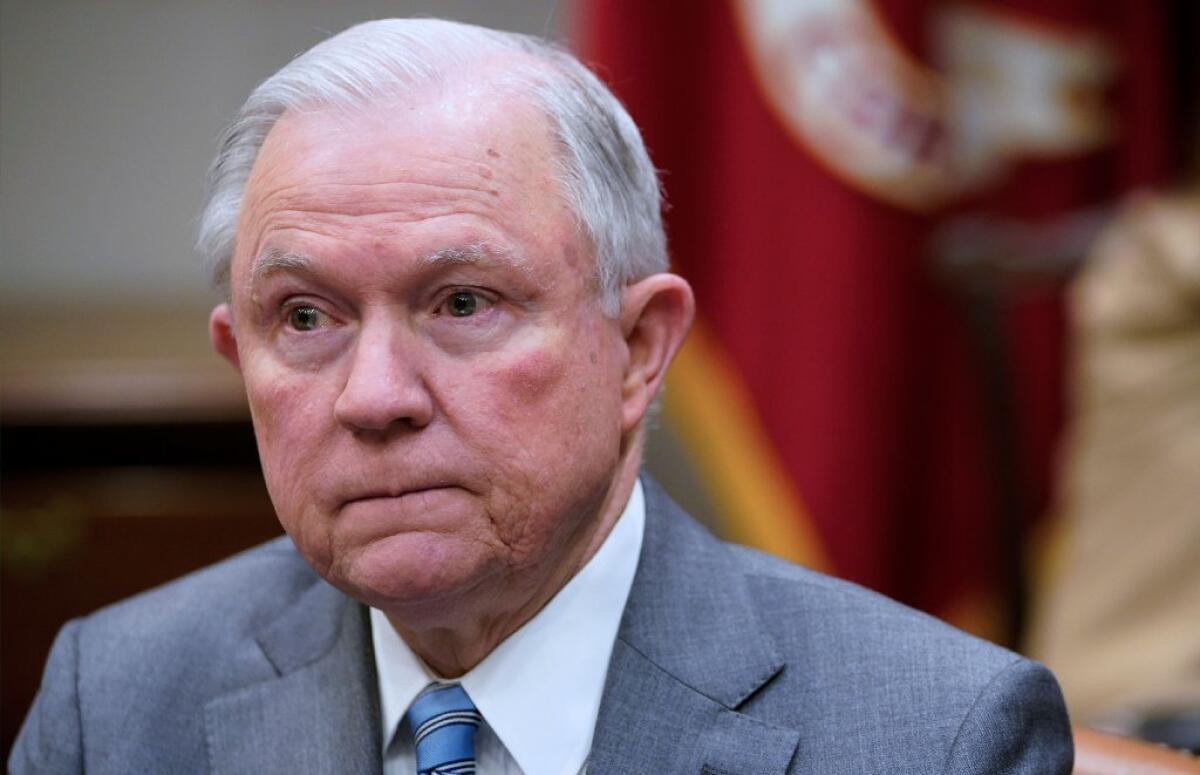
It’s not news that President Trump is disappointed in Atty. Gen. Jeff Sessions. He long has been grumbling over the attorney general’s decision to recuse himself from matters related to the 2016 presidential campaign, a decision that eventually led to the appointment of special counsel Robert S. Mueller III to investigate Russia’s election interference and possible coordination with the Trump campaign. (Or, as Trump calls it, the “rigged witch hunt.” )
But Trump’s complaints about Sessions have always extended beyond the Russia recusal. He also has seethed over the fact that the Justice Department isn’t pursuing the president’s political opponents. In November he tweeted: “Everybody is asking why the Justice Department (and FBI) isn’t looking into all of the dishonesty going on with Crooked Hillary and the Dems.”
This week Trump sharpened that critique in an interview aired by Fox News in which he complained that “I put in an attorney general that never took control of the Justice Department” — a department, he insisted, with a pro-Democratic tilt.
But this time the usually long-suffering Sessions responded with a statement that might have strengthened his hold on his office.
“I took control of the Department of Justice the day I was sworn in,” Sessions wrote, “which is why we have had unprecedented success at effectuating the president’s agenda — one that protects the safety and security and rights of the American people, reduces violent crime, enforces our immigration laws, promotes economic growth, and advances religious liberty.
“While I am attorney general, the actions of the Department of Justice will not be improperly influenced by political considerations.”
The genius of Sessions’ statement was that it distinguished between the loyalty Trump is entitled to from his attorney general — fealty to the president’s policy views on legal issues — and the sort of corrupt loyalty insisted on by those who would use the legal process to punish their enemies. Not naming any names, of course. Trump tried to return fire on Friday, tweeting:
But the president came off looking just as unhinged as ever, and didn’t seriously address Sessions’ point: that the attorney general’s job is to implement the president’s policy preferences, not to carry out his political vendettas.
Much was made this week of a statement by Sen. Lindsey Graham (R-S.C.), Trump’s sometime critic and occasional golfing partner, that “there will come a time sooner rather than later where it will be time to have a new face and a fresh voice at the Department of Justice.” This represented a shift for Graham, who once said that the president would have “holy hell to pay” if he dismissed the attorney general.
But other Republican senators came to Sessions’ defense, and it’s easy to see why.
It isn’t just that firing Sessions might be viewed as Trump’s version of President Nixon’s “Saturday Night massacre,” because it potentially would allow a successor to wrest control of the Mueller investigation away from Deputy Atty. Gen. Rod Rosenstein and incite calls for impeachment. Trump’s comments in the Fox interview make it clear that he has peculiar ideas about the administration of justice.
For example, in a discussion of the charges against Trump’s erstwhile personal attorney and “fixer” Michael Cohen, Trump complained about criminal suspects who plead guilty and offer their testimony against others in exchange for favorable treatment by the prosecution. “It’s called flipping,” he said, “and it almost ought to be illegal.” In that segment Trump sounded more like a mob boss than a president.
If Sessions is standing athwart that view of justice, maybe he should stay where he is.
Donald Trump might actually have to shoot someone on Fifth Avenue before GOP leaders say, ‘Enough’

At this point you have to wonder how far Donald Trump has to go — maybe shooting someone on Fifth Avenue? — before his fellow Republicans say, “Enough.”
Although the party establishment initially opposed Trump, with his victory the party has become him. In truth, though, elements of the party establishment didn’t have far to go to get to Trumpism. Remember that Senate Majority Leader Mitch McConnell (R-Ky.) froze nomination hearings for President Obama’s Supreme Court choice under the specious argument that it wasn’t Obama’s seat to fill because he only had 10 months left in his term. So the nation got Justice Neil Gorsuch instead of Justice Merrick Garland.
That’s Trumpian game-playing, where the only thing that matters is to win, rules and fairness be damned.
And now that Trump’s former lawyer and fixer, Michael Cohen, has under oath implicated the president in felonies, GOP leaders reportedly have been telling at-risk candidates running for Congress in places where Trump connections might hurt them to take public stances critical of the president.
Yet the Republican leaders refuse to do so themselves. McConnell and House Speaker Paul D. Ryan (R-Wis.) have been effectively silent on Cohen’s revelation, even as Cohen’s lawyer has been telling reporters that Cohen has information “of interest” to the special prosecutor on Trump’s possible connections with the hacking into Democratic officials’ email accounts.
We all know Trump is a scrapper. President Nixon resigned on the eve of impeachment because, in part, he had a level of respect for the presidency. But Trump from the beginning saw running for president as a game to be won, not an honor to be earned. And since taking the oath, he has persistently attacked elements of the government he runs, including the courts and his own top political appointees.
But Trump isn’t likely to resign in disgrace, a la Nixon, because he has no sense of shame. He also never takes responsibility. Like a toddler trying to escape discipline, he blames others for his own misdeeds, cries that investigations and criticisms of him are unfair and that everybody’s out to get him (again, like a child blaming a bad report card on the teachers’ animus).
He may believe only a fraction of the stuff he says, but he has an abject disregard for facts and the truth. He says whatever pops into his head to try to win whatever point is in front of him at the moment. If the new words contradict the old ones, well, he never said the old ones and the lying media is making it all up.
Part of that is strategic — again, Trump is playing a game, not trying to craft and enact policies framed by a coherent political view. The endless lies have turned the air around him into a murky miasma that is designed to create confusion, like a series of stun grenades.
And the Republican leadership has enabled him. Real leaders at this juncture would do something. Convening real oversight hearings under independent-minded committee chair rather than sycophants like Rep. Devin Nunes (R-Tulare), who told Republican supporters that the party must keep the House to protect the president.
Ryan is capable of acting quickly in response to a political scandal. After Rep. Duncan Hunter (R-Alpine) was indicted Tuesday on charges that he and his wife misused $250,000 in campaign funds, Ryan stripped Hunter of his committee posts. Bravo.
But after Trump was implicated in felonies, silence. And remember, Ryan is done at the end of this Congress, having decided not to seek reelection. Yet even a Republican with little left to lose can’t stand up and condemn the president — not even in such couched terms as, “If what Cohen testified to under oath is true, then ______.”
What a remarkable display of PC, which in this case stands for Political Cowardice.
Duncan Hunter should do the right thing and step down. He probably won’t
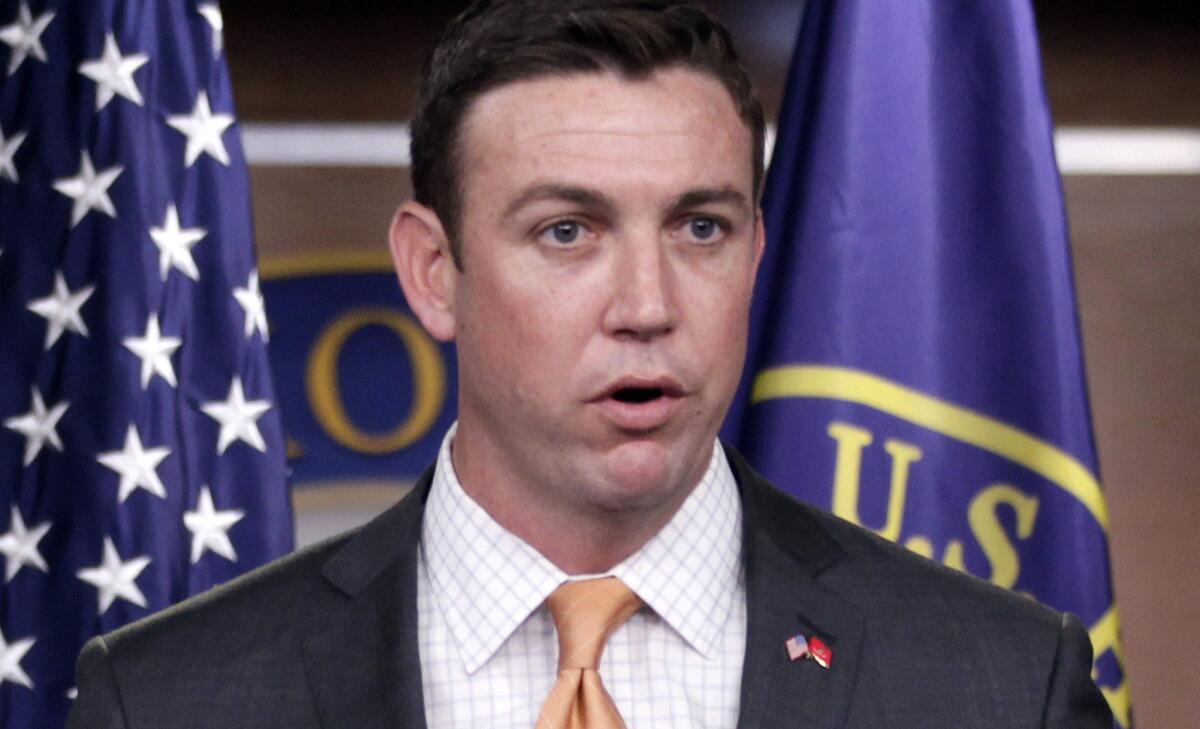
In a perfect world, Rep. Duncan Hunter (R-Alpine) would announce on Thursday that he’s taking a leave of absence — preferably, right after he is arraigned on charges that he and his wife raided his campaign war chest for more than a quarter of a million dollars to buy personal things and then altered documents to hide the pilfering from federal elections officials.
As part of the announcement Hunter would say that, as much as it pains him, he knows that he would be too distracted by the case to be an effective member of Congress. It wouldn’t be fair to his constituents to continue. For that matter, he also would say that even though it is too late to have his name removed from the Nov. 6 ballot, he is suspending his reelection campaign.
And then, in this perfect world, the San Diego County congressional district would vote for the other guy on the ballot, no matter the political designation next to his name. After all, it is better to have a clean congressional representative from a different party than gamble on reelecting someone who may soon be a felon. Right?
Well, don’t count on it. Obviously this is not a perfect world, and it never was. But if politics were no more honorable before 2018, at least politicians had a clearer idea what the right response to such serious allegations would be. Now, it’s just as likely a politician accused of conspiracy, fraud and other campaign violations would ignore the specifics and jump right to the “witch hunt” defense. That seems to be what Hunter plans. In an interview with a local television news station Wednesday, Hunter said, “This is the Democrats’ arm of justice,” and said he was going to fight all the “dirty tricks.” (Speaker Paul D. Ryan, to his credit, has treated the charges with the gravity they deserve and has removed Hunter from his committee assignments.)
It’s worth remembering that the investigation was sparked years ago, not by Democrats but by curious purchases reported in campaign documents, specifically $1,300 in video games from campaign funds. Hunter later blamed the charges on his son using the wrong credit card. When investigators later turned up more improper spending, Hunter explained it as honest mistakes and reimbursed about $62,000.
That excuse seems tougher to swallow in light of the volume of improper expenses now alleged — more than $250,000 in vacations, dental visits, clothes, groceries, kids’ school tuition and, once, even a plane ticket for a pet rabbit to join the family on vacation (which is strangely endearing). Was it also a mistake to list those purchases as gifts to charitable organizations?
Democrats are hoping that this indictment will give an edge to their candidate in the race, Ammar Campa-Najjar, in the otherwise solidly Republican district. Then-candidate Donald J. Trump, who lost California in 2016, won this eastern San Diego County district by 15 percentage points. But in today’s toxic political environment, where opponents aren’t just wrong, they are evil, I just can’t see this deeply conservative district swinging Democrat — let alone voting for a progressive who supports Medicare for all, worked for the Obama administration and has a foreign-sounding name.
If it happens, though, maybe there’s still hope for, if not a perfect world, then a better one.
In the Trump Twitterverse, Cohen and Manafort are barely a blip
What a week. The president’s former lawyer says he was directed to violate campaign finance law to influence the election at the behest of Donald Trump. Oh, and he says he’s got some Russia stuff he thinks Robert S. Mueller III might be interested in. The president’s former campaign chairman became a convicted felon. One of the first congressional representatives to publicly throw his support behind Trump has been indicted for improper use of campaign funds.
It is only Wednesday.
Here in the lamestream fake news media, this is all a big deal. But as far as Trump supporters are concerned, it’s barely a blip.
Watching Fox News sputter while other outlets report on Trumpy-unfriendly breaking news is practically a national pastime at this point. Mana-who? Cohen? We barely know that guy!
On social media, a collective I like to think of as the MAGA-verse — Trump’s base, the alt-right, and every Republican politician who hasn’t already announced his or her retirement — wants to talk about, well, literally anything other than Trump.
Right now, the right is worked up about the death of a college student, a deported Nazi, Hillary Clinton, confederate statues, the national anthem and the stock market. Oh, and one of their favorite topics: How, despite the spate of seeming overwhelmingly bad news for Donald Trump, it actually somehow exonerates him. (The QAnon conspiracy theorists are talking about how this is all a Deep State long game, but then again, they’re always talking about that.)
Mollie Tibbetts was an Iowa college student who went missing last month while she was out on a jog. On Tuesday afternoon, police announced they had found her body and had made an arrest in connection with the case: Cristhian Bahena Rivera, a 24-year-old from Mexico who was allegedly living in the U.S. illegally. [Update, 1:15 p.m.: Rivera’s lawyer insists that Rivera was in the country legally.]
Tibbetts’ death was a tragedy. A young woman was senselessly killed. But the whataboutists performing outraged grief on social media in the last 24 hours didn’t seem to care about the case until it had a politically convenient talking point.
As to their other hot topics: Deporting Nazis is good, but we’re all still waiting to hear Trump full-throatedly distance himself from the neo-Nazis — sorry, “very fine people” — who support him. If Republicans in control of the White House and Congress haven’t found a reason to send Hillary Clinton to prison by now, it’s probably not going to happen. (Were Democrats still talking about John McCain or Mitt Romney two years after they lost presidential elections? I feel like they weren’t.)
Cheaply made statues championing the side of the Civil War that fought against the United States should all come down. NFL players don’t care what Trump thinks about them. The stock market is good, but that’s somewhat less newsy than the president’s personal fixer flipping on him and accusing him of conspiracy to violate campaign finance law.
And no, none of this magically makes Trump pure as the driven snow. It doesn’t mean Russia wasn’t also working to affect the outcome of the election. It doesn’t mean Mueller’s investigation is over — that is entirely separate. None of this changes the fact that the president who swore to drain the swamp and hire the very best people evidently surrounded himself with felons, one of whom admitted Tuesday to breaking the law to help win the election.
There are 75 days left until the midterm elections. If Democrats take control, impeachment would feasibly be on the table. The stakes just got a lot higher. What could possibly be more important than another update about Hillary Clinton?
Oh, yes, it was a crime, Mr. President. And you’re implicated

President Trump broke his silence about his former lawyer Michael Cohen on Wednesday morning on Twitter (where else?), and he did not disappoint.
He opened as he usually does, attacking Cohen personally:
Yawn. Not much to get excited about there. But then he tweeted this:
Umm, what Cohen admitted to doing was clearly a crime.
The payments he arranged, or made to, porn star Stormy Daniels (real name: Stephanie Clifford) and former Playboy playmate Karen McDougal constituted campaign donations to the Trump campaign because they were done, as Cohen said under oath Tuesday, to influence the outcome of the presidential election.
And as such, they were larger than the law permits and went illegally unreported. Plus, Cohen said he knew what he was doing, which constitutes criminal intent.
So why is this not a crime? It’s often hard to parse Trump’s reasoning, but he noted that President Obama wasn’t charged criminally when his reelection campaign violated reporting requirements in 2012. If the Federal Election Commission didn’t send the SWAT team after Obama, why not let Cohen off with a civil fine too?
Because there’s a big difference between failing to report a flurry of thousand-dollar donations in a billion-dollar campaign quickly enough (the Obama campaign offense) and deliberately concealing a pair of huge hush-money payments (what Cohen pleaded guilty to doing). The former looks like an inadvertent error, the latter was clearly an attempt to avoid a potentially damaging pair of scandals.
We know now that Trump’s 2016 campaign had a jaw-dropping ability to survive revelations about the candidate’s infidelity. It’s entirely possible that Clifford and McDougal could have sold their stories to the tabloids, made the talk show circuit in the weeks before the election, and the results would have been the same.
But that’s not the reality we are dealing with. The reality is that Michael Cohen admitted to a crime and implicated Trump in the process. No amount of whataboutism can change that.
Hello? Is this mic on? Trump’s America, are you listening?

The double-header loss for Team Trump in the federal courts Tuesday was riveting and will resonate for months no matter how hard the president tries and lies to make it seem like nothing. “Where is the collusion?” President Trump asked. Well, to start with, among him and longtime fixer Michael Cohen, the head of the company that owns the National Enquirer, a Playboy model, and an adult film star.
It’s useful at such moments to take a step back and look at both the arc that brought the nation to this juncture, and the context.
Remember, Trump the candidate picked up significant support from people so disgusted with how Washington works that they thought a modern-day P.T. Barnum would fix it. Trump was the one to “drain the swamp” because he was too rich to be bought or beholden to others (never mind the personal conflicts of interest). Which may or not be true, but it’s clear he is perfectly capable of doing the buying himself ($130,000 to keep the porn star quiet; $150,000 to bottle up news of the affair with the Playboy model) in a clear attempt to corrupt the election. How swampy.
Trump also promised to “hire the best people.” Let’s take stock, shall we?
Cohen, an attorney who has worked for Trump for years, told a federal judge in New York on Tuesday that, among other crimes, he violated campaign finance law by paying hush money “in coordination with and at the direction of a candidate for federal office.” That candidate, clearly, was Trump. Cohen is looking at more than five years in prison and presumably lengthy discussions with special counsel Robert S. Mueller III in charge of the “witch hunt” that, unsurprisingly, keeps finding witches.
Trump the candidate took on Paul Manafort as a fee-free campaign manager; Manafort was subsequently driven out over revelations about a secret ledger listing $12.7 million in cash payments designated for Manafort from the political party of Ukraine’s former pro-Russian President Viktor Yanukovich, for whom Manafort did consulting work. A federal jury on Tuesday convicted Manafort on five tax fraud charges, two counts of bank fraud, and a single charge of hiding foreign bank accounts. The jury couldn’t reach a verdict on 10 other related charges, but the 69-year-old Manafort still faces a maximum of 80 years in prison, possible retrial on some or all of the still-pending charges, another trial next month in Washington, D.C., on foreign lobbying and money laundering charges, and, perhaps, some lengthy discussions with Mueller’s team.
Trump picked Richard Gates, Manafort’s comrade in fraud, to help with his campaign and named him deputy chairman of his inaugural. Gates pleaded guilty in February to charges of conspiracy and lying to federal agents, had lengthy discussions with Mueller’s team — and was a key witness in Manafort’s trial.
Trump hired George Papadopoulos as a campaign advisor; Papadopoulos pleaded guilty in October 2017 (though he’s considering withdrawing that) to charges that he lied to federal investigators about contacts with Russian officials, and has had lengthy discussions with Mueller’s team.
Trump also hired Michael Flynn, who lasted 15 days as national security advisor before Trump fired him ostensibly for lying to Vice President Mike Pence about his contacts with Russian officials. Flynn later pleaded guilty to lying to federal investigators looking into possible collusion between Russian agents and the Trump campaign; he has also had lengthy discussions with Mueller’s team.
Trump hired Tom Price to run Health and Human Services but the former congressman quit after he took some pricey trips on taxpayer dollars. A similar sword felled Scott Pruitt, Trump’s hire to run the Environmental Protection Agency.
And those are just the folks caught in, accused of, or who have confessed to illegal or highly questionable behavior. The unqualified — a roster headed by Ben Carson at Housing and Urban Development and Betsy DeVos at Education — is a whole different list.
I should note, too, the indictment Tuesday of San Diego-area and second-generation Rep. Duncan Hunter (R-Alpine) and his wife, Margaret, on charges that they misused $250,000 in campaign funds to finance personal vacations, household bills and private tuition for their children. The couple pleaded not guilty.
That followed the indictment earlier this month of Rep. Chris Collins (R-N.Y.) on insider trading charges, of which Collins similarly has said he is innocent. Collins subsequently announced he is dropping his reelection bid. Hunter so far remains a candidate, though House Speaker Paul D. Ryan (R-Wis.) stripped Hunter, who holds a seat his father occupied from 1981 to 2009, of his committee assignments.
Collins and Hunter were, respectively, the first two Republican members of Congress to publicly support Trump’s candidacy for president.
So, we’re all caught up. At least for now. The day is young and the scandals endless.
California moving to block federal off-shore oil leases at the pipeline
The Trump administration’s decision to open nearly all federal waters for oil and gas drilling left California and other states scrambling to find ways to stop expanded drilling off their coasts. One tool, California officials noted at the time, is that the California controls the first three miles of ocean, and regulates the pipelines that bring the oil to shore.
In fact, the State Lands Commission and the California Coastal Commission sent letters to the federal Bureau of Ocean Energy Management warning that neither body would approve new pipelines to service new wells, and would “not allow use of existing pipelines to transport oil from new leases onshore.”
Now there’s a move in the Legislature to make that refusal law. AB 1775 would bar the state from authorizing new oil and gas infrastructure within state waters and tidal areas for leases issued after the start of this year. The law would not affect efforts to “repair or maintain any pipeline or other infrastructure used to convey oil or natural gas or any other activity necessary to ensure the safe operation of infrastructure used in the exploration, development, or production of oil or natural gas.”
In other words, the Trump administration may allow new drilling in federal waters, but the drilling companies would be shut off from pipelines when it comes time to move the oil. Of course, they could use oil tankers, but that pushes up the costs.
The bill has cleared the Assembly and is in the Senate, which must act by the end of the month. It should.
Make up your mind, Mr. President. Do you want low interest rates or a strong dollar?
Currency manipulation is when a country’s rulers have their central bank monkey with the supply of legal tender to gain an advantage over trading partners. Typically, it means increasing the supply of the domestic currency in an effort to bring down its value in comparison to foreign currencies, making the country’s exports cheaper and its imports more expensive.
In an interview Monday with Reuters, President Trump accused China and the European Union of manipulating their currencies while also urging the U.S. central bank to allow for a greater supply of U.S. dollars.
It’s bad enough that Trump speaks as much as he does about monetary policy. His predecessors largely steered clear of that topic, in part to preserve the public’s confidence in the Federal Reserve’s independence, in part to avoid the sort of accusation Trump leveled at China and the EU. They were wise to do so.
But Trump doesn’t seem to be bound by any presidential norm. Nor does he seem to believe that anyone he appoints to an independent agency is actually independent. Speaking about Jerome Powell, whom Trump elevated to chairman of the Fed’s Board of Governors, the president told Reuters: “I’m not thrilled with his raising of interest rates, no. I’m not thrilled.”
The issue here isn’t just that the president wasn’t holding his tongue, but that he was championing bad policy.
Bear in mind that Congress has given the Fed explicit instructions when it comes to setting interest rates (also known as conducting monetary policy). As the Fed put it on its website, the congressional mandate is “to promote maximum employment, stable prices, and moderate long-term interest rates in the U.S. economy.”
Economists agree that while more Americans could be drawn back into the workforce, the unemployment rate is so low that employers in a growing number of sectors are having trouble filling their openings. Wage growth is slowly accelerating, inflation is picking up steam and long-term interest rates are rising. It’s like a negative trifecta.
Powell and his colleagues believe the Fed’s interest-rate target of 1.75% to 2% is “accommodative,” which is Fed-speak for pro-growth or stimulative. And they have made plain their plan to take the Fed’s foot off the gas and return to a neutral monetary policy, which requires bumping the interest rates up a few more times.
If Trump really believed that his administration’s fiscal policies will yield sustainable GDP growth of 3% or better, as he has promised, he’d let the Fed do its thing. After all, inflation is a wasting disease — it saps buying power and reduces real growth. And heaven knows the tax cuts and gigantic federal budget deficits are enormously stimulative, at least in the short term.
On the other hand, the trade war the president has triggered with most of the industrialized world is hurting U.S. exports and raising costs for manufacturers and consumers. The tariffs the U.S. and its trading partners are imposing are a tax that offsets at least part of the savings from the GOP tax cut.
The Fed was instrumental in propping up the economy after the last recession, pulling out all the stops as a polarized Congress did nothing after President Obama’s first year in office. But those days are over, and it’s crucial that the Fed not repeat the mistakes it made in the 2000s, when it left interest rates too low for far too long. The housing bubble was one of the results, and we all saw how that ended.
Here’s one other reason Trump should keep quiet about monetary policy: He’s remarkably inconsistent. This is, after all, the same president who has said on more than one occasion that he favors “a strong dollar.” That means reducing the supply of dollars relative to other currencies, which is done by … raising interest rates.
The truth is out there, Rudy, and Mueller must be able to question Trump about it
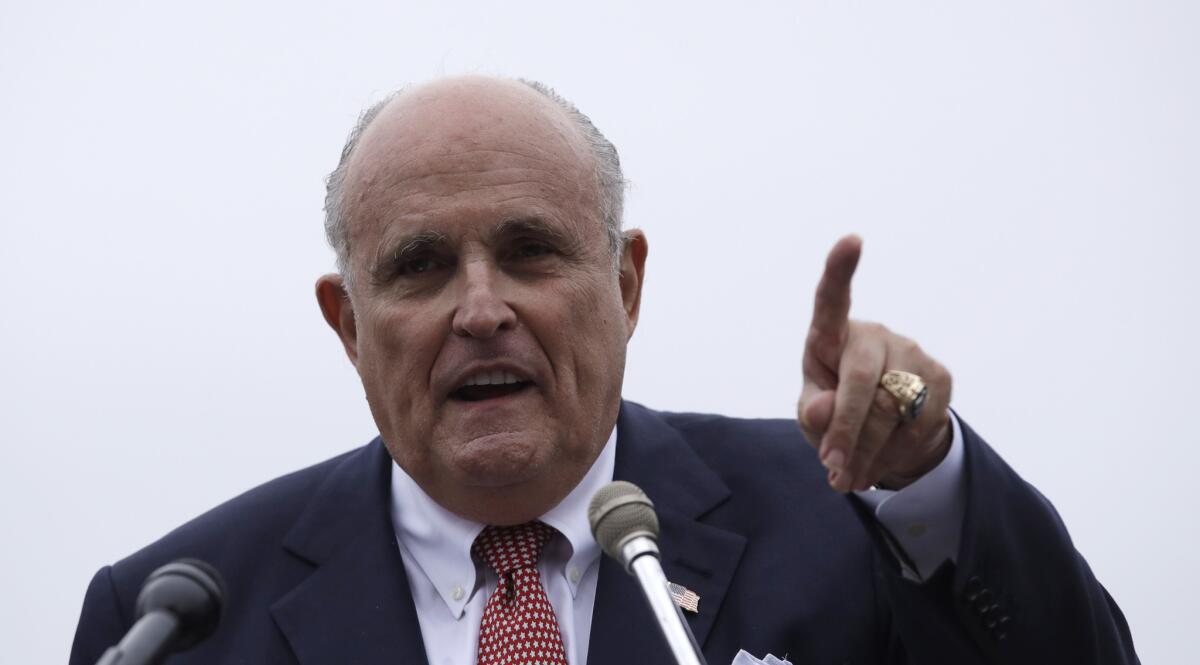
Former New York Mayor and Trump TV lawyer Rudy Giuliani is trying to extricate himself from his mind-boggling comment Sunday on “Meet the Press” that “truth isn’t truth.” The remark came in a colloquy with Chuck Todd about whether President Trump should submit to questioning by special counsel Robert S. Mueller III.
Here’s the exchange, which involved whether Trump would answer questions about whether, as former FBI Director James B. Comey has said, Trump had told him, “I hope you can see your way clear to letting this go, to letting [former national security advisor Michael] Flynn go.”
Giuliani: “I am not going to be rushed into having him testify so that he gets trapped into perjury. And when you tell me that, you know, he should testify because he’s going to tell the truth and he shouldn’t worry, well that’s so silly because it’s somebody’s version of the truth. Not the truth. He didn’t have a, a conversation . . .
Todd: “Truth is truth. I don’t mean to go like –“
Giuliani: “No, it isn’t truth. Truth isn’t truth. The president of the United States says, ‘I didn’t ...’”
And later:
Giuliani: “Donald Trump says ‘I didn’t talk about Flynn with Comey’; Comey says ‘You did talk about it.’ So tell me what the truth is.”
Giuliani’s comment inspired considerable ridicule, along with comparisons to Pontius Pilate (“What is Truth?”) and Johnny Cash (“And the lonely voice of youth cries: ‘What is truth?’ ”).
On Monday, Giuliani attempted to clarify his comment, tweeting: “My statement was not meant as a pontification on moral theology but one referring to the situation where two people make precisely contradictory statements, the classic ‘he said, she said’ puzzle. Sometimes further inquiry can reveal the truth, other times it doesn’t.”
But this clarification doesn’t help Trump (who also was on a Twitter tear on Monday, lashing out at Mueller, former CIA Director John Brennan and Justice Department lawyer Bruce Ohr).
What Giuliani calls the “puzzle” of conflicting statements is something prosecutors deal with all the time. Such contradictions lead not to shoulder-shrugging relativism but an attempt by investigators to decide who’s telling the truth. (Also, in making preliminary judgments about who is credible, it’s not unreasonable for investigators to take into account which of the witnesses has a history of telling falsehoods.)
Giuliani’s original comment was absurd, but his clarification was far more damaging to his client. To quote a TV show about fictional FBI agents, the truth is out there, and Mueller has every right to try to find out what it is, including by questioning Trump.
Why the claims against Asia Argento don’t invalidate the #MeToo movement

On Sunday, the New York Times revealed that Asia Argento, one of the leaders of the #MeToo movement, paid her own accuser hundreds of thousands of dollars, beginning in April. This is a terrible revelation, including for the millions of survivors who include themselves in the broad coalition Argento helped birth.
Some feminists have been quick to dismiss the reporting, simply circulating an excerpt from a letter Argento’s lawyer wrote to her: “You are a powerful and inspiring creator and it is a miserable condition of life that you live among [lousy] individuals who’ve preyed on both your strengths and your weaknesses.” This may be true. But to engage that excerpt without engaging the broader story is cheap and small. It shows an inability to confront information that challenges our worldview; that is the precise work we ask from those who do not appreciate the ways in which sexual violence is built into our society.
While it can be difficult to judge the tone and content of an alleged sexual encounter, the evidence in favor of Jimmy Bennett’s story is substantial. And as Argento has declined to speak to this point, there is no compelling alternative story on offer. Were Bennett a lower-profile woman providing this same evidence against a higher-profile man, the #MeToo coalition would invariably support the survivor’s version of events.
Since the 1970s, many feminist academics have sought to reframe the way we understand rape and sexual assault, arguing that these actions are primarily about power rather than about sex. Power has multiple frames. Gender, of course, is one frame in which it can be expressed. Privilege, wealth, race and age are others.
Argento was 37 at the time of the alleged assault; Bennett was 17. (While the age of consent is 14 in Italy, where Argento is from, it is 18 in California, where the alleged assault took place.) They met when he was 7 and she was 27, playing the role of his mother in a film she directed, starred in and co-wrote. After the alleged assault, she wrote on Instagram, “Jimmy is going to be in my next movie and that is a fact.” Bennett appeared to lack a key source of support: Later that month, he would file suit against his parents, arguing they had barred him from living at home and kept $1.5 million of his earnings.
It is a tricky reality of movement building that even moral leaders have moral inconsistencies. Gandhi made racist remarks against South Africans, among whom he lived for many years. Martin Luther King Jr. had multiple unsanctioned extramarital affairs. Rose McGowan, another co-founder of the #MeToo movement, has made comments that many found to be transphobic. These founders’ personal failings are not widely perceived as invalidating their campaigns. Argento’s hits closer to the bone; she settled a lawsuit with a person who accused her of perpetrating the very abuse she campaigned against. That’s a hugely disappointing fact.
It does not invalidate Argento’s claims against Harvey Weinstein; a person can suffer one abuse and perpetrate another. It does make the #MeToo movement more vulnerable to bad-faith attacks by those who’d see it fail regardless. But in an effort to guard against those attacks, the movement’s supporters should not blindly defend Argento and, in so doing, devalue Bennett’s testimony. Instead, we should remember that this is a movement of millions. It’s bigger and truer than any one person.
A national military parade was a bad idea, which is probably why President Trump liked it

President Trump tweeted a few hours ago that he was canceling the national military parade he had ordered up for this fall in Washington, a decision he made just as unilaterally as when he told the Pentagon to make the arrangements in the first place.
The idea was to march soldiers, veterans and military vehicles (not tanks or other tracked vehicles that would churn up city streets) down a stretch of Pennsylvania Avenue — which presumably would have passed in front of the Trump International Hotel along the way. Not that the parade would have drawn business for the Trump family enterprise or anything.
Such a parade would amount to little more than an expensive (more on that in a minute) visual prop for our nationalistic commander in chief, and would be the kind of display the Soviet Union and China turned into a cliché of authoritarianism. Which is why the president wants one, even though he says he got the idea by watching the French Bastille Day military parade a couple of years ago.
Such trappings bolster his ego.
I have nothing against the military, whose members perform difficult and occasionally deadly tasks even when the assignments are ordered up through political decisions of sometimes reckless leaders. The military deserves thanks and respect (with some carve-outs for missteps, but, hey, they’re human), and we honor our fallen soldiers on Memorial Day and veterans on Veterans Day.
That’s sufficient for a democratic society that controls the military, rather than the other way around.
But Trump said there still might be one next year, if the man behind the “The Art of the Deal” can actually seal one. Originally estimated to cost $8 million to $10 million, the most recent estimate had ballooned to $21.6 million — and that’s just what the federal government would have to reimburse the Washington city government to cover the latter’s costs.
Getting military hardware and marchers to and from Washington would drive the cost up even more, though given the lack of specific plans from the Pentagon it’s been hard to get a clear estimate. One soared above $90 million.
So Trump canceled the parade — then tried to blame local officials in Washington, accusing them of inflating costs to gain a “windfall.”
Mayor Muriel Bowser wasted little time pushing back.
Ah, our president, closing another deal.
In this case, though, the high cost of the parade might have saved Trump from himself — and helped some incumbent members of Congress as well.
Had the parade occurred as scheduled on Nov. 10, the planning and debate over costs could well have become a factor in the midterm elections on Nov. 6.
So maybe this had less to do with costs than with another kind of calculation — a political one.
Aretha could sing. She also had style

Aretha died Thursday morning at the age of 76. We don’t need to say Franklin. She was singular. And anyhow, you already know.
In a statement, Quincy Jones wrote, “Aretha Franklin set the bar upon which every female singer has and will be measured.” Simple as that. She took songs you thought you’d loved (“The Weight,” for instance, or “Bridge Over Troubled Water”) and infused them with new energy. She was a diamond Midas.
At age 10, I learned about Aretha after a much cooler kid told me she’d sung “Say a Little Prayer for You,” a campy, all-cast version of which was featured in my favorite rom-com, “My Best Friend’s Wedding.” I tracked her version down in a tiny town in New England and sang my little guts out to it. She found us all, eventually. Many of us remember exactly when.
But I also remember the first time I saw her a video of her performing. She didn’t have style; she was style. Texture? Yes, please. Ostrich feathers. Crystals. Fur stoles. Diamonds. Hats. Beadwork. Satin. Crystals. Pearls. Together, whenever possible. Blending in? Boring. Elegance? Inborn. Playing the wallflower? No thanks. Aretha was a “more is more” icon.
Did she get a ribbing for it occasionally, as when she wore an enormous bowed and bejeweled hat at President Obama’s inauguration? Of course. Do you think she gave a flying … ? Please. Aretha had tinkered with the original design, including moving the bow from the left to the right to better suit her. She knew every one of her angles.
And style was part of the performance. She brought her purses onstage. She swung her ornate sleeves overhead. She shrugged her coats off when she was about to hit the note you most wanted to hear. (As in her iconic performance at the Kennedy Center or at Bill Clinton’s inauguration gala.)
Beyond that, Aretha had the style of self-possession. They call her the Queen of Soul not only because she could sing, but because she had the confidence to take up space. Today, while you listen to her records, pull out something you might feel a little shy about — a feather vest or sparkly beret or pink velvet shoes — and remember her, this vivacious, brilliant woman, who made even the saddest songs bright.
Rich businessmen want to solve L.A.’s traffic problem — to Dodger Stadium

Traffic in Los Angeles is infamously awful. Congestion on freeways and streets makes it hard for drivers and bus riders to get across the city for work, school and socializing.
Thank goodness the rich entrepreneurs of the world are on the case, coming up with solutions to solve the most pressing transportation problems in L.A.
Like cutting travel times for Dodger Stadium.
Two firms have recently pitched projects to shuttle fans to Chavez Ravine for games and the occasional concert. Earlier this year a company funded by former Dodgers owner Frank McCourt proposed building a gondola to whisk passengers from Union Station to Dodger Stadium by air in five minutes.
On Wednesday, Elon Musk’s tunneling company announced that it wants to build a 3.6-mile underground shuttle to ferry fans from one of three Metro Red Line stations to the stadium. The ride would take about four minutes and cost $1 — cheaper than bus fare.
The Boring Co. says it could tunnel and build the system in less than 14 months. That’s construction time; not the amount of time that it would take for environmental review and approval. It can take 12 years to get the OK to build a traffic circle in an L.A. neighborhood. Good luck with getting speedy permission to tunnel under one of the city’s densest communities.
The Boring Co.’s projections sound so far removed from the reality of building transportation projects in California that it’s tempting to dismiss this Dodger Stadium “Dugout Loop,” as they call it, as a PR stunt.
We shouldn’t. Nobody should be happy that it takes decades to build a subway or years to construct protected bike lanes. Nobody should be satisfied with the selection of transportation services in L.A. If Elon Musk or some other entrepreneur wants to put up the ideas and money to build alternatives to driving, then it’s worth hearing them out.
No, these private projects shouldn’t divert money or attention from public mass transportation projects. A gondola would be a fun way to get to a baseball game and something to do when relatives visit from out of town. The loop would be a nice option to avoid traffic around Dodger Stadium. They are not going to replace the need for more subways, light rails and bus lanes.
A White House enemies list. Hmm, where have we heard that before?
President Trump announced Wednesday that in addition to stripping former CIA director John Brennan of his security clearance, he’s reviewing the clearances of nine other former top government officials who have – in some cases harshly – criticized the president. Yes, the president has an enemies list.
How Nixonian of him.
Until Trump came along, President Richard M. Nixon was probably the nation’s most paranoid president – and a man who, like Trump, had few qualms about abusing the power of his office.
The Nixon enemies list came to light during former White House aide John Dean’s testimony before the Senate Watergate Committee; Dean would later serve four months in prison for obstruction of justice in connection with the burglary of the Democratic National Committee offices at the Watergate complex.
The original enemies list was compiled by White House counsel office staffer George Bell, but the final selections were made by special counsel Charles Colson, who also would later serve seven months in prison for obstruction of justice in connection with the burglary of Pentagon Papers leaker Daniel Ellsberg’s psychiatrist’s office (related government misconduct led a judge to dismiss espionage charges against Ellsberg).
Nixon’s enemies list contained the name of critics of the president ranging from Edwin Guthman, a former press secretary for Bobby Kennedy and national editor here at The Times during the Nixon years, to Leonard Woodcock, president of the United Auto Workers. Nixon and his minions had already been using government agencies such as the Internal Revenue Service to try to harass their political opponents, but the revelation of the list added a layer of sleaziness – as did the memo in which Dean wrote that the list could be used “to screw our political enemies.”
Trump’s enemies list is different, though. The Nixon list was a secret until Dean let the cat out of the bag. Trump heralded his list in a public statement released by the White House and read by Press Secretary Sarah Huckabee Sanders during her news briefing Wednesday.
In Nixon’s hands, the list was a guide for targeting people for clandestine actions political dirty tricks. Trump’s list is, as my colleague Jon Healey argued Wednesday, an act of intimidation. Trump said in his statement that he acted because of Brennan’s “erratic conduct and behavior,” but later told the Wall Street Journal he targeted Brennan because he believed the former spy chief helped instigate the Russian collusion probe.
At heart these are the acts of a wannabe autocrat. Trump already has said he fired FBI director James Comey over the Russia investigation, has repeatedly attacked special counsel Mueller and his team, and has targeted individual FBI and Justice Department figures, all as part of a relentless campaign to try to erode public confidence in Mueller’s independence and the veracity of whatever emerges.
That can and will do lasting damage to the country. Democracy relies on the confidence of the governed for its legitimacy, and we have in the Oval Office a flimflam man of the first order who cares little about the well-being of the people he supposedly is leading. And to date Trump’s fellow elected Republican leaders have stood mostly silent or vocally supportive while he has taken his rhetorical sledgehammer to the foundations of the government.
Voters ought to be keeping their own lists.
The Los Angeles Times is not participating in today’s nationwide editorial page protest against Trump’s attacks on the press. Here’s why

More than 300 newspapers around the country will participate today in a group protest of President Trump’s frequent attacks on the news media. Each of the papers will publish editorials — their own separate editorials, in their own words — defending freedom of the press.
The Los Angeles Times, however, has decided not to participate. There will be no free press editorial on our page today.
This is not because we don’t believe that President Trump has been engaged in a cynical, demagogic and unfair assault on our industry. He has, and we have written about it on numerous occasions. As early as April 2017, we wrote this as part of a full-page editorial on “Trump’s War on Journalism”:
“Trump’s strategy is pretty clear: By branding reporters as liars, he apparently hopes to discredit, disrupt or bully into silence anyone who challenges his version of reality. By undermining trust in news organizations and delegitimizing journalism and muddling the facts so that Americans no longer know who to believe, he can deny and distract and help push his administration’s far-fetched storyline.”
We still believe that. Nevertheless, the editorial board decided not to write about the subject on this particular Thursday because we cherish our independence.
The Los Angeles Times editorial board does not speak for the New York Times or for the Boston Globe or the Chicago Tribune or the Denver Post. We share certain opinions with those newspapers; we disagree on other things. Even when we do agree with another editorial page — on the death penalty or climate change or war in Afghanistan, say — we reach our own decisions and positions after careful consultation and deliberation among ourselves, and then we write our own editorials. We would not want to leave the impression that we take our lead from others, or that we engage in groupthink.
The president himself already treats the media as a cabal — “enemies of the people,” he has called us, suggesting over and over that we’re in cahoots to do damage to the country. The idea of joining together to protest him seems almost to encourage that kind of conspiracy thinking by the president and his loyalists. Why give them ammunition to scream about “collusion”?
We mean no disrespect to those who have decided to write on this important subject today. But we will continue to write about the issue on our own schedule.
Nicholas Goldberg is editor of The Times’ editorial pages.
Keith Ellison seems like a good guy. That has no bearing on the accusations against him

On Tuesday evening, Rep. Keith Ellison won the Democratic Party nomination for Minnesota attorney general by more than 30 points. It should have been a wholly victorious moment for Ellison, a leader of the Democratic National Committee and a high-profile voice for its progressive flank.
It wasn’t. On Saturday night, Ellison’s former girlfriend’s son published a post on Facebook that accused Ellison of being violent toward his mother, Karen Monahan, during the course of their relationship. He claimed to have discovered abusive texts and tweets, as well as a two-minute video of Ellison dragging her by her feet while yelling expletives at her. Monahan later wrote that her son’s allegations were “true.” Ellison has denied the allegations, including at his victory party.
As a feminist and a survivor of sexual violence, I’m as inclined as one can be to believe women. And yet, my knee-jerk instinct was denial; the account didn’t match my own perception. I’ve followed Ellison’s career for years and interviewed him just last summer. In my experience, he presents himself as a kind and gentle person.
It’s natural to attach ourselves to narratives that affirm our own perceptions. But when it comes to allegations of sexual or domestic violence, the information we have is often not the evidence we need to make a judgment.
Rachel Maddow, Andrea Mitchell, Maria Shriver and more than 60 other high-profile women at NBC News published a letter celebrating Tom Brokaw’s “decency and integrity” the day after he was accused of sexual harassment. The implication was that because he had never harassed them, he had never harassed anyone.
That’s the same thought that went through my head. But it takes a gobsmacking amount of cognitive dissonance and/or arrogance to elevate that thought to a public defense.
Maria Shriver separated from her husband after learning he had fathered a child with their housekeeper years earlier. She then signed a letter endorsing the idea that our perception of reality is reality itself.
After playing the “Access Hollywood” tape in which Trump referred to grabbing women by the genitals, Maddow told her audience: “You’re awake by the way. You’re not having a terrible, terrible dream. Also, you’re not dead and you haven’t gone to hell.” I expected nothing more from Trump, a consistent objectifier of women who had been accused of sexual assault more than a dozen times. No, when I felt I was in hell was when Maddow, a self-declared feminist, signed a letter that may as well have said: “It didn’t happen to me. I didn’t see it. I can’t imagine it happening. It didn’t happen.”
The instances of women going to bat for men after other women’s accusations are legion. Dozens of “Saturday Night Live” staffers signed a letter in support of Al Franken after the allegations came out against him. CBS executive Les Moonves’ female colleagues and celebrity friends tweeted about what a great dude he was; “Interesting timing, seems like an attempt to discredit Leslie before a major court case,” talk show host Sharon Osbourne wrote.
And while the rate of false accusations is low (most studies place it at between 2% and 10%), of course we each would believe that our friend or partner or colleague or esteemed contact is the exception. Some of them will be. But here’s the crux of it: At the outset, we don’t know.
How to approach such thorny situations? We might take a page from Steven Colbert’s monologue about his boss:
“I don’t know what’s going to happen. But I do believe in accountability — and not just for politicians you disagree with. Everybody believes in accountability until it’s their guy. And make no mistake, Les Moonves is my guy. He hired me to sit in this chair. He stood behind this show while we were struggling to find our voice. He gave us the time and the resources to succeed. And he has stood by us when people were mad at me. And I like working for him.
“But accountability is meaningless unless it’s for everybody. Whether it’s the leader of the network, or the leader of the free world.”
This statement neither indicts nor defends; it endorses an ideal instead of a person. People are fallible. Ideals are stable. When we choose between endorsing accountability and endorsing someone we admire, it seems wise to choose the former. Even — perhaps especially — when it’s hard.
No security clearance for you!
It’s hard to think of anything that could chill speech more powerfully than the message President Trump sent Wednesday.
White House Press Secretary Sarah Sanders delivered that message at the afternoon briefing, announcing that Trump had revoked the security clearance of former CIA Director John Brennan. His main offense? Being a harsh critic of the Trump administration.
Let’s be clear about a couple things right up front. The president absolutely has the authority to yank security clearances. They’re supposed to lapse (technically, move from “active” to “current”) as soon as the holder leaves a job that requires such clearance, but Sanders said presidents have traditionally left them in place for former top intelligence and law enforcement officials so they could advise their successors “and as a professional courtesy.”
Beyond that, clearances are subject to periodic reinvestigation. Although there are guidelines for granting or denying them, many of the criteria are highly subjective. For example, a clearance can be denied based on “a whole-person assessment of questionable judgment, untrustworthiness, unreliability, lack of candor, unwillingness to comply with rules and regulations, or other characteristics indicating that the person may not properly safeguard protected information.”
Trump alluded to some of those issues in his statement. “Mr. Brennan has a history that calls into question his objectivity and credibility,” the president said, citing two instances where the former CIA director appeared to give false information to Congress. Had the president stopped there, he would have been on safer ground.
But as is his wont, Trump went further to justify his decision, and that’s where he slid onto thin ice. He characterized Brennan’s harsh criticism as “a series of unfounded and outrageous allegations — wild outbursts on the internet and television — about this administration,” adding that Brennan’s “increasingly frenzied commentary” was “wholly inconsistent with access to the nation’s most closely held secrets and facilitates the very aim of our adversaries, which is to sow division and chaos.”
Wait, what?
Here’s the kind of thing Brennan was saying about Trump on Twitter:
This is tough stuff indeed. But Brennan isn’t showing disloyalty to the country or an inclination to reveal sensitive information to America’s enemies; he’s expressing disdain for the guy in the Oval Office. This is a distinction Trump has repeatedly stumbled over.
Similarly, Trump makes a valid point when he wonders why the country grants former officials “access to our nation’s most sensitive secrets long after their time in government has ended.” But then he goes off the rails, arguing: “Such access is particularly inappropriate when former officials have transitioned into highly partisan positions and seek to use real or perceived access to sensitive information to validate their political attacks.”
Ummm, no. Disclosing classified information is a crime, and people who do so — for any reason, not just partisan ones — should face prosecution. Instead, what Trump seems to be saying here is that former officials who criticize the president do so at the risk of their security clearances, which many of them rely on in their post-administration careers as analysts, scholars and advisors.
In case there was any doubt as to Trump’s objective, he then rattled off a list of former officials — most of whom have been high-profile critics and frequent targets of Trump’s ire on Twitter — whose security clearances are now in jeopardy, including former FBI Director James Comey, former national security directors James Clapper and Michael Hayden, and former Deputy Atty. Gen. Sally Yates.
How many of these folks rely on their clearances to make a living? Few, I suspect. But there’s no shortage of others who do, particularly former military personnel, who now have an extra incentive to watch what they say in public about the president.
Sick of increasingly hot summers? Well, they may just be warming up
Southern California sweated out record-setting triple-digit temperatures in July in places ranging from downtown Los Angeles to Santa Ana. That’s Inland Empire heat in the L.A. Basin.
And 2018 is on track to be one of the hottest years since record-keeping began in 1880, fitting in with the past four years – 2016 was the warmest year, 2015 the second-warmest, followed by 2017 and 2014. And 2016 was an El Niño year, as this year might prove to be (70% chance by winter) — El Niños put upward pressure on temperatures.
And now scientists are using a new probability formula say the next five years will likely be “anomalously warm.”
Oh, goodie.
“For 2018-2022, the probabilistic forecast indicates a warmer than normal period, with respect to the forced trend,” according to an abstract of the report in the peer-reviewed Nature Communications journal. “This will temporarily reinforce the long-term global warming trend. The coming warm period is associated with an increased likelihood of intense to extreme temperatures.”
Global warming is tracked over longer time spans than a year, since temperatures are variable in the short term. And the long-term trends have seen increasingly warmer temperatures that have melted glaciers, reduced ice caps at the poles and Greenland, and altered surface weather patterns – witness California droughts and unusually intense hurricanes.
And yes, experts say we can’t link global warming to specific weather events – we get hurricanes in the summer and fall, and drought and floods occur regularly. But experts also warn that global warming leads to more such weather extremes, which in turn can make certain local environments less habitable for native plants and animals. A warming and acidifying ocean destroys coral reefs. Extended droughts in western mountains kill trees either outright or by making them more vulnerable to bark beetles and other fatal pests.
And then there’s the Arctic, which has seen astoundingly high temperatures for what is usually a frozen world. While some areas remained deeply cold, other places saw temperatures 43 degrees warmer than usual – and above freezing for several consecutive days. The maximum reach of the ice cap – which grows in winter and shrinks in summer – was near record lows, a function, according to one theory, of climate change altering the flow of the jet stream.
As more of the Arctic goes ice-free, more heat is released into the atmosphere, which exacerbates the impact on the ice itself. Meanwhile, warmer temperatures in the land areas north of the Arctic Circle threaten to release mass amounts of greenhouse gases methane and carbon dioxide into the atmosphere. And so we get into a feedback loop as warmer temperatures — propelled by humans burning fossil fuels — lead to the release of more gases that then feed warmer temperatures.
Not that it matters, at least to the Earth. It will survive, even if we don’t.
She’s a victim of the special election madness, but state Sen. Vanessa Delgado has time to do some good in Sacramento
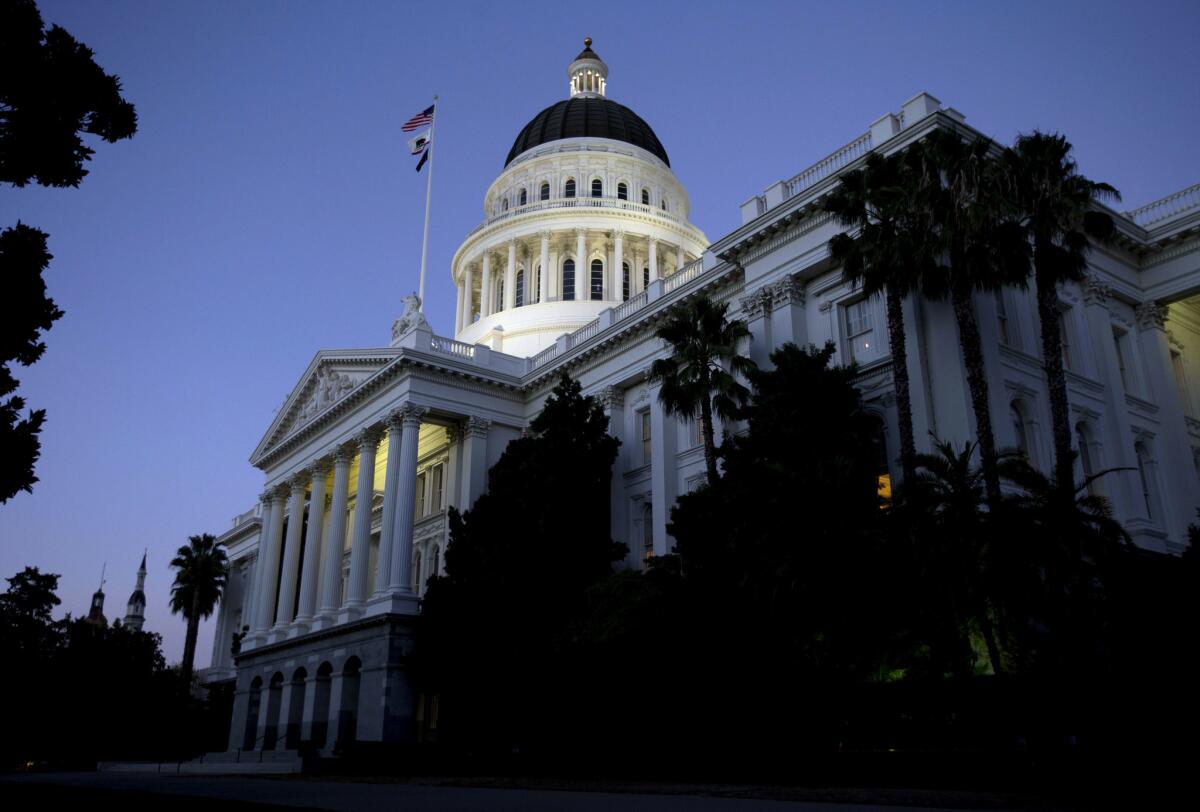
Vanessa Delgado must be having some seriously mixed emotions about joining the California Senate this week: Joy at winning a special election last week to replace former state Sen. Tony Mendoza (D-Artesia), who quit earlier this year rather than face an expulsion vote by his peers, and despair that her first month in the Senate will effectively be her last.
This odd proposition is due to the peculiarities of California’s election law, which requires a special election for vacant seats even if there’s a concurrent election for the next regular term. It’s silly, costly and, as we now see, unfair to the candidates in both races. (The editorial board has written more than once that the special election rules ought to be revised.)
Delgado ran in both races. She was one of the two top vote-getters in the special election primary (then won the runoff in that race), but did not make the November runoff for the next four-year term.
Although the current term for this seat lasts until Dec. 3, the legislative session ends Aug. 31, leaving just three weeks for her to find the bathroom, let alone to get things done. That can’t be easy knowing she will shortly be out of a job and doesn’t have the luxury of slipping back into her former gig as mayor of Montebello. She gave that job up Monday in order to accept the state Senate seat.
Delgado would be justified in feeling just a bit bitter about the arrangement. But her short Sacramento stint doesn’t have to be pointless. For one thing, she did a public service by edging Mendoza out of the race. Amazingly, he decided to run to regain his seat shortly after abandoning it.
And she also will have a vital role as one of 40 senators when important legislation comes up for a vote, such as a slew of #MeToo-inspired bills.
And if Delgado really wants to be a remembered as legislative hero, she can use her three-week window to push for changes to the state law so that this special election madness doesn’t claim another victim.
The Trump-Omarosa fight makes us all dumber

Tuesday morning, President Trump tweeted (kill me) that his former communications aide Omarosa Manigault Newman (seriously, let’s get off this planet) is a “dog.”
It was just the latest in a string of insults he’s lobbed at high-profile black Americans. Less than two weeks ago, he called basketball star LeBron James and CNN anchor Don Lemon dumb. (This is a Trump go-to: he’s repeatedly said Rep. Maxine Waters has a “low I.Q.”)
Trump is riled up that Newman has been on the talk-show circuit promoting her new book, a splashy tell-all about her time in the White House. On “CBS This Morning,” she unveiled a tape from the campaign that appears to reveal aides discussing how to handle Trump’s alleged use of the N-word if it ever came to light.
There’s a lot going on here.
Let’s start with the allegation. Did the president use the N-word? It really doesn’t matter. Of course, the word matters; it is one of, if not the most loaded terms in the English language. It should never be uttered by a non-black person. And we haven’t heard Trump say that precise word. But he’s been publicly expressing the sentiment of racist hatred that undergirds its use by white Americans for more than 40 years.
In the 1973, Trump was sued by the Justice Department for discrimination against black renters; an apartment building superintendent alleged he was told to mark applications by black renters with a “C,” indicating “colored.”
In 1989, Trump took out full-page newspaper ads advocating for the death penalty for the black and Latino teenagers who would come to be known as the Central Park Five. After DNA evidence revealed that these teenagers were not responsible for the rape of a white woman, he continued to argue they were guilty.
In 2011, Trump gave new life to the flames of the birther campaign against President Obama in a blisteringly racist crusade that sought to delegitimize the United States’ first black president.
In 2017, he said that immigrants from Haiti “all have AIDS” and that once Nigerian immigrants see the United States they would never “go back to their huts.”
And, as we know, Trump’s racial animus is not restricted to black Americans. He has room in his cold black heart to also disparage Mexicans and Muslims and many other types of marginalized people.
OK, so are the tapes real? Should Omarosa have made them? Is she a reliable source?
Unlike other Democrats, I’m not about to bend over backward to suddenly defend Omarosa’s character; she’s made a reality television career out of her ability to be sketchy and manipulative. She’s terrible.
But Omarosa’s legitimacy, and the legitimacy of the tapes’ content or procurement, has zero bearing on who Trump is. The list of his racist public statements and actions is endless. His dog whistle is badly warped from overuse.
We need to talk frankly about racism. Under Trump, noxious ideologies are festering. And while they’ve always been an integral part of our national DNA, racist ideas and actions are now moving from the shadows into the light.
But the parameters of that conversation shouldn’t be set by a bad-faith hissy fit between two of the lamest people on the planet. This soap-opera situation obscures the gravity of the dangerous situation in which we find ourselves. We are all dumber for having listened to them.
Kevin de Leon wants Dianne Feinstein to shut down the Senate to stop Judge Kavanaugh’s nomination. Ummm, she can’t...
As he challenges incumbent Democrat Dianne Feinstein for a seat in the U.S. Senate, state Sen. Kevin de Leon (D-Los Angeles) has made resisting the Trump administration a centerpiece of his campaign. A good illustration is his take-no-prisoners approach to President Trump’s Supreme Court nominee, Brett Kavanaugh. Feinstein isn’t doing enough to try to block the appointment, De Leon says, arguing that Democrats should go so far as to shut down the Senate.
OK, so what’s the endgame there? As members of the minority party, the only tools at Senate Democrats’ disposal where nominees are concerned are dilatory ones. They can use the filibuster to kill most types of legislation, but not nominations — thanks in large part to their own shortsighted decision in 2013 to forbid filibusters on almost all nominees. (The only exception was Supreme Court justices, but Republicans predictably removed that barrier after Trump took office.)
The Senate Judiciary Committee has scheduled Kavanaugh’s hearing for Sept. 4, and assuming he clears that hurdle, the only thing that can stop him from being confirmed is Republicans. Sure, Democrats could threaten to filibuster the spending bills necessary to keep the federal government operating on all cylinders after Oct. 1, but the GOP may have Kavanaugh confirmed by then. And even if it doesn’t, partially shutting down the government over Kavanaugh A) won’t stop the Senate from voting on his nomination, and B) isn’t likely to win much support from a public that does not like government shutdowns.
Senate Democrats learned lesson B the hard way when they caused a brief shutdown in January, hoping to force Republicans to revive the Deferred Action for Childhood Arrivals program. Republicans refused and Democrats quickly folded, recognizing that while most Americans say they want a fix for “Dreamers,” they also want members of Congress to do their jobs and keep the government operating.
De Leon also contends that the way to defeat Kavanaugh is to persuade more Republicans to vote against him (which is true), not for Feinstein to spend her time fighting for documents from Kavanaugh’s tenure as staff secretary to President George W. Bush. But there are problems with that argument too.
First off, Feinstein hasn’t taken a position publicly on Kavanaugh yet, so it would be kinda odd for her to be lobbying her colleagues to vote against him. And second, if Republicans are to be persuaded to vote against Kavanaugh, a smoking gun unearthed from his days before joining the appeals court might be vital (if there’s one to be found).
After all, that’s why many Democrats who’ve already announced their unwavering opposition to Kavanaugh are demanding to see the documents. They don’t need help making up their own minds; they’re hunting for ammo to use on persuadable Republicans. And they evidently don’t think the hundreds of court rulings Kavanaugh has written or signed onto are persuasive.
I know, Kavanaugh is a rallying point for many Democrats who fear a rightward lurch by the Supreme Court. It would hardly inspire voters for De Leon to say: “This guy must be stopped! We need to make our very best case and hope some Republicans listen.” But that’s the reality when you’re the minority party, regardless of what California voters may want to hear.
‘Wacky’ Omarosa is behaving a lot like the president who hired her

The easy thing to say about the fallout from Omarosa Manigault Newman’s revelation that she recorded conversations with President Trump and White House Chief of Staff John F. Kelly is that there’s no honor among reality TV stars.
The former “Apprentice” star, who was fired from her White House position by Kelly, is promoting a tell-all book about the administration and her loss of faith in Trump. She has accused the president of being a racist and claims that he has displayed signs of a “mental decline.”
Trump in turn has called his former co-star “wacky,” a “lowlife” and “vicious, but not smart.” (Attacking the intelligence of his African American critics is becoming a Trump staple.) He also accused her of missing meetings and said that he asked her to join the White House staff because she “begged me for a job, tears in her eyes.”Trump further tweeted:
What Trump didn’t say is that that his former aide in charge of “public engagement” has been behaving a lot like her old boss. The criticism she is sending Trump’s way is reminiscent of the president’s personal attacks, including on members of his own administration. (On Saturday, Trump tweeted that perennial punching bag Atty. Gen. Jeff Sessions was “scared stiff and missing in Action.”)
The other point is that Manigault Newman isn’t the only former administration official to give the lie to Trump’s assurance during his campaign that he would “surround myself only with the best and most serious people.”
Actually, Manigault Newman’s indiscretions — sensational as they may be as tabloid fodder — aren’t in the same league as the extravagances of perk-happy former EPA Administrator Scott Pruitt or ousted high-flying Secretary of Health and Human Services Tom Price. Will Trump now say “Sorry!” for having appointed them? (He did say when Price stepped down that “he’s a good man but I’m disappointed in him.”)
It’s hard to resist the conclusion that Manigault Newman’s real failing in Trump’s eyes wasn’t that she missed meetings or was “wacky” or “vicious” but rather that she turned on him.
Peter Strzok’s FBI job was in danger the moment we first heard his name
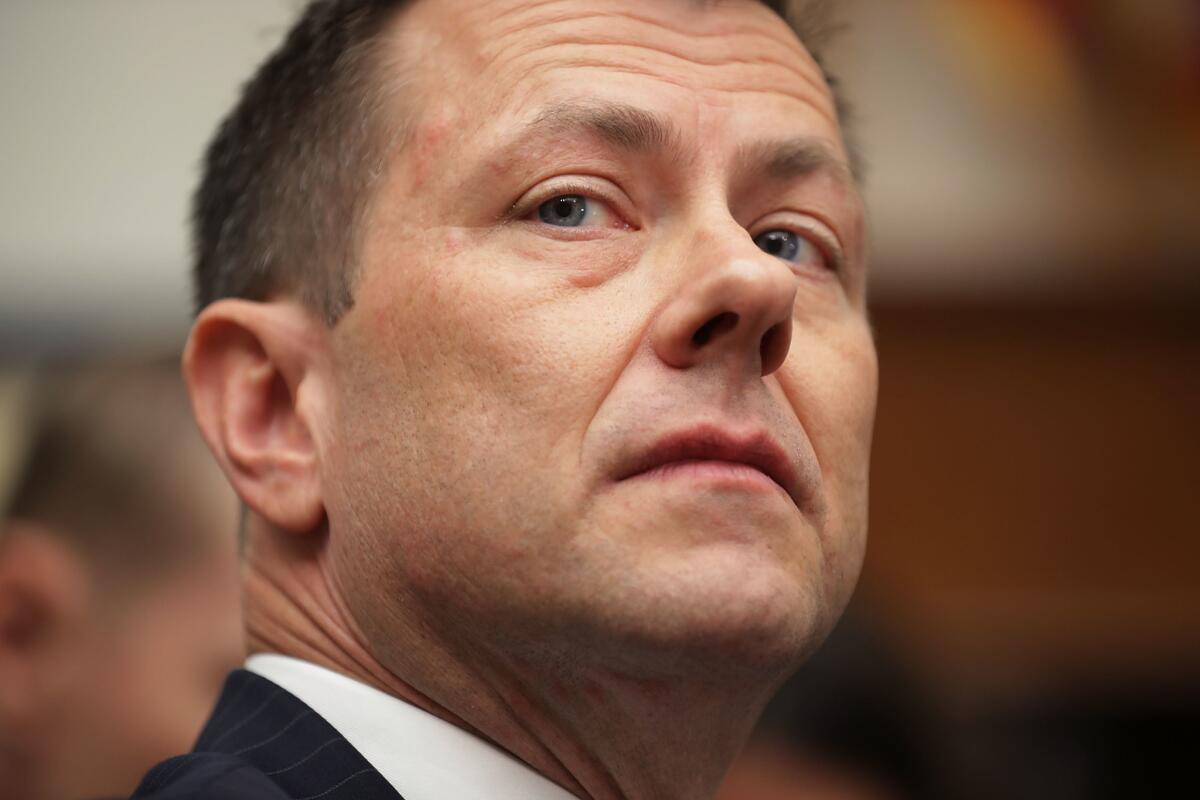
How many FBI agents can you name?
The agency has produced a handful of famous (or infamous) directors — most notably, J. Edgar Hoover. For the most part, though, it’s a faceless organization of seemingly interchangeable parts. And that’s by design.
Peter Strzok, whom the FBI fired on Friday, illustrates why.
Strzok led the bureau’s investigation of former Secretary of State Hillary Clinton’s use of a private email server, and was later a key part of the bureau’s probe into Russian meddling in the 2016 presidential election. While involved in both, he prolifically dashed off text messages to an FBI lawyer with whom he was having an affair, Lisa Page.
Unfortunately for practically everyone, but especially for the FBI, a number of those messages were acerbic critiques of then-candidate Donald J. Trump. One — “we’ll stop it” — seemingly declared his intention to prevent Trump from becoming president, although Strzok claimed the “we” referred to the American people.
As a consequence, a cloud of suspicion will always and forever hang over both of those high-profile investigations, despite the involvement of many other agents, lawyers and prosecutors, and no matter how many congressional inquiries find no evidence that Strzok acted on his impulses. Once those texts were revealed — by the FBI’s inspector general — they made an indelible mark on the investigations Strzok was helping to lead.
Sure, Strzok told a congressional panel repeatedly under oath that he never, ever let his personal beliefs influence his work at the FBI. But that’s impossible to prove, which means the texts will hang out there, unrebuttable.
There are a whole bunch of jobs out there that require workers to leave their personal opinions at home. Police officers. The vast unelected corps of public servants. Anyone who acts as the public face of someone else’s brand. I had a job like that for 25 years — news reporter — before joining the Opinion section here at The Times. And I’d guess that most people in those jobs believe the same thing about themselves that Strzok said he does.
But here’s the thing. If we took all those people’s private texts, how many of them would still be able to maintain the veneer of impartiality? We all have opinions — they’re the unavoidable consequence of living.
In a way, the Strzok episode suggests that we’d be better off knowing the innermost thoughts of every federal agent, to surface all the biases in the bureau. Expose the Deep State! But I cling to the idea that people can, indeed, set their opinions aside to do the job they were hired to do.
That’s why the FBI is such a monolith, at least as far as the general public is concerned. Or at least it was before Peter Strzok.
Michael Avenatti says he’s exploring a presidential run. Who asked for this?
Porn star Stormy Daniels’ lawyer, Michael Avenatti, is currently in Iowa, where he’s glad-handing the locals at a state fair as he mulls a 2020 run for president.
I’m going to ask politely: Oh my god, please don’t.
Avenatti has skyrocketed to national recognition as the lawyer defending Daniels, whose real name is Stephanie Clifford, in her quest to be released from a 2016 nondisclosure agreement regarding what she says was a one-night stand with President Trump in 2006. The Newport Beach attorney has built a career winning major settlements from celebrities and corporations — what he calls “fighting on behalf of Davids vs. Goliaths.” He’s also racked up his fair share of troubles, including a bankruptcy at his law firm and and multiple lawsuits filed by employees of a coffee chain he owned.
In a normal world, things like that would automatically sink anyone’s hopes of ever becoming president. But Trump has proved that America is truly the land of opportunity for anyone and everyone when it comes to running for the highest office in the land, even when you have a miles-long list of failed and bankrupt businesses in your past.
Some people say Michael Avenatti is the perfect counterpart to Trump. My colleagues in D.C. point out that he’s brash, media-savvy, and loves to antagonize people. He’s not afraid to take swipes at his opponents on Twitter. Hillary Clinton proved in 2016 that being extremely qualified and declining to stoop to his level is not the way to beat Trump in a presidential election. Maybe to beat Trump, the thinking goes, the Democrats need their own Trump.
Thanks to Trump, we are all still living in the 2016 election cycle. A Trump-Avenatti head-to-head on the campaign trail would continue that mind-set through the next decade.
Of course, this whole thing is almost certainly just a profile-raising publicity stunt on Avenatti’s part. The chances of a person who has spent zero time in public office running for president and winning are slim — but as we are all very aware, they are not zero.
Look, everyone in America wants the exact same thing out of their next president: to occasionally be allowed to forget that he or she exists. I want to go days at a time without hearing about chaos or mutiny in the nation’s capital. I dream of a world where the president is so dull that a scathing tell-all about the administration couldn’t exist. I want to be bored when I hear about the president’s agenda for the week. That wouldn’t happen under President Avenatti.
I just want political news to be so boring that I get to see Shep Smith have to do live commentary about escaped llamas again. Is that so much to ask?
A reminder: The Trump administration is one of the most scandal-plagued in modern history
You will be forgiven for not remembering all the ways in which Interior Secretary Ryan Zinke has drawn the attention of ethics investigators. That’s because there are so many of them.
In fact, since the departures of Health and Human Services Secretary Tom Price and Environmental Protection Agency director Scott Pruitt, Zinke is likely the most conflicted member of the administration not named Trump or Kushner.
Citizens for Responsibility and Ethics in Washington, a watchdog group, does a nice job rounding up the 14 — yes, 14 — ethics investigations centering on Zinke and his practices, from the silly (Zinke tweeted a picture of his socks with Trump’s Make America Great Again logo on them, a potential violation of the Hatch Act) to the potentially serious (Zinke’s role in a proposed development project funded by the chairman of Halliburton, the oil-service firm affected by Interior policies, in Zinke’s hometown of Whitefish, Mont.).
The list also includes a troubling array of investigations that died in part because of lack of cooperation by Zinke and Interior officials, or because of a failure by Zinke and the department to maintain a paper trail of his official activities.
On the good news front, the Office of Special Counsel cleared Zinke of several possible Hatch Act violations stemming from official government trips that also included political appearances. (The Hatch Act of 1939 prohibits most executive branch employees from engaging in certain forms of political activity, in order to avoid conflicts of interest.)
Zinke is in good company, though, in one of the most scandal-ridden administrations in recent history. There’s Ben Carson, head of Housing and Urban Development, who selected a $31,000 dining set for his office.
And Treasury Secretary Steve Mnuchin, who likes to travel on military planes – including to watch an eclipse from the roof of Fort Knox. (A former Wall Street titan standing above the nation’s gold cache — that was rich).
And Dr. Brenda Fitzgerald, director of the Centers for Disease Control and Prevention, who resigned after revelations that she bought stock in tobacco companies shortly after assuming control of an agency that oversees programs trying to end tobacco use.
Remember, we’re less than halfway through Trump’s first term.
Surprise! The world’s top empathy researchers might be bullies. So what about their work?
On Wednesday, the journal Science broke the story that neuroscientist and lab director Tania Singer allegedly bullied and intimidated her colleagues, particularly pregnant women. Singer is one of the world’s most respected empathy researchers, best known for her groundbreaking work on feeling others’ pain and the impact of meditation.
Singer isn’t the only academic whose alleged personal behavior is in conflict with her professional focus. In March, the Boston Globe reported that psychiatrist Bessel van der Kolk was fired from his post as medical director of the Brookline Center, where he had worked for 35 years, for allegedly bullying and denigrating employees. His 2014 book, “The Body Keeps the Score: Brain, Mind, and Body in the Healing of Trauma,” has been celebrated by experts and laypeople alike; the New York Times ran a 7,000-word profile of Van der Kolk in advance of its release.
Singer and Van der Kolk are far from the first geniuses to (allegedly) also be awful IRL. Think: Bobby Fischer. Hemingway. Flaubert. Mailer.
But their alleged behaviors are striking because they provide a 1:1 map of expertise to offense. The trauma specialist who allegedly inflicted workplace trauma on others. The empathy authority who brought her colleagues to tears with her cruelty.
In a Paris Review essay, Claire Dederer writes: “What do I do about the monster? Do I have a responsibility either way? To turn away, or to overcome my biographical distaste and watch, or read, or listen?”
Do we disqualify Singer and Van der Kolk’s profound work for their failures to live its message? There are several schools of thought.
One, as the Alcoholics Anonymous adage goes, “You can’t give what you don’t have.” You can’t teach empathy if you don’t have empathy.
Another, the very opposite: that the inability to personally access something is what spurs one’s obsession with — and ultimate expertise in — the subject. In the Playboy interview published two days before he was killed, John Lennon admitted to beating his first wife. “I couldn’t express myself and I hit. I fought men and I hit women,” Lennon said. “That is why I am always on about peace, you see. It is the most violent people who go for love and peace. Everything’s the opposite.”
Another: Who knows? Who ever knows?
I bought “The Body Keeps the Score” when I was training to become a rape crisis counselor. It’s a brilliant piece of work; I know personally perhaps a dozen survivors who have benefited from the guidance it provides. These allegations feel like a perverse betrayal of the person Van der Kolk led the reader to believe he is. (He included himself as a character in the book, both seeker and savant.)
The last line of “The Body Keeps the Score” reads: “The choice is ours to act on what we know.” Applied here, that choice doesn’t feel like a choice. There aren’t dozens of terrific, layperson-accessible books on trauma floating around for us to choose from. Who knows when a less problematic one will come along? Character is not a quality research-grant-awarding boards score for.
Under these constraints, my choice, for now, is internal. It involves moving by a shade. To still refer to Van der Kolk’s book and recommend it. To no longer revere it.
Melissa Batchelor Warnke is a contributing writer to Opinion. Follow her on Twitter @velvetmelvis.
Nunes sees himself – and the GOP – as the president’s protectors, checks and balances be damned
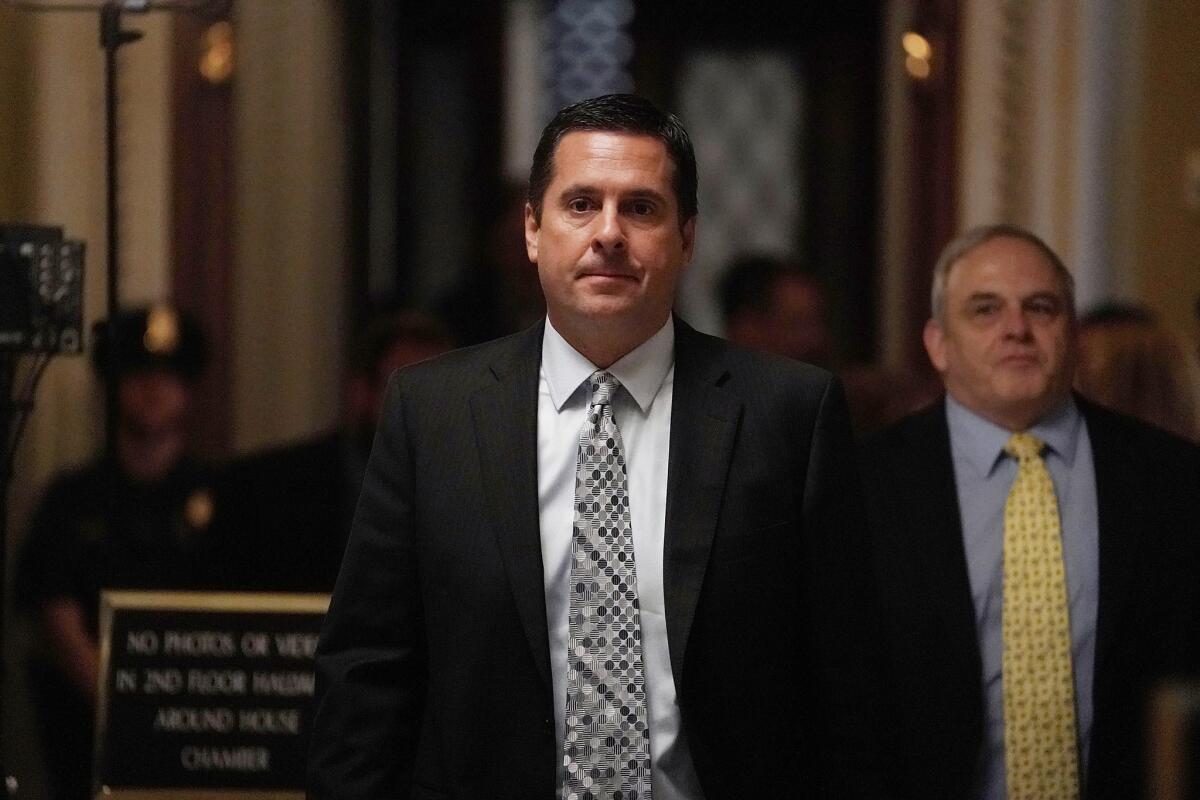
In case there was any lingering doubt that House Republicans are in the tank for President Trump, Rep. Devin Nunes (R-Tulare) told fellow Republicans at a fundraiser in Spokane, Wash., that the GOP needs to hang onto the House majority in order to protect the president from the Russia investigation and possible impeachment.
The comments, which were recorded by an attendee and eventually aired in part Wednesday night on MSNBC’s “The Rachel Maddow Show,” make it abundantly clear that Nunes, who chairs the House Intelligence Committee and was an early Trump supporter, is more interested in maintaining Republican power than he is about finding the truth. The fundraiser was with House Republican Conference Chairwoman Cathy McMorris Rodgers (R-Wash.), the fourth most powerful member of the House majority.
Nunes said that the Republicans would likely push their impeachment resolution of Deputy Atty. Gen. Rod Rosenstein until after the Senate acts on Trump’s nomination of Judge Brett Kavanaugh to the Supreme Court, fearing that action before then would delay and possibly kill the nomination; and that impeaching Rosenstein before the midterm could make it an issue in their reelection races. Though with Speaker Paul D. Ryan opposed to the move, it’s unclear whether it will gain traction.
After Atty. Gen. Jeff Sessions recused himself from the Russia investigation because he had served as a Trump campaign advisor, Rosenstein inherited oversight of former FBI director Robert S. Mueller III’s independent inquiry into Russian meddling in the 2016 presidential election
In his recorded comments, Nunes warned of the risks the president faced if the Democrats win the House.
“If Sessions won’t unrecuse and Mueller won’t clear the president, we’re the only ones,” Nunes said. “Which is really the danger. … We have to keep all these seats. We have to keep the majority. If we do not keep the majority, all of this goes away.”
There must be limits to political solidarity. Where exactly the line should be drawn can be debated, but one would hope that members of a political party would not let their desire to hang on to power preclude a chance to determine the scope of meddling by a foreign power in an American election – and whether those efforts implicate the president himself.
Congress is meant to be a check on the executive, not a political security detail protecting him. Voters would be wise to keep that in mind as the midterm approaches.
The Trump administration wants to open public lands in California to fracking, linked to quakes in other states

The federal government on Wednesday posted notice that it is considering opening up 400,000 acres of public land in California, and 1.2 million acres for which the government holds mineral rights, to fracking, the controversial oil and gas drilling practice linked to earthquakes in Oklahoma and groundwater pollution there and in other states.
The land at stake lies in Fresno, Kern, Kings, Madera, San Luis Obispo, Santa Barbara, Tulare and Ventura counties, the Bureau of Land Management said.
The announcement is just the latest anti-environment move by the Trump administration that directly affects California. It’s unclear whether the administration is purposely attacking California to punish the state for its deep and vocal opposition to Trump policies, or whether the state simply falls victim to the president’s boneheaded approach to the environment.
Also on Wednesday, Commerce Secretary Wilbur Ross directed the National Marine Fisheries Service and the National Oceanic and Atmospheric Administration to make available water whose use is governed by the Endangered Species Act for California firefighting — even though firefighters say they don’t need it.
“Secretary Ross’s directive is nothing more than a smokescreen designed to weaken these protections that [National Marine Fisheries Service] scientists determined are necessary to keep these native fish from going extinct,” said Kate Poole, senior director of the water division for the Natural Resources Defense Council.
Ross’ move followed Trump’s confused (I know) tweets about the fires being such a problem because California water is “foolishly being diverted into the Pacific Ocean.” Um, no. And fire officials say they have all the water they need to fight the fires. The biggest factor is bone-dry forests, exacerbated by climate change-related droughts.
But wait — there’s more. The administration earlier announced that it would sell leases for offshore oil and gas wells in nearly every part of federal waters — except Florida, where the Republican governor squawked and where the president just happens to have his “Winter White House” at Mar-a-Lago. The likelihood of additional drilling off California’s coast isn’t very high — the feds might sell leases but the state controls how and where that oil comes ashore, and good luck getting those permits.
The president also has targeted the Obama-era Desert Renewable Energy Conservation Plan, which sets aside specific areas in a 10.8-million-acre parcel in California for solar and wind farms — in places where they would cause the least environmental damage. Trump wants to open up more of that land for energy production, and is reviewing whether to open more space for off-road vehicles, mining and grazing.
And don’t forget his effort to deny California’s the right to set motor vehicle emissions standards for vehicles sold and operated here, and to weaken fuel economy standards — which would have a significant impact on California air quality.
All this from an administration run by a guy who thinks climate change is a hoax, that he can resurrect the coal industry (slowly dying because of market forces favoring cheaper energy sources), and that it is in the nation’s best interests to ramp up energy production from fossil fuels.
There’s already an award for popular film. It’s called cash

This morning, the Academy of Motion Picture Arts and Sciences announced its intent to cut the Oscars to a cool three hours and to create a new category for “outstanding achievement in popular film.”
Well, look, they had to do something. This year’s Oscars telecast was the lowest-rated of all time. Even I — who have rock-bottom standards for entertainment — got bored. So if the academy wants to run some awards during the commercial breaks, edit them down and run them later in the program: Whatever.
I know true film nerds will be upset about that. I get it. I was very upset when the “Poetry Magazine Podcast” changed its format from long, juicy monthly episodes to bite-sized weekly episodes. Everyone else’s world somehow kept spinning on its axis.
The more puzzling piece is the “outstanding achievement in popular film” award, ostensibly designed to include the highly-commercial blockbuster movies that historically get shut out at the Oscars. I say ostensibly because the academy provided zero info about the award, except to say that “eligibility requirements and other key details will be forthcoming.”
The context-free announcement raises a few questions, such as:
How does the academy plan to determine whether a film is “popular” — by its distribution, its intake, its studio?
Can a film be nominated as both “popular” and “best”? (The letter didn’t make this clear. An academy spokeswoman later said yes.)
Who cares?
Is high school real life?
Here’s a free tip: Next time, wait until you have the eligibility requirements and other key details sorted to make the announcement.
Also, there’s already an award for popular film. It’s called cash.
Melissa Batchelor Warnke is a contributing writer to Opinion. Follow her on Twitter @velvetmelvis.
Voters reject the GOP’s anti-union manipulation — in Missouri
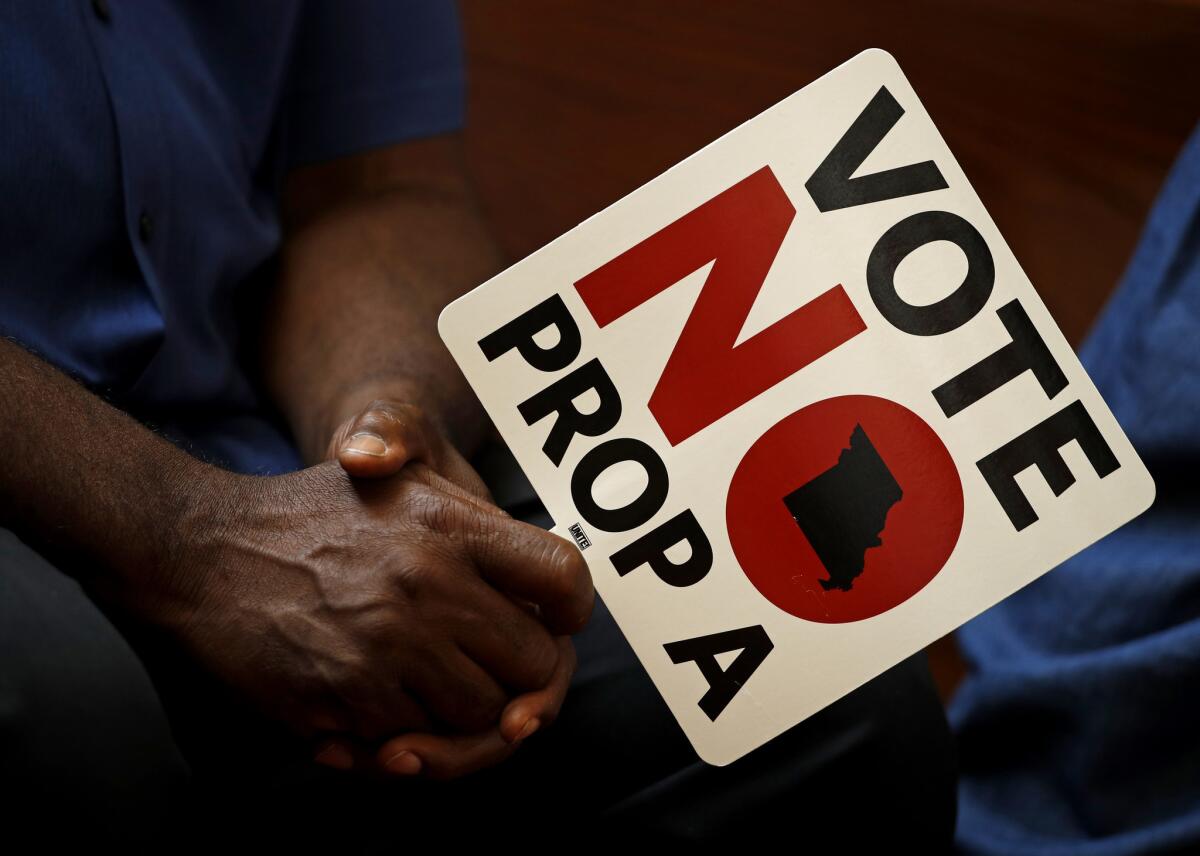
The organized labor movement has been taking it in the teeth. For one, participation has been steadily declining; in 1954, 34% of American workers belonged to labor unions. By 2017, that number had fallen to 10.7%. In May, President Trump signed a series of executive orders that would gut union protections for government workers. And in June, the Supreme Court ruled that government workers would no longer be required to pay so-called fair share fees to their unions, as they’d done for decades.
But plot twist: This isn’t another “we’re all going to hell in a handbasket, everything sucks for the left” piece. Now, I can’t say with any shred of confidence that we’re not or that it doesn’t, but organized labor won big Tuesday night in Missouri. Missouri! A purpley state, a former bellwether.
A measure on the ballot asked voters to endorse a Republican-backed law that would keep private-sector unions from collecting “fair share fees” from workers who decide not to become members. As ever, Republicans embraced baldly manipulative branding: they call these efforts, created to starve unions of oxygen, “right to work” laws. But if there’s a “Hamilton” lyric to match every political event, last night’s would be: “He looked at me like I was stupid / I’m not stupid.” Missouri voters untangled the lingo and rejected the measure by a 2-to-1 margin.
It can be hard to message effectively when you’re telling the truth. The truth about unions is that they’re complicated to explain, construct and maintain. A “right to not get the job you’ve had for decades yanked away from you without explanation” or “right to not get totally screwed by your unhinged boss” or “right to wages that increase apace with inflation” law doesn’t roll off the tongue as easily. But these protections matter.
So while corporations and the GOP have pushed “right to work” legislation through in more than 25 states, 61% of Americans approve of unions. And yesterday, in Missouri, they showed up to vote.
Melissa Batchelor Warnke is a contributing writer to Opinion. Follow her on Twitter @velvetmelvis.
The looming threat of a census undercount that could shrink California’s House delegation and reduce its federal funding
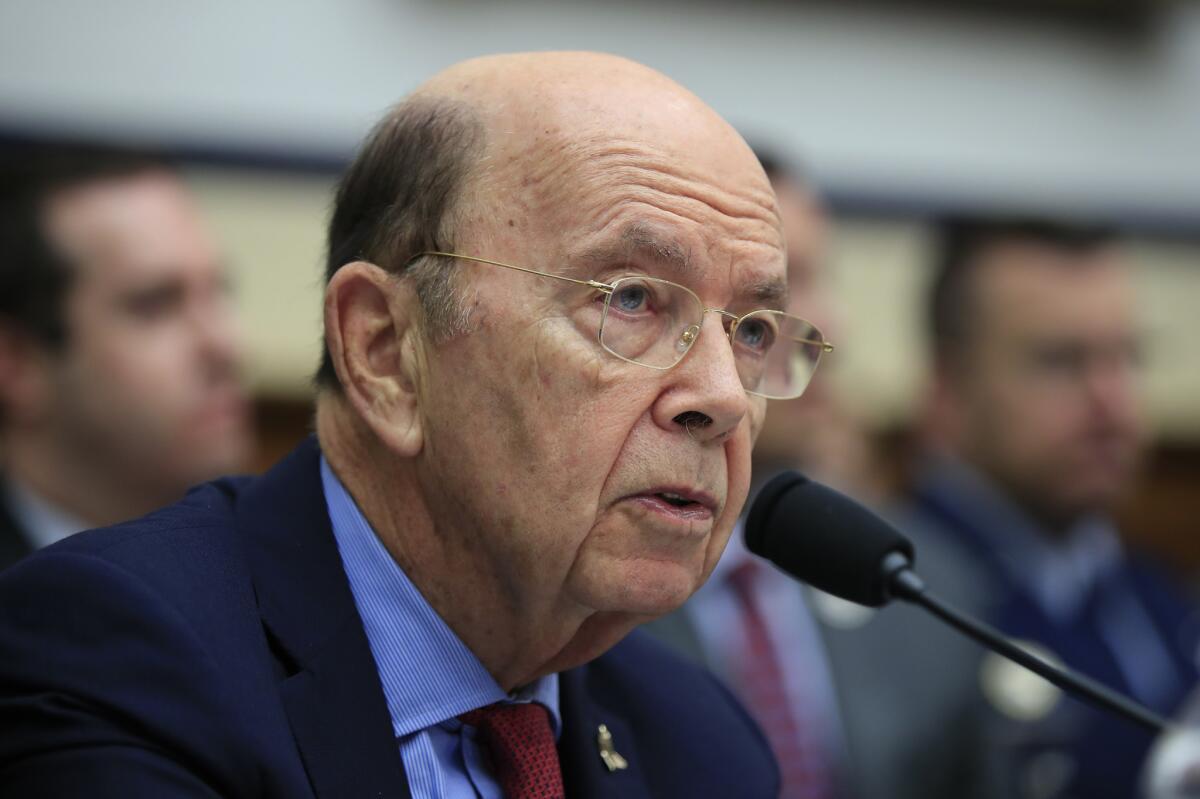
We’re less than two years away from the 2020 census — and, in the eyes of some researchers and advocates, from a possible undercount that could cost California a seat in the House of Representatives.
The problem is that California — particularly Southern California — has large numbers of traditionally hard-to-count people, including minorities, the poor (who often live in converted garages and other hard-to-find sites), children and people living in the country without permission.
Census takers are supposed to count everyone regardless of legal status, and those numbers are then used, among other things, to determine how many congressional districts each state gets. And the states use the data to draw state and congressional district boundaries.
The federal government also uses the data in determining its funding formulas. The Institute of Public Policy at George Washington University estimates that some 300 federal programs dole out more than $800 billion annually using census-based formulas. It also found that 37 states lost a median of $1,091 in 2015 for each person the 2010 census missed.
That’s why Gov. Jerry Brown pushed to spend $43 million to help California’s census cooperation and response rates
California currently has 53 congressional districts, but a new report by the Public Policy Institute of California finds that as many as 43% of people in Imperial County, 33% in Los Angeles and Fresno counties, and 29% in San Bernardino County are unlikely to respond to the census (an interactive map is here). The problem is not just California’s; Texas, with a sizable immigrant population, high poverty rate and residents still displaced by hurricanes, could suffer from an undercount, too.
One of the factors driving uncertainty over the accuracy of the 2020 census is the decision by Commerce Secretary Wilbur Ross to add a question on citizenship, which critics argue (persuasively, I think) is intended to reduce cooperation by immigrants wary of an anti-immigrant government.
And it’s not just undocumented folks — immigrants living here legally on visas or green cards can also be deported under Trump’s hard-line approach. Even immigrant citizens who live with family members or friends who are not here legally have cause to lie low. And all these hard-to-count groups tend to vote for Democrats. (See a theme here?).
Despite a long line of legal precedents making it clear that the census must count everyone regardless of status, many immigration hard-liners insist that noncitizens and people here illegally should not be counted for purposes of congressional representation or federal funding formulas. (Today is the last day for public comments on the Census Bureau’s plans).
But the 2020 census faces problems beyond the citizenship question. (The Government Accountability Office last year listed the 2020 census as “high risk.”) For the first time, the Census Bureau intends to rely on people using the internet to fill out census questionnaires, rather than relying on the former practice of mail-in forms. The Census Bureau planned three tests of the online system, but canceled two of them, which means the technology has not been tested on a large scale. That risks undercounting people with limited access to the internet — the poor, the rural and the elderly.
Of course, the government could fool us all and pull off an accurate census. But don’t count on it.
Leave Trump’s trashed Hollywood star alone

Before Donald Trump was a polarizing president, he was a successful reality television celebrity and producer of beauty pageants. And like so many of his entertainment ilk, his name was placed inside a brass-framed terrazzo star on Hollywood Boulevard’s Walk of Fame.
Then, like other Walk of Fame honorees such as Ronald Reagan and Arnold Schwarzenegger, Trump turned to politics. And when he did, his star became a focal point for protest and abuse from those who oppose his policies and views.
It has been defaced with graffiti, stomped and spit on. In 2017, someone placed a gold toilet next to it, with a sign inviting people to “Take a Trump.” Actor George Lopez pretended to urinate on the star last month. Twice it was nearly demolished — once with a sledgehammer before the 2016 election and then again in July by a man with a pickax.
But that’s not why the West Hollywood City Council on Monday voted to urge the Hollywood Chamber of Commerce, which is responsible for the Walk of Fame, to remove Trump’s star. The council thinks it should go “due to his disturbing treatment of women and other actions that do not meet the shared values of the City of West Hollywood, the region, state, and country.”
The Walk of Fame is not in the city of West Hollywood, but jurisdiction hasn’t stopped the small city from taking symbolic Resist Trump action. Last year the WeHo council voted to urge Congress to start impeachment proceedings.
But the Hollywood Chamber of Commerce should resist the pressure to remove the star. So far, it has. In a statement, the chamber said the executive committee will take the WeHo’s position under consideration but noted that it has no plans to remove any stars. It never has. Not even that of comedian Bill Cosby after he was convicted of sexual assault. The Chamber’s rationale has been simple: Once the stars have been placed they become historical artifacts.
I’m not sure the Hollywood Walk of Fame really rises to the significance of important historical record, but it’s a tourist attraction and the chamber is wise not to bow to pressure to remove the stars of people who take political positions that some people they don’t like. Otherwise they’d be yanking stars left and right and there would be a lot of holes on the sidewalks of Hollywood Boulevard.
However, if Trump’s star keeps getting trashed, the Chamber may be forgiven if it decides not to keep paying to replace it for the time being.
Five lessons from Alexandria Ocasio-Cortez’s visit to L.A.

On Alexandria Ocasio-Cortez’s to-do list when she visited Los Angeles for two days last week? Host a downtown luncheon in support of Occupy ICE. Tour skid row. Participate in a Democratic Socialists of America-sponsored panel discussion at a Koreatown church.
Now, admittedly, several of these functions were fundraisers. Take the panel, for instance: Attendees paid $15. If you couldn’t pay, you could get a subsidized ticket. You could pay more if you wanted to, but you wouldn’t get a better seat.
Ocasio-Cortez, who last month won a surprise primary victory against a powerful incumbent congressman in New York City, skipped Hollywood altogether. According to the Hollywood Reporter, her people never even called Mayor Eric Garcetti. Compare this to other Democratic darlings’ tours and the contrast becomes evident. Tickets to Hillary Clinton’s final Los Angeles fundraiser ranged from $33,400 to $100,000; Elton John performed, naturally. President Obama took the same glitzy approach.
As an attendee at Ocasio-Cortez’s Koreatown event, I can confirm there was no chilled caviar on hand. The room was packed with more than 700 melting Angelenos, many of whom had come straight from work. Some were Democratic Socialists, some were Democrats, and others were, in the emcee’s parlance, “DSA-curious.”
I could go on about Ocasio-Cortez’s political charisma, but others have done that. Yes, the woman next to me wiped tears from her eyes as the candidate spoke. Yes, the audience clapped frequently and raucously throughout the hourlong policy conversation. But political charisma, much as strategists would prefer otherwise, is hard to learn.
Ocasio-Cortez said several times that she was running to represent not only leftists, but also those who consider themselves centrist Democrats. “Socialism is not how we campaign,” she said. “The first rule of coalition building is to meet people where they are.”
Here are five lessons I took from her Friday speech about how to unite those two factions:
Stop talking about diversity and start demonstrating it
Every person who took the stage that evening was a woman; several were young women of color. Establishing a new norm without drawing attention to the choice is far more powerful than having an exclusively or largely male speakers slate drone on about the party’s support of women’s rights. (This happens all.the.time.)
Be direct
Adam Serwer wrote in the Atlantic that “to acknowledge the centrality of racial inequality to American democracy is to question its legitimacy — so it must be denied.” This reality is among the many reasons Democratic politicians remain reluctant to name racism when they see it. (One of the few refreshing exceptions to this norm is one of our own congressmen, Ted Lieu.)
“Racism is a self-fulfilling prophecy on the left,” Ocasio-Cortez said of Democratic Party officials’ initial disinclination to support Michigan gubernatorial candidate Abdul El-Sayed, citing concerns that white voters would not support him. Ocasio-Cortez’s response? “Hey, some bigot may not, but I will.” She is careful, however, when it comes to those she is actually trying to recruit to her cause. When she criticizes Democrats, she takes pains to specify that it’s the strategists, not the “everyday Democratic voters,” that she takes issue with.
Stop chasing the elusive ‘swing voter’
One of the reasons Ocasio-Cortez speaks freely is because she’s focused on expanding the electorate instead of chasing the middle; through an intensive recruitment effort, her campaign team secured a 68% increase in turnout from the previous midterm primary. “We know there are far more nonvoters than there are swing voters,” she said at the event.
Admit when you mess up
On July 13 on PBS’ “Firing Line,” Ocasio-Cortez said she was “a firm believer in a two-state solution” in Israel. In a July 16 ”Democracy Now” segment, Ocasio-Cortez ducked a question about a two-state solution, which angered and disappointed many of her pro-Palestinian supporters.
When asked about this uncharacteristic gaffe at the L.A. event, she explained that she didn’t grow up with a deep understanding of Middle Eastern politics and that she is working to educate herself on the issues. While that answer may not fully satisfy her base, it was refreshing to hear a political candidate admit she wasn’t born omniscient.
Go big
“Our biggest problem right now is that we’re too timid,” Ocasio-Cortez said, raising big ideas ranging from a federal jobs guarantee to a vacancy tax to help stem rising housing costs.
“It’s surprising to hear things like this in the U.S.,” a Swedish friend told me after the event. “I don’t think every idea will work, but at least she sees the problems clearly.”
Melissa Batchelor Warnke is a contributing writer to Opinion. Follow her on Twitter @velvetmelvis.
63 years after his murder, a memorial to Emmett Till is riddled with bullets -- again
How many times can racists kill a child, both physically and symbolically?
In August 1955, a 14-year-old African American boy from Chicago, Emmett Till, was visiting family in rural Mississippi when he supposedly flirted with or whistled at a 21-year-old white woman, Carolyn Bryant, who was working in the white family’s store. Four days later, her husband, Roy Bryant, and his half-brother, J.W. Milam, kidnapped Till from his uncle’s home, tortured him, shot him, then used barbed wire to tie a heavy metal fan around his neck and dropped the body in the Tallahatchie River.
After a fisherman found the body a few days later, Bryant and Milam were quickly arrested, tried and, after 67 minutes of deliberation, acquitted by an all-white jury. “We wouldn’t have taken so long,” one of the jurors later said, “if we hadn’t stopped to drink pop.” A few months later, the two men admitted in an article in Look magazine that they had indeed killed Till.
The murder, acquittal and publication of a graphic photograph of Till’s battered body in Jet magazine galvanized the civil rights movement.
And now, for the second time, a sign marking the spot where Till’s body was dragged from the river has been shot up — just weeks after the Justice Department said it would reopen an investigation into the murder.
It’s not the only target. Memorials to the civil rights movement are routinely vandalized. A historical marker memorializing the 1964 murder of three civil right workers — James Chaney, Andrew Goodman and Michael Schwerner — has, on various occasions, been painted black, had the letters “KKK” written on it, and been stolen.
Chaney’s grave has been vandalized so often that a steel frame has been added to keep the headstone from being knocked over.
It wasn’t until 2007 that Tallahatchie County erected the Emmett sign to mark the spot.
That sign was stolen the next year and tire tracks suggest the thieves threw the sign in the river near where Till was found. A second sign, erected in 2013, was riddled with more than 30 bullet holes.
There’s no direct connection but it’s worth noting that the recent vandalism coincides with the first anniversary of the white supremacist march in Charlottesville, Va., in which a counter-protester was killed. It also coincided with weekend rallies in Portland, Ore., and Berkeley in which white supremacists – excuse me, “western chauvinists,” as they call themselves – held rallies (and the so-called antifa movement fell into the trap by engaging in a violent counter-protest).
As Alvin Sykes, president of the Emmett Till Justice Campaign, told the Jackson Clarion-Ledger, “The sign going back up is a sign of progress…The bullets are showing how much further we need to go.”
A federal judge slaps the Trump administration for arbitrarily ending DACA just because it wanted to
A U.S. district judge ruled late Friday that the Trump administration must fully reinstate the Obama-era Deferred Action for Children Arrivals program because President Trump’s decision to end it “was arbitrary and capricious” and the government’s legal justification “inadequately explained.”
Judge John D. Bates of the U.S. District Court for the District of Columbia affirmed his earlier finding that the Department of Homeland Security failed to offer a reasonable argument for ending DACA, and that a more recent DHS memo rationalizing the decision to end deportation protections for the so-called Dreamers “fails to elaborate meaningfully on the agency’s primary rationale for its decision: the judgment that the policy was unlawful and unconstitutional.”
“And while the memo offers several additional ‘policy’ grounds for DACA’s rescission,” Bates continued, “most of these simply repackage legal arguments previously made.”
Ouch.
Bates stayed his order for 20 days to give the government a chance to decide whether to appeal, so exactly how this will all play out is about as clear as the Rio Grande after a rainstorm. But if Bates’ decision holds up, this would be a significant victory for the rule of law, a “yuge” loss for Trump (check your Twitter feeds early and often on Saturday morning) and a victory for the 700,000 or so people who currently are enrolled in DACA.
To remind, DACA offers protection from deportation to about 700,000 people living in the country illegally after having been brought here as children (some were smuggled in; some overstayed visas). Those eligible for protections must have arrived in the U.S. before age 16, been here continuously since June 15, 2007, and been physically within the U.S. on June 15, 2012. Further, as the U.S. Citizenship and and Immigration Services lays out, they must be “in school, have graduated or obtained a certificate of completion from high school, have obtained a general education development (GED) certificate, or are an honorably discharged veteran of the Coast Guard or Armed Forces of the United States; and have not been convicted of a felony, significant misdemeanor, or three or more other misdemeanors, and do not otherwise pose a threat to national security or public safety.”
Just the sorts of people most Americans like to see as part of our society.
Interestingly, Bates also rebuked the administration for what has been its practice (though he stuck to this one instance) of simply deciding it wants to do something and then going full steam ahead without following well-established laws and procedures for how regulations and programs must be created or dismantled. In short, the government can’t just say, “We don’t like this one anymore so shut it down,” as it has tried to do to environmental, energy, federal land use, education and other policies.
The Administrative Procedure Act, among other governance rules, says the government must present a reason for doing something, and if it wants to undo something, it must also have a reason.
“The Court did not hold in its prior opinion, and it does not hold today, that DHS lacks the statutory or constitutional authority to rescind the DACA program,” Bates wrote. “Rather, the Court simply holds that if DHS wishes to rescind the program — or to take any other action, for that matter — it must give a rational explanation for its decision.”
That’s a basic level of competence that lies beyond the reach of this administration.
This is why we can’t have nice things, Sarah Jeong edition
It’s becoming routine: The New York Times hires someone for its opinion section who’s not a usual suspect, and an aggrieved group on the right or left starts a flame war. The latest target: Sarah Jeong, a tech writer for the Verge, whom the Times’ editorial board officially snapped up Wednesday.
Jeong’s critics have been recirculating a number of tweets she made from 2013 to 2015 that blast white people in general, white men in particular. Here’s an example:
Jeong says the tweets were taken out of the larger context in which they were uttered — she was responding in kind to some of the abuse she’s received on Twitter, where it’s open season on female tech writers (being Asian only intensifies the heat, evidently). She offered two examples of the latter, only one of which is printable: “If I saw you, I would sock you right in your lesbian face.”
She then explained, “I engaged in what I thought of at the time as counter-trolling. While it was intended as satire, I deeply regret that I mimicked the language of my harassers. These comments were not aimed at a general audience, because general audiences do not engage in harassment campaigns. I can understand how hurtful these posts are out of context, and would not do it again.”
Note that Jeong isn’t apologizing for what she wrote. She’s just sorry that her words were republished outside of Twitter, where they were read by a different, and broader, slice of the public.
I’ll leave it to others to attack (and attack and attack) or defend Jeong. I don’t know her or her work. All I have is a sampling of the things she’s said online. Her old tweets are so over-the-top provocative, you can’t help but feel she’s responding to an attack of some kind. But life’s too short to go wading through her Twitter feed to try to unearth what she was seeing.
And her Twitter feed would reveal only a portion of whatever backlash Jeong was getting to her reporting. Journalists are on the receiving end of some remarkably ugly stuff, some of it personal and explicitly threatening. And in the face of that, it can be well-nigh impossible to turn the other cheek. (I know, crack out the tiny violin.)
Still, the battle Jeong was fighting is one that nobody can win. It’s simple to strip tweets of their context and weaponize them; doing the reverse can be next to impossible. The older a tweet is, the harder it is to reconstruct the conversations that led up to it. What the public inevitably is left with is a scrollable greatest hits compilation of the most outrageous comments a person has made. And once something is uttered online, it never goes away.
A series of tweets by author John Scalzi Friday morning seems appropriate. Scalzi was singled out Thursday by an alleged alt-right Twitter troll, who threatened to summon SWAT to Scalzi’s house a la the malicious prank that killed a Kansas man late last year. In the aftermath, Scalzi wrote this (I’d show the whole series, but again, they’re not all suitable for print):
Jeong’s head is still on her shoulders, and her job at the New York Times appears intact. But even if you accept her explanation for her old tweets, it doesn’t seem like she’s won this game.
Wait, wasn’t the Catholic Church already against the death penalty?

Pope Francis threw the weight of the Catholic Church behind the death-penalty abolition movement on Thursday, releasing a new church teaching that says – quoting a speech by the pope last year – that “the death penalty is inadmissible because it is an attack on the inviolability and dignity of the person.” That may come as a surprise to Catholics who thought the church already opposed the death penalty.
And it did, in most instances, as spelled out in Catechism No. 2267, which Francis changed in May but didn’t announce until he released a “Letter to the Bishops” on Thursday. The Church previously carved out an exception for an execution “if this is the only possible way of effectively defending human lives against the unjust aggressor.” Though it also said such circumstances “are very rare, if not practically nonexistent,” as Pope John Paul II wrote in his 1995 “Evangelium Vitae” on the sanctity of life.
Among the reasons for the shift: Changes in detention practices now make prisons sufficient to protect the public from the homicidal. But the new teaching also notes that “there is an increasing awareness that the dignity of the person is not lost even after the commission of very serious crimes.”
The new teaching isn’t likely to shift the weight of the debate over the death penalty, but in making the adjustment, the church (finally) gets it exactly right and follows personal observations Francis has made in the past.
The strongest argument here is that even those who have committed the most heinous of crimes remain human beings deserving of the dignity of life — a view that resonates with the secular world as well. Plus, the U.S. capital punishment system has shown time and time again that it is too error-prone — and too susceptible to manipulation by the misdeed of prosecutors and the lies and errors of witnesses — to divine absolute guilt. Which means capital punishment is both immoral in concept and unreliable in practice.
A fond farewell to MoviePass, the only good thing about 2018

These are dark times, friends.
California’s on fire, again, and seemingly always will be. The economy is allegedly doing well, but the numbers on our paychecks remain stagnant. No one in the White House knows how to change the president’s Twitter password. It has been 13 whole months since we last saw a new “Game of Thrones” episode.
And now, our beloved MoviePass is as good as dead. Let’s call it advanced life support, with deep-pocketed investors providing infusions of cash to stop the whole thing from flatlining for good.
For most of us, MoviePass came into our lives in the last year, after the service dropped the price to $9.95 a month. For less than two-thirds the cost of a single movie ticket at The Grove, you could see as many movies you wanted. You logged in with the app and you swiped a special red debit card magically loaded with the total price of the ticket.
It cost the movie theater nothing, it cost you practically nothing, and it cost the rich guys pouring equity into MoviePass literally millions of dollars. Extracting maximum value by seeing as many movies as possible was practically a political act for the #resistance set.
See, here was the basic problem with going to the movies prior to MoviePass: Movies are expensive, and TV is very good.
It’s not news that millennials are poor (mostly). A night at the movies for two people in L.A. is around $30 for tickets and another $5 for parking. Throw in concessions and a round of drinks, and you’re practically dropping a Benjamin for a couple of hours of entertainment. Netflix and Hulu each cost less than one movie ticket for access to an unlimited amount of some of the best television shows of all time, with the added bonus of not having to put on pants or leave the house.
Of all the movies I MoviePass’d in the last nine months, only “Black Panther” deserved to come out on top in that equation. (OK, the movie where Cher does ABBA karaoke would also have been worth paying sticker price.) And I saw a lot of movies. For the first time ever, I watched the Oscars having actually seen most of the nominated films. I saw documentaries, indie movies and horror flicks -- all categories I would have previously waited six whole weeks to rent for $1 from the Redbox at Ralph’s.
Yes, MoviePass had its problems. It could take weeks for cards to arrive, and some people (me included) had problems getting their card to work once it did. A trip to see “A Quiet Place” turned out to be an ineligible screening, despite what the app told me, which is how I ended up experiencing John Cena butt-chugging a beer instead. This past weekend, the service blocked the new “Mission Impossible” entirely and imposed its version of surge pricing onto everything else.
Before that, it had stopped working entirely one day because the company was flat broke.
MoviePass’ original plan for turning a profit was to eventually sell data from subscribers, or possibly set up some kind of revenue-sharing deal for a chunk of ticket and concession sales. At one point, the CEO theorized that it would be like a gym membership, and they’d make money off the subscribers who somehow forgot that they could see any new release in a theater whenever they wanted. Obviously, none of that happened. Imagine if Uber’s business model was to reimburse cabs at full cost, and the value proposition was that they’d sell the cabs data on where the passengers were going.
It was patently ludicrous that either theaters or studios would start paying MoviePass when they were making money hand over fist from the app. The company was forced to do a 1-to-250 reverse stock split to avoid dropping off the Nasdaq entirely. On Monday, it announced a 50% price hike.
In MoviePass’ defense, lots of startups are bad ideas, and plenty of them operate under the “get customers now, figure out how to make money later” model. (Uber has burned through $10 billion and is still not, uh, “revenue-positive” in the traditional sense.) MoviePass was a great idea, for customers. We loved it. We loved it too much, actually, in that we loved it to death.
If this were a movie, a wealthy benefactor would swoop in and rescue MoviePass for the masses. Unfortunately, Elon Musk already said no.
MoviePass has been the only good thing about 2018, which has otherwise been an unrelenting hellscape of grim headlines. (I realize 2018 isn’t over yet, but I’m not holding out hope for the second half.)
But unless it gets the corporate equivalent of a double lung transplant, the MoviePass party appears to be ending. And if it does come back, the service won’t be — can’t be — the impossibly great deal we early adopters knew and loved. So rest in peace, sweet MoviePass. You were too good — and too entirely, overwhelmingly, comedically unprofitable — for this world.
Obama’s fuel economy standards aren’t worth fighting for. In fact, they’re terrible

The Trump administration announced on Thursday it would make good on its threats to end Obama-era fuel efficiency standards for cars and trucks.
Environmental advocates across the country are livid. And, yes, at first glance this action may like seem a catastrophic blow to the effort to curb the effects of global warming. Tailpipe exhaust from vehicles is now America’s largest source of greenhouse gas emissions.
Here’s the thing: Obama’s fuel efficiency rules were, in actual practice, decidedly unhelpful. In many ways they made things worse. And I’m not just being a counterintuitive troll.
The truth is that Obama-era Corporate Average Fuel Economy standards have likely led to only marginal gains in fuel efficiency, if any at all. Most fuel savings we’ve seen touted are on paper only. Beyond that, these regulations are making roads less safe — and have helped create a spike in pedestrian deaths in cities across the country (though not for the ridiculous reasons the Trump administration has cited).
Here’s why:
The statistic that often gets bandied about in reference to Obama’s CAFE standard is that it will raise the average fuel efficiency of all cars and trucks in America’s fleet to 50 miles per gallon by 2025. The reality, however, is more complicated — and much less efficient.
It would be natural to think that America measures the fuel efficiency of its fleet by simply averaging the fuel economy of every car and truck sold in America.
That’s not how it works.
Fuel economy standards are broken up into four categories, which I’ll call small cars, large cars, small light trucks and large light trucks.
Each of those categories has its own fuel economy standard. For instance, under Obama’s standard, a small car sold in 2025 would have to average 60 mpg. A large light truck, on the other hand, would have to average only 30 mpg. Here’s the thing: A whole lot more SUVs are sold in America than small cars. And while each individual CAFE category accounts for vehicle sales, sales weighting goes out the window when categories are averaged with one another.
In other words, if 2 million SUVs are sold in America and only 10,000 small passenger vehicles, the fuel economy of those two categories will be averaged as equals. If Ford decides to sell only light trucks, a strategy it appears to be working towards, it has to meet only the less stringent light truck CAFE efficiency standards and doesn’t even have to bother trying to get to 60 mpg.
The result is that we’ve incentivized automakers to go big. And go big they have. SUV sales shot up by 37% between 2009, when Obama’s rules were first proposed, and 2016. SUVs and trucks account for more than two-thirds of all vehicles on the market. Crossover vehicles are now the rage — models that used to be passenger cars but that automakers have given growth hormones to turn them into SUVs.
Bigger is not better. The larger the car, the more it weighs. The more it weighs, the less fuel efficient it is (all other things being equal), and the more deadly it becomes in accidents with other road users.
Automakers argue that the rise in SUV sales is due to low gas prices that have fueled a consumer preference for larger vehicles.
There is some truth to that. Yet if fickle consumer preference is solely responsible for the rise of inefficient SUVs, why were researchers able to predict the trend so accurately?
Steve Skerlos, a professor and researcher at the University of Michigan, was part of a team that in 2011 predicted a growth in vehicle size. These analysts argued that making cars and trucks with larger footprints would be the most cost-effective way for automakers to meet Obama’s fuel efficiency guidelines. Therefore we would see more large-footprint vehicles.
We did. (Incidentally, making larger cars isn’t just bad for the planet, but for pedestrians, who are being run over and killed by America’s steroidal auto fleet at record clips.)
I spoke with Skerlos earlier this summer, and he was adamant that Obama’s CAFE standards had pushed automakers toward building larger, less efficient cars. And that the fuel efficiency gains we’re seeing on paper are more than likely illusory.
“The climate is screaming for us to get out of these vehicles,” he said of America’s push towards SUVs. “We are so off track that our window [to stop catastrophic climate change] is going to close.”
Skerlos says Americans do clearly prefer large vehicles, but that preference isn’t completely inherent. It’s largely a product of marketing and “psychological momentum.”
“It’s an arms race,” he says. “People see bigger cars around them and they’re more likely to buy bigger cars.”
Skerlos and his team are in the middle of a follow-up study to show just how big a hole we’ve dug ourselves in with the Obama CAFE regime.
This isn’t to say that California shouldn’t fight for the autonomy to dictate its own fuel economy standards, as Gov. Jerry Brown has already indicated he will. It should.
But if California really wants to push back against the Trump administration — and, even more importantly, take action that might actually make a meaningful dent in climate emissions — it needs to go beyond Obama’s CAFE rules by unilaterally eliminating fuel economy categories. It should set a single fuel economy standard for all cars and trucks and force automakers to meet it.
This would remove one of the biggest incentives for automakers to go big, and it would reward responsible automakers who make smaller, more efficient vehicles. Vehicle size would shrink accordingly, which would make roads safer for pedestrians, cyclists and drivers of smaller cars.
The current administration obviously doesn’t have the health of the planet in mind with its CAFE standard rollback. But putting Obama’s regulations on a pedestal is equally unproductive. Staying the course on CAFE standards is an inadequately incremental path that might make liberals feel good about themselves, but won’t stave off the worst effects of climate change.
Happy Earth Overshoot Day! Here’s what that means (Hint: It’s not good)
Researchers for the Global Footprint Network say the world, as of Aug. 1, has used up all the sustainable global resources for the year, meaning that we are “using nature 1.7 times faster than our planet’s ecosystems can regenerate. This is akin to using 1.7 Earths.” And Aug. 1 marks the earliest global consumption has crossed that sustainability line — or Earth Overshoot Day, as the organization calls it.
So what does that really mean? According to GFN, we reach overshoot when “humanity’s annual demand on nature exceeds what Earth’s ecosystems can renew in that year.” Or as the Quartz website put it, it’s “the equivalent of drawing down capital rather than living off interest.”
And that’s not good.
“The costs of this ecological overspending include deforestation; collapsing fisheries; fresh-water scarcity; soil erosion; biodiversity loss; and the buildup of carbon dioxide in the atmosphere, leading to climate change and more severe droughts, wildfires, and hurricanes,” the organization said. “These threats can produce desperation and force many people to migrate to cities or other countries.”
The organization measures “demand for food, timber, and fibers (cotton); absorption of carbon emissions from burning fossil fuels; and buildings, roads and other infrastructure.” It began in 1969 and reports that the Earth hit its first overshoot in 1973 — and has over-tapped our resources every year since.
There are fixes to help us roll back some of the worst environmental degradations, including strictly limiting the use of motor vehicles that burn fossil fuels, taking other steps to pare the amount of carbon we release into the atmosphere, reducing food waste, and procreating less to reduce the growth in global population.
Technological advances can help, but ultimately we’ll likely need to consume less if we’re to keep the planet habitable for humans.
No, lowering fuel economy standards won’t save lives
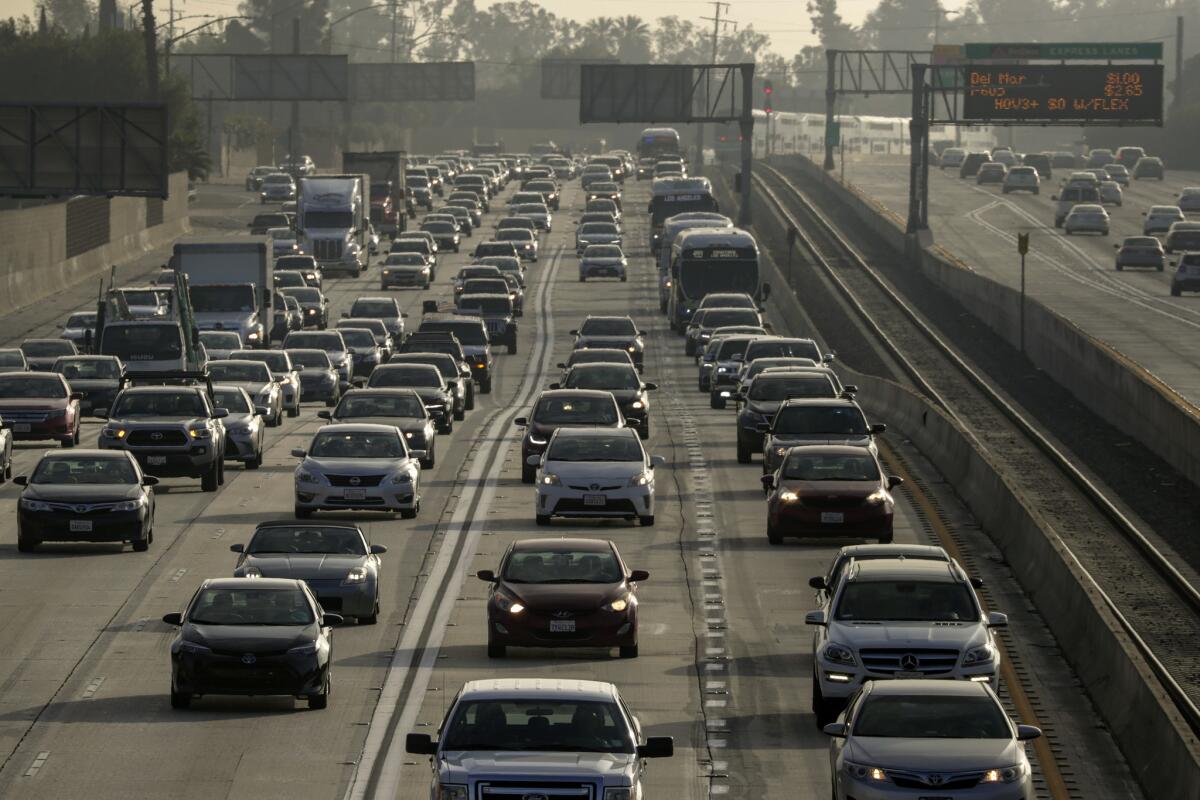
The Trump administration is so eager to roll back an Obama-era mandate that cars, light trucks and SUVs become more fuel efficient, it’s planning to throw every possible justification for doing so against the wall to see what sticks.
One assertion: People will drive less if their vehicles get fewer miles per gallon, lowering the risk of crashes. That’s according to excerpts from a draft of the administration’s proposal obtained by the Associated Press.
This is a stretch, as several experts told the AP. There is little evidence that more driving equals more crash fatalities. Since the mid-1970s, the number of vehicle miles driven each year has increased while the number of motor vehicle fatalities has decreased.
It’s also contrary to one of the other justifications being floated for the rollback. The U.S. Environmental Protection Agency has argued that more fuel efficient cars will be more expensive and people won’t buy them. That would leave older, more polluting cars on the road longer. (That’s questionable.)
Nevertheless, according to the Trump administration logic, we don’t want cars to be expensive to buy, otherwise people will drive dirtier cars, but we do want cars to be more expensive to operate so people won’t drive them as much and, thus, avoid crashes.
Who’s coming up with these arguments?
If the Trump administration was really concerned about people driving more, there are a variety of policy solutions to that problem. Raise the gas tax. Support congestion pricing. Rather than slashing funding for public transit, dedicate more federal dollars to its construction and maintenance, then use tax incentives to encourage people to use it. Commit more transportation dollars to making streets safer. Encourage the development of denser, more walkable and bikeable communities.
But of course, the Trump administration is not seriously worried that people will drive more and die more. This is one more flimsy justification for a very bad policy decision that will make it much harder for the U.S. and the world to slow global climate change. That is the real threat to lives.
Another day, another Trump call for Robert Mueller’s head

It’s every employee’s nightmare: the boss asking — no, demanding — that you do something he knows you can’t do.
Atty. Gen. Jeff Sessions has been living that nightmare for a year and a half. It took a darker turn Wednesday morning, when President Trump called on Sessions to do something that would cement the attorney general’s place in the history books, and not in a good way.
The key line is in the third tweet in this sequence, after the long quote from Trump apologist Alan Dershowitz:
Admittedly, it’s hard to have a lot of sympathy for Sessions. Or any sympathy, really. His tenure has been distinguished by some of the least humane and most regressive Justice Department policies in recent memory.
Still, anyone who answers to a boss knows the stomach-churning Sessions must have felt when he saw that last tweet (which is the only one many media outlets are quoting). For starters, Sessions recused himself from special counsel Robert S. Mueller III’s probe because of the obvious and disqualifying conflict of interest he has, having worked on the campaign that Mueller is investigating. With the conflict admitted, Sessions can’t pretend it’s miraculously disappeared.
Second, Trump’s efforts to stop the investigation are Nixonian. There is only one way to avoid infamy when the president asks you to 86 an investigation that could implicate him: refuse and resign if necessary, as Elliot Richardson and William Ruckelshaus did in 1973 when President Nixon demanded the firing of special prosecutor Archibald Cox.
Third, Trump is clearly playing Sessions here. He knows Sessions won’t fire Mueller — Sessions has told him so, repeatedly. But Trump is peeved by his AG’s refusal to do his bidding, and so he periodically sticks a Twitter knife into Sessions because he can.
So what to make of the tweet? Trump is probably just blowing off steam about the trial of his former campaign manager, Paul Manafort (whom Trump again tossed under the bus on Twitter Wednesday), the first person charged by Mueller to go before a jury. But Trump obviously would love to make Mueller and “the Rigged Witch Hunt” go away. And make no mistake, if he manages to oust Mueller, that crosses a line that Americans should not allow a president to cross.
In fact, GOP leaders in both the House and Senate have promised that there will be consequences if Trump orchestrates Mueller’s firing. Here’s hoping their resolve on that point won’t be tested.
ICE says family detention centers are like ‘summer camp.’ Um, no
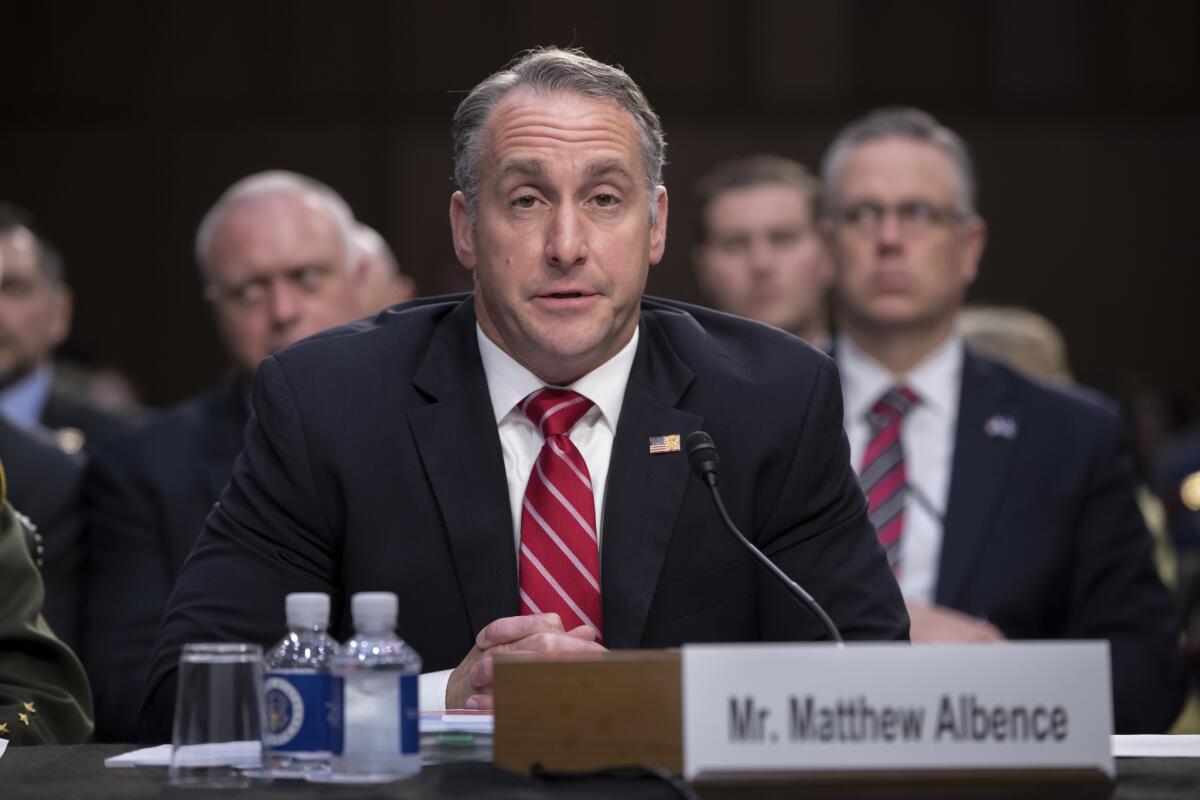
One of Immigration and Customs Enforcement’s top executives, Matthew Albence, appeared before the Senate Judiciary Committee on Tuesday morning and described facilities for housing detained families in the country without permission as “more like a summer camp” than a place of incarceration.
Immigration advocates, lawsuits and news stories say otherwise.
According to a report from the Marshall Project, an independent nonprofit news site that covers criminal justice issues, there have been persistent allegations of insufficient medical attention, routinized bed checks several times a night that awaken parents and children, and sexual abuse.
Makes you wonder what kind of summer camps Albence went to as a kid.
It’s not just the family centers. On Monday, U.S. District Judge Dolly Gee ordered the nonprofit Shiloh Treatment Center in Texas that houses migrant children separated from their parents to stop dosing the children with psychotropic drugs such as Prozac unless they get consent. Gee also ordered children to be removed from the secure facility unless a psychologist or psychiatrist finds that the child “poses a risk of harm to self or others.”
The same judge last week said she wants a special monitor to oversee conditions at children’s detention centers to resolve striking differences between the government and detained immigrants in their descriptions of the quality of the facilities.
Everything is hunky-dory, says the government, while the detainees and their advocates report spoiled food and foul-smelling water, lack of toiletry items and blankets.
Remember, folks in immigration detention generally are fighting efforts in civil immigration courts to deport them and have not been convicted of a crime. If what the detainees are reporting is true, that sort of treatment would be unsupportable even in a regular jail. It’s all the more objectionable in immigration detention centers, given the nature and reasons for the incarceration.
‘Medicare for All’ isn’t the perfect healthcare fix. It isn’t the root of all evil either
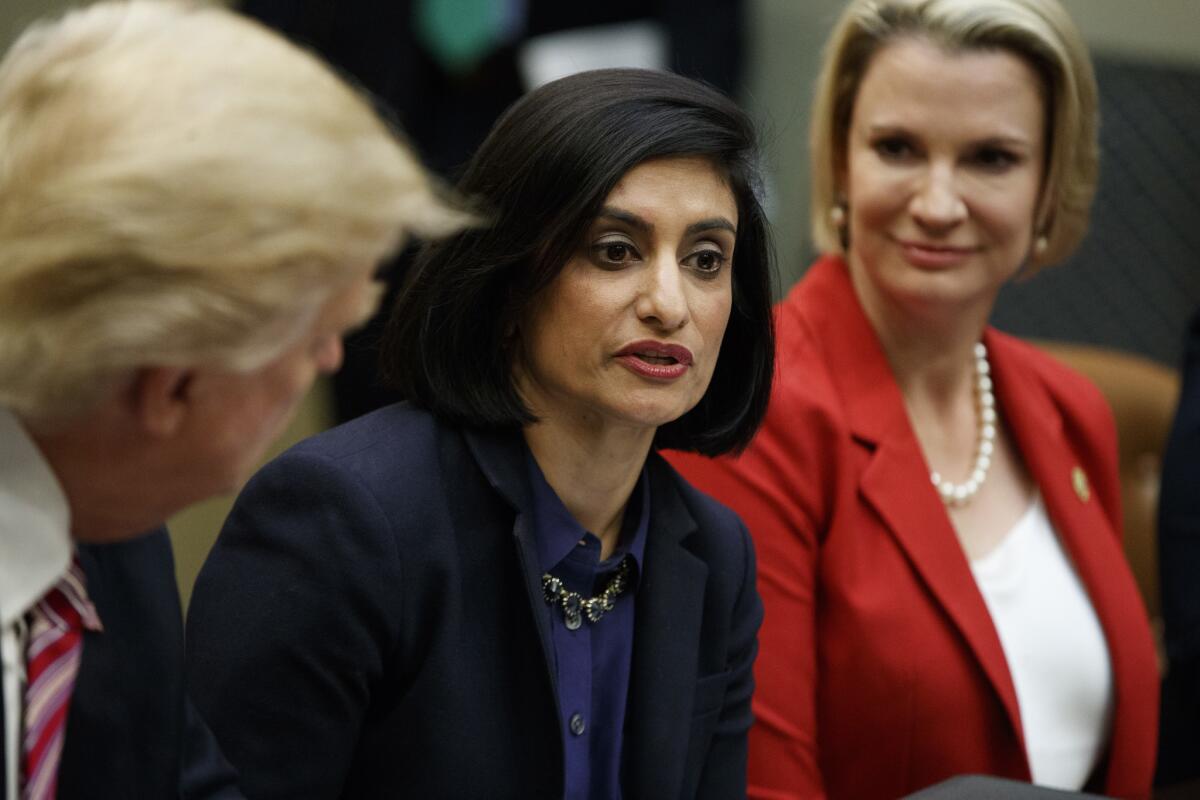
Charles Blahous, a conservative number-cruncher with an abiding skepticism about entitlement programs, grabbed dueling headlines Monday with a paper on the cost of “Medicare for All,” the single-payer health insurance proposal championed by Sen. Bernie Sanders (I-Vt.).
Blahous, senior research strategist at the right-leaning Mercatus Center at George Mason University, projected that enrolling all Americans in Medicare would increase federal spending by almost $33 trillion over 10 years once it’s fully implemented. That’s an average of $3.3 trillion a year, which amounts to 75% of the total federal budget for the coming fiscal year. According to Blahous, by the 10th year, the increase in spending alone would consume almost 13% of the U.S. economy.
Hoo boy.
But as some left-of-center writers gleefully pointed out, Blahous projects that Medicare for All would actually cut Americans’ total spending on healthcare by $2 trillion over the same period. In other words, Americans would spend more on taxes, but we as a nation would still come out ahead because considerably less would be spent by individuals and businesses on insurance premiums, out-of-pocket costs and other expenses associated with the current system.
The latter group assumes that the shift will be a boon to all Americans because the savings will flow to us equally, or at least proportionately. You wouldn’t mind having an extra $400 withheld from each paycheck for Uncle Sam if you no longer have $320 withheld for your insurance premiums, and your employer no longer has to spend $110 of your compensation on health benefits.
In truth, there’s no guarantee that the cost and savings will be distributed that way. If it’s done purely through the income tax, higher-income Americans will pick up the lion’s share of the tab (OK, most people wouldn’t mind that). And there’s no guarantee employers would pass their savings on to workers instead of letting them flow to the bottom line.
More to the point, Blahous doesn’t seem to address the effect that Medicare for All might have on the efforts to rein in the program’s costs per subscriber. Those costs have grown slower than private insurance premiums, albeit faster than the economy and inflation.
There would almost certainly be a one-time benefit to a single payer system in the form of lower administrative costs. Yet simply shifting from private insurers to a public insurer won’t, by itself, slow cost growth — that’s not coming from rising insurer profits or overhead, but from the growing price tag for medical procedures and prescription drugs. And today, the prices Medicare pays for those procedures and drugs are based largely on the providers’ costs, which is hardly an effective way to control spending.
So one lingering question is, would it be easier to control costs if everyone were covered by Medicare? And just as important, would the public embrace the steps taken to cut costs — price caps, for example, or longer delays for non-life-saving care, or tighter restrictions on the sorts of care and drugs that Medicare covered — or would they see the cure as worse than the disease?
Seema Verma, administrator of the federal Centers for Medicare and Medicaid Services, gave a resounding “no” to the first question when she spoke to the Commonwealth Club of California last week. “We have just discussed here today the challenges that Medicare faces in serving the nation’s seniors, the misaligned financial systems that are driving up costs, and the bureaucratic hurdles faced by doctors and hospitals,” she told attendees. “Putting millions more Americans on Medicare will undermine healthcare for the very demographic the program is designed to assist.”
Her view, though, is skewed by her antipathy toward the Medicaid expansion Congress included in the Affordable Care Act. To persuade states to extend care to more impoverished people, including able-bodied adults without children, lawmakers had the federal government cover a much higher share of the cost of the new enrollees than Medicaid’s traditional beneficiaries: poor pregnant women, families with young children and disabled people. That funding disparity, Verma argued, led states to shift funds and attention away from the neediest Americans.
But that’s a function of state politics and the peculiarities of the ACA’s funding scheme. Whether Medicare for All would be a multi-trillion-dollar money pit or a more economical way to provide insurance coverage depends on whether Washington has the political will to shift a huge amount of spending from private and corporate budgets onto the federal one, and then to take tougher steps to limit the growth of costs than Medicare has been willing to take to date.
It doesn’t matter if collusion is a crime. All that matters is how the House reacts
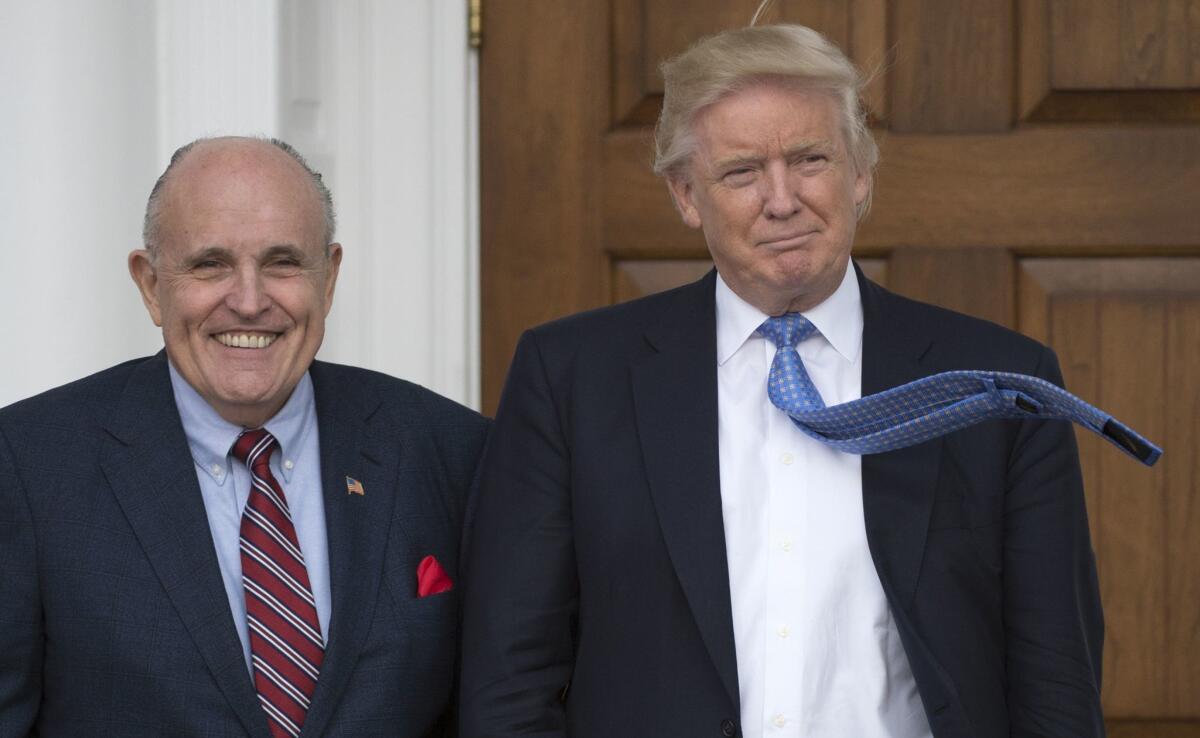
It’s a time-honored practice by defense lawyers to insist that their clients didn’t do what they’re accused of doing, but then to add that even if they did, it wasn’t a crime. The latter almost sounds like an admission of guilt, but it’s really just a fallback plan in case the evidence against their client proves to be strong.
Which is why eyebrows shot up when President Trump’s current lawyer, former federal prosecutor and ex-New York Mayor Rudy Giuliani, told CNN on Monday that “I don’t even know if that’s a crime, colluding about Russians.”
Prior to that interview, the Trump team had unequivocally denied that any collusion had occurred between the Trump campaign and agents of the Russian government. Going from “no collusion” to “collusion is not a crime” is quite a shift.
On Tuesday, Trump took a more classic kitchen-sink approach, embracing the new argument while reiterating the old one.
Trump then went back to bashing the media and threatening to shut down the government to get Congress to pass tougher border security laws. “A Government Shutdown is a very small price to pay for a safe and Prosperous America!” he intoned, although aides told reporters that the president was willing to hold off until after the midterms. Evidently, risking GOP control of the House and Senate would be too high a price to pay for “a safe and Prosperous America.”
But I digress.
As far as the president is concerned, it may not really matter whether it’s technically a crime for his campaign to have colluded with a hostile foreign power en route to the White House. The Justice Department has long taken the position that a president can’t even be charged with a crime while in office.
The Constitution offers a single way to sanction a president, and that’s impeachment, which the House of Representatives can do in cases of “treason, bribery and other high crimes and misdemeanors.” Only treason is defined, though, so really, the universe of impeachable offenses is as large or small as the House majority decides.
Right now, with the Republican Party completely in thrall of Trump, that universe is looking microscopic. So Giuliani’s legalistic arguments don’t matter. The only thing that could matter is a revelation so shocking that it severs the as-yet-unbreakable bond between Trump and his base — the bond that keeps House Republicans from paying more than lip service to the problem of Russian meddling in U.S. elections.
The trial that began Tuesday of former Trump campaign manager Paul Manafort — the first person charged by special counsel Robert S. Mueller III to reach this stage — isn’t likely to deliver any such revelation. Manafort, after all, is charged with financial crimes unrelated to the campaign.
Meanwhile, Facebook added a bit more fuel to the Russian meddling fire Tuesday, announcing that it had removed 32 pages and accounts for “coordinated inauthentic behavior” — in other words, for peddling honest-to-goodness fake news. Here’s an example:
Facebook said it could not identify who was behind the groups and pages; the parties responsible used a variety of means to cover their tracks. Nevertheless, the company found evidence linking at least some of the pages and groups to the Russian organization responsible for the efforts to meddle in the 2016 election.
The company’s announcement buttresses the statements by administration officials — but briefly questioned by Trump — that Russia is still a threat to the democratic process here. Yet the examples Facebook provided are more anti-Trump than pro-Trump. As with much of the earlier efforts by Russians, the goal seems to be to ramp up grievance politics and disunity.
In other words, the point seems to be to weaken the United States as a model for the rest of the world and a player on the global stage. That’s a threat to both parties, not just to Trump.
Should the government ban software for making deadly, untraceable guns with 3-D printers? No, actually
There have been some skirmishes in federal courts recently over efforts by a Texas pro-gun zealot to let people download software instructions that will direct a 3-D printer to create an untraceable gun. It’s a dangerously bad idea, but unfortunately, the man — Cody Wilson, who runs the nonprofit Defense Distributed — is perfectly within his rights, as the Times editorial board explained three years ago.
What? The pro-gun control Los Angeles Times siding with the gun nuts? Well, yeah, in this case, because what’s at stake is not the 2nd Amendment covering gun rights, but the 1st Amendment covering free speech. We reach dangerous ground when we let the government — federal, state or local — tell people what information they can and can’t share over the internet.
The issue first surfaced in 2013 when the State Department went after Wilson, arguing that making the computer programming available globally via the internet put him afoul of U.S. laws on gun exports. But that was an overreach. Wilson wasn’t shipping weapons, he was sharing information — specifically, computer code, which courts have held is speech.
After quietly reaching an agreement with the government last month, Wilson began making his plans available over the weekend as states began lining up against him — California Atty. Gen. Xavier Becerra joined a group of 20 state attorneys general asking the federal government to undo what it described as “a recent abrupt change in policy.” One state, Pennsylvania, managed to extract a temporary halt of downloads there under an agreement with Wilson as he fights legal action by the state.
This is what The Times wrote about the issue in 2015:
“The issue here is not gun ownership. It is the ability of an individual to say what he wants on the internet, the modern-day version of the Revolutionary-era pamphlet. Granted, the advent of the internet has significantly broadened an individual’s audience to, potentially, the entire world. But speech is speech, and the government’s efforts to limit Wilson is wrong.
“If the government thinks creating plastic guns on home 3-D printers is a bad idea — as we do — the solution isn’t to stifle the knowledge but to regulate the product. Yet there the government has a different problem. Under current federal law, individuals are allowed (in most cases) to make their own guns as long as they don’t sell them.
“Ultimately, the government ought to lose this case and Wilson ought to be able to post whatever he wants online. If it is in society’s interest to not have people printing out guns in their dens, then Congress should address that as part of a more robust regimen of gun control.”
The problem is that federal laws allow individuals to make their own firearms. And with Wilson’s programming and a 3-D printer, anyone will be able to do just that — democratizing, in a sense, the ability to make a gun.
That’s a dangerous situation, and laws ought to be adopted swiftly to combat it. Of course, it’s not likely that the Republican-led and NRA-dominated Congress will do anything, but that doesn’t mean Wilson’s 1st Amendment rights should fall victim.
Like most of his rage tweets, Trump’s threat to shut down the government is empty

We’re learning a lot about the inner workings of the White House from President Trump.
As it turns out, not only is there a nuclear button — and it’s bigger than the one in North Korean leader Kim Jong Un’s hands — there’s also an on-off switch for the federal bureaucracy.
In other words, if Congress doesn’t pass an immigration bill, click! The switch gets flipped, and all non-essential government workers are sent home temporarily without pay.
Except it doesn’t work like that.
Under the Constitution, the president is obligated to follow Congress’ dictates for how to spend federal dollars (provided those dictates are legal), which means keeping government agencies open as long as lawmakers have appropriated money for them — typically, through annual spending bills signed by the president. When shutdowns happen, as they did over a weekend in January and for 16 days in October 2013, it’s because Republicans or Democrats are fighting, either with each other in Congress or with the White House, over how those dollars are to be used. This year it was Democrats trying to force Congress to provide legal status for “Dreamers.” In 2013, it was Republicans trying to end funding for key Obamacare programs.
The president obviously plays a role in those fights, and in the past presidents have triggered shutdowns because Congress, under the control of the opposite party, sent them spending bills they did not like (see: Bill Clinton in 1995 and 1996, or Ronald Reagan throughout his presidency). Jimmy Carter even triggered a 17-day shutdown in 1978 over a defense appropriations bill sent to him by a Congress controlled by his own Democratic Party.
The border wall is a funding issue, that’s true. But the rest of the items Trump demanded are not — they’re about reworking federal immigration law. And under Senate rules, such matters cannot be included in the annual spending bills.
Granted, that prohibition has plenty of loopholes, including one for language that bars the administration from spending money on specific pursuits (e.g., forbidding any federal dollars from being spent on abortion). But replacing an immigration system that favors family reunification for one that rates would-be immigrants according to their earnings potential? That sort of thing would require separate, standalone legislation.
And therein lies Trump’s problem. The greatest support for his vision of the future American population is in the GOP-controlled House, where Democrats’ votes are all but immaterial. And in fact, the House voted on two Trump-approved immigration bills last month, defeating them both as dozens of Republicans voted “no.”
He can blame Democrats until the cows come home, but the Senate — the only chamber where the Democratic minority has any clout, thanks to the filibuster — is the one that has passed meaningful immigration legislation that would increase border security and offer a comprehensive fix to other problems in the system. That’s because in the Senate, Republicans and Democrats have figured out how to reach compromise on this issue. In the House, Republicans haven’t figured out how to strike a deal with Republicans.
Thus, as with so many of Trump’s tweets, his latest shutdown threat is an empty one. But Congress wasn’t really the target for his message — when Trump tweets, he’s mainly talking to his base. And as the latest Gallup numbers show, the public is growing more concerned about immigration.
When asked by Gallup pollsters what “the most important problem facing the country today” is, the largest group — 22% — said immigration or “illegal aliens.” The number has climbed steadily since March, when it was only 9%.
One likely explanation is the outrage surrounding family separations at the border. If so, that’s not necessarily a good sign for Trump, given the widespread, bipartisan dislike for the separations policy.
Nor does the public like government shutdowns. And people tend to assign blame astutely, holding the party that instigates the shutdown responsible — not the party that refuses to comply with the hostage-taker’s demands.
New York City’s proposal to cap Uber and Lyft is more proof cities aren’t ready for transportation innovation

New York City may become the first major city in the nation to cap the number of Uber, Lyft and other ride-hailing drivers operating on public streets.
The City Council is considering a proposal that would halt the issuance of most new for-hire vehicle licenses while the city conducts a yearlong study of the industry, according to the New York Times. The council may also limit the number of vehicles operating in an area and could decline to renew a permit if a “need” for service isn’t demonstrated, the Verge reported.
Critics say the city has to crack down because ride-hail vehicles are clogging the streets — there are now 100,000 for-hire vehicles licensed in the city, up from 40,000 in 2011 — as well as siphoning riders from public transit and depressing incomes for taxi and livery drivers. Mayor Bill de Blasio tried unsuccessfully to cap the number of Ubers on NYC streets in 2015.
New York’s move to limit ride-hailing services comes as more cities are choosing to ban or restrict newly arrived electric scooters and bike shares. As is often the case, it’s easier for politicians to restrict the newcomer than fix the conditions that gave rise to the newcomer in the first place.
That is, ride-hailing services became popular in New York City as the public transit system became increasingly unreliable and taxis remained expensive and sometimes in short supply. Capping the number of Ubers and Lyfts on the road won’t fix those fundamental problems. It just gives people fewer options to get around.
Likewise, scooters and bike shares are becoming popular because they offer a fast, cheap and fun way to travel short distances without a car. They’re filling a need that public transit doesn’t serve well.
Some cities have reined in bikes and scooters because of complaints that irresponsible riders careen down sidewalks and discard their rides willy-nilly in the public right of way. Well, perhaps more people would ride in the street if they felt safe and protected from cars. And they might properly stow shared scooters and bikes if there were more bike racks and “parking spaces” in the public right of way.
The point is that streets are not designed to safely accommodate bikes and scooters. Rather than moving quickly to fix that problem, cities are choosing to restrict these modes of transportation. Again, that gives people fewer options to get around.
This isn’t to say that regulation is always bad or that Uber drivers, Bird scooter riders and the like should be allowed to run roughshod over the public space. But cities shouldn’t scapegoat new transportation innovations for problems that have been decades in the making.
Think humanity is wreaking havoc on land? The damage we’ve done to the ocean is even more widespread
It doesn’t take much of a science background to recognize that human activity has made a significant impact on the natural state of the world. But a new study measures that impact in an unseen area: the world’s oceans. And it’s not good news.
According to a study reported in Current Biology, only 13% of the oceans can be considered marine wilderness, compared with about 20% of the dry land globally that falls into the wilderness category (and that percentage is dwindling quickly). The study is the first effort to map global marine wilderness areas.
The researchers defined marine wilderness as areas “devoid of intense human impacts,” and said the remaining marine wilderness areas are in the Arctic, Antarctic and around remote Pacific islands.
The researchers measured 19 human stressors — from shipping to fishing to fertilizer runoff — and their impacts on the oceans.
“We were astonished by just how little marine wilderness remains,” said researcher Kendall Jones of the University of Queensland, Australia, and the Wildlife Conservation Society. “The ocean is immense, covering over 70% of our planet, but we’ve managed to significantly impact almost all of this vast ecosystem.”
Worse, only 5% of the remaining wilderness lies in jurisdictions with environmental protection laws in place, so most of it is at risk of further diminution. And the advent of global warming, which brings warmer seas, shifting current, and more acidic water, adds more risk for ocean life both in and outside the struggling wilderness areas.
Why does it matter? Wilderness areas are crucial for maintaining biodiversity, and we destroy them — on land and in water — at our own peril.
A little perspective on our surging GDP — Obama hit these numbers three times
As a candidate in 2016, Donald Trump promised that economic growth would rise to 4% or more if he were elected. On Friday, the Bureau of Economic Analysis reported that the economy may finally have finally complied.
According to the bureau’s preliminary estimate, the U.S. gross domestic product increased 4.1% (adjusted for inflation) in the months of April through June. That’s up from 2.2% in the first three months of the year, and 2.8% in 2017.
Naturally, the president and administration officials credited Trump policies for the boffo numbers. And there’s certainly a connection.
The tax cuts he signed into law in December, which have pushed corporate tax payments to a near record low as a percentage of the economy, have no doubt contributed to the increase in business investment in buildings and equipment (although the increase was greater in the first quarter of 2018 than the second).
Also, goods exports surged more than 13% in the second quarter, the highest amount since late 2013. One factor appears to be the trade war the Trump administration launched with China and other major industrialized nations when it imposed stiff tariffs on steel and aluminum in early June. China, the European Union, Canada and other U.S. trading partners have promised to impose retaliatory levies on a slew of U.S. goods, so foreign buyers may have accelerated their imports from the U.S. to avoid those tariffs.
A third factor is strong growth in U.S. consumer spending, especially on durable goods. We’re saving less and spending more, which Americans typically do when unemployment is low and they’re feeling good about their own prospects. That’s not the healthiest practice, particularly for a population that’s graying. But it’s how we roll.
Trump, who relentlessly reminds Americans how great the economy has been since he took office, has helped feed consumer confidence. But truth be told, consumers’ outlook has been improving more or less steadily since the end of the last recession.
Even the crankiest of Democrats will have to admit that 4.1% GDP growth is good news. Faster growth is a tonic for much of what ails this country — it can help reduce the budget deficit (that is, if Republicans ever stop cutting taxes), shore up Social Security and Medicare, narrow income inequality and expand opportunity. It’s all good!
But here are a few other GDP numbers worth remembering: 4.6%, 4.9% and 5.1%. Those were the growth rates notched during President Obama’s tenure (in late 2011, the third quarter of 2014 and the second quarter of 2014, respectively). And no one’s celebrating how great the economy was in the Obama years.
Growth needs to be sustainable. The pattern in the Obama years was one or two solid quarters followed by one or two disappointing ones, at least in part because Congress couldn’t agree on fiscal policies that would have spurred growth.
Trump faces a different set of headwinds. The tax cuts opened the throttle so wide on the U.S. economy, the Federal Reserve may raise short-term interest rates faster and higher just to keep inflation in check. And the burgeoning trade war is raising costs for businesses and consumers, while also making it harder for U.S. exporters to compete overseas. That’s a problem of Trump’s own making.
The data for this quarter are encouraging. But hold the champagne until we find out what the next few quarters look like.
Whom do you believe, Michael Cohen or Donald Trump? Yes, that’s a rhetorical question
This is the corner President Trump has painted himself into: He lies with such abandon that nothing he says can be taken at face value. And that includes his denial Friday morning that he knew ahead of time about a meeting between a group of campaign advisors (including his son Donald Jr.) and Russians whom his son thought were peddling dirt on Democratic presidential candidate Hillary Clinton.
CNN reported Thursday night that Michael Cohen, Trump’s longtime lawyer and fixer, is ready to tell special counsel Robert S. Mueller III’s team that he was present at a meeting during which Trump Jr. told his father about the upcoming meeting, and that Trump approved. Trump and his circle have denied that the then-candidate knew anything about the meeting until well after the fact.
Whether Cohen is indeed ready to spill that nugget to Mueller remains to be seen — there is so much smoke and confusion around Trump and the investigation that the safest course when such revelations first surface is to wait and see if corroboration occurs.
But the president didn’t wait. He tweeted this morning:
That’s where the biggest problem arises. The president tells so many lies that he has no credibility left. He’s like the boy who cried wolf. In fact, whenever you see a blustery tweet from the president, chances are the truth is the opposite of what he says.
Does Cohen have credibility? That also remains to be seen. But if Cohen does indeed tell Mueller’s team that he was present and heard the president approve the meeting with the Russians, that would be more credible than anything the president says, because lying to Mueller would expose Cohen to more potential charges than he already faces.
But the fundamental element remains: We have a president whose every utterance is presumptively a lie.
UPDATE (9:38 a.m.): This story was updated to give CNN credit for the initial report on Cohen.
Santa Barbara wants to lock up straw users? That’d be outrageous, if it were actually true

Two things seem to get the conservative media riled up like nothing else: laws that force people and businesses to stop polluting, and pretty much anything that liberal California does. When those two things come together, as with the state’s growing plastic straw crackdown, it’s like catnip for the national right-wing media. They just can’t help but go a little nuts.
Witness the overwrought response to an effort by Santa Barbara to adopt a wide-ranging law limiting on single-use plastic takeout ware — to-go cups and containers, forks, knives, stirrers and straws. “California city OKs jail time for defying plastic straw ban,” read the FoxNews.com headline, and many like it from outlets across the nation.
What? Straw police?
And this:
One National Review writer wrote, “Oh, and each individual straw counts as a separate infraction, meaning that if someone got busted handing out straws to a table of four people, he or she could end up facing years behind bars.”
Well now, that would be a gross misapplication of justice. But c’mon, this is just silly and wrong.
For one thing, the Santa Barbara City Council did not adopt the straw ban as some news outlets reported, at least not yet. On Tuesday the council considered final approval of two related single-use plastic ordinances. The first one, for polystyrene takeout containers and cups, passed easily (and, frankly, it is a much bigger environmental deal than straws). But the council wasn’t satisfied with a second ordinance regulating straws, cutlery and stirrers, so it sent the measure back to a committee for “further refinement.”
The jail angle is overblown as well. The ordinance (both of them actually) don’t explicitly mention punishment, but refer to the penalty section of the city code that cites fines and the possibility of up to six months in jail for violations. This kind of language is common for municipal codes. In fact, you may be surprised that a number of seemingly minor things, such as violating trash ordinances or building codes, are subject to similar punishment in extreme situations. The point is not to fill jails with people who unknowingly break the law by dumping their couch on the sidewalk, but to reserve the right for cities to go after serial scofflaws like the contractor who regularly dumps debris in residential alleys rather than paying to take it to the landfill.
In any case, the ordinance regarding straws is expected to return for a council vote in September. And after a kerfuffle that had even People magazine calling for comment, I suspect city officials will take pains to assure the public that Santa Barbara isn’t going to lock up people who find themselves on the wrong side of the straw law.
What is a shadow ban, and why does Trump think it’s happening to Republicans?

For a group that loves to make fun of triggered oppressed snowflakes, no one has a bigger victim complex these days than people affiliated with the party that controls all three branches of federal government.
President Trump took to Twitter on Thursday morning for his regularly scheduled airing of grievances. In a refreshing change of pace, it was a meta-grievance with Twitter itself.
Employing his signature all-caps-because-I-really-mean-it style, Trump wrote:
A “shadow ban” is a way of decreasing someone’s presence on a social media site without banning them outright. In practice, it’s when a person’s posts on a social media site are deprioritized in other people’s feeds, or when the person’s account is difficult or impossible for other users to find.
Just a few minor issues with Trump’s claims: Twitter hasn’t issued politically motivated shadow bans, and it wouldn’t be illegal or legally discriminatory if it had.
This is far from the first time a conservative has complained about his or her treatment on a social media platform — the “shadow ban” allegations are part of a larger pattern of right-wingers claiming victimhood at the hands of supposedly left-leaning tech companies.
Vice News published an article Wednesday claiming “prominent Republicans” were being shadow banned because their Twitter handles weren’t auto-completing in the search bar. (This would not be the first time Twitter’s auto-complete function has caused problems for people.) Vice said the same thing wasn’t happening to left-leaning accounts, though Huffington Post’s Ashley Feinberg tweeted screenshots indicating that it was.
There is quite a bit of irony in Trump complaining about unfair treatment on Twitter. No offense to the spokesperson for the president’s son (Quick: Without Googling, what is this allegedly prominent Republican’s name?), but if Twitter really were trying to decrease the reach of big-time right-wingers, wouldn’t it start with … Donald Trump?
Twitter responded on Thursday with a far less nefarious explanation: It was a bug. It didn’t affect only Republicans, and if you search for (again, allegedly prominent) Republicans Ronna McDaniel or Matt Gaetz, their handles will auto-complete correctly.
Alex Jones routinely claims he’s shadow banned from Facebook, even though his videos regularly rack up tens of thousands of views. (Four of his videos were deleted from YouTube on Thursday for violating community guidelines, and he’s been suspended from livestreaming there for three months, but those things don’t constitute any kind of “shadow ban” because they were done outright.)
Anyway, despite Trump’s allegation, this is not discrimination in the legal sense. Political beliefs are not a protected class under U.S. law. A business such as Twitter can’t legally discriminate against you because of the color of your skin, your religion or your sex, but your political leanings are fair game. Just this year, a judge ruled that it does not constitute discrimination if a bar kicks you out for wearing a MAGA hat.
It also would not be illegal for Twitter to do this. When you agree to use Twitter, you agree to the terms of service, which state:
“We may stop (permanently or temporarily) providing the Services or any features within the Services to you or to users generally. We also retain the right to create limits on use and storage at our sole discretion at any time. We may also remove or refuse to distribute any Content on the Services, suspend or terminate users, and reclaim usernames without liability to you.”
It’s a right Twitter has exercised in the past: Roger Stone and Milo Yiannopoulos have both been permanently banned from Twitter. Back in October, Stone said he’d sue the site into oblivion for its role in the “systematic effort by the tech left to censor and silence conservative voices.” In January, he and Yiannopoulos announced they were lawyering up to file a joint suit. No suit was ever filed.
If conservatives feel like they’re being treated unfairly by any business because of their beliefs, they are more than welcome to stop using those services. Conservative-friendly alternatives such as Gab have sprung up, but for some reason, none have taken off.
If you really believe Twitter is executing a shadowy crackdown on conservative beliefs, Republicans, feel free to finally take a piece of advice from Hillary Clinton: Delete your account.
What ideas will the absurd ‘impeach Rosenstein’ push give Trump?
On Wednesday, 11 House Republicans, led by Freedom Caucus hysterics Reps. Mark Meadows (R-N.C.) and Jim Jordan (R-Ohio), filed articles of impeachment against Deputy Atty. Gen. Rod J. Rosenstein.
It’s likely that this outrageous idea isn’t going anywhere. Still, it’s an alarming escalation of the attempt by President Trump’s loyalists in Congress to undermine the man who oversees the investigation of possible collusion between the 2016 Trump campaign and Russia (or the WITCH HUNT, as Trump refers to it). And it could give the president ideas.
The articles of impeachment are a grab bag of allegations ranging from a lack of responsiveness to congressional document requests to a bogus conflict of interest on Rosenstein’s part to familiar complaints about the surveillance of former Trump advisor Carter Page. There’s even an allegation that “the Department of Justice, under the supervision of Mr. Rosenstein, unnecessarily redacted the price of FBI Deputy Director Andrew McCabe’s $70,000 conference table because it was potentially embarrassing information.” Talk about “high crimes and misdemeanors”!
The Meadows-Jordan proposal wasn’t offered as a “privileged” resolution, meaning that it could languish in committee for months (although Meadows warned that he might later try to fast-track it).
Equally important, it lacks the support of House Speaker Paul D. Ryan (whom Politico quoted Thursday saying, “I don’t think this rises to the level of high crimes and misdemeanors”) and Rep. Trey Gowdy (R-S.C.) the influential chairman of the House Oversight Committee. Gowdy said the House was making progress in obtaining documents it has sought from the Justice Department. “I’m not a big fan of drama,” he said. “I’d like the documents.”
But the drama of even a futile impeachment attempt could have another consequence: emboldening Trump to try to remove Rosenstein, who supervises special counsel Robert S. Mueller III’s Russia investigation.
Trump long has seethed over Rosenstein’s appointment of Mueller — and the recusal from Russia matters by Atty. Gen. Jeff Sessions that made it possible. In May, the president took to Twitter to complain about the Justice Department’s supposed reluctance to provide documents to Congress and to warn: “At some point I will have no choice but to use the powers granted to the presidency and get involved!”
It’s not enough for Republican leaders such as Ryan and Gowdy to treat the impeachment resolution with malign neglect. They need to make it clear to Trump that it changes nothing about the risks for him in Congress and the country if he decides to “get involved” by moving against Rosenstein or Mueller.
Take it from Putin: Trump opposes the annexation of Crimea

When Secretary of State Michael R. Pompeo appeared before the Senate Foreign Relations Committee on Wednesday, some senators seemed skeptical — who wouldn’t be? — that the hard line he was laying down on policy toward Russia was shared by President Trump.
Sen. Bob Corker of Tennessee, the Republican chairman of the committee, told Pompeo that after Trump’s meeting with Vladimir Putin in Helsinki, Finland, “we saw an American president who appeared submissive and deferential.”
Pompeo also was questioned about what Putin and Trump discussed in their one-on-one meeting. “We don’t know what the truth is, because nobody else was in the room when it happened,” complained Sen. Robert Menendez of New Jersey, the panel’s ranking Democrat.
Pompeo assured the committee that Trump is “well aware of the challenges that Russia poses” and has taken “a staggering number of actions to protect our interests.”
He also referred senators to a statement released by the State Department on Wednesday reiterating that the United States doesn’t recognize Russia’s 2014 annexation of Crimea and that it was “in contravention of international law.”
The problem with these reassurances, of course, is that Pompeo and other Trump advisors often seem more committed to opposing Russia than the president they serve. There were reports that, in a conversation at the G7 summit in Quebec in June, Trump had suggested Crimea was Russian because most people living there speak the Russian language.
But there is testimony to the effect that Trump stuck by the U.S. position on Crimea in talks with Putin. And it comes from Putin himself.
In his statement at the now famous joint press conference in Helsinki, Putin said that the “posture of President Trump on Crimea is well-known, and he stands firmly by it. He continued to maintain that it was illegal to annex it.” (Putin added: “Our viewpoint is different. We held a referendum in strict compliance with the U.N. charter and the international legislation.”)
There remains a lot of rhetorical daylight between Trump and other members of the administration on Russia — especially when it comes to Russian interference in the 2016 election. (Pompeo told the committee that Trump “has a complete and proper understanding of what happened.”)
But on Crimea, Trump and Pompeo are on the same page — at least according to Putin. And Putin has even more of a credibility problem than Trump.
What kind of lawyer is Michael Cohen? The kind smart enough to record his conversations with Donald Trump

Cash or check? Who cares?
The Trump team is pushing back against an audio recording obtained by CNN of a conversation between then-candidate Donald J. Trump and his lawyer at the time, Michael Cohen, about Karen McDougal, in September 2016. The conversation is elliptical and muddled at times, but Cohen can be heard bringing Trump up to speed on his efforts to set up a corporation to acquire “all of that info regarding our friend David” — presumably a reference to David Picker, the owner of the National Enquirer, who’d bought the rights to McDougal’s life story for $150,000 the previous month.
That life story includes McDougal’s claim that she and Trump had a 10-month affair that began in 2006, not long after his wife Melania gave birth to their son. Hence Cohen’s involvement.
The audio on the tape is clear on at least one other point: Cohen told Trump that “we’ll have to pay” to obtain the aforementioned info. But then the conversation becomes harder to follow, and it’s not clear whether Trump is calling for the payment to be made in cash. That’s a significant issue, at least to some critics, because paying in cash implies a wish for concealment.
Trump’s current lawyer, former New York Mayor Rudy Giuliani, has told several media outlets that Trump definitely did not want the transaction to be conducted in cash. On Fox News on Tuesday night, Giuliani said: “There’s no way the president is going to be talking about setting up a corporation and then using cash. Unless you’re a complete idiot, and the president’s not an idiot.”
Glad we cleared that up.
But here’s the thing. Regardless of how the effort was financed, Trump and Cohen still discussed a plan to buy the silence of an alleged mistress two months before the election to protect his candidacy. At that point, the infamous “Access Hollywood” “grab ’em” tape had not yet been released, so Trump’s appeal to social conservatives had yet to be put to the test. (It has proved to be astoundingly resilient.) So Trump had a good reason to want to keep McDougal’s claims out of the 24-hour cable news cycle.
Giuliani also says that Cohen’s recording cuts off important “exculpatory” comments by Trump, and that the president never paid for the rights to McDougal’s story. They remained with Picker’s company, American Media Inc., until it agreed in April to release McDougal from her contract.
But again, that’s not so helpful to Trump. Granted, had he ponied up $150,000 to buy the rights from American Media, that might have been a form of campaign spending that Trump would have been obligated to report. Even without the payment, though, the tape confirms that Trump and his campaign lied when they said just before the election that they knew nothing about American Media buying the rights to McDougal’s story.
Trump’s supporters have grown used to shrugging off the dissembling from their Tweeter in Chief, who tried Wednesday morning to redirect their outrage at Cohen:
Here’s one possible answer to Trump’s question. The kind of lawyer who would tape a client is the kind of lawyer who represents people known for changing their stories on a whim and throwing their allies under the bus when it suits them.
Is there anything this administration won’t lie about? And that Trump supporters won’t swallow?
When the Commerce Department first floated the idea of adding a citizenship question to the 2020 Census, it couched it in altruistic terms. The most anti-immigrant administration in modern American history, and the most indifferent (to put it mildly) to racial discrimination, said the Justice Department wanted the question added to collect data it could use to better enforce the 1965 Voting Rights Act.
Bull, said critics, including The Times Editorial Board, which described the proffered reasoning as a “dubious explanation.”
Turns out the critics were right. Internal emails that surfaced as part of a lawsuit show that the idea originated with Steve Bannon, the president’s former advisor who had been one of the more hawkish immigration voices in the White House. The emails indicate that Bannon asked Wilbur Ross, the Commerce secretary, in May 2017 to “talk to someone about the Census.” A month later, Ross began pressing for the question to be added.
There are two issues here. The first is that the administration, through subterfuge, wants to inject poison in the decennial census. Asking respondents about their citizenship status will in all likelihood reduce participation within immigrant communities. Though the Census Bureau is barred by law from sharing individual answers for 72 years, people here illegally, or those who house or know people here illegally, are less likely to be truthful in their answers — a government official asking any questions about citizenship will be viewed as a potential threat. The net effect will be skewed data among the answers themselves, and undercounts in immigrant communities as people avoid Census takers altogether.
Not coincidentally, immigrant communities tend to be in urban areas that vote for Democrats. So the Republican administration is cynically trying to undercut its political rivals by reducing the count used to establish the size and boundaries of legislative districts, how many House members a state will have and how much federal aid it will receive, among other things.
Secondly, the emails reveal yet again that this administration embraces an amoral aversion to the truth. It lies so often that Americans have no cause to believe anything that comes out of the White House or top administration officials. It has lied about the reasons for separating families caught crossing the border with Mexico. It has lied about public safety threats from illegal immigration. It has lied about trade deficits. It has lied about voter fraud. It has lied about Americans’ tax burden. It has lied about the costs and effects of the Affordable Care Act.
The administration lies. In fact, despite the cruel personal attacks on critics and rivals, the asinine tax cut bill that exacerbates income inequality and explodes the national debt and the crumbling of an international order of cooperation, the thing that most marks this administration is that it lies repeatedly, reflexively and badly.
None of which bothers Trump’s supporters. That’s our biggest national crisis — a large portion of the electorate willing to swallow lies poses an existential threat to the democracy. Trump isn’t draining the swamp — he’s drowning us in it.
Facebook says it wants to stop ‘fake news.’ It’s off to a rough start
Facebook’s battle against fake news is off to a rocky start. Days after Mark Zuckerberg was publicly flogged for saying Holocaust denialism wouldn’t be removed from the platform, radio host Alex Jones created another PR nightmare for the company by using its platform to say Robert S. Mueller III is involved with pedophilia, before pantomiming shooting him “politically.”
A taste of Jones’ rant:
“Everyone’s so scared of Mueller. They’d let Mueller rape kids in front of people, which he did. I mean, Mueller is a monster, man. God, imagine. He’s even above the pedophiles, though. The word is he doesn’t have sex with kids. He just controls it all.”
And some more craziness:
“That’s a demon I will take down, or die trying. We’re gonna walk out in the square, politically, high noon, and he’s gonna find out what happens when he makes a move. ... He’s gonna make the move and then” — at this point Jones mimes shooting a finger pistol — “it’s not a joke. It’s not a game. It’s the real world. Politically.”
BuzzFeed News reached out to Facebook to find out whether the pedophilia accusations and gun-miming ran afoul of the community standards. Facebook said no, because it wasn’t a “credible statement of intent to commit violence.” How Facebook determines which threats are and are not credible remains unclear.
On Tuesday afternoon, the video abruptly disappeared from Facebook. An email to Facebook asking what happened to it — specifically, whether Facebook changed its mind about community standards or whether Jones opted to remove it — was not immediately returned.
(Update 4:33 p.m.: A spokesperson for Facebook said the community standards had not changed regarding that video, and Facebook did not remove it.)
But even if the site had a change of heart about this particular Alex Jones incident, he’s not the only one racking up Facebook views on questionable content. On another page, an “interview” splicing together a PBS interview to make New York Democratic congressional candidate Alexandria Ocasio-Cortez appear as a bumbling idiot garnered more than a million views on Facebook, raising questions about how the platform should treat things that look like news but definitively are not.
CRTV — the online television branch of Conservative Review, founded by conservative commentator Mark Levin — posted what was presented as an interview between host Allie Stuckey (the self-described “Conservative Millennial” and a “proponent of biblical sass,” whatever that means) and Ocasio-Cortez, a self-described democratic socialist running on an ultra-progressive platform. In reality, the clips of Ocasio-Cortez were borrowed without any sort of attribution from a recent interview on PBS’ “Firing Line.”
Stuckey is wearing the same color dress as the person who interviewed Ocasio-Cortez, and the television screen behind the candidate is edited to say “Allie.” From the Facebook comments on the video, it’s clear people were confused.
In a tweet promoting the interview, CRTV also doesn’t indicate that it’s not a real interview. Same with the tweet from Stuckey herself.
CRTV later edited the post to say “Update: Yes, this is satire created from excerpts of the viral Firing Line interview with Ocasio-Cortez.” And a subsequent CRTV tweet linking to the video calls it, “Hilarious satire!”
Despite the confusion, the video racked up 1.5 million views and more than 20,000 shares on Facebook in less than a day. That would seem to violate what Zuckerberg just said was Facebook’s aim: “Prevent hoaxes from going viral and being widely distributed.”
It can be difficult to divine intent from a post on social media. For instance, whether someone is purposefully trying to mislead people or just making an oversight. Or whether Alex Jones means it when he says he wants to shoot someone, and he’s not joking, it’s the real world, or whether he’s just politically speaking — or, as he claimed later, purposefully trying to bait the media. It’s particularly difficult with openly partisan media organizations such as InfoWars and Conservative Review.
Facebook and Zuckerberg don’t have an easy job: They’ve been accused from people on the left and the right of playing for the other side. No matter where Facebook draws the line, someone will be unhappy. But if this week is any indication, it’s still got some soul-searching to do to find out where that line is.
Trump has managed to turn the ‘law-and-order’ party against the FBI
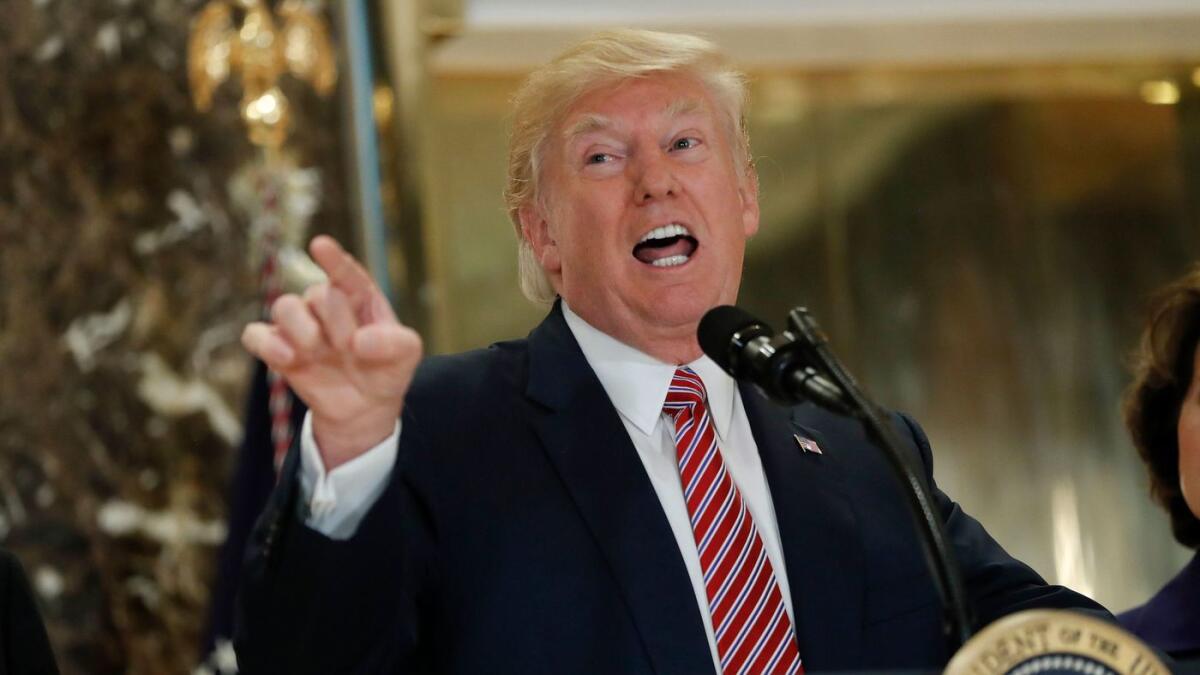
It can be hard sometimes to measure the corrosive effects of President Trump’s continuous assaults on American institutions, from the media to the courts to the government he runs. Discourse has coarsened, facts are ignored and truth is relative.
To quote the band Drive-By Truckers, “We’re standing on the precipice of prejudice and fear / We trust science just as long as it tells us what we want to hear / We want our truths all fair and balanced as long as our notions lie within it.”
A new survey from the Pew Research Center manages to quantify some of the damage. In early 2017, before the president began his attack on the FBI over the Russian election-meddling investigation, 65% of Republicans or independents leaning Republican said they trusted the FBI. Now only 49% say so. That’s an astonishing erosion of support among people who traditionally are solidly in law enforcement’s corner.
The only other government agency to receive less than 50% support from Republicans was the Internal Revenue Service, also at 49%. The only agency viewed unfavorably by Democrats was Immigration and Customs Enforcement. An astoundingly low 20% of Democrats and independents leaning Democratic said they had a favorable opinion of the department charged with tracking down and deporting people living in the country without permission.
But the most sobering part of the survey is the sharp drop in favorable views of the FBI by Trump supporters. It’s remarkable that a political party that traditionally aligns with law and order has soured so much and so quickly on the FBI.
Remember, Trump’s attacks on the FBI routinely are based on twists of the truth or outright lies, yet Republican by and large don’t care. The president’s approval rating among Republicans stood at 82% in a Quinnipiac University poll released Tuesday, compared with an overall approval rating of only 38%.
And his approval rating among white evangelical Christians was at 71% — a remarkable level of support among voters one would expect to be repulsed by revelations of extramarital affairs, hush money paid and public campaigns of ad hominem attacks and insults. Apparently, pursuing a federal bench packed with judges willing to roll back abortion rights is worth a deal with this particular devil.
This is a chillingly bad environment for a democracy whose strength lies in the people’s faith in their government. A body politic that tolerates repeated lies by its elected leaders — and that picks the lies over the institutions — puts itself in a dangerous position. As does a political organization that puts party ahead of country.
As The Times Editorial Board noted more than a year ago, and less than three months into Trump’s first term, “it is impossible to know where his presidency will lead or how much damage he will do to our nation.”
Now we’re learning.
Trump’s latest contribution to the Bizarro World: Putin wants Democrats to win in November

Even when he’s trying to spin the Russia story against his political opponents, President Trump can’t bring himself to acknowledge the reality of what his BFF Vladimir Putin has been doing. En route to the Veterans of Foreign Wars’ national convention (and a fundraiser) in Kansas City, Mo., the president tweeted:
I suspect that a long line of presidents would dispute Trump’s “tougher on Russia” claim, particularly Ronald Reagan. And no matter what Trump tweets today, he can’t erase the words of his Russian presidential counterpart in Helsinki last week.
When asked whether he wanted Trump to win the 2016 election, Putin replied, “Yes, I did. Yes, I did. Because he talked about bringing the U.S.-Russia relationship back to normal.” (Putin apparently ignored the second half of the question, which was whether he directed any Russian officials to help Trump prevail.)
According to the White House transcript of the joint news conference, Putin also said this: “Isn’t it natural to be sympathetic towards a person who is willing to restore the relationship with our country, who wants to work with us?”
So why would Russia be trying to help Democrats take back control of the House and/or the Senate in the midterms? Democrats were just as insistent as congressional Republicans, if not more so, that the United States impose more sanctions on Russia for its meddling in the last election. Congress unanimously passed a bill to do just that over Trump’s opposition; given the veto-proof margin, Trump quietly signed it.
The terminology Trump used is also telling. He didn’t say he was concerned that Russia would “meddle,” “compromise,” “interfere” or “hack” the midterms. Those are the sorts of words the intelligence community and special counsel Robert S. Mueller III have used to describe what Russia did in the 2016 campaign and beyond. Instead, he said he was worried that Russia would be “fighting very hard to have an impact” on the November elections.
Trump is eager to dissipate the lingering Helsinki cloud, but he obviously did not want to lend any support to “the Witch Hunt.” That made this tweet tricky to pull off, and frankly, he flubbed the landing.
Let’s see how many people were shot in America while I was on vacation
Today is my first day back at work after more than two weeks of vacation — my time off started July 4, fittingly enough (a few weeks of independence beginning on Independence Day). The news, of course, doesn’t go on holiday when we do (nor, evidently, do President Trump’s efforts to destabilize everything he comes in contact with).
Now that I’m back, I thought I’d check in with the Gun Violence Archive to see whether gun violence took a holiday too. It didn’t, of course. Our fellow Americans continued to kill themselves and others with abandon, from toddlers shooting siblings to violent criminals killing police officers.
In fact, from July 4 through Sunday night, the Gun Violence Archive recorded at least 1,930 shooting incidents in which at least 730 people died and 1,731 people were wounded. That’s an average of at least 38 people killed and 91 wounded per day. And it doesn’t include most firearm suicides, which rarely get mentioned publicly and so are aren’t picked up by the Gun Violence Archive from daily reports. Instead, it compiles those figures from quarterly and annual government releases.
Notably, the daily dead count is in line with the daily average so far this year of 39, while the wounded since July 4 is far above the year-to-date average of 77. Last year an average of 43 people died each day, and 86 were wounded.
The sick part about this daily body count is how routine it has become. It’s true that violence and gun deaths are down from a generation ago, but our gun violence rates dwarf those of our peer nations. A segment of the population treats access to firearms as though it is of paramount importance — more important than the lives of innocent people.
Since 1968, more Americans have been shot to death (at least 1.5 million) than American soldiers have been killed in wars (1.3 million) since the founding of the country. And instead of doing anything about gun violence and making daily life for Americans safer, political leaders in Washington want to make access to firearms easier.
I think I’m ready for another vacation.
We’re gonna need a bigger freezer. Trump’s trade war is creating a pileup of unsold meat

It doesn’t take a degree in economics to suspect that making something more expensive will put a crimp in its sales. That might not be true for a Ferrari or a Picasso, but it’s certainly the case for a commoditized item that has many potential substitutes.
Like, say, the cuts of beef coming out of U.S. factory farms. Or the chicken breasts. Or the pork chops.
The Wall Street Journal reports that the nascent trade war that President Trump has ignited with the rest of the world is already having an effect on U.S. meat producers. That’s because as the administration slaps tariffs on foreign steel, aluminum and other products, our trading partners are slapping retaliatory tariffs on our top exports, most notably agricultural goods.
According to the Journal, “Federal data, coming as early as Monday, are expected to show a record level of beef, pork, poultry and turkey being stockpiled in U.S. facilities, rising above 2.5 billion pounds, agricultural analysts said.”
One of the success stories for U.S. farm businesses has been their ability to sell globally. That enables them to produce significantly more than Americans can consume. But it’s hard for them to compete overseas when their products are hit with tariffs that raise their prices by 25%.
That explains the growing inventory of unsold meat.
The Trump administration has filed formal complaints with the World Trade Organization about the retaliatory tariffs, which it argues are illegal. But its move comes after at least eight countries challenged the U.S. tariffs on steel and aluminum, contending the administration’s national-security justification was just a pretext. Given that many longtime U.S. allies are major steel and aluminum producers, it’s hard to see how the U.S. persuades the WTO on this one even though its own mills are cutting back.
Regardless, Trump and top administration officials argue that the U.S. can’t lose in the long run because its trade deficit is so huge. And it’s true that we can impose tariffs on hundreds of billions of dollars more in Chinese exports than China can impose on U.S. exports. That doesn’t necessarily mean, however, that the Chinese government is any less willing than the Trump administration to hold its ground and wait for the other side to buckle.
The administration’s posture might seem like a reasonable negotiation gambit from the perspective of the Oval Office. But the picture looks different for those who have meat with a sell-by date stuck in a warehouse because demand has dropped. Trade wars, like shooting wars, have casualties.
Emails show Trump’s efforts to reduce our national monuments are just as cynical as you’d expect
Three months into his reign of error, President Trump ordered a review of more than two dozen national monuments — federal land excluded from various uses — with an eye toward reducing the amount of protected land and loosening the management plans covering what activities would be allowed where. Environmentalists (and The Times editorial board) warned that Interior Secretary Ryan Zinke’s subsequent analysis and recommendations seemed framed more by a desire to increase exploitation of public lands than by a desire to preserve them. And now an errant release of internal emails shows the environmentalists were right.
The Washington Post reports that Interior officials, responding to Freedom of Information Act requests, mistakenly sent journalists and activists thousands of pages of internal emails that reveal government officials cherry-picked data to justify reducing the scope of some monuments while ignoring 99% of 2.7 million public comments against changing the designations. The president ultimately reduced the 1.35 million acre Bears Ears National Monument, designated by President Obama in 2016, by 85%, and the 1.7 million acre Grand-Staircase-Escalante, designated by President Clinton in 1996, by about half. Other proposals are still on the president’s desk, though there has been little indication whether he intends to act on them.
One of the monuments still twisting in the wind is the 113,000-acre Cascade-Siskiyou National Monument on the California-Oregon border (the bulk of the land lies in Oregon). Zinke recommended that the president remove some of the forest lands from the monument so they could be logged, which biologists say would endanger sensitive habitats for Pacific fishers, northern spotted owls and other species.
As the Washington Post reported: “The inadvertently released documents show department officials dismissed some evidence that contradicted the administration’s push to revise national monument designations, which are made under the 1906 American Antiquities Act. Estimates of increased tourism revenue, analyses that existing restrictions had not hurt fishing operators and agency reports that less vandalism occurred as a result of monument designations were all set aside.”
The emails also revealed discussions about what information the department should make public about its decision-making, and provided evidence that some material was redacted because its release would “reveal strategy about the review process” for deciding whether to reduce the size and management plans of the national monuments. In other words, the administration was worried that people would learn the real motives for its actions.
For the most part, the errant email release confirms what many have suspected: that this administration decides that it wants to do something, then tries to figure out a pretext for doing it. With luck, legal challenges will block most if not all of Trump’s designation rollbacks. And if a court allows them to be considered, maybe the emails will help.
With Kim Jong Un now on his nice list, Trump finds a new Twitter enemy in Iran’s Hassan Rouhani
President Trump drew a red line of sorts with Iran on Twitter late Sunday night, echoing the belligerence of his early tweets about North Korea.
Trump was responding to a speech by Iranian President Hassan Rouhani, whose remarks to Iranian diplomats on Sunday were reported (not in shoutcaps) by the Iranian government news agency. And as was the case with North Korea, Rouhani wasn’t threatening unilateral action against the United States — he was telling Trump that there would be a high price to pay if the United States messed with Iran.
Here’s the money quote from Rouhani, per Reuters: “America should know that peace with Iran is the mother of all peace, and war with Iran is the mother of all wars.”
Say that again, Trump responded, and we’ll send you back to the Stone Age. But the chest-thumping trivializes the complexity of the situation.
Two moves, real or threatened, by the Trump administration reportedly are rankling the Iranian government.
The first is its stepped-up efforts to undermine the regime, which has faced large-scale protests over the struggling Iranian economy, among other issues. The second is the administration’s plan to impose sanctions on any country that buys oil from Iran, starting in November.
Iranian officials have been threatening for several weeks to block the Strait of Hormuz — preventing Persian Gulf oil tankers from reaching the rest of the world — if the U.S. carries out its sanctions plan.
This is serious stuff, the kind of thing that prior administrations would have responded to with carefully calibrated statements from its top diplomats or, possibly, a well-crafted response from the president to a question at a press conference. That’s not how Trump rolls, obviously. This guy shoots from the fingertips. Hence the new red(ish) line.
Still, we know from experience to expect no consequences if Rouhani dares to defy Trump’s gag order. Consider what happened with “Little Rocket Man” Kim Jong Un, who got this sort of treatment on Twitter a year before Rouhani. And look at him now! He’s practically as close to Trump as Vladimir Putin.
Make no mistake, the tension between the U.S. and Iran is spiking. Trump is ramping up U.S. pressure on Iran to try to make it agree to a tougher set of restrictions than the Obama administration negotiated alongside other members of the U.N. Security Council. The goal is not just to prevent the country from developing a nuclear weapon, but also to rein in its military adventurism around the Middle East.
But if U.S. sanctions on Iran’s trading partners lead Iran to block the Strait of Hormuz, we’d likely respond with the Navy, which could very well end up in a real shooting war. And who knows what Russia and China do under those circumstances?
This is the backdrop for Trump’s hyperbolic tweet to Rouhani. Maybe Trump was just trying to shift attention away from the lingering questions about his private talk with Putin, or the start of the Paul Manafort trial, or the latest revelations from former Trump fixer Michael Cohen.
Or maybe it’s a signal of just how high the stakes in the face-off with Iran have climbed.
Democrats are on the hunt for Brett Kavanaugh’s paper trail
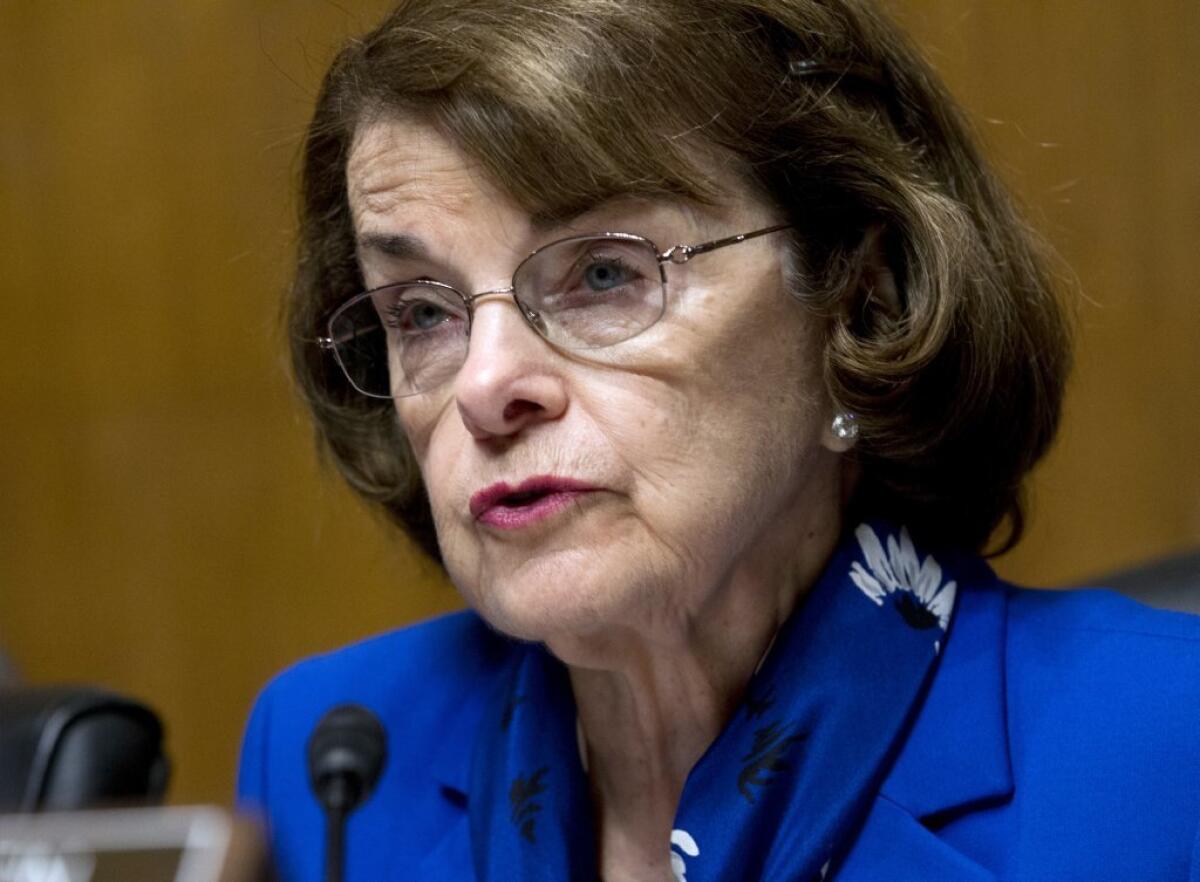
After President George W. Bush nominated John G. Roberts Jr. to the Supreme Court — initially as an associate justice, later as chief justice — reporters pored over musty documents from his days as a lawyer in Ronald Reagan’s administration. I was among them.
In an article in the Pittsburgh Post-Gazette on July 28, 2005, I analyzed papers from Roberts’ time as a special assistant to Atty Gen. William French Smith. They suggested that when the young lawyer joined the administration he was “a true believer in Reagan’s views about the need for judicial restraint.”
Almost 13 years later, it’s Judge Brett Kavanaugh who is up for confirmation to the high court, and Senate Democrats are insisting on spelunking through records of his time in the Bush White House.
From 2001 to 2003 Kavanaugh served in the White House counsel’s office. From 2003 to 2006, when he became a judge on the U.S. Court of Appeals for the District of Columbia Circuit, he served as assistant to the president and staff secretary.
But how many documents should be made available? Democrats, the vast majority of whom are poised to oppose the nomination, are taking a maximalist position. Sen. Chris Coons of Delaware has said that members of the Judiciary Committee would demand the release of “every single record that might be relevant.”
California Sen. Dianne Feinstein, the ranking Democrat on the Judiciary Committee, noted on Thursday that the administration withdrew the nomination of Ryan Bounds, a candidate for an appeals court judgeship, after concerns were raised about his writings as a college student.
Feinstein asked: “If Republicans agreed that Bounds is not qualified because of what he wrote in college, how could they possibly argue that material from Brett Kavanaugh’s time in the White House and as a political operative [isn’t] relevant?”
Republicans counter that the Democrats are embarked on an endless paper chase. Sen. Chuck Grassley (R-Iowa), the chairman of the Judiciary Committee, said that the Democrats’ requests for documents “sound more and more like a demand for a taxpayer-funded fishing expedition.”
On Friday, Politico reported that Senate Majority Leader Mitch McConnell was threatening to postpone the Kavanaugh confirmation vote until just before the November congressional elections, “keeping vulnerable red-state Democrats off the campaign trail while potentially forcing anti-Kavanaugh liberals to swallow a demoralizing defeat just ahead of the midterms.”
So who’s right?
It’s impossible to ignore the larger context of the Democrats’ request, which is that most of them don’t have an open mind about Kavanaugh. Their quest for documents is essentially an exercise in opposition research.
Fair enough, but there ought to be a rule of reason and some standard of relevance. Because this is a judicial nomination, it seems fair to give priority to documents from Kavanaugh’s White House service that shed light on his views as a lawyer and an interpreter of the Constitution.
Even then, documents from his White House days are far less important in weighing his qualifications for the Supreme Court than his opinions as a judge, and there are 12 years’ worth of them for the Senate to peruse.
By contrast, Roberts had served on the appeals court for a little more than two years before becoming chief justice. That made documents from his career before ascending the bench relatively more important evidence for senators — and journalists — trying to determine how he might rule.
That doesn’t mean Feinstein and her colleagues can’t dredge up other, nonjudicial writings — including those Kavanaugh penned as a college student. The Yale Daily News has saved them the trouble of searching through the files. It has posted on its website a series of articles Kavanaugh wrote for the student paper in the 1980s. But don’t look for a smoking gun; they’re all about sports.
FOR THE RECORD:
7:04 a.m.: A caption with an earlier version of this article misspelled Sen. Dianne Feinstein’s first name as Diuanne.
The rent is too damn high. Kamala Harris’ tax credit plan for renters isn’t going to help
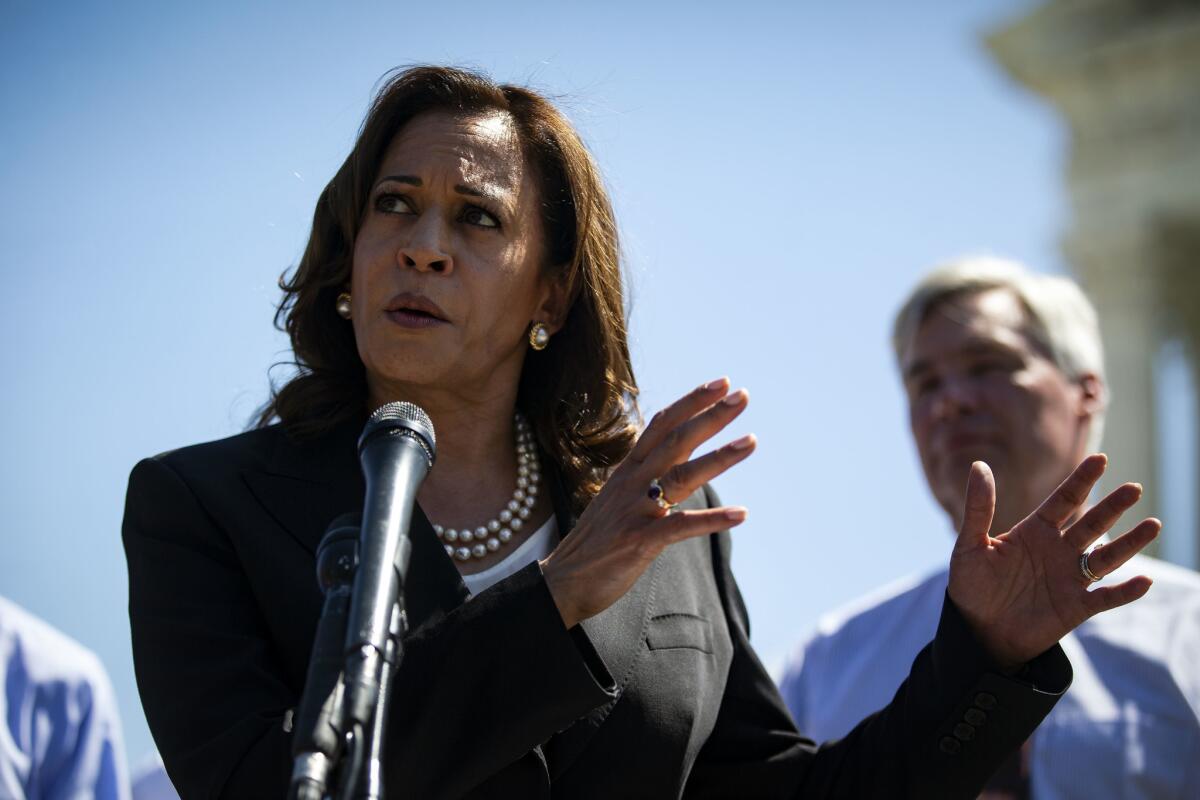
With the cost of rent hitting record highs in California and many big cities across the country, U.S. Sen. Kamala Harris (D-Calif.) proposed this week one possible way to ease the burden on renters: a tax credit.
Harris unveiled The Rent Relief Act, which would create a refundable tax credit for tenants paying more than 30% of their gross income on their rent and utilities. The credit would be limited to households earning less than $100,000 (or $125,000 in high-cost areas like California’s urban centers) and would cap the amount of rent that could be claimed.
People who spend a third of their income on housing costs are considered “rent burdened,” and they may not have enough money left each month for other necessities, such as transportation, food, healthcare or savings.
In 2015, 38% of all U.S. renters were rent burdened. In California, the epicenter of the housing crisis, more than half of renters — about 3 million households — are rent burdened. A third of tenants spend half their income on rent. These folks can be one rent hike, illness or financial setback from eviction.
So, yes, there is a real need to come up with policies that help struggling renters keep a roof over their heads, especially as rents continue to rise much faster than incomes.
Is a tax credit really a good way to help those renters?
A tax credit is typically delivered once a year through a tax refund. But for many tenants, paying the rent is a month-to-month struggle. Sure, that lump sum payment after tax time could be helpful, but it would not provide the ongoing relief needed by those who cannot afford their monthly housing payment, nor would it provide stability for families living in cities with rapidly rising rents. (Yes, you could have less tax withheld in lieu of waiting for a refund, but the vast majority of taxpayers don’t make those adjustments.)
A tax-credit program also could be enormously expensive. Harris’ bill was influenced by a similar proposal by the Terner Center for Housing Innovation at UC Berkeley, according to the Washington Post. The Terner Center’s proposal for a tax credit for low-income rent-burdened households would cost about $76 billion a year.
For comparison, the federal government spends about $22 billion a year on Section 8 housing vouchers, in which low-income families contribute a third of their income toward rent and the government covers the rest of the cost each month. Vouchers provide stability and ongoing relief, unlike a tax credit. But vouchers have their own challenges, the biggest of which is that many landlords won’t accept them. Also, there aren’t enough vouchers to meet the need, and the Trump administration has repeatedly threatened to slash the budget for more.
And that’s another problem — Harris’ proposal is going nowhere as long as Republicans control Congress and Trump is in the White House.
So Harris’ Rent Relief Act is really more of an acknowledgement, a gesture toward the many overburdened renters in California and elsewhere. Lawmakers used to talk about the American Dream and helping people buy a home. Today they’re talking about helping renters keep a roof over their heads.
Let’s all relax with a cool glass of almond-flavored cow-free cereal liquid
Is there any consumer of almond milk who believes that the beverage they are enjoying is cow’s milk flavored with almonds? For that matter, how many consumers choose soy milk because they crave the taste?
Perhaps the odd person is confused about this, but it is widely understood that any milk that comes with such a description is derived from plants and has nothing to do with the lactation of an animal. In fact, that’s generally why people buy the stuff.
Why then, does the Food and Drug Administration think consumers need protection from faux-milk beverages?
The dairy industry has been trying to get the FDA, which regulates plant-based milks, to stop the beverages from using the m-word. (The Los Angeles Times editorial board wrote about the plant-based milk backlash in 2017, saying it is too bad that that dairy farmers are blaming milk alternatives for changing consumer tastes.)
They haven’t gotten very far with their plea, until now.
Earlier this week, FDA Commissioner Scott Gottlieb said at a Politico Pro Summit that his agency is “probably not” enforcing the federal standards of milk as “the lacteal secretion, practically free from colostrum, obtained by the complete milking of one or more healthy cows.” He said the FDA would start work on new rules for milk products.
It’s not clear if that means plant-based milk substitutes will have to stop using the work “milk” to sell products, or just that the federal description will be broadened to include non-dairy milks. It seems a little late for a crackdown. It’s tough to redefine a product once its moniker has become rooted in the collective consumer consciousness.
Even if the label says “almond-flavored cow-free cereal liquid” chances are people will still call it almond milk.
All this walking back is great cardio for President Trump

We should start a regular feature here on Enter the Fray: Take a Walk Back with President Trump.
This week alone, the president and his aides had to “clarify” (read: contradict) his remarks at a news conference with Russian President Vladimir Putin in Helsinki that gave equal credence to U.S. intelligence agencies and Russia’s murderous strongman on the issue of Russian meddling in the 2016 presidential race.
Then he and other administration officials had to “clarify” his statement to reporters that Russia wasn’t still targeting the United States.
On Thursday, the White House had to bat down yet another comment, made first by Trump in Helsinki and then given credence by Press Secretary Sarah Huckabee Sanders in Washington. This time it was Trump’s endorsement of Putin’s idea to have U.S. officials interrogated in exchange for allowing special counsel Robert S. Mueller III to sit in as Russian authorities interrogate the 25 Russians charged in his investigation into election meddling.
Putin specifically mentioned that his agents would sit in while U.S. investigators would question “officials, including the officers of law enforcement and intelligence services of the United States,” who are accused of helping William Browder commit what Putin characterized as a massive tax fraud. (Browder, a U.S.-born British citizen and businessman, was convicted in absentia in Moscow.) Russian authorities have said they also want to question former U.S. ambassador Michael McFaul in connection with the case.
It sounds ludicrous that the United States would make federal agents, spies and diplomats available to Russian investigators. But shooting from the lip as usual, Trump called it “an incredible offer” in Helsinki. And on Wednesday, Sanders suggested that Trump was weighing the Russian request, saying: “The president’s going to meet with his team, and we’ll let you know when we have an announcement on that.”
It shouldn’t have taken a meeting. It’s virtually impossible that the United States will allow Russian representatives to question McFaul about supposed “illegal activities.” But the White House’s refusal to rule out such an outrageous capitulation is more proof that President Trump sees Russia and the United States as ethically interchangeable.
U.S. lawmakers moved quickly to heap scorn on the plan, with Senate Democrats readying a resolution calling on the administration to “refuse to make available any current or former diplomat, civil servant, political appointee, law enforcement official or member of the Armed Forces of the United States for questioning by the government of Vladimir Putin.” Before the Senate could vote on the nonbinding measure, however, the White House issued a statement walking back Trump’s previous endorsement.
“It is a proposal that was made in sincerity by President Putin, but President Trump disagrees with it,” Sanders said. “Hopefully President Putin will have the 12 [latest] identified Russians come to the United States to prove their innocence or guilt.”
Note how Sanders gives Putin credit for good intentions, instead of suggesting that the former spy mastermind had tried to pull a fast one on the famously nonpreparing, seat-of-the-pants-flying U.S. president.
Perhaps skeptical that the White House actually means what it says this time, the Senate voted unanimously for the resolution anyway.
Later in the afternoon, Sanders announced via Twitter that Trump had invited Putin to come to Washington for another summit in the fall:
Great timing! Nothing like a few good walk-backs to set the tone for the midterm elections.
Maria Butina is bad for the NRA and the GOP, but not necessarily for Trump

Short of conclusive proof to back up the Steele dossier, it’s hard to imagine anything that fits more perfectly into liberal fantasies than the allegations against Maria (code name: Mariia) Butina.
The case features a young Russian woman who prosecutors say tried to infiltrate U.S. conservative political, religious and gun-rights groups while being steered by people close to Russian President Vladimir Putin. Prosecutors also accuse her of using or trying to use sex to gain access to these groups and to obtain a job with one of them that would let her stay longer in the United States.
Yet the things missing from the story so far prevent Butina from truly being the smoking gun that the anti-Trump crowd so desperately craves. (And for the record, Butina’s lawyer denies the allegations and says she has been trying to cooperate with federal investigators.)
First, there’s no clear connection to the investigation into Russian meddling in the 2016 presidential election. The charges were brought by national security prosecutors at the Justice Department, not special counsel Robert S. Mueller III, whose investigation has led to charges against 25 other Russians for hacking into online accounts associated with Hillary Clinton’s presidential campaign and trying to manipulate voters through an online disinformation campaign.
Second, the clearest link between Butina and the Trump campaign (so far) is her alleged involvement in secret efforts to set up a meeting between candidate Donald J. Trump and Putin. According to the New York Times, Trump’s son-in-law Jared Kushner ix-nayed that idea, which may have been the smartest move he made during the campaign.
According to the Daily Beast, Butina herself claimed to have served as a conduit between the Trump campaign and Russian officials. But federal prosecutors haven’t alleged such a connection. Instead, the most serious allegation they’ve leveled is that Butina was a leading figure in a Russian effort to open a direct communications back-channel to Republican lawmakers and influential conservatives, apparently through the National Rifle Assn. and other fixtures in the right-of-center firmament.
In fact, Vox notes, court filings allege that Butina’s efforts to court these groups began even before Trump announced he was running for president. The goal, as Butina allegedly laid out in an email to a longtime GOP operative, was to work with the party that controlled Washington to take the frost out of U.S.-Russia relations.
Her stated interest was in promoting gun rights in Russia, but her real interest may have been easing the punitive U.S. sanctions on Russia. That, after all, was the question she asked candidate Trump in 2015 at a libertarian-oriented conference called FreedomFest — what are your plans regarding the Russian sanctions? (Trump said he’d “get along very nicely with Putin,” adding, “I don’t think you’d need the sanctions.”)
That’s a huge issue for Putin and his oligarch pals, whose finances were directly hit by sanctions imposed after Congress passed the Magnitsky Act in 2012, among other laws that take aim at Russian misbehavior.
There is an enormous amount of reporting out there on Butina, and with it plenty of smoke. Prosecutors allege that she took orders directly from important Russian figures, including at least one senior government official who appears to have been her mentor, Alexander Torshin. And her involvement in the NRA doesn’t exactly help the gun group, which already had issues; according to the McClatchy news service’s Washington bureau, the FBI is investigating whether Torshin pumped money into the NRA to help elect Trump.
Still, the ingredients of this story — sex, guns, Russians and Republicans — don’t yet produce a stew of corruption. We know what prosecutors say Butina was trying to do; we don’t know whether she got anything in return for her ministrations.
Sorry, deals that women make to get away from creepy, grabby guys like Harvey Weinstein aren’t valid

Movie producer Harvey Weinstein’s contention that he had a “bargain” with actress Ashley Judd that he could touch her after she won an Academy Award should be laughed out of court.
The ridiculous argument was part of a motion by Weinstein to dismiss the defamation suit Judd brought against the Hollywood power broker. Judd claims in her lawsuit that Weinstein “torpedoed” her acting career after she turned down his sexual advances.
In court documents, Weinstein contends not only that he struck an agreement with Judd, but that he “attempted to live up to his part of the bargain by trying to cast Plaintiff in as many roles as possible that could earn her an Academy Award.”
Judd’s lawyer responded that, no, the pair did not strike a real deal. In fact, he said, Judd was merely trying to extricate herself from the clutches, and the hotel room, of a notoriously mercurial man and alleged sexual predator.
This explanation will ring true to any woman who has had the misfortune to be targeted by a creepy, touchy guy who was either too important to anger, or too scary.
So, guys, if you corner a woman at a party, at the office or even in your hotel room and she gives you a line like, “I’ll go out with you when I win the lottery,” or “I’ll kiss you just as soon as my canker sore heals,” it is probably not a valid verbal contract. It may just be a desperate attempt to get away from you.
Mark Zuckerberg seems to think good-faith Holocaust denial is a thing

What a month it’s been for America’s billionaires!
First Elon Musk went off the rails and called one of the heroes of the Thai cave rescue operation a “pedo” — ostensibly for living in Thailand (and for speaking ill of Musk’s special rescue submarine). Then Amazon’s Jeff Bezos became the richest human being in history, just as ill-treated Amazon workers went on strike over poor pay.
You’ve probably read a thing or two about this little fiasco.
And Wednesday it was Mark Zuckerberg’s turn to wade neck deep into a river of sewage.
The Facebook founder was giving an otherwise uneventful interview to Recode about his company’s efforts to thwart fake news when he unleashed this gem:
Good to know Facebook doesn’t want to impugn the intentions of Holocaust deniers! They’re just accidentally getting the facts wrong about millions of murdered Jews and other marginalized people. Never forget! Unless by accident and then feel free to tell all your Facebook friends about how the Holocaust didn’t happen.
And heaven forbid that Facebook attempts to stop the spread of that misinformation so other folks don’t inadvertently get it wrong too.
As you might expect, the backlash to Zuck’s comments was swift and intense. He’s already issued a clarification to Recode, which you can see in the screengrab above.
I, like many on the internet, ridicule Zuck — but I don’t mean to suggest that figuring out what types of speech are too dangerous to spread freely on an open forum like Facebook is an easy task. It’s not.
There is even a principled argument for allowed Holocaust denial on free speech absolutist grounds. But that’s not Zuckerberg’s position.
Facebook has publicly committed itself to cracking down on the dangerous dissemination of fake news on his company’s platform. If Zuckerberg is serious about living up to that promise, it will require sacrifices. And if he genuinely thinks that squelching Holocaust denial — which is already illegal in numerous countries without any obvious overwhelming ill-effects to free speech — is on the wrong side of a free speech red line, we’re all in trouble.
Republicans obsessed with dismantling Obamacare and its protections for preexisting conditions are eating their own
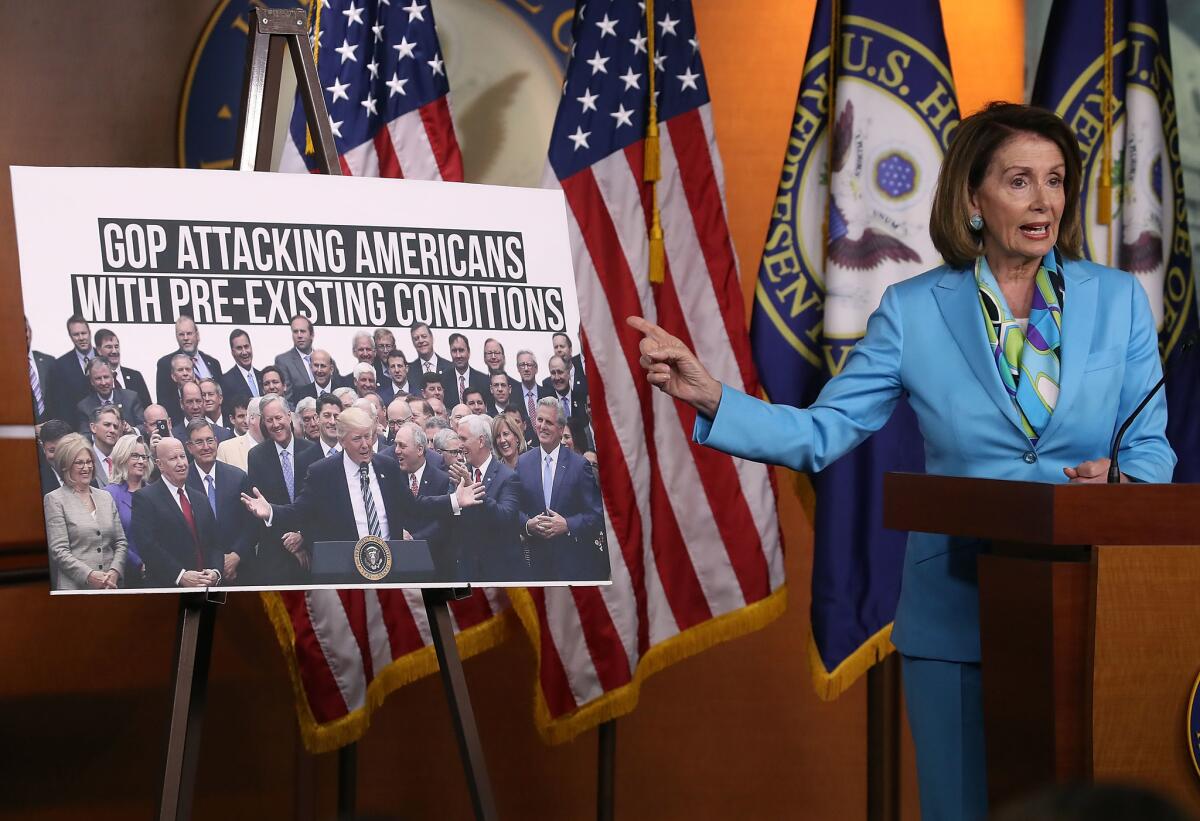
We’ve heard this critique so often that it’s become a cliche: Republican attacks on Obamacare would inflict more damage on their own states than on those represented by Democrats.
Yet here they go again. Nineteen states with GOP leaders and the Republican governor of a 20th state filed suit against the federal government this year, trying (again) to have the Affordable Care Act declared unconstitutional. If they succeed, they will dismantle not only the state insurance-buying exchanges and the premium subsidies the ACA created, but also the law’s insurance reforms.
The most popular of those reforms may be the ban on insurers charging higher premiums or denying policies to people with preexisting conditions. And according to statistics from the Kaiser Family Foundation, most of the states that brought the lawsuit have a higher than average percentage of residents with preexisting conditions. In fact, of the 11 states with the highest percentages of preexisting conditions, nine are suing.
Under federal law, large group plans can’t discriminate against people with preexisting conditions. The ACA brought the same protection to millions of individuals not covered by group plans.
It’s worth remembering that before the ACA, insurers could reject individual applicants with preexisting conditions, withhold coverage for those conditions, rescind policies from people based on allegedly undisclosed conditions, or jack up the premiums of customers who got sick. Most states responded by creating taxpayer-subsidized insurance plans for the “high risk” residents shunned by insurers, but the cost was so great, a number of those pools had to turn away applicants, limit coverage or both.
Some of the state officials suing to invalidate the ACA insist that they want to keep protections in place for people with preexisting conditions. For example, a spokeswoman for Arizona Atty. Gen. Mark Brnovich told Kaiser Health News, “If a court strikes down the constitutionality of the ACA, there are ways to repeal and replace without Arizonans with preexisting conditions losing their coverage.”
Good luck with that. Even when they were just one piece of an overall strategy to overhaul the individual insurance market, the protections for preexisting conditions tended to push up premiums by preventing insurers from denying coverage to the people most likely to need healthcare. If a state adopted just those protections, it could send premiums skyrocketing — just look at what happened in New York after it required insurers in 1993 to cover anyone who applied.
By the way, preexisting condition protections aren’t just for sick people. They also protect those who are in the pink of health today, having recovered from a serious ailment or injury. And the number of people so afflicted is considerable. Kaiser Family Foundation statistics from 2016 show that a little more than a quarter of U.S. residents younger than 65 have preexisting conditions that would lead insurers to deny them coverage, if they were allowed to do so.
And for the record, the Trump administration supports the states’ argument about the unconstitutionality of key portions of the ACA, including the ones dealing with preexisting conditions.
Sorry, Montenegro, Trump isn’t sure you’re worth defending
The advisors who prevailed on President Trump to “clarify” his statement in Helsinki that he couldn’t see why it “would” be Russia that interfered in the U.S. election may have to stage another intervention.
In an interview with Fox News’ Tucker Carlson aired on Tuesday night, Trump called into question, not for the first time, his commitment to a central proposition of the North Atlantic Treaty Organization.
The context was a question from Carlson about Montenegro, the former Yugoslav republic that is the most recent country to join NATO.
“So, let’s say Montenegro — which joined last year — is attacked, why should my son go to Montenegro to defend it from attack?” Carlson asked. “Why is that?”
“I understand what you’re saying,” Trump replied. “I’ve asked the same question.”
Trump’s answer bought back memories of his failure in a speech at his first NATO summit meeting in May 2017 to clearly reaffirm his support for Article 5 of the North Atlantic Treaty. Article 5 says that “an armed attack against one or more [members] shall be considered an attack against them all” and that every member will take “such action as it deems necessary” to assist the country under attack.
Trump’s then-national security advisor insisted that support for Article 5 was “implicit” in Trump’s speech, and later the president himself made that support explicit.
But now he seems to have toggled back to questioning Article 5. This could relate either to his well-known frustration at the failure of many NATO members to spend enough on their defense (he mentions that issue in his exchange with Carlson) or it could reflect sympathy for Russia’s objection to NATO expansion after the collapse of the Soviet Union. Russia long has maintained (and some scholars agree) that the U.S. signaled that the alliance wouldn’t expand eastward if Germany were reunited.
Yet even some critics of NATO expansion believe that the U.S. must be prepared to come to the defense of all members of the alliance, new as well as old. Does Trump agree? It’s hard to be sure.
The aides responsible for walking back Trump’s gaffes can barely keep up
My colleague Michael McGough wrote the obvious on this blog yesterday: that President Trump was believable when he defended Russian President Vladimir Putin on Monday in Helsinki and entirely unbelievable in his one-day-later “do-over” effort to walk back his outrageous original comments.
The walk-back defied credulity. Were we really supposed to believe that Trump has come around and now believes the Russians meddled in the 2016 U.S. election on his behalf? Is it even remotely likely that he was in fact contradicting Putin in Helsinki — but that he accidentally said “would” when he meant “wouldn’t”?
Of course not. McGough concluded that Trump’s carefully scripted remarks Tuesday were merely a reaction to “a bipartisan chorus of condemnation over his calamitous comments in Helsinki.”
Now, only a day later, the president is again trying to walk back a Russia comment. On Wednesday, he was asked whether Russia was “still targeting” the U.S. His answer was clear and unequivocal: “No.”
Or at least, it seemed clear and unequivocal. But a few hours later, his aides again came to his rescue: According to spokeswoman Sarah Huckabee Sanders, the president did not, after all, mean to say that Russia was not still targeting the U.S.
“The president said, ‘Thank you very much,’ and was saying ‘no’ to answering questions,” Sanders said. The “no,” it seems, was not in response to the question from the reporter. In fact, said Sanders, “the president and his administration are working very hard to make sure that Russia is unable to meddle in our elections, as they have done in the past, and as we have stated.”
Of course she wants to revise the president’s “no” if she can. Because once again (just a day after the last walk-back), he is defending Putin and Russia. And once again, he is doing so despite assertions of U.S. intelligence officials to the contrary. Just last week, Director of National Intelligence Daniel Coats — whom Trump appointed — said that Russia and other countries were continuing to target American companies and the American government. “The warning lights are blinking red,” Coats said. Russia, he added, is “the most aggressive foreign actor, no question. And they continue their efforts to undermine our democracy.”
So what did the president actually mean when he said, “No”? Should we believe Sanders that he was not responding to the question he’d just been asked? I have not yet been able to find video of the interchange, so I can’t offer a final opinion. But frankly, a year and a half into a term full of lies, misstatements, errors and falsehoods, he doesn’t have much credibility left.
Something a Harvard humanitarian should never ask her neighbor: ‘Are you in one of the affordable units?’
OK, this isn’t exactly a case of #playingwhileblack or #beingakidwhileblack even though a biracial child was involved. But something wrong went down when a woman walked out of her apartment building in Cambridge, Mass., and asked an apparently white woman with a biracial child to move from where they were playing on the sidewalk because the child was noisy.
Alyson Laliberte, the mother of the child, wrote on her Facebook page about the encounter, “Y’all here is another Permit Patty trying to kick me off my own property because she’s having a hard time getting her kids to take a nap at 3:30 in the afternoon on a Saturday.”
After a testy exchange during which Laliberte continues to say she won’t leave, the woman stares at her in exasperation, then asks: “Are you in one of the affordable units? Or are you in one of the Harvard units?”
Ohh, not cool. (Laliberte, rightly, tells her it’s none of her business.)
Laliberte writes, “It was totally discriminating and racist of her … or maybe it was because my daughter is biracial.”
It got worse when the woman asked what unit Laliberte was in.
And, bizarrely, the woman who came out of the building and started this drama is Theresa Lund, executive director of the Harvard Humanitarian Fund, a research and education group based at Harvard’s T.H. Chan School of Public Health. The group, according to its website, researches the practice of relieving human suffering in war and disaster. Lund could maybe start in Cambridge. Or maybe that’s what she thought she was doing when she chose to speak to Laliberte in a patronizingly soft, therapist-talking-to-a-child voice.
At one point, she smiles at Laliberte’s child and says, “You’re a sweetheart. I’m sorry that I’m arguing with your mommy. She’s not being very nice.”
Some observers have suggested this is about racism, but I think it’s more about classism — as if the only people who condone noise from their children live in lower-income housing. (And, by the way, we never find out which kind of unit Laliberte lives in in this building.) Maybe it was just about snobbism. (Are you affiliated with Harvard? Or with the working class?) Or maybe Lund, who is affiliated with Harvard, was just surprised she didn’t recognize the person.
Hey, I don’t like a lot of noise outside my windows whether it’s 3:30 in the afternoon or 3:30 in the morning, although I admit it’s hard to avoid in the daytime. Lund’s big mistake was thinking this had to be a mother and child from one of the affordable units. By the way, Lund issued a public apology Monday, after the video went viral, saying her reaction was “inappropriate and wrong.”
There’s no question that all the instances of white people quizzing black people on what they’re doing barbecuing in a park/swimming in a pool/napping in a college dorm room are troubling and say a lot about our inherent racial biases. But this incident seems more about the stresses and tensions of living in a contemporary urban jungle of dense apartment buildings without a lot of space. I think this is the most troubling frontier for future confrontations.
And as our neighborhoods only get more dense to accommodate all the housing we need, we’re going to have to figure out ways for people to extend each other some courtesy and give each other some space.
Trump’s do-over attempt on Russian meddling couldn’t have been less convincing
Reacting to a bipartisan chorus of condemnation over his calamitous comments in Helsinki about Russian interference in the 2016 U.S. election, President Trump on Tuesday claimed that he misspoke.
On Monday, at a news conference with Vladimir Putin, Trump said: “My people came to me, [director of national intelligence] Dan Coats came to me and some others and they said they think it’s Russia. I have President Putin; he just said it’s not Russia. I will say this: I don’t see any reason why it would be.”
But on Tuesday, in remarks before a meeting with congressional Republicans, Trump offered “some clarification.”
“In a key sentence in my remarks I said the word ‘would’ instead of ‘wouldn’t.’ The sentence should have been, ‘I don’t see any reason ... why it wouldn’t be Russia.’ ” He added that it was “sort of a double-negative.”
If you’re convinced by this “clarification,” I have a bridge in St. Petersburg you might be interested in.
Trump’s attempt to reinterpret his original remark is undermined both by other things he said at the news conference and by an aside in his remarks on Tuesday.
The line about not seeing any reason why Russia would have interfered was only one of Trump’s comments at the news conference that cast doubt on the conclusions of the U.S. intelligence community. Another example was this exercise in false equivalence: “I have great confidence in my intelligence people, but I will tell you that President Putin was extremely strong and powerful in his denial today.”
Then on Tuesday, Trump bungled his attempt to get back into the good graces of his own intelligence officials. “I accept our intelligence community’s conclusion that Russia’s meddling in the 2016 election took place,” Trump said, but then he added that it “could be other people also, [there are] a lot of people out there.” (Remember the 400-pound hacker sitting on his bed?)
Trump’s “clarification” came across with all the sincerity of his abrupt announcement during the 2016 campaign — also in response to criticism — that he now agreed that “President Barack Obama was born in the United States.”
Members of Congress and administration officials who were alarmed by Trump’s comments in Helsinki — and concerned about what they might mean for his commitment to combating future interference — shouldn’t be reassured by the substitution of “wouldn’t” for “would.”
What’s Putin’s beef with billionaire William Browder? The real story goes back 90 years
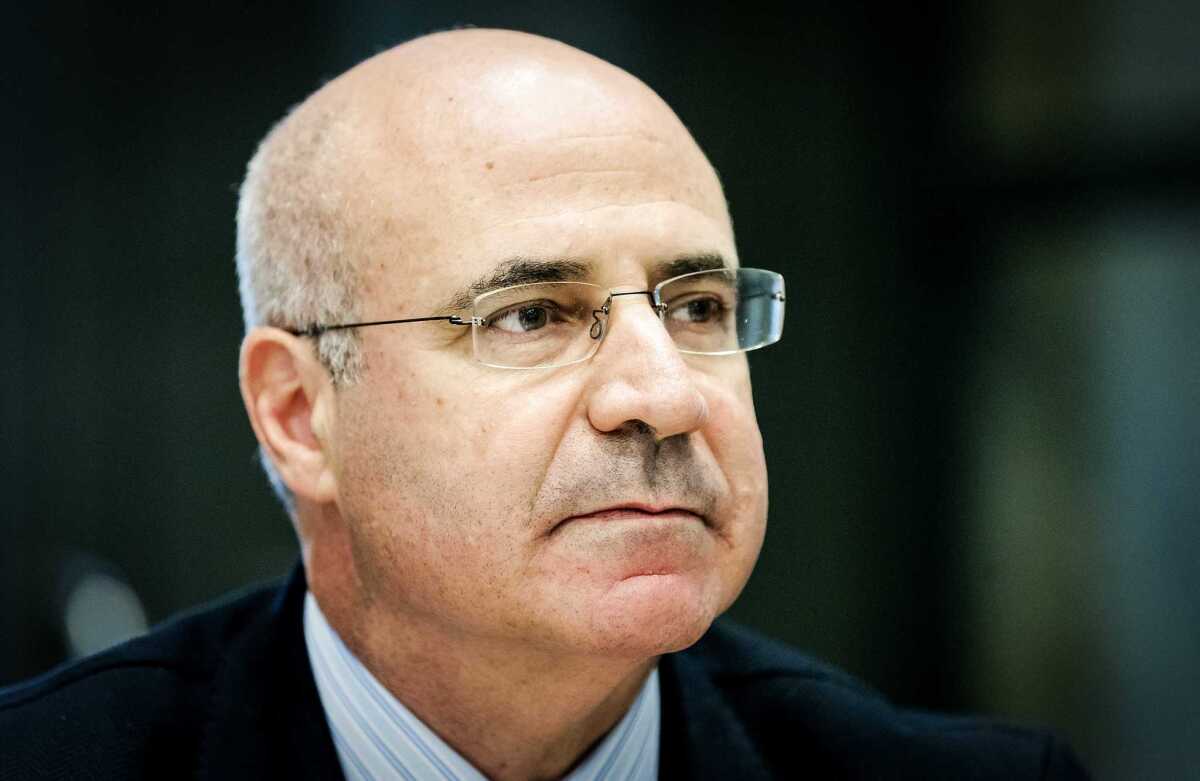
On Monday, Vladimir Putin offered — more rhetorically than seriously, I suspect — to assist Robert S. Mueller III in his investigation of 12 Russian military intelligence officials if Russia was allowed, in turn, to interrogate people “who have something to do with illegal actions on the territory of Russia.” In particular, Putin said, he would like to interview U.S. intelligence officials about one man: William F. Browder.
(Trump’s response? “I think that’s an incredible offer.”)
Browder is an American-born financier, the billionaire CEO of Hermitage Capital who made much of his money in Russia after the fall of the Soviet regime. After his friend and colleague, Russian tax lawyer Sergei Magnitsky, was arrested and imprisoned — and subsequently died at age 37 — Browder led the campaign in the U.S. to pass the so-called Magnitsky Act, which imposed sanctions and froze assets of people deemed to have been involved in Magnitsky’s imprisonment. Since then, Browder has been an outspoken critic of Kremlin corruption.
The ongoing conflict between Putin and Browder is a dramatic story of global intrigue, wealth, power and possible murder. Browder has been convicted in absentia of tax fraud and targeted for arrest and extradition repeatedly by the Russians; for now, he remains at large, living in London.
While many news organizations reported Putin’s unsubstantiated assertions about Browder on Monday, most did not mention the backstory to the saga, a prequel of sorts that predates William Browder’s birth and ties his family to Russia and the Kremlin for nearly 100 years.
From 1930 to 1945, Browder’s grandfather — Earl Browder — was the general secretary of the U.S. Communist Party. During that time, he was the best known leader of the national organization, a two-time U.S. presidential candidate, author of many books, the antithesis of a capitalist billionaire. In 1938, he appeared on the cover of Time magazine with the sobriquet “Comrade Earl Browder.” He not only worked in Russia for the party, but he allegedly engaged in clandestine activities on behalf of the Soviets as well. Ultimately, Browder was rejected and deposed by Moscow — and also targeted under America’s Cold War anti-communist policies. In the early 1940s, he was indicted in the United States and spent 14 months in prison.
Along the way, he married a Russian woman, William’s grandmother. William Browder grew up in the United States, the son of a highly respected mathematician, with an abiding interest in his grandmother’s homeland. Instead of working on behalf of the masses, however, he earned an MBA from Stanford and established an investment fund that brought western capital to Russia in the period of privatization that followed the collapse of the USSR.
“The dominoes were falling; soon all of Eastern Europe would be free,” the younger Browder wrote in a memoir several years ago. “My grandfather had been the biggest Communist in America, and as I watched these events unfold, I decided that I wanted to become the biggest capitalist in Eastern Europe.”
Billions of dollars later, Browder is increasingly known not for his role in the world of finance, but for his anti-Putin positions. Like his grandfather, he is back in the world of hardball global politics. “I have to assume that there is a very real chance that Putin or members of his regime will have me killed someday,” he wrote in his memoir. “If I’m killed, you will know who did it.”
Putin made Trump an offer he should definitely refuse

The drama surrounding President Trump’s meeting Monday with Russian strongman Vladimir Putin centered, understandably, on whether Trump would confront Putin about Russian meddling in the 2016 election. I think Trump’s comment Monday that “President Putin was extremely strong and powerful in his denial today” qualifies as a “no.”
But Putin’s focus was no doubt on other things. For example, how to fend off Trump’s challenge to the new Gazprom natural gas pipeline dubbed Nord Stream 2 that will connect Russian gas producers with European buyers in Germany.
You may recall Trump blasting the pipeline deal at last week’s NATO summit in Brussels. There, Trump said the pipeline would supply so much of Germany’s energy, the country would become “a captive of the Russians.”
When asked about the pipeline controversy at the news conference with Putin on Monday, Trump called the Russian leader “a good competitor,” adding, “And I think the word ‘competitor’ is a — it’s a compliment. I think that we will be competing, when you talk about the pipeline. I’m not sure necessarily that it’s in the best interest of Germany or not, but that was a decision that they made.”
Putin, though, offered a different spin: Instead of competing and driving prices down, why don’t we form a cartel! Everybody wins! Well, maybe not consumers. But given Trump’s eagerness to tax consumers with tariffs for the sake of certain U.S. manufacturers, that’s a reasonable offer, right?
Here’s Putin, in his own (poorly translated) words:
“I think that we, as a major oil and gas power — and the United States, as a major oil and gas power as well — we could work together on regulation of international markets, because neither of us is actually interested in the plummeting of the prices.
“And the consumers will suffer as well, and the consumers in the United States will suffer as well, and the shale gas production will suffer. Because beyond a certain price bracket, it’s no longer profitable to produce gas, but nor we are interested in driving prices up because it will drain juices, life juices, from all other sectors of the economy, from machine building, et cetera. So we do have space for cooperation here, as the first thing.”
One can only hope and pray that the administration shoots Putin’s idea down like a hostile drone entering U.S. airspace. But we don’t know from the news conference — as soon as Putin finished answering, the two moved on to the next question.
Well, here’s some good news. The FCC isn’t totally in Sinclair’s pocket
It’s safe to say that Ajit Pai isn’t going to be named Man of the Year from internet advocacy groups in 2018. Or ever, for that matter — his drive to eliminate net neutrality rules has made him Public (servant) Enemy No. 1 for the likes of the Electronic Frontier Foundation and Free Press.
But on Monday, Pai did something that should at least stop his critics from claiming he’s completely in the pocket of Sinclair Broadcast Group. He registered his opposition to Sinclair’s blockbuster acquisition of Tribune Media’s television stations, a deal that would have allowed Sinclair to broadcast its right-wing (or perhaps more accurately, Trumpian) pronouncements into more than 60% of U.S. homes. If his colleagues agree with Pai, the deal will head to an administrative law judge for what’s likely to be a contentious review, rather than going to the commission for a vote to approve.
The sole Democrat on the commission, Jessica Rosenworcel, quickly agreed. A longtime critic of the deal, Rosenworcel took the occasion to lay into Pai: “As I have noted before, too many of this agency’s media policies have been custom built to support the business plans of Sinclair Broadcasting,” she said in a statement. “With this hearing designation order, the agency will finally take a hard look at its proposed merger with Tribune. This is overdue and favoritism like this needs to end.”
In his statement, Pai said he had “serious concerns” about the deal because of the way Sinclair was proposing to comply with the limit on broadcast ownership groups. Under federal law, stations can reach no more than 39% of the households with television sets (very few U.S. homes don’t have at least one). To adhere to that limit, Sinclair was proposing to sell about a dozen of the stations it would be acquiring from Tribune. But in at least three of those deals — in Chicago, Dallas and Houston — the new owner would let Sinclair operate the stations on its behalf, and Sinclair would retain an option to buy the stations back.
Previously, Pai had successfully pushed the FCC’s Republican majority for regulatory changes that seemed to clear the way for the Sinclair deal. These included easing limits on the number of stations a broadcaster could own in a single market and re-imposing the “UHF discount,” bizarrely counting only half the homes reached by UHF stations for the purpose of the national ownership cap.
Without those moves, Sinclair would have been forced to unload many more of the 42 Tribune-owned or -operated stations it would acquire in the Tribune deal; its latest plan calls for it to divest 17. For instance, the UHF discount is what enables Sinclair to claim the combined stations would reach only 38% of U.S. households, when the actual number is 59%. And that larger figure doesn’t include the three major-market stations it planned to divest but continue to operate.
It’s worth noting here that, at the request of congressional Democrats, the FCC inspector general is investigating whether Pai improperly sought to help Sinclair with the series of rule changes he championed. Sinclair is a lightning rod for liberal public-interest groups because it requires the stations it owns to run opinion segments by a former Trump administration official, as well as marketing messages that echo Trump administration talking points.
And you should also bear in mind that Sinclair could still win approval for this deal. It argues that its divestiture arrangements are no different from others the FCC has approved in the past. And if it fails on that point, it could try to rescue the deal by making cleaner divestitures. After all, its signals would still reach almost six of every 10 U.S. households. That’s an enviable position for any broadcaster to be in, and for that, Sinclair can thank Ajit Pai.
They wanted a blue wave, but got a progressive swell instead
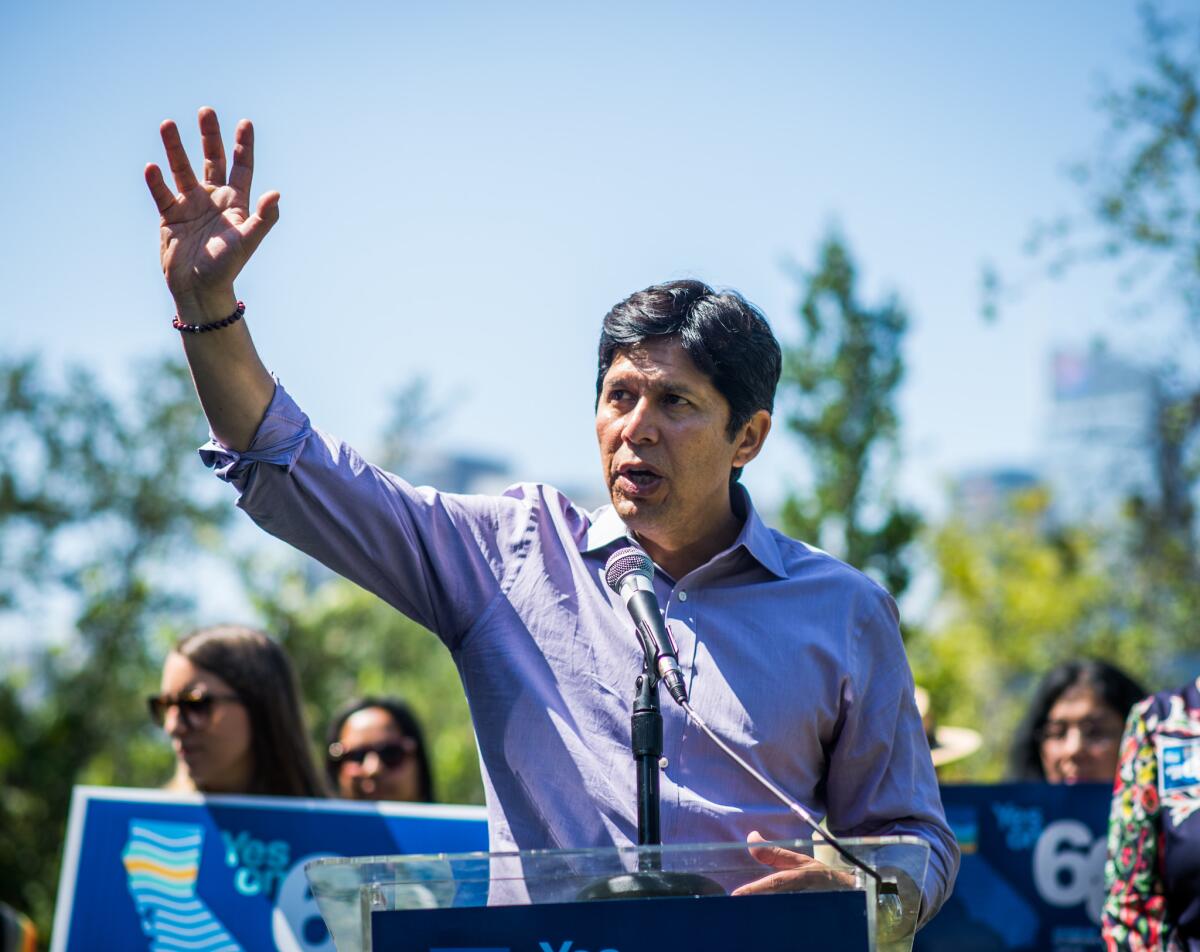
The Democratic Party has been focused on building a blue wave to wash over the midterm elections and flip the U.S. House of Representatives. Maybe that’s why they didn’t notice the progressive swell sneaking up.
Late last month, it overtook Rep. Joe Crowley (D-N.Y.), a party stalwart representing parts of New York City, who lost the primary to newcomer Alexandria Ocasio-Cortez, a 28-year-old Latina. The upset was written off by some as a rogue wave, a one-off that was merely a reflection of the changing demographics of that particular House district and not a referendum on the party’s neoliberal platform.
But the one-offs are starting to add up around the country as progressive candidates advance over more moderate Democrats, notably in three gubernatorial primaries: Stacey Abrams in Georgia, Ben Jealous in Maryland and Jared Polis in Colorado.
Are party leaders listening to the message from Democratic voters clamoring for candidates who boldly embrace liberal values, not sublimate them in bland positions in the hopes of capturing those elusive — and now possibly mythical — on-the-fence voters?
Perhaps they are in California. On Saturday night the California Democratic Party executive board snubbed incumbent Sen. Dianne Feinstein and voted to back her progressive challenger, state Sen. Kevin de León (D-Los Angeles) in the November election. He received 65% of the vote of about 330 executive board members, while 7% went for Feinstein. The rest voted for “no endorsement.”
Of course, California party leaders aren’t risking victory in November by embracing an uber liberal in the U.S. Senate race — Republicans didn’t finish in the top two in June’s primary, and so are shut out of the November election. De León, former Senate president pro tem and self-proclaimed leader of the state’s anti-Trump movement, has positioned himself far to the left of the moderate Feinstein, backing Medicare for all, free public higher education and the abolition of Immigration and Customs Enforcement. (For the record, The Times Editorial Board endorsed Feinstein in the primary.)
But the party also doesn’t gain anything by backing De León, which suggests that the executive board members felt liberated to make a decision reflecting their true values and not based on political calculus.
Some people have characterized the endorsement vote as a slight to Feinstein after a long and distinguished career serving in the Senate. One local progressive leader told me that the vote was more about ageism and sexism than political positions, and that actually many progressives support Feinstein. I don’t doubt that, but I think that ultimately Feinstein got caught, at least for the moment, in the undertow of a powerful progressive current coursing through the Democratic Party.
Scott Pruitt belched soot on the environment one last time on his way out the door
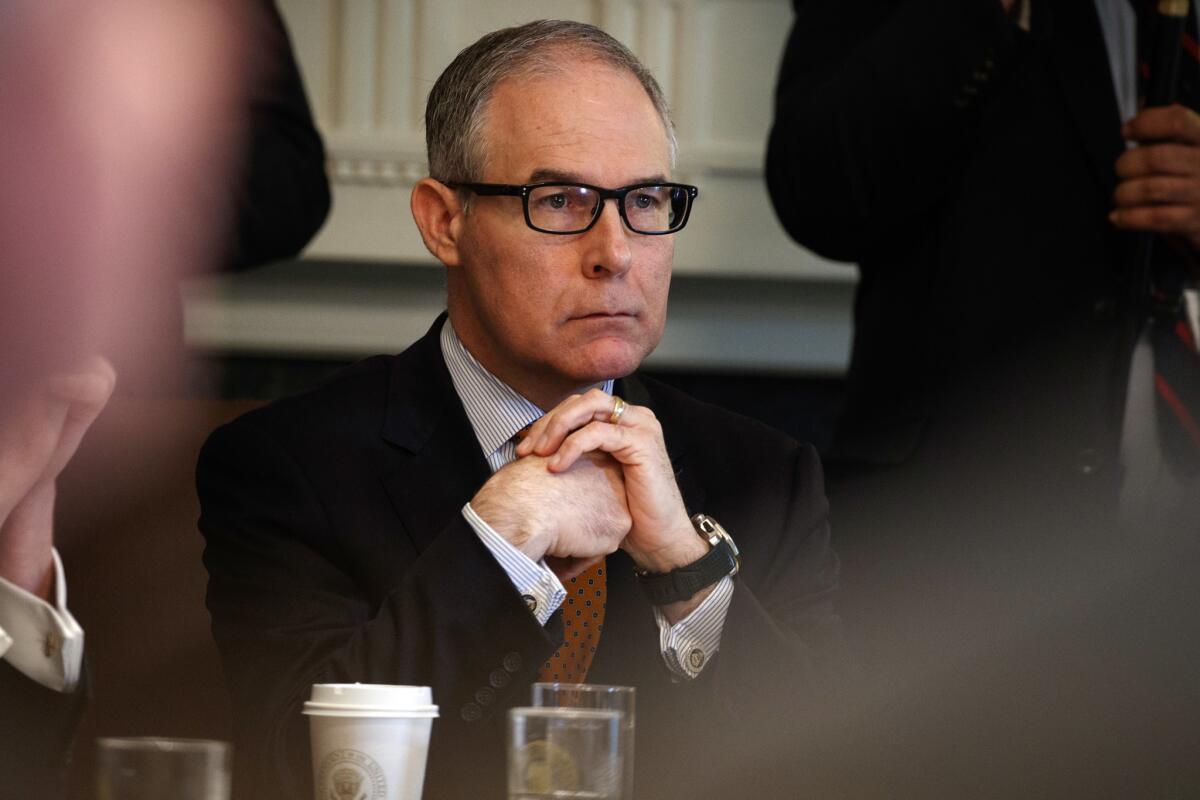
Scott Pruitt may be gone from the Environmental Protection Agency, but his work dismantling environmental safeguards is still inspiring lawsuits — or at least threats of lawsuits.
California Attorney General Xavier Becerra and a dozen other state attorneys general fired off a letter to the EPA demanding the agency withdraw a decision Pruitt issued on his last day that would allow fleets of super-polluting trucks to stay on the road. The states have threatened legal action if the EPA does not reverse course.
Pruitt’s successor, Andrew Wheeler, a former industry lobbyist, also appears to believe in less stringent regulations, so don’t expect a quick reversal.
That’s too bad because Pruitt’s decision is almost universally unpopular among environmental groups and trucking companies, which have argued that the rollback hurts truckers and truck manufacturers that have played by the rules and invested in expensive pollution control equipment.
The rule affects so-called glider kits that allow truckers to drive rebuilt rigs with dirty diesel engines that can spew as much as 450 times more soot than newer models. The Obama administration imposed a cap of 300 glider kits per kit manufacturer after discovering that some companies were circumventing truck emissions standards by putting older, dirtier engines inside new truck shells. (Traditionally the kits were used to give new life to engines and other components from trucks damaged in collisions.)
Then President Trump took office and appointed Pruitt, who spent his scandal-plagued and ethically challenged tenure at the agency attacking its mission of environmental protection and undermining its integrity.
Siding with lobbyists from glider truck builders, Pruitt put the agency to work last year on a proposal to roll back the rule. He justified the move by citing a study from Tennessee Tech University that declared glider trucks to be no more harmful to air quality than trucks with new engines. Turns out the study was funded by Fitzgerald Glider Kits, which happens to be one of the primary manufacturers of glider trucks and a contributor to Trump’s campaign. The study is now under investigation for “research misconduct.”
Two former EPA chiefs from Republican and Democratic administrations and members of Congress from both parties warned Pruitt that the rollback was a bad idea.
Nevertheless, in the last hours of a tenure cut short by a laundry list of ethical lapses, Pruitt used his discretion as administrator to delay the glider truck cap that the Obama EPA imposed until December 2019. The agency intends to permanently repeal the cap by then.
The move will allow more diesel emissions that contribute to asthma, heart disease, cancer and a host of other ills. Diesel-powered trucks are also major contributors to lung-searing smog, and their emissions are loaded with soot and gases that contribute to global warming.
It’s also the ultimate hypocrisy. The Trump administration and Pruitt in particular criticized many rules the Obama administration enacted during its final six months, deeming them last-minute efforts to reward allies. Pruitt’s action is the epitome of an 11th-hour decision — and one that could have lasting effects.
Taxpayers deserve to know the cost of Eric Garcetti’s political ambition
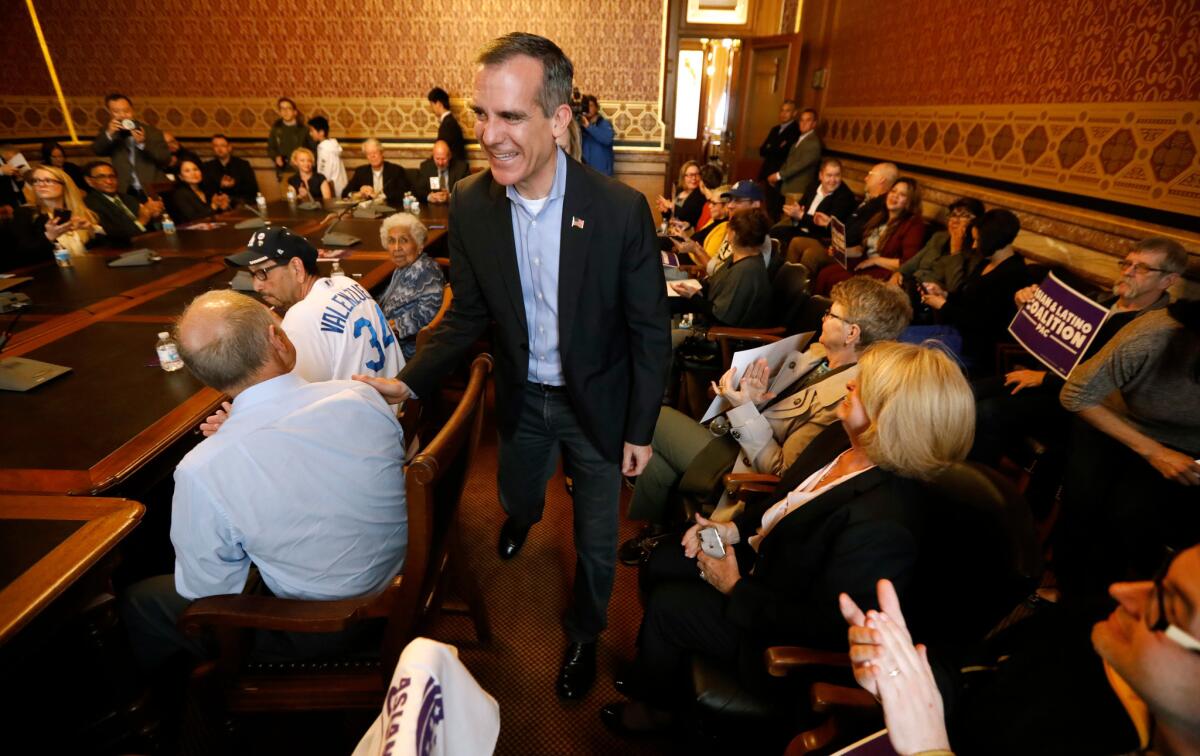
Mayor Eric Garcetti has been jetting off to Boston, Chicago, Berlin — and especially to presidential battleground states, such as Iowa, New Hampshire and South Carolina.
From September 2016 through August 2017, Garcetti logged 112 days, or nearly one-third of his time, away from California, Times reporter Dakota Smith found.
There’s nothing wrong with the mayor traveling out of state or out of the country on city business. This is Los Angeles, the nation’s second largest city and a global economic force. The mayor should be out building relationships across the country and the world, not cloistered in City Hall.
Also, there shouldn’t a problem with Garcetti making the occasional foray out of state to test his viability as a presidential candidate. This is what any potential candidate would do. As long as he’s not shunning his day job, what’s the big deal?
But Garcetti has an obligation to be transparent about his travels and how much they cost taxpayers. On this, he is failing.
The Los Angeles Times sued the city of L.A. on Thursday for refusing to turn over records detailing taxpayer costs for security on out-of-state trips. The lawsuit lays out the multiple California Public Record Act requests filed by Smith, asking for records that detail the amount of money spent for city police and security personnel to travel with Garcetti, his family and his staff since 2015.
The Los Angeles Police Department, which provides Garcetti’s security, repeatedly refused to turn over the records, saying that the release of such information “exposes the Mayor and his family to threats arising from vulnerabilities in the provision of security.”
Perhaps the city can argue that the number of officers assigned to security or the hours they worked may be withheld. But the total cost of that security is basic information that has been provided by other political figures.
That’s how the public knew the Secret Service had paid $63,000 in hotel costs to President Trump’s Mar-a-Lago Club while guarding the president. And that taxpayers spent more than $300,000 in security costs when Trump’s children went on a ski trip to Aspen.
There is a long list of political figures who have turned over records of their security expenses — President Obama, former U.S. EPA Administrator Scott Pruitt, Chicago Mayor Rahm Emanuel and Baltimore Mayor Stephanie Rawlings-Blake, to name a few.
Why should Garcetti be exempt from similar taxpayer accountability?
Maybe the records will show that taxpayers are paying a king’s ransom for Garcetti’s security while he travels the country to raise his profile for a presidential run. Maybe that will embarrass him and turn local public opinion against his possible campaign. Or maybe the records will show these are routine expenses in line with previous mayors’ costs. As of now, nobody knows.
But here’s a tip for Garcetti: If you’re thinking about running against Trump — who is setting a new standard for secrecy and aversion to public accountability — you might want to err on the side of openness and transparency.
Indictments clearly show Russia meddled in our election. Trump promises to ‘firmly’ ask Putin about it
At his joint news conference with British Prime Minister Theresa May on Friday, President Trump said that he would raise the issue of Russian meddling in the 2016 U.S. election with Vladimir Putin when the two leaders meet in Helsinki next week. Later in the day, Deputy Atty. Gen. Rod Rosenstein gave Trump some ammunition if he’s willing to use it.
“Will we be talking about meddling? I will absolutely bring that up,” Trump said. “I don’t think you’ll have any, ‘Gee, I did it, I did it, you got me.’ There won’t be a Perry Mason here, I don’t think.” (Mason was the fictional defense attorney who cleared his clients by extracting confessions from the real killers.)
Nevertheless, Trump insisted that he would “absolutely firmly ask the question.”
Rosenstein strengthened Trump’s hand when he announced that the investigation led by special counsel Robert S. Mueller III had resulted in the indictment of 12 Russian intelligence officers in connection with the hacking of Hillary Clinton’s 2016 campaign, the Democratic National Committee and the Democratic National Campaign Committee.
Rosenstein, who said he had briefed Trump earlier about the charges, provided an incentive for Trump to “firmly ask the question.” The deputy AG deliberately didn’t focus on the identity of the candidate who was victimized — Clinton — and stressed that Russian meddling in the election was an attack on the American political system as a whole, not a particular candidate.
That packaging seemed aimed at making it easier for Trump to be aggressive in pressing Putin. Will it succeed?
Hope springs eternal, but there’s little in Trump’s past conduct to suggest that he will press Putin about election meddling with anything like the persistence of Perry Mason.
After Trump and Putin met in Vietnam last year, he told reporters that “every time he sees me, he says, ‘I didn’t do that,’ ” referring to the election meddling. “I really believe that when he tells me that, he means it.”
The other problem is that the indictments Rosenstein announced are the result of an investigation Trump repeatedly has denounced as a “witch hunt.” Granted, the “witches” under indictment are all Russian nationals — a point Trump lawyer Rudy Giuliani crowed about on Twitter:
The problem, of course, is that Mueller isn’t finished with his work, so Trump might be reluctant to cite him as a reliable source.
Perry Mason had a private investigator, Paul Drake, who helped him prepare for his courtroom confrontations. It’s hard to believe that Trump is willing to rely on Mueller to force a confession from Putin.
It’s now impossible not to wonder how much Trump knew about Russian hacking and when he knew it

Then-candidate Donald J. Trump said he was just joking in July 2016 when he called on Russia to “find the 30,000 emails” that Hillary Clinton had not turned over to State Department investigators, ostensibly because they were personal correspondence and not government business.
Now that special counsel Robert S. Mueller III has obtained indictments against 12 Russian intelligence officers in connection with hacking into multiple Clinton campaign-related email accounts in the four previous months, it puts Trump’s comments in a different light.
The indictment alleges that the Russian agents broke into accounts for the Democratic National Committee, the Democratic Congressional Campaign Committee and various volunteers and employees at Clinton’s campaign — including the email account of her campaign chairman, John Podesta. It goes into some detail on how it identified the responsible parties, adding weight to the allegations.
The agents are not accused of hacking Clinton’s private email server, which isn’t surprising. Although former FBI director James Comey said in 2016 that the server could have been hacked by a hostile government, FBI investigators later told the agency’s inspector general that they were “fairly confident” the server was not compromised.
Regardless, emails taken from the DNC account started leaking in June 2016 at the site DCLeaks, then the following month from WikiLeaks. A hacker using the moniker Guccifer 2.0 — later linked by security experts to Russia — claimed credit for the leaks, but others did too, leaving the culprits unclear. Bear in mind that much of the discussion of the leaks centered on the DNC’s apparent favoritism for Clinton over her main rival for the Democratic nomination, Sen. Bernie Sanders (I-Vt.). So while there were suspicions about Russia, the precise motives behind the leaks were hard to divine.
That’s the backdrop for Trump’s remarks. And now one has to wonder, just how much did he know about what Russia was actually doing?
In an editorial The Times ran shortly after Trump’s remarks, we noted the spin applied by Trump’s campaign:
“A spokesman for the Trump campaign later insisted that ‘Mr. Trump did not call on, or invite, Russia or anyone else to hack Hillary Clinton’s emails.’ Instead, Jason Miller suggested, Trump was saying the Russians already had the data because Clinton’s server wasn’t secure.”
Or maybe Trump was saying the Russians probably had the data because he knew they’d grabbed so much else from Clinton’s campaign.
The White House responded with a statement from Deputy Press Secretary Lindsay Walters: “Today’s charges include no allegations of knowing involvement by anyone on the campaign and no allegations that the alleged hacking affected the election result. This is consistent with what we have been saying all along.”
Umm, Roger Stone?
The latest thing triggering the right: actual journalism
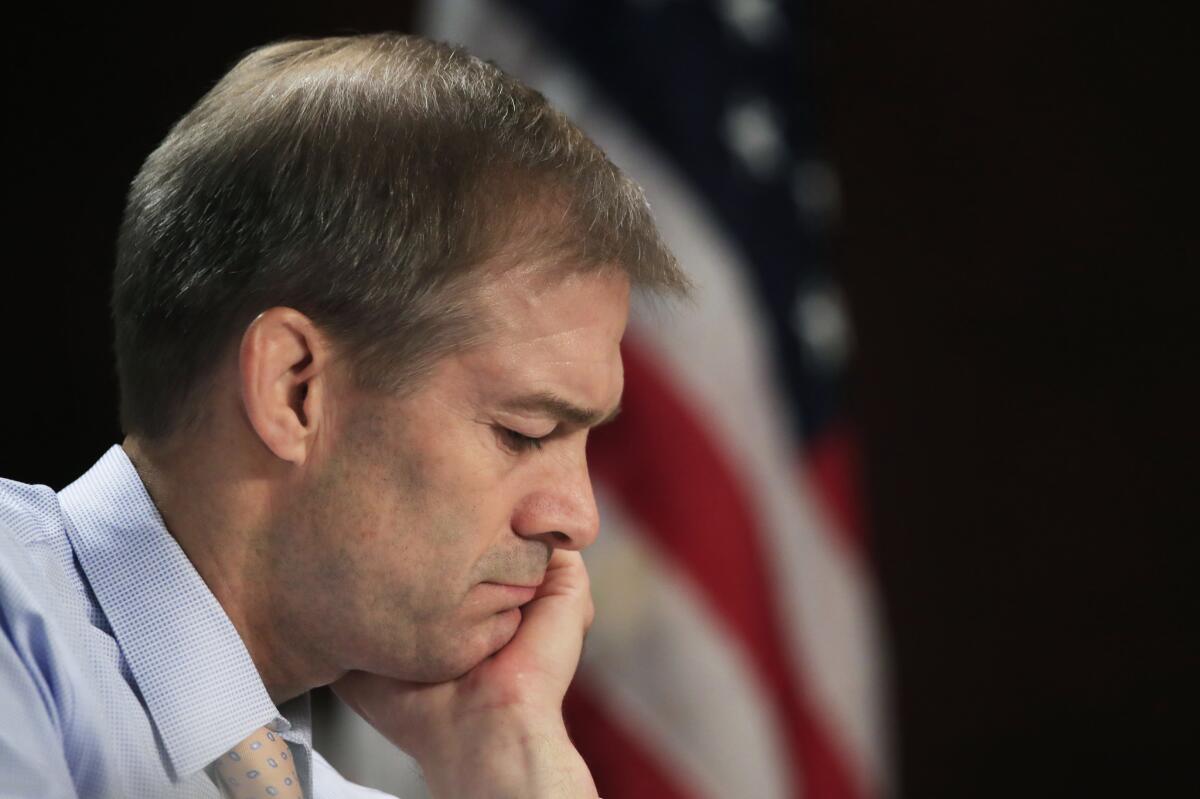
Jim Jordan needs a journalism lesson.
The Republican congressman from Ohio and Freedom Caucus founder is embroiled in an ongoing sex abuse scandal. A number of college athletes at Ohio State University have come forward to accuse Jordan of ignoring their reports of sexual abuse when he was an assistant coach for the wrestling team. Jordan has repeatedly denied all of it.
On Wednesday, he expressed his displeasure with the lamestream fake news media’s favorite last-ditch gotcha tactic: reporting.
The internet was swift to point out that finding and talking to sources is, in fact, a fairly standard journalistic practice.
Obviously, Jim Jordan would prefer that CNN just take his word for it that he never snickered at a student athlete reporting that he was touched inappropriately.
Former coaches and fellow Republicans have come to Jordan’s defense, including House Speaker Paul D. Ryan (R-Wis.), whose post Jordan is eyeing. Many of the comments will no doubt sound familiar: He’s a good man. It’s just because he’s Republican. This is fake news.
In this case, though, we can observe the “fake news” defense evolving in real time. Jim Jordan isn’t calling the results of CNN’s investigation fake news. He’s preemptively declaring the process of journalism to be inherently bogus, because it’s putting him in a bad light.
The tactic comes straight out of President Trump’s playbook. The “fake news” label is a way to automatically discredit anything that comes from the media, by virtue of the fact that it came from the media. It’s a signal to their supporters: You can ignore this. Truth doesn’t matter as much as #WINNING.
On Thursday, Rep. Matt Gaetz (R-Fla.) came up with another familiar theory to explain the accusations: Forget fake news. This is the so-called deep state at work.
“I think there are people that have some loose affiliation with the deep state that are out to get Jim Jordan, and this is the way that they are manifesting their hatred for a man who’s doing everything to fight for the regular folks in this country who want, demand and deserve the truth,” he told Lou Dobbs on Fox Business’ conservative safe space “Lou Dobbs Tonight.”
“A mission that you are also on, and we appreciate both you and Congressman Jim Jordan,” Dobbs said before swiftly ending the interview. No word yet on whether he’ll be interviewing any sources to back up those claims.
Another day, another political pardon from Trump

President Trump has made it clear that he relishes the exercise of the pardon power — one of the few realms in which he can act without worrying about interference by “so-called judges.”
Trump also has left no doubt that the quality of mercy in this administration droppeth disproportionately on recipients likely to be popular with his base.
Recipients of presidential clemency have included “Sheriff Joe” Arpaio of Maricopa County, Ariz.; conservative polemicist Dinesh D’Souza; and Kristian Saucier, a Navy sailor who served a year in prison for taking photographs of classified areas inside a submarine. Saucier had argued that his acts were no worse than Hillary Clinton’s use of a personal email server as secretary of State.
The pardons Trump granted this week to Dwight and Steven Hammond should also please his supporters, especially those in the West who seethe at the fact that the federal government owns so much land there.
The Hammonds, father-and-son cattle ranchers from Oregon, were sentenced to five years for setting federal land on fire. Outrage over their punishment led to the 2016 armed occupation at the Malheur National Wildlife Refuge, where ranchers and right-wing anti-government activists confronted federal agents.
Nevada rancher Cliven Bundy, whose sons led the takeover of the refuge, interpreted the pardons as presidential encouragement. “Now we’ve finally got a president of the United States who is paying attention to what is going on,” Bundy said.
By contrast, the former U.S. attorney whose office prosecuted the Hammonds called the pardons “a slap in the face” to the jury that convicted them. She accused Trump of catering to right-wing activists.
Yet there was a case for showing the Hammonds some mercy. Their five-year sentences were mandatory minimums that the judge labled “grossly disproportionate” and tried to circumvent, calling five years “a sentence which would shock the conscience.” (The Obama Justice Department objected to the more lenient sentences the judge tried to impose, a fact noted in the White House announcement of the pardons.)
Trump could have commuted the Hammonds’ sentences to time served, securing their freedom without seeming to endorse the idea that they had done nothing wrong or that they and other ranchers are victims of oppression by an illegitimate federal government. That would have been merciful, but it wouldn’t have sent the same political message.
Right-wing conspiracy nuts refuse to let go of their Seth Rich fantasy
Two years ago this week, Seth Rich was on the phone with his girlfriend as he walked home from a bar in the early morning hours. His girlfriend heard other voices on Rich’s end. Then the call abruptly ended.
The 27-year-old Democratic National Committee staffer was shot and killed in his Washington, D.C., neighborhood that morning. Local police investigated and determined it was a robbery gone wrong, possibly connected to a string of recent street robberies in the area.
But that’s not the story some conservatives like to tell. According to stories breathlessly reported by a wide range of right-leaning sites, Rich was a deep-state whistleblower who leaked thousands of DNC emails to WikiLeaks, then found himself in the crosshairs of Hillary Clinton’s presidential campaign.
On Tuesday — two years to the day after Rich’s death — Republican lobbyist and Newsmax host Jack Burkman held a news conference to announce that a masked witness would reveal new details about Seth Rich’s murder.
According to the Daily Beast’s Will Sommer, who live-tweeted it, the whole thing was a bit of a bust. The masked man didn’t show. Instead, after some technical difficulties, Burkman put the alleged witness on an iPhone speakerphone. The disembodied voice claimed that in late 2016, he overheard federal agents who were working for U.S. Deputy Atty. Gen. Rod Rosenstein bragging about killing Rich and getting away with it.
Not coincidentally, that would be the same Rod Rosenstein now overseeing special counsel Robert S. Mueller III’s investigation into Russian meddling in the 2016 presidential campaign.
A quick overview of where the Seth Rich conspiracy theories originally came from: A few weeks after Rich’s death, Wikileaks founder Julian Assange appeared to implicate him as the person who had leaked the DNC’s emails. The idea quickly gained popularity with the same reality-challenged crowd trying to investigate whether there was a child sex trafficking ring being run out of a Washington pizzeria.
Rich’s death was reported on at length by Fox News host Sean Hannity. The network was ultimately forced to retract a story claiming an independent investigator had uncovered evidence linking Rich to the DNC email leak.
(Read more: How Seth Rich’s death became an Internet conspiracy theory)
Rich’s slaying is a convenient political football for this crowd: If Rich is the one who hacked the DNC to release the emails, then the culprit couldn’t have been Russia, as the intelligence and national security officials in the Obama administration concluded. It would be more evidence to exempt Russia from accusations of meddling in the 2016 election. If Rich had been slain by Democratic operatives, it would be another name on what conspiracy theorists call the “Clinton body count.” It would prove that the mainstream media moved on from the story because it made Hillary Clinton and the Democrats look bad. The people who desperately want these things to be true refuse to let this case go.
In reality, Rich had worked as a data analyst for the DNC, where he developed an app to help voters find their polling place. Just days before his death, Clinton’s presidential campaign had offered him a job.
His parents wrote in an op-ed in the Washington Post that none of his work would have involved having access to high-level emails. Detectives investigated his computer and email account and found no evidence that he’d been in contact with WikiLeaks.
“Seth’s job was to develop analytical models to encourage voters to turn out to vote. He didn’t have access to DNC emails, Democratic Congressional Campaign Committee emails, John Podesta’s emails or Hillary Clinton’s emails. That simply wasn’t his job,” they wrote.
Of course, that’s not a terribly compelling story for the right-wing conspiracy nuts.
Rich’s parents published their op-ed begging conservative media to stop politicizing their son’s murder in May 2017. A year later, they filed a lawsuit against Fox News for the retracted story.
Hannity vowed that he would keep searching for the truth. The truth is this: Seth Rich was one of more than 38,000 people who died from gun violence in the United States in 2016. There is, ironically, a big-government conspiracy involved here. It’s about the gun industry’s death grip on politicians. Someone should really tell Hannity about that.
Forget about Roe v. Wade. Did you hear Brett Kavanaugh is a great dad? And a great coach!
Whatever you think of Brett Kavanaugh as a Supreme Court nominee — brilliant jurist, threat to Roe vs. Wade, spawn of the Federalist Society — you can be sure of this: He’s a great dad and a great coach.
So says Julie O’Brien of Chevy Chase, Md., in an opinion piece in the Washington Post.
She writes:
“Brett’s older daughter and mine have been classmates at Blessed Sacrament School, a small Catholic school in the District, for the past seven years. On evenings and weekends, you’re likely to find Brett at a local gym or athletic field, encouraging his players or watching games with his daughters and their friends. He coaches not one but two girls’ basketball teams. His positive attitude and calm demeanor make the game fun and allow each player to shine.”
But wait! There’s more:
“In the summer, Brett is the ‘carpool dad,’ often shuttling students to and from practices, games and activities.”
Democrats might see this as an attempt to humanize a controversial Republican figure. But Merrick Garland, President Obama’s ill-fated Supreme Court nominee, got the same treatment in the Washington Post two years ago in a staff-written profile that revealed that the judge had been a volunteer tutor at a school in Washington, D.C., for 18 years.
Here’s a sample:
“’When I have problems with my math homework, he’ll help me with that,’ said Vernell [Garvin], a fifth grader at J.O. Wilson Elementary School in Northeast D.C. ‘He’s a very good person. He never does anything wrong. He deserves the job.‘”
Aww. It seems that the U.S. Court of Appeals for the District of Columbia Circuit, where Kavanaugh and Garland sit, should be renamed the Court of Nice Guys.
You might ask why it matters that a Supreme Court nominee is a doting father or caring volunteer, but newspapers long have been in the business of showcasing the “human” side of public figures. And the human-interest factor has its political uses as well: It wasn’t an accident that Kavanaugh’s photogenic family was with him at the White House Monday evening when Trump introduced him as his nominee.
Sometimes presidents have to reach to make the point that a nominee is a regular guy. When Obama introduced Garland, he noted that “he put himself through Harvard Law School by working as a tutor, by stocking shoes in a shoe store, and, in what is always a painful moment for any young man, by selling his comic book collection.”
And when President George W. Bush introduced the future Chief Justice John G. Roberts Jr., Bush mentioned that Roberts “worked summers in a steel mill to help pay his way through college.” (Bush didn’t add that Roberts’ father had been the general manager of Bethlehem Steel plant.)
Is it important that Supreme Court justices be good fathers and volunteers or that they worked their way through school in a humble occupation? Probably not. Was Justice Louis Brandeis a Little League coach? Did Harlan Fiske Stone ladle soup for the poor? Did John Marshall drive the horse-and-carriage equivalent of carpool? But considering how tough the confirmation fights have become, the nice-guy factor can’t hurt.
$145 million to pop the question in space? You’re kidding, right?
For those space-geek billionaires who’ve already run through the Neiman Marcus Christmas catalog of ways to spend on your girlfriend — matching Rolls-Royce limited edition Dawns, for example — here’s a novel way to impress: Propose to her on a round-the-moon flight.
A French company that specializes in marriage proposals in Paris (mais bien sur!) has, apparently, extended its turf to the moon, offering a $145 million voyage to the moon to propose. That includes a launch from Cape Canaveral, a cozy autonomous capsule ride for two toward the lunar surface, and, at just the right moment, the romantic crooning of Frank Sinatra on “Fly Me to the Moon.” Cameras positioned around the capsule will snap photos and save the happy couple from having to selfie themselves as he puts a ring on it.
Landing on the mood is not included. About 125 miles is as close as you’d get.
I know we’re all enamored of the idea of space travel. But this is so wrong in so many ways, I hardly know where to start.
For one thing, I can think of about 145 better ideas for spending $145 million. Even on the proposal. Just spend a million on the engagement ring. How about a rare pink-orange padparadscha sapphire ring, like the one that Britain’s Princess Eugenie (the daughter of Sarah Ferguson and Prince Andrew) sports? That would make some women (me among them) content enough. How about spending it on the wedding? Or a year in Paris on honeymoon instead of a week going back and forth to the moon? How about housing a couple hundred homeless people?
For another thing: What if she says “No”? What then? Imagine the misery for both people stuck in their spacesuits in a capsule for another few days. Alone with their thoughts and Frank Sinatra on a loop.
And, by the way, the guy doesn’t get to whisk away his potential fiancee to Cape Canaveral on the spur of the moment. The flight is preceded by three months of training, which starts with an extensive medical exam. I do opinion writing for a living, but never have I been so confident of this opinion: No woman on the planet wants to step on a scale and get weighed as a precursor to a marriage proposal.
So, travel in space if you want. (And I know it’s pricey.) But don’t spend $145 million on a trip 238,900 miles from your home planet to ask a question you don’t know the answer to.
How the then-homophobic L.A. Times handled Tab Hunter’s secret gay life in Hollywood
Tuesday’s obituaries of Tab Hunter, a blue-eyed Hollywood heartthrob from the 1950s, conjured a glamorous old movie colony world — but one full of secrets.
Fame, stardom, natty white tennis sweaters, enormous estates and passionate romances were all part of the story, but there were also hidden lives for the industry’s gay men and women, impromptu raids by the LAPD vice squad at bars and houses throughout Los Angeles, vicious scandal sheets that could ruin careers.
This was written about mostly between the lines if you read the Los Angeles Times in those days, or it was ignored altogether.
In 1954, for instance, The Times published a column by gossip writer Hedda Hopper in which she asked a series of young stars about their love lives. She called it “Four Bachelors Tell Why They Defy Cupid.”
“Tab Hunter told me recently that maybe the fact that there are so many beautiful girls here is the reason some of the fellows stay bachelors,” Hopper wrote. “‘Picking one from so many girls,’ he said, ‘is like making a selection from a tray of fine French pastries. They all look so good, it’s hard to make a choice.”
But that was not why he was not involved with a woman.
Three years later, Hopper sat him down again and pushed him on his rumored romantic relationship with Etchika Choreau, “the little French star he was planning to see in Paris.”
Those elaborate untruths co-existed with a nasty rumor mill that was always threatening exposure. Three months after the second Hopper interview, The Times reported that Hunter was subpoenaed in connection with a criminal libel conspiracy trial involving the scandal and gossip magazine Confidential. The Times said Hunter had been “the subject of a Confidential article” without offering details. (According to a New Yorker article from 2015, Confidential reported Hunter’s arrest at a “limp-wristed pajama party.”)
Hunter kept his sexual orientation as secret as he could during those years. It was only 50 years later that he publicly discussed being gay, writing in a memoir about experiences going back to childhood. He wrote that he had confessed to a priest about a homosexual experience when he was 14, only to be shamed and attacked.
The Times, for its part, repeatedly described homosexuality in the 1950s as deviant, a disease, possibly dangerous. In 1958, the paper published a series of 12 articles on the “Crisis in Morals,” which asked the question whether homosexuality was a “sin or sickness.” The author concluded that “It may well be both.”
“For a time serious scientists investigated the possibility that this deviation might be ‘natural,’ that there might indeed be a third, or intermediate, sex,” the paper reported. “The search led nowhere and only a cult-like fringe holds to the belief today. Modern science for the most part views homosexuality as a personality disease comparable to alcoholism or drug addiction.”
In 1961, a series on the “cancer-like spread of vice” in Los Angeles found that “based on sex surveys, health officials estimate that 4% of the national male population is homosexual. In the Los Angeles area, however, they boost the estimate to 10% — about 140,000!”
Indeed, there was a substantial gay subculture in the city, including legally operating gay bars and early gay rights groups like the Mattachine Society, which was founded in Los Angeles in 1950.
Very little was written in The Times over the years about the raids and arrests of homosexuals, such as the party where Tab Hunter was arrested. According to The Times’ obituary of Hunter, the studio “scuttled the story.”
How much power would Brett Kavanaugh give Trump?

Now that President Trump has nominated Brett Kavanaugh to the Supreme Court, we in the punditocracy will be poring through the many decisions he has published for portents about how he might act on the nation’s highest court.
Here’s one tidbit worth savoring from Kavanaugh in 2011:
“Under the Constitution, the President may decline to enforce a statute that regulates private individuals when the President deems the statute unconstitutional, even if a court has held or would hold the statute constitutional.”
Kavanaugh is arguing here that the federal courts aren’t the only branch of government capable of determining the constitutionality of a statute. That reasoning may surprise anyone with a conventional view of the Constitution’s separation of powers, but it’s based on Kavanaugh’s reading of what the nation’s founders had in mind.
Some critics have seized upon this passage as a sign that Kavanaugh would be just fine with Trump shutting down all or part of Obamacare because this administration considers key parts to be unconstitutional. Goodbye, protections for Americans with preexisting conditions! And that’s just the start — who knows what other Democratic initiatives might run afoul of this administration’s sense of what does and doesn’t violate the Constitution?
Before you plunge off the deep end, bear in mind that the quoted passage comes a footnote in a 65-page dissent Kavanaugh wrote as a D.C. Circuit judge. So it’s not just dicta, it’s dicta in passing. So I wouldn’t leap to the conclusion that Kavanaugh is primed to give this flighty president and his wacky general counsel — a man who helped drive the Federal Election Commission into a ditch with his ridiculously narrow readings of the law — a pretext to ignore federal laws they don’t like.
Yet it does tell us something about Kavanaugh’s view of the law: If not a pure originalist, he’s at least a sympathizer. That means he’s willing to rely on 18th century commentaries to try to divine meanings in the Constitution that may not be apparent from the black-letter law.
In the footnote, Kavanaugh cited a concurring opinion by Justice Antonin Scalia in 1991 that explored at length the president’s appointment powers, along with the founders’ efforts to protect those powers from usurpation or encroachment by Congress. Here’s the relevant passage from Scalia:
“Thus, it was not enough simply to repose the power to execute the laws (or to appoint) in the President; it was also necessary to provide him with the means to resist legislative encroachment upon that power. The means selected were various, including a separate political constituency, to which he alone was responsible, and the power to veto encroaching laws, see Art. I, § 7, or even to disregard them when they are unconstitutional.”
For support, Scalia cited a 1989 law review article by a federal appeals judge, Frank H. Easterbrook, on the president’s power to review laws. Easterbrook argued that presidents are just as empowered as the courts to make judgments about whether a law is constitutionally valid. But he also wrote that the president’s power to review a law “is neither a power to nullify nor a power to disregard judgments” made by the courts about the Constitution. The president has a duty to obey court orders, but not to accept a court’s judgment that a statute is constitutional.
Easterbrook relied on the writings of several of this country’s founders, including James Madison and James Wilson. For his part, Kavanaugh cited some much more recent thinking — to wit, Supreme Court rulings from 1990, 2000 and 2008 — in arguing that a president’s power to review laws had a crucial limit.
“This power does not work in reverse, either for the President or Congress,” Kavanaugh wrote. “In other words, the President may not enforce a statute against a private individual when the statute is deemed unconstitutional by the courts. Nor may Congress pass a statute and have it enforced against private individuals simply because Congress disagrees with the Supreme Court. In those situations, the Judiciary has the final word on the meaning of the Constitution.”
Spoken like a member of the judicial branch.
Banning straws is literally the least Starbucks can do to reduce single-use plastic

Starbucks jumped on the anti-plastic straw bandwagon Monday, announcing that it would eliminate all plastic drinking straws from its 28,000 outlets by 2020.
Don’t get too excited. All the cool kids are doing it. At some point last year, the ubiquitous tubes were suddenly transformed in the public imagination from innocuous beverage-delivery tools into Ocean Menace That Kills Sea Turtles and Must Be Stopped.
The speed of the straw takedown was stunning considering how long it took (is still taking) for California to phase out the much-larger environmental devil of plastic bags. And though I want to provide positive reinforcement when such an influential brand (and huge source of plastic trash) takes the lead to reduce a billion pieces of single-use plastic every year… I can’t quite work up any praise.
Dumping straws is literally the least Starbucks can do to reduce single-use plastic.
Just look at attached photo: The straw is the smallest piece of the cold drink ensemble. Straws themselves account for a tiny portion of the 8 million tons of plastic that experts estimates enter the oceans every year. I’ll wait until the coffee giant makes good on its efforts to lose the plastic cups and lids.
If Starbucks is handing out a billion straws every year, that means at least that many plastic cups and lids are being used. Some of those lids will be bigger than they are now because Starbucks is planning to use plastic lids designed for easier sipping for some drinks, which takes a bit of a wind out of the straws announcement.
Reducing humanity’s plastic footprint on land and in the sea will take bigger, bolder steps that this.
Something on the scale of the sweeping disposable plastic ban enacted by the government in the Indian city of Mumbai last month. That city of more than 18 million issued a sweeping ban of disposable plastic, criminalizing those who use the stuff. First offense, pay a fine. Serial offenders may be jailed.
That seems extreme, but then the plastic trash situation in India is more than extreme; it’s a crisis. Although the country has a lower per-capita rate of single-use plastic than western countries, India doesn’t have developed recycling and waste management systems. Instead, much of the 33.1 pounds of plastic waste produced in that country every day ends up in the environment.
The U.S. already incarcerates too many people for nonviolent offenses. Still, if banning straws is the best we can muster in the face of an ocean fast filling up with plastic trash, maybe some form of disposable plastic extremism is in order.

There is no scenario in the Ohio State abuse scandal where Jim Jordan isn’t a terrible leader
The heat on powerful Rep. Jim Jordan (R-Ohio) isn’t dying down. Several more former Ohio State wrestlers accused him over the weekend of lying about his knowledge of sexual abuses allegedly committed by former team Dr. Richard Strauss while Jordan was an assistant wrestling coach at the school.
Jordan has repeatedly dismissed the allegations against him, suggesting he knew nothing about the alleged abuse and that “the timing is suspect” in the wake of his high-profile confrontation with Deputy Atty. Gen. Rod Rosenstein.
Yes, because the first thing on alleged sexual abuse survivors’ minds as they fight for justice is how to make Jordan look bad after a showboating face-to-face with Rod Rosenstein, of all people. Decades of trauma saved up to score a political point on an issue totally unrelated to their case.
It sure sounds an awful lot like Jordan did nothing while a sexual predator preyed on his students — and is now gaslighting alleged victims of sexual abuse to cover his own moral and ethical failures.
Remember, the scandal here is much larger than a handful of former wrestlers who claim Jordan knew about Strauss and did nothing. Ohio State has identified purported victims across 14 different sports. Some estimates for Strauss’ full number of alleged victims range in the thousands.
It’s pretty clear that horrible acts of sexual abuse seem to have occurred under Jordan’s nose at Ohio State. The only thing in question is if he knew about them.
With that in mind, let’s take Jordan at his word that he was ignorant about the abuse as it was allegedly occurring at Ohio State.
Here’s the scenario:
Jordan is a former University of Wisconsin wrestling star who went on to coach wrestling at Ohio State. Naturally, his kids looked up to him. He was a hero.
The years went on, students came and went, and Jordan moved into politics. He developed power and influence. He was somebody. It was only a matter of time before one of his former students reached out for help.
One did, and he needed it desperately. The former student says he was sexually assaulted by Strauss. He wasn’t alone. Dozens of other students were coming forward with the same story of alleged abuse — at the hands of the same person. After years of silent suffering, Jordan’s former wrestlers and others wanted justice, and they were counting on Jordan to go to bat for them.
What would a decent person do in this scenario?
A. Publicly express outrage and do everything he could to help his former student and other victims seek justice.
B. Use whatever leverage he has to quietly pressure his former school and law enforcement into taking the matter seriously.
C. Tell the former student “it’s not my problem” and send him on his way.
Jim Jordan was confronted with this very scenario. He chose C.
And that is the most generous way to describe his actions. The reality is worse.
When asked by his former student for help, not only did Jordan say, “No thanks,” but he called the police on said man when his cries for help became politically inconvenient.
Jordan could have been an ally to his former students. Even if he’s ignorant about the alleged abuse, he could have spoken out in support of alleged victims. He could still have tried to help. Instead, he abandoned his moral and ethical responsibility to protect his career.
Jim Jordan may or not be complicit in the horrific abuse at Ohio State, but even if you believe Jordan — and, to be clear, I don’t — there’s no scenario in this mess where he’s a good person.
Correction: An earlier version of this piece said Jordan wrestled at Ohio State. He only coached at the school.
Three of Trump’s Supreme Court finalists are Catholics. Does it matter?
Three of the four judges on President Trump’s supposed short list to replace Supreme Court Justice Anthony Kennedy are Catholics. But who’s counting?
I am. As a Supreme Court buff and a student of American history, I find it interesting that Judges Thomas Hardiman, Brett Kavanaugh and Amy Coney Barrett are all members of the church. (The fourth finalist, Judge Raymond M. Kethledge, is an evangelical Protestant.)
Kennedy is also a Catholic, but if Trump nominated one of Kennedy’s co-religionists, it wouldn’t be to perpetuate a token “Catholic seat.” Even if Kennedy were replaced by a non-Catholic, there would still be either four or five Catholics on the court, depending on how you categorize Justice Neil Gorsuch. (He was raised as a Catholic but reportedly attends an Episcopal church with his wife who was raised in the Church of England.) The other three justices are Jewish.
Why so many Catholics on the court? To some extent, as I suggested in this piece, the proliferation of Catholics reflects the fact that members of that once working-class faith now attend the elite law schools from which justices have been exclusively drawn. (Kennedy, Chief Justice John G. Roberts, the late Justice Antonin Scalia and Gorsuch all graduated from Harvard Law School; Justices Clarence Thomas and Samuel A. Alito Jr. went to Yale Law School, as did Trump short-lister Judge Brett Kavanaugh.)
Whatever the explanation, the large number of Catholic justices might seem to make it unlikely that religion will be an issue if Trump nominates yet another one.
But don’t be too sure. One of the finalists, Barrett, may owe her presence on the short list to the fact that, during her confirmation for her current position, Sen. Dianne Feinstein clumsily questioned her about whether her religion would unduly influence her rulings as a judge. (In a line that I suspect she regrets, Feinstein told Barrett that “the dogma lives loudly within you.”)
If Barrett is the nominee, look to her defenders to accuse senators who oppose her of anti-Catholicism.
But the “anti-Catholic” card might also be played against critics of some of the other prospective nominees. That could happen if Democrats were foolish enough to take their cue from Jay Michaelson, a columnist for the Daily Beast.
In a piece posted on Monday, Michaelson highlighted the Catholic connections of Leonard Leo, the Federalist Society vice president who has advised Trump in the judicial-selection process. He asserted that when Trump names his nominee, “he will be carrying out the agenda of a small, secretive network of extremely conservative Catholic activists already responsible for placing three justices (Alito, Roberts, and Gorsuch) on the high court.”
Going into Dan Brown mode, Michaelson noted that “Leo is a member of the secretive, extremely conservative Knights of Malta, a Catholic order founded in the 12th century that functions as a quasi-independent sovereign nation with its own diplomatic corps (separate from the Vatican), United Nations status, and a tremendous amount of money and land.” (The sub-headline on Michaelson’s story describes Leo as a “Catholic fundamentalist,” as oxymoronic a coinage as “born-again Unitarian.”)
Writing in the New Republic, Jeet Heer protested that, despite Michaelson’s disclaimer of anti-Catholic prejudice, his emphasis on Leo’s religion “replicates the anti-Catholic conspiracy theories of yore.”
I’d make another point. Catholic justices aren’t interchangeable on issues of interest to the church hierarchy, including abortion. Justice William Brennan, who reportedly was chosen by President Dwight D. Eisenhower to appeal to Catholic voters, was in the majority in Roe vs. Wade. Kennedy was a key vote in 1992 to uphold the “essential holding” of Roe. Roberts, Thomas, Alito and Gorsuch aren’t conservative because they’re Catholics, but because they were chosen by Republican presidents who cared about judicial philosophy.
If Trump’s nominee is a Catholic and critics make an issue of his her or religion, even obliquely, expect an overheated accusation of anti-Catholicism from the administration.
More than a decade ago, when President George W. Bush nominated Alabama lawyer William Pryor, a Catholic, to the U.S. 11th Circuit Court of Appeals, Sen. Chuck Schumer (D-N.Y.) said of Pryor that “his beliefs are so well known, so deeply held that it’s very hard to believe — very hard to believe — that they’re not going to deeply influence the way he comes about saying, ‘I will follow the law.’” Among Pryor’s defenders was his fellow Alabamian, then-Sen. Jeff Sessions, who referred to Pryor as “this solid Catholic individual,” implying that Pryor was being picked on for his religion.
Democratic senators are free to criticize Trump’s nominee and to assail Trump for “outsourcing” his selection process to the Federalist Society and the Heritage Foundation. They can even ask whether a nominee would allow personal beliefs to affect how he or she interpreted the Constitution (though it’s hard to imagine the answer would be anything but no). But if the nominee is a Catholic, it probably would be wise not to play the religion card.
Trump says he won’t appoint an activist to the Supreme Court. Oh yes he will
In his weekly address, President Trump described the sort of Supreme Court justice he planned to nominate in terms near and dear to the hearts of conservatives: one who does not engage in “judicial activism.”
When picking a replacement for retiring Justice Anthony Kennedy, Trump said, his “greatest responsibility” is to find someone who will “faithfully interpret the Constitution as written.” He added, “Judges are not supposed to re-write the law, re-invent the Constitution, or substitute their own opinions for the will of the people expressed through their laws. We reject judicial activism and policy-making from the bench.”
Ahh, judicial activism — the supposed hallmark of liberals on the bench. Whether that’s true, though, depends on how one defines the term.
The simplest definition, as (liberal) legal scholar Erwin Chemerinsky wrote in The Times a few years back, “is that a court is activist when it is invalidating laws and overruling precedent, and restrained when deferring to popularly elected legislatures and following prior decisions.” From that perspective, Trump’s first appointee to the Supreme Court, Justice Neil Gorsuch, earned his activist stripes in his first year on the bench, honoring precedent in theory but not in practice.
Granted, conservatives are more apt to see activism as reading things into federal laws or the Constitution that simply aren’t in the text. But even the former justice whom Trump often cites as a model, the late Antonin Scalia, qualifies as an activist judge under that definition. See, for example, the individual right to own a gun that he laid out in the Heller decision.
And as for not disturbing settled law, Scalia himself once wrote: “I do not myself believe in rigid adherence to stare decisis in constitutional cases; but I do believe that we should be consistent rather than manipulative in invoking the doctrine.”
Let’s face it: Judges of all stripes engage in activism when it suits them, and they rail against it when it suits them. Witness Chief Justice John Roberts’ tut-tutting dissent in the online sales tax case (South Dakota vs. Wayfair), where he waggled his finger at the majority for reversing a ruling from 1967, a mere six days before joining the majority in reversing a 1977 ruling about public-employee union dues.
So the president should spare us the sanctimony about judicial activism — especially when he promised as a candidate that the justices he appointed would be activist enough to throw out 45 years’ worth of settled law on a woman’s right to an abortion.
Whose stolen Supreme Court seat was it, anyway?
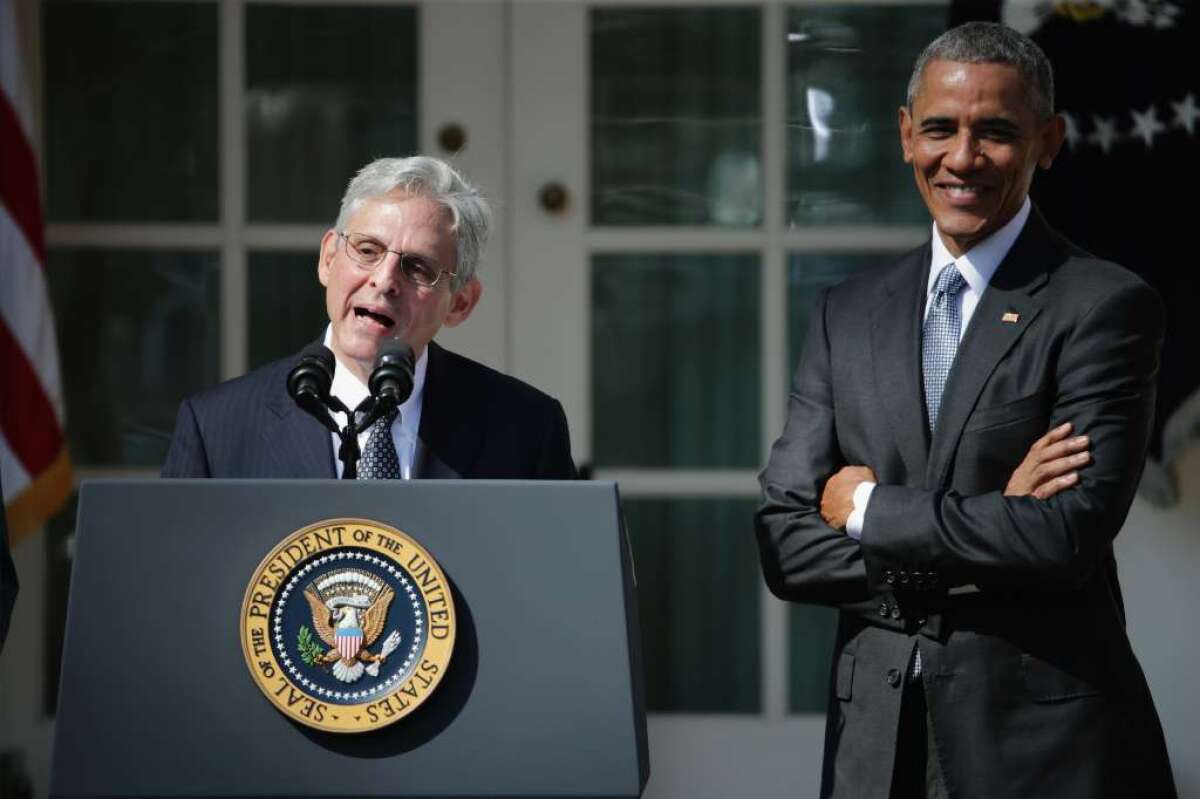
The odd news item of the week was that Senate Democratic leader Chuck Schumer recommended President Trump appoint Merrick B. Garland to the Supreme Court seat being vacated by Justice Anthony Kennedy.
According to the Washington Post, Schumer suggested that naming Garland — the federal appeals court judge who was denied a hearing after former President Barack Obama nominated him to succeed the late Antonin Scalia — would help unite the country. It would apparently be a form of restitution.
Schumer wasn’t the only one to mention Garland. The day before Kennedy announced his retirement, the journalist Matthew Yglesias tweeted: “The theft of Merrick Garland’s Supreme Court seat is legitimately the greatest heist in world history.”
Garland’s seat? It’s not unusual to assert that the seat for which Garland was nominated — now occupied by Trump appointee Neil Gorsuch — was “stolen.” The Los Angeles Times used the S word in an editorial, though we enclosed it in quotation marks.
But that editorial referred to the fact that “Republicans took the opportunity to fill the vacancy away from Barack Obama without justification and delivered it up instead to Donald Trump.” That’s the usual formulation: that the victim of the theft was Obama, who was denied the opportunity a sitting president deserves to try to shape the Supreme Court with an appointment.
Of course, even if Obama had been successful, there is no guarantee that Garland always would have voted the way his benefactor hoped. After all, Justices Elena Kagan and Sonia Sotomayor sometimes vote against the position of the Obama administration. (Here’s one example.) Still, most people who talk about the “stolen seat” conceive of Obama as the victim of Republican larceny, not Garland.
And remember: Although Hillary Clinton during the campaign called Garland “highly qualified” and asked the Senate to act on his nomination, there was no guarantee that if elected she would have renominated him. Some Democrats hoped that she would go for a younger, less centrist choice. That makes Schumer’s suggestion even odder.
Scott Pruitt was a human ethical lapse. The fight to replace him will be political gold for Democrats
Republicans who secretly wished for an opening at the top of the Environmental Protection Agency got it on Thursday, when ethically challenged EPA administrator Scott “Security Detail” Pruitt tendered his resignation. But this one may fall into the category of “be careful what you wish for.”
Pruitt became the subject of multiple internal investigations and external scandals, thanks to such questionable moves as spending outrageous sums on bodyguards to fend off nonexistent death threats, ordering a rule-busting $43,000 soundproof phone booth to be built in his office and using an EPA employee to help him seek a Chick-fil-A franchise for his wife.
This kind of personal misconduct cast a pall over his far-right agenda at the EPA, which reversed Obama administration initiatives on air and water pollution, climate change and other threats. Had Pruitt stuck to cozying up to executives for polluters regulated by his agency, he’d probably still be running the EPA today. That’s not the sort of sketchy behavior that gets you in trouble with many deregulatory Republicans in Washington. But no, he went much, much further — for example, by accepting an implausibly sweet deal on a Capitol Hill condo from the wife of an energy industry lobbyist.
Now, Trump has the chance to nominate someone ethically upstanding to run the EPA into irrelevance. No more taint of venality — just a hopelessly cramped reading of federal environmental statutes and a whole lot of faith in the free market to keep industry from externalizing the costs of its toxic operations.
Assuming the president can find such a person to finish the work Pruitt started, environmentalists might grow nostalgic for the days when the administration’s policies on climate change, clean air and clean water were associated with a human ethical lapse.
But there’s a bright side of Pruitt’s departure for those who want environmental laws enforced and climate change taken seriously. Like the battle over Trump’s next Supreme Court nominee, the fight over whoever replaces Pruitt could energize voters who oppose the administration’s environmental policies.
If the EPA job remains open on election day, then the next Senate is likely to decide who replaces Pruitt. And if Democrats pick up three seats — admittedly unlikely, given the states with senators running for election — they’ll hold the fate of Trump’s nominee in their hands.
Unless Trump moves with the sort of alacrity to replace Pruitt that he’s has to replace retiring Supreme Court Justice Anthony Kennedy, the November election will clearly be a referendum on environmental protection. And while there are plenty of other issues out there (most notably, healthcare and insurance premiums), a vacancy at the EPA subject to Senate confirmation would present the kind of stark, binary choice for voters that political activists dream about.
Look forward to lots of 30-second ads featuring smokestacks belching out black clouds and pipes dumping sludge into rivers.
Trump is not a normal president. Should Democrats treat his Supreme Court choice like a normal nominee?
Running a successful democracy requires compromise, concessions, shared values and a measure of respect for one’s political opponents. That’s why some people argue for calm and caution in the upcoming process to appoint a Supreme Court justice to replace Anthony Kennedy.
They argue that the elected president is empowered by the Constitution to nominate Supreme Court justices — and that he should be granted some latitude to do so. Rather than politicizing the process or seeking to make the court hyper-partisan, the theory goes, the president should select able, thoughtful nominees who are not extremists — and members of both parties in the U.S. Senate, which is tasked with confirming or rejecting the president’s nominees, should give a measure of deference to the president’s choice.
That was the theory under which the liberal editorial page of the Los Angeles Times, for instance, endorsed John Roberts to be chief justice, despite concerns about some of his positions.
“Roberts is an exceptionally qualified nominee, well within the mainstream of American legal thought, who deserves broad bipartisan support,” the editorial board wrote. “If a majority of Democrats in the Senate vote against Roberts, they will reveal themselves as nothing more than self-defeating obstructionists.”
But even if you believe in that approach in theory, has the calculus changed? In the Trump era, should liberals still accept those old-fashioned norms — or are we in a war where such rules no longer make sense?
Consider the following arguments circulating on the left:
- This particular president is so aberrant, extreme and irresponsible that it would be reckless to offer him the traditional deference.
- The addition of what Trump’s people are calling a “reliable conservative” to the court would shift the balance for decades to come on virtually every important issue that faces the country, from privacy to immigration to healthcare, abortion to presidential power to voting rights to affirmative action to climate change. A rolling back of certain constitutional rights seems likely.
- A seat that should have been filled by President Obama was “stolen” in 2016 when Mitch McConnell’s GOP-controlled Senate outrageously refused to act on Obama’s nomination of a rational moderate appellate judge, Merrick Garland, to the Supreme Court. So it would be a sucker’s game to roll over and give the conservatives a clear majority now.
- McConnell’s cynical decision to stand in the way of Garland’s ascension effectively tossed out the window all the “norms” that we have about how the process should work — the latest and most egregious reflection of a downward spiral that might have started decades ago with the rejection of two of President Nixon’s nominees, or the defeat of Reagan nominee Robert Bork, or the Anita Hill controversy over Clarence Thomas.
This is the state of the debate as Trump prepares to announce his choice. Should responsible people in the Senate seek to move us back to a more genteel time when, at least in nostalgic memory, the system worked and both sides could be counted on to behave responsibly? Or are we in a state of war now where we should fight with every ounce of strength we’ve got?
Oh, brother. Trump wants a Supreme Court justice he can feel warm and fuzzy about
U.S. presidents have to work closely with members of their Cabinet, so it makes sense for presidents to pick people with whom they have a good rapport. I mean, if you may have to spend tense hours in the Situation Room or even days at Camp David with them, you don’t want a bunch of people whose dad jokes offend you or whose posh accent grates on your nerves.
But there’s no need for any kind of chemistry between a commander in chief and a Supreme Court justice, which is why it’s so odd that President Trump’s choice of a nominee to replace retiring Justice Anthony Kennedy reportedly will come down to that.
Axios’ Mike Allen wrote Thursday that “a White House official involved in the vetting process” confided that Trump’s pick “will come down to ‘who he feels most comfortable with in a personal setting.’ ” As my colleague Patt Morrison said on Twitter, “In politics, this is known as the ‘someone-you’d-like-to-have-a-beer-with’ standard.”
That’s how the notoriously by-the-gut Trump makes many of his personnel decisions. But the president doesn’t pick up the phone and ask the justices whether he should veto a bill or slap tariffs on solar panels. They don’t work together — in fact, their branches of government are, to a degree, adversarial.
Besides — and no offense — is anybody in America eager to have a beer with Justices Samuel Alito or Stephen Breyer? Admittedly, the late Justice Antonin Scalia was said to have been great dinner-party company, and there’s something of a personality cult around Justice Ruth Bader Ginsburg. But such folks aren’t on the nation’s highest court because they’re experts in the art of the schmooze. They’re justices because they’re experts in the Constitution, the court’s precedents, legal argumentation and the like.
I’ll take a cold fish with a clear and smart approach to the dormant commerce clause any day over a magnetic speaker who doesn’t understand the difference between streaming and cable TV.
More important, this president’s policies are being challenged in court to a seemingly unprecedented degree, and whoever he picks is likely to be asked multiple times to decide the fate of Trump’s policies and his use of executive power. That’s what makes the notion particularly unsettling of Trump picking the judge with whom he gets along most famously.
One can only imagine the subtle ways Trump might have tried in those private meetings with his Supreme Court short-listers to measure whether they would feel loyal to him, or at least a little beholden, for being nominated. Come to think of it, one can imagine some not-so-subtle ways too.
Quit hyperventilating. Trump did not just change the rules on affirmative action
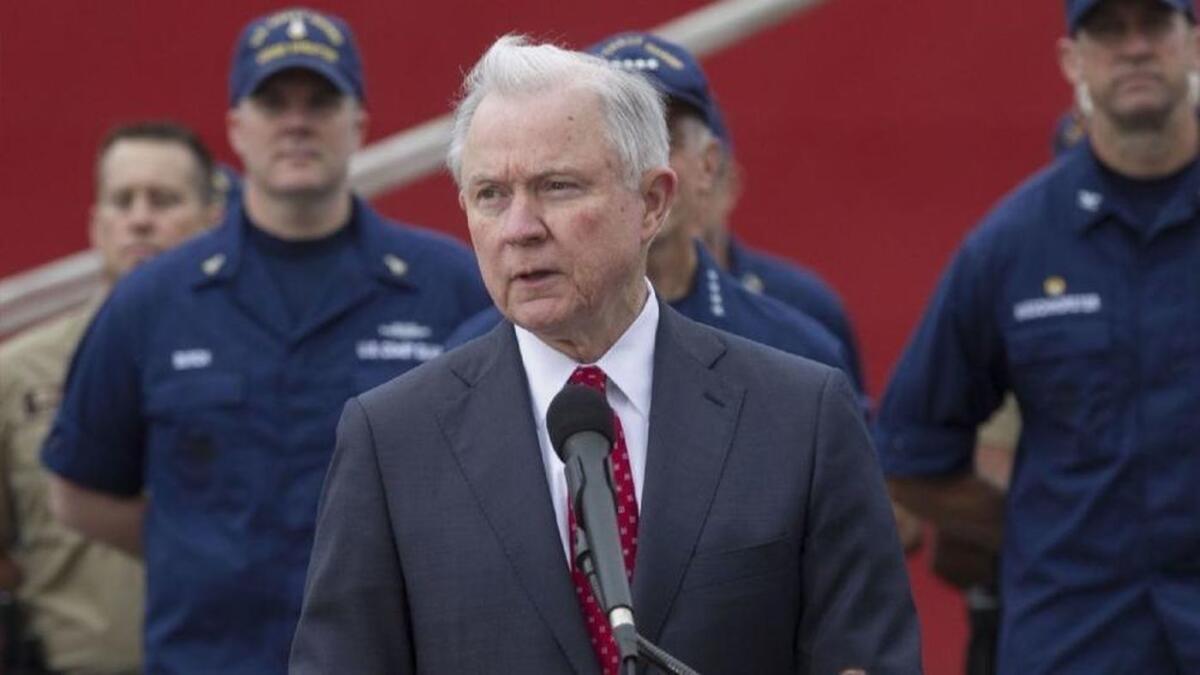
On Tuesday, the Trump administration rescinded Obama-era guidance to school districts and colleges and universities about how they could take race into account. Was this a rollback of affirmative action?
Yes and no, but mostly no. The administration’s withdrawal of these documents, joint products of the departments of Education and Justice, doesn’t alter civil rights law nor does it repeal the Supreme Court decisions the Obama documents cited to justify some consideration of race in college admissions and pupil assignments in public schools.
At the same time, rescinding these documents sends a clear message that this administration frowns on policies that take race into account even when they are deemed legal under Supreme Court rulings.
In his announcement Tuesday, Atty. Gen. Jeff Sessions said the Trump administration was rescinding 24 guidance documents, including several dealing with race and education. The most important documents to be revoked were two guidance letters originally issued in 2011, one dealing with race and colleges, the other addressing elementary and secondary schools.
The Obama administration’s guidance parsed court decisions that have allowed school districts and colleges to take race into account without violating the 14th Amendment’s Equal Protection Clause. But the documents left no doubt that the two departments thought such policies can play a useful role in achieving “diverse learning environments.” And in construing Supreme Court decisions on racial preferences, including a 2007 case involving the Seattle public schools that was widely regarded as a defeat for racial preferences, the Obama administration chose to accentuate the positive.
More than that, the guidance for colleges provided tips about how institutions that adopted race-conscious policies could prepare themselves for possible legal challenges, for example by maintaining documents that describe “your compelling interest” in racial diversity and listing race-neutral policies that “you considered and rejected.”
The guidance for colleges, which was modified in 2015, failed to mention that some states, such as California with Proposition 209, have adopted policies prohibiting “preferential treatment” on the basis of race by state universities, or that the Supreme Court ruled in 2014 that such restrictions don’t violate the U.S. Constitution. (The departments did respond to the 2014 decision by sending a letter to educational institutions saying that the decision left intact prior rulings allowing the use of race “absent any restrictions in state law.” This letter also was among the “guidance documents” Sessions said would be rescinded.)
It’s not surprising that an administration opposed to racial preferences in education would want to withdraw this guidance and repost on a government website a statement by the George W. Bush administration that encourages “race-neutral methods” to assign students to elementary and secondary schools. Elections have consequences.
But the administration can’t change the underlying law, as advocates of race-conscious admissions policies were quick to point out. Ted Mitchell, the president of the American Council on Education, told Politico: “Colleges and universities that consider race and ethnicity as one factor in a holistic admissions review are committed to following the law of the land. And make no mistake; this is the law of the land. Today’s announcement does not change that.”
Even so, some supporters of race-conscious policies worry that the change in guidance will discourage educational institutions from taking race into account even when it is legal to do so. The subtext of the Obama guidance statements was: “We have your back.”
The Trump administration wants to send a different message: that it disapproves of what most people mean when they talk about “affirmative action” (a term that also can refer to less controversial policies such as outreach by university admissions departments to schools with large minority populations). That will fortify the conviction of many Trump critics that the president is indifferent, if not hostile, to racial minorities. But the change of policy will please many of his most fervent supporters.
Those popping sounds you hear on the Fourth of July may not be fireworks

This is kind of like watching the odometer in your car as it climbs. On Monday, the running count of shootings kept by the Gun Violence Archive surpassed 29,000 incidents so far this year.
As of Tuesday morning, the count stood at 29,012, including 7,258 deaths and 13,753 injuries. Of the dead, 330 were children. (There were 61,770 incidents in all of last year.)
But hey, 2nd Amendment.
In its daily newsletter, The Trace (a nonprofit news site that covers gun violence) pulled together some of those incidents from the last few days.
There were at least four murder-suicides stemming from domestic issues — which has become a daily occurrence in the U.S. Accidental shootings left one 71-year-old man wounded in Texas, and a hole in an apartment wall in Wisconsin.
On Tuesday morning, two people were wounded — allegedly by a co-worker — after an argument broke out among them as they were installing synthetic turf at an elementary school playground.
Since the start of June there have been more than 50 mass shootings — single incidents in which at least four people were struck by gunfire — leading to 39 deaths and at least 221 people wounded.
Two of the incidents killed five people — the massacre at the Capital Gazette newspaper last week in Annapolis, Md., and the murder of four children in Orlando, Fla., by a man who then — after wounding a police officer — killed himself. Police said he was the father of two of the children; he had earlier beaten the mother of all four children, who was not home at the time of the killings.
So what’s it going to take for the nation to issue a Declaration of Independence from gun violence?
So much for that Harvey Weinstein comeback
It’s hard to think of anyone who plummeted from power faster and further than Harvey Weinstein. And with the announcement Monday that a Manhattan grand jury had updated its indictment from May against Weinstein with three more charges, the onetime Hollywood overlord turned ankle-monitored outcast now faces not just the possibility of lifetime banishment from Hollywood but possible lifetime imprisonment as well.
Weinstein was initially charged with raping one woman and sexually assaulting another. He pleaded not guilty. Now he’s been hit with new assault charges for allegedly forcing a third woman to have sex with him. The three additional charges carry a minimum sentence of 10 years in prison and a maximum sentence of life.
Since last fall, dozens of women have accused Weinstein of sexual misconduct and assault, leading to his downfall and his perp walk into a New York City police station and giving rise to the #MeToo movement and the unprecedented raising of consciousness about the unacceptability of sexual harassment.
Weinstein will have his day(s) in court, of course. As he should.
But there is one verdict that has already come in and should never get reversed: Using power to sexually prey on women and men will no longer be tolerated. It will be punished — criminally when necessary.
That still leaves a lot of murky room to figure out when a flirtatious remark or a friendly tap on the shoulder is nothing more than flirtation or friendliness. This is already turning out to be the next frontier in office politics.
The Supreme Court’s camera-shyness is getting old
When the Supreme Court upheld President Trump’s so-called travel ban last week, Justice Sonia Sotomayor offered a passionate dissent from the bench. She accused the 5-4 majority of “turning a blind eye to the pain and suffering the [ban] inflicts upon countless families and individuals, many of whom are United States citizens.”
It was a dramatic moment, but the American people didn’t get to see and hear it. The court bars television cameras not only from oral arguments but also from the supposedly public announcements in which justices summarize their opinions.
It doesn’t look as if that is going to change anytime soon. Three days after he announced the travel-ban decision, Chief Justice John G. Roberts Jr. was scotching the ideas of cameras in the court.
In an appearance at the Judicial Conference of the U.S. 4th Circuit Court of Appeals, the chief justice was asked whether the time had come to televise arguments.
“No,” Roberts answered, and he went on to offer an old and unconvincing argument for keeping the cameras out.
With “the number of spectators we have in the courtroom,” Roberts said, “you worry about counsel kind of playing to the audience and, I have to be honest, you worry about the justices doing that.”
The idea that judges will grandstand when the cameras are rolling hasn’t been borne out in other appellate courts that allow televised arguments.
In an op-ed column in the Los Angeles Times in 2013, Maureen O’Connor, the chief justice of the Ohio Supreme Court, wrote: “In my experience, this simply doesn’t happen. Attorneys know the only audience they need to convince sits right in front of them, and justices would not allow them to forget that fact. Grandstanding not only fails to help advocates argue their cases, but it may also hurt their stature in the eyes of the court.”
As for the justices themselves, I suspect peer pressure would exert some restraining influence on theatrics, either during arguments or in the announcement of opinions. If we can trust Sotomayor not to “play to the crowd” of spectators in the court, why not trust her to defend her dissent – even passionately – to a larger audience via television?
At least the public can hear the justices as they question attorneys, because audio recordings of oral arguments are posted on the court’s website (although usually not until Friday; arguments take place on Monday, Tuesday and Wednesday). There’s no opportunity to hear the justices’ opinion announcements unless you’re lucky enough to be in the courtroom.
Most statements from the bench on an opinion day aren’t particularly dramatic, and it’s relatively rare for dissenting justices to read from their opinions aloud. Even so, what’s the objection to televising these moments, live or on a slight delay?
In opposing cameras in the courtroom, Roberts insisted that, even without them, “we’re the most transparent branch in government in terms of seeing us do our work and us explaining what we’re doing.”
Please. If Congress can perform its public duties with the cameras rolling, so can the justices. This is one precedent of the court that’s ripe for overruling.
Perhaps the least surprising news you’ll read all day: Trump’s FART Act stinks to high heaven

A noxious legislative proposal leaked out of the White House over the weekend, and for once the name matched the stink the bill would raise: the U.S. Fair and Reciprocal Tariff Act, or less delicately, the U.S. FART Act.
Axios reported Sunday that it had obtained a copy of the five-page draft bill, which would empower the president to raise tariffs unilaterally on any country that imposes “significantly” higher tariffs or other barriers to U.S. goods than the United States imposes on its goods. The measure would violate key World Trade Organization rules that the United States has committed to — and that Trump has disparaged as bad for Americans.
The irony here is that the WTO was created to resolve the sort of dispute that Trump would rather settle with tariffs — a tax on imports that raises the price of goods here in the United States and that encourages retaliation by foreign companies on exported U.S. products.
You may insert your joke here about the title of the bill; Twitter has been doing plenty of that for the past half a day. The less humorous lesson is that it epitomizes President Trump’s approach to governing: It would lay waste to decades of U.S. policy, undermine a global institution the U.S. helped create, concentrate governmental power in the White House and give the president a new weapon to wield against the rest of the world.
This time the issue happens to be trade, where the status quo is admittedly far from perfect. After many rounds of negotiations over several decades, the United States — the foremost advocate of free trade — has persuaded much of the rest of the world to bring import barriers down significantly, but not to eliminate them entirely.
The U.S. approach has generally been to approach trade deals as a potential win-win. In exchange for more access to the enormous and lucrative U.S. market, it has demanded that other countries lower their barriers to U.S. goods and services while imposing higher standards on their own manufacturers (for example, by establishing wage floors and cracking down on pollution).
Trump sees things more in zero-sum terms, with winners and losers determined at the negotiating table. He craves the ability to impose tariffs as a way to browbeat other countries into changing their ways. As White House spokeswoman Lindsay Walters told Axios, “The current system gives the U.S. no leverage and other countries no incentive.”
Bear in mind, Trump believes the U.S. trade deficit is an indictment of U.S. trade policy, not a reflection of U.S. consumers’ buying power, low national saving rates and other macroeconomic factors. If you’re so blinkered that the trade deficit is your only yardstick, you’re naturally going to despise the trade deals that enshrine the status quo.
But members of Congress should have plenty of reasons of their own to wash their hands of the FART Act.
The brewing trade war we’re seeing now — the European Union, Canada and China all targeting American products for retaliatory tariffs, U.S. manufacturers imploring the administration to back off the threats or even shifting production overseas, and the Trump administration threatening to push levies even higher — cries out for lawmakers to pare back the authority they’ve already given the president, not to give him more. It makes sense to let the administration negotiate tariff rates as part of trade deals subject to congressional approval, but that doesn’t mean Congress should let Trump befoul the trade winds as he tries to bully our trading partners into submission.
Dear Los Angeles: LeBron James is an avid cyclist. Please don’t run him over

LeBron James is coming to Los Angeles. For the next three years at least, the greatest basketball player in the world will be playing for the Lakers.
But while we’re all still celebrating the purple and gold’s impending return to basketball relevance, here’s a fun fact I’d like to remind my fellow Angelenos: Our new basketball savior doesn’t like to drive.
Not only does he not like to drive, LeBron James is a cyclist. It’s his preferred method of transit. He’s been known to ride his bike to and from games. He holds annual “bike-a-thon” charity events in home state of Ohio. He bought a stake in the bike company Cannondale. He’s even got the spandex.
Seriously, he’s the real deal.
Unfortunately for LeBron, and for the tens of thousands of other people in this city who ride, L.A. has a bad attitude when it comes to cyclists.
Riding in our city of cars is dangerous. We have a mayor who is ineffectual on street safety — who talks a good game but doesn’t back it up with action. The construction of new bike lanes has slowed to a crawl under his watch, while protected bike lanes, the kind that smart transit cities like New York have successfully used to save lives and lure new riders, are virtually nonexistent.
Too many of the bike lanes we do have have been abandoned and left to crumble to dust. Our city leaders seem to have decided that allowing cyclists to cripple themselves — and paying out multi-million dollar liability settlements in the aftermath — is the smarter approach than making streets safe and ridable.
And things are only getting more dangerous. Cycling deaths are up while street safety infrastructure projects to save lives are being torn apart to pacify a small but vocal contingent of angry drivers.
Anecdotally, in the last six months alone I’ve been hit by a car and been knocked unconscious after getting caught in a nasty pothole downtown.
In short… Welcome to L.A., LeBron! You’re going to love building yourself a media empire here. But, fair warning, the cycling can be rough.
If Dems want to stall Trump’s SCOTUS pick, they should just say so. Don’t invoke McConnell’s bogus rule
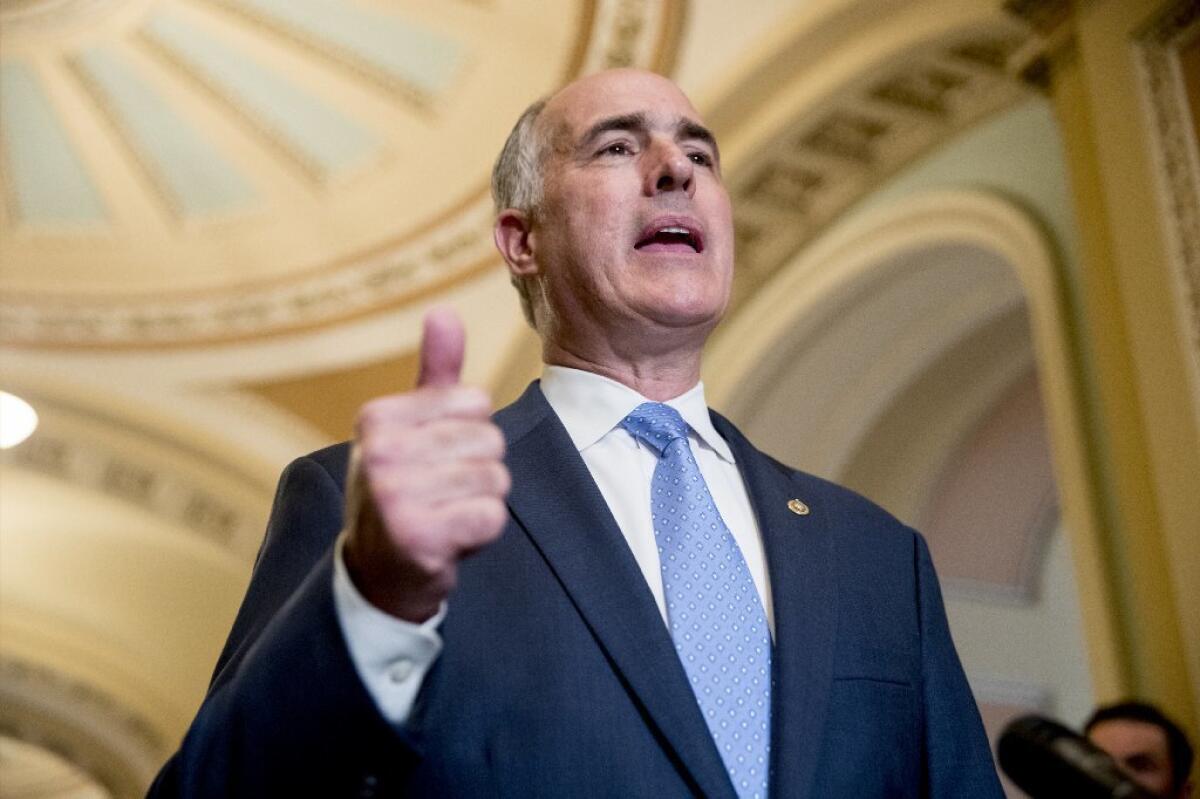
It’s easy to see why Senate Democrats feel frustrated about the prospect of President Trump filling a second vacancy on the Supreme Court now that Justice Anthony M. Kennedy has retired. (Trump said Friday that he will announce his choice on July 9.)
Still fuming — and rightly so — about the way Senate Minority Leader Mitch McConnell (R-Ky.) made it possible for Trump to appoint Neil Gorsuch to the court, the Democrats are arguing for delaying consideration of a second Trump nominee until after the midterm elections.
Their hope is that Democrats will regain control of the Senate in November and thus deny an unacceptable Trump nominee the votes necessary for confirmation. (And it’s pretty clear that a lot of Democrats will consider any Trump nominee unacceptable.)
If they were honest, the Democrats would defend such a delay as tit-for-tat for McConnell’s refusal to hold hearings in 2016 for Merrick Garland, former President Barack Obama’s nominee to succeed the late Justice Antonin Scalia. It was that audacious act of obstruction that kept open the vacancy Trump was able to fill with Gorsuch. Partisan payback isn’t pretty, but there’s a kind of brutal honesty about admitting that’s what you’re doing.
But some Democrats are trying to put the lipstick of principle on the pig of politics. Even odder, the “principle” they’re invoking (and, as we’ll see, misrepresenting) was created out of whole cloth by ... McConnell.
Typical is this statement from Sen. Bob Casey (D-Pa): “Majority Leader McConnell once said that ‘the American people should have a voice in the selection of their next Supreme Court justice,’ so he should ensure that’s the case and follow his own rule.”
Two problems here.
First, as Washington Post fact-checker Glenn Kessler pointed out here, McConnell’s argument was that a presidential election should take place before the Scalia vacancy was filled. Here’s the full statement from which Casey selectively quoted: “The American people should have a voice in the selection of their next Supreme Court justice. Therefore, this vacancy should not be filled until we have a new president.”
Whatever you think of McConnell’s argument that a vacancy occurring in an election year should be filled by the president elected that November — and the Los Angeles Times editorial board thought it was “self-serving sophistry” — it’s not the same “principle” the Democrats are now invoking.
An election for the Senate is not the same as a presidential election. Besides, only 35 Senate seats are up for grabs this year. Are the Democrats saying that a senator elected in 2018 would cast a more legitimate vote on a Supreme Court confirmation than one elected in 2016 or 2014?
The second problem with the Democrats’ argument is that it makes them looks inconsistent. If McConnell’s assertion that Supreme Court vacancies shouldn’t be filled in an election year was nonsense — and it was — it doesn’t become less nonsensical when Democrats embrace it, even in the context of trying to portray the Republicans as hypocrites.
The fact that Republicans justified a power play by invoking a bogus theory about honoring the people’s “voice” doesn’t mean that the Democrats get to invoke it. Or, rather, they’re free to invoke it, but they look like opportunists.
If Trump wants to force the poor to work for their Medicaid, he’ll need Congress to change the law
Call it situational principles about the separation of powers.
Republicans complained bitterly about the Obama administration effectively rewriting federal laws through regulation and enforcement decisions — and they were occasionally right about that (see, e.g., the decision to flat-out ignore the statutory deadlines for the requirement that larger employers offer health insurance to their full-time workers). But they have cheered on the Trump administration’s efforts to do the same in multiple arenas (see, e.g., just about everything the Environmental Protection Agency has been doing).
That’s left the courts to rein in the administration, and a federal judge in Washington did so in the nick of time Friday. Vox reported that U.S. District Judge James E. Boasberg blocked an administration-approved plan by the state of Kentucky to require Medicaid recipients to work or participate in training programs in order to remain insured.
Trump has been encouraging Congress and state governments for months to add or expand the work requirements for those who receive safety-net benefits, with some success. For example, the House passed a five-year farm bill this month that extended the work requirements in the food-stamp program to older recipients and more parents; the version the Senate passed this week has no such provision.
In January, the administration invited states to propose work requirements for Medicaid, the health insurance program for low-income Americans that’s jointly funded by state governments and Washington. Eleven states responded to that invitation; Kentucky is one of four states to receive the green light, with the other seven still awaiting approval.
Boasberg’s ruling should puncture that balloon once and for all, for the simple reason that work requirements violate federal law. Under the 1965 law that created Medicaid, The Department of Health and Human Services is allowed to waive many of the federal requirements and impose its own rules, provided that they are “likely to assist in promoting the objectives” of the program. The objectives aren’t explicitly defined, but the stated purpose of the law is to furnish medical assistance, rehabilitation and related services to low-income families and disabled individuals.
The problem with the work requirements is that they don’t help states furnish medical assistance, rehabilitation or related services to Medicaid-eligible people. Instead, they help weed such individuals out of the program.
The administration argues that working improves health, and I don’t dispute that. But if that’s the argument, then the administration should add money to the program for states to provide jobs to those who were eligible and unemployed, thus making them healthier. (The vast majority of Medicaid recipients who are capable of working already do; the ones who don’t are either children, disabled, elderly or caring for dependents.)
Instead, with the administration’s go-ahead, states are imposing work requirements as a cudgel aimed at able-bodied people who choose poverty with government benefits over employment. There probably are some people who fall into that category, but the more likely effect of the requirements would be to end benefits for eligible people tripped up by the paperwork or the bureaucracy. After all, Kentucky estimated that about 100,000 fewer people per month would receive Medicaid by the fifth year of its experiment with work requirements — not because they’d all be rocketing up out of poverty, but because the state expected them to fail to work (or get job training or do volunteer services) the required number of hours.
If Congress wants the Medicaid program to deny eligibility to people who don’t meet some kind of work requirement, it can rewrite the statute. Otherwise, the Trump administration and states must live with it.
Trump wants less immigration but most Americans want more — and they’re right

One of the defining aspects of the Trump administration — beyond chaos and confusion, insults and petulance — is the relentless attacks on foreigners and immigrants. The administration has capped refugee resettlement for this year at 45,000, one of the lowest levels since 1980, and has endorsed legislation that would cut legal immigration to 40% of current levels while ending the decades-old policy of focusing immigration on family reunification.
He also has tried to end protected status for 690,000 “Dreamers” — people who have lived here without permission since arriving in the country as children — and lifted protections for 310,000 people stranded in the U.S. by disasters and turmoil in their home countries.
That draconian approach to immigration might play well with Trump’s nativist political base (and some of his top aides), but it’s remarkably out of step with the beliefs of most Americans, according to a new Pew Research Center poll.
In fact, the poll found that only 24% of Americans believe we need lower levels of immigration — less than half of the level who believed that in 2001. The poll found 38% of people believe current levels of immigration should be maintained, and 32% believe we ought to be admitting more immigrants.
Not surprisingly, the poll found that “about twice as many Republicans (33%) as Democrats (16%) support cutting legal immigration into the U.S.”
Also, lawful immigrants account for about three-fourths of the immigrants currently living in the country — yet only 45% of Americans know that.
In truth, the U.S. needs more immigrants, particularly young working-age adults, to help stabilize Social Security and deepen the labor pool as more of the Baby Boomer generation reaches retirement age and the ratio of retirees to payroll tax-paying workers increases.
In 1980, we had 19 Americans of retirement age for every 100 people of working age. This “dependency ratio” crept up to 21% by 2010. Last year, it shot up to 25%, and by 2030, it likely will be around 35%.
Meanwhile, the fertility rate is at an all-time low, propelled downward initially by the 2008 recession and seemingly also affected by women’s decisions to have children later in life as well as fewer kids — dropping from 3.6 births per woman in 1960 to 1.8 in 2016.
Japan offers a sobering lesson in what can happen to an economy — and a society — when the dependency ratio gets too high. And Trump’s immigration policies will keep us on that road.
The sorry history of journalists killed in the U.S. for doing their job

An attack on a newspaper is the same as an attack on the Constitution, on the nation’s earliest face of the 1st Amendment.
Thursday’s murders at the local newspaper in Annapolis, Md., were allegedly committed by a man who police say staged “a targeted attack on the Capital Gazette.”
The targeted killing of journalists is something we think of as happening elsewhere — in Mexico, where journalists are gunned down by drug lords and their cronies; in Russia, where journalist critics of Vladimir Putin turn up dead; in Syria and Afghanistan; in France, where Islamic State supporters massacred Charlie Hebdo magazine journalists.
It hasn’t happened to a newspaper journalist in the United States in more than 10 years; in 2007, Chauncey Bailey, who edited the weekly Oakland Post, was gunned down to shut down his reporting about Oakland’s Your Black Muslim Bakery, whose financial and personnel problems Bailey had been covering.
From 1981 to 1990, in different parts of the country, five Vietnamese American newspaper journalists were assassinated, reportedly by what the investigative news outlet ProPublica called a death squad, an organization that the FBI had concluded was made up of extremist former South Vietnamese military officials. None of the five killings have been officially solved. The gravestone of one newspaperman, shot to death in the driveway of his Houston home, reads: “Killed in pursuit of truth and justice through journalism.”
The man suspected in Thursday’s massacre had a longstanding beef with the Capital Gazette because it covered his criminal case, a matter of public record. That’s what hometown newspapers do routinely every day: write about crime, courts, local government, prep sports, schools, police and fire, the community’s doings.
The paper also covered the U.S. Naval Academy, in its backyard. The academy tweeted Thursday, “The Capital Gazette is our local newspaper and is often the first to tell our story. We are grieving with their staff and loved ones after the tragic events that occurred today.”
American journalism’s first martyr was Elijah Parish Lovejoy. He was a Presbyterian minister and newspaper publisher who wrote so passionately against slavery that, three different times, Missouri mobs destroyed his printing presses. In 1837, he moved to the presumed safety of Illinois, where another crowd of pro-slavery rioters torched his building, shot him to death and threw his printing press in the river.
To former president John Quincy Adams, Lovejoy was “the first martyr to the freedom of the press, and the freedom of the slave.” A couple of months after Lovejoy’s death, a young Illinois lawmaker named Abraham Lincoln spoke of the incident, and even 20 years later recalled it in a letter as “the single most important event that ever happened in the new world,” because it lighted the fuse that in time exploded the nation into civil war.
Lovejoy’s name appears first on the list of hundreds on the memorial wall at the Newseum, the Washington museum of journalism. Five more names must now be added to that wall — the single biggest number of journalists targeted for death in this nation’s history. (Two of those killed at the Capital Gazette were editors, two were reporters and one was a sales assistant for the newspaper.)
A chapter in my book, “Don’t Stop the Presses! Truth, Justice and the American Newspaper,” recounts stories of American newspaper journalists who died on duty; sometimes, like “The Capital Gazette” staffers, were targeted for death because they were doing their jobs.
The risk has always been there. During the civil rights movement of the 1950s and ‘60s, white Southern newspaper editors and publishers who editorialized support for the civil rights movement faced canceled subscriptions, canceled ads and death threats — still nothing compared to what black activists endured — but the only reporter known to have been murdered during that period was a Frenchman, Paul Guihard. In September 1962, he was found shot in the back in Jackson, Miss., where white protests greeted black student James Meredith when he tried to enroll at the university there. Guihard’s murder is unsolved.
Every day, and now more and more each year, newspaper reporters and radio, TV and online news reporters across this country get hate mail, hate email, even death threats. Some are preposterous; some are all too plausible. Within hours of Thursday’s murders, Buzzfeed writer Anne Helen Petersen tweeted, “I’ve had people email death threats, threaten to cut my dog’s throat, tell me I’d pay for my fake news.”
We get these threats, but we never get used to them.
A healthy tension between the press and politicians is as old as the country, and actually an important part of its governance. Once in a while, it gets dangerously, disastrously unhealthy.
The second president of the United States, John Adams, threw newspapermen in prison under laws that, like English law, were broad enough to imprison people for almost any criticism of the government. Editors, publishers, a member of Congress and Benjamin Franklin’s publisher (who was also his grandson) were put behind bars, and countless other newspapermen were intimidated into silence, which is exactly what the targeting of journalists is meant to do: to shut them up. The election of Thomas Jefferson and the affirmation of the 1st Amendment soon put an end to this persecution.
And today we have the sneering and insults from a presidential candidate who became the president of the United States. His “fake news” retorts try to diminish stories he doesn’t like, and the “scum” journalists who reported them. When he calls the press “the enemy of the people,” he is deploying the same term used by Nazi Germany and Stalin’s Soviet Union to demonize the leader’s own enemies.
Today, we have a GOP congressional candidate in Montana who pleaded guilty to body-slamming a newspaper reporter who asked him about healthcare on election night. Greg Gianforte is serving in Congress today.
The New Yorker wrote of a reporter for the hometown paper in Grand Junction, Colo.; the reporter covered a 2016 Trump rally, and saw her fellow citizens screaming at out-of-town political reporters, “Hang them all! Electric chair!”
“I thought I knew Mesa County,” the reporter wrote on Facebook. “That’s not what I saw yesterday. And it scared me.”
Still, we persist. We are the people’s intelligence service, and in an age when social media allow Americans to wall themselves off from information they don’t like, and from people they don’t agree with, we deliver the news version of Neil DeGrasse Tyson’s maxim that “the good thing about science is that it’s true whether or not you believe in it.”
Attacks on journalists are meant to silence voices and intimidate others. After Chauncey Bailey’s murder, and after the 1976 bombing-killing of Arizona investigative reporter Don Bolles, reporters rallied to finish the work these two men had started. Their guiding principle: “You can’t kill a story by killing a journalist.”
Its newsroom was still a crime scene Thursday night when the Capital Gazette tweeted the same sentiment, “Yes, we’re putting out a damn paper tomorrow.”
Strong words and a whole lot of political weakness from California Democrats on soda taxes
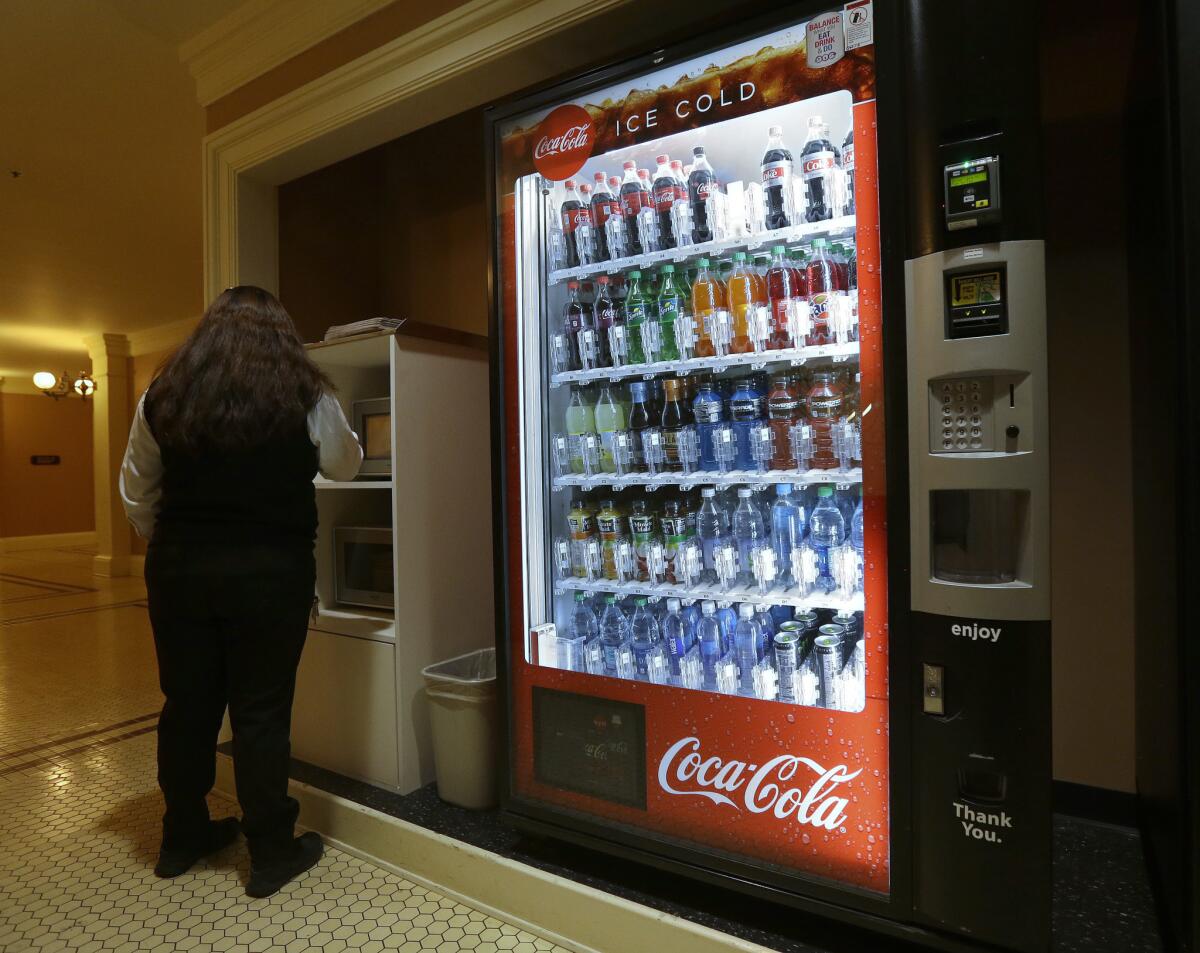
Gov. Jerry Brown used some strong words Thursday in a rare signing message for a bill temporarily banning local governments from taxing soda and single-use plastic in exchange for the soda industry withdrawing a ballot initiative that would have made it harder to raise taxes.
“An abomination,” Brown called the initiative.
The ballot measure, which was funded primarily by soda companies such as Coca-Cola and Pepsi, would have raised the threshold for approving a local tax measure to a two-thirds vote. Currently, some taxes can be approved with a simple majority of local votes cast. What Brown found particularly objectionable was the language that would have expanded the definition of a state tax subject to a two-third vote of the Legislature to cover some types of fees that state agencies currently have the authority to impose.
Brown wasn’t the only elected official to employ over-the-top language in defending his or her support of a last-minute backroom deal that preempts any local tax on soda and groceries for 12 years. (And in a super sneaky move, the bill extends the moratorium to levies on food containers or packaging, even ocean-clogging disposable plastic bags and to-go containers.)
After listening to teenagers and health advocates beg legislators on Thursday not to give in to the soda industry and take away this weapon in the fight against obesity, Assemblyman Richard Bloom (D-Santa Monica) ranted about how disgusted he was with the whole situation — but concluded that he would vote for the bill because the initiative was a “gun to the head.”
The day before, at a late afternoon state Senate budget hearing, Sen. Holly Mitchell (D-Los Angeles) called the decision between the soda tax ban and the initiative a “political Sophie’s Choice.” It was a “nuclear weapon” aimed at local government budgets, according to Sen. Scott Wiener (D-San Francisco), who was a rare profile in courage, saying it was a bad deal and then not voting for it.
Man, with this kind of hyperbole you’d think the proposed ballot measure would have thrown open the state’s prisons and handed out loaded semiautomatics to the murderers on their way out.
Here’s a better word to explain the situation: extortion.
The soda industry spent millions of dollars to qualify a ballot measure in order to scare legislators into giving them exactly what they wanted rather than face the possibility that the voters might be swayed by Coke and Pepsi’s bid to protect their profits. After such positive reinforcement, you can bet this strategy will be employed again.
Here’s a word that I think best wraps up this sad moment in legislative history: suckers, as in how lawmakers apparently view the people they represent.
The hot takes on the Maryland Gazette shooting are a hot mess

If newspapers are the first draft of history, Twitter represents the notes that should have been crumpled up and thrown away.
The shocking news about the shootings Thursday at the Annapolis, Md., offices of Capital Gazette Communications, which publishes the Capital and the Maryland Gazette, prompted a considerable amount of finger-pointing and blame-assigning even before police announced a death toll, let alone identifying the shooter or his motive.
Some outlets are just now reporting a name, adding that it appeared to be a guy who’d lost a defamation lawsuit against the Capital. If so, that would contradict the operating assumptions fueling the flow of angry hot takes for the first few hours after the shooting — for example, that it was motivated by President Trump’s incessant attacks on the news media or by Rep. Maxine Waters’ call to confront Trump’s top appointees wherever they might be found (no, that one doesn’t make any sense to me either).
I could point to a bunch of egregious efforts to score political points off the attack, by both Trump-haters and the president’s acolytes, but they don’t deserve the attention. Instead, I’m using this somber occasion to note how much the job journalists do has changed over the years, and how much it’s still the same.
Local papers like the Capital and the Gazette continue to do the accountability reporting that no one else does, monitoring land-use issues, local taxes, local elections — all the sorts of things that fly under the radar of other media outlets, yet make a real difference to the lives of readers. That’s often painstaking, time-consuming work.
What has changed, and changed dramatically, is the rush to publish. With Twitter, news websites and blogs (such as, ahem, this one) offering a real-time outlet for reporting, analyzing and opining, the pressure is tremendous to react as quickly as possible to events.
The facts eventually come out, and they often rewrite the narrative that’s been spun online. That’s all the more reason to ignore what gets spewed immediately on social media, rather than leaping to conclusions about what the comments (and the comments about the comments) say about us.
Yes, newspaper journalists make plenty of mistakes; the daily corrections testify to that. In this case, though, the alleged shooter’s beef apparently was with a column about a guilty plea he’d made to a charge of criminal harassment — a matter of public record.
Even when they do their jobs right, journalists make enemies. Today offered one extreme, tragic example. But doing that job well requires them to find things out, rather than speculating about what they haven’t yet learned — the sort of behavior that platforms like Twitter do not reward.
Once again, the fate of civilized society rests in the hands of Lisa Murkowski and Susan Collins
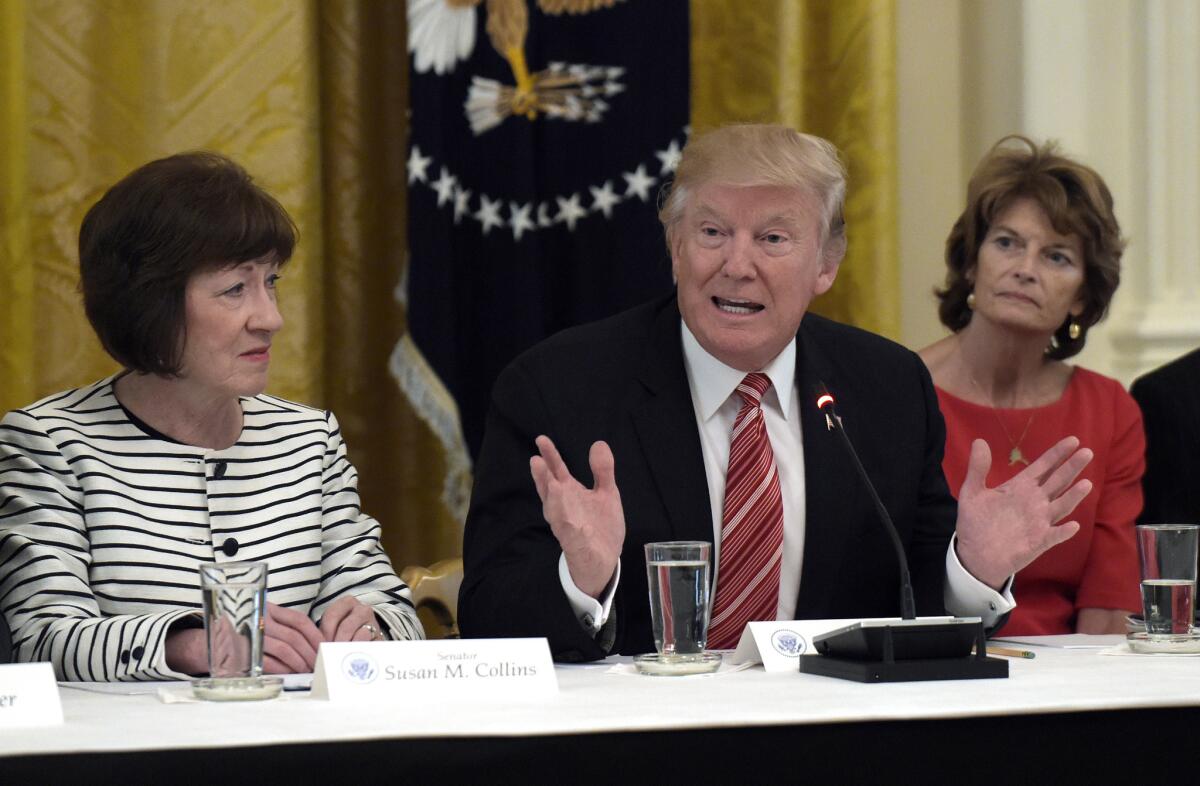
Donald Trump is going to get a second Supreme Court pick, and there’s nothing Democrats can do to stop him.
There are, however, two people who can. And they may be willing to put a leash on the president and his worst excesses: Republican Sens. Susan Collins of Maine and Lisa Murkowski of Alaska.
When it comes to confirming a Supreme Court justice, Republicans hold all the cards. They control the House and also enjoy a 51-49 majority in the Senate. But Collins and Murkowski could flip that advantage if they choose. And they have shown a willingness to flex that muscle.
Remember, it was around this time last year that Republicans tried to slam through a Trumpcare bill that would have gutted coverage for preexisting conditions, eliminated funding for Planned Parenthood and cut healthcare to the poor — among a host of other monstrosities that betrayed a lack of basic human decency.
Yet the effort failed miserably.
Why? Murkowski and Collins shut that garbage down.
At the time, Murkowski in particular was outspoken about her commitment to the continued funding of Planned Parenthood.
It took only hours after the announcement of Anthony Kennedy’s retirement for Collins to speak out about her commitment to abortion rights.
“I view Roe v. Wade as being settled law. It’s clearly precedent, and I always look for judges who respect precedent,” she said Wednesday.
Could fear of a misogynist Supreme Court rolling back rights for women pressure Murkowski and Collins to stand up to Trump and force him to select a moderate? Is it wishful thinking that lightning could strike twice?
Perhaps. One way or another Trump will get his pick, eventually. And that pick will more than likely swing the court further to the right for years to come. Stonewalling his pick entirely for two years seems unlikely.
But counting on two female senators who have long supported women’s reproductive and healthcare rights to temper Trump’s worst instincts is the best chance civilized society has right now.
Let voters decide whether to keep daylight saving time

It’s up to Gov. Jerry Brown to decide whether to sign a bill placing a measure on the November ballot to end the archaic practice of changing clocks twice a year. The California Legislature has already given the proposal its blessing, and the governor should too.
This measure would not necessarily end California’s observance of daylight saving time. If approved by the voters, it would repeal a 69-year-old ballot measure (the Daylight Saving Time Act) that forced the semi-annual clock adjustments and leave Californians on Pacific Standard Time (which is what we currently observe from November to March). The Legislature could later decide, by a supermajority vote, to switch California permanently to Pacific Daylight Time, which we are observing right now.
Endless daylight saving time is the intent of the Legislature, though it would require federal approval.
The Los Angeles Times editorial board opposed this proposal when it was first introduced two years ago by Assemblyman Kansen Chu (D-San Jose), arguing that although there no longer seem to be practical benefits to observing the twice-a-year change (and that there may in fact be some downsides), it would be confusing and disruptive for California to go it alone. Only Arizona and Hawaii don’t recognize daylight saving time.
I believe that was a sensible position to take in 2016, before the presidential election suddenly put California at odds with much of the nation on major issues such as immigration, climate change and marijuana legalization. The state is charting its own course now, making decisions that are best for Californians even if they conflict with the rest of the country.
Maybe California voters want to continue the tradition of skipping back and forth an hour twice a year, maybe they want it to end. In either case, the governor should let them decide.
Democrats better embrace progressive millennials or get used to losing

There must be a lot of soul-searching going on among Democratic Party leaders today about what to make of the surprise upset of veteran Rep. Joe Crowley (D-New York) by newcomer Alexandria Ocasio-Cortez, a 28-year-old Latina socialist Democrat in Tuesday’s primary.
Good. It’s time they had an honest self-appraisal when it comes to their support of issues people care about and that make the young candidates, particularly women and ethnic minorities, eager to participate. Couldn’t the party establishment see that this majority-minority district might go for a charismatic candidate over a middle-aged white guy incumbent? Now they look foolish and deserve a bit of mockery. Well, maybe not all of it.
(I’m betting not being nice enough to Trump was not a factor in the outcome of this Democratic Party primary. Or any of them. Ever.)
While Democratic Party officials are at it, they should also question whether their wishy-washiness on things their people care about, such as universal health care, liveable wages, affordable higher education and reining in Wall Street greed, is limiting their ability to win elections. Maybe it even had something to with the fact that Democrats managed to lose an election that even the lying, misogynist, racist, populist bully who won didn’t think he had a shot at.
It’s a good time to take stock because if Democrats don’t ramp up their game now, they may well lose the most important midterm elections in modern history and doom the country to at least two more years of Republican-controlled chaos from which we may never recover.
They can start by dumping their insipid “Change that Matters” slogan, which is even more of a loser than Hillary Clinton’s “Stronger Together.” If Democrats want to rile up their voters to Trumpesque proportions, they should try something catchy, more assertive and more likely to be painted on a protest sign. May I suggest “Take America Back from the Billionaires” or simply “Throw the Lyin’ Bum Out.”
The Democratic Party can either start embracing the millennial progressives — and their issues — and harness that effervescent energy in the November elections, or they can get used to losing.
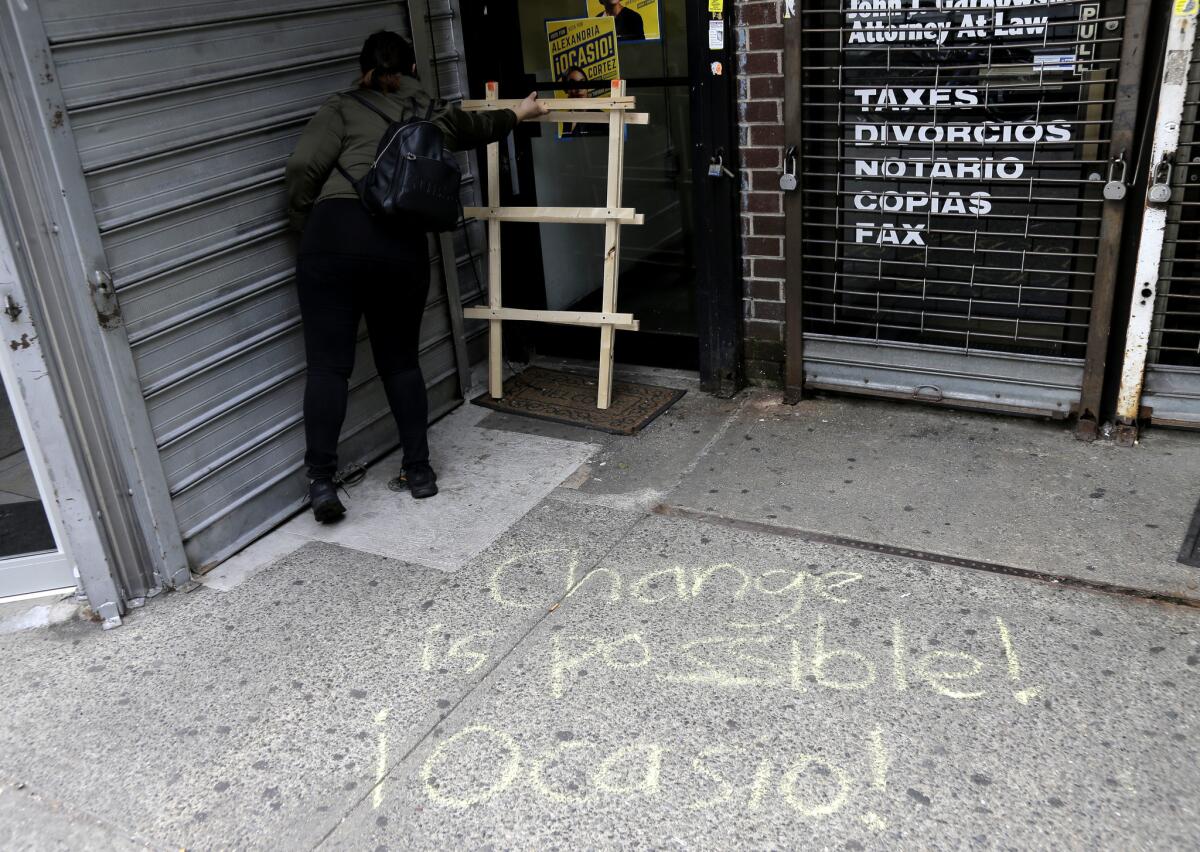
Democrats, prepare to be steamrolled on Trump’s Supreme Court nominee
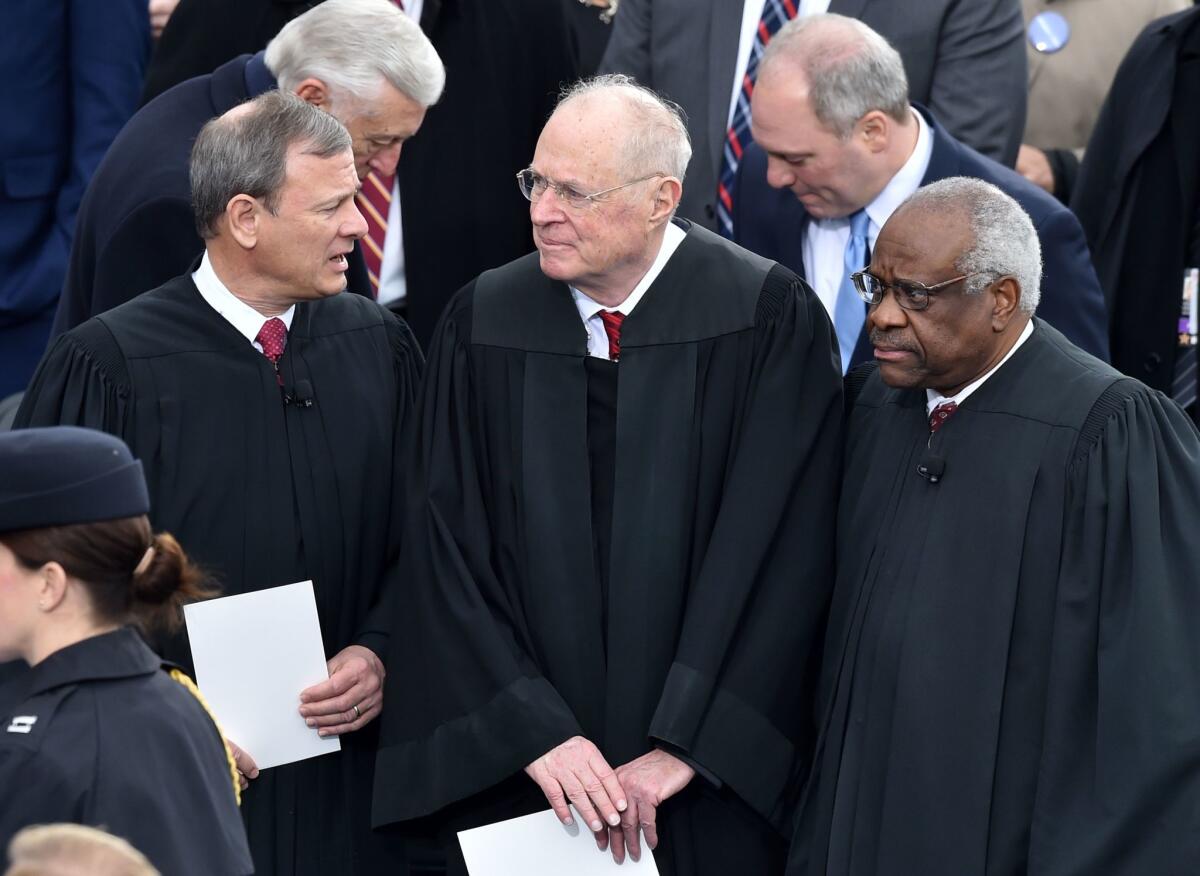
Supreme Court Justice Anthony M. Kennedy’s retirement will have President Trump and Senate Republicans racing to name and confirm a replacement before the November elections, when there’s an outside chance that Republicans will lose control of the Senate. (It’s an outside chance because far more Democrats are up for reelection than Republicans.)
On first blush, you might think the clock is on the Democrats’ side. After all, there aren’t many legislative days left before the elections, even with Senate Majority Leader Mitch McConnell (R-Ky.) keeping the chamber in session through the traditional August recess. And it typically takes months for the White House to vet judges and select a nominee.
It’s the safest of safe bets that Trump will have a nominee in short order, however. The president updated his published “Supreme Court Shortlist” in November, which included many names suggested by conservative legal scholars. And remember, it took Trump less than two weeks after his inauguration to pick Neil Gorsuch to replace the late Justice Antonin Scalia; the vacancy had been kept open by McConnell and his fellow Republicans, who refused even to hold a hearing on President Obama’s nominee, Merrick Garland.
Oh, how Democrats would love to return that favor. But unlike Republicans, they don’t have the majority’s power to decide which items come to the floor. And again thanks to McConnell and company, they no longer have the power to filibuster a Supreme Court nominee. The best they can do is extend debate for 30 hours once the nomination hits the Senate floor.
Some partisans have suggested that Democrats pull out all the stops to gum up the works. They could theoretically filibuster everything else that hits the Senate floor, including the spending bills needed to keep the government open past Sept. 30. But the public has shown little sympathy for lawmakers who shutter the government in a bid to extract policy changes, so the tactic usually fails. (See: the Republican efforts to “defund Obamacare” in 2013 and Senate Democrats’ push to aid immigrant “Dreamers” earlier this year.)
Vox suggested that Senate Democrats try to bend Republicans to their will by staying out of the Senate chamber, leaving the body unable to vote on anything for lack of a quorum. The problem with that plan, however, is that Senate rules allow the presiding officer to round up missing members with the help of the Capitol police. In fact, the sergeant at arms can be dispatched from Capitol Hill to hunt down missing members.
The only real hope for those who fear that Trump will put an ideological firebrand on the court is that Trump will nominate someone in haste whose reputation melts under scrutiny. This sort of thing happens with some frequency, even at the Supreme Court level (see: Douglas Ginsburg and G. Harrold Carswell). Or perhaps he’ll nominate a crony so unqualified that even Senate Republicans can’t go along, as President George W. Bush did with his White House counsel, Harriet Miers. Or as Trump himself did when he nominated his personal physician to run the Veterans Affairs Department.
Trump made both a savvy and a responsible pick in Gorsuch, a well-respected conservative who’s not shown himself to be an ideologue. But because Gorsuch preserved the court’s conservative majority, Democrats remain bitter about the seat “stolen” from Garland, who would likely have shifted the court to the left. So no matter whom Trump picks, Democrats will look for a way to block the nomination. They just won’t have much chance of doing so.
What the Supreme Court could look like with John Roberts as its swing vote
Editor’s note: This article was originally published April 10, 2017. We are resurfacing it from the archives with a new headline in the wake of Justice Anthony Kennedy’s decision to retire from the Supreme Court.
Even before the Senate confirmed Neil Gorsuch as a justice of the Supreme Court, and before it “nuked” the filibuster for nominees, the Trump administration and conservatives were already plotting to fill the next vacancy. Indeed, they have made overtures to swing Justice Anthony M. Kennedy to get him to feel comfortable with retirement. If Kennedy goes, or if a liberal justice gets sick or dies, Democrats have few levers to stop Republicans from confirming a nominee even more conservative than Gorsuch. The future, then, holds a Supreme Court where Chief Justice John G. Roberts Jr. is the swing vote — a scary eventuality for progressives.
Last year was the real moment for the left to act on the Supreme Court. Conservative Justice Antonin Scalia had died, creating the first opportunity in decades to move the court to the left on issues including the environment and civil rights. There could have been a majority to overturn the controversial 2010 Citizens United decision, which has ushered in a new era of big money in politics.
It turns out Trump’s family separation program wasn’t just cruel, it was incompetent
Two persistent themes mark the Trump administration: Spontaneity, and cruelty. Late Tuesday night, U.S. District Court Judge Dana M. Sabraw in San Diego ordered the government to end one product of those two themes – separating migrant children from their parents. The judge also ordered the government to reunite the families within 30 days, or within 14 days for minors under the age of 5.
That government officials ever thought that inflicting such trauma and cruelty on people would be a good idea shocks the conscience, to invoke a legal standard, while exposing – again – the coldness that lies at the heart of this administration.
The case, filed by the American Civil Liberties Union, was brought initially on behalf of a mother from the Democratic Republic of the Congo who, as a Catholic, faced persecution in her home country. So she did what she was allowed to do under international treaties and U.S. law: She showed up at the San Ysidro border crossing and asked for asylum.
Judge blows the whistle on Trump’s heedless family separations

A federal judge in San Diego late Tuesday managed to achieve something the president and Congress have failed to do: Resolve President Trump’s self-inflicted crisis of separating children from their migrant parents.
It turns out the solution is pretty simple: Reunite them. Judge Dana M. Sabraw gave the government 30 days to get all the kids back with their parents, and 14 days for kids under the age of 5.
Of course, the government should never have embarked on this cruel and traumatizing policy in the first place.
Interestingly, Sabraw zeroed in on the utter incompetence of the government in crafting the policy. There was little to no forethought of how to handle the separations other than to send the parents to jail on misdemeanor charges of entering the country illegally, then declaring the children to be unaccompanied minors — which they were not — and shunting them off to the Office of Refugee Resettlement.
Sabraw wrote:
“The practice of separating these families was implemented without any effective system or procedure for (1) tracking the children after they were separated from their parents, (2) enabling communication between the parents and their children after separation, and (3) reuniting the parents and children after the parents are returned to immigration custody following completion of their criminal sentence. This is a startling reality.”
And:
“The facts set forth before the court portray reactive governance — responses to address a chaotic circumstance of the government’s own making. They belie measured and ordered governance, which is central to the concept of due process enshrined in our Constitution.”
Incompetence from the Trump administration — who saw that coming?
The Supreme Court upheld Trump’s travel ban, not his ugly language about Muslims

What matters most in the Supreme Court’s decision in Trump vs. Hawaii is the bottom line: a 5-4 ruling that the president didn’t violate the law or the Constitution in imposing the third version of what he himself calls a travel ban. The outcome of the case fully justifies Trump’s exuberant tweet this morning: “SUPREME COURT UPHOLDS TRUMP TRAVEL BAN. Wow!”
But if Trump reads Chief Justice John G. Roberts Jr.’s majority opinion and a concurring opinion by Justice Anthony Kennedy, he might be less jubilant. Both justices made it clear that, while they believe Trump acted lawfully in blocking the entry of foreign visitors and immigrants from several mostly Muslim-majority nations, they weren’t endorsing Trump’s ugly statements about Muslims.
In the case of Roberts’ opinion for the court, you had to squint to see the criticism between the lines. After citing Trump’s various problematic statements about Muslims — including his notorious campaign proposal for a “total and complete shutdown of Muslims entering the United States” — Roberts wrote:
“Plaintiffs argue that this president’s words strike at fundamental standards of respect and tolerance, in violation of our constitutional tradition. But the issue before us is not whether to denounce the statements. It is instead the significance of those statements in reviewing a presidential directive, neutral on its face, addressing a matter within the core of executive responsibility. In doing so, we must consider not only the statements of a particular president, but also the authority of the presidency itself.”
Yes, this passage begins with “Plaintiffs argue,” but it’s easy to infer that Roberts accepts their argument that Trump’s words violated “fundamental standards of respect and tolerance.” His point is that the issue for the court is whether the actual presidential proclamation before it has a “rational basis” — that is, that it “can reasonably be understood to result from a justification independent of unconstitutional grounds.”
Trump’s proclamation, the result of a review by the Department of Homeland Security in consultation with the State Department and several intelligence agencies, passed that not very demanding test. For example, Roberts noted that the proclamation is “expressly premised on legitimate purposes: preventing entry of nationals who cannot be adequately vetted and inducing other nations to improve their practices. The text says nothing about religion.”
In his concurring opinion, Kennedy was a bit less oblique.
“There are numerous instances in which the statements and actions of government officials are not subject to judicial scrutiny or intervention,” Kennedy wrote. “That does not mean those officials are free to disregard the Constitution and the rights it proclaims and protects. The oath that all officials take to adhere to the Constitution is not confined to those spheres in which the judiciary can correct or even comment upon what those officials say or do. Indeed, the very fact that an official may have broad discretion, discretion free from judicial scrutiny, makes it all the more imperative for him or her to adhere to the Constitution and to its meaning and its promise.”
For those who think the court should have ruled the other way, this will seem pathetically small consolation. (And for Trump supporters, Kennedy’s opinion will look like gratuitous virtue-signaling.)
But, as I wrote here, the court has good reasons not to evaluate a president’s official actions and policies through the prism of statements he made on the campaign trail. That doesn’t mean the court approves of them. Roberts and Kennedy were right to make that clear.
While propping up Trump’s travel ban, the Supreme Court shoots down the decision that allowed Japanese internment
There’s an odd irony in Tuesday’s Supreme Court decision upholding President Trump’s ban on travelers from some predominantly Muslim countries. While insisting that the controversial travel ban was crafted in a legal manner, Chief Justice John G. Roberts Jr., almost as an aside, issued a long-overdue rejection of the court’s notorious 1944 Korematsu decision, which allowed the government, in the interest of national security, to force 120,000 Japanese and Japanese Americans from their homes and place them in internment camps.
The internment was among the darkest and most shameful moments in American history, and the court’s acquiescence is generally viewed as among its biggest mistakes, along with the 1857 Dred Scott decision that African Americans — free or slave — were not citizens, and the 1896 Plessy vs. Ferguson decision that upheld segregation and Jim Crow laws.
Yet the court has never explicitly overruled it.
On Monday, though, Roberts was forceful in his language, which came in response to a dissent by Justice Sonia Sotomayor comparing the internment order and the travel ban. Roberts rejected the analogy, calling it “wholly inapt” to link the forcible relocation of U.S. citizens to concentration camps solely on the basis of race to Trump’s “facially neutral” travel ban.
Then he continued:
“The dissent’s reference to Korematsu, however, affords this Court the opportunity to make express what is already obvious: Korematsu was gravely wrong the day it was decided, has been overruled in the court of history, and — to be clear — ‘has no place in law under the Constitution.’”
That last phrase was drawn from Justice Robert Jackson’s dissent in the original 6-3 decision that is also worth quoting more extensively. Jackson was referring to the military orders that required Fred Korematsu, who was not in the military, to vacate his home and report for “indeterminate detention in a concentration camp.” Jackson, to his credit, argued that the majority of his colleagues were wrong to uphold the government’s actions.
It was a horrible decision that the Supreme Court had let stand — until today.
And the Times editorial board at the time had its own shameful position, backing the internment policy in several indefensible editorials.
“The time has come to realize that the rigors of war demand proper detention of Japanese and their immediate removal from the most acute danger spots,” The Times wrote. “It is not a pleasant task. But it must be done and done now. There is no safe alternative.”
And:
“As a race, the Japanese have made for themselves a record for conscienceless treachery unsurpassed in history. Whatever small theoretical advantages there might be in releasing those under restraint in this country would be enormously outweighed by the risks involved.”
As the editorial board noted more recently — on the 75th anniversary of President Franklin D. Roosevelt’s executive order ordering the exclusion of people of Japanese ancestry — we got it terribly wrong at the time.
“That was another time, and another Times. This newspaper has long since reversed itself on the subject. Not only was some of our reasoning explicitly racist, but in our desperate attempts to sound rational — by supposedly balancing the twin imperatives of security and liberty in the midst of World War II — we exaggerated the severity of the threat while failing to acknowledge the significance of revoking the most fundamental rights of American citizens based solely on their ancestry.”
It’s good that the court has finally addressed the Korematsu decision and its usurpation of one of our most fundamental rights — to be left alone and not subjected to imprisonment by the government without due cause.
Fear has too often driven the nation to bad decisions, and to undercut the very freedom on which our democracy depends.
President Trump unfriends Harley-Davidson
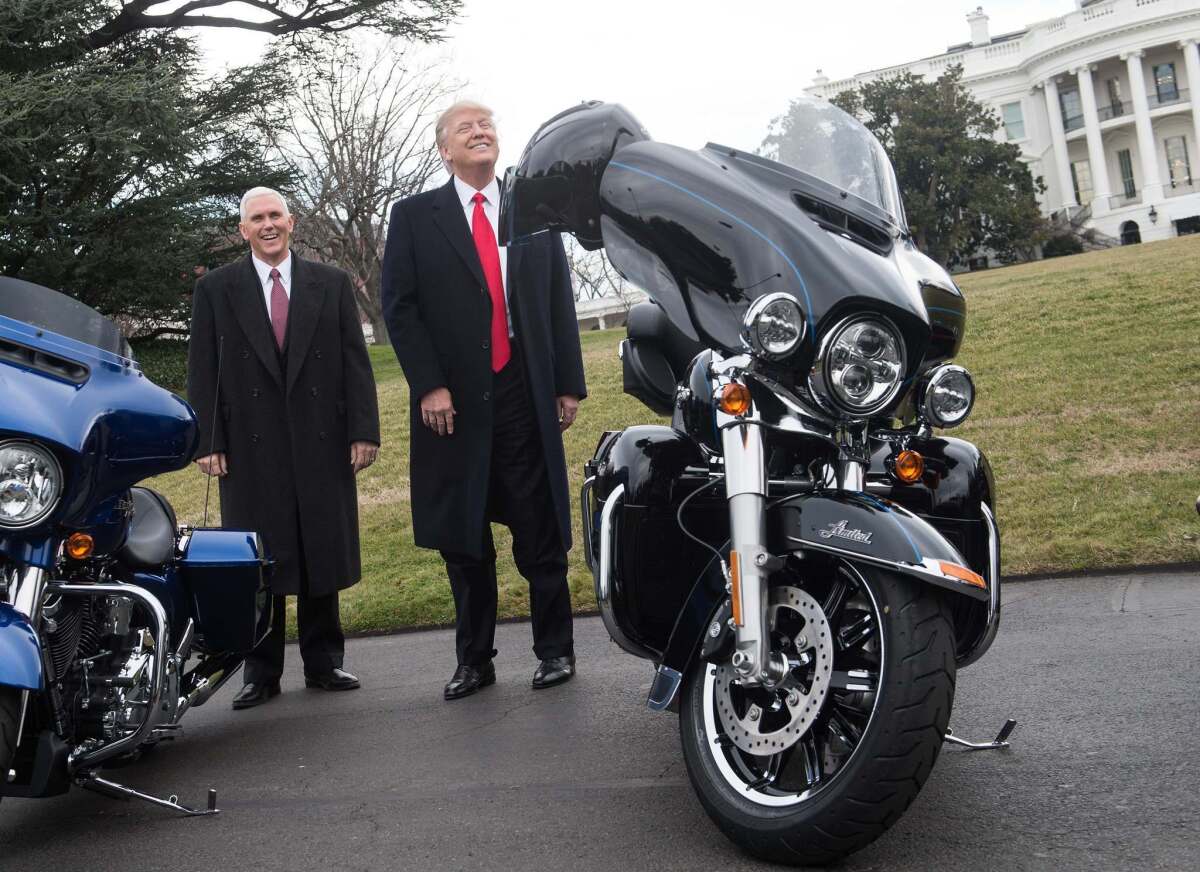
Hell hath no fury like this president scorned.
Iconic U.S. motorcycle manufacturer Harley-Davidson announced Monday that it was shifting more production overseas in response to a 31% tariff the European Union agreed last week to slap on its products. The EU imposed the levy, which would add about $2,200 to the price of a bike, in response to the tariffs President Trump unilaterally imposed on global steel and aluminum imports in the name of national security.
Trump tweeted Monday that he was surprised that Harley-Davidson would “wave the White Flag” because “ultimately they will not pay tariffs selling into the E.U.” The president seemed to be saying that he’s not really serious about imposing tariffs or starting a trade war — a suggestion echoed, kinda sorta, by Trump trade advisor Peter Navarro on Monday afternoon in a successful bid to calm a tanking stock market. The EU, obviously, thinks otherwise.
So Harley-Davidson is to blame for taking seriously the threat of punitive tariffs in its second biggest market? That’s ridiculous. But Trump didn’t stop there. On Tuesday he tweeted:
Earth to the White House: Harley-Davidson already makes some of its bikes overseas. It’s hardly unusual for a company with global sales to set up production lines closer to its overseas customers; according to the Wall Street Journal, about 40% of Harley’s bikes go to foreign buyers.
Harley already had announced plans to open another foreign plant — in Thailand — while closing its factory in Kansas City. Monday’s revelation was just a continuation of that theme.
Trump and his allies argue that Harley is using the EU tariffs as a pretext to ship jobs overseas for other reasons, such as cheaper labor. Maybe it is, but that doesn’t mean U.S. companies are going to be blithely dragooned into the trade war Trump is inciting. Like the EU and the rest of our trading partners, they are going to defend themselves. And that’s going to translate into lost jobs or higher prices in the U.S.
Being Trump, the president couldn’t let Harley go with just some tut-tutting — he had to throw in a threat:
That’s a nice position to put a company in: Stay and see your exports hammered with punitive foreign tariffs, or leave and see your sales into the U.S. hammered with punitive U.S. tariffs. If that’s what #WINNING looks like, Harley can be forgiven for changing teams.
The Supreme Court said Trump’s travel ban is legal. But that doesn’t mean it is moral, unbiased or effective
The third time was the charm. The Supreme Court ruled Tuesday that the third iteration of President Trump’s travel ban on people from some predominantly Muslim-majority countries was facially neutral and that the government had “set forth a sufficient national security justification” for the policy. That’s the legal threshold. But only an amnesiac would forget the clear animus to immigrants — with a special nasty focus on Muslims — that Trump exhibited on the campaign trail and that that propelled this foolish and counterproductive policy.
One of the first things Trump did after taking office was to act on his campaign statement that he wanted a “total and complete shutdown of Muslims” entering the U.S. That position was forged in reaction to violent attacks around the world by Islamic extremists – including the mass shooting in San Bernardino by an American-born Muslim and his Pakistani wife – and the then-raging war against Islamic State, and it was framed by deplorable perceptions among Trump and his nativist advisors that the actions of the few indicted the many.
His first travel ban was hastily crafted and horribly executed, creating chaos at airports and leaving travelers who possessed valid visas stranded overseas. Courts moved swiftly to block the policy. A couple of months later Trump tried again, and after legal challenges the Supreme Court allowed most of the ban to go into effect. But it expired in the fall.
The third version was more narrowly tailored. The administration framed it within a national security context and said that the countries from which travelers were banned had failed to share sufficient information with the U.S. to enable officials to determine whether potential travelers posed a threat. That ban applied to six predominantly Muslim nations – Iran, Libya, Syria, Yemen, Somalia and Chad – as well as to North Korea and certain government officials from Venezuela. The government later removed Chad from the list after determining that it had improved its practices. Lower courts issued injunctions against that ban, but the Supreme Court allowed most of it to go into effect in December while the case decided Tuesday proceeded.
Significantly, the court held that while most of the countries targeted by Trump’s ban are predominantly Muslim, “that fact alone does not support an inference of religious hostility, given that the policy covers just 8% of the world’s Muslim population and is limited to countries that were previously designated by Congress or prior administrations as posing national security risks.” So the president managed to affix a large enough fig leaf to hide his bias.
And now the ban can stay. It’s true that Congress gave the president broad authority to determine who can and cannot enter the country or remain in the country. The administration embraces that authority when it’s convenient – as in this travel ban – but rejects it when it’s not. For instance, Trump ended the Obama-era Deferred Action for Childhood Arrivals program, arguing that it exceeded the president’s authority.
Regardless, the court recognized the president’s broad authority in Tuesday’s decision, but also pointedly said that it was not reviewing the policy itself – just how it came into being.
As policy, the ban is an awful idea. It creates a broad exclusion for entry to the U.S. based on discriminatory misconceptions and punishes entire nations for the misdeeds of a few. And it doesn’t even get the nations right. The countries targeted in the ban are not responsible for the fatal terror attacks that have occurred in recent years. The 9/11 attackers were primarily from Saudi Arabia, and terrorist attacks in Europe over the last few years were committed primarily by Europeans who embraced Islamic extremism. The linkage between terrorist acts and the banned nations is unreasonable, as is this policy.
The Supreme Court cops out on anti-gay discrimination for the second time in a month
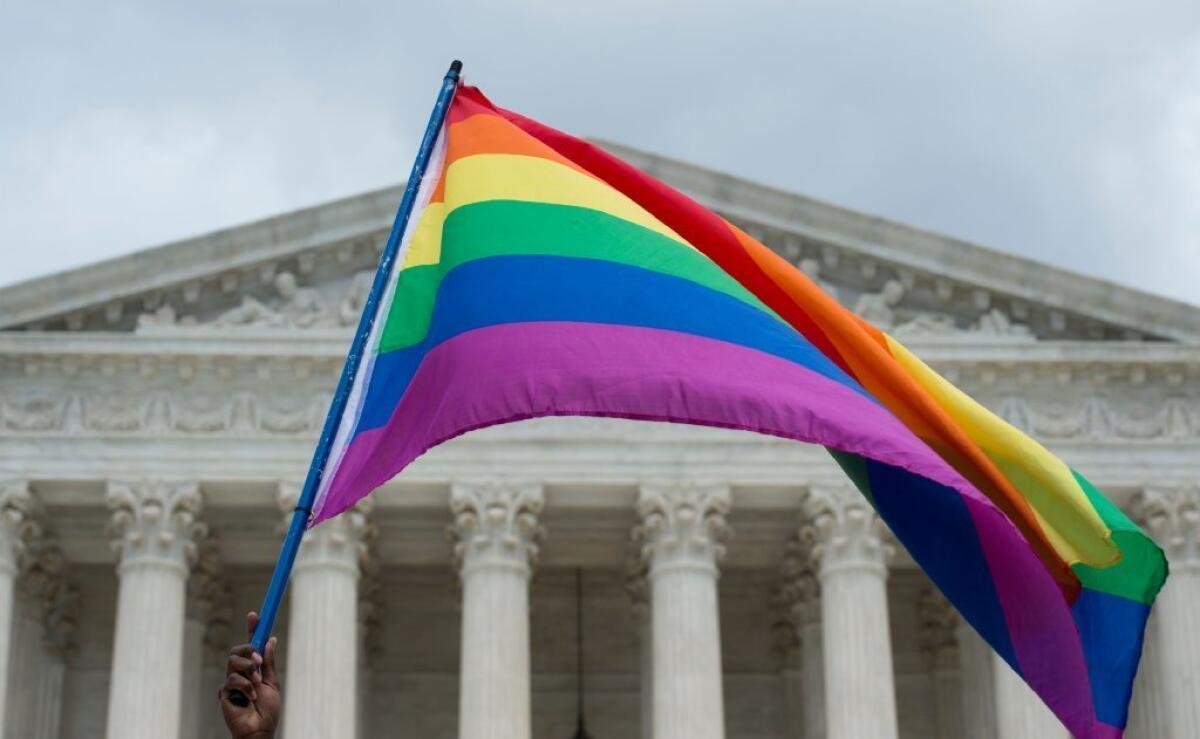
Masterpiece Cakeshop vs. Colorado Civil Rights Commission — a.k.a. the “gay-wedding cake case” — ended anticlimactically earlier this month. The Supreme Court ruled for Christian baker Jack Phillips, who refused to “create” a wedding cake for a gay couple, but it did so based on a secondary, more procedural issue.
On Monday the court essentially sidestepped a similar case involving a florist in Washington state that might have allowed it to confront the issues it dodged in the wedding-cake case. Instead, it asked the Washington Supreme Court to give the case further consideration in light of the Masterpiece Cakeshop ruling.
In appealing a finding that he had violated the Colorado Anti-Discrimination Act, Phillips had made two 1st Amendment arguments. One was that being required to use his talents to create a cake for a same-sex wedding celebration was a form of “compelled speech”; the other was that it would violate his right to the free exercise of religion.
At oral arguments in the case, the justices seemed especially interested in the compelled-speech argument and pressed Phillips’ lawyer about which “creative” occupations were protected by the 1st Amendment to the extent that their practitioners couldn’t be compelled to “speak” in favor of a gay marriage. Justice Elena Kagan asked if creating “a wonderful hairdo” for a wedding was protected speech.
But when the court ruled 7-2 in Philips’ favor, it avoided the compelled-speech issue and focused on the claim that the baker’s free exercise of religion had been violated.
Even then, Justice Anthony Kennedy didn’t say that compelling Phillips to serve a gay couple violated his freedom of religion. Rather, Kennedy said, the problem was that some members of the Colorado Civil Rights Commission had made disparaging remarks about religion, including a comment that freedom of religion had been used to justify all kinds of discrimination, including slavery and the Holocaust. Those comments “cast doubt on the fairness and impartiality” of the process, Kennedy wrote.
The court’s decision was widely criticized as a cop-out (including by the Los Angeles Times editorial board), and some court observers suggested that the justices would return to the issues in another case.
The appeal of Barronelle Stutzman, who declined to provide floral arrangements for a gay wedding, could have provided the court with such an opportunity. In petitioning the court, her lawyers too had made elaborate arguments about compelled speech and 1st Amendment protection for “custom wedding designs.” (They also wrote that “the state has defamed Barronelle as a bigot,” but that wasn’t the main emphasis.)
Accentuating the positive, Stutzman’s lawyers — who also represented Phillips — reacted to Monday’s action by suggesting that she was a victim of hostility from Washington’s state attorney general not unlike the bias that Phillips encountered in his dealings with Colorado officials. But it seems clear that the larger constitutional issues she — and Phillips — raised will go unaddressed.
That’s two half-baked rulings in one month.
You can’t shame the shameless
White House Press Secretary Sarah Huckabee Sanders had herself a weekend, after the owner of a Lexington, Va., restaurant politely pulled her aside and asked her to leave — the horror! — because of her complicity in the administration’s anti-LGBT policies and their abhorrent efforts to separate migrant children from their parents and lock them in cages.
Naturally, this being 2018, Sanders whinged about her treatment on Twitter.
Remember, this is the same Sanders who only weeks ago used her platform to celebrate the Supreme Court “Cakeshop” ruling that allowed a baker to openly discriminate against LGBT clientele. There is nothing respectful about her.
Sanders is an uncivil propagandist for an uncivil administration. Citizens of conscience denying her the creature comforts of decent society is the very least she deserves for her complicity in this administration’s excesses.
In response to Sanders’ restaurant ouster, Rep. Maxine Waters (D-Los Angeles) called on citizens to go even further.
“If you see anybody from that Cabinet in a restaurant, in a department store, at a gasoline station, you get out and you create a crowd and you push back on them, and you tell them they’re not welcome anymore, anywhere,” she said at a rally over the weekend.
This, mind you, is already happening. Homeland Security Secretary Kirstjen Nielsen, an architect of the separation plan, was chased from a New York Mexican restaurant (of all places) during the height of the scandal. And, according to one of the more schadenfreude-inducing stories in recent memory, no one in Washington, D.C., wants to date Trump staffers. They live siloed together in a dull, overpriced strip-mall on the city outskirts.
To this I say, good! The only thing worse than governing the country like Caligula would be if those complicit were living the emperor’s lifestyle too.
Here, however, is the obvious catch: Victimization is the bread and butter of the Trump movement. It is the political fuel that runs the machine.
That Sanders wouldn’t just quietly take her medicine tells you all you need to know about how a ramped-up effort at public shaming will be flipped for Trump’s political gain.
Just look how nimbly Fox News apparatchik Tomi Lahren (who likens Black Lives Matter to the KKK and has herself been recently shamed in public) has fashioned herself and those of like mind models of civility in the wake of recent events.
How gracious, Tomi! You’d shake the hand of the man you helped railroad out of a job and, essentially, branded a racist for his earnest efforts to bring awareness to police shootings of African Americans. I’m sure he’d be thrilled to have cocktails with you.
She then let loose with this response to a Maxine Waters comment:
Sadly, Lahren’s right. After Waters’ exhortation, every public incident of shaming will play as evidence in Trump country of their inherent victimization. That denying Sanders and her ilk access to fine dining will be perceived by Trump’s working class base as a slight against their kind is, of course, absurd. But this is where we are in 2018.
Besides that, the reality is that public efforts to make life unpleasant for Trumpsters isn’t really that effective. They simply retreat to their compounds where they continue to run the country into a moral abyss.
Or they go on the offensive and make vague threats of retribution.
You can’t shame the shameless.
Maxine Waters gives Republicans something to talk about other than Trump’s immigration failures
In the latest episode of Politicians Behaving Badly, a senior Democratic congresswoman and the president of the United States took turns calling on their followers (in thinly veiled fashion) to go rough up the other side.
First, Rep. Maxine Waters (D-Impeach Trump), almost but not quite invoking Winston Churchill, called on Americans to oppose top officials in the Trump administration wherever they encounter them.
“If you see anybody from that Cabinet in a restaurant, in a department store, at a gasoline station, you get out and you create a crowd and you push back on them, and you tell them they’re not welcome anymore, anywhere,” she told a crowd in Los Angeles rallying against the administration’s now-renounced policy of separating migrant families at the border.
Here’s a long except of her speech:
Naturally, President Trump responded on Twitter Monday:
At least Trump’s call to action was more skillfully coded. But the underlying message was unmistakable: Waters is on the attack, and the MAGA faithful should fight back.
This is what happens when politicians see no reason to appeal to anyone but their hard-core supporters. Waters represents a solid-blue district in the southern part of Los Angeles County, so the only audience she cares about is the one on the left. Trump worries only about holding on to the coalition of the disaffected that put him in office.
For the record, Nancy Pelosi, the House minority leader, distanced herself from Waters on Twitter:
We’ve reached the point where our policy disagreements are so intense, partisans believe it’s time for extraordinary tactics. They’ve come to view the other side in such absolute terms that the usual norms of a civil society are being tossed. They insist it’s a “false equivalency” to criticize their tactics or suggest that folks on the other side of the political spectrum might have a legitimate beef of their own. And they see Trump as either the guy pushing the country over a cliff or the one pulling it back from the edge.
Granted, the acrimony didn’t start with Trump’s inauguration. In fact, it helped put Trump in office, as he himself has noted. But his intemperate tweets and impolitic comments have fanned the flames while luring the likes of Waters to get down in the mud with him.
Much of what we’re seeing is merely a sideshow stealing attention from the main event, which at the moment is the administration’s gross mismanagement of the United States’ dysfunctional immigration system. But that’s precisely the point Waters seems to miss here: She wanted to be the call to action, but she became the distraction.
When a president attacks due process, democracy itself is at risk
President Trump has persistently expressed admiration for the autocrats of the world – from Vladimir Putin, whose agents have been implicated in the murders of political rivals, to Roberto Duterte, whose government has engaged in summary executions of suspected drug users. He’s also assailed the U.S. courts, fired an F.B.I. director over an investigation that threatens his presidency, and found nice things to say about neo-Nazis and racists marching in Charlottesville, Va., last year – one of whom allegedly killed a female protester with his car.
So it’s probably expecting too much to hope that a president with dreams of autocracy would care about due process.
On Sunday morning, as Trump headed for yet another outing at one of his golf courses, he tweeted that immigrants in the U.S. illegally should not receive due process but be summarily deported – which would violate international law and treaties.
On Monday, the president doubled down, tweeting:
Such tweets, of course, play well with his political base. And that’s where the danger lies – when the American people support a political leader who has such a blatant disregard for the U.S. Constitution and the fundamentals of law, then the democracy itself is at risk.
Democracy is an exercise in faith, and trust in institutions. We can rely on the courts to curb the excesses of the government, but only so far as the courts are willing. A Republican Party that is willing to embrace a leader who undermines the rule of law and due process – a conservative legal principle meant to protect individual liberty – is sorely in need of some soul-searching.
Why do congressional Republicans hate poor families?
While the country was distracted by President Trump’s sudden reversal on the policy of tearing apart immigrant families, the House of Representatives on Thursday quietly passed strict new work requirements for food stamps as part of a five-year farm bill.
The rules will do little more than stick it to poor families, since they won’t save much money. Hey Republicans, what do you have against poor families?
Trump said he “didn’t like the sight or the feeling of families being separated” when he signed the order reversing family separations Thursday, but was all praise for the tough new food stamp work requirements in the farm bill. So, Mr. President, the government should keep families together, but it shouldn’t be so quick to help them put food on the table?
The new eligibility rules for the Supplemental Nutritional Assistance Program will kick some 1.2 million people off the food stamp rolls by 2028, according to congressional analysts. Not because these people don’t really need help buying food, but because it will be harder for them to demonstrate and maintain eligibility.
Right now, adults without children are eligible for SNAP benefits for only three months out of every three years, unless they are working or in a government-sponsored training program. Parents of children under 6 are exempt, as are people age 50 or older. The new rules raise the exemption age to 60 and increase the numbers of hours of work required, even for parents with older kids at home, from 20 to 25 by 2026.
It’s not as if this is an overly generous benefit that folks are taking advantage of. The average beneficiary receives $126 a month and must be pretty poor to qualify.
And what is gained by tightening the rules? The Congressional Budget Office estimates this change will save $9.2 billion over 10 years, but it will cost about $7.7 billion to add more government training programs and administer the new rules.
That’s a small savings for such big helping of miserly pie.
Trump’s for it until he’s against it — unless he’s for it again. Our national reign of confusion continues

He’s for it until he’s against it. He’s against it until he’s for it. And then he sometimes changes his mind again. Welcome to Donald Trump’s reign of confusion.
The president did it again Friday morning, tweeting:
But just two days earlier, Trump went to Capitol Hill and told Republican members he was “1,000%” behind two pending immigration bills. The first one died on the floor Thursday, and a vote on the second one — also facing a hard path to passage — was delayed until next week while the GOP leadership tries to wrangle enough votes to avoid the embarrassment of back-to-back failures.
After Trump’s tweet, the long odds of that second bill passing got even longer.
In truth, both bills were bad measures that would never make it through the Senate. But at least Republicans were working hard to try to make progress. Trump’s support put some breeze in their sails. His tweet today becalmed them.
The president did something similar with the policy of separating children from migrant parents who enter the country illegally. First his attorney general ordered the arrests and jailing of the parents, which the government said meant it had to take away the kids. Then Trump said he hated to see it happen, but the law forced the action, and Congress had to fix it. Then he flipped and, using executive authority he previously said he didn’t have, ordered an end to the separations policy.
It’s enough to give you whiplash.
Trump did this on the Dreamers issue, too. He ordered an end to the Deferred Action for Childhood Arrivals program that President Obama had created to protect from deportation people who were living in the United States without permission after arriving here as children.
Then Trump told Congress it should pass legislation to fix the problem he created, and that he wanted to do “something nice” for the Dreamers. As proposals surfaced, Trump moved the goal posts, saying he’d veto any measure that did not include money for his border wall — an approach to border security that even some Republicans think is a foolish idea. In fact, Sens. Richard J. Durbin (D-Illinois) and Lindsey Graham (R-S.C.) produced a compromise Dreamers bill with money for the wall, only to have Trump nix that — even though it gave him some of what he said he wanted.
The president blames the Democrats for lack of congressional action, and it’s true that the opposition stands firmly against most of what Trump wants. (When you can’t believe what the president says, what else can you do?) But the root problem here is that the House GOP is paralyzed by internal philosophical squabbles over immigration policy (and so much else), so it can’t marshal a majority of its own members behind a proposal. Blaming Democrats is a smokescreen for GOP dysfunction.
And don’t get me started on the yes/no flips and position switches on North Korea, or the swamp he filled with Wall Street types and grifters his supporters believed he was going to root out. We’re still a member of the “obsolete” NATO (that’s a good thing, actually).
The president has shown time and time again that not only is his word no good, but agreements signed by previous administrations aren’t as binding as believed when they were agreed to.
That’s no way to run a country.
Cellphone data is an ‘intimate window.’ The Supreme Court tells police to stop peeking in

The Supreme Court on Friday handed down one of its most widely anticipated decisions of the term, holding that police must obtain a warrant based on probable cause before accessing a criminal suspect’s historical cellphone records. The decision involved Timothy Carpenter, who was convicted in a series of armed robberies based partly on cellphone-location data.
The court got it right, and privacy advocates have cause to celebrate.
Writing for the court, Chief Justice John G. Roberts Jr. recognized that time-stamped cellphone data “provides an intimate window into a person’s life, revealing not only his particular movements, but through them his familial, political, professional, religious and sexual associations.”
That created a reasonable expectation of privacy under the 4th Amendment.
Yet it was a narrow decision — in both senses of “narrow.” It was 5 to 4, and Roberts emphasized that it was also narrow in its scope.
In an editorial last November urging the court to rule in favor of Carpenter, the Los Angeles Times wrote that the justices “will have to overrule as outdated a nearly 40-year-old decision that allowed investigators to obtain personal information about suspects from third parties without a warrant.”
But Roberts found a way to rule for Carpenter without jettisoning the third-party rule, which says that individuals have no reasonable expectation of privacy in information they voluntarily turn over to banks, telephone companies and other businesses.
Roberts said specifically that “we do not disturb the application” of two decisions that relied on that rule, including the 1979 ruling our editorial mentioned. That ruling upheld the warrantless installation of a device called a pen register to record which phone numbers a suspect called.
Yet it’s possible to preserve a legal rule and hollow it out with one exception after another. In reacting to Friday’s decision, Andrew Crocker, a staff attorney for the Electronic Frontier Foundation, praised the court for rejecting “the government’s tired argument that sensitive data held by third parties is automatically devoid of constitutional protection.”
This decision made one exception to the third-party doctrine for cellphone location data. Perhaps a future decision will find that other electronic records held by third parties also provide such an “intimate window into a person’s life” that they, too, can be obtained by police only with a warrant.
A narrow opening is still an opening, and the door may open wider the next time.
No, Kim Kardashian isn’t trying to make her daughter look more white
It’s ridiculous that Kim Kardashian has been getting grief online for making her just-turned-5 daughter North’s naturally curly hair bone straight. The young girl (Kim K’s daughter with Kanye West, of course) was photographed, beaming, her long, shiny hair pulled tightly in a high ponytail. But critics sounded the alarm on Twitter — “Leave her natural hair alone,” someone cried out.
And this wasn’t even Kardashian’s first hair controversy in recent days; she also got lambasted for wearing cornrow-like braids at the MTV Movie & TV Awards last weekend. So she’s either appropriating a black hairstyle for herself (she said it was a tribute to Bo Derek) or making her black daughter’s hair look white.
Kardashian defended her daughter’s hairstyle, saying it was done with nothing more damaging than a flat iron. “It was her birthday and all she wanted was to try to have her hair straightened,” Kardashian told the Hollywood Reporter, adding, “I’m not gonna let her straighten her hair all the time, but if she wants it that way two or three days a year, then that’s fine with me.”
My guess is that this little girl is going to want her hair straightened a lot more than two or three times a year. Why wouldn’t she? She’s growing up looking at her mother’s ridiculously long, straight hair and all her aunts’ long hair and Beyoncé’s often long and blond straight hair. I predict that her mother (and father) will let her get her hair flat-ironed or whatever else she needs to do to get it straight as often as she wants.
And why shouldn’t they? Why should Kim Kardashian have to apologize for her daughter wanting her hair straight any more than we would want or need Michelle Obama to apologize for wanting her hair straight?
Straight hair is wildly popular — otherwise women with already relatively straight hair wouldn’t be crowding every DryBar salon in the United States to have their errant curls and waves blown out and flat-ironed into submission. Given her family’s financial resources, it’s just a matter of time before North West has her hair blown straight as often as Anna Wintour has hers done.
But maybe she won’t. Maybe she will wear it curly a lot. Regardless, this is not Kim Kardashian trying to somehow make her daughter look less black. If North wanted to bleach her skin and go all Michael Jackson on us, that would be disturbing. But that’s not what’s happening here.
We’ve evolved as a society. Sometimes, a hairstyle is just a hairstyle.
Crisis actor spotted at Texas child migrant detention center

First Lady Melania Trump paid a visit to McAllen, Texas, on Thursday to make an “unannounced” visit to the migrant children detained at Upbring New Hope Children’s Center.
In a short speech, the first lady thanked staff for their “compassion and ... kindness.”
Her obvious damage control efforts came as the Washington Post reported that the U.S. Border Patrol no longer will follow the Trump administration’s “zero tolerance” policy of bringing federal criminal charges against all migrant parents caught illegally crossing the border with their children. If true, this would be a major departure from Wednesday’s executive order, which decreed that instead of forcibly separating migrant children from their parents, kids instead would be detained alongside them.
The first lady’s visit came after an additional report alleging that many of the detention centers where migrant children are being sent have sordid histories of physical and sexual abuse. One particularly disturbing case alleges that the mother of a young Guatemalan boy was sent the hospital bill for her son’s sexual assault inside a New York migrant shelter. She claims to have been told only that there had been “an incident with a boy.”
Other migrant detention centers have allegedly been drugging children against their will with psychiatric medication that “rendered them unable to walk, afraid of people and wanting to sleep constantly.”
Oh, and then there was this:
To those who think I may be besmirching the first lady’s noble intentions on behalf of the children, I submit the following for consideration, without additional comment.
By the way, Melania Trump is — of course — no more an actual crisis actor on this issue than the child immigrant detainees Ann Coulter accused of being crisis actors because they were crying.
Scott Pruitt spent $2,700 on ‘tactical’ pants and polos
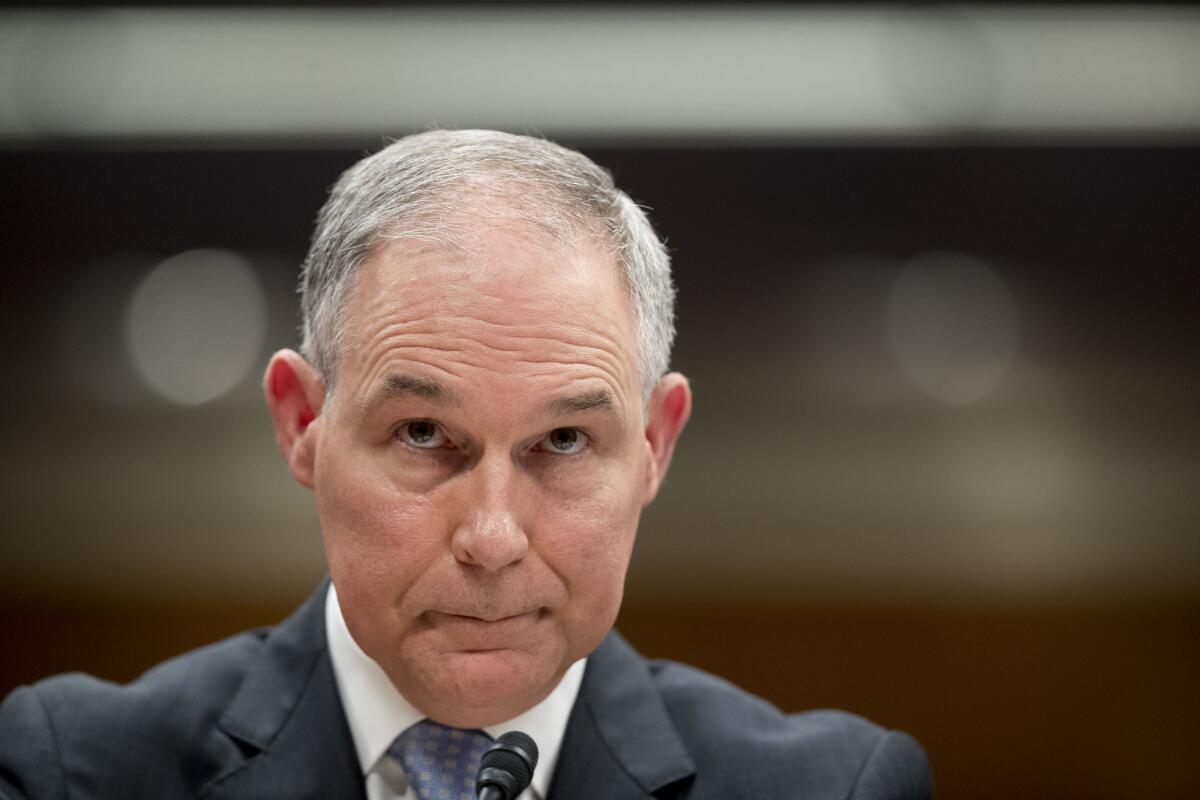
If it wasn’t so serious, this stuff would be laughable.
Scott Pruitt, the head of the Environmental Protection Agency, is up to his neck in ethics investigations and has been criticized even by some Republicans (though they don’t seem too upset) over his, shall we say, profligate ways.
Now the Intercept reports, based on records released under the Freedom of Information Act, that Pruitt has spent more than $4.6 million in federal tax dollars on his own security — including more than $2,700 on “tactical pants” and “tactical polos.”
Presumably that refers to special clothing for his security team, but it sounds more like he’s hiring pairs of pants to consult on tactics — perhaps in meetings conducted in his soundproof telephone booth to discuss how to go about buying a used mattress from the Trump International Hotel (yes, Pruitt tried to do that).
[Update, 2:52 p.m.: The EPA said late Thursday that the tactical pants and other equipment were “routine expenditures” for equipment for security agents engaged in executing search warrants, making arrests, disaster response and other activities. It added, “This attire is not used for protection work.”]
But Pruitt’s spending on security is no laughing matter. The new total is up $1.1 million from a report released just a month ago, according to the Intercept, and far ahead of what past EPA directors have spent.
The EPA has argued that the security is necessary because of death threats to Pruitt, yet the 24/7 security was approved by the White House before Pruitt even began the job. And subsequent reporting revealed that the number of legitimate death threats is zero.
Yet he spends. And spends.
How swampy.
No, the Supreme Court did not just tax the internet

Attention, online shoppers: The Supreme Court’s ruling Thursday letting states force online retailers to collect sales taxes will not raise your tax bill. It will merely make it considerably harder for you to avoid paying it.
Overturning two previous decisions, a divided court in South Dakota vs. Wayfair, et al. held that South Dakota could require online retailers to collect sales taxes from South Dakota shoppers even if the retailers had no offices or employees there. This “physical presence” requirement established by those prior rulings amounted to “a judicially created tax shelter” for companies that sold online, Justice Anthony Kennedy wrote for the court’s majority.
That’s not a great analogy, actually — it wasn’t a tax shelter for online retailers because they weren’t the ones who owed taxes. A retailer’s role is simply to collect the taxes owed by their customers.
Nevertheless, opponents of state and local efforts to require online sellers to collect sales taxes have muddied the waters about what’s at issue. The debate isn’t about new taxes on retailers or shoppers. It’s about who has to collect them.
Here’s the key point. In all 45 states with statewide sales taxes, residents owe the tax on all the purchases they make, whether they fill their shopping cart down the street or on a website for a distant retailer. If the taxes aren’t collected at the point of sale, the shopper has to pay them when he or she files an annual tax return.
But states don’t have an effective way of enforcing this requirement. So online retailers that refuse to collect taxes at the point of sale make it easy for their shoppers to become tax dodgers.
(There is, of course, a wrinkle: In Idaho, Iowa and Mississippi, local taxes are owed only at the point of sale. So while shoppers there have to pay state taxes on untaxed online sales as part of their annual returns, they legally avoid local sales taxes.)
Kennedy noted this problem, and argued that it wasn’t appropriate for the courts to impinge on states’ sovereign power to tax their own residents. He also observed that with the vast expansion of online commerce, the inability to collect sales taxes effectively from online shoppers is draining sales-tax dollars from state and local coffers and putting brick-and-mortar retailers at an unfair disadvantage.
All of that is true, although requiring online retailers to start collecting sales taxes won’t necessarily change the shopping habits that have built up over the last two decades. The more likely consequence is an increase in sales tax revenue to state and local governments.
Economist Alan Viard of the American Enterprise Institute noted that states are still prohibited by other Supreme Court rulings from imposing undue burdens on interstate commerce. That prohibition should limit how states extend sales-tax obligations to online retailers, Viard said — for example, they may want to follow South Dakota’s lead and require only businesses making large or frequent online sales to collect taxes.
Notably, all nine justices agreed that the previous cases on mail-order sales were wrongly decided. But Chief Justice John Roberts and three of the court’s liberal justices dissented from Kennedy’s opinion because they worried about the effect of abandoning such well-established precedents.
Place your bets now on whether Roberts has any qualms about abandoning precedent when it comes to public employee union dues.
What Canada can teach the U.S. about marijuana: Legalize it, don’t advertise it
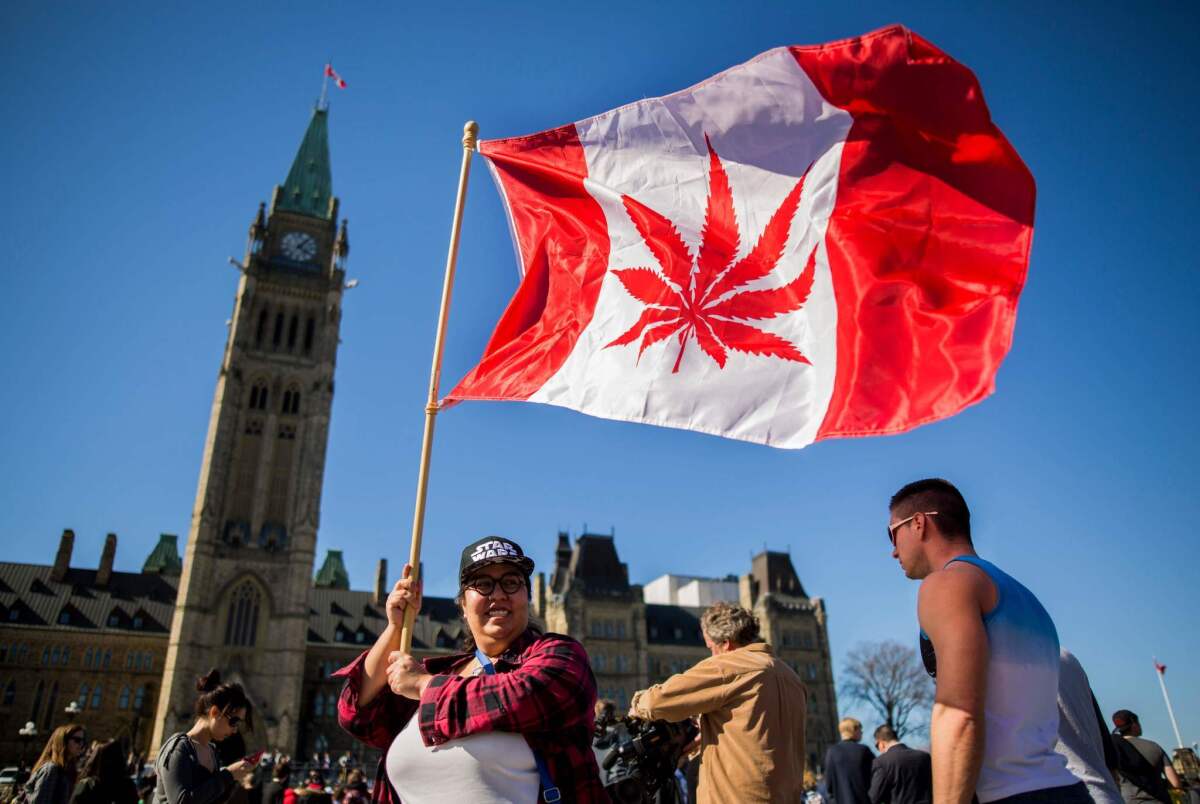
Canada will soon become the first industrialized nation in the world to legalize marijuana. The Canadian Senate gave final approval to a legalization bill this week, although Prime Minister Justin Trudeau delayed the effective date until Oct. 17 to give the provinces more time to prepare.
This is a watershed moment in the effort to end the unpopular and unjust war on marijuana. The U.S., which may finally be inching toward ending its own failed effort at prohibition, should be watching carefully to see what our neighbor to the north does and doesn’t do well.
For example, what’s the right age to allow people to buy and use marijuana?
In the U.S., the eight states that have legalized recreational pot set the minimum age at 21, matching the legal age for buying alcohol. Canada set the legal age for marijuana at 18 but allows provinces to make the final decision. Most provinces are settling on 18 and 19. (The legal drinking age in Canada is 18 or 19, also depending on the province.)
The Canadian Medical Assn. had recommended a minimum age of 21. Actually, the association said the ideal legal age would be 25, when the brain is fully developed and the health risks of regular marijuana use are reduced. But the group recognized that would be unrealistic.
Indeed, the task force that recommended the country’s path to legalization noted that the highest rates of marijuana use are by 18- to 24-year-olds. Setting the minimum age too high means a large group of consumers would continue to get their pot on the illicit market, which Trudeau and his Liberal Party are trying to stamp out through legalization.
Canada’s decision to let 18- and 19-year-olds buy and consume marijuana offers an interesting experiment and comparison with U.S. states that set the legal age at 21. Does delaying the legal age also delay use? Does a younger legal age have an impact on the black market?
Canada is also planning to strictly regulate marijuana packaging and advertising. All products must be in plain, child-resistant packages with prominent health warnings, similar to those on packs of cigarettes; the warnings include “Regular use of cannabis can increase the risk of psychosis and schizophrenia,” and “Do not use if pregnant or breastfeeding.” And the wrappers can’t be shiny or covered in company logos.
Rules on advertisements are expected to be equally restrictive – no celebrity endorsements, no mascots, no lifestyle ads. The government’s goal is to make the pot products unappealing to children and to prohibit marketing and ads that glamorize marijuana or entice people to try it.
This is a far cry from how U.S. states have handled cannabis promotion. There are billboards for pot shops, fancy packaging and products backed by Snoop Dogg, Willie Nelson and Melissa Etheridge, to name a few celebrity endorsers.
Studies (including a recent one from the nonprofit Rand Corp.) have shown the more exposure young people have to marijuana advertising, the more likely they are to use the drug and to have positive views about it. So there’s a clear public health reason to restrict advertising and tightly control marketing. Yet U.S. states have been less aggressive than Canada. Meanwhile, pot companies are heavily lobbying Canadian authorities to loosen the strict packaging requirements, and it remains to be seen if the growing political influence of pot entrepreneurs will sway lawmakers.
Then there are the other challenges presented when a nation chooses to buck worldwide norms by legalizing marijuana. Canada’s decision will cause it to violate international drug treaties that require countries to reduce the use and distribution of illegal drugs, including marijuana. So that will require some work on the part of Canadian diplomats.
Nevertheless, Canada’s leadership on drug reform should help elected officials in the U.S. by demonstrating that it’s feasible to end prohibition on a national level. Congress and the Trump administration have a front-row seat as our neighbor and close ally figures out how to do legalization right.
Is Trump’s new detention policy a ploy to round up even more immigrant families?
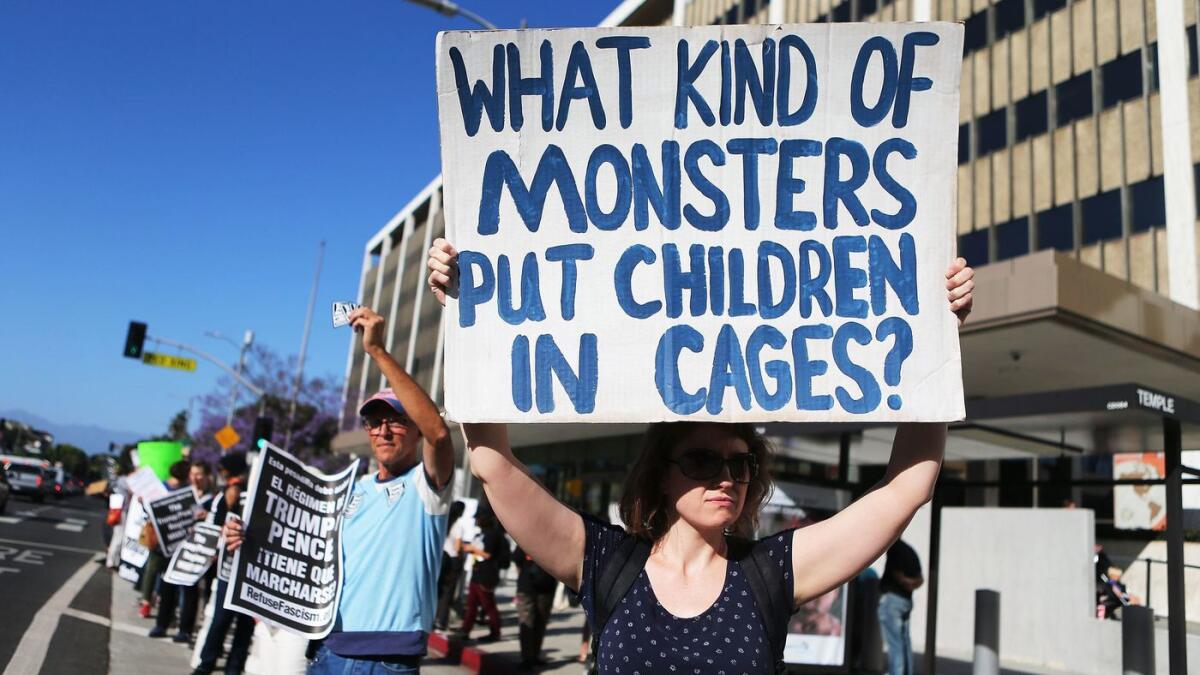
President Trump was right to end his inhumane policy of separating children from parents charged with the misdemeanor crime of crossing the border without permission, but his executive order seems to contain the seeds for an even broader attempt to detain whole families as they go through deportation hearings.
Part of the order reads:
“Sec. 3. Temporary Detention Policy for Families Entering this Country Illegally. (a) The Secretary of Homeland Security (Secretary), shall, to the extent permitted by law and subject to the availability of appropriations, maintain custody of alien families during the pendency of any criminal improper entry or immigration proceedings involving their members.”
It’s the “or immigration proceedings” that stands out. The order identifies an “alien family” as “not a citizen or national of the United States who has not been admitted into, or is not authorized to enter or remain in, the United States, who entered this country with an alien child or alien children at or between designated ports of entry and who was detained; and … that person’s alien child or alien children.”
So it reads as though families caught far from the border could also be detained.
Trump also ordered the attorney general to seek a modification to the Flores consent decree, which bars the government from detaining minors for more than 20 days. The order calls for the agreement to be modified “in a manner that would permit the Secretary, under present resource constraints, to detain alien families together throughout the pendency of criminal proceedings for improper entry or any removal or other immigration proceedings.”
Again, the “or” construct is important. This seems to authorize – despite the limitations placed on the government two decades ago by the Flores agreement – the detention of any family facing deportation proceedings, even if no members have been accused of a criminal violation.
Of course, finding space for all those people would be a challenge. And getting around what seems likely to be a flash injunction would be tough, too.
But in resolving the issue of separating kids from their parents who entered the U.S. without permission, the administration may be setting the stage for a broader detention policy.
Telecom companies just flexed their muscles and neutered a California net neutrality bill
It’s hard to find a more powerful lobbying group in Sacramento than the telecom companies, and on Wednesday they flexed their muscles again.
The Assembly Committee on Communications and Conveyance quickly carved several giant loopholes in a Senate-passed net neutrality bill, allowing broadband internet service providers to (among other things) charge websites and services fees to reach the ISPs’ customers, exempt their own content from the data caps applied to rival services, and throttle entire classes of applications in the name of network management.
The amended measure (SB 822 by Sen. Scott Wiener, D-San Francisco) still offers broad protections for net neutrality, barring ISPs from blocking, slowing or prioritizing for a fee any lawful data on their networks. It also includes a general rule against ISPs unreasonably interfering with the ability of consumers to use the websites and services they prefer, or the ability of sites and services to reach their customers.
That’s all modeled after the net neutrality rules the Federal Communications Commission adopted in 2015; the commission’s new Republican majority voted last year to repeal the rules. But an amendment by the committee’s chairman, Assemblyman Miguel Santiago (D-Los Angeles), removed a host of provisions in Wiener’s bill that spelled out more precisely what ISPs could and could not do. Those provisions were modeled after the lengthy order the FCC adopted alongside its 2015 rules. And preserving the language in the order is, in Wiener’s view, just as important to a successful state net neutrality regime as copying the rules themselves.
One could argue that the broad prohibitions that Santiago’s amendment left in place are sufficient to protect net neutrality. But at the very least, the changes open the door to years of litigation as ISPs experiment with new ways to extract revenue from internet users or to boost their own apps and services. And as much as telecom executives proclaim their commitment to net neutrality principles, the record is replete with examples of non-neutral steps they’d like to take to raise revenue.
Charging websites fees to reach an ISP’s customers is one example that has been kicked around for more than a decade. In addition, the amended bill no longer includes a ban on ISPs blocking or throttling data at the point where it enters or exits their networks. Nor does it bar ISPs from trying to circumvent the ban on paid prioritization by dedicating a portion of their internet bandwidth to “specialized services” that receive prioritized delivery for a fee (think: online movie services in 4K Ultra HD).
Such maneuvers might run afoul of the general prohibitions on blocking, throttling and unreasonably interfering. But if the bill passes as it’s currently written, ISPs would no doubt argue that removing the specific prohibitions were the Legislature’s way of implicitly granting permission.
The committee’s move to drop the ban on ISPs “zero rating” their own services — that is, exempting them from any data caps they impose — is particularly galling at a time of feverish industry consolidation. AT&T already zero rates its DirecTV Now online video service; one can only imagine what it might do with online offerings from its newly acquired Time Warner channels.
Opponents of net neutrality rules argue that they stop ISPs from innovating in ways that may help consumers. And clearly, some zero-rated offerings are pro-competitive; the original version of SB 822 would not have prohibited them.
But the whole point behind net neutrality rules is to limit the freedom of ISPs that face little or no real competition. If communities had four ISPs all offering 50 Mbps services to consumers, maybe we could count on competition to guard against ISPs picking winners and losers among websites, apps and services. The rollout of 5G wireless, with its gigabit data speeds, could bring us to that point. But we’re nowhere near that today.
Lawmakers have several more opportunities to fix the damage Santiago inflicted on SB 822. They should do so. Otherwise, the message they send to the rest of the country is that strong net neutrality isn’t all that important in the land of Silicon Valley and Silicon Beach.
Trump ends family separations — by locking kids up with their parents instead
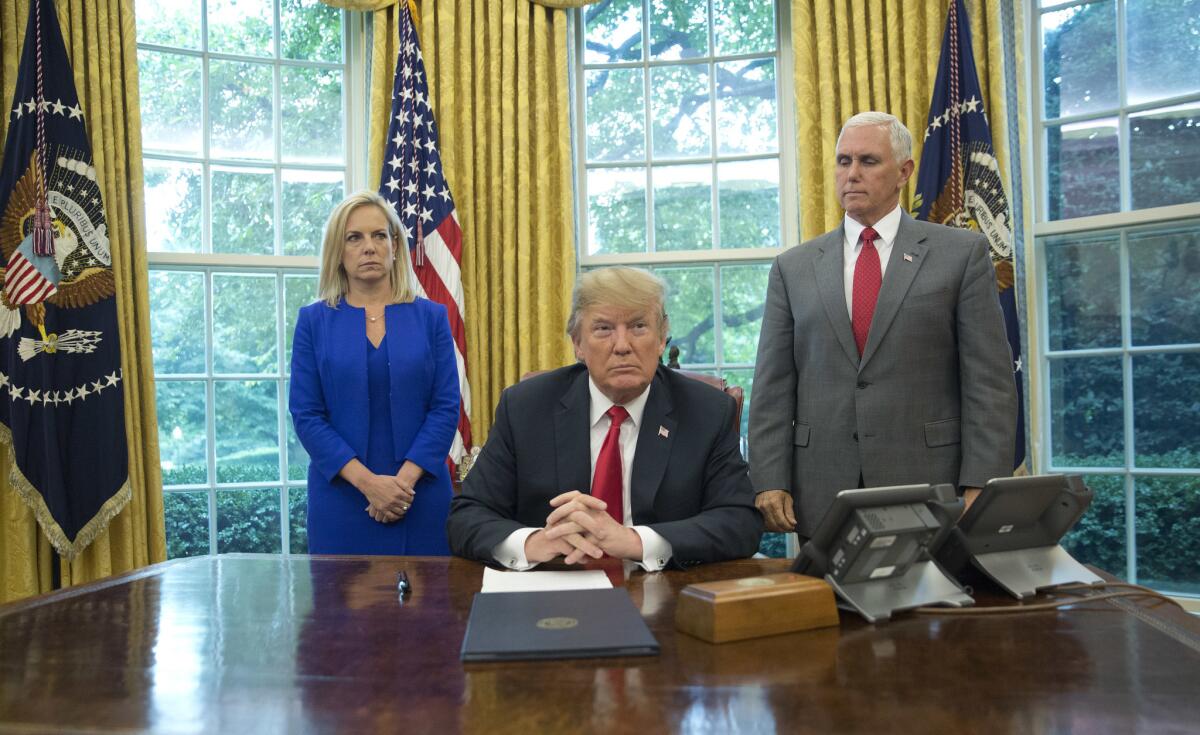
The nation should be thankful that President Trump finally came to his senses and ended the inhumane and traumatizing practice of separating children from their immigrant parents who illegally enter the United States.
Facing an extraordinary backlash not just from Democrats but from Republicans, every living former first lady (including his own wife), United Nations human rights officials, Willie Nelson, Pope Francis and many, many others who reacted in dismay to photos and videos of crying children corralled in metal cages, Trump probably had little choice.
But his solution — detaining entire families together while the adults face, in most cases, misdemeanor charges of illegal entry — raises enormously troubling problems of its own. Innocent children do not belong in jails or detention centers, as a 20-year-old federal consent decree acknowledges.
The congressional Republicans and Christian conservatives who spoke out against splitting up children and parents — more than 2,300 have been separated — deserve acknowledgment for finally drawing a line, though it is disheartening that it took a policy as inhumane and damaging as ripping children from their parents’ arms to finally get them to stand up to the administration.
Of course, the president’s change of heart also put the lie to his assertions, echoed by underlings such as Homeland Security director Kirstjen Nielsen and Atty. Gen. Jeff Sessions, that loopholes in immigration laws and court decisions made the separations necessary. They did not. It was Session’s “zero tolerance” policy decision to charge all suspected illegal border crossers with crimes and detain them pending court action. While entering the country without permission is a misdemeanor, no law requires the government to prosecute every violation. And no law or court decision says the government has to detain the border-crossers, leading to family separations. The administration chose to do that.
But now the government apparently will keep the families together in detention, which is a direct violation of the 1997 Flores consent decree, augmented by the 9th Circuit Court of Appeals decision in 2016, which says the government cannot hold undocumented children in detention centers for more than 20 days, with or without their parents.
In the Trump administration, conflicts of interest barely cause a stir
If there’s a small silver lining to be found in the cloud that descended over Washington with the Trump inauguration, it might be that placing billionaires and unprincipled people in positions of power has exposed weaknesses in federal ethics rules.
Politico reported Tuesday on Interior Secretary Ryan Zinke’s role in a proposed development project funded by the chairman of Halliburton in Zinke’s hometown of Whitefish, Montana.
As Politico notes, Zinke’s day job involves overseeing more than 500 million acres of federal land, much of which the administration wants the private sector to use for energy production, including coal mines and oil and gas drilling. That just happens to be the kind of work that Halliburton, the nation’s largest oil-services company, is involved with.
But that apparent conflict of interest could well be legal, though a federal ethics expert said Zinke would likely have to recuse himself from any government decisions affecting Halliburton.
Then, separately, Forbes reported Monday that wealthy Commerce Secretary Wilbur Ross, rather than divesting when he joined the administration, put most of his investments in a trust that benefits his children. Ross also seems to have dumped his stake in the International Automotive Components Group, which he co-created in 2006 to make interior component for cars, into the trust.
Last month, President Trump assigned Ross to investigate auto imports to see if they pose a national security risk (I know, that’s a head scratcher), which Forbes writes puts Ross in the driver’s seat for decisions that could affect his family’s wealth.
Further, after New York Times reporters sent Ross questions about his investments in the Kremlin-linked Navigator Holdings, Ross bought a short position predicting that the company’s stock price would take a hit once the story broke.
Whether Ross’s stock play was based on information not available to the general public, which would run afoul of federal laws, is a matter for the Securities and Exchange Commission to figure out. (He says he did nothing wrong). At the least, it makes for “bad optics,” as they say.
But then, a lot of Ross’s dealings raise significant conflict of interest questions — even if they don’t technically violate federal ethics rules. As Forbes wrote:
“For most of last year, Ross served as secretary of commerce while maintaining stakes in companies co-owned by the Chinese government, a shipping firm tied to Vladimir Putin’s inner circle, a Cypriot bank reportedly caught up in the Robert Mueller investigation and a huge player in an industry Ross is now investigating. It’s hard to imagine a more radioactive portfolio for a cabinet member.”
Well, maybe in any of the previous 44 administrations (with the possible exception of those run by Presidents Grant and Harding, where graft ran rampant).
But given the conflicts of interest surrounding the Trump family, and the free pass Trump’s congressional enablers have given him, there’s not much room for optimism that anyone will do anything about this.
The latest Trump healthcare fix is better than most. But that doesn’t mean it’s good
The Trump administration on Tuesday released the details of its latest effort to cut some Americans’ insurance premiums — and undermine Obamacare in the process. The surprise is that, unlike every other initiative from this crew, it may well help some people obtain real coverage at a lower price. What’s not surprising is that the move will make the state Obamacare exchanges more expensive and less stable than they are today.
The final rule released by the Labor Department would open up association health plans — the sorts of coverage offered by local chambers of commerce, trade groups, professional associations and the like — to more employers and self-employed individuals. The idea is to give a wider range of small businesses’ employees and sole proprietors an alternative to the state Obamacare exchanges and local insurance markets.
Because these plans would be governed by the same federal laws that regulate the benefits large employers offer their workers (such as the Health Insurance Portability and Accountability Act of 1996), they would have many of the same protections that Obamacare extended to the non-group market. Most significantly, the plans could not deny coverage or charge higher premiums based on preexisting conditions.
So far, so good, right? But here’s where things start to come apart. Plans can’t discriminate between members of a particular group, but they can create plenty of groups and treat each one as a separate risk pool. For example, they can create separate groups for full-time and part-time workers, for cashiers and delivery drivers, or for city dwellers and rural residents. They also can discriminate between group members and their dependents.
Just as in the state Obamacare exchanges, each risk pool’s premiums will depend on the claims filed by its members. The smaller the pool, the fewer members who’ll have to cover its costs. That’s been a problem for Obamacare — the pools in some states, particularly rural ones, were too small to absorb the claims.
Nor will associations have to offer comprehensive insurance, as the Obamacare exchanges do. One sure way to cut premiums is to exclude coverage for maternity care, mental health treatments and other costly procedures that only a portion of the population needs. Doing so, however, will leave the Obamacare exchanges and local markets with even more expensive risk pools, causing premiums to rise faster than they are now.
In sum, the Labor Department’s rule — unlike, say, the administration’s support for junk insurance policies — may well help some people who need real insurance get coverage at a more affordable price. But it doesn’t address the problems faced by people who need comprehensive insurance but can’t get it from a large employer; instead, like so much of what the administration is doing in healthcare, it will just make things worse.
The ultimate losers here are the people who are too well off to qualify for subsidies in the Obamacare exchanges. They are getting squeezed out by the ever-rising premiums. Meanwhile, the taxpayers are getting stuck with an ever-growing tab for the people who do qualify for subsidies, who in the long run may be the only ones left in the exchanges.
As Trump throws the country into chaos to get his wall, migrants putt-putt their way to the U.S. by boat
There’s a certain irony to this: While President Trump was commenting yet again about walling off the border with Mexico, authorities were discovering pangas — small Mexican fishing boats — beached in Orange County by, police believe, migrants evading border controls.
So build a wall and people will just find a way around it. Or over it. Or under it.
The reality about illegal immigration is that it is diminishing on the border with Mexico. Increasingly, it’s a consequence of people entering the country legally, and then not leaving when they are supposed to.
In fact, in 2016, some 629,000 students, tourists, business travelers and other foreign visitors who entered the U.S. with temporary permission were believed to still be in the country at the end of the year, the government reported last year (statistics for 2017 don’t seem to have been released yet).
Compare that with estimates of 170,000 to 200,000 people annually who have successfully sneaked across the border in recent years (304,000 others were apprehended last year), according to government and independent estimates.
And a large share of the folks who get apprehended are kids or families who turn themselves in and seek asylum — though families now are finding themselves arrested and separated, an inhumane response to their desperate pleas for help.
The president has made it abundantly clear that his views on immigration are based on race and ethnicity — remember the “shithole countries” comment and his preference for immigrants from Norway? He routinely disparages immigrants in the country illegally, and this morning again tried to blame illegal immigration on Democrats who “want illegal immigrants, no matter how bad they may be, to pour into and infest our country.”
This is xenophobia, through and through. It is coming from the mouth (and the Twitter finger) of the man the U.S. elected to be our face to the world.
Yet still the desperate come, even taking to sea in small open boats. Trump’s “big, beautiful wall” will do nothing to stop that.
There’s nothing new about tearing kids away from their parents. We do it all the time in our prison system
The scenes of parents being separated from their children at the border are shocking and shameful. But taking children from their mothers is not a new practice nor is it inflicted only on border-crossers. It is the way the American penal system regularly treats women in the criminal justice system, whose children often suffer lives of deprivation, stigma, loneliness and trauma as a result.
There are currently about 219,000 women behind bars in the United States, according to a study by the American Civil Liberties Union last year, about eight times as many as were incarcerated in 1970.
Of those, 80% are mothers, and most are the primary caretakers of their children — or were, before they were separated.
What’s more, it is estimated that 1 in 25 female inmates is pregnant when sent to prison. In many states, inmates who give birth while incarcerated are shackled during labor and delivery. When a child is born in prison, it is almost immediately handed over to a social worker to be sent out to a family member or to foster parents. Often those separations turn out to be permanent. In many cases, there is no father present or available to take custody of the child.
You can say, as some people do, that this problem does not merit our concern. All these women committed crimes and are suffering the punishment. Perhaps they should have thought about the consequences of their actions before they misbehaved.
But of course there are several problems with that glib response.
For one thing, the people who suffer most from this situation are not the incarcerated mothers but the children, who are not just sad on a day-to-day level at being separated from their mothers, but often are damaged psychologically by the combination of trauma, pain and stigma. (Parental incarceration is now acknowledged as an “adverse childhood experience” by the U.S. Department of Health and Human Services.) Unsurprisingly, these children, who have not themselves committed crimes or offended society, are disproportionately non-white — because it is their parents who get locked up at higher rates and their parents who are less likely to make bail. The imprisonment rate for African American women (96 per 100,000) is twice the rate of imprisonment for white women (49 per 100,000).
Furthermore, it is important to remember that of the thousands of women being held in county jails, 60% have not been convicted of crimes and are merely awaiting trial. In many cases, they are behind bars, separated from their children, facing charges for which they are subsequently found not guilty.
Even among those who ultimately are found guilty, 25% are convicted of nonviolent drug offenses.
If for some reason you find it difficult to imagine the pain suffered by these mothers and children, try watching this seven-minute documentary about children being taken by bus to visit their mothers in remote prisons in rural California on Mother’s Day.
Or read Rachel Kushner’s excellent new novel, “The Mars Room,” about a young inmate in a California women’s prison. Among other things, she is trying desperately to find out what happened to her child when she was locked up and to get back to him. Some 850,000 children in California have a parent currently involved in some way in the criminal justice system, according to the makers of the Mother’s Day documentary.
In recent years, there has been more attention paid to this issue. There are an increasing number of programs around the country that allow children to spend more time with their incarcerated parents, including prison nurseries in some states that allow women to keep their newborns with them behind bars. It makes intuitive sense that spending more time with a parent is good for a child, but there is also research suggesting that it leads to less recidivism when the mother gets out. These programs deserve more study, more resources and more of our attention.
The soccer world isn’t doing enough to combat its homophobia and racism

Here’s a reason not to root for Mexico in the World Cup soccer tournament: fans of El Tri chanting anti-gay slurs at players on the field.
FIFA, the troubled organization that oversees world soccer, opened an investigation into reports that Mexico fans chanted the insult Sunday as German goalkeeper Manuel Neuer got ready for a goal kick (putting the ball back in play after it went out of bounds).
Yet this isn’t anything new, nor limited to Mexico fans. In fact, Los Angeles Galaxy fans chanted the slur during a May match at StubHub Center in Carson against FC Dallas on — wait for it — the club’s “Pride Night” celebration for fans. But it has been a persistent problem FIFA has failed to properly counter. As the Guardian reports:
“FIFA issued 51 disciplinary actions over homophobia during 2018 World Cup qualifiers. Of these, 11 were handed to the Mexican federation, with Argentina, Brazil, Chile, El Salvador, Honduras, Panama and Peru also receiving multiple fines. FIFA additionally cited Colombia, Costa Rica, Ecuador, Paraguay, Uruguay, Greece, Hungary and Serbia once each for homophobic chants.”
Racist taunting is also a problem. In March, Russia fans directed monkey noises at black French players during an exhibition game between the two national teams in St. Petersburg. That cost the Russian federation a $31,000 fine.
But fines have not deterred such behavior, and that points up one of the fundamental problems with soccer’s attempts to control racism, homophobic slurs and other unsavory aspects of fan behavior.
FIFA doesn’t have the will to take meaningful steps to address the problems. It’s true that its options are limited — an international federation doesn’t have much direct control over fans in disparate countries. But it does have some tools beyond the slap-on-the-wrist fines.
It can (and occasionally does) halt play when the crowd starts hurling bigoted epithets and taunts, which is what it should have done Sunday as the fans did their “ehhhh …. puto!” chant (using a slur reference for a gay sex worker) as the goalie put the ball in play.
Instead, FIFA announced an investigation, which means in a few weeks the Mexican federation may get a fine while the offending fans get a giggle.
FIFA claims it’s serious about confronting racism and homophobia among fans, but its lack of action speaks loudly. Sending a bill for a few thousand dollars to organizations that handle millions hasn’t been effective.
FIFA managed to throttle back hooliganism — rowdy fans traveling to matches to fight with fans of the opposing team — through direct responses, including pressuring national federations and teams to ban admission by known hooligans to stadiums and, at the national level, barring travel to foreign countries where matches and tournaments are being held.
Similar steps could go a long way toward combating the insults. So could FIFA halting — or even postponing — more matches because of fan behavior. That would be a big step, yes, but it’s clear that forceful action is necessary if FIFA is to knock some of the racist and homophobic tarnish off its sport.
But then, FIFA granted this World Cup tournament to Russia, which has a horrendous record on gay rights. If it was sincere about combating anti-gay attitudes, there were plenty of other countries it could have picked.
President Trump moves to triple his America First tax on U.S. businesses and consumers

Chances are pretty good that you haven’t felt the sting of President Trump’s punitive tariff policies. But you will.
The president announced late Monday that China had (unsurprisingly) refused to buckle in the face of his decision to slap tariffs on $50 billion worth of goods imported into the United States. Instead, China had retaliated with tariffs on $50 billion worth of U.S. exports, “threatening United States companies, workers, and farmers who have done nothing wrong,” the administration said in a statement.
Therefore, Trump said, the administration will identify $200 billion worth of Chinese goods to be hit with an additional 10% tariff. “If China increases its tariffs yet again, we will meet that action by pursuing additional tariffs on another $200 billion of goods,” Trump declared, adding, “The trade relationship between the United States and China must be much more equitable.”
Well, yes, but Trump’s path from here to there is going to get costly — not for China, which has a fast-growing economy, a robust savings rate, a proven ability to navigate its way around trade barriers and an entire world of other trading partners. Instead, the burden will fall on U.S. businesses and consumers that buy low-cost Chinese goods.
The Wall Street Journal reported Tuesday that the first big Trump tariff — on imported washing machines — had caused a 17% increase in the price of washers in the United States. Most consumers didn’t feel the sting of that increase because they already had a washer; in fact, the Washington Post estimated that the tariffs announced before Monday reached barely 4% of the goods imported into the U.S.
The moves announced Monday, however, would roughly triple the amount of goods affected. And if Trump followed through on the full threat and slapped tariffs on $400 billion worth of Chinese goods, that theoretically would reach 20% of imports.
Remember, tariffs cost consumers and businesses that switch to U.S.-made goods too, by pushing them away from cheaper imported products. That’s the point; the intended payoff is to shift jobs back to U.S.-based manufacturers. But the evidence from previous trade wars is that tariffs wind up eliminating more jobs in other industries than they create in the one the administration is trying to protect.
Economist Mark Zandi told the Journal that the U.S. economy would still grow in spite of the tariffs, just not as fast. So the president isn’t exactly pushing the U.S. back into recession. Still, you have to wonder when Trump’s supporters and the Republicans who represent them in Congress will start to squawk that it’s costing them too much to put America First.
Separating children from their parents is one of the most inhumane things this president has done
As condemnations grow over President Trump’s “zero tolerance” policy toward illegal border crossings, under which 2,000 children have been separated from their parents, President Trump on Monday morning took aim at … Germany.
“The people of Germany are turning against their leadership as migration is rocking the already tenuous Berlin coalition,” the president tweeted. “Crime in Germany is way up. Big mistake made all over Europe in allowing millions of people in who have so strongly and violently changed their culture!” He followed that with: “We don’t want what is happening with immigration in Europe to happen with us!”
Somebody get that man an atlas. The migration problems confronting Germany and its neighbors arose directly from war in the Middle East (a war in which the U.S. is an active participant) and instability in sub-Saharan Africa, which together have sent more than a million refugees to the nearest stable destination: Europe.
Yet that reality doesn’t enter into the president’s thinking — all he wants is another bogeyman to stir the fears of his xenophobic supporters. Also, crime in Germany (as in the U.S.) is at its lowest level in a quarter-century. This is a classic Trump dodge: blather, hyperbole and bluster in an effort to change the focus of the moment, with a few lies thrown in along the way.
The separations policy is inhumane to the children and their parents. It is a grotesque use of governmental power to abuse and traumatize families as a lesson to others. And it is crassly cynical to use the well-being of children as a political bargaining chip. What’s next, holding a gun to their heads and saying, “Don’t make me shoot”?
Stephen Miller is the Yahoo comment section made flesh
It has happened to all of us. Here you are, innocently cruising the Web for sports highlights or something similarly benign when you stumble across a story on Yahoo. “Sure,” you think, “I would like to see Steph Curry’s game-winning shot from Pluto and some attached commentary.”
So you click.
Everything starts off OK. But then, one thing leads to another, and you wade into the comment section — where things immediately become awful.
“This is a sports story,” you say to yourselves. “Why is everyone talking about how ‘illegals’ need to be rounded up and sent to an island — or worse?”
So you click on another story, head to the comments, and see more of the same. It doesn’t matter what the story is about: Basketball, the stock market, cooking tips — the comment section nearly always devolves into a rant about “illegals” and the liberals who support them, along with inhumane or even violent ideas to rid the country of their influence.
How terrible people can be hiding behind the cloak of anonymity, you reason. No one can actually be like that in real life, right?
Right…
Which brings us to White House senior advisor Stephen Miller, who, over the weekend, seemed to offer more proof that he is the Yahoo comment section made flesh and given tremendous power to govern the affairs of our nation.
Miller went on record, in the New York Times of all places, defending the Trump administration’s policy of stripping children from their parents at the border, which he views as a “simple decision” based on a philosophy of “zero tolerance” for any kind of unwanted (by him) immigration.
Miller’s candor would seem to be off message. Trump and most of his other surrogates have spent the last few weeks blaming Democrats for the moral abomination of a policy that comes squarely from his office.
But to pass off credit for such a devious plot — even insincerely — is apparently something Miller couldn’t stand.
Miller, you see, is vice troll of the United States.
If you’re not familiar with his work, prior to helping to devise a plot to tear children away from their parents, Miller was one of the architects of Trump’s Muslim ban.
Before arriving at the White House, Miller made a name for himself as a right-wing provocateur — goading liberals into unwinnable shouting matches on Fox News and elsewhere.
He was also “mentored” by white supremacist Richard Spencer back in his Duke University days — although the two apparently don’t associate openly any more, Miller being Jewish and Spencer being, well, a Nazi.
As you might expect of a Jewish person who once befriended a man who marches through the streets shouting “Jews will not replace us,” ethics, scruples and a guiding moral code are not part of Miller’s arsenal.
Miller does what he does for the sweet taste of liberal tears. And when liberal tears are your defining policy goal, you get “simple decisions” like tearing toddlers away from their asylum-seeking mothers.
Who knows what’s next? Maybe we should all check the Yahoo comment section for a preview.
Add swimming to the list of things black people apparently still can’t do without being harassed
So, now we have #SwimmingWhileBlack.
In the latest episode of white people calling out black people for going about their everyday lives, a white man approached an African American woman and her 5-year-old daughter while they were swimming in the pool of the Westin Pasadena, where they were staying, and asked them if they had showered before they got into the pool.
The man asked “because people carry diseases into the pools and he doesn’t want the health department to shut the pool down,” according to the woman, Carle Wheeler, who posted an account of the incident, along with a video, on her Facebook page on Wednesday. (The incident happened Monday.) The mother and daughter kept swimming — but the man approached them again on the opposite end of the pool, claiming he worked for the health department.
Wheeler accused him of racism: “I let him know that being black is not a disease and showering would not wash the BLACK off our skin,” she wrote on her Facebook page.
In the video, you can hear an understandably outraged and hurt Wheeler questioning the man about why he didn’t ask other people in the pool whether they had showered. He says there weren’t other people in the pool. “There are plenty of other people in the pool!” she says. “So what? Relax,” he says. Take a look at the video. Warning: You will hear Wheeler use an expletive. And second warning: You will be stunned at how nonchalant her accuser is.
Although hotel managers finally arrived on the scene and told the man that his questions were “inappropriate,” they eventually let him wander off despite Wheeler’s pleas to them to find out who he was.
It was an old racist canard that black people were so dirty they shouldn’t be allowed to swim in public pools. There was a time when it wasn’t uncommon for black people to be barred from public swimming pools — or to be allowed to swim only on the day before the pool was cleaned.
The Westin incident was just a reminder of that ugly racist history. And the hotel managers look, on the video, like deer caught in the headlights. According to Wheeler’s Facebook page, “Only after speaking with the white bystanders who corroborated our story did [one manager] instruct the other hotel managers to review the tapes to find the man he had just let go!”
Perhaps as a legacy of that racism — and from having less access to pools, lakes and oceans — minority children often don’t know how to swim. According to the USA Swimming Foundation, 64% of African American and 45% of Latino children don’t know how to swim.
L.A. Mayor Eric Garcetti just launched SwimLA, an initiative to double enrollment in swim classes across all L.A. city pools. SwimLA will increase the number of lessons offered and expand the availability of swim scholarships.
If only SwimLA could teach boorish racists the basic facts of pools and swimming.
Global temperatures could pass critical levels in 22 years. And the Paris agreement isn’t enough to stop it

A forthcoming international report says global temperatures are on pace to rise by more than 1.5 degrees Celsius by 2040, pushing steadily toward a level that scientists believe will have profound effects on life on the planet.
Worse, the United Nations Intergovernmental Panel on Climate Change’s report affirms that current national pledges under the 2015 Paris agreement for reducing emissions won’t resolve the problem, according to Reuters, which obtained a copy of the draft.
Global temperatures have already risen by 1 degree Celsius, or 1.8 degrees Fahrenheit, from pre-industrial age levels, and are going up by 0.2 degree Celsius per decade. The driving force: Human activity, primarily the burning of fossil fuels for energy.
The U.S. had been a leader in international efforts to try to address the problem, and President Obama signed onto the 2015 Paris agreement, in which all the nations of the world eventually agreed to work together to keep the rise to “well below” 2 degrees Celsius. They decided to “pursue efforts” to keep it to 1.5 degrees Celsius.
Current pledges won’t do that. And President Trump’s announcement that he will withdraw the U.S. from the pact makes it even more difficult for the world to reach the necessary reduction goals.
In fact, Trump’s ostrich-like denial of the impact of burning fossil fuels on climate could well make the problem worse as his administration pursues policies aimed at increasing production of coal, oil and gas for global markets.
Still, the report says it is still possible to avoid catastrophe with fast, aggressive action. Technological innovations and changes in lifestyles along with increased forestation and faster conversion to renewable energy would help, as would a rapid reduction in the amount of coal and oil we burn. But every year meaningful action is delayed makes it more difficult — and more painful.
Seas already are rising. A recent report found that warming Antarctic waters are increasing the pace at which glaciers are melting. Another report warns the southern ice sheets are melting three times faster than they were a decade ago, which by itself could add a half-foot to global sea levels by 2100.
Then there’s the shrunken Arctic ice cap, the thinning Greenland ice cap and the melting alpine glaciers around the world.
The consequences will be devastating, scientists warn.
And we’re doing it to ourselves.
Is Paul Manafort about to take down the Trump regime? Whoa, there, let’s not get too excited
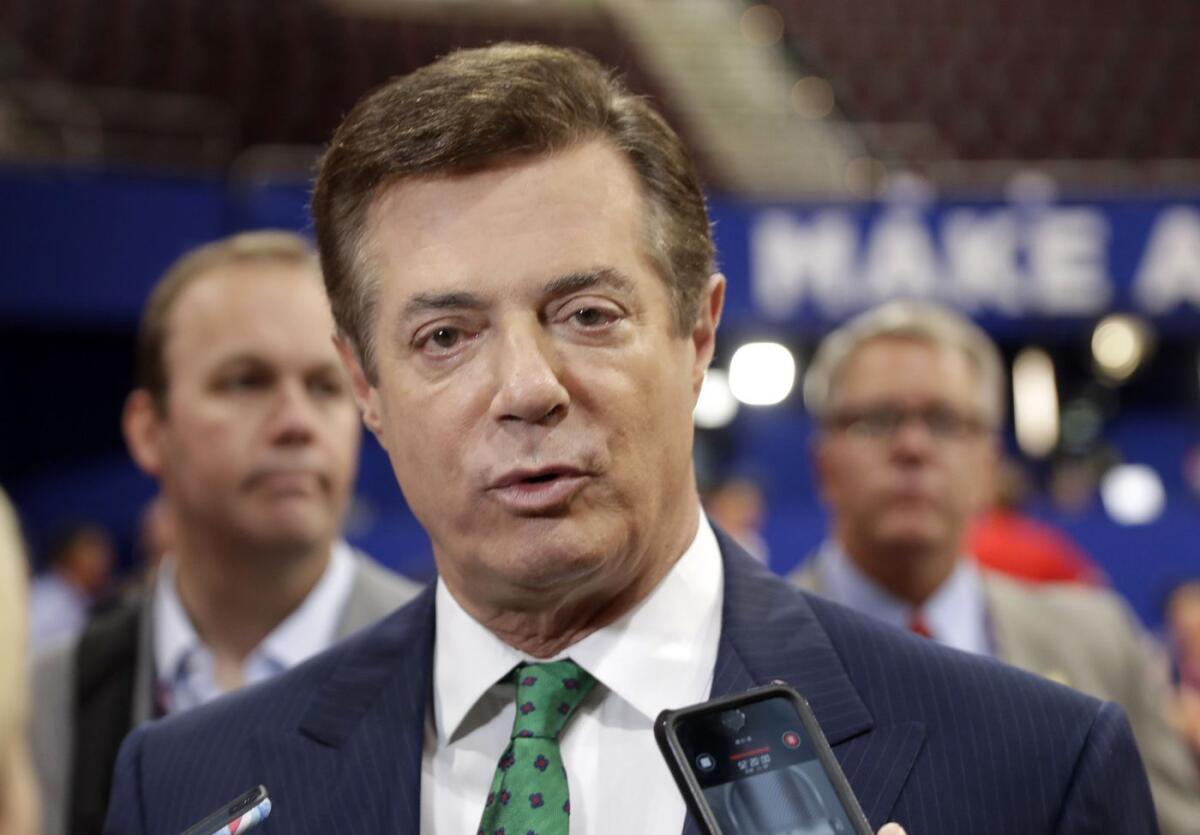
Whoa, there, let’s not get too excited.
A lot of anti-Trumpists are likely taking pleasure in the notion of Paul Manafort getting sent to jail today after a judge revoked his bail over allegations of witness tampering. But it’s unclear whether this will have much impact on the investigation by Robert S. Mueller III into possible collusion between Russia and the Trump campaign during the 2016 presidential election.
Remember, the case against Manafort deals primarily with action taken before he became Trump’s campaign manager. The array of federal money laundering and conspiracy charges against Manafort are serious, especially with this new set of witness-tampering charges.
At best, though, those charges are pressure points for Mueller – as the risk of prison time becomes higher, the more incentive there is for Manafort to cut a deal and cooperate with Mueller on what he knows – if anything – about ties and contacts between the campaign and the Russians, or anything else, for that matter.
Presuming for the sake of argument that Manafort actually has information Mueller can use, he has a strategic gamble to make: Cooperate and enrage Trump, or sit pat and hope the pardon-happy president comes to his rescue (a long shot, that, given the political fallout).
For Manafort, the witness-tampering allegation is the second time he has allegedly behaved improperly since his indictment. The charges arose from contacts Manafort allegedly made with two witnesses, one of whom told investigators he believed Manafort was trying to get him to lie over the nature of Manafort’s lobbying efforts.
Earlier, Manafort co-wrote an op-ed in the Ukraine defending the work he had done there prior to joining Trump’s campaign. That appeared to violate a gag order in the case, though the judge did not sanction him then.
Still, Manafort behind bars is quite a fall for a guy who made millions lobbying on behalf of foreign governments and who played a significant role in getting Trump elected.
Sing or clam up: What’s the best bet for Paul Manafort as he rots in jail?
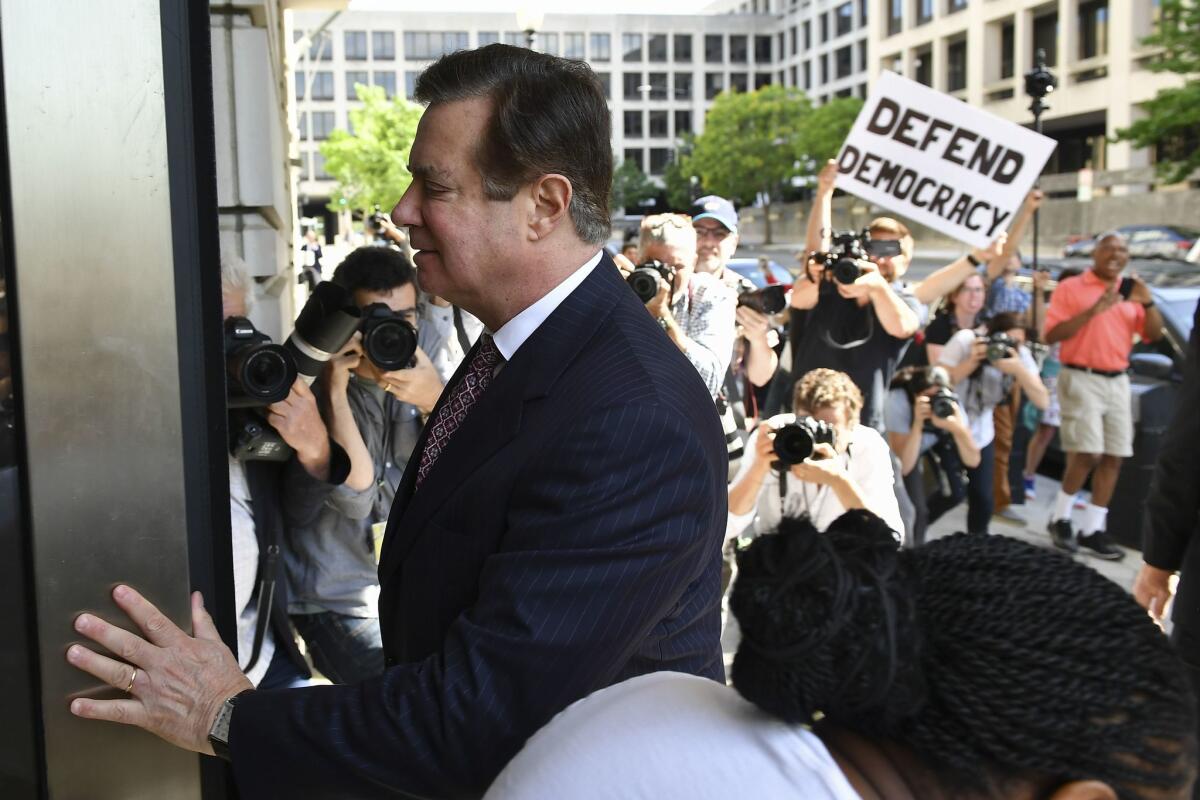
If you’re Paul Manafort, and a judge has just thrown you into jail for alleged witness tampering, and you have already been indicted on several counts of money laundering, fraud and tax evasion, there’s an awful lot of pressure on you to make your prosecutors happy. Clearly they’re not messing around anymore and are perfectly willing to destroy your life if you don’t give them what they want: testimony about what really happened during the Trump campaign, when you were campaign chairman.
Given the possibility of spending your life in prison if you’re convicted on all charges, it would not be at all stupid to start thinking, as you waste away in your cell, about how you can save yourself, even if it means throwing some old buddies and colleagues under the bus.
In any case, that’s what special counsel Robert S. Mueller III hopes you’re thinking. He hopes that, like many jailed witnesses before you, you’re thinking about a negotiated plea agreement and a reduced sentence in return for an offer to cooperate.
But there’s one big difference in Manafort’s case: The man he’s being asked to throw under the bus is the president of the United States. And the president of the United States is different from all other people. One of the ways he’s different is that he has near-absolute pardon power. The Constitution gives him virtually unchecked authority to offer amnesties, commutations and pardons for federal crimes without review. He can pardon his friends; he can pardon his colleagues; he can pardon his relatives. Trump even argues that he can pardon himself.
The president has already pardoned his buddy Joe Arpaio, the former Arizona sheriff. And he’s mused about pardoning his old friend Martha Stewart. He’s even talking about pardoning corrupt former Illinois Gov. Rod Blagojevich.
So Manafort has some very tough decisions ahead of him. Should he try to ingratiate himself with the federal prosecutors who are coming down on him like a piano out of a fourth-floor window — or should he stand up to them, keep his mouth shut and hope that he’ll ultimately be remembered, forgiven and pardoned by the president of the United States?
Be glad you’re not in his position. It’s not a pretty choice.
‘Toxic stress’ and other permanent damage caused by stripping immigrant children from their parents

In the name of the law, the Bible and, when they’re being honest, deterring future immigrants from coming, the Trump administration has been ripping children from their parents when the families try to cross the border illegally —even when they have arrived seeking asylum.
This is heartless and inhumane. It’s also, potentially, causing irreparable physical and mental harm to children, who are particularly vulnerable to the impacts of trauma.
Two months after the Trump administration began its new “zero-tolerance” policy, which requires the criminal prosecution of adults arriving illegally at the border, youth detention centers are now packed with children. The Department of Homeland Security will soon build a “tent city” in Texas to handle the growing number of kids in government custody.
The stories of separation are outrageous. Some parents were told by Border Patrol agents that their kids were just being taken for a bath, according to one public defender. Another attorney reported that a Honduran woman said her 4-month-old baby was taken from her while she was breastfeeding.
Many of these are families fleeing extreme violence in Central America, and they’re coming to the U.S. seeking protection and asylum. Instead the Trump administration is choosing to inflict more trauma on the traumatized.
That has prompted the American Academy of Pediatrics, the American College of Physicians and the American Psychiatric Assn. to call on the Department of Homeland Security to stop family separations immediately.
“Highly stressful experiences, like family separation, can cause irreparable harm, disrupting a child’s brain architecture and affecting his or her short- and long-term health,” Dr. Colleen Kraft, president of the American Academy of Pediatrics said in a statement last month. “This type of prolonged exposure to serious stress - known as toxic stress - can carry lifelong consequences for children.”
“Any forced separation is highly stressful for children and can cause lifelong trauma, as well as an increased risk of other mental illnesses, such as depression, anxiety, and posttraumatic stress disorder (PTSD),” Dr. Altha Stewart, president of the American Psychiatric Assn. said in a statement. “These children deserve our protection and should remain with their families as they seek asylum.”
Many of these children have already been scarred by violence and trauma in their home countries. That’s why their families have traveled hundreds and hundreds of miles in search of safety, security and opportunity in the U.S.
At the very least, the United States — which prides itself on being just and humane — should be able to handle these families’ asylum claims without creating more trauma and causing more harm to the most vulnerable among us.
If bitter ideological enemies like Karl Rove and David Axelrod can find common ground, maybe there’s hope for us all
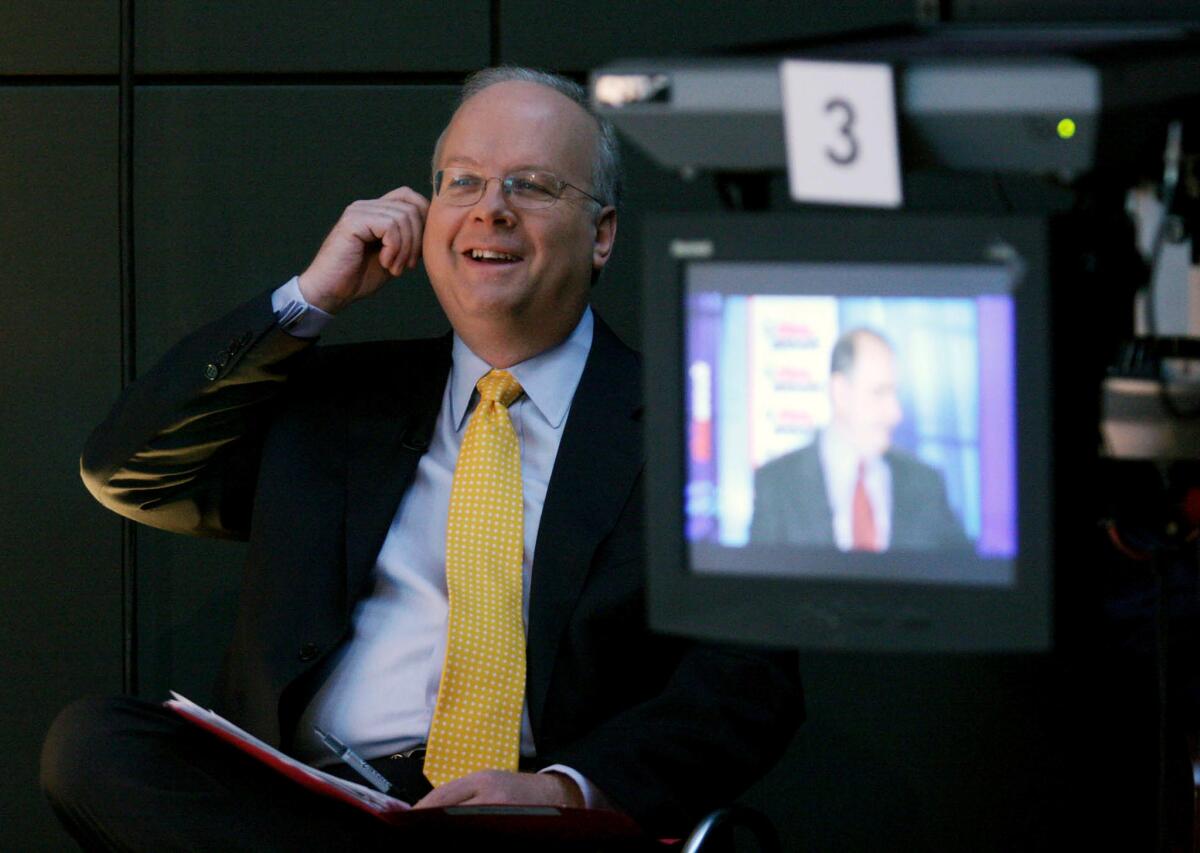
I’ve read many stories in recent days about suicide, prompted by the tragic, self-inflicted deaths of Anthony Bourdain and Kate Spade. But I was particularly surprised and moved on Thursday to learn of a friendship – or at least a connection – forged across a great political divide by two survivors of suicide in the family: Karl Rove and David Axelrod.
I don’t know how I missed this story before; it’s been several years since Rove, the political consultant who was the architect of George W. Bush’s campaigns and worked in his White House, and Axelrod, who did the same for Barack Obama, struck up a relationship based on their shared proximity to tragedy. As Rove described it in the Wall Street Journal Thursday, Axelrod emailed Rove out of the blue – the two had never met – when he read of Rove’s mother’s suicide. Axelrod told Rove that his own father had committed suicide when he was 19. Police came to his college dorm room to ask him to identify the body.
“David later wrote a beautiful tribute to his father, offering the insight that his dad ‘was impacted by the sense so prevalent in our society that depression is somehow a character flaw rather than an illness,’” Rove wrote. As for his own mother, Rove says that she wrote in her suicide note that she was “very tired, deep inside tired.”
Shortly after they became acquainted, Rove went on Axelrod’s podcast, “The Axe Files,” for an hour-long interview during which much politics was discussed, and suicide as well. Rove described how his mother led a troubled life on the edge. Her second marriage broke up and she almost lost her house. But still, she was pulling her life together and seemed to be finding a path when suddenly she “drove into the desert, took the exhaust pipe, pumped it into the cab of her little pickup and left a note for her children.”
I’m not sure why the story of these two professional pols coming together over a shared experience was so moving to me except that they are ideological opposites whose utterly divergent views of the world would seem to leave them little to discuss, share or commune about. Especially in today’s hyper-polarized atmosphere in which Democrats and Republicans are increasingly unlikely to encounter one another or to get along when they do. Politics today are bitter and fraught. So when serious two men who clash so fundamentally about so many things are able to find common ground, even in tragedy, it’s worth taking notice.
The inspector general’s report was bad for Comey. That doesn’t make it good for Trump

As predicted, the inspector general of the Justice Department has come down hard on former FBI Director James B. Comey for the way he handled the investigation of Hillary Clinton’s use of a private email server.
In a report released Thursday, Justice Department Inspector General Michael E. Horowitz concludes that Comey behaved in an “insubordinate” fashion in withholding from the department his plan to hold a news conference to announce that he was recommending that Clinton not be charged.
But for all its criticism of Comey — whose firing by President Trump precipitated the appointment of special counsel Robert S. Mueller III and the investigation Trump has derided as a “witch hunt” — Horowitz’s report is probably not going to be the public-relations victory for Trump his supporters had hoped for.
That was suggested right before the report’s release when three House Republicans — Reps. Andy Biggs (R-Ariz.), Ron DeSantis (R-Fla.) and Matt Gaetz (R-Fla.) — sent Horowitz a letter expressing concern that people in the Justice Department or the FBI “may have changed the report in a way that obfuscates your findings” and requesting “various drafts of the report, particularly the draft provided to the DOJ and FBI, before those agencies made any changes to the draft report.” In other words, they thought the report seemed softened.
It’s not surprising that Trump supporters would be disappointed by the report. While it is critical of Comey and former Atty. Gen. Loretta Lynch, it concludes that the decision not to prosecute Clinton was based on prosecutors’ “assessment of the facts, the law, and past Department practice in cases involving these statutes. We did not identify evidence of bias or improper considerations.” (So much for “Lock her up!”)
There is some fodder that Trump and in his supporters will be glad to see in the report. The criticism of Comey’s handling of the Clinton email investigation echoes the critique contained in a May 9 memo from Deputy Atty. Gen. Rod Rosenstein that the White House initially cited as Trump’s reason for firing Comey. The problem is that Trump didn’t stick to that story. He told NBC’s Lester Holt that when he fired Comey he was thinking that “this Russia thing with Trump and Russia is a made-up story.”
The report also contains an exchange of text messages between FBI officials Peter Strzok and Lisa Page, who were involved in both the Clinton email and Russia investigations and who were involved in a romantic relationship. (Trump has referred to them on Twitter as “the incompetent & corrupt FBI lovers.”) After Page texted that Trump is “not ever going to become president, right?” Strzok answered: “No. No he won’t. We’ll stop it.”
While the report found no evidence that these and other messages by FBI employees expressing political opinions affected their decisions, it said that they “cast a cloud over the entire FBI investigation.”
But in the case of Page and Strzok, that cloud cleared long ago. Mueller removed Strzok from the Russia investigation last July when the inspector general first learned of the text messages; Page, who had assisted the investigation in its early stages, already had moved on.
Just a friendly reminder about all those pesky Trump/Kushner conflicts of interest
Sometime in the next few weeks a federal judge will determine whether Maryland and the District of Columbia may move forward with a lawsuit that accuses President Trump of violating the Constitution’s “emoluments clause,” which bars top government officials from accepting “any present, emolument, office, or title, of any kind whatever, from any king, prince, or foreign state.”
It’s a largely untested issue — the Supreme Court has never addressed it — and exactly what the clause means is subject to debate. But the plaintiffs argue that the president has violated the Constitution because foreign government officials have been making a beeline for his Trump International Hotel just blocks from the White House. Each transaction benefits the business and, by extension, Trump.
I think the plaintiffs are right, and, like many people, I also think president and his family have come to define the swamp that Trump pledged to drain. Yet with all the smoke and noise coming out of the White House — the president is like a one-man stun grenade — it’s easy to forget the extent of the conflicts of interest and the number of eyebrow-raising transactions surrounding Trump and his immediate family.
Most recently, Bloomberg points out that Trump’s son-in-law, Jared Kushner, who oversees Mideast policy for the president, has expanded his ties to Israeli banks, posing a significant conflict of interest. You don’t have to be a conspiracy theorist to wonder how holding notes from banks important to one of the countries in Kushner’s portfolio might influence policy guidance.
And that came as the government released updated financial disclosure forms for Kushner and his wife, Trump’s daughter Ivanka, showing they earned at least $82 million last year. Yes, the couple has given up decision-making in their various companies, but because they have not placed their holdings in blind trusts, they are still in position to act in their own financial interests.
The same goes for the president: He knows he owns golf courses; efforts to roll back pesticide and fertilizer drainage into waterway help golf courses. Kushner knows what buildings his family owns, and is in a position to influence policy covering real estate investment.
Even before the inauguration, foreign diplomats said they intended to stay at Trump International Hotel on Pennsylvania Avenue.
“Why wouldn’t I stay at his hotel blocks from the White House, so I can tell the new president, ‘I love your new hotel!’ Isn’t it rude to come to his city and say, ‘I am staying at your competitor?’ ” one diplomat told the Washington Post days after the election.
In fact, as President Trump recently said he would work to try to save ZTE, the Chinese telecom giant under U.S. sanctions for doing business with Iran and North Korea, China granted seven trademarks to his daughter’s businesses.
There’s no evidence of a quid pro quo, but the timing raises legitimate questions.
We’ve known since Trump declared his candidacy that the Trump Organization’s investments and businesses posed a unique level of financial conflict of interest. The New York attorney general sued the Trump Foundation on Thursday morning — as well as the president and his three eldest children — accusing them of using charitable donations to pay legal bills, decorate Trump properties and otherwise support their profit-making businesses . More details here.
Further, every time the president visits one of his golf resorts, he’s using tax dollars to advertise his business. After the election, his Mar-a-Lago resort in Florida doubled its membership fee to $200,000. His Trump International Hotel in Washington, which turned a profit in its first year as Trump’s other hotels faced problems, hired a person to handle diplomatic sales and is the place-to-be for lobbyists and high-level government officials.
Most of these problems get overshadowed by the sheer volume of outrageous news and pseudo-news coming out of the administration, from the assault on regulations to the embrace of fossil fuels that are choking the world to destabilizing the international order to the petty graft of top appointees.
But they are there.
New York handed President Trump a big fat lawsuit for his birthday
Happy birthday, Mr. President! — said the state of New York on Thursday as it filed suit against the Trump Foundation and its board of directors for what New York Atty. Gen. Barbara Underwood described as “extensive and persistent violations of federal law.”
She further labeled the Donald J. Trump Foundation as “little more than a checkbook for payments from Mr. Trump or his businesses to nonprofits, regardless of their purpose or legality.”
The suit alleges, among other things, that Trump used charitable donations to decorate one of his golf resorts and to pay back his company’s creditors. Trump and three of his kids — Ivanka, Donald Jr. and Eric — were all personally named as defendants.
No mention of Tiffany, per usual.
Trump’s conflicts of interest and unscrupulous dealings are, of course, legion. But the list of stories documenting just the Trump Foundation’s questionable activities is long and comprehensive on its own.
In 2016, The Trump Foundation was banned from soliciting donations in the state of New York for failing to register as an actual charitable entity.
If Underwood gets her way, Trump himself will be banned from heading a charity in New York for the next decade.
The president, as you would expect, reacted to the suit with his natural aplomb.
Trump was, of course, referring to former New York Atty. Gen. Eric Schneiderman, who recently resigned amid accusations that he physically abused multiple women. Underwood was appointed only weeks ago to take his place.
Can’t help but wonder if the birthday timing was a coincidence, or a little bit of poetry from a career staffer who has no plans to run for office.
The Supreme Court rules for free speech — and fashion choice
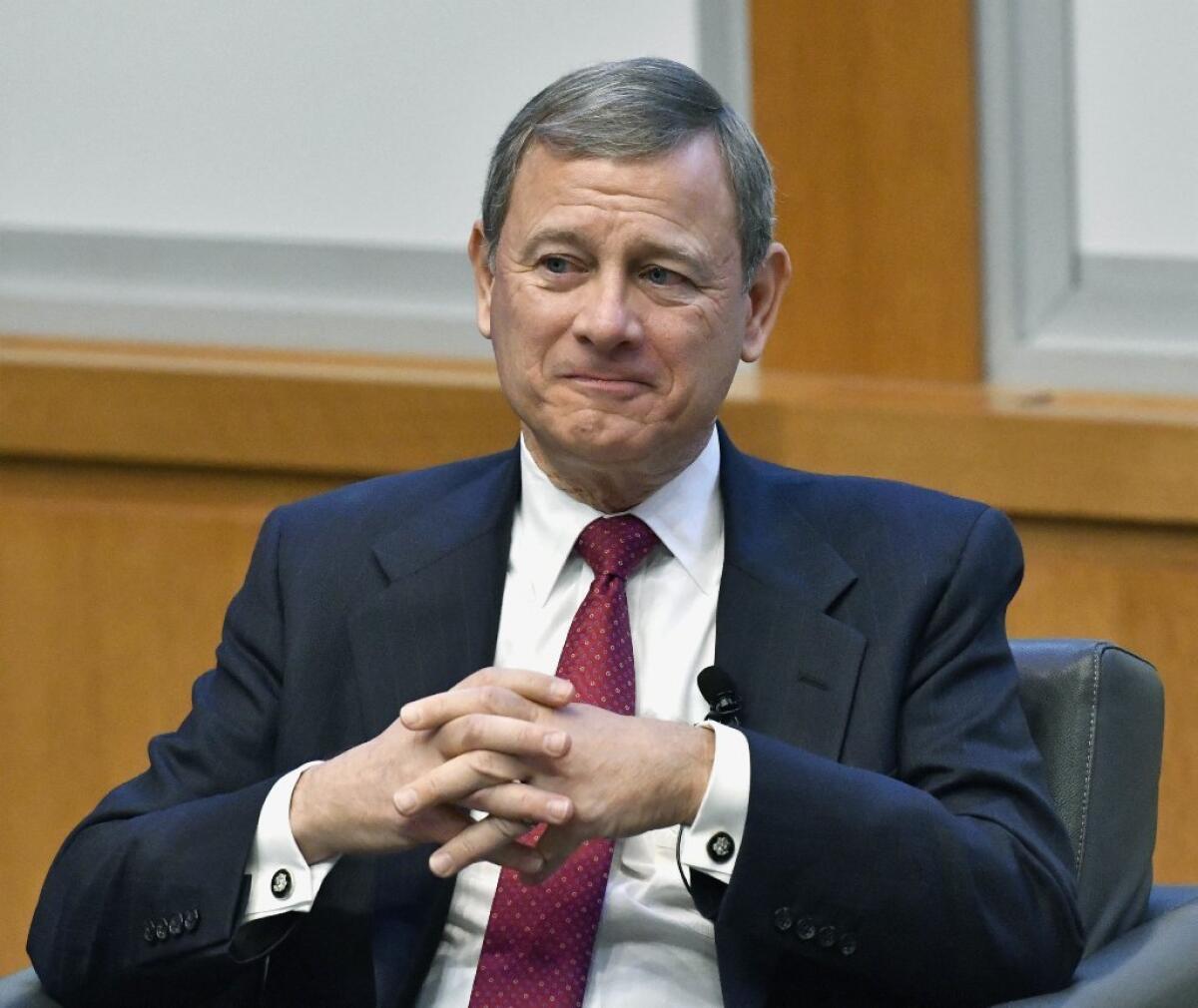
It doesn’t always happen, but the Supreme Court on Thursday followed the advice of the Los Angeles Times editorial board. By a 7-2 vote, the court struck down a Minnesota law that prohibited the wearing of political clothing at polling places.
The case was brought by Andrew Cilek, a Minnesota man who showed up to vote in 2010 and was asked to remove or cover up a tea party shirt, as well as a button that was deemed too political under state law.
Writing for the court, Chief Justice John G. Roberts Jr. said that the state’s ban on political messages at polling sites was too broad. The free-floating nature of the term, combined with “haphazard interpretations the state has provided in official guidance and representations to this court,” caused the law to fail the test of “distinguishing what may come in from what must stay out.”
The subjectivity allowed by the law was clear at the oral argument. The lawyer defending it said that a shirt displaying the text of the 1st Amendment would be acceptable, but one displaying the text of the 2nd Amendment “could be viewed as political.”
Thursday’s decision seems to leave unaffected narrower restrictions, such as the one in California that bans clothing with messages that engage in “electioneering” — defined as “information that advocates for or against any candidate or measure on the ballot.”
Actually, our original editorial suggested that it would be all right for the court to go further in the direction of free speech.
We wrote:
“A better line to draw would prohibit active electioneering at a polling place — by accosting or intimidating other voters, say, or handing out literature — while allowing the silent advocacy of a shirt bearing a political message (even ‘Vote for Candidate X’) or a political button.”
But even this narrower decision is a victory for the 1st Amendment — and fashion choice.
Are you a border agent who strips migrant children from their parents? No Holy Communion for you

Could a Catholic Border Patrol agent who separated a migrant mother from her children be denied Holy Communion – or even be excommunicated?
That scenario is being spun after a Catholic bishop raised the possibility of imposing “canonical penalties” on church members who implement the Trump administration’s practice of separating families seeking to enter the United States, including (according to the ACLU) those seeking political asylum at a port of entry.
According to Religion News Service, the idea arose at a meeting of the U.S. Conference of Catholic Bishops in Fort Lauderdale. Early in the session, Cardinal Daniel DiNardo, the conference president, criticized the administration’s “zero tolerance” policy, under which all those who cross the border illegally are criminally prosecuted. That means separating adults from their children.
“Families are the foundational element of our society and they must be able to stay together,” DiNardo said. “Separating babies from their mothers is not the answer and is immoral.”
In a follow-up discussion, Bishop Edward Weisenburger of Tucson, Ariz., suggested that “for the salvation of these people’s souls, maybe it’s time for us to look at canonical penalties.”
RNS noted that “canonical penalties can range from denial of sacraments to excommunication, though Weisenburger did not specify what he intended beyond referring to sanctions that already exist for ‘life issues.’”
The reference to “life issues” is a reminder that some conservative Catholic bishops have refused to give Holy Communion to pro-choice Catholic politicians. The idea of denying the sacrament to Border Patrol agents – or administration officials – would be to enforce a church teaching, support for immigrants, that is supported by both the liberal and conservative wings of the hierarchy.
But in either case, imposing “canonical penalties” on Catholic public officials or public servants for how they performed their duties would put them in a difficult position.
In a speech to a group of Protestant ministers in 1960, John F. Kennedy, then a candidate for president, said: “I believe in an America where the separation of church and state is absolute, where no Catholic prelate would tell the president (should he be Catholic) how to act.”
Kennedy’s belief in an “absolute” separation of church and state has been criticized – including by a prominent Catholic archbishop – but is generally viewed as contributing to a decline in anti-Catholicism. As much as the bishops might oppose Trump’s immigration policy, spiritually sanctioning government employees who enforce it would look like a repudiation of that view.
Sorry to ruin the fun, but California can’t split itself up without the consent of Congress
Not only will the balance of power in Congress depend on how Californians vote in the November election, so will the fate of their own state. Among the other weighty issues expected to be on the state ballot, voters will be asked whether to break California into three separate states.
The so-called Cal3 proposition, thought up and funded by Silicon Valley venture capitalist Tim Draper, officially qualified for the November ballot late Tuesday. While this proposal is not quite as revolutionary as the as-yet-unsuccessful Calexit proposals that a few diehards keep trying to put on the state ballot, it’s still pretty out there and, if it passes, will cause more than a little upheaval.
Angelenos who lived through the 2002 attempts by community activists in the San Fernando Valley and Hollywood to break off from the city of Los Angeles may remember that it turned out that breaking up an established government is a lot more difficult than it sounds. Just contemplating the reallocation of California’s many shared assets — schools, roads, aqueducts, prisons, etc. — is enough to make one’s head explode.
But what might vex voters more than the question of who gets what is the question of who gets stuck in which state. Draper is proposing grouping the state’s 58 counties in a configuration that is sure to cause some consternation. While Los Angeles and five other coastal counties north to Monterrey would remain in a state to be known as “California,” the other counties would be lumped into two states with brand new names: “Southern California” would be anchored by Orange and San Diego counties, which makes sense, but would also include a huge swath of the Central Valley, as well the eastern portion of the state all the way up through the not-so-southern Mono County. “Northern California” would include the uber-liberal Bay Area as well as the conservative northeastern counties that are looking to form their own state to escape from California’s Democratic clutches.
No matter how the vote turns out on Cal 3 in November, however, it will be up to Congress to decide if it wants to grant statehood to two more Californias. That would mean, among other things, adding four new U.S. senators. And why would a Republican-controlled Congress agree to that, especially since it is not at all certain that any one of the states could be counted on to vote GOP?
Attention Jeff Sessions: Women are targeted because of their gender. That makes them deserving of asylum
The world, as we all know, is filled with violence. But since the end of World War II, the international community has come to recognize that people subject to certain types of violence or persecution in specific circumstances deserve special protections — in the form of asylum from countries willing to take them in.
People persecuted for their religious or political beliefs, or for their ethnicity or race, for example, are entitled to refugee status. And in recent years, women facing genital mutilation, or persistent domestic violence in patriarchal societies in which authorities are unable or unwilling to help them, have been added to the list by many countries.
And while it’s true, as Atty. Gen. Jeff Sessions wrote Monday, that “the asylum statute does not provide redress for all misfortune,” it should provide protections for women facing dangerous violence from their intimate partners in societies in which law enforcement cannot protect them or sides with the abuser. These women are targeted because of their gender. That’s worthy of receiving sanctuary, but Sessions on Monday stripped that protection from the U.S. immigration courts.
Trump is exaggerating the results of his meeting with Kim. Bigly

In evaluating President Trump’s dramatic meeting with North Korean dictator Kim Jong Un, it’s important to remember that less than a year ago many Americans were concerned that the president’s bellicose rhetoric — including threats to rain “fire and fury” on the North if it continued to menace the United States — might lead to war.
Trump’s decision to respond to an overture from Kim — initially conveyed through South Korea — de-escalated the rhetoric dramatically. It also may have begun a process that will succeed in reining in North Korea’s nuclear ambitions where past efforts failed.
For that reason, the summit in Singapore can be justified, despite the chaos and confusion that preceded it. But Trump was characteristically exaggerating when he boasted at a news conference that his meeting with Kim proved that “real change is indeed possible.” For all the spectacle, the meeting was at best a down payment on that change.
That was clear in the vaguely worded joint statement released by the two leaders. Trump promised to provide North Korea unspecified “security guarantees” and Kim reaffirmed his “firm and unwavering commitment to complete denuclearization of the Korean Peninsula.” They also agreed to pursue the goals of improved relations between the two countries, the creation of a “lasting and stable peace regime on the Korean Peninsula” and an effort to recover and repatriate the remains of soldiers killed in the Korean War. The details — in other words, everything we need to know about whether this effort will go somewhere or nowhere — were left to future negotiations, in which the United States will be represented by Secretary of State Mike Pompeo.
Pompeo has said that the only outcome the U.S. will accept is the “complete and verifiable and irreversible denuclearization of the Korean Peninsula.” That suggests how difficult the negotiations will be, especially if Trump insists on applying to North Korea the standards by which he judged — and found wanting — the agreement under which Iran accepted limitations on its nuclear program.
We would like to think that Trump recognizes the complexity of the negotiating path ahead, the need for consultation with U.S. allies and the importance of reckoning with North Korea’s history of brutality towards its own people and duplicity in dealing with other nations. Some of his comments don’t inspire confidence.
After meeting with Kim, the president told reporters that he had decided to cancel “war games” — his term for joint U.S.-South Korean military exercises — which he called “very provocative,” language the North has long used in complaints about the exercises. The news came as a surprise to both the U.S. military and South Korean officials. In an interview with the Voice of America, Trump said that Kim “loves his people,” paying an unsettling and unnecessary compliment to a brutal dictator. In the same interview, he gushed: “We’re going to de-nuke North Korea. It’s going to start immediately.”
Effervescent optimism and fulsome flattery may be an advantage in a salesman, but a president needs to watch his words and weigh his actions.
Don’t kid yourself. Kim Jong Un isn’t the first murderous dictator the U.S. has done business with
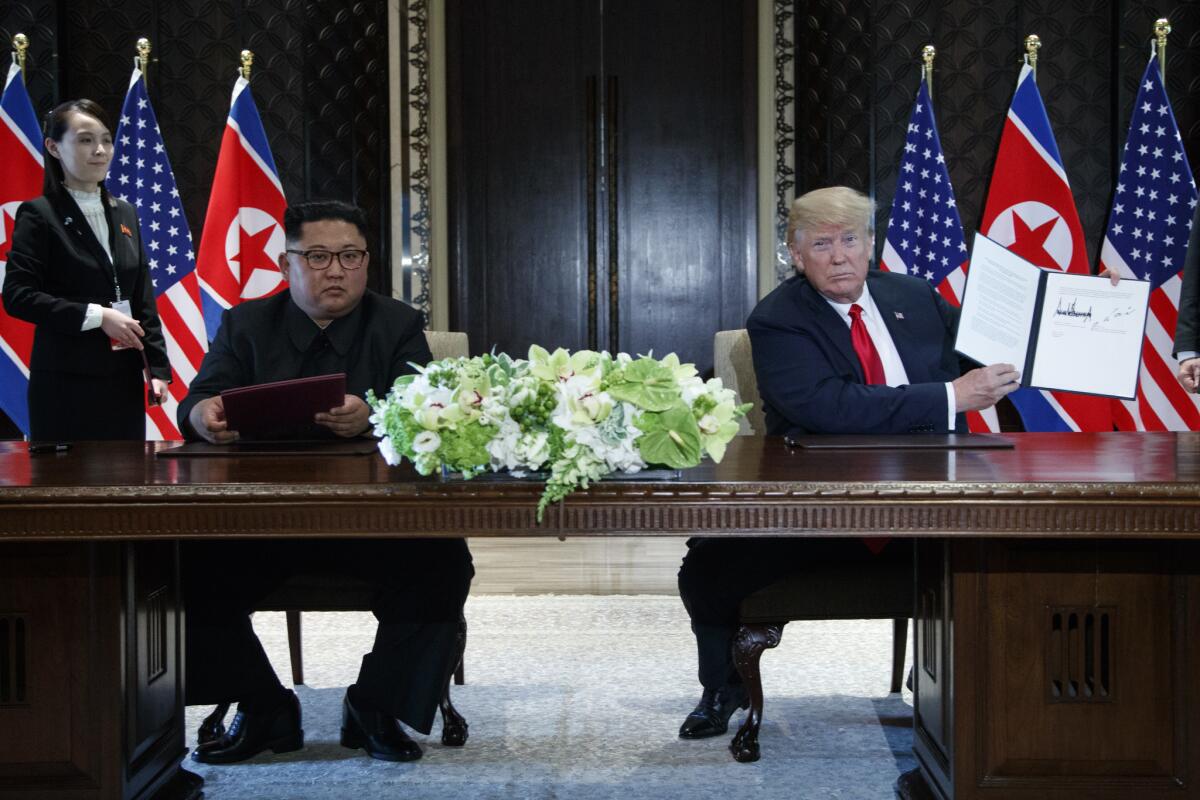
In reporting on Monday’s summit in Singapore, the Washington Post noted that President Trump did not approach Kim Jong Un as a pariah, but showered him with respect. “Trump turned a blind eye to differences of principle and history – refusing to directly confront the reality that Kim oversees a vast police state, starves his citizens and assassinates his rivals – in the interest of completing a transaction.”
That is, of course, correct. Kim, despite his goofy smile and funny haircut, is a monstrous figure at the helm of one of the world’s most repressive nations, where thousands of citizens have been murdered, tortured, imprisoned or raped, and where roughly 18 million people don’t get enough food, according to the United Nations. Kim is widely believed to have ordered the execution of his own uncle and half-brother.
But let’s not fool ourselves: This is hardly the first time an American president has agreed to turn a blind eye to such massive violations of human rights in the pursuit of some other perceived goal.
To start with the most obvious case: In 1972, President Nixon flew to China to meet Mao Tse-tung, whose policies during his decades in power – including during the infamous Cultural Revolution – led, by most accounts, to millions of deaths. But Nixon did not decline on that account to negotiate with Mao or to reopen relations with one of the world’s most powerful nations.
Nor did President Roosevelt and British Prime Minister Winston Churchill decline to fight the Second World War alongside their ally Josef Stalin, the ruthless Soviet dictator who was responsible for the death of tens of millions of Russians, Ukrainians and others. The two leaders met with Stalin, summited with him, cut deals with him, shook his hand, posed for photos with him. “We have but one aim and one single, irrevocable purpose,” Churchill said. “We are resolved to destroy Hitler and every vestige of the Nazi regime. From this nothing will turn us – nothing.”
The Cold War was a time of all sorts of morally dubious alliances with human rights-abusing nations in Latin America, Africa and Asia – governments that mistreated their own citizens but that United States officials felt would take our side in a greater battle: the conflict between the democratic, capitalist West and what they saw as a global communist conspiracy led by the Soviet Union.
The elevation of human rights to a prominent place in American foreign policy is a relatively recent development. And despite its elevation, it is still ignored on a regular basis. President Obama’s much-praised (and much-attacked) deal with Iran to curb the development of its nuclear weapons distinctly and intentionally did not address either domestic repression or international support for terrorism. Those issues were put to the side. There was some hand-wringing about that, but the administration believed that the issues had to be separated.
Sometimes, ugly compromises are necessary; sometimes they are utterly indefensible. So far it is unclear whether Trump’s on-again off-again, chaos-based summit with this particular brutal despot will yield any meaningful results.
But generally speaking, it is harder these days for the American government to ignore the human rights abuses of those we do business with – and the world is a better place because it is more difficult to cut deals with brutal dictators in return for economic advantages or promises of support or other strategic concessions.
But let’s not pretend that such morally odorous deals haven’t been cut in the past – or that they won’t be in the future.
Congress could pass a DACA bill? Don’t hold your breath
The House today hits a deadline of sorts set by members intent on forcing Congress to take action on immigration reform aimed at protecting the so-called Dreamers — people who have lived in the United States illegally after having been brought to the country as children. But even if the members can force the issue to a vote, the path after that is murky at best. In the end, this seems to be more about relative Republican centrists trying to make it look like they’re doing something because they’re facing reelection in districts where immigration is a strong issue.
This all began, of course, with President Trump, who ordered the Obama-era Deferred Action for Childhood Arrivals program phased out, and then told members of Congress it was up to them to fix it by converting DACA from a program into a law. (Trump and immigration hardliners argued that Obama had exceeded U.S. law and executive authority in granting the protections; that’s still the subject of legal challenges from both sides).
But Trump, in his typical chaotic negotiating style, has moved the goalposts and now insists that any deal on DACA must include funding for his wall on the Mexican border and other measures he thinks will reduce illegal immigration. But it will be hard to get such a measure through the House, and even harder to get it through the Senate, where any bill would probably need 60 votes. Getting enough Democrats to vote for the wall is, well, a high wall to scale.
And if a bill reconstituting DACA but without a wall passes both chambers and gets to the president’s desk, he is likely to veto it. Unless, of course, he changes his mind again.
The most likely outcome now is that nothing will happen in the House, and if it does, the measure will die in the Senate.
Still, that lets the members behind the push to reinstate DACA go home and campaign that they tried to fix the problem, but (fill in the blank here for who they’ll blame) kept it from happening.
And nothing changes.
Not that we’re cynical or anything.
The Supreme Court is apparently fine with disenfranchising Democrats and people of color
At first, the Supreme Court’s ruling Monday might not seem like a big deal.
The court ruled that it was perfectly okay for the state of Ohio to purge its voter rolls of people who fail to vote during several elections and also fail to respond to a notice asking whether they have moved residences. The court noted that, after all, there is a federal law that requires states to make a “reasonable effort” to remove the names of voters who die or change residences.
You may feel, as I do, that it is wrong to purge people from the voter rolls for not voting. After all, don’t people have the right to skip a few elections because they dislike the candidates or don’t know the issues -- and still show up in the future at an election they consider important?
But even if that is an unfortunate decision, it hardly seems disastrous. Most voters, after all, would probably respond to the state’s notice. Others can re-register, if necessary. Is this really as important an issue as many other Supreme Court decisions involving discrimination, criminal justice, freedom of speech and other subjects?
Until you consider the real-life effect of Ohio’s rule. “Voters have been struck from the rolls in Democratic-leaning neighborhoods at roughly twice the rate as in Republican neighborhoods,” a Reuters study found. “Neighborhoods that have a high proportion of poor African American residents are hit the hardest.”
In other words, this isn’t simply about cleaning up the voter rolls. It isn’t just just about preventing voter fraud. As with so many other laws and rules around the country that make it harder for people to vote, Ohio’s process (so vehemently defended by the Republicans) disenfranchises Democratic voters – and along the way, disproportionately affects African Americans, who overwhelmingly vote Democratic.
There was nothing about this point in the majority’s opinion. But in her dissent, Justice Sonia Sotomayor cited a brief from the NAACP showing “how low voter-turnout rates, language-access problems, mail delivery issues, inflexible work schedules and transportation issues, among other obstacles, make it more difficult for many minority, low-income, disabled, homeless and veteran votes to cast a ballot or return a notice, rendering them particularly vulnerable to unwarranted removal.”
So what seems on the surface like a straightforward case about removing from the voting rolls the names of people who have moved is in fact something else. Difficult as it is to know the intention of the framers of the rule, it does seem -- when viewed through the Reuters-Sotomayor-NAACP lens -- like a cynical, partisan effort to prevent people (and certain people in particular) from exercising their constitutional right to vote.
Trump’s team may have stumbled across a not-so-bad idea to get DACA before the Supreme Court
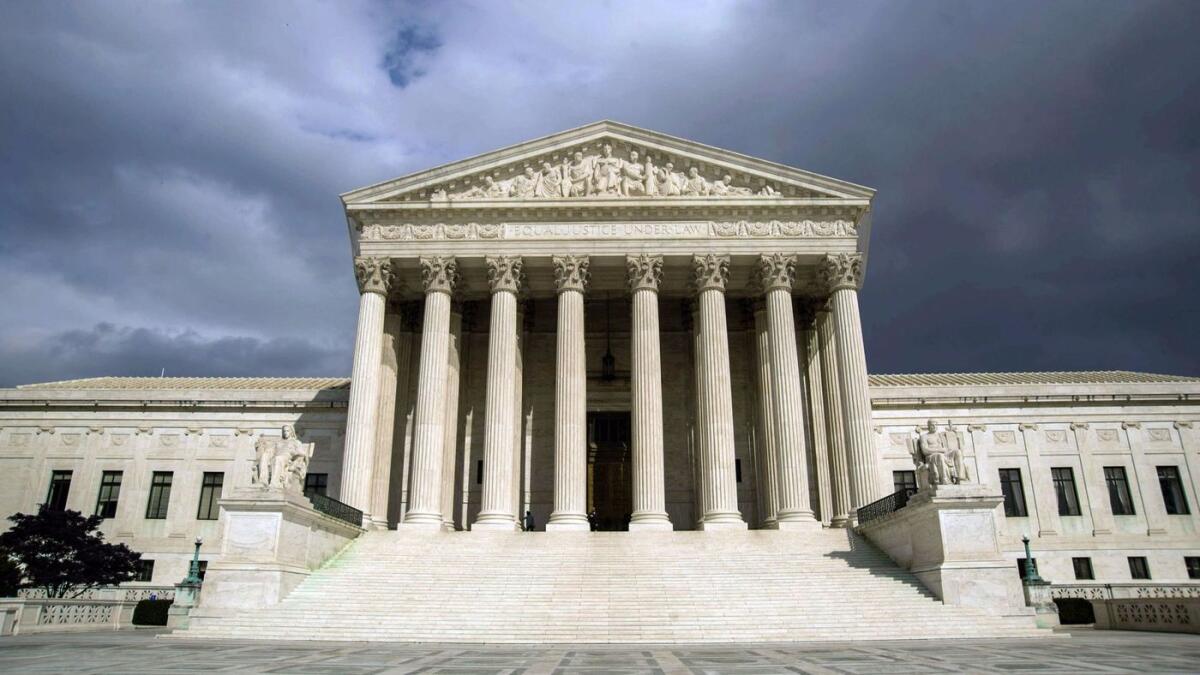
As a strategy, the Trump administration may have stumbled across a not-so-bad idea.
The administration said in a court filing Friday that it does not intend to defend the Deferred Action for Childhood Arrivals program for so-called Dreamers in a lawsuit filed by Texas and other states. The administration — which ordered the program phased out — repeated its position that it doesn’t believe President Obama had the authority to create the program in 2012, and urged the judge to rule that Obama overstepped his authority and exceeded the limits of immigration law.
But the government also urged U.S. District Judge Andrew S. Hanen to delay the effective date of that order should he grant it. The reason? There are other court orders and injunctions against ending DACA, and if Hanen sides with Texas — which he did in an earlier decision that ended a program to defer deportation of parents of people living here legally — then there will be a conflict between jurisdictions (Lyle Denniston lays it out on his blog).
And that is where the Supreme Court could be asked to step in. So if Hanen rules for Texas, the government can try to force the issue to the top court as an expedited matter, given what hangs in the balance.
“Although the United States agrees that DACA is unlawful, here, the erroneous nationwide injunctions issued by district courts in the Eastern District of New York and Northern District of California would conflict with a preliminary injunction—and especially a nationwide one—in this case, subjecting the United States to inconsistent obligations,” the government said in its filing. “This brings into stark relief the problem with nationwide injunctions, which the United States vigorously opposed before the Second and Ninth Circuits in part for this very reason. If this Court nevertheless determines that an injunction is warranted here, it should stay such order for 14 days so the United States can seek stays of all the DACA injunctions in the respective courts of appeals and the Supreme Court.”
That are a lot of ifs here, but this could fast-track a decision on DACA’s future to the Supreme Court as Congress continues to stumble around trying to find a way to protect people who have been living in the U.S. illegally since they were brought here as children.
Of course, if Congress never comes up with a plan that President Trump would sign, and Hanen sides with Texas and the Supreme Court takes the case, no one knows what happens next. Chances are good, though, that the conservative court would rule against DACA.
In that instance, we’d have a decision, but the wrong one, and one that could hurt hundreds of thousands of people whose futures have been in limbo. Or just maybe the court will do the right thing and keep alive DACA — and the dreams of people who are Americans in all but legal status.
Elon Musk is going to destroy Los Angeles in a dumb attempt to save it
What do you get when you take a wildfire-prone cauldron of violence, political antipathy, racial, class and gender hostility and add flamethrowers to the mix?
You get Elon Musk’s marketing gimmick/financing plan to save Los Angeles.
Musk, you see, wants to build a series of tunnels underneath Los Angeles in an effort to alleviate the city’s admittedly horrendous traffic woes. To raise funds and awareness for this plan, Musk has decided to make and sell futuristic-looking flamethrowers.
Nothing to see here. Can’t imagine any scenario where this becomes a problem.
Musk’s Boring Co. has sold 20,000 of these things so far, at 500 bucks a pop. The first 1,000 were available for pickup in Los Angeles over the weekend.
In the distance, wildfires raged.
But, don’t worry. Musk has considered the gravity of marketing flame-shooting devices to ordinary citizens and has put checks and balances in place to make sure nothing goes amiss.
The twee reference to not pointing the flamethrower “at my spouse” is particularly galling. Weapons are routinely used in intimate-partner violence, with deadly effect. It happens all the time. It’s not a comic impossibility— especially in the context of a new product on the market that could clearly be used as a weapon.
Perhaps worst of all, these flamethrowers are being sold in service of a tunnel idea that has widely been panned. With good reason. Yes, tunnels are great for mass transit. But tunnels in service of private vehicles fill up and get crowded, just like any other road.
As if we needed more examples, Musk has once again illustrated the danger of putting the future of humanity in the hands of capricious billionaires. Even billionaires with good-ish intentions.
Jerry Brown will leave his successor a healthy budget — and two albatrosses
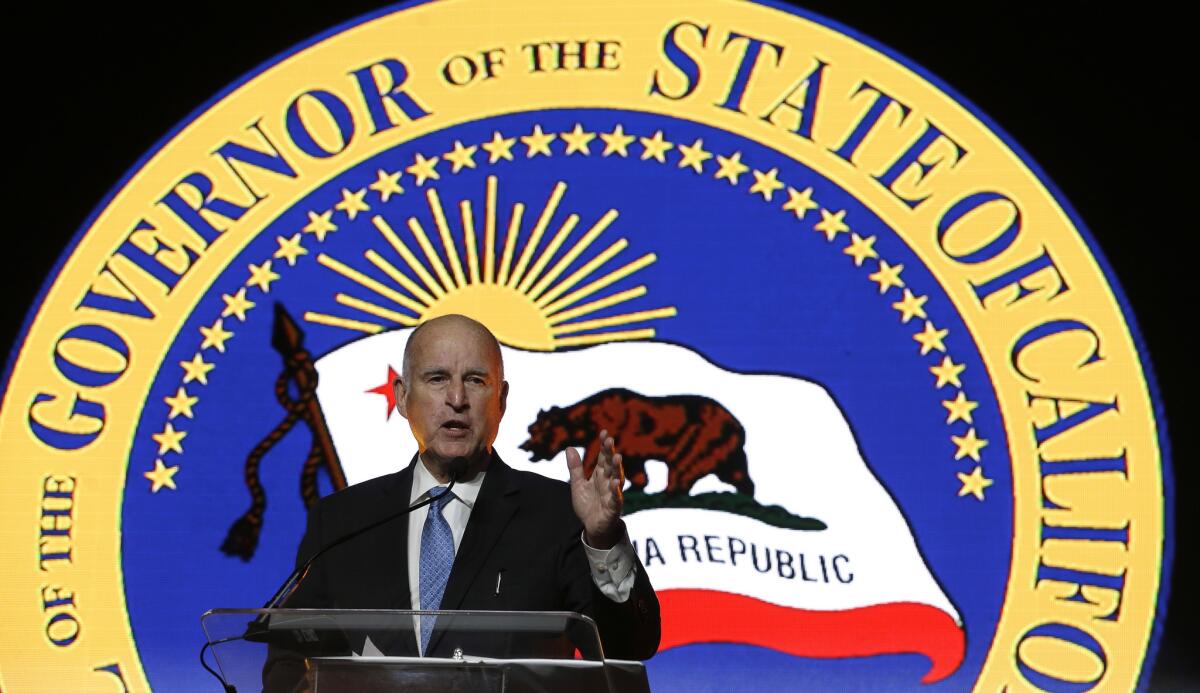
Another year, another big surplus in California — and another set of disappointed lawmakers and lobbyists whose new spending programs were rejected by Gov. Jerry Brown.
This is Brown’s final year of his fourth and last term as governor, and he has presided over a remarkable transformation of the state’s finances. Inheriting a $27-billion deficit in 2011, he’s leaving his successor with a projected surplus of several billion dollars and three (count ’em, three) reserves with billions more, including a new fund dedicated to safety net programs.
But Brown hasn’t stopped the state from spending larger and larger sums every year. To the contrary, spending from the state’s general fund has grown more than 50% during his eight years in office. Throw in the dollars from Washington and state special funds and the growth is even higher — more than 65%.
That’s why fiscal curmudgeons cringe when they hear people praise Brown for his spending discipline. But the governor has forced the Legislature to stick with his office’s more conservative revenue projections, which in the coming fiscal year will give lawmakers at least $2.3 billion less to spend, and he’s been a tough sell on programs that commit the state to doing expensive things it hasn’t done before.
As a consequence, lawmakers have been forced to do something they wouldn’t do if left to their own devices: set priorities. In the deal announced Friday, the priorities had Brown’s fingerprints all over them.
They held billions more dollars in reserve than Proposition 2 required. They agreed to a huge, but non-recurring, outlay to help local governments address homelessness — $500 million. They further increased the budgets for the state college and university systems by about $270 million each, more than half of it in one-time aid, and for community colleges by $155 million, almost all of it in one-time funding. (Community college budgets also will grow through changes negotiated in how Proposition 98 monies are allocated.) And they made a $90-million down payment on a plan to lift poor California families’ incomes to at least 50% of the federal poverty level, starting next April.
Naturally, many of those constituencies had asked for bigger sums. Local governments, for example, had lobbied for $1.5 billion in homelessness funding.
Still, those programs came out of the deal with more than the governor had proposed to spend in his revised budget last month. That’s a better fate than many other projects for which lawmakers had futilely sought funding (see the summary of the deal for details), unable to persuade Brown and budget leaders that the state’s flush budget could handle the load.
Among the proposals rejected were plans to spend more than $1 billion annually extending Medi-Cal to seniors and young adults living in the country illegally and subsidizing insurance premiums for moderate-income Californians not covered by large employer health benefits. It wouldn’t be surprising if frustrated healthcare advocates took their case for universal coverage to the voters, bypassing Sacramento altogether.
So whether the next governor is Democrat Gavin Newsom or Republican John Cox, he’ll be handed a budget much better prepared for the next downturn because it will have fewer commitments to sustain.
Yet Brown also is leaving his successor two divisive, hugely expensive projects: the high-speed rail line that’s supposed to someday run from San Francisco to Los Angeles and on to Anaheim, and the California WaterFix tunnels that run water from the Sacramento River underneath the Sacramento-San Joaquin River Delta.
The $77-billion-and-counting rail line is funded by state and federal taxpayers at the moment, but it will need a hefty infusion of private dollars if it’s to be completed. And there are plenty of reasons to be skeptical about its prospects, starting with the $44 billion in cost overruns (so far) and countless delays. But if the state decides to cut its losses and stop work on the project, as Cox has promised, it will have to repay the federal government for the more than $3.3 billion in grants it has received.
The $16.7-billion tunnel project likely would be financed by the utilities that agree to sponsor the project, which would pass the costs along to water users. And at this point, the Southern California Metropolitan Water District has agreed to pay more than half the cost. The Brown administration has been the project’s main champion, doggedly promoting the idea in the face of opposition from some local governments, environmental groups, water agencies and other interests. The next governor will have to decide whether to keep up the support now that the project is close to being funded, or to pursue a different solution to the serious environmental and water-supply problems the tunnels were designed to address.
Was the seizing of a reporter’s phone records a Trump attack on the media, or business as usual?
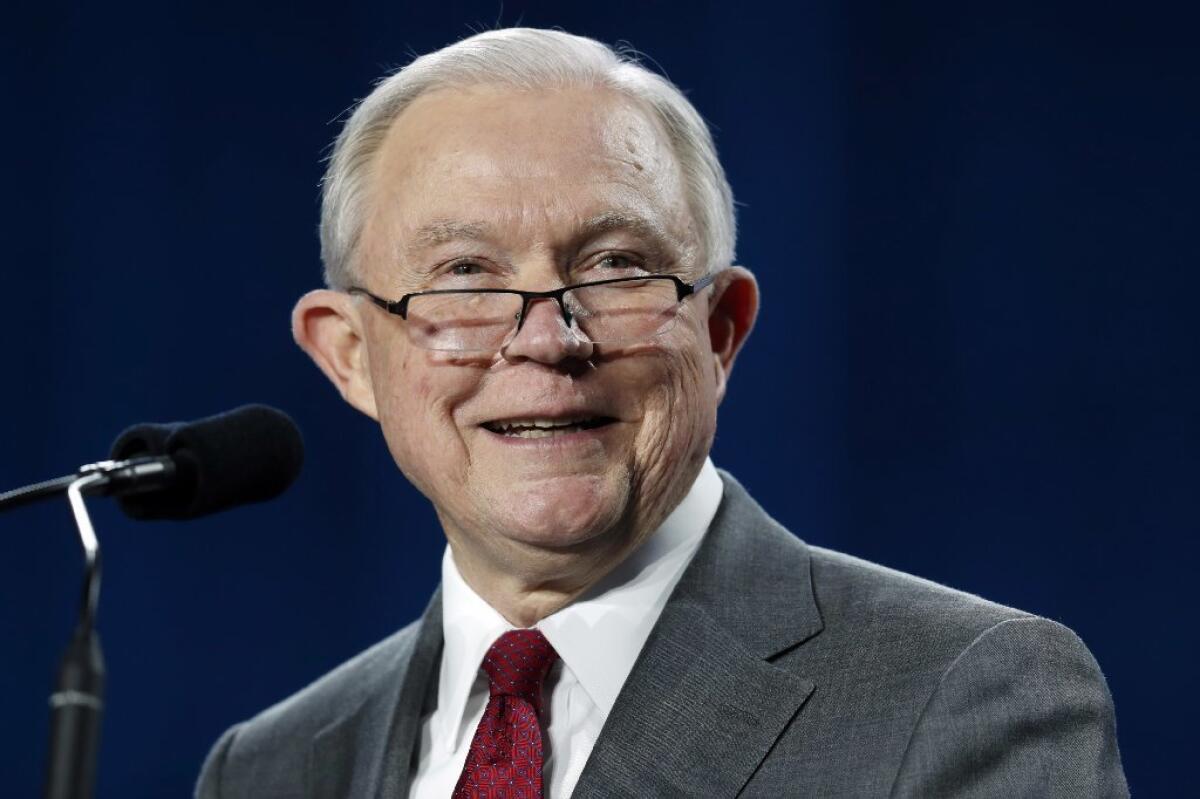
It’s no secret that President Trump has contempt for what he likes to call the “fake” news media, including the capital-F “Failing New York Times.” Journalists also remember that Atty. Gen. Jeff Sessions mused last year about revisiting a policy instituted by former Atty. Gen. Eric H. Holder Jr. placing limits on acquisition of information from journalists.
“We respect the important role that the press plays, and we’ll give them respect,” Sessions said, “but it is not unlimited.”
So it’s natural to suspect a seismic shift in policy behind the seizure of phone and email records of a New York Times reporter, Ali Watkins, in connection with the investigation of former Senate Intelligence Committee staffer James A. Wolfe. Wolfe is accused of lying to the FBI about contacts with reporters when he was questioned during a leaks investigation.
But appearances just might be deceiving. So far there is no evidence that Sessions has rescinded the Holder policy, which was promulgated on Jan. 21, 2015. It says that investigators shall seek records of members of the news media only “after all reasonable alternative attempts have been made to obtain the information from alternative sources.”
The policy also says that records should be obtained “after negotiations with the affected member of the news media have been pursued and appropriate notice to the affected member of the news media has been provided.” Such advance notice hadn’t been provided to the Associated Press when the government obtained two months’ worth of telephone records of journalists working for the Associated Press in 2012.
Similarly, Watkins reportedly learned after the fact that her records had been obtained. But that doesn’t mean the Holder policy was violated. It contains an exception for situations in which the attorney general determines that advance notice would pose a “clear and substantial threat to the integrity of the investigation.”
On Friday, Bruce Brown, the executive director of the Reporters Committee for Freedom of the Press, noted that seizing a journalist’s records “sends a terrible message to the public and should never be considered except as the last resort in a truly essential investigation.” He called on the Justice Department to “explain how its actions adhered to its own guidelines for protecting newsgathering from exactly these kinds of damaging intrusions.”
A Justice Department official told the New York Times that all regulations were followed. But it would enjoy more of the benefit of the doubt in making that case if Trump hadn’t so often signaled his contempt for the men and women who gather the news.
Trump says he’s on board with letting states legalize marijuana. Don’t wait for him to flip-flop again

Could the end of the federal marijuana prohibition really be in sight?
On Friday, President Trump said he was likely to support a new bill in Congress that would let states decide whether marijuana should be legal or not.
“We’re looking at it. But I probably will end up supporting that, yes,” Trump said to reporters just before he boarded a helicopter to travel to the G-7 summit in Canada.
The bill introduced by a bipartisan group of lawmakers, including Sen. Cory Gardner (R-Colo.), would change the Controlled Substances Act so it’s no longer a crime to buy or sell marijuana — as long as the person is following state or tribal laws that allow the medicinal or adult recreational use of the drug.
“I support Sen. Gardner,” Trump said when asked about the bill. “I know exactly what he’s doing.”
Of course, it’s impossible to know if Trump is serious about ending the federal prohibition on marijuana. (Or if he truly knows “exactly” what Gardner is doing.) This is a president who flips faster than a line cook at IHOP.
He was for the legalization broadly in the 1990s, saying it would be better to legalize and tax drugs and spend the money on drug prevention. Then when he was running for president, Trump told Fox News host Bill O’Reilly, a staunch prohibitionist, that he was concerned Colorado’s decision to legalize recreational use was causing “a lot of problems out there.” Later, while campaigning in Nevada (where voters last month passed a ballot measure to allow adult use of marijuana), Trump said legalization should be decided by the states.
Then he picked a hardline opponent of marijuana-law reform for attorney general, Alabama Sen. Jeff Sessions (admittedly, a decision he has publicly regretted for other reasons). Earlier this year Sessions revoked an Obama-era directive that discouraged the enforcement of federal marijuana laws in states that legalized pot.
That has thrown California and the eight other states (and Washington, D.C.) that have broadly legalized adult use of marijuana into limbo. An additional 20 states permit marijuana just for medical use, which is also prohibited under federal law.
The bill introduced by Gardner and others is the congressional answer to the uncertainty created by Sessions. If passed, the bill would ensure that California, Colorado and other states could move forward without fear of conflicts with federal authorities. It would also open the door to more federally funded medical research into the public health impacts of marijuana.
And it would allow banks to work with the cannabis industry. With marijuana still illegal under federal law, most businesses can’t open bank accounts or accept credit card transactions — financial services companies refuse to serve them for fear being penalized by federal regulators for handling money from drug sales. That means marijuana transactions are typically done in cash, which is dangerous and makes it harder to collect taxes.
There are all kinds of rational, pragmatic reasons to end the federal prohibition on marijuana. Congress needs to move fast, before Trump flips again.
Our national parks are getting too much love and not enough cash
If you’ve been to a national park in the past few years, you probably have a good sense of how crowded they can get. As we move into the summer travel season, expect it to get even worse as the parks’ popularity continues to rise while staffing slides and the deferred maintenance list expands.
High Country News lays out the problem here, but in a nutshell, the parks are getting overwhelmed — as are the staffs. Not to mention the backlog in maintenance projects, which reached $11.6 billion at the end of the last fiscal year, up slightly from two years ago.
With a problem of this scope, treading water isn’t good enough.
The overuse and under-financing was part of the impetus for Interior Secretary Ryan Zinke to suggest huge admission fee increases that would deter visitors and increase revenues for the park system, but as The Times Editorial Board noted, that’s a bad way to address the problem. For starters, it would make the parks less accessible to the poor, in a sense expanding our national income inequality problem into a park-access inequality.
The board wrote:
“There are better ways of addressing overcrowding than pricing out lower-income families. To alleviate the press of cars, the government could bar private vehicles during peak seasons and ferry people around on shuttles (ideally, buses that do not emit greenhouse gases). It could limit the number of vehicles allowed and award entry passes by lottery to reduce the volume of visitors. Rangers recommended last summer that Zion National Park adopt a reservation system for entry, much as it and other parks already use for controlling access to campsites, though it doesn’t appear that the suggestion went anywhere. So there are other solutions.”
Of course, if Congress were to budget sufficient money to staff the parks and attack the maintenance backlog, that would be another way.
But Congress is more interested in stuffing even more cash in the pockets of the 1% than in taking proper care of national treasures like the national parks.
Dear media: When you cover death by suicide, do it thoughtfully
Editor’s note: This article was originally published July 21, 2017. We are resurfacing it from the archives because it includes the phone number to the National Suicide Prevention Lifeline and links to reporting resources for journalists.
When a family member died by suicide, my parents chose not to tell me his method. They wanted me to remember him as he lived, for both of our sakes. While I didn’t understand their decision at the time, I now see it as one borne out of deep care. I was especially thankful for my parents’ thoughtfulness after reading the media coverage of Linkin Park singer Chester Bennington’s death by suicide this week.
Because suicide is difficult for many people to talk about, the media play a significant role in how those who do not know someone who has died by suicide perceive it. Unfortunately, much of the coverage of Bennington’s death didn’t take this responsibility seriously enough. It was callous and deeply flawed.
Why would Trump pardon Muhammad Ali and Martha Stewart? Because it irks people and because no one can stop him
First President Trump pardoned Joe Arpaio, the controversial former Arizona sheriff. Then right wing commentator Dinesh D’Souza and the late boxer Jack Johnson (the latter’s cause was championed by actor Sylvester Stallone). Next he talked about clemency for Martha Stewart, an old friend, and a sentence reduction for corrupt former Illinois Gov. Rod Blagojevich. At Kim Kardashian’s request, he pardoned Alice Johnson, a 63-year-old woman in prison for life for a non-violent drug conviction. Now, on Friday, the president said he was considering pardoning the late boxer Muhammad Ali, who was convicted of draft evasion in 1967 during the Vietnam War.
Trump is in love with his pardon power, and, on one level, who can blame him? When he was first elected, he seemed surprised to learn that the power of the presidency was severely limited. To build a wall with Mexico, it turned out you needed billions of dollars from Congress. To ban people from the country, you had to convince the courts that doing so was constitutional. For some things, you even needed to beg for help from the likes of Chuck Schumer and Nancy Pelosi.
So needless to say, the pardon power is very appealing. The Constitution gives the president virtually unchecked authority to offer amnesties, commutations and full or conditional pardons for federal crimes, saying only that the president “shall have power to grant reprieves and pardons for offenses against the United States.” No one gets to second guess it. The Senate doesn’t have to approve; the courts don’t weigh in.
And unlike many parts of the president’s job, this part is fun — it makes you look generous, munificent, forgiving, caring. You can win easy points with particular constituencies (presumably the Arpaio pardon kept the anti-immigrant right happy), and you can reward important celebrity friends like Stallone, Kardashian and Stewart. And you can irk your political opponents on the left at the same time. What’s not to like?
But what should the rest of us think of it? Well, it may not be Trump’s most dangerous power — even pardoning a scoundrel like the bigoted ex-sheriff Arpaio is unlikely to get us into World War III — but there is a measure of irresponsibility in the president’s seemingly whimsical approach to clemency. He has bypassed the office of the Pardon Attorney in the Justice Department. That office has a slow and thoughtful process by which it considers pardon applications and makes recommendations to the president. Instead, Trump has rewarded famous people and controversial public figures.
(Of course, Trump is not the first president to offer controversial pardons. Here are two famous examples: President Clinton’s 11th-hour pardon of the “fugitive financier” Marc Rich and President Ford’s pardon of his predecessor, disgraced ex-President Nixon.)
Three final quick points:
First, forgiveness is to be applauded; the possibilities of redemption and rehabilitation are too often ignored in the criminal justice system; and miscarriages of justice should be righted when they can be. There are plenty of strong arguments for a robust pardon power. Still, it must be exercised responsibly.
Second, Muhammad Ali apparently doesn’t need a pardon. As one of Ali’s lawyers noted Friday, the U.S. Supreme Court overturned the boxer’s conviction in 1971. “A pardon is unnecessary,” said attorney Ron Tweel.
And third, there is a lingering debate over whether the president can pardon himself — and this has become an issue as special counsel Robert Mueller continues his investigation into the possibility of collusion between the Trump campaign and Russia. The lawyers can fight about that assertion for as long as they want to. But here’s a simple rule of thumb: No president should be above the law.
Got a preexisting condition? The Trump administration wants insurers to deny you coverage
In its latest effort to undermine the Affordable Care Act — and in the process, raise premiums for many Americans — the Trump administration is urging a federal judge in Texas to throw out the law’s protections for people with preexisting conditions.
In other words, the administration wants insurers to be able to deny coverage to the people most in need of it, or to charge them considerably higher premiums than they’re allowed to charge today.
This is jaw-dropping. Even Republicans who’ve complained about Obamacare have been loath to undo the protections for people with preexisting conditions who are not covered by large employers’ health plans. That’s because the public supports them, and unequivocally so.
A Kaiser Family Foundation poll in June 2017 showed that 70% of those polled, including 59% of Republicans, wanted Washington to continue barring insurers from charging people with preexisting conditions more for their coverage. Federal law has long provided such protection for people with health benefits at work; the ACA extended it to people shopping independently for insurance.
But then, the administration has done just about everything in its power to toss older, less healthy people under the bus if they’re unfortunate enough not to be covered by employer health insurance plans.
Through its efforts to depress enrollment in the state Obamacare exchanges, legalize year-round junk insurance policies and allow “association” health plans with limited benefits, it has worked diligently to let younger, healthier people separate themselves from the rest of the market and buy cheaper, less-comprehensive policies. Those efforts are expected to drive premiums up significantly for those with preexisting conditions.
Its latest gambit came Thursday, when the Justice Department partially endorsed Texas’ latest lawsuit against the ACA. The lawsuit focuses on the Supreme Court’s decision in 2012 that upheld the ACA’s requirement that adult Americans carry insurance or pay a tax penalty, saying it was a valid exercise of Congress’ power to tax. Noting that the GOP tax cuts that President Trump signed into law in December eliminated that tax penalty, the lawsuit argues that the law has been rendered unconstitutional.
The Justice Department’s brief asserts that the mandate to buy insurance is indeed unconstitutional now. That’s no big deal — with no penalty, there’s really no mandate. What is a big deal is the department’s contention that because the mandate is gone, the court must throw out the ACA’s two main protections for people with preexisting conditions: the requirements that insurers accept all applicants (“guaranteed issue”) and that they charge people with preexisting conditions no more than healthy people in the region (“community rating”).
“Congress found that enforcing guaranteed issue and community-rating requirements without an individual mandate would allow individuals to game the system by waiting until they were sick to purchase health insurance, thereby increasing the price of insurance for everyone else — the polar opposite of what Congress sought in enacting the ACA,” the department’s brief argues.
That’s some legal jiujitsu right there. The Justice Department is taking the argument of why an individual mandate was an essential part of the ACA’s insurance reforms, and using it to take down those reforms now that the mandate has been snuffed by Congress. Not that the administration is wrong about what will happen now that the mandate has been killed — what’s wrong is arguing that the havoc Republicans wreaked upon the individual market justifies doing even more harm to the people in it.
Larry Levitt, a senior vice president at the Kaiser Family Foundation, noted that it will take some time for the case to work its way through the courts, but the impact of the administration’s briefs could be felt as soon as insurers start announcing their premiums for 2019 — which they will do shortly before the midterm elections.
This is another example of the wrecking ball that is the Trump administration. The ACA has run into some real problems, particularly in states that didn’t bother to establish their own exchanges. But rather than trying to mitigate those problems by spreading costs more broadly, the administration (and congressional Republicans) have focused on Balkanizing the market in ways that help only those who are healthy.
The president is so determined to undo everything associated with his predecessor he doesn’t seem to care where the chips fall. With the Justice Department’s latest move, the chips would fall on millions of Americans with preexisting conditions and no employer health benefits. The only question is how long it will take those to people recognize what’s happening to them and why.
Long before the Trump era, Jimmy Carter tried (and failed) to prevent politicized justice

On Tuesday President Trump tweeted:
Never mind that Sessions had no choice but to recuse himself from the investigation of possible collusion between Russia and the Trump campaign because he played a major role in said campaign. His personal views about whether there was collusion were irrelevant.
Trump’s continued attacks on his attorney general for failing to be a team player remind me of a mostly forgotten campaign promise by Jimmy Carter when he ran for president in 1976.
Among other outside-the-box ideas, the maverick Democrat proposed that the attorney general be a “nonpolitical” official appointed for a fixed term, a way to isolate the AG from political pressure from the White House.
The idea went nowhere. The 1976 Democratic platform didn’t endorse the fixed-term approach, promising only that “the attorney general in the next Democratic administration will be an independent, non-political official of the highest integrity.”
And once in office, Carter was inconsistent about keeping politics out of Justice Department hiring. His attorney general, a former federal judge named Griffin Bell, was arguably a nonpolitical choice. But for deputy attorney general Carter chose Pete Flaherty, a politician who as mayor of Pittsburgh had been a prominent Carter supporter.
Congress did adopt a variation of Carter’s idea in 1976 when it provided for a 10-year term for the director of the FBI. That didn’t mean a president couldn’t fire an FBI director before his time expired, however. Bill Clinton dismissed William Sessions a little more than halfway into his term, and of course Trump cashiered James B. Comey. Still, the assumption remains that the FBI director, though appointed by the president and removable by him, won’t be a political figure.
By contrast, the attorney general is a portmanteau position: both a member of the president’s Cabinet and the head of a law enforcement apparatus that shouldn’t be influenced by the president’s political interests. Keeping politics out of prosecutions is important even if you believe, as Trump’s lawyers recently asserted in a memo to Special Counsel Robert S. Mueller III, that the president is the nation’s “chief law enforcement officer” who would be within his rights to terminate any criminal investigation.
So maybe the Carter proposal is worth dusting off. Of course, even a “nonpolitical” attorney general serving a fixed term could be dismissed by a president who was interested in breaking norms. But it would be harder even for that sort of president to defend such a dismissal as merely a rearrangement of his “team.”
Perhaps candidates for the presidency in 2020 should campaign on the promise to support the Carter plan or, short of that, to appoint an attorney general with no political baggage and a reputation for integrity.
That’s what President Gerald Ford did in 1975 when he named Edward Levi, the legal scholar and president of the University of Chicago, to lead a Justice Department that had been traumatized by the Watergate scandal. After a few years of the Trump presidency, “I’ll leave the Justice Department alone” might be a winning campaign slogan.
Fox News is a danger to this country — but don’t kid yourself: It’s just a small part of a bigger crisis

Ralph Peters, who offered regular military analysis on Fox News for a decade, finally concluded what many of us had long ago realized — and, having done so, he quit the network in disgust in March. On Wednesday, he went on CNN to explain himself further: The network, he said, was doing a “great, grave disservice to our country” and had become a “destructive propaganda machine” for President Trump.
On Thursday, Alisyn Camerota, a former Fox News anchor, said that Peters’ experience mirrored her own. “I too was upset about the blurring of the lines between propaganda and journalism,” she said, according to the New York Times.
Both former Fox regulars are right, of course. Fox has become a loyal Trump mouthpiece, a purveyor of conspiracy theories, an attack dog for the president in his effort to undermine mainstream institutions.
But it would be a terrible mistake to think that Fox alone is the problem — or even that Fox and Trump are the whole problem. The crisis facing the nation is much bigger and broader.
We live in an era in which Americans are being encouraged to disregard or dismiss factual information, research and established sources of information in order to stay in ideological comfort zones. Trump encourages this, as does Fox, but Republicans in Congress do it too.
We live in an era in which the line between truth and opinion is being blurred; this happens on the left as well as the right.
We live in an era of media polarization, in which too many people get their information from one-sided sources — and as a result, the shared acceptance of even the most basic facts is disappearing. Obviously, if people can’t agree on basic truths (such as whether climate change exists or whether vaccines are dangerous or whether immigrants are a net benefit or net loss for the country), they can’t work together toward substantive solutions. Bipartisanship and cooperation become devalued.
This is a recipe for an increasingly divided country in which political, social and cultural differences grow deeper and rational compromise becomes impossible.
The nonpartisan Rand Corporation recently released a study of what it called “Truth Decay,” in which it concluded (without discussing Trump) that the nation was facing a blurring of opinion and fact, an increasing relative volume of opinion over fact, a declining trust in respected sources of information, a declining trust in facts and historically high levels of political polarization.
The consequences of these trends, according to Rand, could include the erosion of civil discourse, political paralysis, disengagement of individuals from political and civic institutions and uncertainty about national policies.
Fixing this problem will require more than the resignation of a few Fox News employees.
Why the murderer of 8-year-old Gabriel Fernandez shouldn’t have been sentenced to death
It’s hard to imagine a more horrific, or depraved, crime than the 2013 torture and murder of 8-year-old Gabriel Fernandez, for which the child’s mother’s boyfriend was sentenced to death Thursday morning. Gabriel was beaten so badly his skull was fractured, ribs were broken and teeth were knocked out. He was burned, and his tormenter repeatedly fired a BB gun into his groin because, the prosecutor said at trial, the mother’s boyfriend thought the child was gay.
It’s easy to understand the emotions that lead folks to say the death penalty might be too good for the convicted killer, Isauro Aguirre, 37 (the boy’s mother, Pearl Sinthia Fernandez, who had diminished mental capacity, pleaded guilty and was sentenced to life without parole). But as much as such crimes dim our souls, they are also tests of principle. Aguirre should not have been sentenced to death because, as the Times editorial board has often argued, no one should be sentenced to death.
There seems to be no doubt about Aguirre’s culpability here, yet in reality there is always room for doubt. Four years ago, two brothers were freed after three decades in North Carolina prisons, one of them on death row, after DNA evidence cleared them of a 1983 rape and murder for which they had confessed and been convicted. That evidence seemed incontrovertible — they confessed! — but it wasn’t; the confession was coerced, and the men’s intellectual disabilities made them easy to manipulate.
But there’s more wrong with the death penalty than the possibility of executing the innocent. It serves no penological purpose. It will be a generation’s time before Aquirre might get strapped onto the gurney in San Quentin’s death chamber. By then, most of us will have forgotten about him and his crime. Neither do executions serve as a deterrent; if they did, we wouldn’t be such a murderous society.
But more importantly, the death penalty stains us. The U.S. is one of the few countries left in the world to embrace such a barbaric form of punishment, putting us in league with China, Iran, Saudi Arabia and other such bastions of human rights.
Fundamentally, state executions are inhumane. And medieval. And staggeringly immoral. If we as a society believe killing is wrong, then why do we commit that very act?
Aguirre was convicted of depraved, disgustingly brutal acts and, like the boy’s mother, ought to be locked away for life. His final act should not be to turn the rest of us, by extension, into him.
Kim Kardashian West kissed Trump’s ring. And it worked! Is there a lesson here for Democrats?

Alice Marie Johnson would still be one of many convicted drug dealers rotting for life in federal prison if not for one very important distinction: She found an ally in a reality TV star who’s friends with the reality TV star in the Oval Office.
That advocate would be Kim Kardashian West, whose husband, Kanye West, appears to be the most famous admirer of President Trump. Kardashian embraced Johnson’s cause last year after learning that Johnson was sentenced at age 41 to life in federal prison for her first offense. Admittedly, it was a doozy: a three-year role as a central figure in a drug ring that moved more than 2 tons of Colombian cocaine.
Last week Kardashian West met personally with Trump, supposedly to talk about prison reform (an important issue for Trump’s son-in-law and advisor Jared Kushner), but the meeting apparently focused on Johnson’s individual case.
So kudos to Kardashian West for working her connections and seizing the opportunity to kiss the ring on Johnson’s behalf. It’s not her fault we have a president who loves to grant pardons and has dispensed with the usual drudgery of a formal procedure. Heck, his Justice Department doesn’t even have an appointee yet for the post that’s supposed to oversee pardon requests.
Now, mind you, requiring people to kiss the ring is a horrible way to govern the country. And not just because bowing and scraping before a mighty monarch is everything this country has always been against.
For obvious reasons, it’s a huge problem when being nice to the president is enough to get what you want. Foreign leaders have figured out that getting their way with Trump is largely as simple as sitting down with him and buttering him up. Does anyone out there think Trump really cares if the U.S. Embassy is in Jerusalem? Or was he just doing his buddy Bibi Netanyahu a solid for name-checking “The Art of the Deal” and giving it such great international press?
That said, is there a lesson here for Democrats and progressives? Can they really afford not to at least try to follow Kardashian West’s lead? Why should North Korea and Mitch McConnell be the only ones to get what they want?
Perhaps the secret to preventing the country from fully swirling down the drain in the next two years is to play like Chuck Schumer and have cheeseburgers with the president once in awhile.
That’s not to say kill the resistance. Quite the contrary. Standing up to Trump’s (often bigoted) excesses isn’t just the moral thing to do, it’s smart strategy. It makes those who do kiss the ring all the more appealing to the president.
So George Clooney, hold your nose, get thee and Amal to Mar-a-Lago and see what you can do. Your country needs you.
As they head for the exit, Paul Ryan and Trey Gowdy take a (tiny) stand against Trump
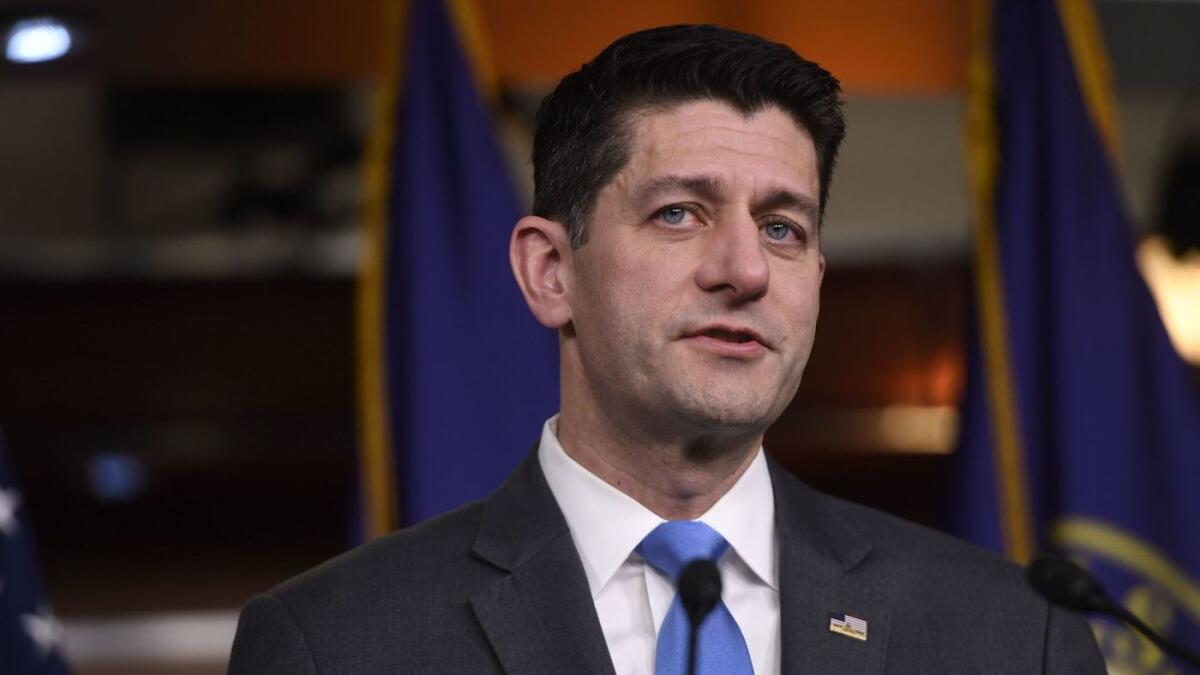
Historians will likely look back at this era of political convulsion and shake some fingers at specific actors, particularly Republican members of Congress who repeatedly have failed to object to the lies and obfuscations — not to mention conflicts of interest — that have defined the Trump administration. It will be interesting to see how House Speaker Paul D. Ryan and Rep. Trey Gowdy will fare.
Both politicians have recently called out President Trump’s unsupported allegation that the Obama administration planted a spy in his 2016 campaign. Gowdy, the departing chairman of the House Oversight Committee who has been a strong Trump supporter, last week said the FBI was right in using a confidential informant to explore allegations of Russian interference and that there was no “Spygate,” as the president has dubbed it (adding “-gate” to a scandal is an overused construct, but “Trumpgate” has a nice ring to it).
“President Trump himself in the Comey memos said ‘if anyone connected with my campaign was working with Russia, I want you to investigate it,’ and it sounds to me like that is exactly what the FBI did,” Gowdy said last week in a Fox News interview. “I think when the president finds out what happened, he is going to be not just fine, he is going to be glad that we have an FBI that took seriously what they heard.”
On Wednesday, Ryan backed Gowdy’s take.
“I think Chairman Gowdy’s initial assessment is accurate,” Ryan told reporters. “But we have some more digging to do. … I have seen no evidence to the contrary of the initial assessment that Chairman Gowdy has made, but I want to make sure that we run every lead down and make sure we get final answers to these questions.”
It’s notable, of course, that neither Gowdy nor Ryan is seeking reelection. Nor, for that matter, are Republican Sens. Jeff Flake of Arizona or Bob Corker of Tennessee, who also have spoken out against Trump’s hateful and erratic tweets and statements (Flake did so before his decision to not seek reelection).
It’s funny how lame ducks are about the only congressional Republicans to grow a little backbone.
Josh Newman’s recall shows that Republicans only want to win, no matter the cost to Californians
After two years in office, Sen. Josh Newman (D-Fullerton) was recalled Tuesday for his vote to increase the gas tax to repair the state’s woefully maintained streets and expand its inadequate transit systems.
Political opportunism won over responsible governance.
Republicans launched the recall campaign after Newman supported the gas tax increase in Senate Bill 1, which needed a two-thirds majority to pass. But Newman’s vote was pretext. Really, Republicans were trying to win back a seat that Newman narrowly won in 2016 and that was historically held by the GOP.
The campaign worked. Newman is out and Republican former assemblywoman Ling Ling Chang, who lost the election in 2016, is in. The GOP got the do-over it wanted in a lower turnout primary election.
The real concern is how this kind of craven political gamesmanship will play in November.
Republicans hope to get a measure on the ballot to repeal the gas tax. While some of the zeal for repeal comes from anti-tax activists, the referendum is being driven and bankrolled by House Majority Leader Kevin McCarthy (R-Bakersfield) and other GOP leaders, who are betting the gas tax measure will draw more Republicans to the polls in November and help protect GOP congressional seats in districts that are increasingly going blue.
In the quest to win races, however, the GOP wants to trounce what was once a thoroughly Republican idea: that drivers should help pay for road repairs and transportation infrastructure with gas taxes.
President Eisenhower signed the bill creating the Highway Trust Fund, which dedicated gas taxes (and other vehicle taxes) to transportation. President Reagan agreed to hike the federal gas tax, as did President George H.W. Bush.
Even President Trump has said he’ll consider hiking the federal gas tax, which hasn’t been increased since 1993, to help fund transportation investments. In fact, Trump’s ballyhooed infrastructure plan would prioritize projects in “self-help” states and counties — that is, regions that have increased taxes to pay for transportation.
So even as the Trump administration is encouraging states to raise their gas taxes to fund infrastructure, Republican leaders are trying to eliminate California’s fuel tax increase, and in the process make the state less competitive for federal transportation dollars.
But who cares about potholes and safe roads, or new subways and bike lanes so people have alternatives to sitting in traffic? Republicans in California apparently want to win, no matter the cost.
It was ladies’ night at the California primary
The ballyhooed “blue wave” may not have been visible in California’s June primary, but the hoped-for Year of the Woman 2018 definitely showed up.
The gubernatorial race notwithstanding, it was not a bad day for women. Not only did Democratic U.S. Sen. Dianne Feinstein advance to the general election in November, she did so with a comfortable lead over all the male candidates. Guess voters aren’t as concerned with her age as her critics.
In down-ballot statewide races, women were the top vote-getters in three of the eight state constitutional seats: Eleni Kounalakis in the race for lieutenant governor, incumbent Betty Yee for controller and Fiona Ma for treasurer. If all three prevail, and it seems likely, then along with the two U.S. senators and the first female state Senate president pro tem, California will approach power parity at the statewide level. Not bad!
A number of women also scored spots in the November general election in congressional races. For instance, Democrat Katie Hill appears to have finished second in the 25th District in northern L.A. County, earning the right to challenge incumbent Rep. Steve Knight (R-Palmdale). Republican Diane Harkey, a state Board of Equalization member, rose above a bevy of Republican and Democratic candidates in the race to take over for Rep. Darrell Issa (R-Vista) in northern San Diego County. Democrat Marjorie Doyle (Actual campaign slogan: Put Marge in Charge) is in a close contest with former Republican Assemblyman Tim Donnelly to take the second spot in the very conservative high desert district held by Rep. Paul Cook (R-Apple Valley).
Women didn’t do badly in state legislative contests either. There’s a particularly delicious outcome in the special election for the state Senate’s 32nd District where two women bested Tony Mendoza, who was trying to regain his seat after resigning earlier this year when an investigation found he most likely sexually harassed women in the Capitol. Mendoza might have escaped the judgment of his colleagues, who were preparing to kick him out when he stepped down, but not that of the voters.
The ‘liberal’ Pope Francis again says no to female priests

It’s an article of faith among some Catholic traditionalists — and not a few journalists — that Pope Francis is a “liberal,” who in his heart of hearts endorses the full agenda of the Catholic left, from acceptance of gay relationships to an openness to ordaining women as priests.
That has always been a facile proposition, but it will be especially hard to maintain after a recent statement from the head of the Vatican’s doctrinal office.
In an article in L’Osservatore Romano, the Vatican newspaper, Cardinal-designate Luis Francisco Ladaria Ferrer, the prefect of the Congregation for the Doctrine of the Faith, wrote: “Christ wanted to give this sacrament [of holy orders] to the twelve apostles, all men, who, in turn, transmitted it to other men.”
Ladaria added that the Roman Catholic Church “has always recognized herself bound by this decision of the Lord, which excludes that the ministerial priesthood can be validly conferred on women.” He cited both a 1994 apostolic letter by Pope John Paul II and its reaffirmation by Popes Benedict XVI and Francis.
Ladaria, a Jesuit like the pope, was appointed to his position by Francis, replacing a prelate who was considered more conservative, German Cardinal Gerhard Mueller.
There was a time when it seemed conceivable that the Catholic Church might admit women to the priesthood, as the Anglican churches have done.
My first byline in The New York Times was on a 1975 piece (you can read it here) explaining how two statements issued by a joint Roman Catholic-Anglican theological commission defined the ordained ministry and the sacrament of the Eucharist in a way that seemed to finesse traditional Catholic objections to ordaining women as priests.
But developments since then — especially John Paul II’s 1994 pronouncement, which Pope Francis has called “the last word” on the subject and one that “remains” — suggest that the door is closed.
The Vatican might still see its way clear to ordaining women as deacons, a subject that is being studied by a papal commission. Because deacons don’t celebrate Mass (in which the priest is considered a representation of Christ), some argue that there is no theological argument that they must be men. Others, including Mueller, disagree, and an earlier advisory committee found in 2002 that there was no historical or theological basis for the ordination of women as deacons.
As for female priests, Rome — in the person of the “liberal” Francis — has spoken, and the answer is no.
Did California Democrats sleep through election day?
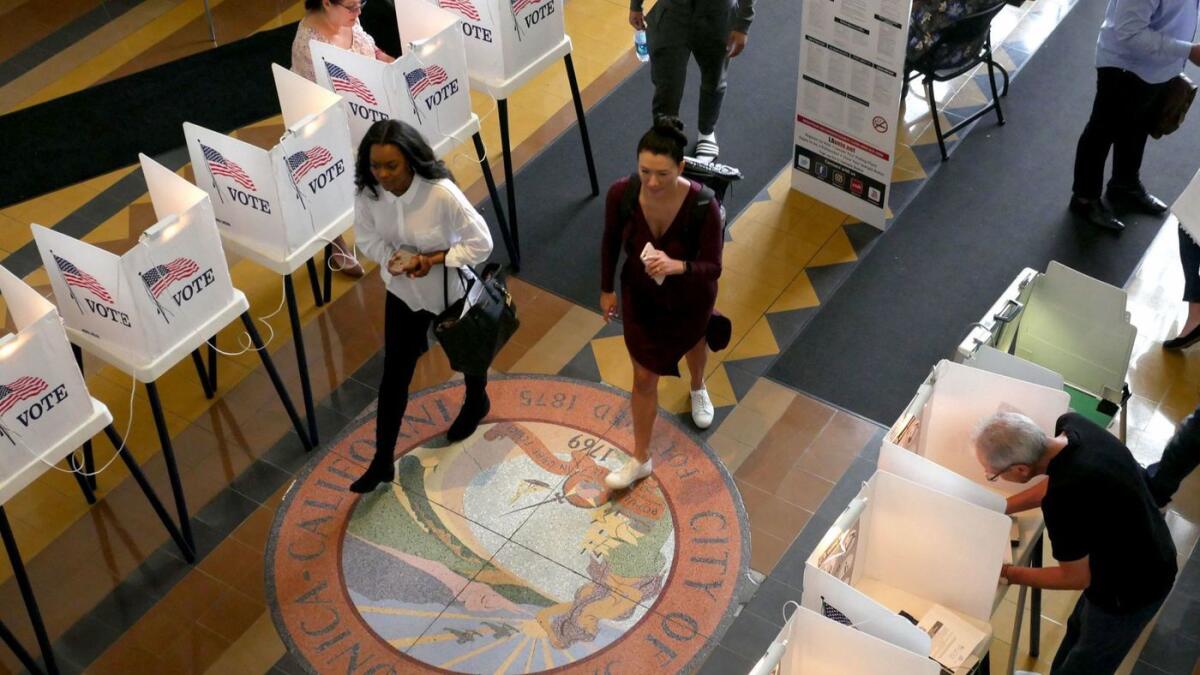
Judging from Tuesday’s primary results, the “blue wave” in California means Democrats waving at their polling places as they drove by.
Final numbers on voter participation won’t be in for a while, but turnout seems unexceptional. With more than 97% of the precincts reporting, less than 21% of registered voters had cast ballots. That’s in line with the anemic turnout in the 2014 primary, and far, far below the five previous midterm election primaries.
Who said this year was special? Oh right — Democrats did.
The line from the national media echoed this making-lemonade-out-of-lemons paragraph by The Times’ Christine Mai-Duc: “Democrats in California appeared poised Tuesday night to avoid getting shut out of key congressional races for the November election, the most pressing risk they faced as they seek to retake control of the House.”
Yes, there were a lot of Democrats competing with one another to flip the six Republican-held U.S. House seats in districts won by Hillary Clinton in 2016. But not getting shut out isn’t exactly the same as “striking fear deep in the heart of Republican incumbents.” Democrats may remain within hailing distance in four of those seats, but the strongest candidate in each of them was from the GOP.
In fact, the only incumbent House member who didn’t come out clearly on top was a Democrat, Pete Aguilar in the Inland Empire, who trailed Republican Sean Flynn by less than 100 votes.
One interesting non-factor: identity politics. In a state where Latinos make up the largest ethnic group, the two most prominent Latino candidates sputtered badly. Former Los Angeles Mayor Antonio Villaraigosa came in a distant third in the governor’s race, and former state Senate president pro tem Kevin de Leon was still battling for a spot in the U.S. Senate contest, barely visible in Sen. Dianne Feinstein’s rearview mirror.
Democrats are counting on liberal Californians’ antipathy toward President Trump to energize the party, just as sparked so many first-time candidates to run for office. But the real MAGA effect on the primary seemed to be on the GOP side, where the Trump endorsement of John Cox pushed the Republican businessman and frequent failed candidate into the gubernatorial top two.
Cox would appear to have as much chance of beating Democrat Gavin Newsom in the general election as the Cleveland Cavaliers do of winning the NBA finals, but that’s not really the point. Merely having a Republican at the top of the ballot will help bring out GOP voters, or so the theory holds. Will Democrats turn out as well, or will November bring another drive-by blue wave?
I love voting. Turns out some other Californians do, too, this time around

L.A. Times editorial writer Carla Hall visits her polling place to vote and check on turnout.
Midterm elections never get blockbuster turnouts. This one, of course, could be different if tens of thousands see their vote as a referendum on the Trump administration. Let’s hope that’s the case.
I’m a voter — I vote in everything. I see it as my right and my privilege as a U.S. citizen. My mother took me to the polling place with her when I was a little girl in Chicago. I never forgot the sense of wonder and solemnity that the voting booth evoked. It helped to be a tiny person.
Those plastic stands where we vote today aren’t particularly awe-inspiring. But I still love taking the stroll into the polling place. [See the evidence in my video above!] That’s why I don’t vote by mail. Of course, it’s great that that’s an option. Not everyone wants to vote in person or has the flexibility in their schedules to do so. The people running for office are always going to show up. There’s no photo op in sitting on your couch filling out a ballot and sticking it in an envelope.
I’ve heard every conceivable excuse for why people don’t vote — my favorite being “I just don’t feel prepared enough to vote.” It’s the “I didn’t do my homework” excuse.
I know some very smart people who would prefer that people like that not vote. I don’t accept that. My response is: Do some homework; you don’t have to read everything.
The only compelling reason I’ve heard is from Jehovah’s Witnesses who don’t vote out of their religious conviction that only God can form a government and their loyalty is solely to that God. I don’t agree with that, but I respect that their decision is based on their religion.
By and large, I think everyone should vote. But one of the great aspects of this democracy that allows us to vote is that it allows us not to, as well.
Ethics, schmethics, America really needs to know why Scott Pruitt wanted a used Trump hotel mattress
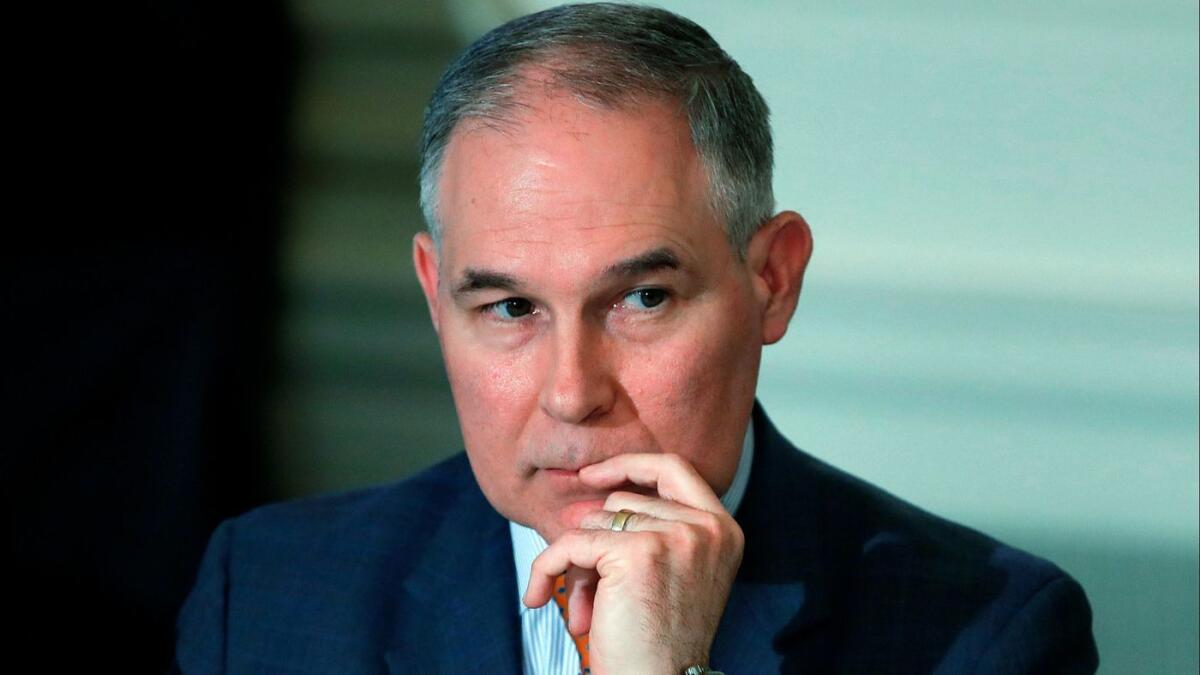
Really, America needs to know – what exactly did Scott Pruitt, the administrator who would be emperor of the Environmental Protection Agency who makes around $190,000 a year, want with a used mattress from the Trump International Hotel?
That little detail was included in comments by Pruitt’s scheduling director to House Oversight Committee staffers that was released Monday by Democratic members of Congress. The staffer, Millan Hupp, said she had done personal errands for Pruitt on her own time, which experts say violates federal ethics standards. She also helped him find an apartment as he moved out of that $50-a-night room-rate favor he received from the wife of a lobbyist.
The Washington Post reported separately today that another scheduler, Hupp’s sister Sydney Hupp, called Chik-fil-A to set up a meeting for Pruitt about a “business opportunity.” Turns out that Pruitt’s wife was looking to become a Chik-fil-A franchisee.
A separate overture to the chief executive of Concordia, a nonprofit organization to promote “cross-sector partnerships for social impact,” led to a $2,000 payment to Marlyn Pruitt to help organize a conference, the Post said.
“Multiple current and former EPA aides, speaking on the condition of anonymity to describe private conversations, said Pruitt told them he was eager for his wife to start receiving a salary,” the Post said. “Two said the administrator was frustrated in part by the high cost of maintaining homes in both Washington and Oklahoma.”
The ethics investors will want to add that one to the list of things Pruitt has done that any other administration would have bounced him for months ago.
There have been the first-class flights, the expensive and unnecessary 24/7 security detail, the $43,000 soundproof phone booth in his office (I envision the “Get Smart” cone of silence), the custom pens, the pay raises for his buddies, the lights-and-sirens motorcades, the …. well, enough of that.
The mattress. Tell us about the mattress.
‘Swatting’ David Hogg wasn’t a ‘prank,’ it was attempted murder

Parkland, Fla., shooting survivor turned anti-gun activist David Hogg avoided another potentially deadly incident Tuesday — after police armed with assault rifles burst through the doorof his family home. Broward County sheriff’s officials were responding to a call that Hogg and his family had been taken hostage by an assailant armed with an AR-15.
That call turned out to be false.
Hogg, thankfully, was out of town when police arrived at his doorstep en masse — prepared for a shootout with an armed menace.
The teenager was gracious enough to write the incident off as “just a silly prank” — language that was echoed by local police and a number of prominent media outlets.
This was not a prank. A prank is ordering 10 pizzas to someone’s home who didn’t ask for them. Or asking if someone’s refrigerator is running.
If initial reporting about the incident proves accurate, this was attempted murder. (Or, to be more precise, manslaughter)
The dangers of swatting — as the practice of summoning police to someone’s home under false pretenses is known — are obvious. In December of 2017, a 28-year-old father of two named Andrew Finch was shot and killed by police after a California man allegedly called police and told them that a man at Finch’s address had killed his father and was holding the rest of the family hostage.
Finch, completely unaware of what was happening, opened his front door in response to calls from police and was summarily shot to death.
That Hogg dismissed his swatting as a prank, of course, isn’t his fault. He’s undoubtedly terrified and just wants this to go away and have it never happen again.
It’s police and the media who need to be more responsible with their language and treat this incident for what it was.
We live in a country where police can and do kill citizens if they feel threatened. Sending police into a home invasion scenario — facing down an AR-15-toting hostage taker — was well calculated to create a justifiable threat. That Hogg has become a lightning rod for controversy — drawing the ire of pro-gun activists in particular — only made the threat more plausible.
Whoever swatted Hogg more than likely knew police could inadvertently shoot and possibly kill the teenage school shooting survivor or a member of his family. We need to treat this reality with the gravity it demands.
CORRECTION: 6/14 4:15 p.m. — A previous version of this piece stated that police officers responding to a false emergency call at David Hogg’s home kicked down the front door. They had a key.
Trump dumps the Eagles. Maybe all teams should just say no to the White House
For President Trump, professional athletes are the gift that keeps on giving.
You might recall how Trump withdrew the customary White House invitation from last year’s NBA champion, the Golden State Warriors, because star Stephen Curry has the temerity to question whether he actually wanted to go. On Monday, Trump did it again, abruptly cancelling a planned celebration at the White House on Tuesday with the Super Bowl champion Philadelphia Eagles because a number of team members refused to join in. Their beef? Trump’s strong-arming the National Football League owners into requiring players on the field to stand respectfully during the anthem and not do anything, you know, uppity.
Those protests, by the way, are meant to call attention to the repeated incidents of police shooting unarmed black men. But that’s not the angle Trump takes. Here’s how he characterized the Eagles’ views in a statement Monday:
“They disagree with their President because he insists that they proudly stand for the National Anthem, hand on heart, in honor of the great men and women of our military and the people of our country.”
You may insert your favorite quote about forced displays of patriotism here. But the bigger lesson here is that these White House dog-and-pony shows with championship teams are now utterly politicized, on top of being far too numerous (see the photo above for a prime illustration of Championship Celebration Creep: the White House ceremony last month for NASCAR’s top driver). Players need to recognize that they’re getting played by someone who’s better at this than they are.
Trump sees the anthem issue (which also fed Curry’s misgivings) like a slow curve into his wheelhouse, something that resonates strongly with his base. The Wall Street Journal reported last week that Trump told as much to Dallas Cowboys owner Jerry Jones, “Tell everybody, you can’t win this one. This one lifts me.”
Trump played up the us-against-them aspects in his statement regarding the Super Bowl champs. “The Eagles wanted to send a smaller delegation, but the 1,000 fans planning to attend the event deserve better,” he said. “These fans are still invited to the White House to be part of a different type of ceremony — one that will honor our great country, pay tribute to the heroes who fight to protect it, and loudly and proudly play the national anthem. I will be there at 3:00 p.m. with the United States Marine Band and the United States Army Chorus to celebrate America.”
That, ladies and gentlemen, is major league spin. The president stands with the fans and the military, while the Eagles find themselves in the role of disrespectful, unpatriotic athletes.
Championship teams are in tough spot. It’s a huge honor to be invited to the White House, and these sorts of celebrations used to be puff pastry — light and airy. At the same time, it’s a cherished American right to protest the way the government uses its enormous power — and to criticize anyone and everyone in office, including the president. And this particularly thin-skinned president lashes back.
So, should the Eagles have shut up and marched en masse to the South Lawn, where at the very least they could have enjoyed rubbing in their victory over a team owned, coached and quarterbacked by well-known Trump supporters? That seems like too big a trade-off. It would be better if players told their leagues to inform the White House that no matter who their champion is, they won’t be visiting the White House. It’s infinitely preferable to being played by the guy who lives there.
Save the whales! From your plastic trash
During the five days that rescuers tried to save the life of an ailing pilot whale found in a canal in Thailand last week, it vomited up five plastic bags. That, it turns out, was just a horrifying preview of what was discovered after the whale finally expired: 80 plastic bags stuffed into the whale’s stomach.
This is not the first marine animal to be found to have been harmed by ingesting plastic trash in the ocean. Or even the first whale. In 2013, the body of a sperm whale washed up on a beach in Spain with 37 pounds of garbage blocking its stomach.
But it may be the most heart-wrenching death-by-plastic story yet. And it comes at an pivotal moment. Humans are — finally — waking up to the fact that their addiction to throwaway plastic is killing wildlife in a much more graphic and gruesome manner than climate change. Stories like these ought to be a rallying call for new, and significant, restrictions on single-use plastic items.
Because of American consumers’ aversion to giving up any convenience, no matter how much it might be destroying their own habitat, California remains the only U.S. state to have outlawed disposable plastic bags. Outrageously, some states have actually passed laws banning plastic bag bans! The right to a free plastic bag seems as important to some as the right to bear arms.
But happily other countries are not waiting for any leadership from the U.S. (Man, is that becoming a trend.) Last week, Chile became the first country in the Americas to ban plastic retail bags. Will the U.S. be the second? Seems unlikely under the administration of President Donald “Call me Mr. Coal” Trump.
But there is reason to hope. The sudden explosion of laws targeting plastic straws might not have ever happened were it not for this video of marine biologists extracting a plastic straw from the nose of a sea turtle. If watching that doesn’t put you off plastic straws, nothing will. (The video includes some strong language from the scientists.)
Pardon me, Mr. President, but you really should shut up about pardoning yourself

I don’t usually feel the urge to offer President Trump helpful advice, particularly not when the advice would also help his zombie minions in Congress. I’m more of a grip-it-and-rip-it kind of critic. And there’s just so much to criticize.
Then I saw this tweet this morning:
I sensed a soul in pain, and the part of me that loves small children and animals is seizing control of the keyboard to say: Mr. President, never utter another word about pardoning yourself. Just shhh. SHHHHH. Shhhhh.
I’m no lawyer, but I totally buy the argument that you can’t charge a president with a crime. I don’t mean that in the “I could stand in the middle of 5th Avenue and shoot somebody and I wouldn’t lose voters” sense. I mean it in the “no law enforcement agency has the authority to bring charges against a sitting president” sense.
So really, the only group you have to worry about is the House Judiciary Committee, which is where any attempt to impeach you would begin. And even if the committee were to take such a step, the full House would have to vote to impeach, and the Senate would have to vote to convict.
If a Republican-controlled Congress couldn’t oust Bill Clinton, of all people, why would you worry about a Republican-controlled Congress turning on you?
OK, there is that whole midterm election thingy coming up. But the supposed “Blue Wave” that was going to flood the House and possibly the Senate with Democrats doesn’t seem to have the energy it did just a few months ago — ultra-low unemployment and rising wages will do that to an insurgency.
Here’s the thing, though. Every time you pop off about pardoning yourself, you make yourself look shady. Worse, you prompt my colleagues in Reporterland to ask GOP incumbents and congressional candidates how they feel about you possibly pardoning yourself, and what they would do if you did. Not helpful!
Meanwhile, your zany tariff bonanza is starting a trade war that, if history is any guide, could run a lance through the economy that’s been so helpful to Republican incumbents.
All of which makes me wonder, don’t you want Republicans to hold on to Congress? Personally, I think the idea of Democrats impeaching you if they take control of the House is way oversold (by Republicans in particular). For every impeachment zealot like Maxine Waters, there are probably two Democrats who simply aren’t up for the political Armageddon that would trigger. But a Democrat-controlled House sure would do a number on your agenda. Which, also speaking personally, would be a good thing.
I know it’s too much to ask for you to stop tweeting — many others have made the suggestion, including people who actually like you, all to no avail. But at the very least, stop tweeting about pardoning yourself. It’s not a #WINNING message for anybody on your side, including the only pol you really care about.
The Supreme Court’s same-sex wedding cake ruling isn’t nearly as bad as it could have been
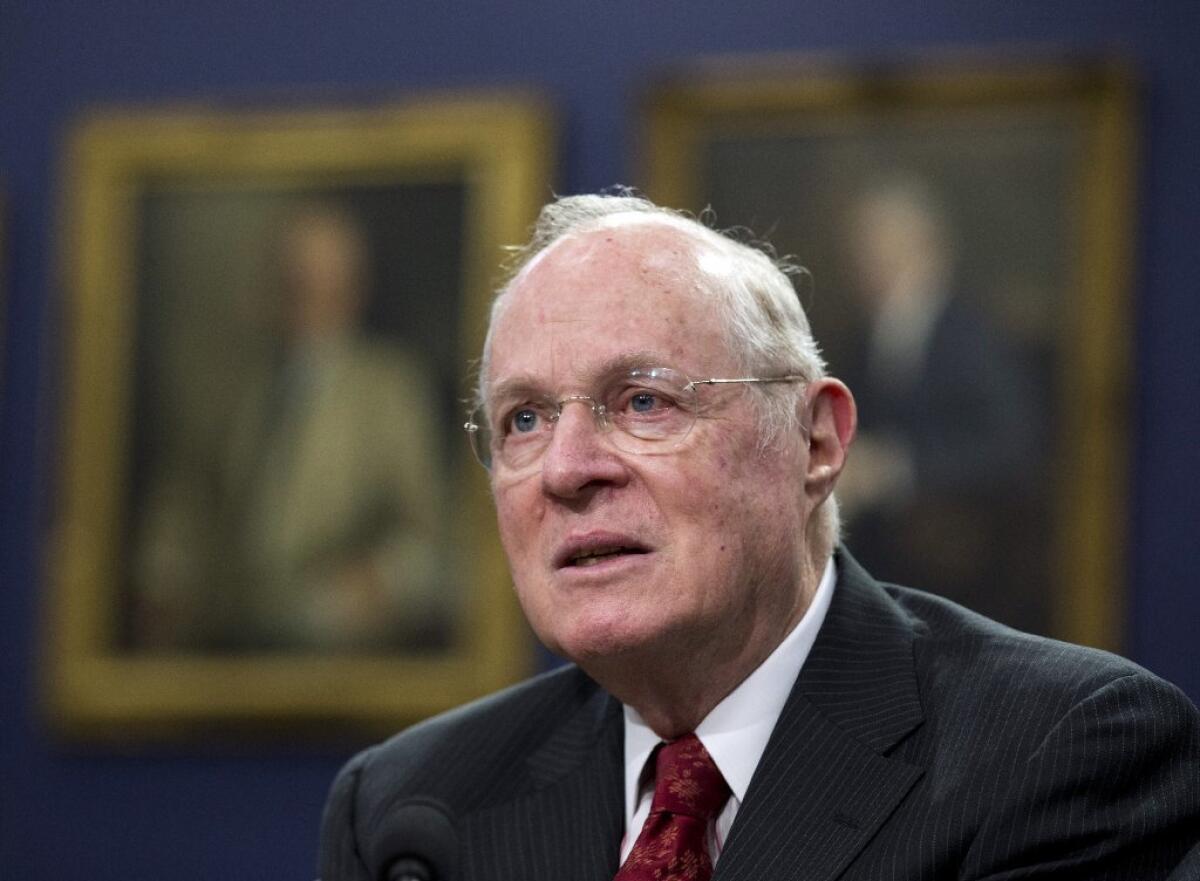
The Supreme Court on Monday finally issued its ruling in Masterpiece Cakeshop vs. Colorado Civil Rights Commission, aka the same-sex wedding case case.
Three quick points:
The 7-2 decision is narrower than some social conservatives would prefer, focusing in large part on the majority’s perception that the Colorado Civil Rights Commission displayed hostility toward Christian baker Jack Philips’ religious convictions against same-sex marriage. This issue also featured in December’s oral argument in the case, as I explained here
It’s interesting that Chief Justice John G. Roberts Jr., a dissenter in the court’s 2015 decision legalizing same-sex marriage, assigned the majority opinion to Justice Anthony M. Kennedy, the author of the majority opinion in that previous case and the court’s pre-eminent supporter of equality for gays and lesbians. (One wonders if Justices Elena Kagan and Stephen Breyer would have signed an opinion penned by Justices Samuel A. Alito Jr. or Neil Gorsuch, who ended up joining in a separate concurring opinion, though they also signed Kennedy’s opinion.)
Many observers – including the Los Angeles Times editorial board – worried that a victory for Phillips would create an exception to civil-rights laws for all manner of merchants with opposition to same-sex marriage – including chefs, hairstylists or makeup artists (and maybe even limousine drivers hired to transport the happy couple from the church to the reception.) But in his majority opinion Kennedy seemed to recognize the dangers of such a broad exception.
He wrote that “any decision in favor of the baker would have to be sufficiently constrained, lest all purveyors of goods and services who object to gay marriages for moral and religious reasons in effect be allowed to put up signs saying ‘no goods or services will be sold if they will be used for gay marriages,’ something that would impose a serious stigma on gay persons.” Translation: “We see the danger of a slippery slope that would undermine same-sex marriage.”
Should California force corporations to add women to their boards?
By a whole bunch of different metrics, too few women occupy leadership positions in U.S. businesses. Just look at corporate boards of directors: At the 3,000 companies tracked on the Russell 3000 index, fewer than 1 in 6 board seats is filled by a woman. More than a quarter of the California companies in that group had no female directors at all. The representation of women is far higher on corporate boards in Western European countries, several of which mandate that women hold 30% to 40% of the board seats.
To California state Sen. Hannah-Beth Jackson (D-Santa Barbara), this is a problem that cries out for a government mandate. So, joined by Senate President Pro Tem Toni Atkins (D-San Diego), she has steered a bill (SB 826) through her chamber this week that would require any California-based corporation that sold stock on a major U.S. exchange to have at least one woman on its board of directors by the end of next year. The vote was 22 to 11.
The bill drew sharply different reactions from the various members of The Times editorial board during an informal discussion over email. We haven’t decided whether to weigh in with an editorial, let alone what it would say. But here’s some of the back-and-forth.
Hey California, don’t vote for the guy who’s running for U.S. Senate in five states
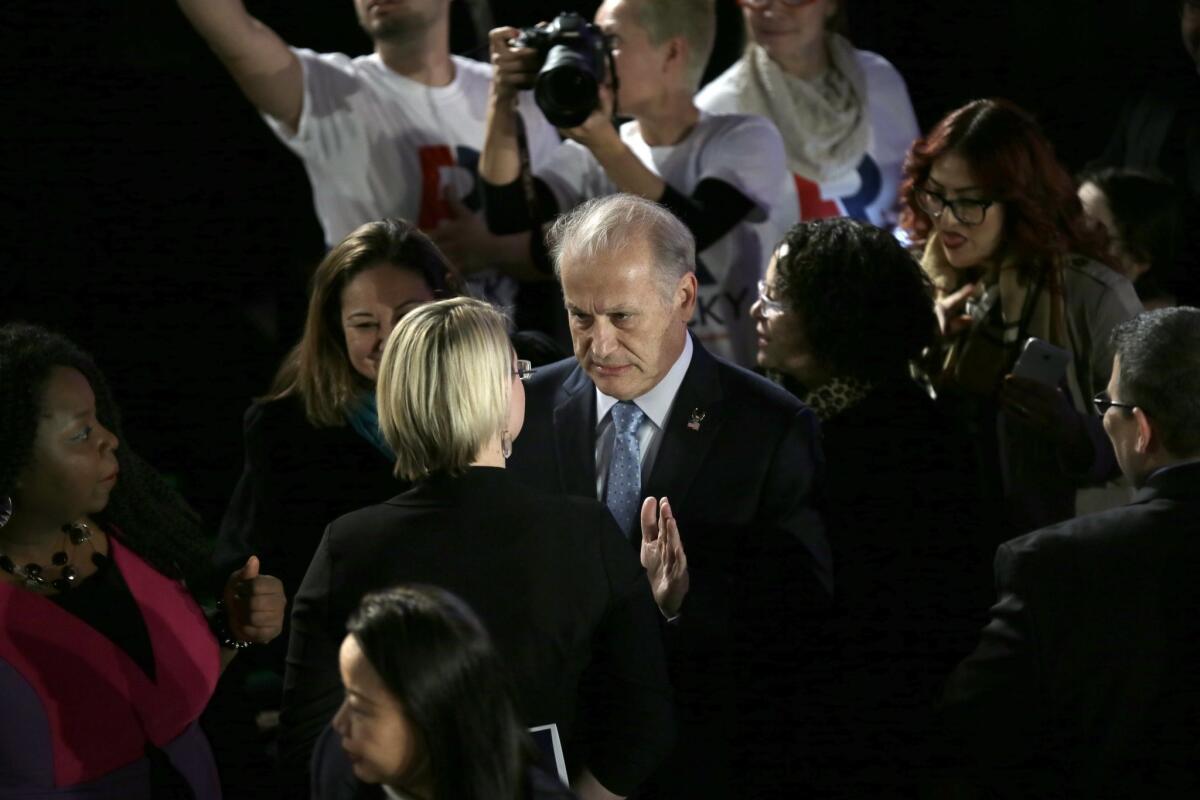
Roque “Rocky” De La Fuente is running for U.S. Senate in California’s June 5 primary.
And in Washington on Aug. 7.
And in Minnesota on Aug. 14.
And in Wyoming on Aug. 21.
And in Florida on Aug. 28.
Yes, five states. For now. He’s contemplating campaigns in Vermont, Hawaii and Delaware, too. Why not?
De La Fuente claims he’s running in multiple states to highlight the need for election reform. It should be tougher to run for U.S. Senate.
Baloney.
De La Fuente is a rich guy from San Diego who has been trying — and failing — to buy himself an elected position for which he is not qualified for the past two years. And big ones, not school board or city council, but Senate, president, mayor of New York.
(Please don’t mistake De La Fuente for California gubernatorial candidate John Cox, the other rich guy from San Diego who has been trying — and failing — to buy his way into high office in more than one state.)
No, this is simply the campaign version of buying five lottery tickets at a time instead of one, thinking that it will significantly increase the odds of winning. He’d probably like to finally get a return on the millions sunk into two years of failed campaigns.
It would be easy to brush De La Fuente off as a crank, like the neo-Nazi also running against Sen. Dianne Feinstein, but the fact is that in the absence of any big-name Republican in the race, this guy has somehow become the top GOP candidate. One poll has him in the second position and far ahead of Democratic state Sen. Kevin de Léon, which is nuts considering their relative resumes.
Republicans should check out De La Fuente’s positions on his website before they blithely check the box next to his name because of the “R” next to it. They sound suspiciously liberal: gun control, marriage equality, pro-choice, path to citizenship, etc. Perhaps it hasn’t been updated since 2016, when De La Fuente sought the Democratic presidential nomination and ran as a Democrat in a U.S. Senate primary in Florida. He also got himself selected the presidential nominee of the Reform Party.
Is De La Fuente just incredibly open minded? My guess would be desperate.
(Running long-shot political campaigns seems to be a family business. De La Fuente’s son Ricardo “Ricky” De La Fuente was among the 23 people running for the seat in the U.S. House of Representatives left vacant when Xavier Becerra of Los Angeles was appointed state attorney general last year. Alas, like his father, Ricky didn’t win, earning less than 1% of the vote. But, also like his father, failure did not discourage Ricky from launching another congressional bid, this time in Florida.)
Fellow Californians, don’t be the ones who give this campaign junkie a win he doesn’t deserve. It will only encourage other rich guys who believe that their wealth alone entitles them to hold powerful positions.
Why John Chiang doesn’t deserve your protest vote
It’s a good question, and one that has come up more than once since the Los Angeles Times editorial board decided to throw in with former Los Angeles Mayor Antonio Villaraigosa in the governor’s race on June 5: What about John Chiang? After all, we’d endorsed Chiang for both his current job as state treasurer and his previous gig as state controller.
So what happened? We rarely spend much ink bagging on other candidates we aren’t supporting in endorsement editorials. But I feel compelled to share more about why the editorial board didn’t endorse Chiang because he has become something of a status candidate among progressive-ish folks disenchanted by the mainstream, “corporate” Democratic politicos Lt. Gov. Gavin Newsom and Villaraigosa (the really hard-core progressives are pulling for Delaine Eastin, a former state superintendent of education who’s got the Bernie Sanders thing going on).
The Times editorial board had high hopes for Chiang. He’s smart and likable, and having spent more than 20 years deeply involved in the state’s finances, it seemed likely he’d have some insight into and solutions to offer for the state’s biggest problems. Sure, he’s been pretty cautious about taking positions in the past, but maybe he felt that as the state’s money man he shouldn’t step into non-financial debates. Fine. The race for governor was his opportunity to let loose with all the wisdom gleaned from four terms and become the candidate that really blew us away.
It was no surprise Trump’s North Korea summit was canceled. It’s no surprise that it’s back on

A week ago, when President Trump’s much-ballyhooed super-summit with North Korean leader Kim Jong Un was suddenly canceled, I wrote an editorial for The Times asking whether, “seriously, is anyone really shocked?” But just to be clear, I’m no more shocked by the fact that it is back on than I was that it was cancelled in the first place.
That’s because Trump is the most erratic, impulsive, inconsistent leader imaginable. And the guy he’s planning to meet across the table is hardly a paragon of diplomatic gravitas himself.
From the start, the summit was undertaken in, to say the least, an unorthodox manner. It began with name-calling between Little Rocket Man and the Dotard, with the protagonists hurling insults, calling each other “deranged,” “short,” “lunatic,” “reckless,” “fat,” etc. It also included more serious threats: We will “totally destroy North Korea,” Trump said at one point. Kim said: “The entire area of the U.S. mainland is within our nuclear strike range.”
From that unpromising position, the two switched suddenly to love-one-another mode. The summit was on. Trump began preening for his Nobel Peace Prize.
And then it was off again.
So you see what I’m saying? It wasn’t surprising that it was off and it isn’t surprising that it is back on. Because veering wildly from one extreme to another, in this case between belligerence and brotherly love, is what these guys do. Honestly, Trump seems to have made his latest decision at least in part based on what he called a “very nice letter” from Kim.
No one would be happier to see a meaningful rapprochement between the U.S. and North Korea than we here at The Times. But as we watch this unfold, it seems worthwhile to reiterate a few things to the president as he packs his bags for the June 12 meeting.
Yes, posturing is part of deal-making. And yes, there can be some carrot-and-stick in any negotiation. But remember, as the editorial board has mentioned before, the pursuit of substantive foreign policy successes requires more than tweets to voters and bluster that fools no one. You need to establish your own long- and short-term goals. You need to understand your adversary’s motivations and political needs. You need to be realistic about the costs and benefits of various possible outcomes. You need to prepare. You need to build trust. You need to manage expectations. You need a strategy.
We’re not saying this can’t work out. We’re just saying the administration needs to be serious about it. Less showmanship, please, and more deliberation.
How the Trump administration could make your healthcare even more expensive

As bad as the Trump administration and congressional Republicans have made things for Americans who buy health insurance in the individual market, it could be worse. In fact, the Trump administration may make it worse later this year, just in time for the midterm elections.
Specifically, the administration is considering a way to increase the pain inflicted by its decision last year to stop reimbursing insurers for certain subsidies they are required to provide low-income Americans enrolled in Obamacare plans. These “cost-sharing subsidies” lower deductibles and other out-of-pocket expenses. The decision shifted the cost of billions of dollars’ worth of subsidies from federal taxpayers onto the people buying health insurance in the individual market.
Insurers and regulators in most states found a way to redirect that bullet so that taxpayers continued to absorb much or all of the cost. Now, however, officials at the Department of Health and Human Services are thinking about barring this practice, resulting in higher premiums for more of the roughly 20 million Americans who buy insurance in that market.
Just to be clear, these machinations matter only to people who aren’t covered by either a large employer’s group health plan or a government insurance policy, such as Medicare or veterans’ benefits. About half of them shop in Covered California and other state Obamacare exchanges; the rest buy from brokers or directly from insurers.
This gets a little weedy, so bear with me. The following statistics come from a report on the Health Affairs blog by a group of healthcare analysts. When the administration stopped the reimbursements, 48 states allowed insurers to recover the costs by raising premiums by an estimated 14% on average (other factors pushed the average increase higher). The vast majority of these states directed insurers to recover all or much of the cost by raising premiums just on the standard Obamacare policy (“silver tier” plans), giving consumers a number of ways to avoid the surcharge.
This approach had some unexpected benefits. The nearly 10 million lower-income consumers who qualified for subsidies didn’t feel the pain of the surcharge because it triggered larger subsidies, effectively passing it back to the taxpayers. And because the bigger subsidies could be used on other tiers of health plans that didn’t bear the surcharge, consumers in several states were able to get more extensive coverage with lower deductibles for roughly the same price as the silver plan. In California, the only losers were shoppers who didn’t qualify for subsidies but who still bought the silver plan with the surcharge on an Obamacare exchange.
The administration, however, has apparently taken a skeptical view of these work arounds. According to the analysts on the Health Affairs blog, the Department of Health and Human Services may require the cost of the cost-sharing subsidies to be recovered in 2019 through a surcharge on all policies in the individual market.
That’s what half a dozen states required insurers to do in 2018, and as a result they saw lower enrollment than the states that confined the surcharges to the silver tier. If California and the rest of the country are compelled to follow suit, the hit will be felt by 6 million to 7 million non-subsidized consumers, the analysts estimated. And it would come on top of an estimated 10% premium increase caused by the GOP tax bill, which ended the “individual mandate” to buy insurance that kept many younger and healthier people in the market.
Critics of Obamacare argue that the law itself hurts consumers in the individual market by requiring them to buy costlier comprehensive policies and concentrating too much risk on too few people. They’re not entirely wrong about that. But instead of making things better in the individual insurance market by expanding risk pools and spreading costs more broadly, the administration keeps coming up with ways to make things worse.
Mike Pompeo (no kidding) wishes everyone a happy Pride Month
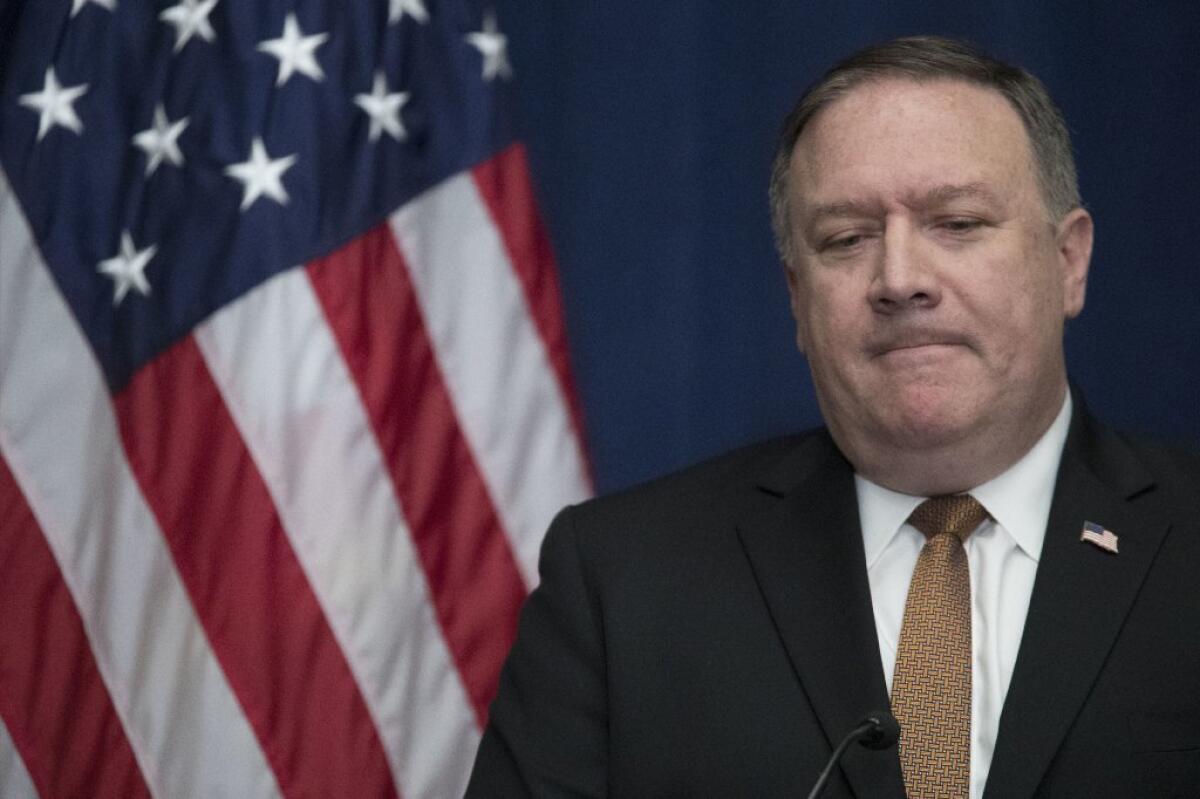
Like his predecessors, Secretary of State Mike Pompeo allows his name to appear on a vast number of statements issued by the State Department, a lot of which land in my email inbox.
For example, Pompeo on Friday extended “my best wishes and congratulations to our friends in Italy on this 72nd anniversary of the foundation of the Italian Republic.”
But Pompeo’s name also appeared on a message with potentially more political significance than “Happy Birthday, Italy.”
It ran under the eye-catching headline “Secretary’s Remarks: LGBTI Pride Month.”
Here’s the complete text:
“The United States joins people around the world in celebrating Lesbian, Gay, Bisexual, Transgender, and Intersex (LGBTI) Pride Month, and reaffirms its commitment to protecting and defending the human rights of all, including LGBTI persons.
“In many parts of the world, LGBTI individuals and their supporters continue to face violence, arrest, harassment and intimidation for standing up for their human rights, participating in peaceful marches and rallies, expressing their views, and simply being who they are.
“LGBTI persons — like all persons — must be free to enjoy their human rights and fundamental freedoms, including freedom of expression, peaceful assembly, and association, without fear of reprisal. As Americans, we place a high value on these rights and freedoms, which all persons deserve to enjoy fully and equally.
“The United States stands firmly with you as you exercise your human rights and fundamental freedoms. We wish you a safe and happy Pride Month.”
Whether or not Pompeo played any role in composing this message, his name being on it is significant.
As a member of Congress from Kansas, Pompeo opposed same-sex marriage, and at his confirmation hearings told Sen. Cory Booker (D-N.J.) that “I continue to hold that view.”
At a “God and Country Rally” rally in 2015, Pompeo approvingly quoted a prayer in which a preacher said: “America had worshiped other gods and called it multiculturalism. We’d endorsed perversion and called it an alternative lifestyle.”
Pompeo’s views about gay and lesbian relationships cost him support in the Senate. Sen. Dianne Feinstein cited his criticisms of the Supreme Court decision legalizing same-sex marriage as one of the reasons for her “no” vote.
But at his confirmation hearings, Pompeo insisted that as director of the CIA he had treated all couples, gay and straight, “with the exact same set of rights” — suggesting that he would follow the same policy at State. And now he has affixed his name to a statement that condemns anti-gay discrimination abroad and concludes with a wish for a “safe and happy Pride Month.”
One statement does not a policy make, and no doubt some will dismiss this one as hypocritical or insincere (and note that it makes no reference to marriage). But it matters that Pompeo’s name appears on this statement, and not that of one of his underlings.
President Trump’s loose lips on Twitter enrich some savvy traders
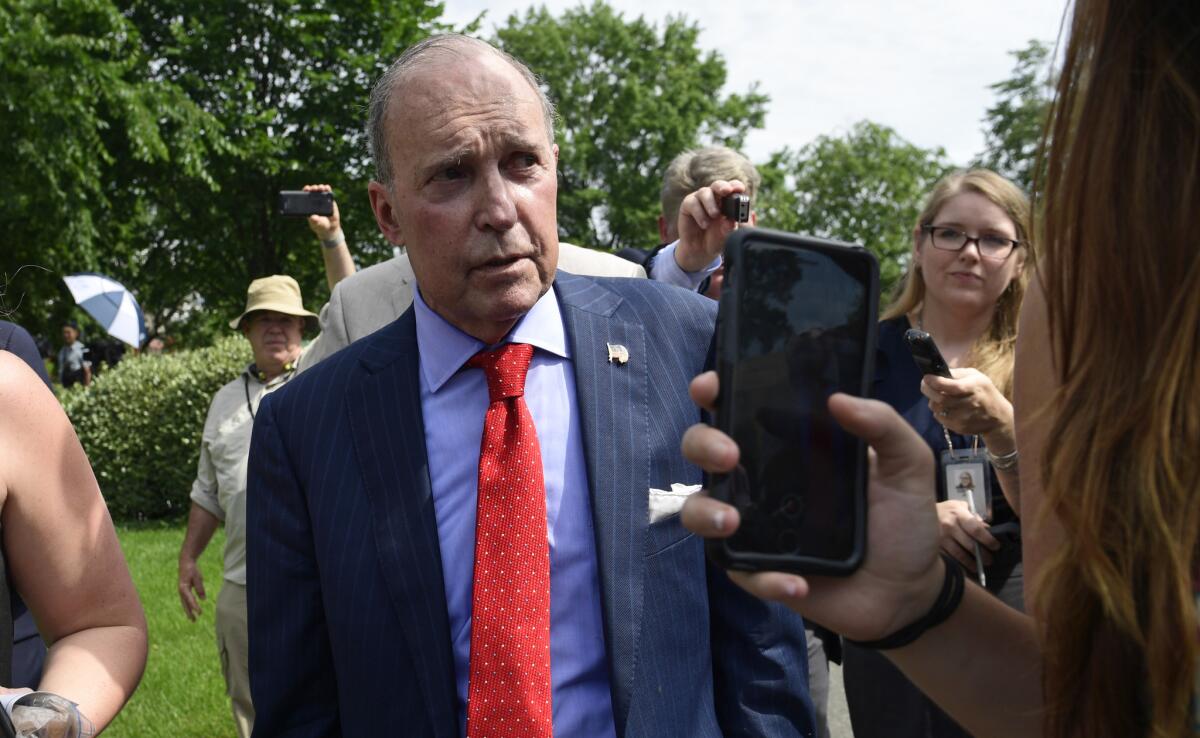
In keeping with this week’s theme of double standards, how does President Trump get away with tipping off the markets about this month’s jobs report — something his predecessors never dared to do?
At 7:21 a.m. Eastern time, Trump tweeted this:
Here’s what happened next, according to the Washington Post:
“Treasury yields moved sharply higher within seconds of a tweet from Trump that said he was ‘looking forward to seeing the employment numbers at 8:30 this morning.’ He had never issued such a tweet before. Bloomberg News data also showed that the value of the U.S. dollar moved sharply higher after the Twitter post compared with previous trades the mornings jobs data are released. That means traders were probably making investment decisions based on signals they took from Trump’s post.”
As it turns out, they were making a smart bet. The report from the Bureau of Labor Statistics showed stronger than expected job growth in May and a lower unemployment rate, yet only modest increases in wages — in other words, a Goldilocks set of numbers that reduces fears of inflation (and higher interest rates).
This is exactly why no federal officials, let alone the president, ever discuss what’s in the report before it’s made public — the information moves markets. Trump had been briefed on the numbers the night before by his top economic advisor, Larry Kudlow, the Post reported; evidently, Trump wanted to make sure the good news didn’t get overlooked.
Hey, Larry, maybe next time you should brief your boss after the report is released.
Granted, it’s not like Trump picked up the phone and told Junior to start trading on the information. For him, tweeting is as good as putting out a press release. Still, it bent the rules under which this particular exercise has operated for decades.
Imagine for half a second the explosion of condemnation that would have come from the Republican Congress if President Obama had hinted an hour before the Bureau of Labor Statistics that good news about the economy was on the way. You’ll no doubt hear that from Democrats, but will the Republican chairmen of the relevant congressional committees even raise an eyebrow?
Trump’s supporters warn that Democrats are trying to regain the House in November so they can impeach Trump, as some of them would no doubt love to do. But for most, I suspect, the real motivator is the desire to hold the White House accountable when the president impulsively does something like he did this morning.
Pompeo’s notion that freedom of religion is more important than our other rights is pious fiction

In introducing the State Department’s latest report on international religious freedom, Secretary of State Mike Pompeo this week waxed lyrical about the importance of religious liberty in America’s constitutional system.
“Religious freedom is in the American bloodstream,” Pompeo said. “It’s what brought the pilgrims here from England. Our founders understood it as our first freedom. That is why they articulated it so clearly in the 1st Amendment.”
Not quite.
If all Pompeo was saying is that the framers thought freedom of religion was of such paramount importance that it needed to be included in the Constitution, he was on solid ground. But by linking “first freedom” to “1st Amendment,” the secretary of State seemed also to be suggesting — erroneously — some connection between the two “firsts.”
If so, he wouldn’t be alone. In 1993, during a debate on the Religious Freedom Restoration Act, Rep. Jerrold Nadler (D-N.Y.) said: “It was no accident that the Framers of our Bill of Rights chose to place the free exercise of religion first among our fundamental freedoms.”
It’s true that the 1st Amendment mentions religion before it moves on to guarantee freedom of speech, freedom of the press and the right to peaceably assemble and to petition the government for a redress of grievances. And it’s also true that the 1st Amendment as a whole was placed before other amendments.
But the idea that this makes either the 1st Amendment, or freedom of religion, more important than other constitutional rights is a pious fiction.
First (as it were), in 1789 Congress actually proposed 12 amendments to the states in the original Bill of Rights. What is now the 1st Amendment was originally the 3rd Amendment. It moved up to first place because the states failed to ratify the original 1st and 2nd Amendments. So the idea that the framers “put it first” is wrong.
The original 1st Amendment dealt with the size of the House of Representatives. The original 2nd Amendment was equally prosaic. It said that salary increases for members of Congress couldn’t take effect until after the next election for the House.
The pay-raise amendment was finally ratified in 1992 and now appears in the Constitution as the 27th Amendment. But it’s no less a part of the Constitution than if it had been ratified as the 2nd Amendment. (There were some objections to the delayed ratification of the amendment, but Congress acknowledged its validity.)
Freedom of religion may be the “first freedom” in Pompeo’s mind, and freedom of the press may occupy that exalted status for journalists. But in neither case does that it matter that they are guaranteed in the 1st Amendment. “First” doesn’t mean “most important.”
L.A.’s homeless population is growing smaller, but also older and more exposed

For the first time in four years, the number of homeless people in Los Angeles County decreased. It was only by a modest 3% (and 5% in just the city of L.A.) but that is still a significant reversal of a disturbing trend of double-digit increases in recent years.
The dip was welcome news, but the overall picture remains grim — 53,195 homeless people in the county, 31,516 of them in the city. The Los Angeles Homeless Services Authority, which administers the count, also says that more than 16,000 homeless people were housed, which is the highest number ever. It’s a sign that city and county agencies are treating the problem as the crisis that it is and directing more money into housing, services and outreach.
The most progress was made with homeless veterans, whose ranks decreased by 18%, to 3,910, and chronically homeless individuals, whose numbers dropped 16%, to 14,389. The latter figure reflects how county and city officials focused much of their efforts on housing the most vulnerable portion of the homeless population.
On the downside, the numbers of newly homeless people grew, as did the population living on the streets in tents and vehicles and makeshift encampments. That means the population is shifting where it takes refuge, with about three fourths of the homeless staying out of shelters. Nearly half say they were homeless due to financial reasons, such as the loss of a job.
Meanwhile, the homeless population has gotten older — the number of homeless people 62 years and older grew 22%, while every other age group shrank. Given that 35% of homeless people are black, 35% are Latino, and the overwhelming population is single and male, it’s not hard to visualize the average homeless person as an old black or Latino single man sitting on a sidewalk.
While county and city officials appear to be growing more effective at housing homeless people, the latest numbers show there is still much work to be done by local agencies — particularly in homelessness prevention, rapid rehousing and creation of new housing.
And there continue to be obstacles here. The county has a growing shortage of affordable housing. Median rents have increased 32% since 2000 while median renter household income has decreased by 3%. The city of L.A. said it could build 10,000 new units of housing with Proposition HHH bond measure money, but now it says it can only build 6,000. And we have seen a spate of NIMBY-ism in the city over the placement of both permanent supportive housing and interim shelters. Unless we can fix some of these problems, that average older homeless man is likely to die on the streets before he gets housed.
Rod Blagojevich isn’t just a flawed politician who said some ‘stupid’ things. He’s corrupt
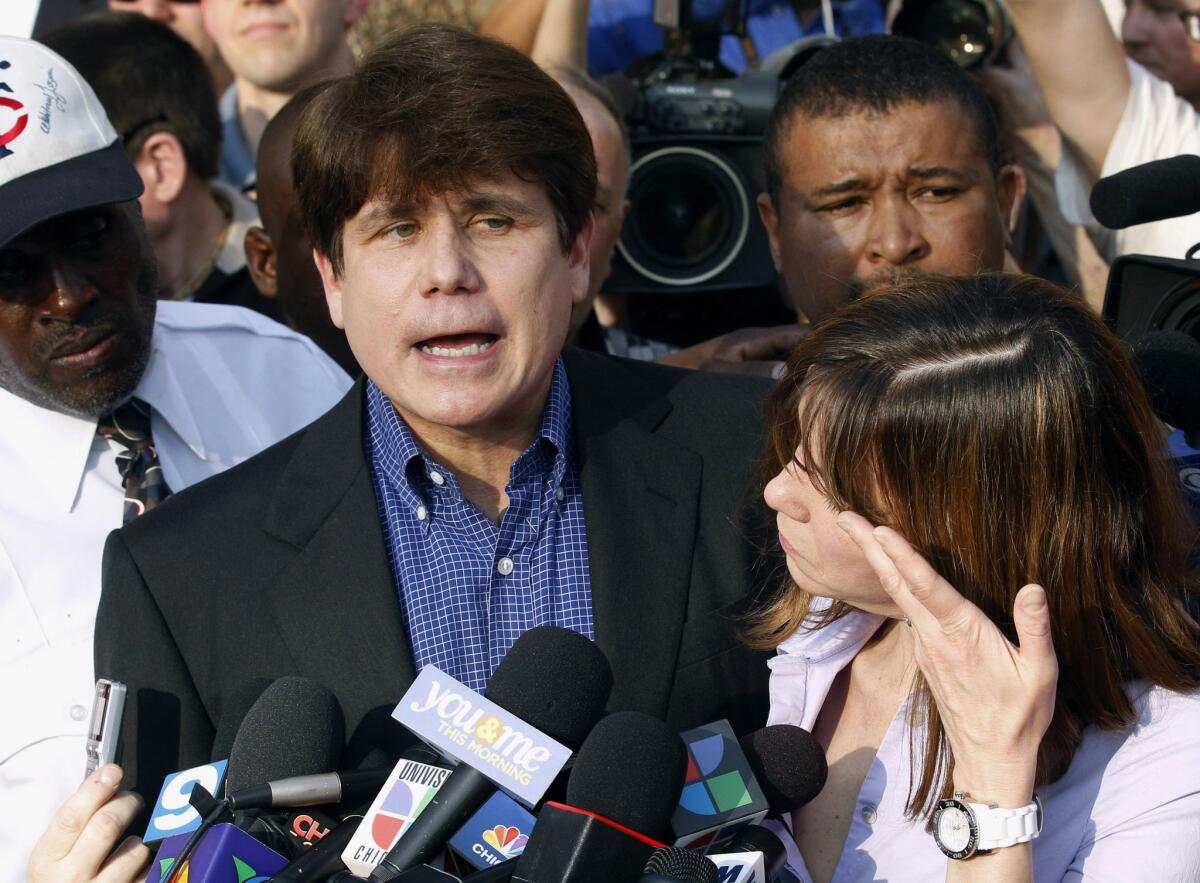
Pardoning Dinesh D’Souza, as President Trump did Thursday, is one thing. D’Souza, a conservative author and commentator, pleaded guilty in 2014 to making illegal campaign contributions. Many conservatives believe he was overpunished because of his politics. Probably a bad idea to pardon him, but whatever.
Pardoning Martha Stewart, as Trump then told reporters he was thinking of doing, would be a troublesome decision too. She was convicted in 2004 of obstructing justice and lying to investigators about a stock sale that some people believed constituted insider trading. Trump has a long-time personal relationship with her. (See below for her video with Donald and Melania making meatball sandwiches.) She long ago served her time, so pardoning her now would be mostly symbolic.
Those are two highly questionable choices, though they hardly rise to the level of some of Trump’s outrages.
But commuting the sentence of Rod Blagojevich, the imprisoned former Democratic governor of Illinois — as Trump suggested Thursday he also might do — would be a mistake of an entirely different magnitude. It would be an outrage, a slap in the face to the justice system. While obviously allowed under the president’s broad pardon power, it would be entirely wrong and inappropriate to send such a misguided message about public corruption.
Perhaps Trump is hoping that Americans don’t remember the seamy, sleazy spectacle of a sitting governor caught on secret recordings trying to use his power in the most self-serving ways imaginable. Ultimately, Blagojevich was convicted of 17 counts of wire fraud, attempted extortion, soliciting bribes and conspiracy.
In plain language, he was accused of trading his official acts as governor in return for hoped-for campaign contributions and jobs. For example, he pressed for a Cabinet post in the Obama administration for himself in exchange for appointing Obama advisor Valerie Jarrett (recently brought back into the limelight thanks to Roseanne Barr’s racist comments) to the U.S. Senate, an idea that went nowhere. Obama and Jarrett did speak to a Blagojevich intermediary about the Senate seat, but no evidence ever surfaced of a quid pro quo. Another example: He extracted a campaign contribution from a racetrack owner in return for signing legislation that would benefit racetracks financially.
Yes, Trump and Blagojevich are acquaintances. Like Stewart, Blagojevich was a contestant on “Celebrity Apprentice.”
Does Rod Blagojevich deserve to be at the top of Trump’s get-out-of-jail-free list? Of course not. Trump (perhaps thinking of one of his own weaknesses) said Thursday that Blagojevich had been convicted for “being stupid and saying things that every other politician, you know that many other politicians say.” That’s a gross understatement of what Blagojevich did.
The criminal justice system is full of miscarriages of justice. It is full of people who didn’t get a fair shake or couldn’t afford a decent lawyer or who are serving long prison sentences for insignificant drug crimes. There are people who got convicted on technicalities or who have redeemed themselves after years in prison and deserve a second chance. It’s hard to see how Blagojevich fits the bill.
No, Samantha Bee’s vulgarity isn’t equivalent to Roseanne Barr’s racism
Conservatives are on the warpath for Samantha Bee’s head after the comedian called Ivanka Trump a “feckless …” on her cable TV show “Full Frontal” last night, using a vulgar reference to the female anatomy that my editors won’t let me repeat here. Bee’s slur, for which she apologized Thursday, was prompted by Trump’s ostensive refusal to stand up to her father’s heartless immigration policies.
We all know what the missing word in Bee’s invective means. It’s obviously crass. Coming from the mouth of a man, it would clearly be considered sexist. A woman calling another woman the same term isn’t great. It coarsens the culture and gives men cover to use a term we shouldn’t.
Just so we’re all clear on that first word though, take a look at the dictionary definition above. As you can clearly see, “feckless” does not mean “white devil.” It is not an animal of any kind. It is not a pejorative way to attack someone’s religion. It means a person lacking strength of character.
This is a fair critique.
Which brings us to this:
Samantha Bee seems to pride herself on having the wokest of late-night shows. She’s also gleefully profane. Sometimes that combination works. In this case, she could have done better.
But “whatabouting” Bee’s sentiments with Roseanne’s recent racist gibberish?
No.
Being foul-mouthed is not the same as a white person calling a black person an ape, or a Jewish Holocaust survivor a Nazi.
It’s sad that I need to explain this, but being racist and spreading anti-Semitic propaganda is worse. Much, much worse.
Why? Because Barr’s comments belittle an entire race of people and help spread paranoid fear of a Jewish global order. Dehumanizing entire groups of people as such puts them in danger of violent reprisal, and helps to justify the stripping of their civil rights.
There is no such inherent threat in Bee’s vulgarity. Rather, equating crudeness with Roseanne’s outlandish tweets normalizes racism and anti-Semitism.
That the White House would issue a full-throated condemnation of Bee while the president offered a dog-whistling defense of Barr speaks volumes.
Liberals have no problem turning on their own when they deserve it. See Kathy Griffin, Al Franken, Aziz Anzari, Lena Dunham … the list goes on.
This is not one of those cases.
Besides, if conservatives genuinely think dropping the C-bomb on TV is a firable offense — and they aren’t just culture war trolling — there’s a big fat target for their ire sitting in the White House.
Want a presidential pardon? Just get yourself a booking on ‘Fox & Friends’
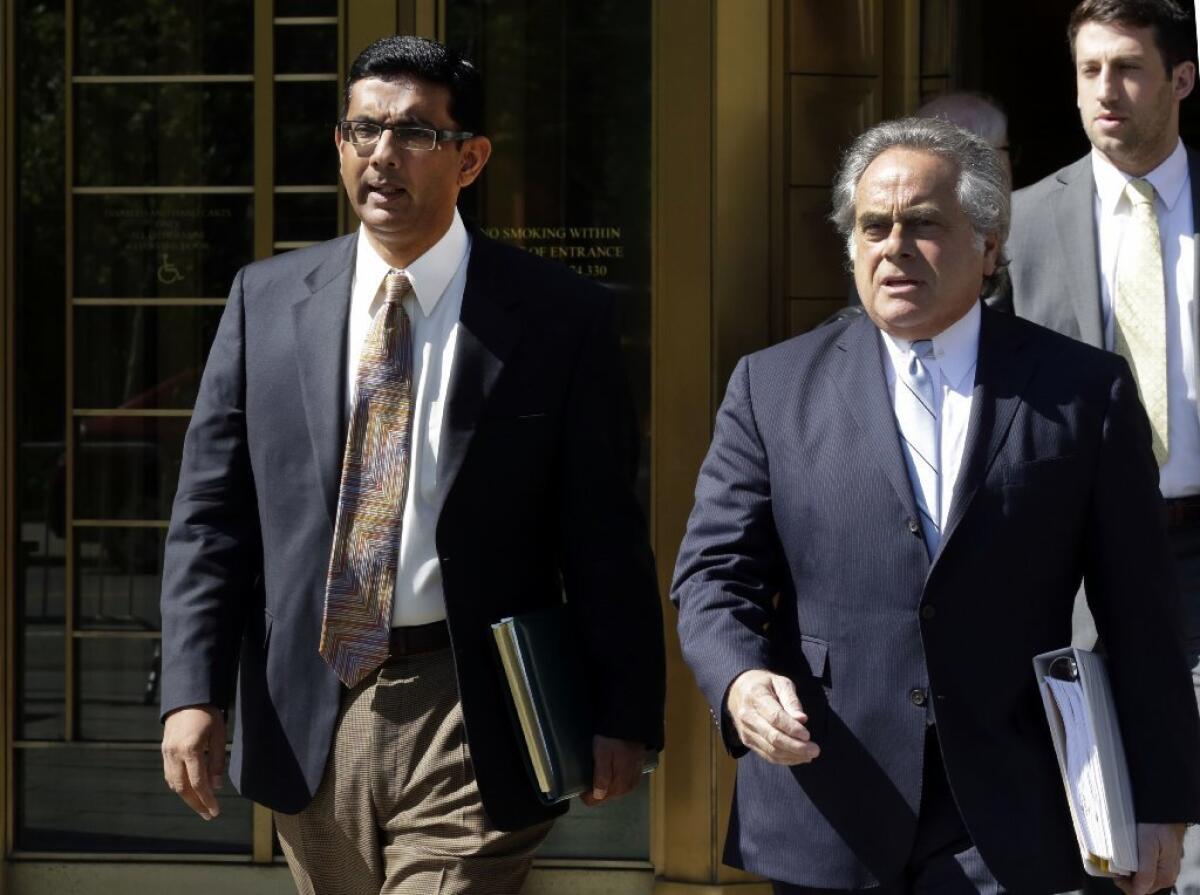
Any number of critical things can be – and have been – said about President Trump’s outrageous pardon of Dinesh D’Souza, the conservative commentator who pleaded guilty in 2014 to making illegal campaign contributions:
The pardon is another example of Trump’s whimsical approach to the exercise of an important presidential power — also evidenced by his comment Thursday that he’s considering clemency for Martha Stewart and former Illinois Gov. Rod Blagojevich.
- It’s another example of Trump’s obsession with undoing actions undertaken during the Obama administration.
- It reflects Trump’s sense of solidarity with right-wing culture warriors. D’Souza, you may recall, once tweeted out a picture of Obama holding a selfie stick with the caption: “YOU CAN TAKE THE BOY OUT OF THE GHETTO... Watch this vulgar man shows his stuff, while America cowers in embarrassment.”
- It’s another signal to Trump associates charged by or in the sights of Special Counsel Robert S. Mueller III that Trump might come to their rescue.
But I was struck when I heard about the pardon by another possibility. I checked to see if D’Souza’s case had been the subject of sympathetic coverage by Fox News, which (to judge by Trump’s tweets) seems to be the president’s primary source of information.
Sure enough, on March 13, 2017, D’Souza appeared on “Fox & Friends,” the broadcast that absorbs a lot of Trump’s so-called executive time. In that interview D’Souza alleged that he was the victim of “a political prosecution conducted by [former U.S. Atty. Preet] Bharara as a henchman for the Obama administration.”
And in an appearance this year, on May 7, he called his prosecution “a political hit.”
In its official explanation of Thursday’s pardon, the White House press office said that “Mr. D’Souza was, in the president’s opinion, a victim of selective prosecution for violations of campaign finance laws.”
The statement didn’t say how Trump acquired that opinion. In an exchange with reporters on Air Force One on Thursday, Trump said: “I read the papers. I see him on television.”
At least the second part of that statement rings true. So if you have a case for clemency, don’t bother with the Office of Pardon Attorney in the Justice Department. Just get yourself a booking on “Fox & Friends.”
Trump just poured ice water on the economy in service of his trade war

Macroeconomic Advisers, a research firm focused on the U.S. economy, reported Wednesday that the U.S. trade deficit in goods was “much narrower than expected,” implying “substantially more” U.S. exports in the second quarter. So it revised its projection for economic growth sharply upward, to a robust 3.6% increase in GDP.
Achieving and sustaining that kind of growth is a key goal for President Trump. So naturally, on Thursday the Trump administration took a dramatic step to disrupt U.S. exports and pour ice water on the economy.
That would be imposing 25% tariffs on steel imports and 10% tariffs on aluminum imports from every major (and minor) metals-producing country around the world except Argentina, Australia and, in the case of steel, South Korea, effective Friday. The move turns a threat and negotiating ploy into an action, which will bring real consequences in the form of retaliatory tariffs on U.S. exports. And it won’t be on U.S. steel and aluminum — it will be on Harley Davidson motorcycles, California almonds, Levi’s and Jack Daniel’s.
On the plus side, if unemployment ticks back up, the Federal Reserve won’t feel as much pressure to raise interest rates.
This isn’t just America First — this is America Alone. Imposing tariffs against a specific country that’s been bending global trade rules can make sense, and there’s a process for doing that under the trade agreements the U.S. has signed (and, ahem, championed). But claiming that imports from around the world are damaging national security? That’s raw protectionism, and previous efforts along those lines simply haven’t worked. See, just for example, President Reagan’s steel and aluminum tariffs and President George W. Bush’s steel tariffs.
And even if the tariffs manage to shift some jobs and production back to the United States, as may be happening with solar panels, they still act as a tax on consumers and a drag on the economy. That’s why the real issue isn’t jobs created within the targeted industry, but net jobs created (or lost) by all sectors affected.
Once you start down the road of protecting a domestic industry for national security reasons, it’s hard to stop. And the message it sends to world leaders is that they should ignore the trading rules the U.S. worked so hard to spread — because we’re ignoring them. That includes NAFTA, by the way, which we are in the middle of renegotiating. Talk about bad faith.
This song came up on my iPod during my morning run. It seems apt.
‘Et tu, Trey?’ Rep. Gowdy trashes Trump’s ‘Spygate’ conspiracy theory
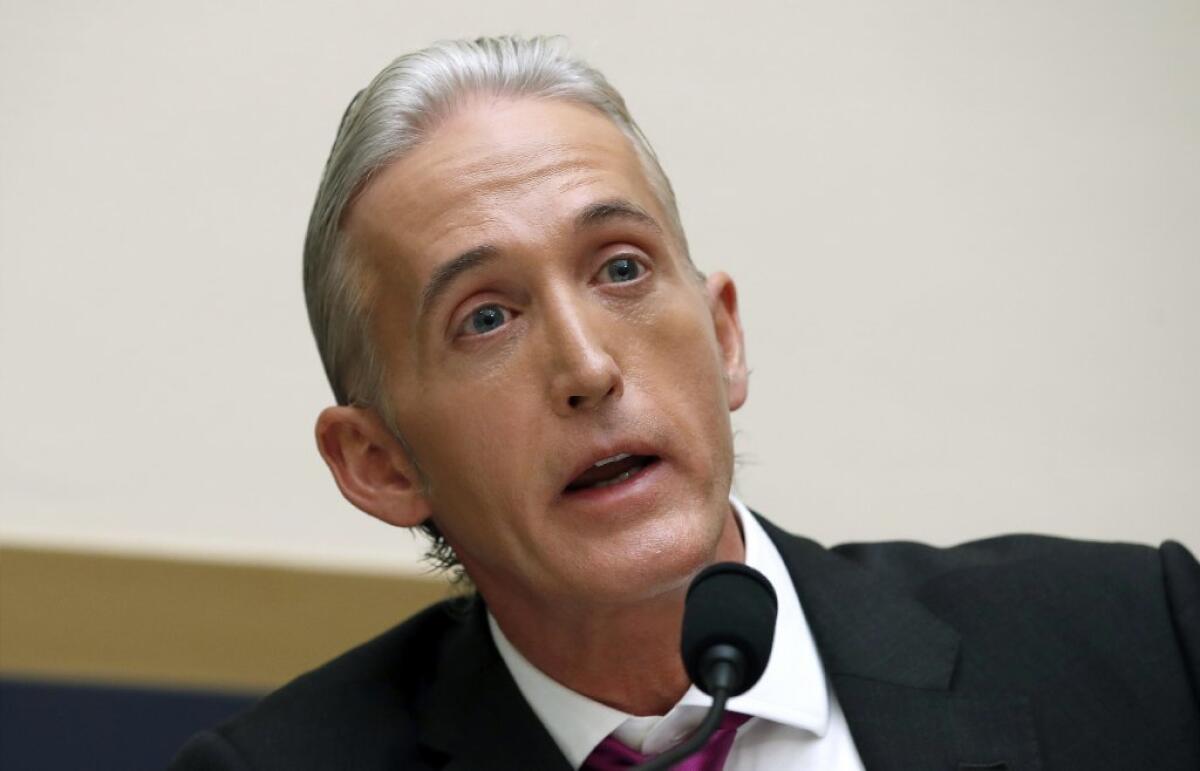
President Trump continues to claim that special counsel Robert S. Mueller III’s investigation of possible collusion between Trump’s campaign and Russia is a “witch hunt.”
But lately the president has varied his Twitter tirades by pressing a new conspiracy theory that he has dubbed Spygate.
That’s the idea that the FBI planted a spy in his 2016 campaign on the orders of the Obama administration. As he tweeted on May 23: “SPYGATE could be one of the biggest political scandals in history!”
Or maybe not.
It seems clear that the FBI enlisted an informant who met with Trump campaign aides suspected of suspicious ties with Russia. But that’s a far cry from a partisan plot by the Obama administration to plant a mole in the Trump campaign, which is the gist of the Spygate theory.
And it’s not just Democrats or members of the “deep state” who recognize that fact. Rep. Trey Gowdy (R-S.C.), the chairman of the House Oversight and Government Reform Committee, suggested in an interview with Fox News (!) on Tuesday that the FBI had acted properly in investigating possible contacts between Russia and members of the Trump campaign.
“I am even more convinced that the FBI did exactly what my fellow citizens would want them to do when they got the information they got and that it has nothing to do with Donald Trump,” Gowdy said.
On Wednesday, Gowdy told CBS News,“I don’t know what the FBI could have done or should have done other than run out a lead that someone loosely connected with the campaign was making assertions about Russia.”
This is doubly significant. First, Gowdy has sterling conservative credentials: He led the special committee that probed the 2012 attacks on a U.S. compound in Benghazi, Libya, in which four Americans were killed. Second, he was present at one of the meetings last week in which the Justice Department briefed congressional leaders about the use of a confidential informant early in the Russia investigation.
In the Fox interview, Gowdy did his best to sound like a team player. He pointed out that Trump had reason to be irked by comments from Democrats giving the impression that Trump was culpable in the Russia investigation. He also noted that Trump himself had indicated at one point that he welcomed an investigation into whether anyone in his campaign colluded with Russia.
But those gestures to the president can’t detract from the sensational bottom line: Gowdy isn’t buying the Spygate narrative. Sad!
Here’s another reason to keep local journalism alive — it helps keep local government spending down

It’s nice to be needed.
A new working paper by three Midwestern economists finds a correlation between the closure of local newspapers and increased long-term borrowing costs for local governments.
The authors, Paul Gao at the University of Notre Dame and Chang Lee and Dermot Murphy at the University of Illinois at Chicago, speculate that government spending increases when there are no journalists, or radically fewer of them, peering over local officials’ shoulders.
“There are already papers that show that there are political consequences, or political outcomes, when local newspapers close,” Lee told CityLab. “But that’s not really a direct impact on local residents. We wanted to show that, if you look at the municipal bond market, you can actually see the financial consequences that have to be borne by local citizens as a result of newspaper closures.”
Without newspapers doing regular reporting on local government meetings, from village boards to county legislatures, it’s harder for voters to know what’s going on.
And less public information leads to lower political engagement. Sure, social media fills a bit of the void, but sharing information is different from reporting out proposed spending measures, zoning changes, budget proposals and other basics of local governance.
Without the reporting, and without investigative journalists exposing the latest shenanigans at city hall, there’s less material to share on social media to spur local residents to question or challenge their government’s decisions. It’s hard to protest something when you don’t know it happened.
As CityLab notes from the study, “204 counties saw a decrease in local coverage to two or fewer daily newspapers” between 1996 and 2015. And the Pew Research Center reported last year that total newspaper employment dropped from 68,610 in 2007 to 41,400 in 2015.
That’s a lot of lost watchdogs.
UPDATE June 1: An erroneous reference to another study by some of the same researchers has been removed.
Roseanne is what happens when you feed the trolls

“I think that nonconformity is part of the American DNA. And in today’s culture, the nonconformists are conservatives.”
That quote comes from White House senior advisor Stephen Miller — one of President Trump’s key confidants — in a McKay Coppins profile in the Atlantic. I highly suggest popping over there now if you haven’t read it yet. It’s beyond instructive.
Miller, a 32-year-old right-wing activist from liberal Santa Monica, is portrayed as a vessel of rage and mockery with few definitive beliefs — other than a vague desire to punish “criminals” and to keep immigrants out of the country.
What Miller really craves above all else are “liberal tears.”
Like his intellectual godparents Rush Limbaugh and Anne Coulter, Miller doesn’t seem to consider policy a way to meaningfully shape the country and its institutions. It’s a way to provoke snowflakes and become famous in the process.
Miller has ridden this strategy all the way to the White House.
He’s not the only right-wing agitator to employ this tactic. Trolling has become a successful career path. Andrew Breitbart, Alex Jones, Tomi Lahren and Milo Yiannopoulos all trolled their way to stardom. Even a relative incompetent like James O’Keefe is a household name thanks to his lib-baiting.
And, of course, there’s the president himself, who Miller admires above all else (says Coppins) for his skills as a “world-class troll.”
What sets Miller apart — and his boss too, of course — is that his trolling transcends the bounds of the conservative media-sphere. Trolling isn’t just a way to generate wealth and fame, it’s a means to achieve political power. And here’s the crazy thing: With that power secured, Miller is using it to troll even harder. Baiting liberal snowflakes is a guiding principle of this White House.
With values and policy goals completely stripped from the equation, the natural extension of this ideology is naked racism — because, yes, few things are more upsetting to liberals than overt bigotry and policies that encode it into law.
The lessons of trolling as virtue have filtered down to the broader culture.
Which brings us to Roseanne Barr and her repugnant tweets.
Barr has long been a troll. Middle American values used to be her target. When that grew stale, she followed the conservative troll train.
And it worked!
Barr likened Susan Rice to an ape in 2013. That didn’t stop her from getting her ABC deal. Far more likely, her ability to troll and drum up controversy is what landed her the job in the first place. Trump didn’t brand Barr “one of us” for her nuanced portrayal of white economic insecurity. He is enamored of her very real ability to irritate liberals.
The cancellation of the “Roseanne” reboot — despite its tremendous success — would appear to be one of the few instances in recent memory where conservative trolling hasn’t been rewarded.
Except that isn’t true. Barr’s racism isn’t what’s being punished here. Yes, the actress has lost the prestige of starring on a hit show, but Fox News’ framing of her firing tells you all you need to know about how her departure will be viewed in right-wing circles.
Notice how Barr isn’t offensive, she offended. This is a virtue among right-wing populists. Barr will probably be a Fox News regular within the month.
No, what died alongside the “Roseanne” reboot was an earnest effort to bridge the rift that trolling has inflicted on our society.
The show — with the backing of two prominent LGBTQ women, Sara Gilbert and Wanda Sykes — was an attempt to take Barr’s flamethrowing culture warrior off Twitter or the Yahoo comment section and put her face-to-face in the real world with the targets of culture-warrior scorn. It was an attempt to force the troll out of its cave (or its high perch) and back into reality.
This was a noble goal. And it was doomed to fail from the start.
Trolls are taking over. There is no redeeming them. Our only hope is not to feed them.
The Catholic school valedictorian who wouldn’t be censored

Last week I attended the banquet of the speech and debate society of my old high school in Pittsburgh, where my friend and freshman-year debate partner Jack Kennedy was honored for his service to the society, as competitor and later coach.
The next night Jack and his wife Kasey hosted our gang of Baby Boomer debate nerds – the men graduates of Central Catholic High School, the women alumnae of the Catholic girls’ schools we competed against – and the reminiscences flowed.
One topic was the Central yearbook I co-edited, which was notorious for its irreverent humor. For example, a photo of a Christian Brother who covered his bulletin board with devotional portraits of popes was captioned: “Brother Gregorian pauses near his papal pinups.”
It wasn’t just the yearbook in which I was allowed to test the limits: In my column in the school newspaper I satirized members of the teaching staff — one of whom confronted me in the hallway the day after the paper came out. It was a painful experience and good preparation for dealing with politicians who would complain about my work as a professional journalist.
I thought of those schoolboy scandals when I read this week about Christian Bales. Not the actor who played Batman, but the valedictorian at Holy Cross High School in Covington, Ky.
Christian was prevented from delivering his valedictory address at his commencement last Friday because, according to the New York Times, the principal told him that the local Catholic diocese found it too angry and confrontational.
In a statement issued to a Cincinnati television station, the Diocese of Covington said that Christian’s speech and another submitted by Katherine Frantz, the student body president, contained “elements that were political and inconsistent with the teaching of the Catholic Church.” Oh, and the kids also supposedly missed a deadline.
I’ve read Christian’s speech — you can too, here — and I can’t understand the diocese’s objections. Some people my age might find the speech naive. (“Sometimes the wisest are the youngest in our lives, the ones who haven’t yet been desensitized to the atrocities of our world.”) But the political content was innocuous and the tone was respectful throughout, more respectful than some of the things I wrote in our school paper.
Nor did the speech conflict with church teachings. Indeed, it included a shout-out to students who “went on the March for Life to protect the lives of the unborn.” That should have been music to episcopal ears.
(The New York Times noted that Christian “is gay and describes himself as gender nonconforming,” but his speech made no mention of his sexuality or gender expression. And even if it had, that wouldn’t necessarily have been a challenge to church teaching. Maybe the Diocese of Covington should look up this document.)
Whatever the explanation for the school’s skittishness, Christian didn’t get to give his speech at the graduation ceremony. But he was able to deliver his remarks after he left the building — with the aid of a bullhorn supplied by his father. That twist in the tale made national news.
The result was that Christian’s speech was not only heard by his classmates and their parents but read around the world. He also was interviewed on CNN. By censoring him, the diocese created a celebrity.
But stifling Christian wasn’t just a bad public-relations move. One of the things I most appreciated about my high school was that, for all its emphasis on tradition, it was able to accommodate dissenters, eccentrics and smart-alecks like me, with the result (I like to think) that everyone’s education was enhanced. If Holy Cross High had been similarly catholic, it would have allowed Christian to deliver his valedictory address inside the hall.
Why ABC’s decision to cancel ‘Roseanne’ might be good for the GOP

A week after its season finale, “Roseanne” went out with a bang. And oddly enough, Republicans ought to be thankful.
As my colleague Carla Hall noted, ABC canceled the show Tuesday after star Roseanne Barr tweeted that a former top advisor to President Obama was the love child of talking apes and the Muslim Brotherhood. That was beyond the pale, even for a show whose debut attracted 18 million viewers.
The revival of a hit show from the 1990s, “Roseanne” had been seen in some quarters as a triumph for President Trump and his followers. A personal friend of Trump’s, Barr played the matriarch of a blue-collar Midwestern family who not just supported Trump, but channeled some of his rougher edges. In fact, after the show’s blockbuster premier, Trump himself tweeted, “[I]t was about us!”
It’s just a matter of time before fans of the show blast ABC making a “politically correct” decision to cancel the show — as if Barr’s tweet about Valerie Jarrett were just edgy and not racist and Islamophobic.
But in a way, it was just a matter of time before Barr uttered something this bad. She’s long used Twitter to recirculate bizarre conspiracy theories from right-wing nut-jobs. Who knows if she believed the crap she was tweeting? She’s made a career out of provoking people, and Twitter was just another vehicle.
That’s not a star Republicans want to hitch themselves to. Barr’s views of politics and government are toxic at a time when Trump and Republicans are the ones in charge. That sort of negativity might work for extremists (on both sides), but most people want someone and something credible to believe in, not just someone and something to hate.
Granted, “Roseanne” didn’t treat Trump supporters like caricatures, as Hollywood is wont to do. But as Barr showed on Twitter on Tuesday -- and on multiple previous occasions — she is not Roseanne Conner. The show elevated her views out of the obscurity where they belong. The last thing Republicans should want is for Barr to be seen by millions of American voters as the face of their party.
At least Roseanne feigned an apology. Trump never does
Of course ABC had to cancel the reboot of the “Roseanne” show (ridiculously popular as it was). What star Roseanne Barr tweeted about Valerie Jarrett, a longtime aide to former President Obama, was repugnantly racist and disgusting. It’s mind-boggling that anyone with a mainstream media platform (as opposed to some dank corner of the Darknet) would be spewing this offensive stuff. Oh, wait — I forgot President Trump.
OK, his Twitter oeuvre may walk right up to the edge of old-school animalistic racism and not go over it, as Barr did. She tweeted, “muslim brotherhood & planet of the apes had a baby=vj,” referring to Jarrett, who is black and not Muslim.
Intimating that black people look like apes or monkeys has been part of racist imagery since the 19th century. That it still persists today is disturbing. Just as disturbing, we live in a world where there are few consequences for public figures saying anything vicious, racist, sexist or xenophobic. At least Barr feigned an apology. Trump never does.
This isn’t the first time Barr disparaged the looks of a female Obama aide. In 2013, she tweeted that Obama’s then-national security advisor, Susan Rice, was “a man with big swinging ape-balls.”
Now, Barr says, “I apologize to Valerie Jarrett and to all Americans. I am truly sorry for making a bad joke about her politics and her looks. I should have known better. Forgive me-my joke was in bad taste.”
Yeah, no. That apology wasn’t enough for her employer, ABC, and it shouldn’t be enough for anyone else. There should be consequences to offensive behavior.
Voters like high-speed rail, if they don’t have to pay for it
California voters, like their leaders, want to have it both ways on high-speed rail.
A new USC Dornsife/Los Angeles Times poll of 835 voters found that respondents were pretty equally divided over the high-speed rail line, with 48% expressing at least some support and 43% opposed. Looking that those numbers alone, you might think the public’s ardor for the project hadn’t dimmed all that much; voters approved a ballot measure authorizing the project in 2008 by a margin of only 53% to 47%.
But in the ensuing decade, the cost of the route has doubled to an estimated $77 billion, with state taxpayers on the hook for a considerably larger share. So the pollsters went on to ask a second question: Should the state stop working on the project, in light of the mushrooming cost? Almost half of the respondents said yes, stop the work, while only 31% said keep moving forward.
Perhaps they’re hoping, like former L.A. mayor and current gubernatorial candidate Antonio Villaraigosa (D-Herbalife), for an infusion of private investment to finish the construction. To his everlasting credit, Villaraigosa was the only major candidate from either party willing to discuss his views about the project with The Times’ Ralph Vartabedian, who’s been chronicling the cost overruns and engineering missteps for years.
The two top Republicans, John Cox and Travis Allen, have said on the campaign trail that they would kill the project. Doing so would almost certainly force the state to repay billions of dollars in federal aid already received, but Cox and Allen haven’t talked about that. In other words, they’re arguing for an easy way out that isn’t actually easy.
Villaraigosa’s leading Democratic rivals, Lt. Gov. Gavin Newsom and state Treasurer John Chiang, have offered conditional support for the bullet train during the campaign. Newsom appears to have been on both sides of the issue over the last few years, and it’s hard to tell exactly what he wants to do now, other than finding more private dollars for the project. And Chiang has said he’s a backer of the project, but has said the state needs to figure out how to … bring in more private financing.
Here’s an exchange that typifies Chiang’s position on so many issues. Taking questions from KPCC listeners earlier this month, Chiang was asked if he still supported the high-speed rail project. He replied:
“I support modes of transportation including high-speed rail. I think it’s important that we find private funding for high-speed rail. This is a state of 39-plus million people. We need all types of opportunities, alternative types of transportation.”
That’s like being asked if you like baseball and saying you like all sports, and we need to have lots of different ones to play. The smart follow up was, is it realistic to think private investors will close the project’s massive funding gap? To which he replied, “We’re going to have to check and make it work”
This is a gut check, really. The project has always been peddled with unrealistic projections for construction and operating costs. Private investors can see that as well as anyone, so it seems absurd to count on them, deus ex machina-like, to swoop in with billions of dollars in search of modest returns.
Yet knowing that, some advocates — including my editorial board — have backed the high-speed rail project because they viewed it as an important and potentially transformative investment in technology. It’s the kind of forward-looking, ambitious, optimistic endeavor that helped make California what it is today.
So candidates, make that damn-the-costs, full-speed-ahead argument. Or explain why it’s better to spend a few billion dollars paying back the feds than continuing forward with this project. Enough with the straddles.Take a stand.
USC’s Nikias boosted rankings and fundraising, but at what price?

It would be a mistake to assume that the USC scandal was simply a matter of leaders at one university going rogue. In fact, it would be dangerous to think that. The departure of university President C.L. Max Nikias satisfies the call for accountability over accusations involving two USC doctors, but it does not begin to resolve a deeper affliction at the nation’s colleges and universities: the unending pressure to raise the institutions’ rankings and bring in more money.
The various college rankings are typically based heavily on fairly empty criteria. US News and World Report, which produces the best known and most closely watched rankings, heavily counts a school’s reputation among other institutions’ faculty and officials. And no matter how extraneous and silly we might find them, the rankings are inextricably linked to fundraising. Raising the rankings means happier alumni and more applicants; it means drawing more star professors, which in turn means more grant money, higher rankings, more applicants. It’s part of why colleges send ridiculous numbers of marketing mailers to high school juniors and seniors. A higher number of applicants means a lower acceptance rate, which for some reason is considered a positive sign of a school’s reputation.
Inevitably, reputation and money are at war with integrity. Things are going to go wrong at campuses, as they tend to do at large organizations. But being straightforward about a college scandal could mean sacrificing reputation, which means sacrificing rankings and applications and – you get it. That’s a big part of why colleges were routinely under-reporting cases of sexual assault and brushing accusations aside. As long as they could be kept under wraps, they couldn’t harm a school’s reputation.
When Nikias came to visit The Times editorial board soon after being named to the post, he laid out his goals quite clearly: higher rankings and better fundraising -- and he certainly got the job done on those counts. Linda Katehi said similar things after becoming chancellor at UC Davis. She’s the one who resigned after a UC investigation found that she had been involved in trying to scrub online mentions of an incident in which students were pepper-sprayed. Can’t take any chances with a school’s reputation.
It’s hard to fault colleges for caring about money; many of those that have tried to ignore the rankings and that haven’t marketed heavily to students are finding themselves in financial peril.
Surveys of college presidents show that they generally spend more time on fundraising than any other single aspect of their jobs. And maybe there’s no way around that, though we need to look for better ways of funding our colleges and students’ educations.
But there’s an inherent conflict when the person in charge of raising money and safeguarding a school’s rankings and reputation is also the person in charge of examining students’ complaints and deciding whether to take action, and how open to be with both students and the public. Perhaps the model of one school, one leader is outdated and leadership should be split, with the person in charge of making sure that students are heard having equal but separate powers as the fundraiser-in-chief.
Over 600 kids at the U.S. border were taken from their parents, who were jailed

Over the span of two weeks earlier this month, federal agents separated more then 600 children from their parents at the border with Mexico, jailing the adults to await criminal prosecution for crossing the border without permission and sending the children off under the care of the Department of Health and Human Services.
So much for sending “your tired, your poor, your huddled masses yearning to breathe free,” as it says on the Statue of Liberty.
President Trump has upended much in his first 16 months in office, attacking state health insurance exchanges and federal environmental regulations, undermining efforts to reduce carbon emissions, seeking to open previously off-limits stretches of public lands to fossil fuel production, packing the judiciary with hard-right judges — not to mention degrading the nation’s reputation abroad.
But nothing is as cold-hearted and counter-productive as his approach to enforcing immigration laws. It’s not a problem he can arrest his way out of, though he’s bound and determined to try. The American Civil Liberties Union has sued over the practice of separating families at the border, though by the time that gets through the process, there will be much damage done to the children themselves, many if not most of whom came here seeking protection from violence in Central America.
There’s also a strong argument that the policy violates international law and norms. But for an administration that heedlessly forges ahead until a court orders it to stop, well, laws don’t bear much on its policy decisions.
More fundamentally, the heartlessness of this practice is stunning, and it’s a mark of how disastrous this president has been on what constitutes acceptable behavior that there is little public uproar about it.
Jailing the desperate and separating children from parents without evidence that the children have been endangered is a revolting and inhumane practice.
But under Trump, that’s what America has become: heartless.
No matter how inarticulate, Trump’s ‘America first’ brand of nationalism comes through loud and clear

A persistent problem for the media — and for the public, for that matter — in listening to President Trump is figuring out what exactly he means, and whether he really means it. That was on clear display with his recent comments about the “animals” he claimed his administration has been kicking out of the country (deportations of immigrants who crossed the border illegally are down compared with the Obama administration, while arrests are up — as is the backlog in immigration courts).
Trump insisted later that he was referring specifically to MS-13 gang members, yet as I wrote the other day, the original statement within the context of the exchange with with local California officials reads differently. The person speaking before him mentioned MS-13, the violent international gang that began in Los Angeles, but Trump’s comments reflected a broader target — immigrants in general.
As Greg Sargent of the Washington Post points out, that confusion is what Trump seeks. His inarticulateness is like broadcasting over different channels at once. His nationalist base hears one message and cheers while still leaving Trump able, because of his unclear language, to later try to redefine what it was he said.
“Whether he’s talking about Latino immigrants or kneeling African American football players, President Trump has a consistent way of disguising his racism, bigotry, and dehumanization while dog-whistling it out to those voters who he believes may thrill to it,” Sargent wrote.
“The game is always that Trump fluidly conflates one set of individuals who constitute a less sympathetic target — one that he ostensibly goes after, and one that is harder to defend — with the broader group he’s actually trying to belittle or dehumanize but cannot do so overtly.”
Trump’s ostensible targeting of MS-13 members is really just a tactic to smear Latino immigrants in general. This is a classic case of having to focus less on what he says, and more on what his administration does — from the Muslim ban to the separation of immigrant families to reducing refugee resettlements to proposals to reduce overall immigration.
There’s little room for confusion there. “America first.”
After the death of an Arizona pedestrian, Uber heads back to the land of rules and regulations
Uber is shutting down its self-driving car-testing in Arizona, the company announced Wednesday. The decision comes after one of Uber’s autonomous vehicles struck and killed a pedestrian in Tempe in March.
Instead, Uber says it will test its autonomous cars in San Francisco and Pittsburgh, where company engineers are based.
It’s worth remembering that Uber left San Francisco in a huff at the end of 2016 because California had the gall to require Uber to get a permit to operate its self-driving cars on public streets. When Uber refused, the California Department of Motor Vehicles ordered the company to take the cars off the road.
At the time, Uber said there were other “pro-technology” cities and states that would offer their roads without the rules and requirements that could slow the development of driverless cars. The company then loaded its self-driving Volvo SUVs onto trucks and headed for Arizona.
“While California puts the brakes on innovation and change with more bureaucracy and more regulation, Arizona is paving the way for new technology and new businesses,” Arizona Gov. Doug Ducey crowed.
The bureaucracy and regulation derided by Ducey included a requirement that Uber submit public reports detailing any crashes the vehicles have or instances when the human operator has to take control from the autonomous system.
Turns out, Uber was having performance issues with its driverless cars in Arizona. Uber’s human operators had to intervene far more frequently than the drivers of competing autonomous car projects, according to a report in the New York Times, which obtained company documents.
California collects such data and makes it public. Arizona does not.
On Thursday, the National Transportation Safety Board released its preliminary report on the crash. It found the cameras and sensors installed in the Volvo detected the pedestrian about six second before hitting her, but the automatic braking system had been disabled and there was no alert to warn the operator to hit the brakes. The report didn’t determine fault, and the investigation continues.
Could public reporting and more government oversight have prevented the fatal crash? It’s too early to say. But it’s crucial to answer this question soon because the Trump administration and Congress are pursuing a more hands-off approach to regulating the testing and rollout of driverless cars. And they are proposing to bar California and other states from imposing their own regulations for autonomous cars before federal safety standards are in place. That would create “a safety gap,” one expert told the San Francisco Chronicle.
Driverless cars ultimately will be safer than human-driven cars. But the fact is, the public will not accept autonomous cars unless they feel safer. Regulation and public reporting are essential to ensure that an important, potentially transformative technology is rolled out in a safe and transparent fashion.
That was Uber’s mistake, and now the company is feeling the backlash even from “pro-technology” jurisdictions. Ducey ordered the company to keep its driverless cars off the road until the investigation is complete. The mayor of Pittsburgh, who was a big booster for testing Uber’s autonomous cars in the city, said he would not welcome the company back until the investigation is complete and Uber agrees to a set of new conditions, including a 25-mph speed limit for self-driving cars.
California, meanwhile, says Uber can reapply for a permit to test its vehicles in the state, but only after the company addresses any issues uncovered in the investigation into the Arizona crash.
The U.S.-North Korea summit falls victim to bipolar rhetoric
Seriously, is anyone really shocked that the much-ballyhooed Summit-of-the-Century between President Trump and North Korean President Kim Jong Un has been canceled?
From the start, this highly unusual meeting of the minds was undertaken in an unorthodox way, to put it mildly. Negotiated often by tweet and news communique rather than through established diplomatic channels, it began with threats and name-calling. Trump sought laughs from his base by dismissing the North Korean leader as “Little Rocket Man,” and Kim responded by calling Trump a “dotard.” When Kim referred to a Trump speech as “reckless remarks by an old lunatic,” Trump asked “Why would Kim Jong Un insult me by calling me “old,’ when I would NEVER call him short and fat?”
But while the schoolboy insults were bandied to the amusement of the world, there were also real threats of serious violence by players who at least in theory had the power to follow through if they chose to. Trump said ominously that “military solutions are now fully in place, locked and loaded.” He threatened to unleash “fire, fury and frankly power, the likes of which this world has never seen before.” In one speech he vowed to “totally destroy North Korea.” Kim made equally rash threats. “The United States should know that the button for nuclear war is on my table,” he said. “The entire area of the U.S. mainland is within our nuclear strike range.”
Then, suddenly, the mood veered. Out of nowhere there was a summit on the table, and the two irresponsible players were unlikely besties. “There is a good chance that Kim Jong Un will do what is right for his people and for humanity,” tweeted a born-again Trump. He said he believed North Korea would honor its commitment not to conduct a missile test. This was such a “very special moment for World Peace,” that the U.S. issued an official commemorative coin with a picture on it of Trump and Kim face to face. Three American hostages were released and Trump reveled in the ludicrously premature suggestion that deserved to win a Nobel Peace Prize.
And then things turned ugly again over the past week, with Trump administration officials talking about North Korea potentially following Libya into ruins and regime change, and a top North Korean diplomat saying, “To borrow their words, we can also make the U.S. taste an appalling tragedy it has neither experienced nor even imagined up to now.” And here we are.
Veering back and forth between public taunts and flattery — between belligerence and brotherly love — is not the way smart diplomacy is done. Of course there’s an element of carrot and stick in any negotiation, and some posturing is often part of the game as well. But over time, the pursuit of meaningful foreign policy achievements requires substantially more. It requires an understanding of your adversary and your adversary’s interests. It requires the setting of short-term and long-term goals. It requires a clear-eyed assessment of costs and benefits of different options. It requires consistency, stability, authority and a long-term strategy.
Did the Trump administration have a sophisticated plan or a long-term strategy? There was no indication of one. At the editorial page, we vacillated between cautious optimism and rational skepticism about the idea of a meeting between the two hot-headed leaders. Diplomacy, after all, is almost always worth trying — especially when the alternative is military action. But it seemed highly possible that Trump’s great expectations would go unfulfilled.
The collapse of the summit — at least for the moment — is a disappointment but hardly a surprise.
Did the North Korea talks just collapse because Trump and Kim couldn’t agree on whose idea it was to meet?

Here’s a horrible thought: The United States and North Korea might abandon efforts to pursue a nuclear deal because they can’t agree on whose idea it was to meet.
You’ve no doubt heard by now that President Trump called off the scheduled June 12 summit in Singapore with Kim Jong Un because of the inflammatory rhetoric coming out of top North Korean officials in recent days. (Insert your potentially offensive pot-kettle-black joke here.) But in the back-and-forth between the two nations lies another, far more petty dispute.
On Monday, Vice President Pence repeated on Fox News the Trump administration line that North Korea would end up like Libya (i.e., gutted) if it didn’t reach a deal to abandon its nuclear ambitions. He added:
“[W]hen Kim Jong Un through the South Koreans reached out and said he would suspend his nuclear testing, suspend his ballistic testing and be willing to achieve complete denuclearization through talks in exchange for a meeting with President Trump, this president readily said yes. They asked for the meeting ...”
North Korea’s point person on the U.S. talks, Choe Son Hui, issued a statement a few days later blasting Pence for the Libyan analogy. She went on:
“It is the U.S. who has asked for dialogue, but now it is misleading the public opinion as if we have invited them to sit with us. I only wonder what is the ulterior motive behind its move and what is it the U.S. has calculated to gain from that. We will neither beg the U.S. for dialogue nor take the trouble to persuade them if they do not want to sit together with us.”
And then she took the gloves off: “Whether the U.S. will meet us at a meeting room or encounter us at nuclear-to-nuclear showdown is entirely dependent upon the decision and behavior of the United States.”
So naturally, when President Trump responded with his own letter to Kim, he couldn’t let Choe have the last word on who reached out to whom.
“We were informed that the meeting was requested by North Korea, but that to us is totally irrelevant,” Trump wrote. But he went on to indicate that the meeting will only happen if Kim asks for it: “If you change your mind having to do with this most important summit, please do not hesitate to call me or write.” Or, presumably, send a direct message on Twitter to @realDonaldTrump.
If Trump really believes it’s totally irrelevant who instigates the next meeting, he should keep his team ready, hone his talking points and wait for an opportunity to extend the olive branch again. The North Koreans have shown so much bad faith over the years, there may not be much point in a summit meeting. But there’s not even the chance for progress if the two sides won’t meet.
Live from D.C. (but not the Supreme Court), it’s Merrick Garland!
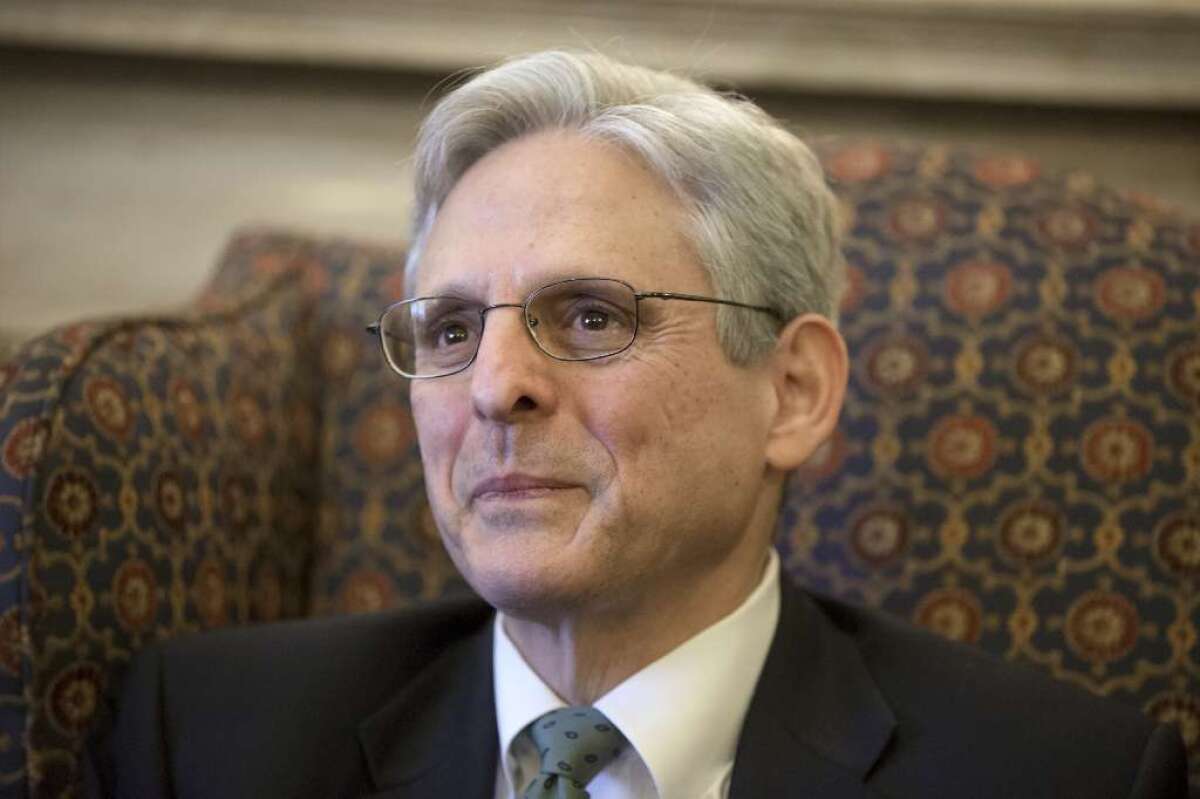
Thanks to Senate Republicans, Merrick Garland never made it to the Supreme Court. But the federal appeals court judge who was nominated by former President Obama to succeed the late Justice Antonin Scalia might still exert some influence on the nation’s highest tribunal — if only by setting an example.
On Wednesday, in his role as chief judge of the U.S. Court of Appeals for the District of Columbia Circuit, Garland announced that the appeals court — sometimes called the second most important court in the nation — would stream the oral arguments before its judges live online. (The only exceptions will be arguments in which classified or sealed matters must be discussed.) Previously, the court had livestreamed audio of particular arguments on request.
Garland called the new policy “an important additional step in bringing transparency to our proceedings.”
Which makes the policy of the court Garland hoped to join — opaque? Because, far from streaming audio of its arguments live, the Supreme Court doesn’t even make recordings available the same day, except for rare high-profile cases. Instead, audio from arguments on Monday, Tuesday and Wednesday when the court is in session isn’t posted online until Friday.
Perhaps the more transparent policy at the neighboring D.C. Circuit might nudge the justices — including Neil Gorsuch, who occupies the seat for which Garland was nominated — to follow suit, or at least post audio a few hours after an argument has ended.
If the Supreme Court is really looking for a model, though, it should consider the precedent of the San Francisco-based U.S. 9th Circuit Court of Appeals. That court livestreams not only audio but also video of its oral arguments. On the West Coast, justice unseen is justice denied.
Tomi Lahren earned every drop of water splashed in her face. Now please never do this again
Over the weekend, race-baiting provocateur and Fox News contributor Tomi Lahren had a glass of water thrown in her face at a Minneapolis bar. Video of the incident surfaced soon after and has been spreading across Twitter in a tsunami of schadenfreude ever since.
Viscerally satisfying as Lahren’s comeuppance may seem (this is, after all, someone who once likened Black Lives Matter to the KKK) let’s shut this trend down pronto, before it spreads. And not because of decency or the 1st Amendment or open-and-honest expression or anything like that.
This is America. Let’s get real: We know exactly where this is going to take us. The Obamas, or Oprah, or some other figurehead of grace, dignity and earnest expression will be out for a quiet meal and a knuckledragger will throw something far worse than water in their direction. Half of the internet (our president likely among them) will flock to Twitter screaming: “Well whatabout Tomi!”
Give it another decade and we’ll be flinging feces at one another like apes.
Here’s the tricky part: Our public discourse is noxious and broken, largely because less-than-honest brokers like Lahren profit from making it so. I do not believe for a second that Lahren actually believes Black Lives Matter is like the KKK. Nor do I believe that Alex Jones or Anne Coulter or possibly even Sean Hannity believe half the bile they spout. They foment racism and defile basic human decency because it makes them money — lots of it.
Realistically speaking, words are not enough to counter this phenomenon. These are master trolls. Debating them — giving their viewpoints even the slightest earnest critical consideration — only makes them stronger. Tweets, Instagram memes, righteous rants on MSNBC — those are the pillars of their success.
A splash of water to the face, on the other hand, is a wake-up call. Words have consequences.
Those groups of people I casually marginalize from the comfort of my home or television studio? I may one day have to step outside my media bubble and confront them in the physical world. Not for the benefit of an audience, but on a human level.
Being awakened to that possibility has a far better chance of impacting Lahren’s social conscious than a Rachel Maddow rant or your sick Twitter burn.
Tomi Lahren earned every drop of water splashed maliciously in her direction. She deserves public shame. That said, physically confronting her is an invitation to do the same to those who do attempt to earnestly further the public discourse. The freedom to hear decent and intellectually curious people express their public opinions without mob interruption is one of the few aspects of American life that hasn’t gone down the garbage can. Let’s try to keep it that way as long as we can.
The ruling is in: Trump can’t block his critics on Twitter

A New York federal judge — or, as President Trump may be tempted to call her, a “so-called judge” — ruled Wednesday that Trump is violating the constitutional rights of people he blocks on Twitter for criticizing him.
U.S. District Court Judge Naomi Reice Buchwald took a different view of the 1st Amendment issue than the Los Angeles Times editorial board, which expressed skepticism last year that the tweeter in chief’s stream of pronouncements (done under the moniker @realDonaldTrump) was a public forum.
“Twitter is a private company, not a public utility,” we argued. “It should have a 1st Amendment right to set its own rules.”
Judge Buchwald saw the issue differently. Her opinion (available here) is worth reading for the interesting way it tries to adapt traditional free-speech legal doctrines to the novel environment of Twitter.
Her key finding is that, although Twitter is a private company and Trump established his account before he took office, Trump as president and Daniel Scavino, his social-media advisor, “nonetheless exercise control over various aspects of the @realDonaldTrump account.”
Therefore the account qualifies as a “designated public forum” in which other users have a right to interact with Trump by viewing his tweets, replying to them or using the @realDonaldTrump webpage to view the comment threads associated with the president’s tweets “while they are logged in to their verified accounts.”
(The judge acknowledged that there are workarounds by which blocked users can see the president’s tweets, but noted that the plaintiffs consider them “burdensome.”)
The judge declined to issue an order requiring Trump to unblock the plaintiffs, expressing confidence that “no government official — including the president — is above the law and all government officials are presumed to follow the law as has been declared.”
To which those who have followed Trump on Twitter might reply: “#StayTuned.”
Boo hoo. The NFL’s poor little owners can’t stand the fight for racial justice hurting the bottom line

I don’t watch football. I think it’s dumb, violent and boring. But the protest policy cooked up by the NFL owners to stop players from taking a knee before the game makes me want to start watching football just so I can stop in protest.
The policy says that players who are on the field must stand during the pregame national anthem (they can do whatever they like if they’re in the locker room). If they violate this rule, they can be fined. The old policy only suggested they stand for the anthem but required players to be on the sidelines.
The owners have a legal right to tell their employees how to conduct themselves on the job. But this self-interested policy seems clearly about one thing only: protecting their profits. After 49ers quarterback Colin Kaepernick started kneeling before games to protest the treatment of African Americans in the United States, the ensuing controversy blew up and viewership dropped. Was the ratings slump related to the player protests, or was it just the product of an ongoing trend? Who knows?
But even if it was a consequence of the player protests (and President Trump’s hyperventilating about them), a big boo hoo. I have a hard time feeling sorry for a small group of wealthy (and mostly white) owners more worried about their profits than people dying. An overwhelming majority of their players (also known as the people who risk their health and often shorten their lives to bring in those profits) are legitimately concerned about the killing of African American men at the hands of police. And their method of protest is about as mild and respectful as you can get.
They owners could have come up with a policy that at least addressed the issue. Instead, in their cravenness, what they have done is to hand players an even more powerful way to protest. Imagine the message that would be sent if nearly 70% of all football players were absent from the field during the singing of the national anthem.
I’d tune in for that.
Guess what else could die in the farm bill fracas? A bipartisan effort to help ‘Dreamers’
The GOP infighting that blocked passage of the farm bill may eventually claim another victim: “Dreamer” immigrants brought to the country illegally as children.
This is a little byzantine, so bear with me while I spool it out. Prodded by such Central Valley lawmakers as Jeff Denham (R-Turlock) and David Valadao (R-Hanford), a small group of House Republicans filed a petition in mid-May to force a vote on four competing proposals to settle the fate of the Deferred Action for Childhood Arrivals program. The four were the DREAM Act, a Democratic proposal with half a dozen Republican supporters; the Securing America’s Future Act, the bill by Rep. Bob Goodlatte (R-Va.) favored by conservative Republicans; the USA Act, a measure backed by Republican and Democratic centrists; and whatever immigration-related measure House Speaker Paul Ryan (R-Wis.) wanted to bring to the floor.
The move was boldly defiant of the House Republican leadership, given that its authors were making common cause with House Democrats in a bid to seize control of the immigration agenda. But the chess-move response by the far-right House Freedom Caucus was to refuse to vote for the farm bill unless and until the House voted on the Goodlatte bill — and just the Goodlatte bill.
Hats off for craftiness. The Freedom Caucus is in a position to call the tune on the farm bill because it includes, at Ryan’s insistence, a poison pill for Democrats: a proposal to beef up the work requirements in the food stamp program, extending them to parents of young children. That little beauty guarantees that the bill can’t pass the House without the Freedom Caucus’ support (and all but guarantees that it can’t pass the Senate, period). Unwilling to part with the purely symbolic vote on food stamps, Ryan once again ceded the gavel to the cranks on his far right.
It gets better. If the House votes on Goodlatte before the discharge petition “ripens” (House lingo for “goes into effect”), that kills the discharge petition. The petition can work only if none of the measures it’s trying to bring to the House floor has gotten a vote, even if the measure fails to pass. And that’s the certain fate of Goodlatte’s proposal, given that seemingly every Democrat and many Republicans oppose it.
One reason for that opposition — ironically, given the circumstances here — is that the Goodlatte bill could wreak havoc on farmers in labor-intensive industries where immigrants here illegally fill most of the jobs. The measure would create a multiyear visa for agricultural workers, but they would be forced to leave the country to obtain it. And it would require farmers to use the e-Verify system to make sure they hire only people who have the legal right to work in the United States.
So, while the American Farm Bureau supports the Goodlatte approach, agriculture trade groups representing more labor-intensive fruit and vegetable regions, such as the California Farm Bureau and the Western Growers Assn., strongly oppose it. Oh and by the way, even with the support of a largely illegal supply of labor, California farms have been struggling with worker shortages for years.
The leadership’s current plan, according to one source, is to bring up the Goodlatte bill in mid-June, then vote on the farm bill. The earliest the discharge petition can ripen is late June, depending on when it obtains the needed signatures.
So here’s the question for Ryan. Most House members — in fact, the vast majority — want to provide permanent relief for DACA recipients, because the vast majority of Americans do. Will Ryan listen to them? Or will he continue indulging the caucus that defies him at seemingly every turn?
How much does it cost a convicted pedophile to get a photo with the president? $189,000, apparently
The Associated Press has unleashed a bombshell investigation into Trump fund-raiser Elliott Broidy. If you haven’t read the piece yet, feel free to jump over and take a gander. I’ll wait.
Back? Good.
The piece is a monster, with loads of sordid details about a key Trump ally’s nefarious foreign dealings. There are, of course, Russia ties. I’ll leave it to more seasoned watchers of Robert S. Mueller III to explain the intricacies and larger implications of the piece and how it all plays into the special counsel’s investigation.
It’s this little nugget in the piece that has me captivated:
Our president apparently agreed to pose with a convicted pedophile for little more than the price of a fully-loaded Tesla.
The man you see mugging with the president in the photo above is named George Nader. In 2003, he was convicted of 10 counts of sexually abusing underage boys — some as young as 14. He spent a year in a Czech Republic prison as a consequence.
How on Earth was the president allowed to be photographed — in front of the American flag, no less — with a such a person?
Presidents take thousands of photos, you might say, if you’re a regular The_Donald commenter. This was probably just a case of a receiving line that went horribly awry.
According to the Associated Press, this was not one of those cases.
Nader, you see, is a friend and business partner of Broidy’s — who, remember, is a key Trump fund-raiser. After leveraging his connections with crown princes from Saudi Arabia and the United Arab Emirate, purportedly on Trump’s behalf, Nader, the Associated Press says, wanted a photo with the president as a show of gratitude.
The Secret Service denied Nader’s request. That was until Broidy reached out personally to Trump’s chief of staff, John Kelly.
Here’s what followed, according to the Associated Press:
Republican National Committee “officials had decreed there would be no photos with the president without payment. Broidy suggested that Nader meet the suggested threshold with a donation between $100,000 and $250,000.”
Sure enough, Nader got his photo. Campaign finance records show a Broidy RNC donation around this time in the amount of $189,000 — an amount, the Associated Press says, that’s greater than he had ever pledged in his decades as a Republican donor.
So, it seems, the billionaire who once bragged on the campaign trail “I don’t need anybody’s money. … I’m really rich.” is apparently willing to lend the weight of his office to a convicted pedophile for the price of a few Sean Hannity ad buys. And the RNC is on board.
Mass shootings get our attention, but the daily death tally of gunfire defines us

The mass killing at Santa Fe High School in Texas grabbed the nation by the throat for a few hours last week, but in truth few people are paying much attention anymore, which is yet more evidence of how routinized these violent acts have become.
But even more routinized are the other daily incidents of gun violence that plague the nation in a steady rhythm. On Monday, for instance, guns were fired in at least 54 incidents across the U.S., with 12 people killed and 29 wounded, according to statistics compiled by the Gun Violence Archive.
That’s just one day.
On Saturday and Sunday there were at least 242 reports of shooting incidents, with 61 killed and 162 wounded — another weekend in America.
The school shootings are dramatic and tug at heartstrings, but they are just an amped up display of the persistence of gun violence in our culture, from a possible murder-suicide in Farmersville in California’s Central Valley to multiple shootings in Waterloo, Iowa, to a 16-year-old boy in Jacksonville, Fla., gunned down, according to his family, for his cellphone and shoes.
This is the run-of-the-mill gun violence that in many ways defines the U.S., one of the most advanced societies in the world, yet so accommodating of gun violence — whether it be a classroom of schoolkids or a battered spouse or, as occurs most often, a middle-aged white man committing suicide.
Letting this continue is our national insanity.
Pompeo makes an offer that Iran already has refused
POMPEO TO IRAN: DROP DEAD!
That wouldn’t be a completely accurate headline for a report about Secretary of State Mike Pompeo’s speech Monday about U.S. policy toward Iran, but it’s not much of an exaggeration.
In an address at the Heritage Foundation, Pompeo followed up on President Trump’s repudiation of the international agreement to limit Iran’s nuclear program — an agreement Iran has complied with — by demanding that the Islamic Republic agree to a new deal that would prevent it from enriching any uranium for any purpose.
For good measure, Iran would have to end its support for Hezbollah, Hamas, Islamic Jihad and the Houthis in Yemen; withdraw its forces from Syria; permit the disarming of Iran-allied Shiite militias in Iraq; end its ballistic missile program; and cease its aggressive behavior against its neighbors.
If Iran met our demands, Pompeo said, the United States would reestablish full diplomatic and commercial relationships and support the reintegration of the Iranian economy into the international economic system. But if Iran didn’t change its ways, it could expect “unprecedented financial pressure.” After new sanctions come into force, Pompeo warned, Iran “will be battling to keep its economy alive.”
Not surprisingly, Iran wasn’t impressed by Pompeo’s speech. President Hassan Rouhani was quoted as saying: “The world today does not accept America to decide for the world, as countries are independent … that era is over…. We will continue our path with the support of our nation.”
But Pompeo’s hard line is likely to be equally unattractive to America’s European allies, whom he beseeched Monday to join the U.S. in “calling for the Iranian government to act more responsibly.”
Britain, France and Germany actually share the Trump administration’s concerns about Iran’s ballistic missile programs, its “destabilizing” activities in the Middle East and the fact that important provisions of the nuclear agreement expire after 10 or 15 years. But leaders of those countries pleaded with Trump not to pull out of the deal, and they still hope to salvage the agreement.
Whether or not they succeed, Trump has managed to divide the U.S. from its allies without making it any likelier that Iran will agree to his new terms.
Trump narrows the China trade deficit, but only for some

The first fruits of the Trump administration’s get-tough-on-China policies were harvested this weekend, and the results were promising for U.S. farmers and energy companies. For everyone else, not so much.
The president has fixated on reducing China’s $335-billion annual trade surplus with the U.S. That’s a function of many factors, only some of which are problematic. Nevertheless, China — recognizing whom they’re dealing with — has agreed to increase its purchases of U.S. agricultural products and natural gas, Reuters reported, albeit without committing to a specific dollar amount.
The administration promptly suspended its plan to levy tariffs on $150 billion worth of Chinese products — or it didn’t, depending on whether you believe Treasury Secretary Steven T. “Yes We Did” Mnuchin or U.S. Trade Representative Robert “No We Didn’t” Lighthizer.
Aside from the policy doublespeak, the disturbing thing about the weekend’s developments was the idea of top U.S. and Chinese officials essentially picking winners among U.S. exporters. The problems with China as a trading partner are systemic, reflecting China’s commitment to a centrally planned economy and its public’s comparatively modest ability (and willingness) to consume. Simply having the Chinese government engineer the purchase of an enormous quantity of U.S. crops, beef and compressed natural gas — or any other products on a list of winners chosen at the negotiating table — won’t do anything to address the deeper issues.
Granted, it would be a huge win for the sectors favored by the administration — think about that for a moment. But the real goal here ought to be bigger: pushing the Chinese government off its plan to win the industries of the future by its usual means (i.e., subsidies and other protectionist tactics) and instead play by free-market rules.
That’s an incredibly heavy lift, and it’s unlikely the U.S. could win that argument on its lonesome — with or without punitive tariffs. A far more promising approach is to rally multiple trading partners to the cause of free, fair trade. That was one of the main rationales for the Trans-Pacific Partnership that the Obama administration assembled; Trump withdrew us from the TPP almost as soon has he took over the Oval Office.
Which makes another Trump tweet on Monday morning even more laughable:
Is Trump interested in “fair trade” with China or just negotiating sales of specific U.S. goods?
Trump’s latest tantrum about an FBI ‘mole’ is a challenge for Rod Rosenstein

On Monday it will be learned whether the Justice Department has found a way to defuse President Trump’s outrageous demand for an investigation into his latest conspiracy theory about the Russia investigation.
On Sunday the president made good on his threats to get involved in the department’s investigations when he tweeted:
In response, the department announced that its inspector general would expand an ongoing internal review to determine “whether there was any impropriety or political motivation” in the counterintelligence investigation that began during the 2016 presidential race.
Deputy Atty. Gen. Rod Rosenstein, who deserves the equivalent of combat pay for doing his job in the face of Trump’s threats and tantrums, issued a statement saying: “If anyone did infiltrate or surveil participants in a presidential campaign for inappropriate purposes, we need to know about it and take appropriate action.”
Rosenstein didn’t say that there was any credible evidence that that had occurred, because there isn’t. Reportedly the FBI enlisted an informant who met with Trump campaign aides suspected of suspicious ties with Russia, but that’s a fantastically far cry from a partisan plot by the Obama administration to plant a mole in the Trump campaign.
Yet it’s the latter cockamamie theory that the inspector general will investigate.
The question is whether Rosenstein capitulated to improper political pressure in making even this minor concession. Sen. Dianne Feinstein was correct when she tweeted on Sunday that Trump’s demand “could not be more disturbing and reiterates his deep contempt for the rule of law.”
But Rosenstein is in a difficult position. I liken it to a police officer negotiating with a hostage-taker. In this case the rule of law is the hostage, and Trump is like the armed guy holed up in the house making demands. In hostage situations, police sometimes find it prudent to play for time and make concessions.
Will it be enough? If Rosenstein’s deflection doesn’t succeed and Trump demands even more submission, at some point Rosenstein — and FBI Director Christopher Wray — may decide that they have no choice but to refuse and resign. Then things will get interesting.
Trump’s odd endorsement in the California governor’s race
We have learned so many fun and interesting facts about President Donald Trump over the past year and half.
Most are things that I feel I can safely say no one really wanted to know, such as the extent of his Diet Coke dependence, the size of the button on his desk that could end life on Earth and the fact that our “very stable genius” president doesn’t actually read things.
On Friday, we learned something new. Trump does not feel loyalty to the Republican candidates who supported his own run for the presidency.
On Friday, Trump decided to endorse (via Twitter) businessman John Cox, one of the two Republican front-runners in the California governor’s race -- but, curiously, not the one who voted for him.
Cox, a self-described Jack Kemp Republican, has made no secret of the fact that he decided not to vote for Trump in the 2016 presidential election (he says he’s learned to love the president’s wily ways since then).
Meanwhile, the other leading Republican candidate, state Assemblyman Travis Allen, not only has been a loyal #MAGA Trumpster all along, he has brought Trumpism to the California governors race.
Trump really couldn’t get a more loyal candidate than Allen. But maybe that was the problem. Perhaps the president thinks there’s only room in this world for one Trump.
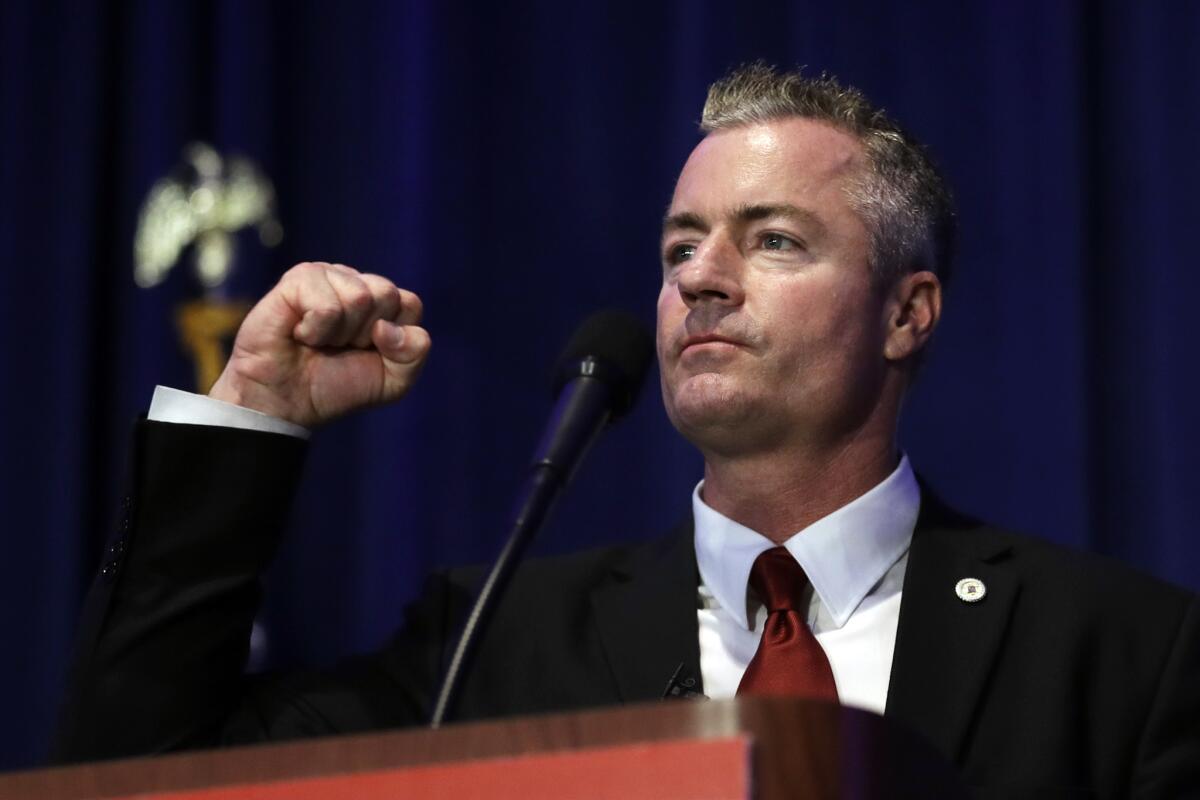
Trump reportedly tries to double Amazon’s postage rates to punish a perceived enemy
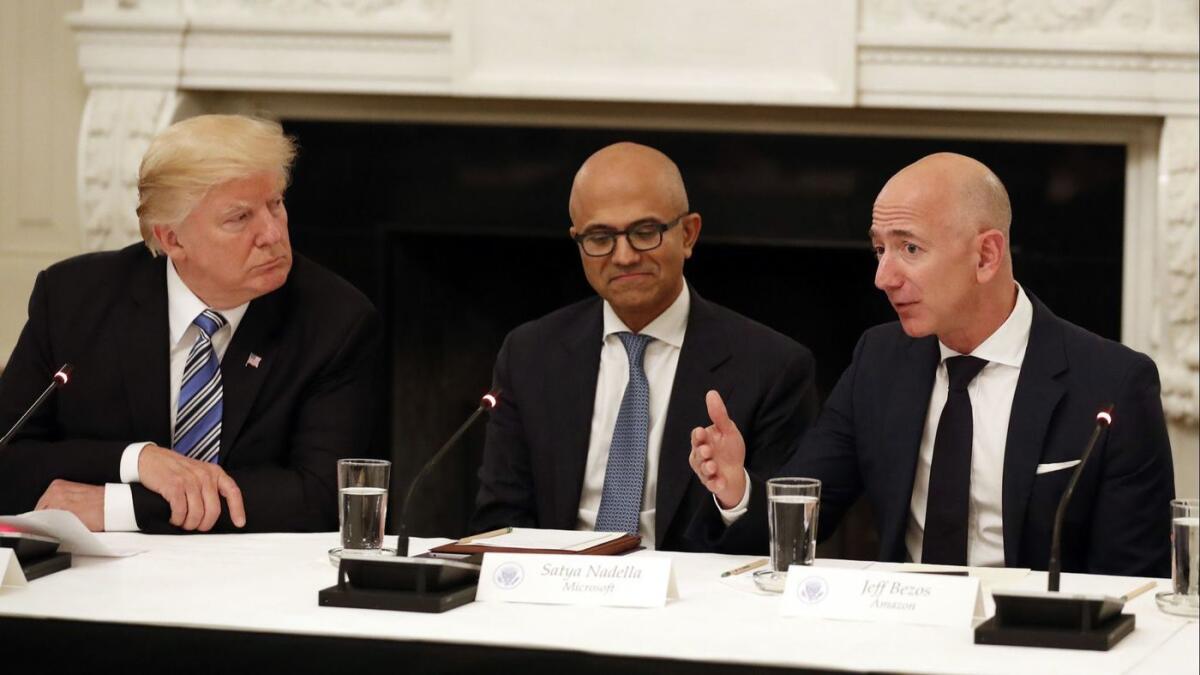
How Nixonian of him.
The Washington Post, in a nice twist of irony, reports that President Trump has been strong-arming the postmaster general to double the rate it charges Amazon — along with a handful of other companies — for all those deliveries. The reason? Amazon is the fiefdom of mega-billionaire Jeff Bezos, who has drawn the ire of our thin-skinned president by owning the Washington Post, which has been covering Trump with admirable depth and breadth.
So the president of the United States is apparently trying to use his office to punish someone he perceives as a political enemy.
Oh sure, you could argue that he’s just concerned about the Postal Service’s financial health, or that he thinks the Postal Service is unfairly subsidizing Amazon’s business to the detriment of its competitors. And in fact, there are arguments to be made on both sides of those issues.
But the Postal Service is an independent agency, and Trump is not the Postmaster-in-Chief. Do you think he’d conduct multiple meetings with his staff and the actual Postmaster General, Megan Brennan, if this wasn’t about more than the delivery rates negotiated by a private company?
President Nixon, those of us of a certain age will recall, tried to do something similar by siccing the Internal Revenue Service and the FBI on perceived enemies (though it was hardly an original idea).
No matter who is doing it, using the office of the president to try to press the levers of government to punish someone is a grotesque abuse of power. And neither Trump nor his enablers in Congress give such transgressions a second thought.
But then, what do you expect from a branch of government that shrugs off the president firing the FBI director to try to derail an investigation. Or who uses his office to shill for his private business.
The new Trump talking point: The FBI planted a mole in his campaign
In today’s installment of President Trump’s unceasing attack on special counsel Robert S. Mueller III’s investigation, the president is floating a new theory — that the FBI sneaked a mole into his 2016 campaign.Friday morning, Trump tweeted:
Even with the uncharacteristic qualification — “if true” — this is a sensational allegation. But it’s also part of a pattern.
For months, Trump and his allies in Congress and conservative media have been on a mission to discredit the FBI’s investigation of possible collusion between Russia and the 2016 Trump campaign and to suggest more broadly that the Obama administration, the Justice Department and the FBI perverted the national security machinery for political ends. (Remember Rep. Devin Nunes’ assertion that Obama officials had improperly “unmasked” the names of members of the Trump transition team that appeared in intelligence intercepts?)
The most recent flash point has been a request by Nunes and other House Republicans for information about the Russia investigation — information the Justice Department reportedly fears would compromise a confidential informant .
Was that informant actually part of the Trump campaign?
That idea seems to have been inspired by a long report in The New York Times on Wednesday tracing the history of the FBI’s Trump-Russia probe. This timeline noted that, according to current and former government officials, “at least one government informant” met several times with sometime Trump advisor Carter Page and George Papadopoulos, the campaign foreign policy expert who was retroactively demoted to “young, low-level volunteer” by Trump after Papadopoulos pleaded guilty to lying to the FBI.
“That,” the story added, “has become a politically contentious point, with Mr. Trump’s allies questioning whether the FBI was spying on the Trump campaign or trying to entrap campaign officials.”
The story didn’t say that the informant was “implanted” in the campaign. But suppose he or she was? Would it have crossed a line for the FBI to “turn” a campaign staffer who was reporting genuinely worrisome information about collusion with a hostile foreign power seeking to interfere in the U.S. election?
Trump didn’t offer proof for the mole theory, and his attorney-cum-surrogate Rudy Giuliani told CNN on Friday that neither he nor Trump knew “for sure” that an informant had been embedded with the Trump campaign.
Anyway, if the mole theory doesn’t pan out, Trump and his supporters in Congress and the media will move on to other arguments, just as some of them did after they had to abandon the idea that the Russia investigation began with the “dossier” compiled by former British spy Christopher Steele and financed by the Hillary Clinton campaign and the Democratic National Committee. (In fact, as even Nunes admitted in his famous memo, the counterintelligence investigation was triggered by information about Papadopoulos’ activities, not the dossier.)
The arguments change, but the objective remains the same: to discredit the Mueller investigation as a WITCH HUNT.
Rant against immigrants in public, lose your mail and phone services

At the risk of sounding like I’m defending the indefensible, there’s something unnerving about the backlash against Aaron Schlossberg.
Here’s the incident that catapulted Schlossberg into the public eye:
There’s something clearly wrong with this guy. And now, thanks to YouTube and my fellow carrion birds in the media, the story of the guy who threatened to call immigration agents on food-service workers who spoke Spanish is all over the internet.
We are living in a time of incessant public shaming (and trolling), so no one who makes that kind of xenophobic rant in public (and in New York City, no less, one of the great melting pots of the United States) should be surprised when his or her words generate an avalanche of very public criticism.
But the blowback against Schlossberg’s ugly words wasn’t confined to an in-kind verbal pummeling. The Washington Post reported late Thursday night that two New York City elected officials, both Democrats, had filed a formal grievance with the New York State Unified Court System about Schlossberg, arguing that his “bald-faced racism” could not be tolerated from a lawyer.
You could make the argument that attorneys, as officers of the court, should be held to a higher moral and ethical standard than the average take-out customer. But as the Post story notes, the courts’ misconduct rules govern professional behavior. Is there even a prima facie case here that Schlossberg misleads clients, mishandles cases or runs his office improperly?
And about that office — this is the really unsettling part of the Post story: “Corporate Suites told The Post that it had terminated an agreement to provide meeting space, mail handling, and telephone services to Schlossberg.
“Corporate Suites has a diverse and global community of business professionals working in a rich environment with mutual respect,” spokesman Hayim Alan Grant said in a statement. “We found Mr. Schlossberg’s statements offensive and contrary to our community norms.”
That’s Corporate Suites’ prerogative, I believe. It can’t deny its services on the basis of a customer’s race, religion or other form of federally prohibited discrimination. But xenophobes and racists aren’t a protected class under federal law, and only governments are bound by the 1st Amendment’s free-speech protections. You can, indeed, be punished by businesses that do not like what you say, as long as what you say isn’t a prayer.
That’s what appears to be happening to Schlossberg. And while you may think he totally deserves it, ask yourself how you’d feel if the same things were happening to someone who ranted against President Trump, evil drug company executives or gun-rights Nazis.
Symptoms of our national illness: Guns, violence, inaction - and a school shooting in Santa Fe, Texas
The school day was just getting started in Santa Fe, Texas, when the gunshots began. Little is known at this point about what happened next. At least eight are dead, maybe as many as 10, with others wounded and being treated at hospitals, including students and adults. One suspect, a student, is reportedly in custody, another detained. There was early talk of a shotgun and, later, suspected explosive devices found at the school and a home, but as we all know from experience these details are fluid and will change. That’s the disconnect between the desire to know, and the pace of an investigation.
“We all know from experience” — that’s the crucial phrase.
So we watch the live coverage on TV, scan the web for updates, cling to dramatic details and fight the nausea. We share shock on social media, post those little sad faces with a tear in the eye, and if a child is near give a hug of reassurance. But there really is nothing to be reassured about.
One of the more chilling aspects of today’s carnage: The school held an “active shooter” drill just a few weeks ago. A student told her mother in the middle of the shooting, “Mom, it’s for real this time.”
Soon we’ll hear the usual “thoughts and prayers,” the National Rifle Assn. will lie low for a few hours or days, the gun lobby and 2nd Amendment zealots will blame liberals for politicizing a tragedy, and by the end of next week — after the funeral stories and the look-back interviews with survivors or other mass shootings — it will all be in the rear-view mirror.
It was just three months ago that a gunman walked into a high school in Parkland, Fla., and mowed down 17 former schoolmates and staff. Some of the surviving students tried to turn their anger and grief into a political movement to push for tougher restriction on firearms, and a few changes were made in different states. But, well, as we see in Texas this morning, nothing really has changed.
Same as nothing really changed after Columbine. Nor after Sandy Hook. Nor after any of the other dozens of school shootings that have taken place in recent years. Nor after the Las Vegas mass shooting of concert-goers. Nor after the massacre at the Pulse nightclub in Orlando. Nor after Virginia Tech. In fact, go search “mass shootings U.S. by number killed” online and try to tally up the carnage of our obscene cultural embrace of violence, and firearms.
Has the gun lobby won? Is there nothing our political system will do to address the relentless violence and the easy access to guns? We’ve lamented before that this is something for which all of us bear responsibility because we, as a body politic, fail to force change. But what the hell is it going to take? Someone shot up a baseball practice among members of Congress and even after that incident — with their own lives in the crosshairs, their own colleagues wounded — lawmakers took no action.
This is too crucial an issue, too dangerous a problem, to just walk away from in disgust. We, as a nation, must persist in this seemingly Sisyphean task. We have to get that rock to the top of the hill.
But it’s moments like this that drain the soul.
Where are free-market Republicans when it comes time to fix our sugar program?

If House Republicans really were believers in the free market, they’d kill the U.S. sugar program.
Democrats are the ones who aren’t so faithful to bedrock capitalist principles, so they can be excused for supporting a program in which the government essentially controls how much farmers produce and, in effect, taxes consumers for the benefit of a politically connected special interest. Well, maybe they can’t be excused for that, but at least their position would be understandable.
Yet the House is now considering an $867-billion farm bill that, among other lamentable provisions, would continue a sugar program that has both of those features.
On the surface, the sugar program seems innocuous. The feds extend loans to sugar beet and cane processors at a price fixed in legislation that’s below the U.S. market price for sugar, with safeguards designed to make the program pay for itself. But as part of the program, the government determines how much domestically produced sugar can be sold by processors each year, including the percentage that must come from beets and the percentage that must come from cane. It also requires that domestically produced sugar fulfill 85% of the U.S. demand.
As a result, U.S. sugar prices are more than twice as high as sugar prices internationally. Defenders of the system say that it’s designed to cost taxpayers nothing, and they’re right — tax dollars don’t usually flow into the program. But taxpayers are consumers, and consumers pay heavily for the inflated cost of sugar — up to $4 billion a year, according to a coalition of conservative organizations that oppose the program.
Defenders — mainly lawmakers from states with sugar growers, such as Sen. Marco Rubio (R-Fla.) — argue that the program is needed to protect U.S. growers against subsidized foreign competitors. Any reduction in the price of sugar, they say, would be pocketed by the food and drink companies that buy it wholesale — not shared with consumers. Still, it’s hard for U.S. negotiators to persuade our trading partners to abandon protectionist tactics when we engage in them ourselves (not that the current administration would make such a free-trade argument).
The House is expected to vote as soon as this afternoon on a proposal by Rep. Virginia Foxx (R-N.C.) to lift the limits on domestic sugar production and on imported sugar, while also lowering the target price of sugar loans. It’s backed by companies that buy sugar, including candy makers, bakers and beverage manufacturers, and opposed by a broad array of farm interests — some of which worry that their federal supports will be next on the chopping block. It’s a bare-knuckled battle by factions within the food industry, and if Republicans stuck to their free-market principles, the results wouldn’t be close.
Update, 2:58 p.m.: The results weren’t close, but not in Foxx’s favor. The House rejected her amendment, 278-137, Thursday afternoon, with opposition coming from Republicans and Democrats in almost equal measure.
A group of Republicans is trying to fix DACA. Can policy trump party in our political cesspool?
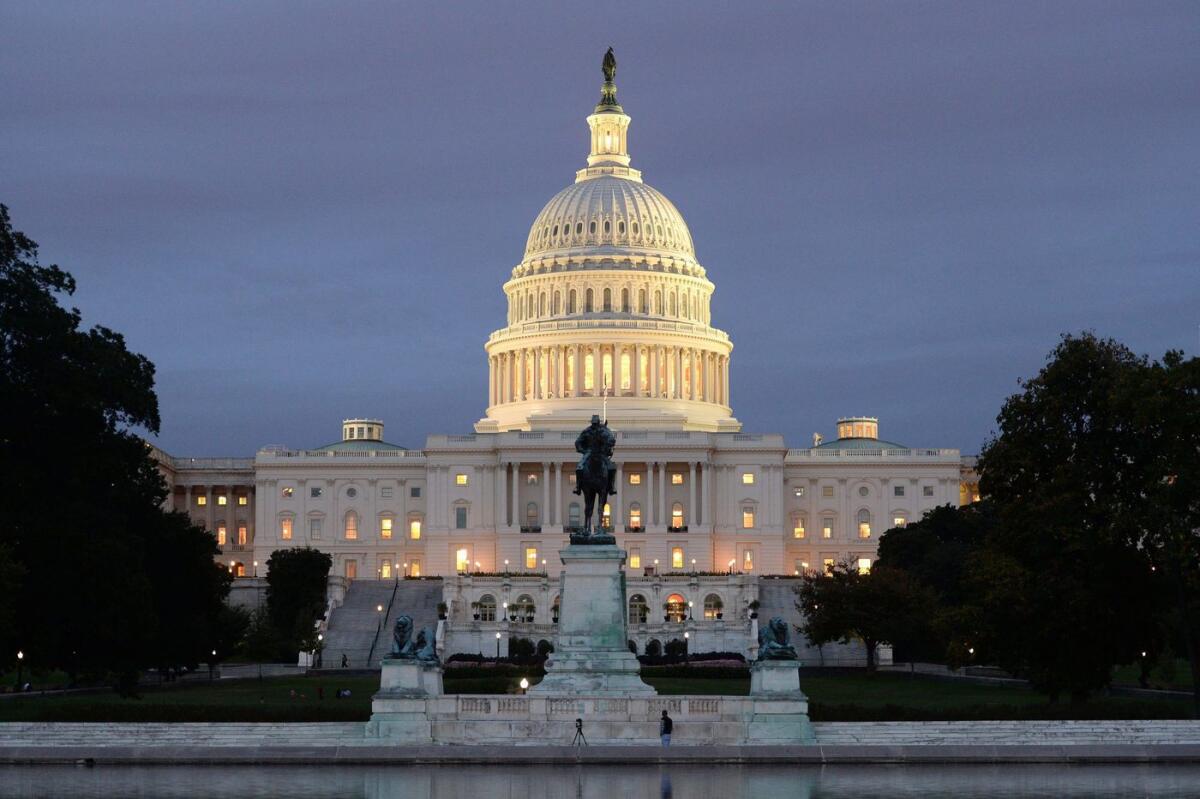
From the “This is why we can’t have nice things” file:
A small group of House Republicans representing districts with a more liberal view of immigration policies than that of the House leadership and the president are trying to force a vote on four competing bills to resolve the plight of people who have been living in the U.S. illegally after arriving as children. Each of the bills addresses the Deferred Action for Childhood Arrivals program in some capacity, some less onerously than others; under the so-called “queen of the hill” rule all would come to the floor and the top vote-getter would win.
But to get the measures to the floor, proponents need support from 219 House members — all 193 Democrats and at least 26 Republicans (or more if some of the Democrats balk).
The Republicans behind the strategy — who include Central Valley Californians Jeff Denham of Turlock and David Valadao of Hanford — say they have support from 240 members, more than enough. But voicing support and actually signing a petition to bring the bills to the House floor are two different things, and they remain a few members short of the necessary signatures to force the issue. The House GOP leadership opposes a free-for-all round of votes in which they lose control of the process, and is urging its members to wait until leaders can come up with a plan that President Trump will sign (good luck with that; Trump moves the goalposts as though they were on rollers). House Majority Leader Kevin McCarthy (R-Bakersfield) warned his members that forcing a DACA vote could cost the GOP its majority in the November election.
That lays bare the crux of the problem in Washington: the drive to maintain power outweighs the need to do what’s good for the country. In this era of polarization, bipartisan centrism succumbs to the imperatives of party unity, as factions at the extreme threaten to oust the party leadership if it makes a deal across the aisle that they don’t like. It’s not just a Republican problem — if the Democrats flip the House, their leaders will face the same challenge come January.
Pushing forward legislation to protect the DACA-eligible folks, which is popular with voters and many members of Congress, would seem to be just the kind of cross-aisle cooperation for which the nation hungers. A problem is identified; a solution palatable to the voters and a majority of House members is reached.
But, party.
Note to President Trump: Mueller’s ‘witch hunt’ isn’t just about collusion

President Trump sent Special Counsel Robert S. Mueller III an Unhappy Anniversary card this morning on Twitter (of course):
The argument that Mueller’s investigation is the greatest witch hunt in history seems unfair to the Puritans in Massachusetts who actually killed people during the Salem Witch Hunt. As Supreme Court Justice Louis Brandeis famously observed in a 1st Amendment case, “Men feared witches and burnt women.” (Actually, the Salem “witches” were hanged.)
Trump also seems to be slighting a more recent witch-hunter, the reckless anti-Communist Sen. Joe McCarthy (whose aide Roy Cohn later represented Trump’s company in a civil rights dispute with the Justice Department.)
But something else struck me about Trump’s anniversary tweet: his assumption that Mueller’s investigation is a failure and a witch hunt because it hasn’t proved “collusion.”
“Collusion” is actually not mentioned in the order by Deputy Atty. Gen. Rod Rosenstein appointing Mueller as special counsel. Rosenstein did say that Mueller was to investigate, among other matters, “any links and/or coordination between the Russian government and individuals associated with the campaign of President Donald Trump.” (Note that Mueller’s mandate wasn’t limited to investigating Trump himself, though both the president and some of his critics often seem to make that assumption.)
Trump is right that, so far, Mueller hasn’t recommended charges that could be described as involving “collusion” or “coordination” — nor has he accused Trump of obstruction of justice. But the complex investigation is only a year old, in its infancy judged by the duration of previous such investigations (as Harry Litman points out in an op-ed column in The Times).
And has Trump forgotten that two of his former advisors, Michael Flynn and George Papadopoulos, have pleaded guilty to lying to the FBI about matters related to Russia and are cooperating with Mueller?
The special counsel has a policy of not responding to Trump’s tweets. But if Mueller were inclined to comment, he might quote one of Trump’s favorite catchphrases back at him: “Stay tuned.”
About those immigrants Trump referred to as ‘animals’

So who exactly was President Trump referring to Wednesday when he referred to some immigrants as “animals?” Let’s go to the transcript.
Trump gathered California lawmakers and law-enforcement officials to discuss the so-called sanctuary laws that bar state and local authorities here from enforcing federal immigration codes, which involve for the most part civil, not criminal, infractions. (This is what California’s laws actually do.) Fresno County Sheriff Margaret Mims railed against the laws, then complained, “There could be an MS-13 member I know about — if they don’t reach a certain threshold, I cannot tell ICE about it.”
Never mind that MS-13 began in Los Angeles, and that not all of its members are immigrants. Trump responded:
“We have people coming into the country, or trying to come in — and we’re stopping a lot of them — but we’re taking people out of the country. You wouldn’t believe how bad these people are. These aren’t people. These are animals. And we’re taking them out of the country at a level and at a rate that’s never happened before. And because of the weak laws, they come in fast, we get them, we release them, we get them again, we bring them out. It’s crazy.”
Now, who was the president talking about? Some of his defenders argue that he was referring to MS-13 gang members. But it seems clear that he wasn’t. Mims mentioned the hypothetical gang member, but then the president brought up “people coming into the country.” That’s not just MS-13 members.
(Update, 12:42 p.m.: Trump on Thursday afternoon clarified that he was referring to MS-13 gang members — though that wasn’t what he said on Wednesday. So maybe he needs some elocution lessons.)
And for the record, deportations have not reached “a rate that’s never happened before.”
Trump’s inarticulateness is remarkable, and it often leads to confusion over what exactly he means when he ad libs or tweets. But he clearly was discussing immigration laws broadly, not statutes such as California’s that limit use of local resources to pursue people suspected of coming to the U.S. illegally.
Remember, this is the guy who started his campaign by referring to some Mexican immigrants as rapists:
“When Mexico sends its people, they’re not sending their best. They’re not sending you. They’re not sending you. They’re sending people that have lots of problems, and they’re bringing those problems with us. They’re bringing drugs. They’re bringing crime. They’re rapists. And some, I assume, are good people.”
It might take some time on a therapist’s couch to divine why Trump — son and husband (twice!) of immigrants — has such a low regard for people from other nations coming to the U.S. Or maybe just matching the immigrants against a color scale will help. The president notably didn’t include Scotland — where his mother was born — or Slovenia — where his current wife was born — in his list of execrable countries.
But his animus clearly extends to more than just criminals from other lands.
Trump just fessed up to reimbursing Michael Cohen. Still no mention of Stormy Daniels though
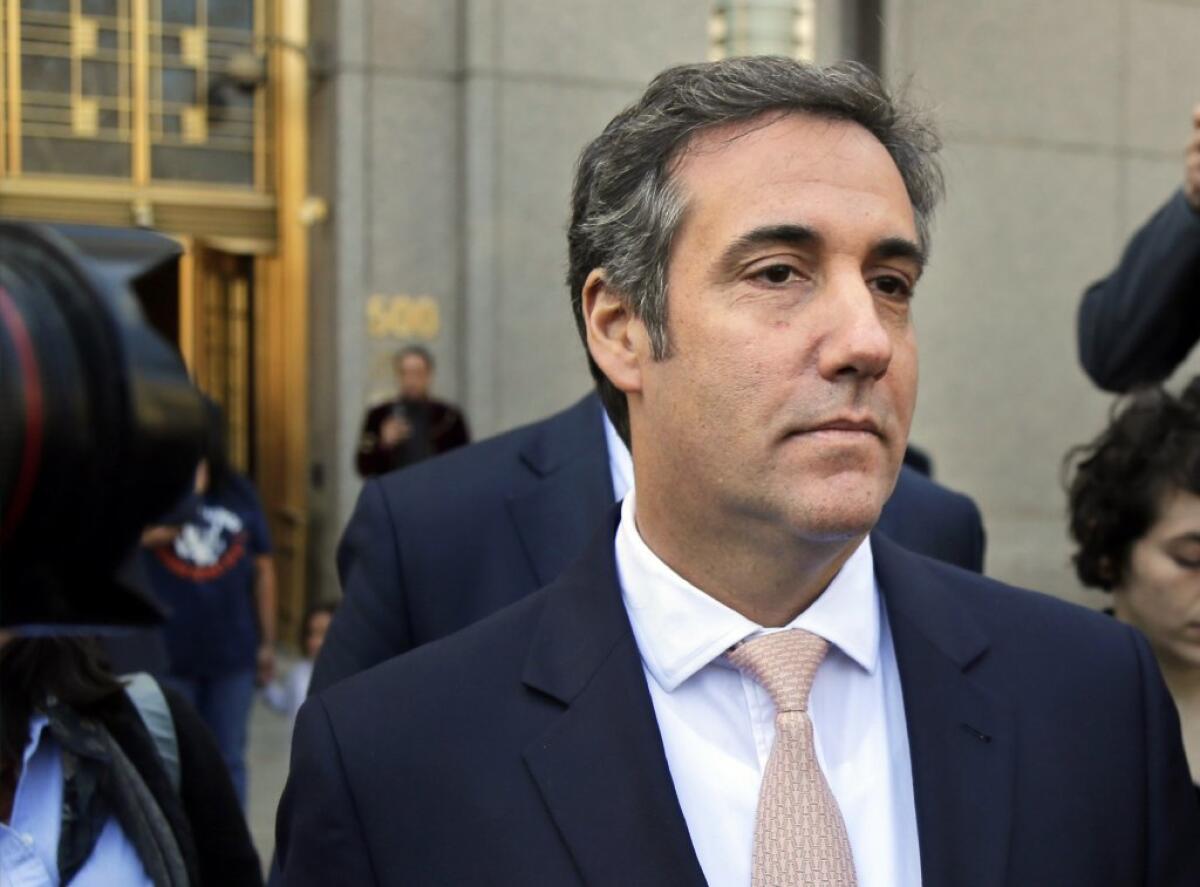
It fell short of an admission that “I did it, and I’m glad,” but President Trump’s disclosure in a federal ethics filing that he reimbursed lawyer-cum-fixer Michael Cohen for more than $100,000 in “expenses” is a major embarrassment for the president — and maybe worse than that.
A footnote in Trump’s statement to the Office of Government Ethics doesn’t identify the purpose of the payment. But Trump lawyer and media motormouth Rudolph W. Giuliani acknowledged on May 2 in an appearance on Fox News that Trump had reimbursed Cohen for a payment to pornographic film star Stormy Daniels. Daniels, who claims she had sex with Trump 12 years ago, signed a nondisclosure agreement days before the 2016 election.
“They funneled [it] through a law firm and the president repaid it,” Giuliani told Fox’s Sean Hannity.
This is, um, hard to square with Trump’s previous position about what he knew. On April 5, Trump answered “no” when asked if he knew about the payment to Daniels and he gave the same answer when he was asked if he knew where Cohen got the money.
(White House aides later suggested that when Trump said he didn’t know about the payment, he meant that he didn’t know about it at the time it was made. Yeah, that’s the ticket!)
With Trump’s official acknowledgement of the reimbursement to Cohen in his ethics filing, is the case closed?
Not necessarily. David J. Apol, the acting director of the OGE, this week sent a letter to Deputy Atty. Gen. Rod Rosenstein calling attention to the president’s ethics filings and noting that Citizens for Responsibility and Ethics in Washington, a watchdog group, has filed a complaint urging an investigation into whether Trump should have reported the Cohen payment as a loan in a filing he made last June. (That assumes, of course, that he knew about it at that time, something that hasn’t been established.)
Apol also says in the letter that the OGE itself had determined that Trump’s payment to Cohen had to be reported as a “liability”; Trump disagrees. In the filing, his lawyers say he is reporting the transaction “in the interest of transparency” even though the information is “not required to be disclosed.”
Even if this transaction produces further legal complications for the president, it’s probably less of a concern for him than the cluster of investigations by Special Counsel Robert S. Mueller III that the president dismisses as a “WITCH HUNT.” Politically, “Stormygate” doesn’t seem to have hurt Trump’s standing with his core supporters, even those who don’t believe him when he denies having had sexual relations with that woman, Ms. Daniels.
Still, Trump has now acknowledged — and in a government document! — a payment to a “fixer” who paid a porn star to keep quiet and whose offices were recently raided by the FBI. It’s not a good look.
Pruitt: ‘I don’t recall’ asking for lights and sirens. EPA memo: Um, you did
Why does Scott Pruitt still have a job? I know — silly question. In this administration of fools, liars and petty grifters, he’s “employee of the month” material.
Pruitt, in testimony this morning before a Senate committee, said “I don’t recall” ever asking his security detail to run light and sirens as they drove him to airports and dinners in Washington (details of which first came to light here). Pruitt, echoing a previous Environmental Protection Agency statement, told the committee, “There are policies that the agency follows, the agents follow, and to my knowledge they followed it in all instances.”
Sen. Tom Udall (D-N.M.), who was tending the grill at that particular moment, asked Pruitt again if he had asked for the lights-and-sirens treatment.
“No,” he replied, “I don’t recall that.”
Udall then pulled out an internal EPA email from Pruitt’s former security detail chief, Pasquale Perrotta, titled “Lights and Sirens” in which Perotta said, “Btw - Administrator encourages the use…”
Which, apparently, was “a deviation from past EPA practice,” according to a letter from two Democratic senators asking the EPA’s inspector general to open yet another investigation into Pruitt.
Memory can be such a fickle thing.
The Senate net neutrality vote is just Democratic campaign bluster. And that’s OK
The U.S. Senate’s vote Wednesday in favor of restoring the tough net neutrality regulations adopted in 2015 will almost certainly prove to be a mere blip on the political radar screen. There’s no sign the House will even take up the resolution, and given the deregulatory zeal of that body’s Republican majority, it’s quixotic to believe it could pass if it somehow made it to the House floor.
The real point behind the Senate vote was a political one — an exercise in line-drawing. Sen. Brian Schatz (D-Hawaii) put it succinctly: “Which side are you on?” he asked on the Senate floor, noting the overwhelming support for net neutrality rules from internet users. “There is no constituency on the other side of this other than telecommunications companies.”
That’s the problem for the Republicans defending last year’s decision by the Federal Communications Commission’s GOP majority to wipe out the 2015 rules and take a hands-off approach to the net. In this case, their philosophical devotion to small government and less regulation is serving telecom companies that face little or no competition in their local markets.
Put another way, the GOP is going to bat for cable and phone companies known by consumers for their occasional and baffling service outages and their regular price increases. That’s why Democrats see their efforts to restore the 2015 rules as a winner on the campaign trail.
[Update, 12:55 pm: Three Senate Republicans — Susan Collins of Maine, Lisa Murkowski of Alaska and John Kennedy of Louisiana — joined all 49 Senate Democrats in voting to restore the 2015 rules. Their resolution passed 52-47.]
In a classic exercise in whatabout-ism, Republicans say ISPs aren’t the real threat to a neutral internet — Facebook and Google are. And both of those companies are scarily dominant in their fields while being decidedly non-neutral arbiters of what appears on their pages. But no one has to use either one to access the panoply of content and services online. By contrast, many Americans have only one or two options when it comes to truly high-speed access to the internet.
Republicans also make the specious argument that the FCC’s new, deregulatory approach merely rolls the clock back to the days when the internet was subject just to “light touch” regulation at the hands of another federal agency, the Federal Trade Commission. That ignores more than a decade of efforts by the FCC — which, after all, oversees telecommunications companies — to come up with a legally sustainable set of rules to preserve the status quo online. In that status quo, which remains in place (for now -- the FCC’s rollback hasn’t taken effect yet), ISPs do not pick winners and losers online by favoring some kinds of online content over others.
After the Senate resolution on net neutrality meets its fate in the House, the battle over net neutrality will shift to the federal appeals courts, where several advocacy groups for internet users and some state attorneys general have sued to block the FCC’s quick about-face as arbitrary and capricious. And then it’s on to November, where Republicans will be asked to explain why they sided with Comcast and AT&T over internet users.
California’s right-to-die law dies in court
Let’s be clear: A Riverside County judge’s ruling throwing out the state’s End of Life Option Act isn’t about the rightness of the law, because it is the right law. It’s about the session in which the measure passed.
That special legislative session in 2015 was about healthcare, and it’s hard to imagine a topic more central to healthcare than choices regarding terminal disease. Nevertheless, Superior Court Judge Daniel Ottolia ruled Tuesday morning that the Legislature shouldn’t have acted on the physician-assisted suicide bill during the special session because, in his overly narrow view, the session was limited to finding more funding for Medi-Cal.
There’s a chance for the state to appeal this within five days. It has a strong argument with which to do this. But if the state can’t persuade Ottolia otherwise over the next several days, then perhaps a new law would be the quickest and strongest way to go.
Any legislators who had doubts about this law have had a chance to see the comfort it has brought to more than 100 terminally ill Californians since it went into effect two years ago.
Now that they have had this opportunity to make end-of-life decisions for themselves, Californians are unlikely to settle for less. Three-fourths of Californians support the assisted death law, a 2015 UC Berkeley survey found.
The Roman Catholic Church, a major force behind the lawsuit, would oppose the law no matter how it was passed or in what kind of session. But not all Californians adhere to the church’s beliefs. They have their own rights.
Despite the fears of disability rights advocates, all signs point to the assisted death law being used sparingly, without coercion, by people who were grateful to have the option. If anything, the law’s six-month provision has made it too difficult for some terminally ill people to have that choice about ending their lives peacefully.
Asked to use some of its record profits to fight homelessness, Amazon throws a hissy fit
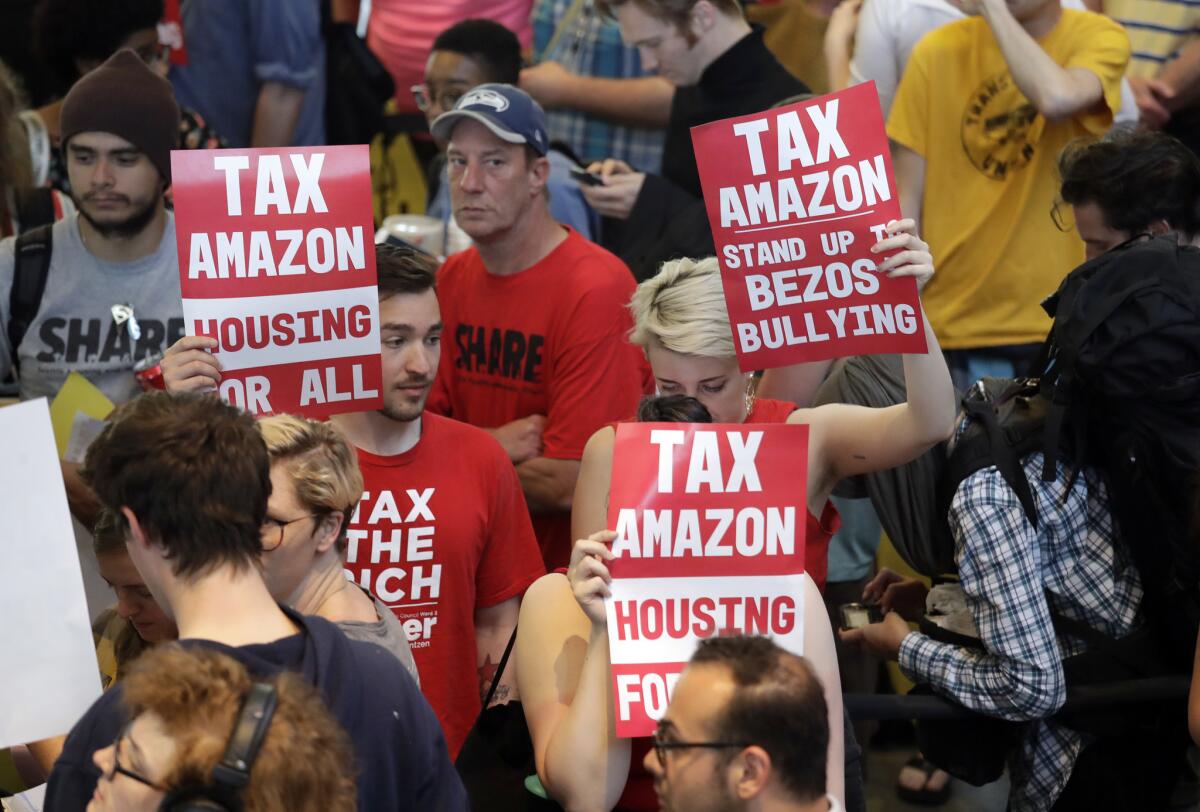
The Seattle City Council voted Monday night to impose a new tax on big businesses to help pay for homeless housing and services. And the furious reaction from some of the nation’s largest retailers was, well, a bit unseemly. Particularly from Amazon.
Starting next year, for-profit companies that gross at least $20 million per year in Seattle will have to pay $275 per employee per year, according to the Seattle Times. The tax will raise about $47 million annually. A recent study estimated Seattle and surrounding King County need $400 million a year to tackle homelessness.
About 3% of companies operating in the city would have to pay the tax, including Starbucks, the Seattle Times, department store chain Nordstrom, as well as tech giants Apple, Google and Facebook.
No company will be more impacted than Amazon, which is based in Seattle and has 45,000 workers. The company could pay more than $10 million a year.
Supporters of the tax call that a minor expense for the mega-retailer. After all, the company reported a record $1.9 billion profit from the 2017 holiday shopping season. Amazon doesn’t think so. Prior to the vote, the company halted construction on a new office tower and threatened to move jobs elsewhere. After the vote, the company said it would restart construction but might not occupy the building.
“We are disappointed by today’s City Council decision to introduce a tax on jobs,” an Amazon spokesman said in a statement. “While we have resumed construction planning for Block 18, we remain very apprehensive about the future created by the council’s hostile approach and rhetoric toward larger businesses, which forces us to question our growth here.”
OK, taxing employment is not a great way to raise public dollars. It risks slowing job creation, which is essential to lifting people out of poverty and decreasing homelessness. There’s got to be a more collaborative and constructive solution; business leaders offered one approach in an open letter.
But Amazon’s rhetoric and bluster is just as disappointing. This is a multi-billion-dollar company that has gone hunting for tax breaks and freebies as it decides where to locate its second corporate headquarters. Amazon last year launched a “Bachelor”-like competition among cities, dangling the prospect of a $5-billion mega-campus with 50,000 high-paying jobs for the winning suitor.
The company’s seven-page request for proposals made clear that Amazon wants financial incentives, such as land, tax credits, relocation grants, workforce grants and fee reductions to help offset both the capital costs of building its new headquarters and “ongoing operational costs” — that is, a permanent subsidy.
And cities and regions have happily complied with Amazon’s demands, offering many millions and billions of dollars in tax breaks and incentives, hoping to become the next big tech center.
Now Amazon’s hometown is facing a staggering homelessness crisis, driven by the skyrocketing cost of housing, driven, in part, by the explosive job growth in the tech sector. And what’s Amazon’s response? The company threatens to leave town.
Did North Korea just yank the football — and Trump’s Nobel Prize — away?

When South Korea’s news agency reported Tuesday that North Korea abruptly had canceled a high-level meeting with South Korean officials – and might be having second thoughts about a summit meeting between Kim Jong Un and President Trump – a colleague suggested that Kim was playing the part of Lucy in the old “Peanuts” comic strip. Lucy, you’ll remember, held the football for Good Ol’ Charlie Brown to kick, but, in a betrayal repeated again and again, pulled it away before he could connect.
Kim hasn’t yet yanked away the prospect of a summit that Trump has described as “highly anticipated” and which he believes both leaders will try to make “a very special moment for World Peace!” This may be the first of many stutters in a process that still might lead to a meeting next month in Singapore, perhaps even a productive one.
Still, there is a lesson for Trump in the North’s sudden change of tune, inspired by joint U.S.-South Korean air force exercises. Kim remains an unpredictable figure, and it is way too soon for Trump to boast about his succeeding where his predecessors have failed. And don’t rush to make room in the Oval Office for that Nobel Peace Prize.
A State Department spokeswoman said late Tuesday that the department had “received no formal or even informal notification of anything” from North Korean officials and that planning for the summit was proceeding. Presumably U.S. diplomats and intelligence officials will be reaching out to both Koreas in the next few hours to gauge the state of play.
Meanwhile, Trump would do well to refrain from taking to Twitter to express either alarm about Tuesday’s developments or confidence that this too shall pass. But hoping for such self-control from this president may be as unrealistic as expecting Lucy to change her ways.
Guess how many death threats Scott Pruitt received to justify his 24/7 security detail? Zero
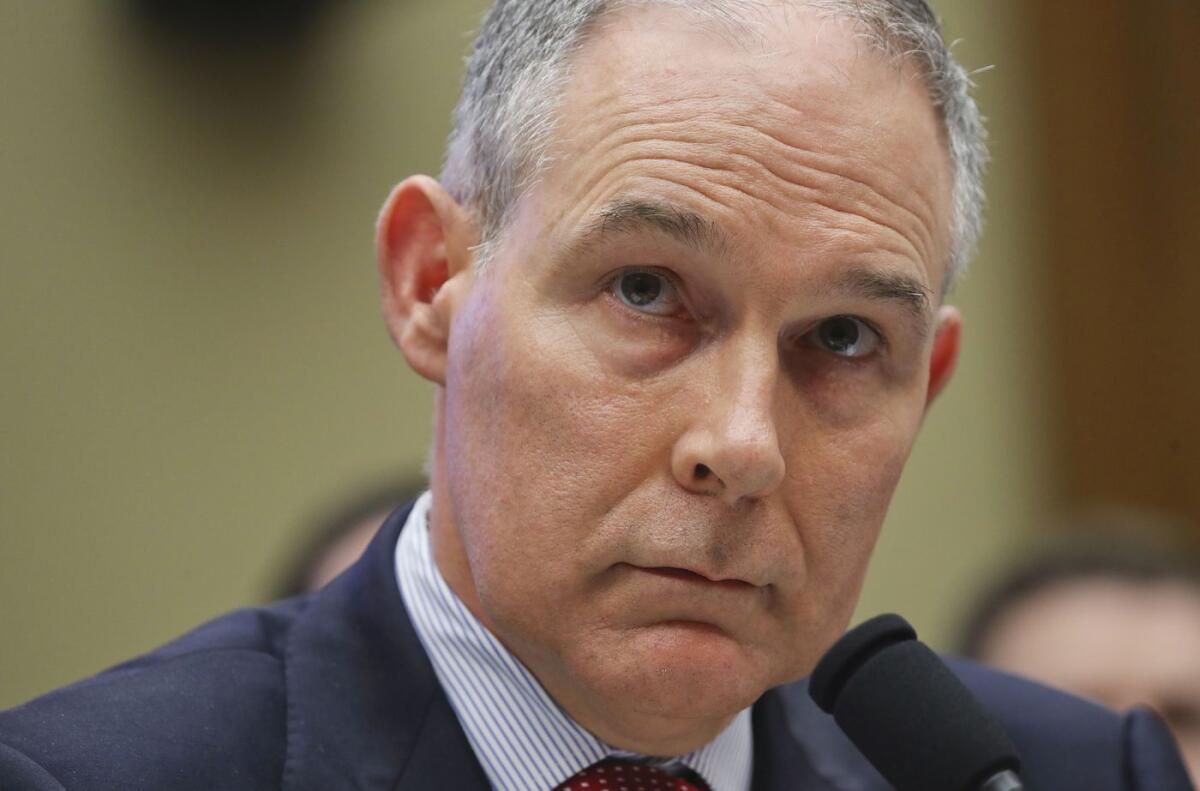
Maybe Scott Pruitt was just prescient.
The head of the Environmental Protection Agency infamously has assigned himself a 24/7 security detail because, he and the EPA explained, he received threats after taking over the agency. But the EPA’s inspector general sent a letter Monday to members of Congress stating that the EPA’s senior White House advisor put in the request before Pruitt even started the job.
The Washington Post reported Monday that the advisor, Don Benton, anticipated threats in response to expected actions by Pruitt.
“There will be several Executive Orders signed when [Pruitt] is sworn in that will likely stir the hornets nest,” according to an email the Post said Benton had sent to EPA security officials that also cited other past security issues for EPA personnel.
Pruitt earlier claimed that an “unprecedented number of death threats” led to his round-the-clock protection.
The inspector general did confirm that there have been investigations into 14 threats to Pruitt, but only one person had been arrested.
BuzzFeed reporter Jason Leopold tweeted earlier this month that he filed a Freedom of Information Act request to the EPA for records of death threats against Pruitt. “EPA said it had zero records,” Leopold reported.
So now we have a top Trump administration official wasting tax dollars on luxury travel, building himself a secure phone booth in his office and offering an untruth in defense of his special security detail.
In other words, he fits right in.
Trump is riding an economic wave. How long can it last?

Tuesday morning, as the news media kept their focus on the protests and the mounting death toll in Gaza, the president tweeted about his public image here in the United States:
Although he might have been referring to private polls by his campaign organization, his comment is supported by the trend lines in public polls. It’s still true that more Americans disapprove of his performance than approve of it, but the gap is narrowing.
Why? You could make the argument that he’s been visibly keeping his campaign promises, such as his pledge to move the U.S. embassy in Israel from (noncontroversial) Tel Aviv to (hotly disputed) Jerusalem and to ease regulation on U.S. businesses. But that’s more likely to appeal to his political base than to the broader American majority.
A better explanation, to borrow James Carville’s signature phrase, is that it’s the economy, stupid. GDP is growing a bit faster, even if it hasn’t reached barnburner stage, and the years-long expansion has pushed us close enough to full employment that wages are inching up and employers are having a harder time filling openings. These are good things.
So this bodes well for the GOP in November, right? And possibly Trump in 2020?
Yes, but Republicans will need to mind the icebergs. One obvious one is rising interest rates, which are being steered upward by the Federal Reserve to protect against inflation. Even if the Fed did nothing on short-term rates, the cost of borrowing would likely be going up — witness what’s been happening to 10-year Treasury notes. With household debt hitting new highs and the federal deficit climbing irrationally, a surge in interest rates would inflict an enormous amount of damage.
Less obvious is the chance that the cost of living will rise faster than take-home pay. A central plank in the GOP’s pitch to voters is the enormous tax cut enacted late in 2017. But the rising cost of healthcare, gasoline, housing and — thanks to Trump tariffs — many consumer products could eclipse the gains in household income, particularly for families who don’t reduce the amount of tax withheld from their paychecks.
Finally there’s the Trump factor — the things the president says and does that those outside his base find so alienating. One reason Democrats have done so well in special congressional elections this year is that anti-Trump sentiment has driven more voters to the polls than warm and fuzzy feelings about our president or GOP candidates.
Those are issues for another day, though. Broadly speaking, consumer confidence and Americans’ sense of well-being are strong, according to the Conference Board’s surveys. That’s going to help the incumbents for as long as the sentiment lasts.
White people, could you stop calling the police on black people for living?
White people, could you stop calling the police every time you see a black person doing something ordinary?
It used to be that white people only called the cops on young black men in hoodies walking down dark streets at night. (Still not a crime, but, in urban America, seemingly closer to a crime.) Now, we have an alarming rash of police calls on black people doing innocuous and innocent things. Or maybe this was always happening but now people have smartphones to record the incidents.
There was the white Starbucks employee who called the police on two black men sitting at a table waiting for a business associate to arrive for a meeting before they ordered. The men were arrested but never charged. (The employee no longer works there.)
There were the three black Airbnb guests — filmmakers and artists — renting a house in Rialto, Calif. They walked out one morning, luggage in tow, and headed to their car only to be confronted within minutes by police cars and a helicopter overhead. An elderly white neighbor had made the call. She believed that it was a robbery, police said.
When a black man brought his charcoal grill to a cookout in an Oakland park, a white woman called police to report that he was cooking in a portion of the park that was reserved for non-charcoal grills The man insisted to the woman that he often saw people grilling with charcoal in that area. Police arrived but cited no one, and the barbecue continued.
Among the most outrageous: the white student in a Yale dorm who called campus police on a black female graduate student she saw napping in a dorm common room.
Let’s see — napping, grilling, house-renting, hanging out at Starbucks can get you in trouble if you’re black. #LivingWhileBlack.
Even in the cases where there is some sliver of an extenuating circumstance — grilling in the wrong part of the park, or carrying bags out of a home in an unfamiliar residential area — it means that white people, still, after all this time, don’t expect to see black people in middle class or affluent neighborhoods, shops or universities. They were never given the benefit of the doubt. And that’s downright appalling.
(Updated 2:57 p.m: This post was changed to clarify the account of the Oakland incident.)
The violence in Gaza is as inevitable as it is tragic

At least 55 Palestinians dead in the Gaza Strip, 2,700 wounded. Is anyone surprised by this turn of events? If you are, you shouldn’t be.
It was inevitable. The peace process is moribund, and with it the hopes of the approximately 2 million people crammed into this narrow strip of land along the Mediterranean between Israel and Egypt. According to Alexandra Zavis in Monday’s Times, much of the water in Gaza today is undrinkable. Most homes get only a few hours of electricity each day. Hospitals are overwhelmed. Half the population is unemployed. Every few years there’s a new round of violence, usually involving rockets fired by militants into Israel, followed by a devastating Israeli counter-assault.
So what surprise is there that Palestinians in Gaza are without hope, fantasizing about a homeland they’ve never seen, willing to cross the border fence and face down better-armed Israeli soldiers in futile protest?
At this point, trying to apportion blame is not terribly helpful. Of course the Israelis are right that there’s been violence at the recent protests; the photos of the rock throwers and the fiery kite fliers are pretty unequivocal. But the Palestinians counter, correctly, that the vast majority of the demonstrators are peaceful — and besides, don’t people who’ve lived under occupation for 50 years have a right to protest? But there is no occupation, comes the predictable retort — Israeli soldiers and settlers were pulled out of Gaza years ago. To which the Palestinians respond: Israel didn’t really leave Gaza; it still controls the ingress and egress of people and goods, thanks to a punishing blockade imposed in 2007.
And so it continues. The cycle of blame stretches back past the Hamas takeover of Gaza, past two intifadas, past 1973, past 1967, past 1956. “Original sin,” in the eyes of the Palestinians, is the establishment of Israel on Palestinian land 70 years ago Monday; to the Israelis, it’s the unwillingness of the Palestinians to recognize that fledgling country.
What’s needed today is renewed effort to bring the parties back to the table to negotiate a just peace that creates two secure, independent, sovereign states living side by side.
Unfortunately, it’s hard to see how that happens without the assistance of the United States. And this week, with its reckless, provocative and one-sided relocation of the U.S. Embassy from Tel Aviv to Jerusalem — thus conceding Israeli sovereignty over that much-disputed city — the Trump administration further undermined its claim to be an honest broker. That’s another step backward in the search for peace.
If you have a 2nd Amendment right to sell guns, the Supreme Court isn’t saying

Sometimes a nondecision can be a good thing.
The Supreme Court on Monday refused to hear a case based on the argument that the 2nd Amendment guarantees a right to sell firearms. The case (read the petition here) was brought by three men who wanted to open a gun store in Alameda County. After the zoning board granted a conditional use permit, the county Board of Supervisors – responding to neighborhood opposition – rescinded the approval on the grounds that the proposed business violated a rule barring such facilities within 500 feet of homes, schools, other firearms shops and liquor stores.
The plaintiffs interpreted the vote as a ban on gun sales (it’s not; other gun shops already exist in the area) and they and supporters argued that the 2nd Amendment not only confers a right to own guns but to sell them. The 9th Circuit Court of Appeals disagreed, and the Supreme Court’s refusal to grant a hearing leaves in place the appellate court’s decision that there is no 2nd Amendment right to sell a firearm.
As Bloomberg points out, this is the third case centering on the 2nd Amendment that the Supreme Court has rejected this year. Those refusals continue an eight-year pattern in which the court has stayed out of the gun-rights debate after its landmark 2008 Heller and 2010 Manchester decisions affirming an individual right to own a firearm in the home for self-protection.
That’s been a frustrating run for gun-rights advocates, but good news for those (waving my hand over here) who think the nation needs more stringent gun control measures.
Hate the Warriors? The Supreme Court just gave states the green light to let you bet against them
The U.S. Supreme Court did more than just open the door to more wagering on pro and college games Monday when it declared unconstitutional a 26-year-old law barring states from authorizing gambling on sports. The justices took an important step to limit Washington’s power over the states and their vaunted laboratories of democracy.
But don’t get your hopes up. Although the ruling says, in essence, that the feds can’t simply tell state legislatures what to do, it doesn’t touch the federal government’s power to regulate on its own. So if Congress chooses, it may well be able to close the betting window on sports outside the few places where it’s already legal.
[Update, 12:34 p.m.: The race is on! One California lawmaker has already proposed to amend the state Constitution to allow sports betting. If two-thirds of the Assembly and the Senate agree, the measure would go to voters as soon as November. Moves like that are bound to prod anti-gambling forces to try for a federal ban ASAP.]
Similarly, some observers suggested that the ruling might help states that want to legalize marijuana and to chart their own paths on immigration. Yet nothing in the court’s Murphy vs. NCAA ruling gives the states power to overrule federal laws — the Constitution’s supremacy clause already denies them that authority.
Instead, what makes Murphy interesting is what it means for issues that Congress has not regulated or that, under the 10th Amendment, are solely the province of states.
The 1992 law being challenged in Murphy — the Professional and Amateur Sports Protection Act — did not make betting on March Madness a federal crime. Instead, it merely barred state and local governments from authorizing, licensing, operating or promoting gambling on sports. That, wrote Justice Samuel Alito, was “as if federal officers were installed in state legislative chambers and were armed with the authority to stop legislators from voting on any offending proposals.” He added: “A more direct affront to state sovereignty is not easy to imagine.”
So now the question is whether state legislatures eager for a tax-revenue windfall from sports betting can legalize it before Congress (which has never been keen on gambling) enacts a federal ban. It’s safe to expect powerful gaming interests to lobby state lawmakers hard for permission to take bets on games (and to fight over which companies may take those bets, and where). There will also be fierce pushback from the major leagues and the National Collegiate Athletic Assn., which view sports betting as a potentially corrupting influence. Law enforcement agencies are likely to weigh in, too, as are social conservatives who view gambling as immoral.
Efforts to legalize online gaming in California have been stymied for years by division among tribal casinos and the major Las Vegas gaming houses, so similar disputes may very well hold off sports betting in this state. But the prospect of a major new source of tax revenue — and sin taxes as that — will certainly capture the attention of lawmakers all across the country.
Don’t get too excited. Elon Musk isn’t going to be whisking Angelenos through tunnels anytime soon
Elon Musk says the Boring Co. is close to finishing its first tunnel “under L.A.,” and will be offering free rides to the public in a few months.
A few months, huh? Not under the city of L.A., it won’t.
The Boring Co. is currently digging a two-mile test tunnel in and around Musk’s SpaceX company headquarters in Hawthorne. It’s the first step in a plan to build a network of tunnels under the region in which electric platforms (“skates”) could move cars and pods of people at high speeds and avoid L.A.’s notorious traffic.
The company has also filed an application for an excavation permit with the city of Los Angeles to build a 2.7-mile proof-of-concept tunnel. Several L.A. Council members were so enthusiastic about the idea, that they are considering giving the project an exemption from the California Environmental Quality Act.
That lets the company skip the rigorous environmental analysis and public input normally required of major projects, such as, say, subways. Some public transit advocates were understandably surprised that Musk’s private transportation system was getting a fast track that could shave months or even years off the project timeline, while publicly built subways and light rail lines go through the gantlet of studies.
But, some city officials said, the CEQA exemption just applies to digging and testing the tunnel system.
As CurbedLA reported, the tunnel is not for transporting people.
“The only way we can approve the CEQA exemption is if we accept the premise ... that it is a proof of concept, basically excavation tunnel, and it is not, to be very clear about this, a public transit system,” City Councilman Bob Blumenfield said at the time.
The proof-of-concept tunnel could someday carry passengers, but the company would have to do an environmental impact report and get all the necessary permits first. And that’s going to take a lot longer than a few months.
So while the Boring Co. may whisk people underground in Hawthorne sometime this year, don’t expect to be riding a pod under the city of Los Angeles any time soon. Except on the subway.
Just because Americans pay too much for drugs doesn’t mean other countries should have to

President Trump unveiled his long-awaited blueprint Friday for lowering the price of prescription drugs, and it’s not bad, considering the ideological boundaries involved. This is a Republican administration, after all, so it’s not about to call for Washington to set (or even regulate) drug prices. Instead, Trump’s plan seeks to increase competition, improve insurers’ negotiating leverage with drugmakers, reduce the incentives that some doctors and hospitals have to use expensive drugs, and (this is the really interesting one) explore having federal programs pay for drugs based on their value to patients and their effectiveness.
I don’t like price controls, so I don’t fault Trump for not proposing them. But having decided to stick to the free-market pathway, Trump shouldn’t complain about other countries using price controls to their own advantage.
And yet, that’s what he did in his Rose Garden announcements. Trump characterized foreign governments’ control over drug prices and availability as a way to “extort” low prices and stick Americans with the tab for drugmakers’ costly research and development efforts. That amounted to “freeloading,” Trump said, promising to address the issue in trade talks “with every trading partner.”
“You can look at some of the countries; their medicine is a tiny fraction of what the medicine costs in the U.S.A. It’s unfair and it’s ridiculous,” Trump said to applause, adding, “America will not be cheated any longer, and especially will not be cheated by foreign countries.”
Unfair? Cheated? There’s nothing discriminatory or underhanded about it. No country forces drugmakers to sell products there. Instead, drugmakers choose to sell at lower prices overseas in part because there’s less money available in those healthcare markets (many of which are capped by governmental budgets), and in part because they know they can make unrestrained profits in the United States.
As a society, we’ve chosen to prioritize developing new drugs over making drugs affordable. Drugmakers are granted a 20-year monopoly on their new products, giving them the discretion to charge as much as they think they can get away with. For breakthrough drugs and for medicines that treat rare diseases, this is a license to print money. And we do that because we want to give manufacturers an incentive to keep gambling on the next breakthrough, the next miracle cure.
Other countries have made different choices, one of them being to hold down the cost of healthcare to their citizenry. They call it budgeting, you might call it rationing.
If Trump thinks low foreign drug prices are a problem for Americans, there’s one obvious answer: Impose the same sort of price controls on drugs sold in the United States. He’s not interested in that, and again, I don’t blame him. But if he thinks the leaders of other countries will agree to make their citizens pay more for lifesaving drugs so that ours can pay less, he’s deluding himself.
Endorsing Antonio: A behind-the-scenes look at how the Times editorial board made its pick
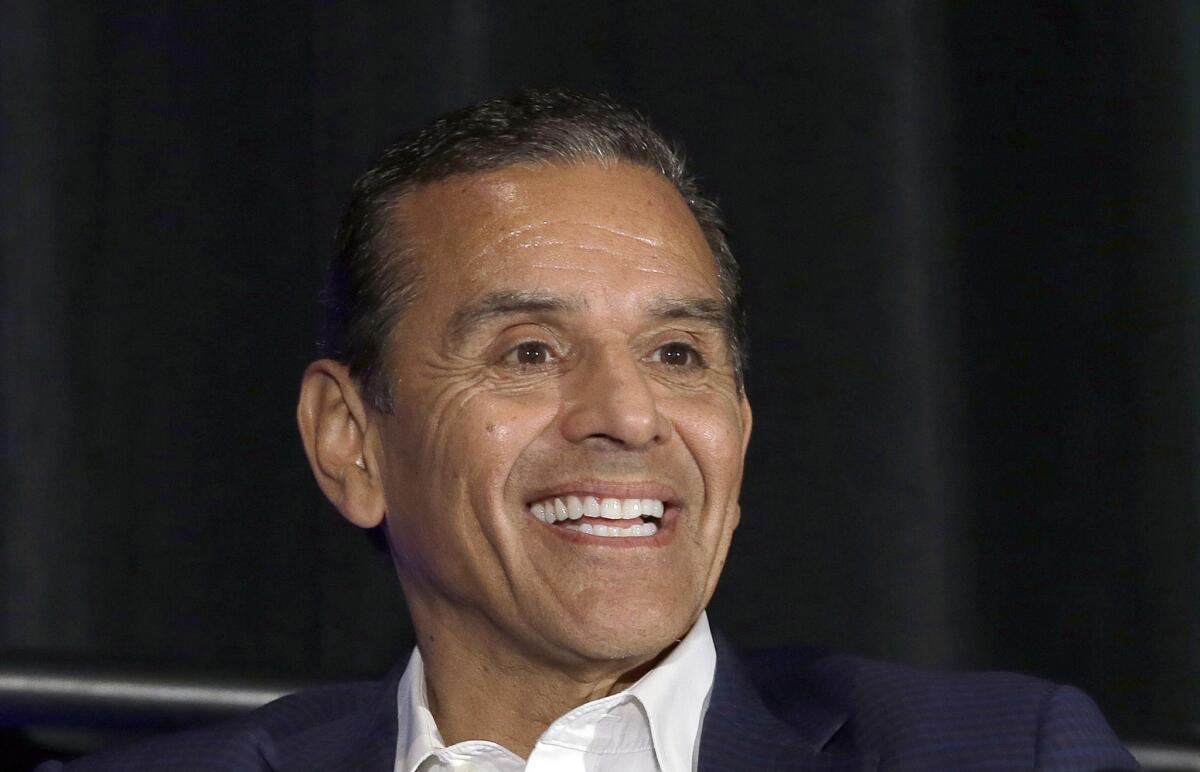
This week, the Los Angeles Times published its endorsement of Antonio Villaraigosa as California’s next governor. And some of you may be thinking we made our choice because of the L.A. connection.
Nope. That’s not at all how the endorsement process works. If it were, we wouldn’t need a staff of editorial writers and I wouldn’t have a job. In fact, our long familiarity with our former mayor, as seen through the deep archive of stories and editorials examining every achievement and failure of the first Latino mayor in modern L.A. history, was probably more of a liability to Villaraigosa.
Editorial writers and boards don’t often explain how we come to the conclusions we do, but maybe we should so that readers understand that we don’t make these decisions idly. I know that, on average, I spend more time on endorsement editorials than your average policy editorial, even super-wonky ones.
So, for anyone who is interested, here’s a rare glimpse behind the curtain of the L.A Times editorial board:
In a sense, we’ve been preparing for this endorsement for a while — at least since it became clear that Villaraigosa was going to take on Lt. Gov. Gavin Newsom, who has been running for the top job for, like, eight years. We kept tabs on the two as we would any well-known politicians, filing away notable utterances and accomplishments in our mental “governor 2018” files. As other well-known people announced they were joining the race — for example, state Treasurer John Chiang and Assemblyman Travis Allen (R-Huntington Beach) — the mental folders were supplemented by digital ones.
In March, we invited all of the 27 gubernatorial candidates to meet with the editorial board in person. That’s right, even those with no money, no campaign and no clue. In one rare case, we spoke to a candidate on the phone from Africa.
Before the interviews, we researched the candidates as much as possible — their positions, policies and any trouble they may have caused or gotten into. In the interviews we asked questions about the big issues of the day (Will you support the bullet train? What’s your plan for water security? What’s the best way to respond to the Trump administration?) as well as ones tailored to the candidate in front of us (Could Newsom explain whether he supports high speed rail or not?).
After the interviews, we conferred on what we heard and knew, then narrowed the field down to the two candidates we felt were the best, Newsom and Villaraigosa. On paper, these guys look a lot alike: two charismatic and reliability Democratic politicians, both of whom were decent-or-better mayors of major California cities and had serious Sacramento skills (as lieutenant governor and speaker of the Assembly, respectively.) Both even have the same kind of baggage in the form of extramarital affairs.
But there are substantial differences between the two, and fleshing them out took weeks of heavy-duty reporting. We talked to more than a dozen people, including folks who worked with the candidates at some point in their careers, former and current colleagues, supporters and critics.
Usually during the endorsement reporting process, one candidate begins to emerge as clearly superior in the mind of the lead writer. That’s the point she or he will make a pitch to the rest of the board. Then the debate begins. Sometimes it’s a short conversation, as when, say, there’s one amazing candidate among a field of undistinguished ones. Other times it can be a fierce debate that takes several discussions to settle.
I’m not at liberty to recount the details of the board’s discussion of the governor endorsement. All I will say is that it wasn’t quick, it wasn’t easy, and it had nothing to do with the L.A. connection.
Michael Cohen’s big bags of money for nothing

Crack all the jokes you want about Michael Cohen making a mockery of the Trump campaign’s rhetoric about draining the swamp. I am totally in awe of the man.
For starters, he took Essential Consultants, a company he created in October 2016 to funnel $130,000 in hush money to porn actress Stormy Daniels, and turned it into a business opportunity: selling insights about his client, the surprise winner of the following month’s presidential election. That’s agile leadership.
Even better, he persuaded some deep pocketed corporations to pay heavily for Essential’s services, even though he appears to have little to no expertise in the relevant fields. Novartis, the Swiss drugmaker, ponied up $1.2 million for a year’s worth of insights about the new administration, but says it met with Cohen only once. Nice!
According to Politico, Novartis CEO Vasant Narasimhan wrote in a note to employees, “We made a mistake in entering into this engagement and, as a consequence, are being criticized by a world that expects more from us.” Actually, spending heavily to buy influence in Washington is exactly the sort of behavior we expect from the corporate world. And in Novartis’ case, the new president represented a real threat: During his campaign, he’d often argued that pharmaceutical companies were “getting away with murder” and that he’d bring down prescription drug prices. Trump hasn’t done any such thing — yet.
AT&T CEO Randall Stephenson apologized to employees too after his company’s $600,000 in payments to Essential Consultants were disclosed by Daniels’ attorney. (Clearly, Novartis doesn’t negotiate for influence as skillfully as AT&T does.) As The Times’ Meg James reported, AT&T said in a statement Friday that “Cohen approached it after the 2016 presidential election and said he was leaving the Trump Organization and would do consulting ‘for a select few companies that wanted his opinion on the new President and his administration — the key players, their priorities, and how they think.’” It hired Cohen days after Trump was inaugurated.
The telecom giant had its own reasons to view Trump warily: It’s trying to purchase Time Warner, and Trump had blasted the deal on the campaign trail as anti-competitive. Documents obtained by the Washington Post show that AT&T retained Cohen for help on the merger, along with “corporate tax reform” and other issues.
In November, the Justice Department sued to block the deal. But hey, in December Trump signed a huge corporate tax cut into law. So that’s a win, right? Even if there’s no evidence that Cohen had anything to do with the tax bill?
“Our company has been in the headlines for all the wrong reasons these last few days and our reputation has been damaged,” wrote Stephenson to employees. But how, exactly, does paying Cohen damage the reputation of a company with a long history of spending like a drunken sailor on lobbying and campaign donations (not just in Washington, but in state capitals as well)?
“There is no other way to say it — AT&T hiring Michael Cohen as a political consultant was a big mistake,” Stephenson concluded in his note. Well, for AT&T maybe. But Cohen’s escapade with Essential Consultants seems like something right out of a Dire Straits song. You know the one.
Why did Russia meddle with us on Facebook? To watch us burn
Democrats on the House Intelligence Committee released more than 3,500 Facebook ads purchased from 2015 to 2017 by the Kremlin-backed Internet Research Agency. A few things are apparent right away — the oddly formal phrasing that reads almost like the work of a machine, the hostility to the establishment, the thread of outrage or division (often expressed as racial, ethnic or regional pride) running through every post, regardless of the topic.
The overall impression isn’t just cynical manipulation, though. It’s nihilism. It reminded me of this sequence from “The Dark Knight”:
Sure, the Internet Research Agency’s minions practiced some of the usual negative-campaign tactics, running ads that directly attacked Hillary Clinton in the run-up to the election (and afterward). But a more enduring aim, evidently, was to make Americans more discontented, less united and less confident in U.S. institutions.
Republicans and Democrats on the House Intelligence Committee have bickered over whether the evidence points to a Russian effort to help Donald Trump’s campaign and whether there’s any evidence of collusion between Trump’s team and Russian figures. But both sides agree that Russia meddled, and is likely to continue to do so.
It’s worth scrolling through the Russian Facebook ads just to hone your antennae to this form of honest-to-goodness fake news. Here are three examples, one from October 2016 aimed at African Americans near Minneapolis, one from February 2017 aimed at Americans with an interest in black history or the civil rights movement, and one from October 2016 aimed at people who’d liked the (Internet Research Agency’s) Heart of Texas page. The rest can be downloaded here.
Pro tip to President Trump and Kim Jong Un: Don’t litter in Singapore

The meeting place that President Trump and North Korean strongman Kim Jong Un choose for their historic summit isn’t what you would describe as a citadel of freedom.
The island nation of Singapore has been a one-party state since it gained self-rule in 1959. The governing People’s Action Party effectively controls the election process, the press is censored and individuals’ right to speak is circumscribed. It’s a law-and-order state with infamously harsh punishments for even minor behavioral offenses, best known perhaps for its practice of caning minor law-breakers and executing drug traffickers.
Its longtime prime minister, the late Lee Kuan Yew, jailed political opponents yet was widely regarded as a “benevolent dictator.” His eldest son is the country’s current prime minister. Granted, the United States has seen a few political dynasties of its own, but none wielding the singular power of Singapore’s leader.
Yet businesses in Singapore enjoy a degree of freedom from regulation that they don’t have in many other parts of the world. That economic freedom offsets some fo the social and political restrictions. On a scale of 1 to 100, with 100 being the most free, the independent watchdog Freedom House ranks Singapore at 52, a little closer to the United States’ 86 than to North Korea’s 3.
It’s not great symbolism for Trump, who’s been unusually warm to global despots and strongmen (see, e.g., his comments about the Philippines’ Rodrigo Duterte and Egypt’s Abdel Fattah Sisi) to meet Kim in a country with an authoritarian regime. But maybe it was Kim’s choice — North Korea’s planes apparently have a limited range, and Singapore is right next to where Kim’s half-brother made his home until he was assassinated. Oh, wait.
Like Obama, CIA nominee Haspel wants to ‘look forward’ on torture questions
President Trump probably wouldn’t appreciate the comparison, but his nominee to head the CIA seemed to be channeling Barack Obama in some of her testimony at her Senate confirmation hearings.
As expected, Acting CIA Director Gina Haspel, a career intelligence officer and a veteran of the agency’s clandestine service, was questioned about her role in the “enhanced interrogation” of suspected terrorists after 9/11.
Haspel reportedly supervised a “black site” in Thailand during the interrogation of Abd al Rahim al Nashiri, a Saudi suspected of involvement in the 2000 bombing of the U.S. destroyer Cole. According to the Senate Intelligence Committee, Nashiri was waterboarded at least three times.
Gina Haspel refused to say if the waterboarding that happened on her watch was immoral. That’s outrageous
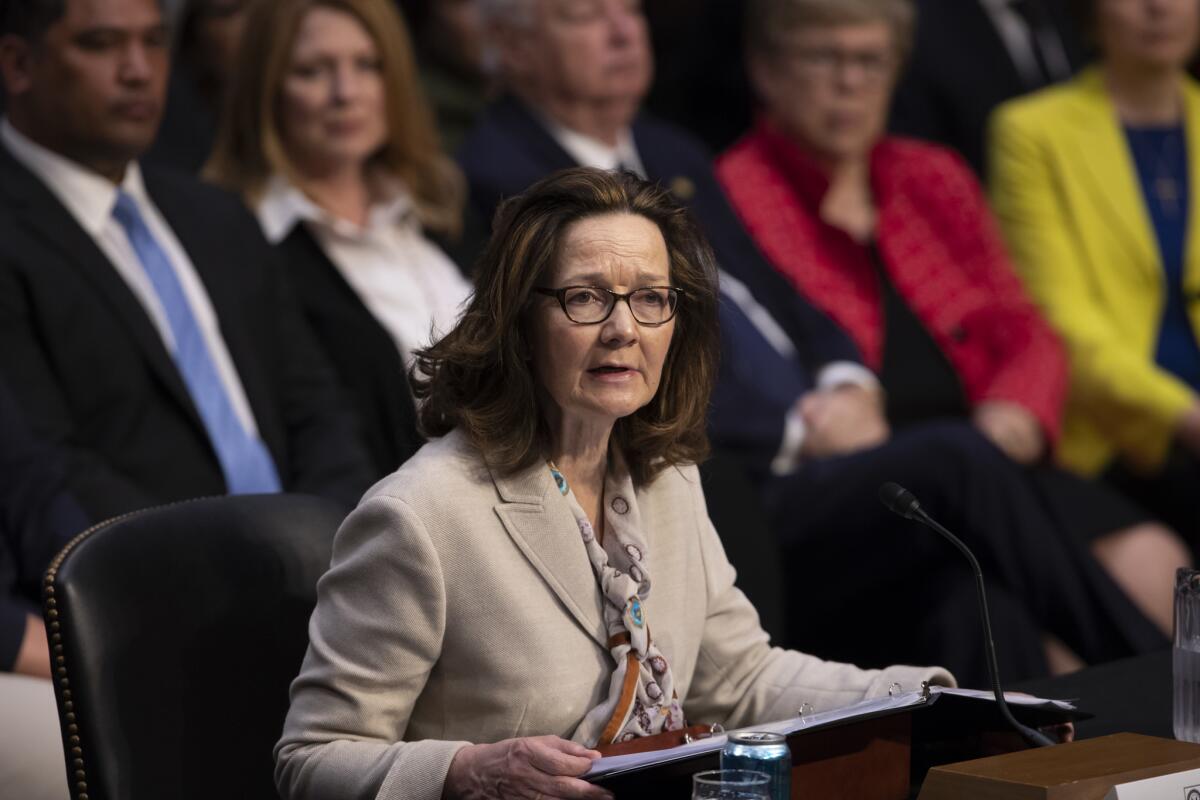
Before Gina Haspel testified at the long-awaited hearing on her nomination to be director of the CIA, I was willing to give her the benefit of the doubt. From all accounts — including her own Wednesday morning — she’s been the consummate spy, having clandestinely collected intelligence in back alleys and dead drops in unspecified countries, then rising up the ladder at CIA headquarters in Langley, Va. If in the course of her career she ran a black site in Thailand where terror suspects were tortured, maybe there was a way she could convincingly disavow what she did.
Instead, I was offended by her refusal to answer Sen. Kamala Harris’ straightforward, crucial question: Did Haspel think what happened at those black sites was immoral? You could hear Haspel winding up the pitch for the long, meandering non-answer (an infuriating tradition among candidates for jobs at their confirmation hearings) when Harris (D-Calif.) cut her off with a blunt, “I’d like a yes or no answer.” Harris tried again, and Haspel dodged until finally saying she thought she had answered the question and Harris reminded her that she hadn’t.
We know that, as of this moment, it’s against the law for the CIA to run those kinds of interrogations and subject people to torture. And Haspel did say at her hearing that it wouldn’t happen again on her watch. Well, sure, that’s the least she needed to say.
But in my view, she needed to show us that she realizes it was immoral, if not unlawful (and the lawfulness is up for debate, regardless). She needs to tell us, in hindsight, that she regrets what she and her superiors at the CIA did — that she is appalled by what happened at those black sites.
Telling us that doesn’t mean she’s throwing her CIA colleagues under the bus (the way she did with the entire Swiss desk!). It doesn’t mean she’s weak or disloyal. It means she has good judgment and she’s willing to own mistakes and change. Instead, she was secretive and oblique. That’s fine in the field but not at a confirmation hearing.
Don’t worry about what Congress just did on auto loans. Worry about what the CFPB isn’t doing
Numerous Democrats and media outlets have accused Republicans of making it easier for car dealers to discriminate against racial minorities by pushing a resolution through Congress to disapprove a guidance document issued in 2013 by the Consumer Financial Protection Bureau.
But the CFPB under the Obama administration picked a fight with Congress on this issue, and it’s not really surprising that it lost. Yet the move doesn’t give lenders a green light to charge minorities more for car loans.
When Congress created the bureau in the 2010 Dodd-Frank act, it specifically exempted conventional auto dealers from the bureau’s jurisdiction. Nevertheless, the CFPB sought to work around that restriction by holding the lenders that finance car sales liable for dealers’ decisions to mark up or discount loan rates for individual customers.
Making matters worse, it laid out its plan to so do in a bulletin explaining how it would enforce compliance by auto lenders with the Equal Credit Opportunity Act — not through a rulemaking subject to public comment and congressional review.
Nevertheless, congressional Republicans, who have been trying since 2013 to overturn the bulletin, jerry-rigged a way to do so this year: They obtained an analysis from the General Accounting Office holding that the bulletin amounted to a “rule” subject to the Congressional Review Act, opening a new 60-day window for Congress to pass a resolution of disapproval on a simple majority vote in both houses. In other words, bye-bye, filibuster, bye-bye, bulletin. The Senate voted to reject the bulletin in April, and the House followed suit Tuesday.
Again, though, the target of this resolution was just a bulletin laying out an enforcement strategy. It has no effect on the underlying law (the Equal Credit Opportunity Act) and regulation that bar lending discrimination. That would be true for any similar use of the Congressional Review Act on prior administrations’ guidance documents.
The bigger problem for consumer advocates is that the Trump administration appointee at the top of the CFPB, Mick Mulvaney, doesn’t seem interested in pursuing new enforcement actions of any kind. Nor do key Republicans support holding lenders liable based on “disparate impact,” which measures an entire portfolio of loans rather than individual lending decisions.
The bottom line is that discrimination by car lenders will remain just as illegal after the bulletin goes away as it was while the bulletin was in effect. There just may not be anyone in the administration interested in enforcing against it.
LAPD’s next chief will definitely not be a woman. That’s a shame

Thanks to diligent reporting by Times reporters, we now know the names on the list of finalists to replace Los Angeles police Chief Charlie Beck when he retires next month. And while I’m sure all of the three men on the list are talented law enforcement professionals, it’s still a great disappointment that all of them are men.
The next LAPD chief, it seems, will definitely not be a woman.
Too bad. I thought it was high time a woman take charge of one of the largest and most storied police departments in the nation, if not the world. Not just as a sop to gender diversity, but because a woman would probably manage the department differently. And, yeah, if that meant putting the finger on the scale for a woman in this case, so what? The scale has been unfairly tipped toward male police chiefs for as long as the job title has existed.
Research, including this survey of cops by the respected Pew Research Center, indicates that female officers are less inclined to use aggressive tactics than their male counterparts. With use of force and police shootings a real concern in Los Angeles and across the nation, wouldn’t it be a good time to prioritize law enforcement leaders who bring a new, less forceful perspective to their departments?
I’m not the only person who thinks the next LAPD chief should bea woman, by the way. At least two City Council members, one of them a former LAPD officer himself, have said the same.
Of course, nobody wants to see a token and unqualified woman on the finalist list, but that wouldn’t have to be the case. There are plenty of (though not nearly enough) high-ranking women in the profession, including at the LAPD. If the Police Commission’s nationwide search wasn’t able to scrape up at least one decent female candidate, perhaps it was the process that was flawed and not the candidates. Before he picks the next police chief, Mayor Eric Garcetti should ask his commissioners if they did enough to identify female candidates, and if not he ought to tell them to try again.
A Russian money trail to Michael Cohen? Of course there is

As if there weren’t enough Russia-related stories about Team Trump already, another one emerged Tuesday: According to CNN and the Daily Beast, Michael Cohen — Trump’s personal attorney and self-described fixer — allegedly took half a million dollars from a Russian oligarch over the first nine months of 2017.
The source of the allegations is Michael Avenatti, the lawyer representing porn star Stormy Daniels (nee Stephanie Clifford) in her dispute with Cohen and Trump. So preserve your skepticism. Nevertheless, CNN and the New York Times have both reported that the oligarch, Viktor Vekselberg, has been questioned by investigators for special counsel Robert S. Mueller III, who is probing alleged Russian interference in the 2016 presidential campaign.
Bloomberg ranks Vekselberg as the 75th-richest man in the world, with $15.5 billion in assets. He chairs a multinational investment company whose holdings include a stake in Russia’s biggest aluminum company, according to Bloomberg. Notably, the Trump administration slapped him with sanctions last month along with other oligarchs accused of “malign activities,” including meddling in the 2016 election.
Avenatti alleged that Vekselberg was among a group of foreign and domestic individuals and companies that ultimately paid a total of $4.4 million to Essential Consulting, a limited liability company that Cohen created on Oct. 16, 2016. When Cohen established a bank account for Essential Consulting at First Republic Bank in Manhattan that month, Avenatti asserted, he told the bank that it was a real estate consulting firm. In late October, however, Essential wired $130,000 to an “attorney-client trust account” held by Keith M. Davidson, the lawyer representing Daniels at the time, Avenatti alleged.
Cohen has admitted paying Daniels $130,000 to keep her from speaking about a tryst she claims to have had with Trump in 2006. Cohen has also said the money came from a personal home equity line of credit. Another Trump lawyer, former New York Mayor Rudolph W. Giuliani, has said Trump ultimately covered the cost of the payment through a monthly retainer paid to Cohen.
Ah, what a mess. Avenatti leaped to the conclusion that Vekselberg’s money, not Trump’s, actually covered the Daniels payment, but that’s mere supposition. Anyway, CNN reported that Mueller’s team asked Vekselberg about the payments to Cohen, adding, “The purpose of the payments, which predate the sanctions, and the nature of the business relationship between Vekselberg and Cohen is unclear.”
Meanwhile, another of Essential Consulting’s reported customers — U.S. telecommunications giant AT&T, which Avenatti said kicked in $200,000 — told the Wall Street Journal that it hired Essential and a number of other firms to “provide insights into understanding the new administration.” Did Trump know that Cohen was selling “insights” into his most famous client?
Trump’s disastrous decision on Iran shows he has learned nothing
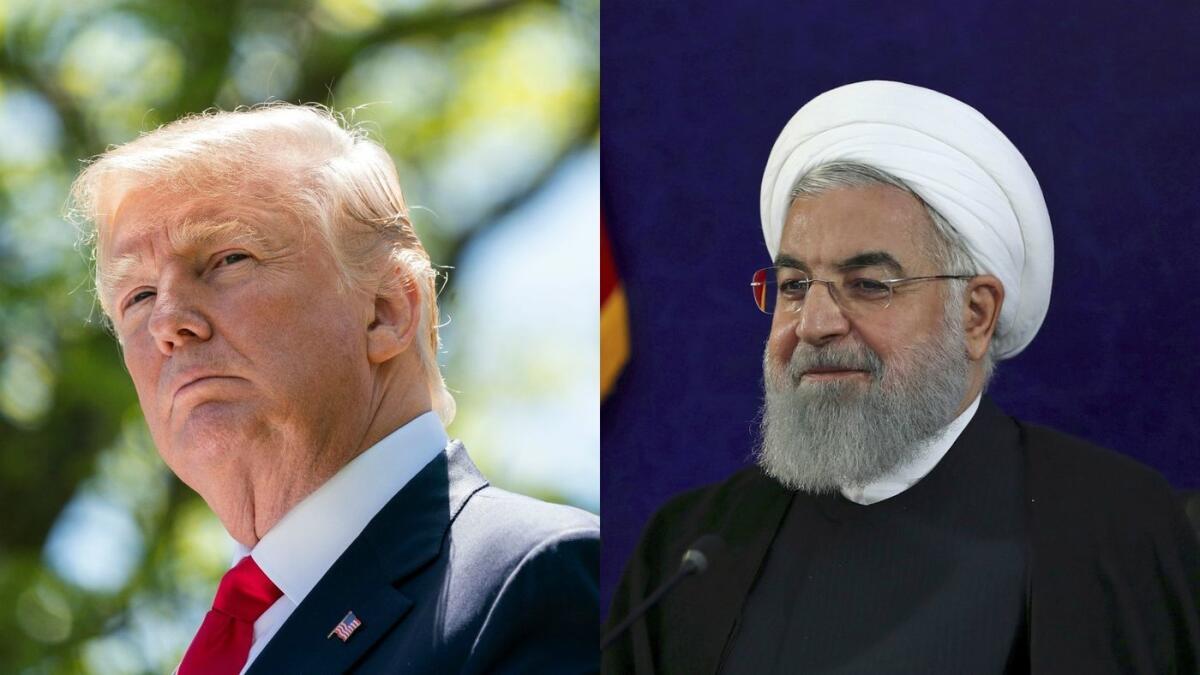
If there was any doubt that President Trump intended to repudiate the international agreement that placed limits on Iran’s nuclear program, he dispelled it on Tuesday.
As expected, Trump announced that he would not waive economic sanctions as the United States is required to do under the 2015 agreement, rejecting the advice of America’s closest allies and turning a blind eye to his own defense secretary’s conclusion that the agreement has allowed for robust monitoring of Iran’s activities.
But as alarming as the action the president took was, so was the deceitful and demagogic speech in which he attempted to justify it. It was virtually indistinguishable from the sort of rant he delivered a year and ago on the campaign trail, utterly uninformed by the sort of wisdom and appreciation of complexity that experience confers on most occupants of the Oval Office.
So much for learning on the job.
And much as we would like to think the president was motivated by a belief, however wrongheaded, that tearing up this agreement would somehow lead to a better one, it is hard to escape the suspicion that he was more influenced by a compulsion to besmirch the legacy of his predecessor.
Americans who view the nuclear agreement as a step forward are now in the uncomfortable position of hoping that it will salvaged, and perhaps even be improved, because other, more responsible governments will find a way to work around this U.S. administration.
#MeToo: It’s not just about sexual harassment anymore
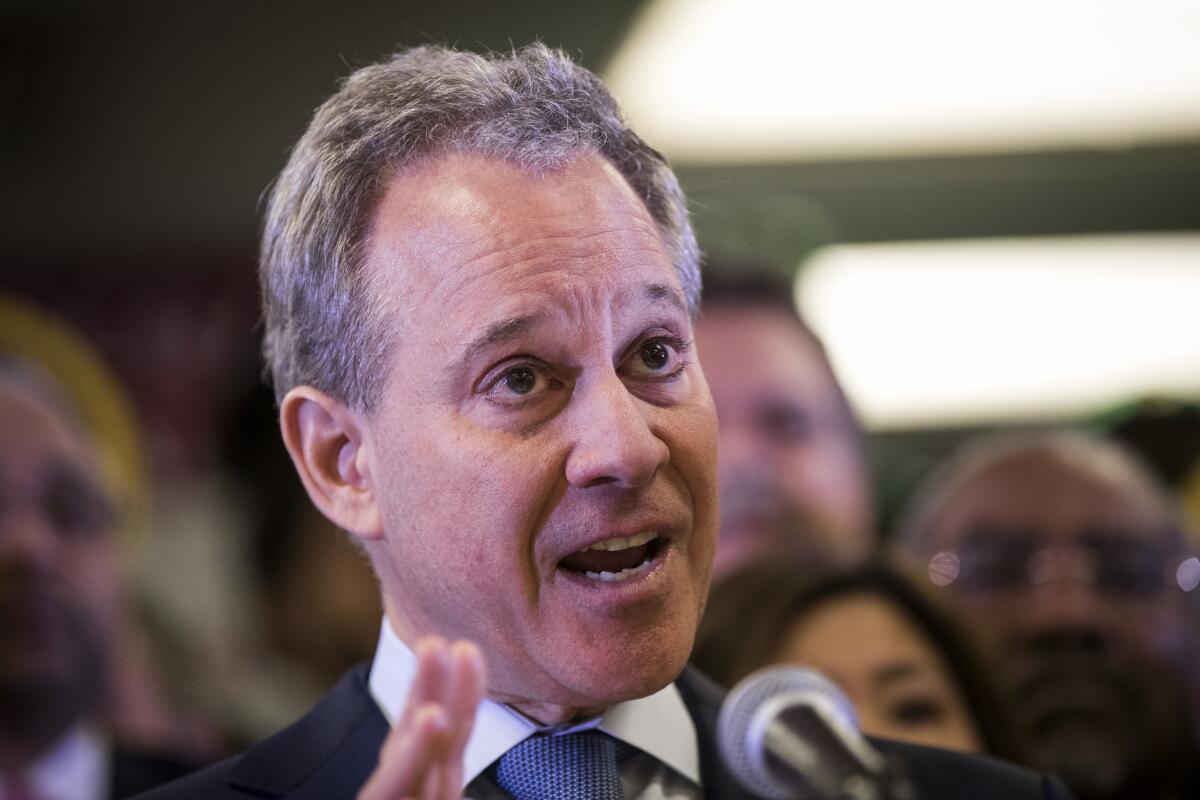
The Twitterverse has been reveling in the delicious reversal of fortune for newly former New York Atty. Gen. Eric Schneiderman, who resigned Monday just hours after the New Yorker published a story in which four women accused him of verbal and physical abuse during romantic relationships.
Oh, the hypocrisy. The self-styled feminist hero who was suing Harvey Weinstein’s company and professed disgust at the alleged mistreatment of women by the movie producer is having a #MeToo moment himself.
But is he?
It’s a reasonable question that I’m sure is on many people’s minds. Isn’t the movement a response to sexual harassment in the workplace? The answer is yes, of course, but it’s also a whole lot more.
#MeToo may have begun as a discussion about how powerful men exploit women sexually in the workplace, but it very quickly evolved into a chance for women and some men to unburden themselves (finally) of all the incidents of abuse, objectification, discrimination and harassment they have endured — and kept to themselves for fear of reprisals.
Now it is a more important, far-ranging debate about the uneven power and sexual dynamics between men and women and the ensuing mistreatment, which ranges from discrimination and inappropriate advances in the workplace to rape and assault in private.
In that context, the allegations against Schneiderman are absolutely #MeToo material.
The hypocrisy lesson N.Y. Atty. Gen. Eric Schneiderman didn’t learn from former Gov. Eliot Spitzer
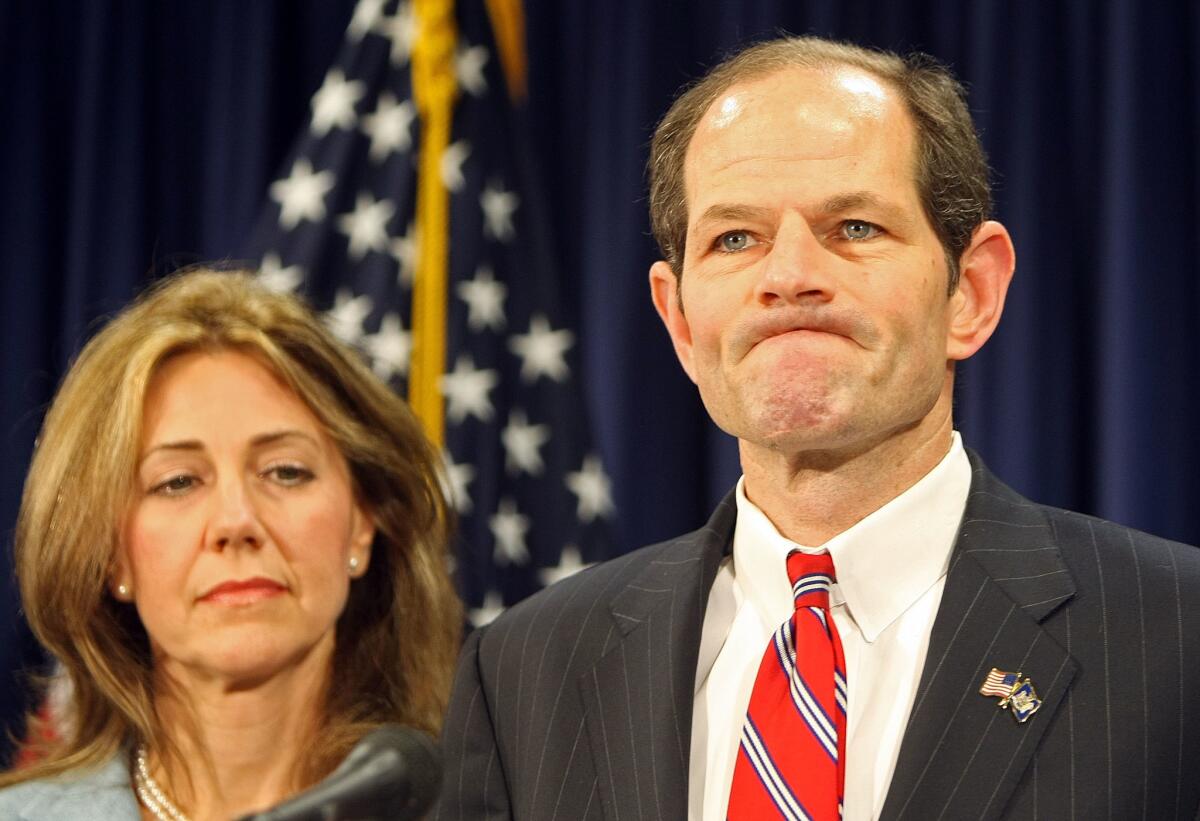
You might think that New York Democrats would have learned something from the Eliot Spitzer fiasco. Ten years ago, then-Gov. Spitzer, who’d made his name as a federal prosecutor assailing Wall Street corruption, resigned in disgrace two days after the New York Times revealed that he’d been caught on a wiretap arranging a liaison with a high-end prostitute.
Evidently not. New York Atty. Gen. Eric Schneiderman, who’d also made his name bringing splashy cases against corporate defendants — and, lately, the Trump administration — resigned in disgrace three hours after the New Yorker reported accusations by four women that he’d violently abused them.
In both cases, the revelations were shocking in large part because they contrasted so sharply with the images they’d cultivated — “Jekyll and Schneid,” as the New York Post put it after the New Yorker story broke.
Spitzer was the squeaky-clean crusader against Wall Street players who behaved as if the rules didn’t apply to them. Then he was caught patronizing a prostitution ring while on state business.
Schneiderman was the defender of the little guy, the one fighting for justice for people who’d lost their homes to foreclosure, Trump University students who’d been taught nothing of value, women who’d been victimized by Harvey Weinstein. The New Yorker story portrayed him as someone who beat up a succession of girlfriends.
Insert your favorite cliche here about people living in glass houses.
There will, no doubt, be countless hand-wringing posts wondering why President Trump — who has admitted paying a porn star $130,000 to keep her quiet about an alleged tryst and has been caught on tape bragging about groping women, among other scandals — hasn’t met the same political fate as Spitzer and Schneiderman.
Trump’s defenders will say that, aside from the suspect Steele dossier, Trump’s alleged personal transgressions are peccadillos compared to Spitzer and, especially, Schneiderman. Beyond that, Trump has never run on character — it’s always been about strength and even brazenness.
Plus, and this is probably crucial, all of the allegations against Trump thus far stem from his days as a private citizen. Spitzer and Schneiderman, on the other hand, crossed bright red lines in their personal lives while entrusted with the power of government. The timing seems to make a difference to voters, even if it shouldn’t.
Melania Trump’s ‘Be Best’ campaign is... perplexing, to be generous

First ladies have got to have something to do besides greeting foreign dignitaries and gazing lovingly at their spouses. So they typically find an issue to own that’s topical, fairly uncontroversial and involves kids or women. (Because apparently it’s still the 1950s in the White House and ladies may not have strong opinions except when it comes to raising kids and being female.)
Michelle Obama focused on fitness and nutrition. Laura Bush pushed education and literacy. Hillary Clinton focused on international trade. (Haha. Just kidding — women’s health and equality.)
Now Melania Trump has unveiled her own agenda, and it’s as perplexing as her relationship with The Donald. It’s called the “Be Best” campaign. The idea is to improve the social and emotional health of kids. There are three main pillars of Be Best: well being, social media use and … opioid abuse.
Wait. What?
Where did that last one come from? It’s like FLOTUS wanted take on the very real and important issue of opioid addiction and overdose, but was told it’s too unladylike to talk about death rates, the problem with Fentanyl, substance abuse treatment, Naloxone prices and all the things that connect to make opioids so deadly.
Add in some kid stuff as cover and problem solved.
The NRA just named one of the most infamous gun runners in the world to be its president
The National Rifle Assn. just named someone convicted in connection with illegal gun sales to be its president.
That would be former Marine Lt. Col. Oliver North, a top national security adviser to President Reagan who played an instrumental role in the Iran-Contra affair that marred Reagan’s second term. For those with short memories, that was the secret deal to violate multiple federal laws by selling arms to Iran — yes, “Death to America” Iran — in exchange for help freeing U.S. hostages in Lebanon and for money to fund the Contra rebels in Nicaragua.
In a statement, NRA chief executive Wayne LaPierre said, “This is the most exciting news for our members since Charlton Heston became president of our association.” Unlike the popular “Ten Commandments” actor, however, North is a polarizing figure — even more polarizing than the NRA itself.
He was convicted in 1989 of concealing information from congressional investigators and accepting a bribe in the form of a home security fence; those convictions were vacated on appeal, and the charges eventually dropped, because the case had been tainted by the testimony he’d given Congress.
The NRA is technically a nonpartisan organization, but hiring North — now a Fox News Channel host — as its president won’t exactly help the group’s relations with Democrats. But with Republicans controlling Congress and the White House at the moment, it’s not the Democrats’ favor the NRA needs to curry.
Paul Ryan, the chaplain and a crack in interfaith conservatism
“The Protestants hate the Catholics, and the Catholics hate the Protestants … ”
— Tom Lehrer, “National Brotherhood Week”
When I saw Lehrer perform that satirical classic on TV, during my Catholic childhood in the 1960s, Protestants and Catholics still didn’t get along that well, despite the election in 1960 of John F. Kennedy.
Media critic-in-chief Trump can’t get his Stormy Daniels story straight, either

Which leading political figure uttered these words of wisdom Friday morning?
“You know what? Learn before you speak. It’s a lot easier.”
That would be President Trump, the least studious and fact-based president of our lifetime. He made the comment to reporters after contradicting yet again the narrative about Stormy Daniels put forward by his own team.
Trump and his new legal advisor, former New York Mayor Rudy Giuliani, disclosed more details this week about the payments another Trump attorney, Michael Cohen, made to Daniels to buy her silence about her alleged affair with Trump before the 2016 election. One issue: Giuliani’s comments to various media outlets didn’t dovetail perfectly with Trump’s tweets.
So when Trump stood before reporters Friday morning, the first question asked was, “How’s Rudy doing?” To which Trump replied, according to a transcript the White House provided to the New York Times, “Rudy is a great guy, but he just started a day ago …. He’ll get his facts straight.”
That prompted a second question: When did Trump find out that the retainer he was paying Cohen was being used to reimburse Cohen for the $130,000 he’d paid Daniels? That’s a key issue here, given that Trump had said in early April that he had no knowledge of the payment to Daniels and didn’t know where Cohen got the money.
“Well, you’re going to find out, because we’re going to give a full list,” Trump said. “And people know. And virtually everything said has been said incorrectly, and it’s been said wrong, or it’s been covered wrong by the press ….
“It’s actually very simple. But there has been a lot of misinformation, really …. [A]nd I say, you know what, learn before you speak. It’s a lot easier.”
The press has blundered from time to time on this story, and I’m no exception — witness the NBC News report Thursday that Cohen had been wiretapped by the feds, when it appears the FBI was just logging the calls he’d made, not listening in. But as with so many things involving Daniels or special counsel Robert S. Mueller III, the Trump team simply cannot get its story straight. If Trump and his allies only learned before they spoke, it would be a lot easier.
Dear California, please don’t accidentally vote for a neo-Nazi for U.S. Senate
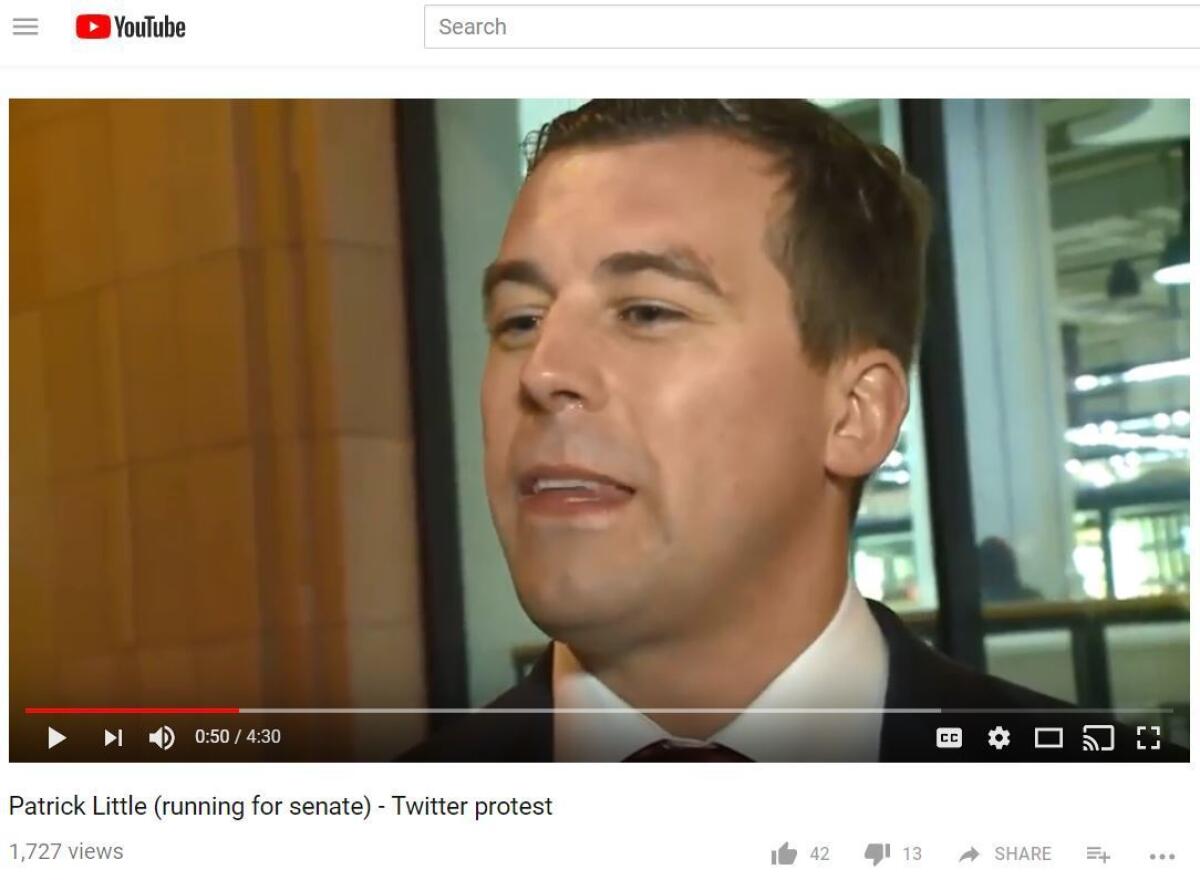
A new poll shows that a neo-Nazi candidate not only is the most popular GOP candidate on the ballot for U.S. Senate, but that he’s running second in the race, putting him in a position to face off with incumbent Dianne Feinstein in November.
Patrick Little of Albany had about 18% of the vote, compared to Feinstein’s 39%, according to the SurveyUSA poll released Tuesday. Take the results with a grain of salt — SurveyUSA did not reveal its methodology, other than to say it interviewed 1,100 adult Californians, less than half of whom were identified as likely voters, during the week of April 19.
Little is running as a Republican, and his ballot designation is “civil rights advocate.” His views are unabashedly anti-Semitic. On his website, he calls the Holocaust a “propaganda hoax” and says he would limit the number of Jewish people in government and judgeships.
I’m going to give Californians the benefit of the doubt and assume Little’s strong showing in the poll is the result of voters not yet paying attention to the June primary and the lack of familiar GOP candidates in the race.
Last week, another Republican candidate, James P. Bradley, made a strong showing in a different poll, surprising even himself. Bradley is a more conventional, even moderate Republican candidate from Laguna Niguel. One expert suggested to the Sacramento Bee that Bradley benefited from ballot order — his name appeared second among 32 candidates — along with “an Anglo-sounding name” and a respectable-sounding designation of chief financial officer.
The lesson here to voters is do a little homework before you cast your ballot.
Stormy Daniels appears to be the gift that keeps on giving to Trump foes

It’s hard to come up with a scoop that could send supporters and opponents of President Trump into a frenzy more effectively than NBC News’ anonymously sourced report that the FBI wiretapped one of the president’s lawyers. (Update: NBC is now saying it wasn’t a wiretap, it was a pen register that logged the numbers dialed from the phones in question and the sources of incoming calls.)
For Trump backers, the possibility that Michael Cohen’s phones were monitored was another outrageous defilement of Trump’s attorney-client privilege — yet more proof (not that they needed any) that the Justice Department had gone rogue. According to NBC, the monitor was in place for a number of weeks before the feds obtained a search warrant and raided Cohen’s office, home and motel room.
Reacting to initial reports of a wiretap, former New York Mayor Rudolph W. Giuliani, a member of Trump’s newly reconstituted legal team, called on Atty. Gen. Jeff Sessions to rein in the agents responsible for the Cohen investigation. That investigation began with a referral from special counsel Robert S. Mueller III but is being handled by federal prosecutors in New York.
Just imagine what fireworks would go off if Sessions intervened to stop the Cohen probe. Alternatively, imagine what Trump would do if he tells Sessions to crack down and Sessions refuses. And if Trump’s people find Deputy Atty. Gen. Rod Rosenstein’s fingerprints on the subpoena for Cohen’s phone records? Oooh, baby.
Meanwhile, Trump opponents reveled in speculation about the extent of Cohen’s legal trouble and whether said difficulties might prod Cohen to cooperate with prosecutors. Just how much information might Cohen — Trump’s self-styled fixer — have to offer them? That speculation was fueled by reports of a wiretap, which is much harder for investigators to obtain court approval for than a pen register.
Career prosecutors and FBI agents might need an especially good reason to go after Cohen, having seen FBI Director James B. Comey ridiculed and fired, then-Deputy Director Andrew McCabe berated and canned days before qualifying for a full pension. There’s also the constant drubbing Trump has inflicted on Rosenstein and Sessions on Twitter.
The Cohen investigation appears to be related in some way to the payment he made to porn actress Stormy Daniels weeks before the 2016 election to stop her from talking about a tryst she says she had with Trump in 2006. That episode is the gift that keeps on giving to Trump’s foes, and neither the president nor his legal team seems able to stop pushing it back into the news.
(This post was updated at 2:38 p.m. after NBC corrected its initial reporting.)
On ‘World Press Freedom Day,’ the world’s press is not only less free but even more endangered
The United Nations, 25 years ago, thought it was a good idea to put “World Press Freedom Day” on its international calendar, where today it shares designations with the likes of World Environment Day, International Literacy Day and World Suicide Prevention Day.
The late ’80s and early ’90s looked to be shaping up hopefully: top-down governments and their top-down economies were folding their tents, and the role of honestly brokered journalism in nations’ affairs was slowly in the ascendant.
Yet now, on World Press Freedom Day 2018, the world press is not only less free but even more endangered. And that extends into the United States, whose free press protections and practices have been an international model.
Trump spins another tale about the hush money he paid to a porn star
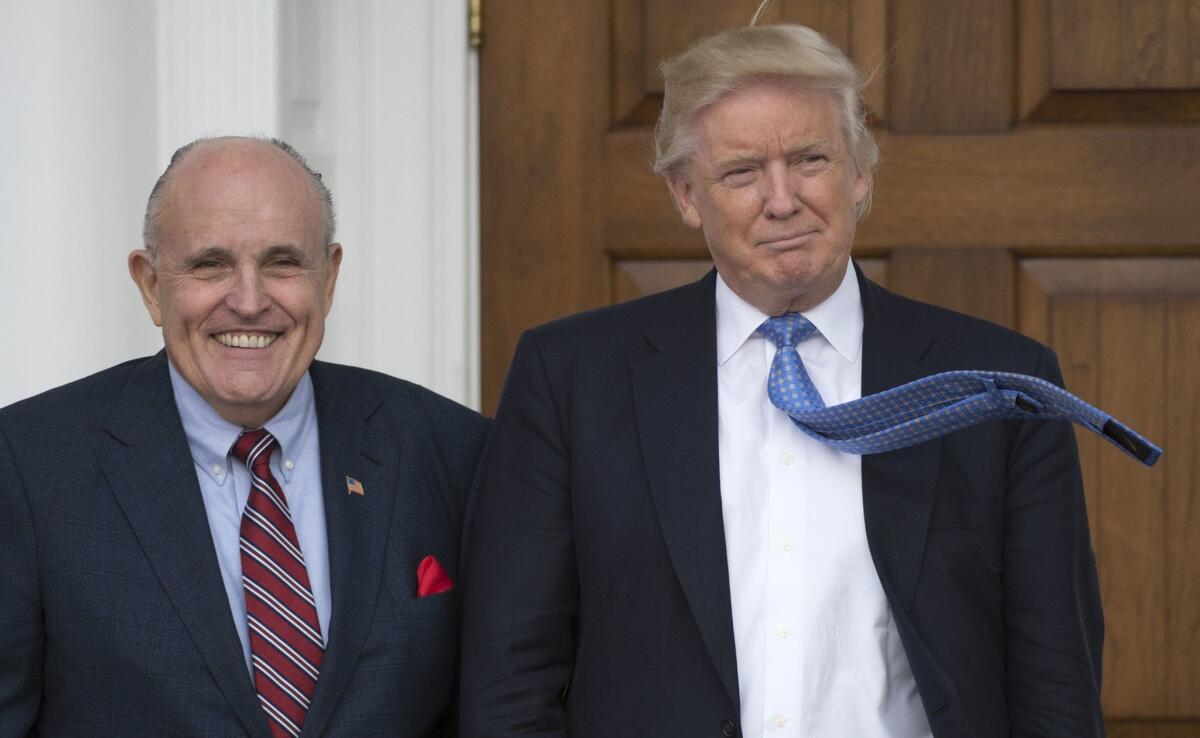
President Trump and his new legal advisor Rudolph W. Giuliani evidently concluded that it was better for Trump to admit to a baldfaced lie to the public than to implicate attorney Michael Cohen in a campaign finance violation.
Smart call.
In a Fox News Channel interview and on Twitter, respectively, Giuliani and Trump emphasized that no campaign funds were used to buy the silence of porn star Stormy Daniels a few weeks before the 2016 election. Instead, they said, Cohen was reimbursed, over time, from Trump’s pocket in the form of a monthly retainer Trump paid Cohen.
Their intent, apparently, is to reduce Cohen’s legal jeopardy — and the incentive he might have to cooperate with prosecutors. Good luck with that; as one campaign finance expert told the Washington Post, Cohen’s payment may still amount to an unreported loan to the Trump campaign. Which would be, umm, illegal.
One obvious problem here is that Trump told reporters recently, and unequivocally, that he had not known about the payment to Daniels and didn’t know where Cohen got the money. (Cohen himself had said he’d gotten it from his home equity line of credit.) He and Giuliani are now trying to thread the needle on the campaign-finance front, at the risk of Trump’s credibility with the public.
Again, smart call. Trump’s critics have already made up their minds about the president — with them, he has no credibility. His supporters, meanwhile, don’t particularly care what the truth is about Stormy Daniels (nee Stephanie Clifford). In fact, they seem perfectly fine with the endless stream of half-truths, self-aggrandizing exaggerations, contradictions and, yes, lies about any number of topics.
To them, Trump retains a rare degree of authenticity because he speaks like no other politician does. He bluntly channels their fears and anxieties about immigration and crime, their contempt for Washington, their desire to roll back the clock and reverse the effects of globalization and the information economy. No matter how valid those fears and desires might be — he knows where their buttons are, and he pushes them.
What will shake their faith in Trump? Maybe they’ll recognize how his administration is raising their health insurance premiums. Maybe they’ll see the link between the shrinking market for their soybeans and Trump’s decision to slap tariffs on China. Maybe they’ll conclude that Trump’s tax cut for corporations is paying off for shareholders, not workers. But a flip-flop on Stormy Daniels? Not so much.
Pro tip to Michelle Obama: Don’t refer to yourself the way your biggest fans do

It should come as no surprise that the first African American U.S. president and first lady are beloved in some quarters. But when Michelle Obama dared to use one of the titles bestowed by her fan base — “Forever First Lady” — that was just too much for folks on the other side of the political spectrum.
Here’s a typical headline about her remarks Wednesday at a College Signing Day event at Philadelphia’s Temple University, from the right-leaning NTK Network website: “Michelle Obama Declares Herself America’s ‘Forever First Lady.’” That’s one of the less venomous takes, actually. Here’s another view:
Obama helped launch the National College Signing Day events in 2014 as a kind of counterpoint to the fuss made over high school athletes when they commit to a college sports program. Instead of celebrating gifted athletes, it celebrates ordinary high school students who commit to pursuing a degree.
On Wednesday, Obama told the high schoolers assembled on the Temple campus that it was OK to be scared about heading off to college — that’s how she felt when she left Chicago for Princeton University. But she added: “See, I am not one of those doubters. I know you have everything it takes to succeed. I know you are me, and if I can be standing here as your forever first lady [she paused here and chuckled], then you can do anything you put your mind to.”
She wasn’t asserting that she’s the One True First Lady — she was using a title that’s been floating around social media for years (the references on Instagram and Twitter are legion) — as a way of saying, “Look how far you can go.” And it seems to have been bestowed at least as much out of sentiment as politics. Yet in our polarized world, supporters of the current occupants of the White House can’t help but see Obama’s remarks as slighting Melania Trump.
Pro tip to public figures: Don’t refer to yourself the way your biggest fans do, even if you think it’s kinda funny.
Mahmoud Abbas’ reprehensible anti-Semitic comments deserve unequivocal condemnation

No one had the slightest reason to believe that relations between Palestinians and Israelis were getting any better in recent days. The long-moribund peace process remains moribund. Tens of thousands of Palestinians in Gaza have been demonstrating against Israeli policies for several weeks; nearly 50 of them have been killed by Israeli soldiers. The United States is set to open an embassy in Jerusalem this month, which will undoubtedly spur more protests.
Just when you thought it couldn’t get more depressing comes the news that Palestinian President Mahmoud Abbas, the 82-year-old successor to Yasser Arafat, gave a rambling speech Monday in which he said that the root cause of the Holocaust was not the racist ideology of the Nazis, but the Jews’ own behavior. In the speech, which Abbas described as a “history lesson” — he said that the “social function” of the Jews of Europe (specifically “usury and banking and such”) was what led to the animosity that fueled their extermination.
What cruel, ignorant, ahistorical comments. And how irresponsible for Abbas — a world leader of sorts — to spew such low-level, garden variety anti-Semitic canards. Of course, it’s not only reprehensible for Abbas to say such things, it’s also utterly counterproductive to his cause because it suggests to millions of people around the world that the struggle of the Palestinian people for an end to the occupation and a state of their own is not a legitimate cause, but a smokescreen for hatred and prejudice.
Abbas’ speech should be condemned unequivocally, including by Palestinians. Then the two sides should restart the search for a just peace that allows for a safe, secure Israel alongside a sovereign and independent Palestine. Sadly, that seems unlikely to happen in the near future.
Still think the Trump tax cuts will go to workers? Look at how Apple is spending its foreign profits

While analysts caution that it’s still too early to tell how the GOP tax cuts will affect U.S. businesses, it’s clear who the early beneficiaries are: shareholders.
Payments to shareholders, either directly as dividends or indirectly as stock buybacks, are hitting record levels, with Goldman Sachs projecting $1.2 trillion in dividends and buybacks by Fortune 500 companies in 2018. The rise is fueled by companies such as Apple, which announced Tuesday that it would devote an additional $100 billion to buybacks and boost dividends 16%.
The source of the money is likely to be Apple’s cache of overseas profits, which it (like many U.S. multinationals) has been stashing in foreign subsidiaries to avoid being hit with high U.S. tax rates if the profits were repatriated. That behavior was both rational and lamentable, because it discouraged U.S. companies from using the money their products and services earned around the world to hire more people, start new product lines and increase wages here.
The GOP tax plan rightly addressed that problem, greatly reducing the incentive companies have to shift and stash profits outside our borders. It also encouraged companies to repatriate foreign profits this year by offering a huge one-time tax break. But the law also went overboard, cutting corporate (and personal) tax rates more deeply than was fiscally sensible in the name of stimulating an already growing economy.
It also claimed that most of the benefits would accrue to workers, not corporate owners. According to Trump administration officials, workers bear 70% of the corporation’s tax burden, so naturally most of the money saved on taxes would flow to them. The White House’s Council of Economic Advisors put out a white paper echoing that argument.
Maybe Apple’s workers will benefit from the higher dividends and stock buybacks — many of them are likely to be shareholders, after all. But the main takeaway here is that Apple, like many other Fortune 500 companies, isn’t doing what the administration predicted companies would do, which is to hire more workers, expand operations and raise wages.
That’s because taxes are only a small factor in those decisions. Market demand drives investment in new workers, products and plants. Competition for labor drives wages. The administration is betting that the cash freed up by the tax cuts will eventually increase demand and encourage companies to take more risks. In the meantime, though, the benefits are flowing up the economic ladder — as former Obama administration economist Jared Bernstein has pointed out, 84% of the stocks owned in this country are in the portfolios of the wealthiest 10% of U.S. households.
Microbes offer a lesson in biodiversity, and how to avoid killing ourselves off
Well, here’s a cheery thought for a Tuesday afternoon: Scientists have discovered organisms can commit ecological suicide by gorging on food and then poisoning their ecosystem with their own waste. Remind you of any species you know?
The lab-based study, published in the most recent issue of Nature Ecology & Evolution, found that the soil-dwelling Paenibacillus microbes, in high concentrations and with plentiful food, made their environment too acidic to live, and killed themselves off down to the last microbe.
This is notable because scientists thought that species would dwindle but then correct the behavior before it hit the point of no return.
Nope. And the researchers said about one-quarter of soil-bacteria strains they tested similarly poisoned themselves, proving that you can indeed have too much of a good thing.
“The effect is so dramatic,” Jeff Gore, a Massachusetts Institute of Technology biophysicist who co-authored the study, told the New York Times. “You have an exponential growth of the population followed by exponential death.”
The problem becomes mitigated when there is eco-diversity — as some organisms excrete acidic waste, other counter with alkaline waste, keeping pH at a livable level for all.
There’s a lesson in there. Someone ought to teach it to the current administration in Washington.
Gov. Jerry Brown: ‘Outlaw Pruitt’ and Trump are leading the country off a cliff
If there was any doubt that California and the Trump administration are at war over environmental protection, Gov. Jerry Brown cleared it up Tuesday.
“We’re losing our battle on climate change,” Brown said during a news conference announcing the state’s 10th lawsuit against the U.S. Environmental Protection Agency. This one seeks to block the attempt by EPA Administrator Scott Pruitt — dubbed “Outlaw Pruitt” by Brown — to roll back national standards to make passenger cars more fuel efficient and less polluting.
“If we follow the Pruitt Trump path, we follow our way off the cliff into disaster,” Brown said. “This is an existential threat to America, to California and the world.”
Brown also declared that Pruitt and Trump were on a mission to make people buy more gas and pollute more, and that their refusal to make cars more fuel efficient would ultimately hurt American automakers’ competitiveness in the world market.
It’s no surprise that California is challenging the EPA decision to halt the clean-car requirements that were supposed to kick in starting in 2022. Under the Obama administration, California had agreed to forgo its own, slightly more stringent emission standards in exchange for national vehicle standards that would have a larger impact on greenhouse gas emissions.
What is surprising is that 16 other states, along with the District of Columbia, are joining the fight as well. The coalition represents approximately 43% of the new car sales market nationally and 44% of the U.S. population, according to California Atty. Gen. Xavier Becerra’s office.
That should be a resounding message to the Trump administration and to automakers who lobbied for looser standards that there is no desire to go backward on climate change and clean air.
Will the last person to leave Pruitt’s EPA turn out the lights?
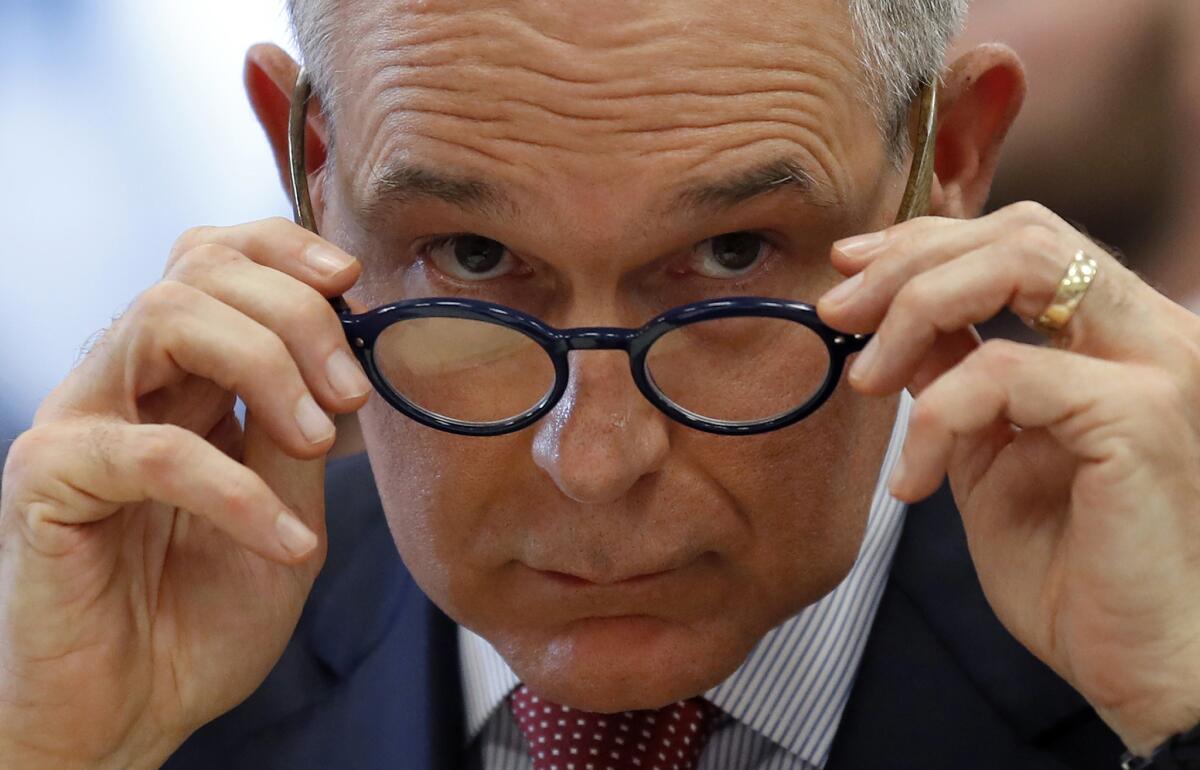
It’s twofer Tuesday for Scott Pruitt, the embattled director of the Environmental Protection Agency.
Resignations of two top aides were reported Tuesday morning. The first to go was Albert Kelly, a longtime personal friend of Pruitt and Oklahoma banker who had no background to do his job overseeing the Superfund program cleaning up toxic dump sites. Kelly, incidentally, also has been banned from the banking industry by regulators at the Federal Deposit Insurance Corp. over issues with the bank he formerly ran in Tulsa, Okla.
The Washington Post reported that Kelly resigned because he “was tired of coming under criticism for the FDIC ban and didn’t need the job.”
The second departure was Pruitt’s security chief, Pasquale Perrotta, whom Pruitt blamed for all those first-class plane tickets and other expensive travel and security-related arrangements. Perrotta actually quit Monday, but news of the resignation didn’t come out until Tuesday morning.
Perrotta is still expected to testify before the House Oversight Committee on Wednesday as it investigates Pruitt’s expensive trips (which is just one reason The Times editorial board cited in calling for his removal). Perrotta also is a central figure in an EPA ethics investigation into Pruitt. The pressure, Perrotta told ABC News, had become too much.
“All of this press is taking a toll on my family.” Perrotta said. “I decided to move on and it’s been an honor to serve.”
In late March, another top Pruitt aide cut and ran too. Pruitt had hired Samantha Davis, with whom he had worked when she was policy director and general counsel at the Republican Attorneys General Assn., to serve as senior counsel and associate administrator in the EPA’s Office of Policy.
While Davis’ departure was framed by associates as unrelated to her boss’s ethics controversies, she was described as one of his closest aides, and as increasingly frustrated with an office roiled by “one drama after another.”
So like President Trump, who’s been hemorrhaging – or firing – top aides, Pruitt is becoming more and more isolated. Destroying the environment can be lonely work.
Leaks in the Mueller investigation mean the endgame must be near

Special counsel Robert S. Mueller’s investigation into Russian interference must be nearing its end. We’ve reached the leaking endgame.
Late Monday, the New York Times reported that it had obtained a list of nearly 50 questions that Mueller has submitted to President Trump’s lawyers. The questions explore what Trump knew and felt about several figures involved in his campaign who’ve been indicted or implicated in some way in Mueller’s probe.
Trump quickly tweeted that there were no questions about collusion with Russia on the list, and that’s patently false. There are several, including one that suggests new information about former campaign manager Paul Manafort: “What knowledge did you have of any outreach by your campaign, including by Paul Manafort, to Russia about potential assistance to the campaign?”
Beyond that, the questions were all what one would have predicted from Mueller. Still, most of them present at least two potential risks for Trump, a notoriously reckless interlocutor: that he will utter a lie, and that he will say something that undermines or contradicts someone’s defense (potentially even his own). Having the questions in advance gives his team more ammunition in their fight to persuade Trump not to sit down with Mueller (the special counsel can’t compel him to talk), and failing that, helps them gird him as best they can.
So why did a source turn them over to the New York Times? If the leak came from Trump’s lawyers — and there are several suggestions that it did — the motive could be to rile up Trump supporters and persuade Trump to pass on the Mueller sit-down. If the pushback is strong enough, Trump’s Republican allies in Congress might try to shut down the probe. That would work, though, only if the general public saw the questions as illegitimate and an attempt to trap an innocent chief executive.
Good luck with that.
If the leak came from Mueller’s side, the point might be to raise public pressure on Trump to answer questions that people would really like answered. It also might be to goad Trump to answer them publicly, possibly in ways that contradicted what Mueller’s investigators had learned privately. But despite the assertions on the GOP side, Mueller’s team doesn’t seem like the prime suspect here for the simple reason that it doesn’t have as much to gain from the leak as Trump’s team does.
Happy May Day, er, Loyalty Day
President Trump skipped it last year, but on Monday he caught up with tradition and issued a proclamation recognizing May 1 as Loyalty Day — the same day much of the rest of the world celebrates as May Day. There’s a story behind that.
As The Times editorial board explained two years ago, Loyalty Day traces its roots to 1921 and Americanization Day, the response to Russia’s 1917 Bolshevik Revolution and growing radicalism among labor advocates, and as a nativist rebuff to a spike in immigration (sound familiar?). Fast-forward to the post-World War II Cold War and fears of communist spies and subversives. That led to President Truman’s insistence that federal employees sign loyalty oaths, a concept that spread to most levels of government. In fact, California still has one, though it’s watered down from the original version that made oath-takers attest that “I am not a member of the Communist Party.”
It was a silly concept. Any foreign agent seeking to so harm to the U.S. would have no qualms about signing a lie to the opposite. But people who stood on principle and refused to sign — one’s political beliefs should not bear on whether the person is fit for a job — lost work and careers.
Trump’s proclamation focused on military history: “[W]e remember and honor the thousands of Americans who have laid down their lives to protect and defend our Nation’s beautiful flag, from those who battled on Bunker Hill to those who sailed at Midway.” But he also gave a nod to first responders, parents and teachers who “prepare our youth to defend our unique heritage and our rights,” and, oddly, entrepreneurs and the free market.
That contrasts with President Obama’s final such proclamation in 2016, which focused on the spirit of freedom shown from the original revolutionaries of 1776 through the antislavery and civil right movements, as well as the nation’s rich history of diversity and common ideals. “As long as we stay true to that mission and uphold our responsibility to deliver a freer, fairer Nation to the next generation, a future of ever greater progress will remain within our reach.”
As The Times noted in response:
“We’re all for recognizing the strengths of American democracy, even during its ebbs (this presidential election may be one), and for highlighting the dreams and desires that undergird the Constitution. But it’s also important to recognize our full history and not gloss over those moments when we fell short of our aspirations, and those ‘common ideals’ the president mentioned.”
Oh, and the reason much of the rest of the world uses May Day to celebrate labor and union solidarity has distinctly American roots. It commemorates the 1886 Haymarket Square incident in Chicago, when police attacked a labor rally. During the melee, someone threw a bomb that killed eight people, seven of them police officers. Four labor activists were later executed after convictions on murky evidence, leading the governor in 1893 to pardon three other men sentenced to prison and condemn the trials and executions.
That, too, is part of our history.
Straw-on-request laws seem silly, but they sure change the conversation about plastic trash
Los Angeles is the latest California city looking at passing a straws-on-request law. There’s a state law proposed too. What this means is restaurants and other food joints may hand over a plastic straw only to customers who ask for one.
Before you groan and say, “what a silly and meaningless law,” consider how often plastic straws have been foisted upon you just in the last week. Fast food places stick a straw in drinks as a matter of course. In recent years, even sit-down restaurants have taken to sticking a straw in water glasses before delivering them to customers. Happens to me all the time.
Having to ask for a straw puts the onus back on the customer, who may indeed need and want one. But it comes with a subtle but potent message about the environmental cost involved. (Just check out this distressing video of a plastic straw being extracted from the nose of a sea turtle for a clue.)
Sure, plastic drinking straws aren’t the biggest contributor to trash in the ocean, at least not by volume. But they are still a problem because the many millions of straws that Americans use for a minute and then throw away every year are often not recycled. What makes it all the more infuriating is that for the most part they aren’t even needed. Most of us have perfectly functioning lips that were made to efficiently and cleanly deliver liquid to our bodies.
OK, sometimes modern life really demands a straw. If your jaw is wired shut, for example, it’s hard to drink without one. And it’s tough to slurp down an uncapped Big Gulp while driving on Los Angeles’ pothole ridden roads without dumping half the stuff down your front. In those cases, there are ready substitutions in the form of reusable straws or disposable paper straws.
What’s really silly about straws-on-request laws is that we even need to consider them.
There’s talk of Trump deserving a Nobel Peace Prize. Really
If the negotiations with North Korea actually denuclearize the Korean peninsula, it would be such an epic accomplishment that South Korean President Moon Jae-in believes President Trump would deserve the Nobel Peace Prize.
That’s what a spokesman for Moon told Reuters on Monday. And although Democrats probably wouldn’t go that far — I’m just guessing here — they have grudgingly given Trump credit for North Korea’s entry into talks.
Rep. Adam B. Schiff (D-Burbank), who is, umm, not Trump’s biggest fan, had this to say Sunday on ABC’s “This Week”:
“I think it’s more than fair to say that the combination of the president’s unpredictability and, indeed, his bellicosity had something to do with the North Koreans deciding to come to the table. But before the president takes too much credit or hangs out the ‘mission accomplished’ banner, he needs to realize that we may go into a confrontational phase and he may not want the full blame if things go south.”
OK, so maybe “grudgingly” doesn’t quite capture Schiff’s sentiment there. But let’s consider what happens in the alternate scenario. Assume that Trump accomplishes what a long succession of presidents have failed to achieve, persuading a North Korean dictator to give up nukes for good. It’s not impossible; times have changed, and Kim Jong Un may feel as if the best way to retain power and potentially reunify Korea under terms favorable to his regime would be to give up weapons that, while immensely powerful and intimidating, simply can’t be used as anything but bargaining chips. (I didn’t say “not implausible,” I said “not impossible.” Work with me here.)
That would be a signal achievement, a real #WIN. The next question, though, is whether the saber-rattling path Trump took to get there will make for a more peaceful world. That, after all, is what the Peace Prize is about. And unfortunately, that path isn’t a promising one.
Trump’s argument is that previous U.S. policy has been too weak, both in word and in deed. His threats to lay waste to North Korea, and even to give the country’s leadership a figurative bloody nose with a preemptive strike, were a key part of the effort to toughen up and push Kim to abandon his nuclear ambitions.
The problem with this strategy is that at some point, a nation on the receiving end of the threats will call Trump’s bluff. And then what? This is not a sustainable long-term approach to tough foreign-policy challenges. It might yield results in North Korea, but if it becomes a blueprint for Trump, it could very well lead to a much worse outcome elsewhere.
Does the world really need 5G?

The much-ballyhooed 5G wireless technology is so revolutionary, it could transform the U.S. mobile phone industry even before it arrives. But who needs it?
The next-generation tech appears to be one of the major rationales behind the proposed merger between T-Mobile and Sprint, the third- and fourth-most-popular mobile phone networks in the United States. Deploying 5G, which calls for a comparatively dense build-out of antennas in urban areas, will be costly and time-consuming, and it’s not entirely clear why the United States needs four copies of this infrastructure.
But telecom analyst Dave Burstein has raised a bigger question: What if 5G isn’t such a big leap after all? With equipment vendors pushing the capabilities of the current technology (known as 4G LTE) above 1 gigabit per second in peak speeds, 5G can seem more evolutionary than revolutionary.
Burstein isn’t the only doubter. And it’s worth asking whether consumers would be better off with four mobile phone companies innovating the way T-Mobile and Sprint have than three behemoths all following the same playbook — even if one or two of them stuck with 4G LTE.
I’m more optimistic about 5G, whose benefits will include services that can only come into being once higher mobile speeds and lower latency become available. I also like 5G as a potential alternative to cable modems and DSL in the competition-starved market for home broadband service. That’s how 5G will be introduced, after all — as a fixed wireless broadband service in a handful of cities this year.
But how many competitors are enough in mobile phone service, or any other market for that matter? There’s no good answer. As The Times’ editorial board noted in 2006, regulators have gradually made peace with an ever-smaller number. Five major record labels have become three, for example. And it’s easy to see the current Justice Department and Federal Communications Commission allowing four major mobile phone companies to become three as well.
But I’d rather have more innovation on price, features and phones than more — and more duplicative — investment in 5G. What about you?
Should banks track who uses their credit cards to buy guns?

Fresh discussions by banks over developing methods for tracking who buys firearms raises some thorny issues, the Wall Street Journal reports. Some banks announced after the Parkland, Fla., high school massacre in February that they would cut ties with firms that make combat-style semiautomatic weapons and clients that sell bump stocks (the device that converts a semiautomatic into nearly full automatic), or bar clients from using financial services and credit cards to sell firearms to customers who had not passed a background check or were younger than 21.
Those were laudable steps. As The Times editorial board said earlier this month: “It’s good that two banks have acted, and we hope to see more banks, retailers and others that intersect with the gun industry make similar decisions. Guns may be legal, but that doesn’t wash the blood of the slain from the hands of those who manufacture and prosper from firearms.”
But in tracking purchases by individual buyers, would the banks be going too far? Banks already know when you’ve run up a bar tab or taken a trip through special codes for specific purchases. For now, though, they don’t know when someone buys a gun – such sales are wrapped under broad “sporting goods” categories. Creating a gun-specific category would let banks track who uses credit cards to buy guns.
Left unexplored is why they would want to do that, and whether it could lay the groundwork for banks to go beyond refusing to work with gunmakers to barring use of their credit cards to buy firearms. That raises the issue of whether we want banks to decide what legal goods people may buy. Does the end here justify the means?
“There’s a privacy angle here,” Adam Levitin, a Georgetown University law professor told the Journal. “There’s the slippery slope danger if it’s guns today maybe it is pornography tomorrow and the day after it’s right-wing literature.”
